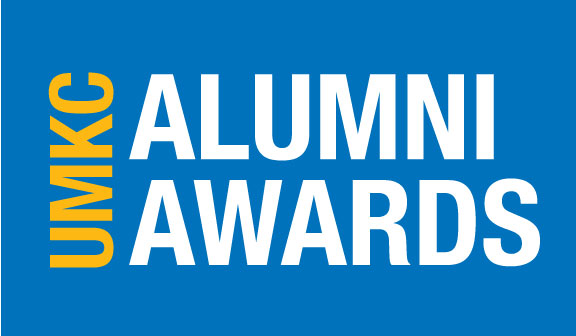
Sixteen alumni and one family will be honored April 16, 2021
The University of Missouri-Kansas City Class of 2020 Alumni Achievement Award recipients includes a national leader in radiology, a corporate immigration attorney, a Latin Grammy award winner and the owner of Bier Station.
Join us in honoring the Class of 2020 Awardees in our first-ever virtual celebration at 5 p.m. April 16. Go to umkcalumni.com/alumniawards to register for this free event. If you are unable to attend the event but would like to donate to student scholarships, contributions can be made online.
University-Wide Alumni Awardees
Alumnus of the Year: Alexander Norbash (M.D. ’86)
An interventional neuroradiologist, a highly technical specialty that addresses life-and-death matters with techniques requiring high precision and composure, Alexander Norbash serves as chair and professor of the Department of Radiology, associate vice chancellor for Diversity, Equity and Inclusion and adjunct professor of Neurosurgery at the University of California San Diego (UC San Diego). Norbash has been instrumental in inventing and implementing new technologies which are less invasive and more effective for treating strokes and brain aneurysms.
He is currently president of the Society of Chairs of Academic Radiology Departments and president-elect of the American Roentgen Ray Society. Additionally, he’s founding chair of the American College of Radiology (ACR) Head Injury Institute that seeks to standardize reporting of traumatic brain injuries and has been funded by the Department of Defense. Prior to joining UC San Diego, Norbash was chairman and professor of Radiology and assistant dean for Diversity and Multicultural Affairs at Boston University.
Spotlight Award: Mark McHenry (M.P.A. ’89)
Mark McHenry retired as director of the City of Kansas City, Missouri’s Parks and Recreation Department at the end of 2018 but the accomplishments from his 44-year career there — including adding 34 parks, six community centers and doubling the size of the Kansas City Zoo — will endure for generations to come.
McHenry’s leadership was evident not only in the region, but on a national scale as well. A member of the National Recreation and Parks Association since 1984, he was inducted into the American Academy for Park and Recreation Administration in 2004 and served as president of the board in 2018. A perennial ambassador for UMKC, McHenry has lent his expertise to the university as a member of the Department of Public Affairs Advisory Council and helping to develop the executive master’s of public administration program. He recently joined landscape architecture and planning design firm Ochsner Hare & Hare, the Olsson Studio, to help with local and regional business development. This summer, he was appointed to the Missouri Conservation Commission by Gov. Mike Parson for a six-year term.
The Bill French Alumni Service Award: James Polsinelli (J.D. ’67, H.D. ’13)
Since starting a law firm in 1972 with two fellow UMKC alumni, James Polsinelli’s name has become synonymous with legal services in Kansas City. His trademark integrity, entrepreneurial spirit and adaptability have made his firm one of the city’s largest. In addition to a successful, 51-year legal career, Polsinelli is known for his ardent and longstanding support of UMKC and the Kansas City community. He currently serves as chair of the UMKC Board of Trustees and as a director on the UMKC Foundation Board. He supports the university’s students by sponsoring receptions at his firm, advocating for the university in Jefferson City and, in 2018, he co-chaired the UMKC Alumni Awards event that raises money for student scholarships.
A hallmark trait of Polisnelli’s style is his ability to inspire others and empower them to act — whether he’s passing on his excitement for service or mentoring a new generation of lawyers. His passion for giving back to the community extends beyond UMKC and includes work with the Kansas City Area Transportation Authority, Rockhurst High School and the Kansas City Bar Association.
Defying the Odds Award: Hagos Andebrhan (B.S.C.E. ’78)
From a one-room household in Eritrea, a country in eastern Africa, to CEO of Taliaferro & Browne, a lead civil engineering firm in Kansas City, Hagos Andebrhan’s hard work and dedication have earned him success in the United States. The youngest of five children, Andebrhan came to the U.S. in 1970 to join an advanced airline pilot training program in Kansas City but ended up meeting his mentor and the founder of Taliaferro & Browne, Will Taliaferro, and changing careers.
While completing his bachelor’s and master’s degrees and doctoral candidacy in civil engineering, Andebrhan worked full-time as a draftsman at Taliaferro & Browne as well as supporting his wife and children and family back in Eritrea. After Will Taliaferro’s death in 1990, Andebrhan and Leonard Graham, a fellow UMKC alumnus, purchased the company. Since then the company has grown to nearly 60 employees and has worked on numerous projects in Kansas City, including Berkley Riverfront Park, Science City in Union Station and the Kansas City Power and Light District.
Legacy Award: The Edelman Family
The Edelman Family’s UMKC legacy begins when 12-year-old Doris Tager fled Nazi Germany in 1938. Sponsored by members of the local Jewish community, her family traveled to the Netherlands and Cuba before arriving in Kansas City. She’d go on to attend the University of Kansas City (now UMKC) and graduate in 1947 with a bachelor’s degree in Spanish and economics. That same year, Doris met her husband William Edelman, a fellow Roo who would graduate in 1954 with a bachelor’s degree in psychology. Doris had a successful career as a stockbroker and was the first female vice president and partner of B.C. Christopher and Company where she worked for more than 20 years. William served patients in the heart of Kansas City as a family physician for more than 50 years before retiring in 2001.
Their oldest son, Mark (J.D. ’75), founded the Theater League, Inc., a not-for-profit community-based performing arts organization that presented the best of Broadway to Kansas City audiences for forty-two years.
Youngest son Ron (J.D. ’82) opened one of the region’s most successful law practices — Edelman and Thompson — with James Thompson in 1994.
Middle son Alan and his wife Debbie Sosland-Edelman, great supporters of UMKC, also connect with the university through their son Alexander (J.D. ’12). He started his own firm with two other UMKC alumni and was recognized by the National LGBT Bar Association as one of the “40 Best Attorneys Under 40.”
School Alumni Achievement Award Recipients
College of Arts and Sciences: John Couture (B.A. ’95)
Owner/Operator, Bier Station
School of Biological and Chemical Sciences: Carl Hoff (Ph.D. ’77)
Professor of Chemistry, University of Miami
Henry W. Bloch School of Management: Heather Humphrey (MBA ’11)
Senior Vice President, General Counsel and Corporate Secretary, Evergy
School of Computing and Engineering: Bonnie Gorman (B.S.M.E. ’86)
Director, Programs, Northrop Grumman
Conservatory: Andrés Salguero (G.R.C.T. ’11, D.M.A. ’11)
President/Teaching Artist, 123 Andrés
School of Dentistry: Nick Rogers (D.D.S. ’78)
Dentist, Rogers Family Dentistry
School of Dentistry – Dental Hygiene: Cindy Sensabaugh (M.S. ’15)
Senior Manager, Professional Education & Academic Relations, Philips
School of Education: Mary Delac (M.A. ’98)
Principal, Our Lady of Hope Catholic School
School of Law: Mira Mdivani (J.D. ’99)
Business Immigration Attorney, Mdivani Corporate Immigration Law Firm
School of Medicine: Kevin Blinder (M.D. ’85)
Partner, The Retina Institute
School of Nursing and Health Studies: Theresa Maxwell (M.S.N. ’01)
Nurse Practitioner, Office Manager, Digestive Health Specialists
School of Pharmacy: Jerry Bauman (Pharm.D. ’77)
Editor, Pharmacotherapy Publications; Retired from University of Illinois at Chicago
Mar 12, 2021
The Kansas City Business Journal features John Spertus
John Spertus is the director of health outcomes research at Saint Luke’s Mid America Heart Institute and a professor at the University of Missouri-Kansas City School of Medicine. Read the interview.
Dec 26, 2019
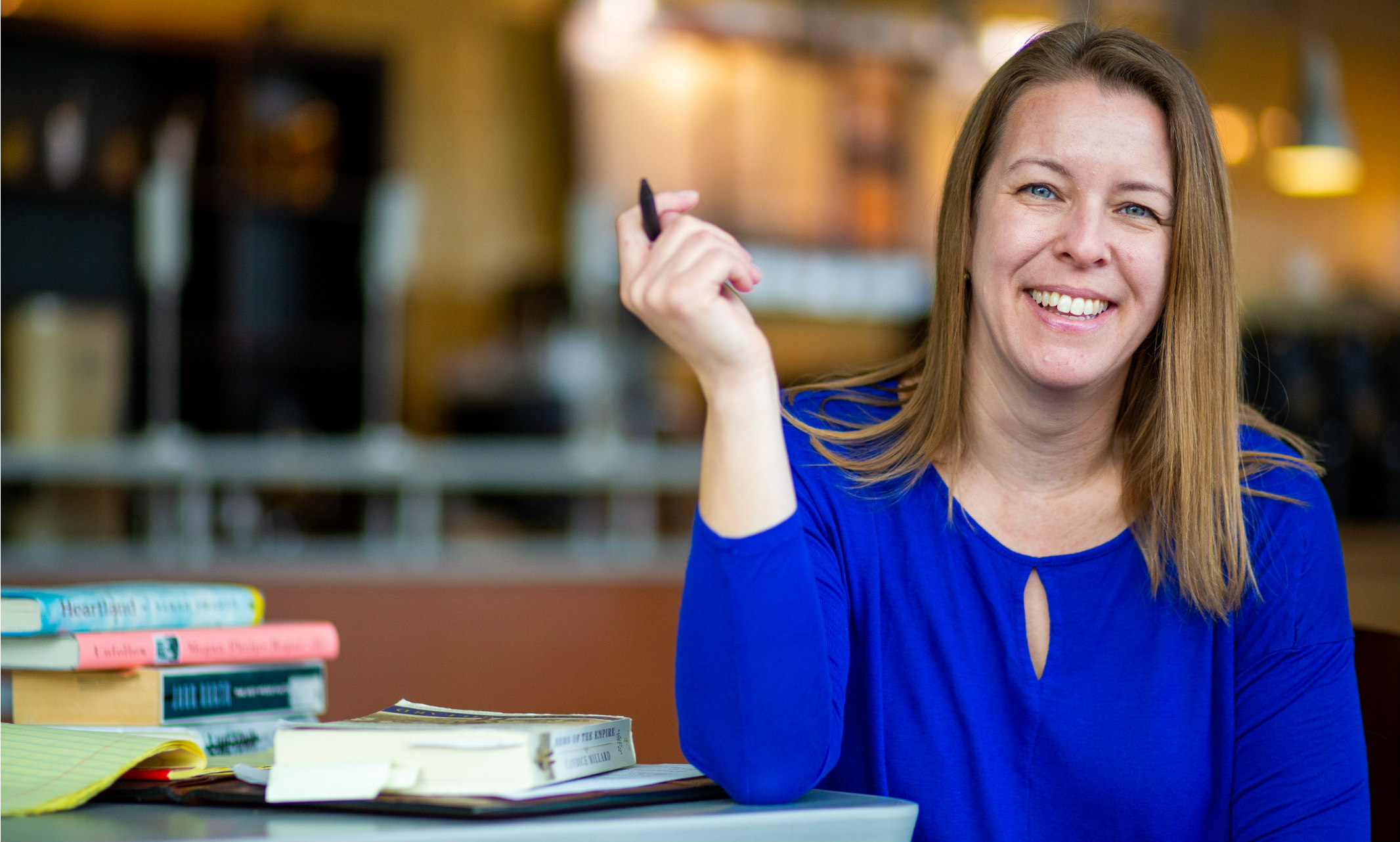
MFA leads to rich and varied freelance career
Our ongoing story starts with people from around the world, converging here at UMKC. Get to know our people and you’ll know what UMKC is all about.
Name: Anne Kniggendorf '14UMKC degree program: MFA in Creative Writing and Media Arts, College of Arts and Sciences
Alumna Anne Kniggendorf attended the MFA Creative Writing program on the G.I. Bill. While she always had a passion for writing, she did not see herself as a journalist. But her freelance career has been full of delightful surprises.
Tell us about your current position.
I’m a freelance writer in Kansas City. I started freelancing for the Kansas City Star in 2014 and I still write for them occasionally. I write for KCUR 89.3, the Kauffman Foundation, and have written for Flatland Magazine a few times. I’ve also written for national magazines and twice for international journals.
How did you choose your field of study?
Writing has been my favorite activity for as long as I can remember. I got to a point when I was in my mid-30s when I felt that I’d hit a wall. I needed more tools to write the way I wanted to be able to.
What brought you to UMKC?
I wanted a writing program near home and UMKC seemed perfect.
What was your favorite thing about UMKC?
I enjoyed all of my classes, professors and assignments. My favorite thing was the chance to reopen the part of my mind that had to work with whatever someone else assigned me--which is what I’ve been doing ever since.
What did you learn about yourself while you were here?
At UMKC, I learned that I was holding myself back from being a writer. I saw that Kansas City is home to a community of writers who are generally willing to help each other, and that all I needed to do was show up and work to be a part of it.
“At UMKC, I learned that I was holding myself back from being a writer.” - Anne Kniggendorf
Who was the most influential faculty or staff member at UMKC?
As far as working hard and diligently, Whitney Terrell encouraged me more than anyone else. He was in charge of The Kansas City Star internship at the time, and he selected me for that program.
How did the internship affect how you viewed the field?
I don’t think I’d be doing what I’m doing now if I hadn’t had the opportunity at The Star. Learning how to work with an editor and write under a deadline was a lot different from writing for leisure. I hadn’t worked with deadlines since my early 20s, and I had to write a book review every week for an entire semester. At the same time I was learning how to work that hard at writing, I was writing my thesis and taking two or three other classes.
What are the challenges of your field?
I told myself until I was about 37 that writing isn’t a job. I think lots of people in the arts feel this way, because it’s culturally accepted that no one in the arts makes much money. The exceptions are so few. There’s no writer who expects to grow up to be the next Stephen King.
What are the benefits?
Every assignment I take is different from the last one, and I meet new people all the time who are really fascinating and eager to talk to me about what they love doing.
What has been one of your favorite freelance assignments?
I just did a story for KCUR with Megan Phelps-Roper (granddaughter of the late Fred Phelps of Westboro Baptist Church) about her new book “Unfollow.” Because I grew up in the area and heard about the Westboro members’ picketing, I was really interested in being able to sit with her ask about her experiences.
I had a great learning opportunity when I did a story about a buffalo ranch. Amy and Michael Billings are interested in conserving bison in an effort to preserve the ecosystem of their land. As it turned out, conservation and slaughter are compatible. If you want to save something, you need to eat it.
How did UMKC help you reach your current position?
In a very real way, the internship at The Star that I got while I was in the program put me on the path I’m on now, but beyond that, the feedback about my work from the professors and other students really highlighted my strengths and weaknesses in ways I hadn’t seen before.
What are your goals for the future?
I want to keep writing for media outlets and organizations. I’m also working on two books. “Secret Kansas City,” which is part of a series about weird, mysterious, unexpected or goofy stories about individual cities, will be published in fall 2020. The publisher found me and asked me to write it.
I’ve been working on my own book for six years. It’s about the relationship between military service and the liberal arts. I think’s there’s a connection, and I don’t think it’s smart to separate them. I have the whole narrative in place, but I just don’t think it’s as succinct as it needs to be.
Would you recommend the MFA program?
Yes, it strengthened my writing in a lot of ways. The process of giving and receiving feedback was helpful. But one of the things that was really significant was getting the opportunity to write across genres. It’s been super valuable and not every MFA program has that. While I wasn’t initially interested in poetry, I enjoyed those classes. And there’s a lot to be learned from poetry courses – like word economy – that have helped in journalism. Playwriting and learning about writing dialogue helped with choosing quotations to support the ideas in my articles. Every day when I’m writing I’m thinking what can I do to draw people into the story? What’s the point that will make someone care enough to keep reading?” Those are things I learned in the MFA program.
“Every day when I’m writing I’m thinking what can I do to draw people into the story? Those are things I learned in the MFA program.” - Anne Kniggendorf
What is one word that best describes you?
Tenacious.
Do you have a motto you live by?
Don’t panic...
What is your advice for a student entering UMKC?
If you study what you really want to know about, whether that’s in a larger sense like your degree program, or on a smaller scale like topics you choose for papers, you’ll learn more and work harder than if you study something you imagine would be good to know, or that someone else wants you to learn about.
Dec 20, 2019
Hours and services limited during break
The University of Missouri-Kansas City will conduct reduced operations, with most offices and departments closed, from Dec. 25 through Jan. 1. Normal business operations will resume on Jan. 2.
December 25 through January 1 has officially been designated as winter break for the University of Missouri System. The campus will be closed with exception of a few offices. Here are a few more details about specific services.
Emergency
In case of emergency, contact UMKC police at 816-235-1515.
UMKC Dental Clinic
UMKC School of Dentistry Clinic reopens at 8 a.m. Jan. 2.
Year-End Donations
You are welcome to make on-line donations via credit card here.
The Office of Gift Processing will only be available Monday, Dec. 30, and Tuesday, Dec. 31, from 8 a.m. to noon to accept year-end gifts. Inquiries can be directed to (816) 235-1566 or umkcgiftprocessing@umkc.edu. The UMKC Foundation will also be taking calls at (816) 235-5778.
Any checks must be in an envelope postmarked prior to Dec. 31, 2019 in order to be credited in the 2019 tax year.
Please address donations to:
UMKC Office of Gift Processing112 Administrative Center5115 Oak StreetKansas City, MO 64112
For any stock gifts or wire transfers, please contact Katherine Walter at walterka@umkcfoundation.org. Stock gifts must be received into the UMKC Foundation’s brokerage account by Dec. 31, 2019 to be counted in the 2019 tax year. Mutual funds should be initiated no later than Dec. 20 to be transferred on time.
Thank you for supporting UMKC and enjoy the winter break!
Dec 20, 2019
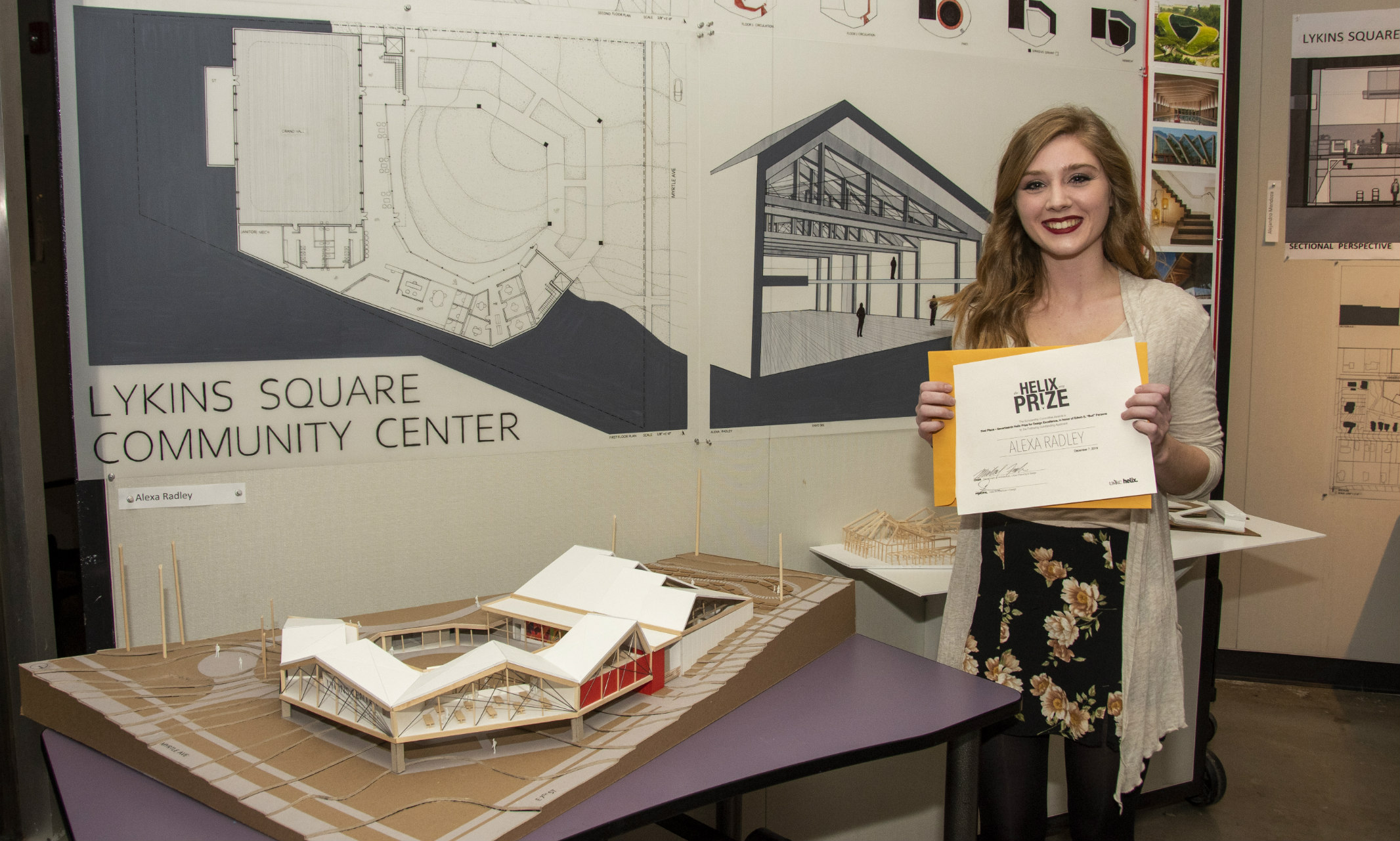
Winner Alexa Radley thrives in challenging program
Alexa Radley carefully lifts the roof of the model of her prize-winning design in the unusually quiet studio space of Katz Hall. She points to colorful, geometric art that spans a large section of the wall.
"I suggested having a local artist create a mural here,” she says of her design for a community center in the Lykins neighborhood in Northeast Kansas City. “I think that would really help make it their own.”
Museum board, basswood, heavy-gauge wire and tiny plastic people are the tools that the students of the Architecture, Urban Planning and Development program use to translate the needs of their clients into physical solutions at the annual Helix Prize competition for the second-year students.
For this year’s class, these models — diminutive in scale — represent the strengthening of a neighborhood in the development of a new Lykins Square Community Center.
“While this is not a real project, we did meet with representatives of the neighborhood association, and they gave us feedback on what the neighborhood would want,” says John Eck, associate teaching professor. “The neighborhood owns the site and sees it as a possible ‘real’ location.”
Eck says there were a couple of interesting challenges with this project, especially as the residents included gym space as part of their wish list.
“One of the biggest challenges was the insertion of a fairly bulky building into a very modestly-scaled residential neighborhood. No one wants a giant new building looming over their home, but at the same time the design needed to accommodate the program and address the large scale of the park.”
In addition, the slope of the site is significant.
“There’s a drop of about twenty feet from the back of the site to the front sidewalk,” Eck says. “Finding a way to “step” the program down, both indoors and outdoors, while maintaining accessibility for all is no small feat.“
Radley came to the AUPD program after a year in community college. With equal strengths in art, design and math, she thought architecture might be a good fit.
“I interned with A3G in Liberty, Missouri,” she says. “It’s a small firm of women architects. It was a great way to see if I would enjoy the field.”
Her experience assured her that architecture was her path. She was accepted into the program and will continue to Kansas State University as part of a partnership between the two universities.
"You get really close to the people in the program." -Alexa Radley
For the Helix Prize, students had seven weeks to outline their objectives and approaches, complete structural drawings and build their models.
“It’s a big project,” Radley says. “There are a lot of small components. Dealing with the topography of the sloped site was a real challenge.”
When she began her design, she envisioned the roof as a ramp, but as the design evolved, she incorporated angular silhouettes to mimic the roofs of the neighborhood.
“That’s when I really started to love my project,” she says.
Radley’s design is nestled into the landscape, creating the feeling that the neighborhood both surrounds and protects it. Her building has more movement than some of her classmates, whose designs relied largely on right angles. She included orange panels on the exterior as a warm and inviting accent. But one of her favorite components was the mural.
“The community representatives really love it,” she says.
This year’s jurors included Gail Lozoff, neighborhood representative; Mike Frisch, department chair, AUPD; Katie Kingery-Page, landscape architect and Kansas State University representative; and Anthony Luca. And despite what might look like an intimidating and very personal process to have professionals critique their student projects, Radley did not find the process daunting.
“Most of the jurors have been through the process, so they understand what it feels like. Their feedback is very constructive and they focus on strengths as well.”
Radley and the runner-up, Anna Greene, will both receive scholarships to Kansas State next year. Radley is looking forward to their transition.
"You get really close to the people in the program,” she says. “We’re all in the same classes and studio together, which is more intimate. Most of us are going on to K-State next year.”
While she loves the field and the program, she cautions that it’s not for everyone.
“The program itself is challenging and not everyone who has an interest decides to tough it out,” Radley says, as she carefully replaces the roof of her model. “If you’re not 100% committed, you’re not going to make it. There were 36 first-years in my class. We’re down to eight.”
Eck is not surprised that Radley is one of the remaining eight.
“Alexa’s design process and work ethic is actually what was most striking to me. She has a remarkable ability to put her head down, focus, move forward, and get it done. The end product is important, of course, but learning how to get there is even more important. Design studios are about teaching design process; the project is just a vehicle to do that.”
Dec 18, 2019
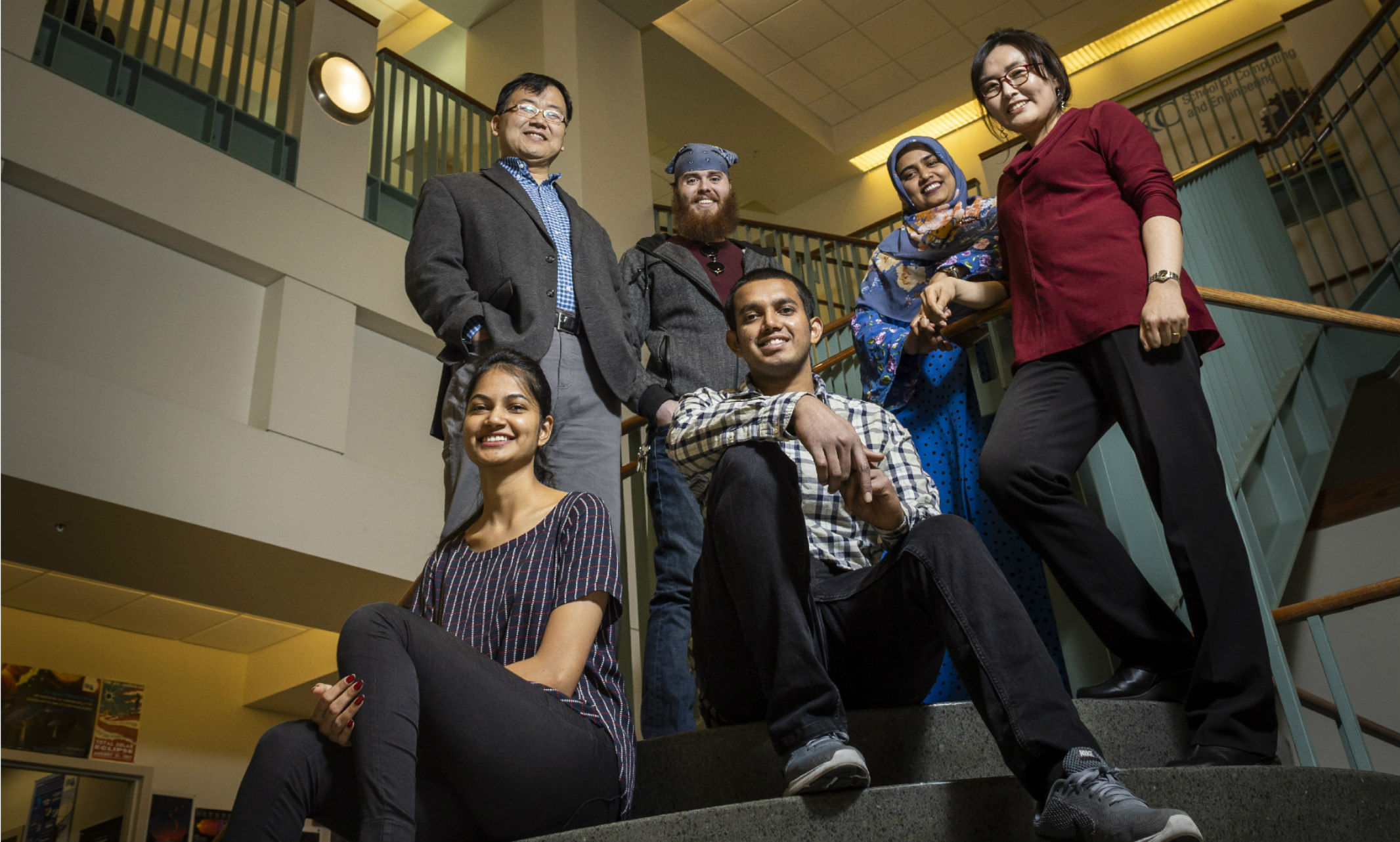
NSF funds $1.4 million project meant to improve eligibility for jobs
There are currently more than 1 million incarcerated women in the United States. According to Baek-Young Choi, associate professor of computer science and electrical engineering, women are the fastest growing segment of the prison population, increasing nearly 834% nationwide within the last 40 years. Yet prison education systems are still primarily designed with men in mind.
Choi, alongside co-principal investigator Sejung Song, Ph.D. and a group of graduate-level students, is partnering with a team of faculty from the University of Kansas on a $1.4 million National Science Foundation-funded project – led by Hyunjin Seo, Ph.D., associate professor in the KU School of Journalism – to help women exiting prison advance their technology skills in hopes of improving their eligibility for better job opportunities and their ability to support their children’s education.
“Many women going into prison were underprivileged to begin with, and then in prison there’s a lack of access to the internet,” Choi said. “This leaves women vulnerable because when they are released, it’ll be difficult for them to find good jobs and have positive influences on their children as well.”
The NSF’s advancing informal STEM learning (AISL) program that supports this project seeks to engage the public of all ages in learning STEM in informal environments, and may serve as a template for workforce preparation efforts. The scope of the program the two institutions are designing consists of curriculum planning, developing a three-course learning management system (which Baek-Young and team are building), engaging with potential program participants and potential community partners as well as leveraging regional resources for additional support.
The UMKC STEM team will co-lead education sessions and curriculum development alongside KU, build the online learning system and participate in experiential research to understand the challenges of women-in-transition with respect to acquiring technology skills and analyzing effects of different education models – face-to-face (in public libraries), hybrid (a combination of on-site and online) and online only.
“We really want this program to be informed by research, so we do a lot of research to learn what the participants’ needs and interests are, and incorporate that into the STEM curriculum,” Choi said. “We also want to know what the most effective way of teaching STEM is for this population, so we’re testing multiple modes of education.”
Course 1 - Introduction to computing
The introductory course will teach computational thinking, which is not only helpful for understanding technology but also for everyday problem solving skills. Choi said the team hopes that this program will help improve women’s self-esteem and confidence as they face new challenges and how they feel about themselves as their attachment and sense of belonging evolves in this group, which will help their employment in the long run.
Course 2 – Web basics
The course will lead women in learning basic website elements, HTML and development environments.
Course 3 – Web advanced
The course will teach women website building for business, which would include form building and use of FinTech tools. This course is a combination of hybrid and online-only courses.
The duration of each course depends on the needs of the women, but the project team is anticipating 12 to 16 weeks per course while the full project, including research and development, will last about three years. The team kicked off the project in September 2019, and will use this first quarter for planning and preparation, followed by leading educational sessions and, finally, analyzing results by August 2022. They’re also hoping to garner industry and other support to enrich and sustain the program. Choi said they’ll have potential users try out the learning management system before it officially launches.
Learn more about this project
Dec 17, 2019
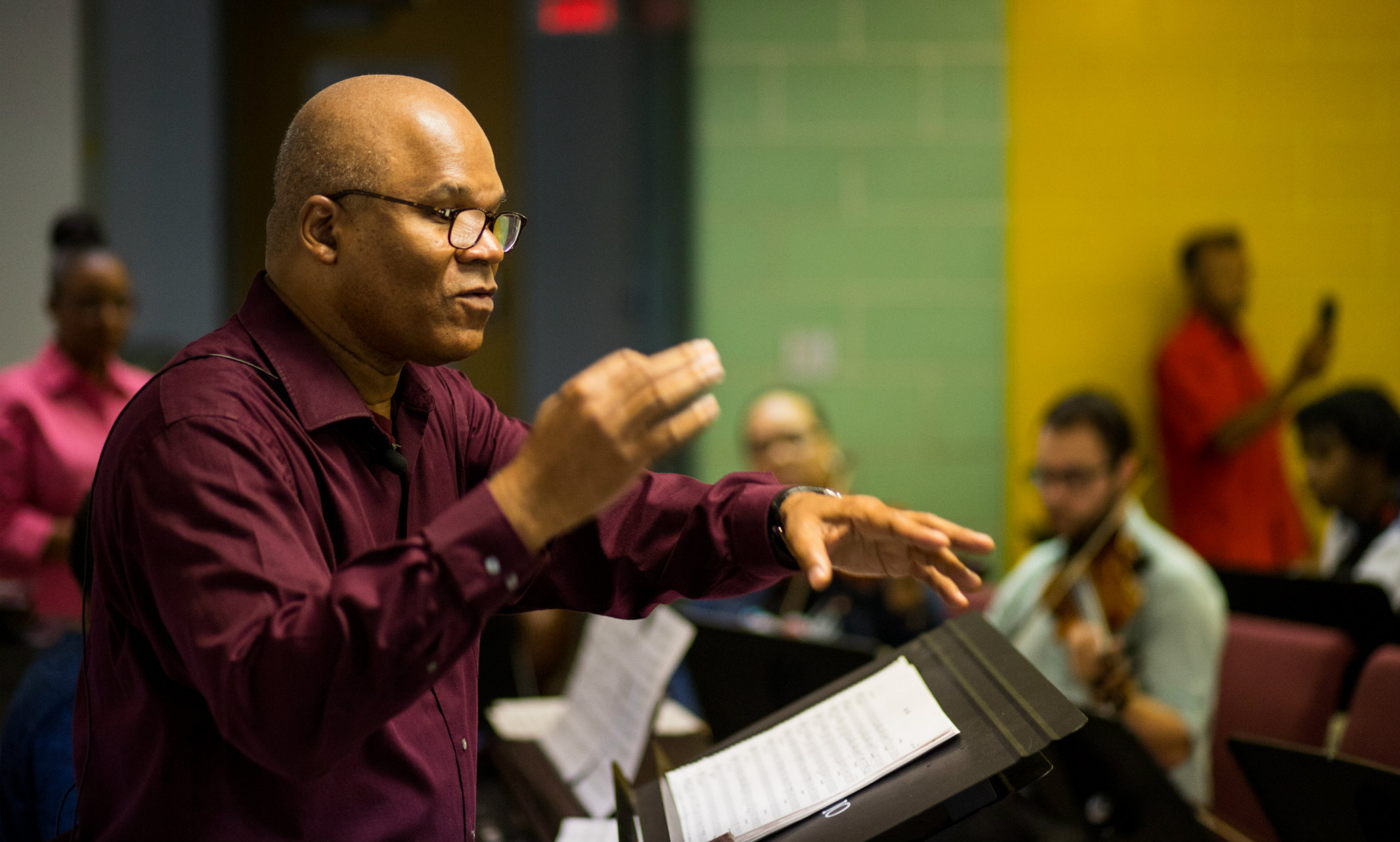
Darryl Chamberlain has helped hundreds of students learn to play instruments
At 10 years old, Darryl Chamberlain (B.A. ’15, ’16) walked to school composing music in his head. Despite having no formal training and no instruments in his home, the music still came to him at an early age. Now, more than 40 years later, Chamberlain is actually composing some of those melodies for the Kansas City children in his A-Flat Youth Orchestra.
Since its creation, Chamberlain has helped more than 200 students learn to play instruments, many of whom wouldn’t have had access to music lessons otherwise.
Chamberlain’s journey from 10-year-old sidewalk composer to volunteer orchestra director is an unlikely one, made possible through remarkable hard work and tenacity.
A winding road to music (and back)
At 17, Chamberlain begin attending a church full of energetic young people like himself. The church had a youth choir Chamberlain longed to join, but he didn’t know how to sing or play an instrument.
Instead, he hung around the choir practices and one day noticed a guitar leaning in a corner. With a few minutes’ instruction from the bass guitarist and the devoted study of a Mel Bay guitar book, Chamberlain taught himself how to play.
Then, another stroke of luck: The church needed a place to store their piano after a storm, and Chamberlain’s house was nearby. A few months later, and Chamberlain had taught himself piano, too.
“There are among us Beethovens and Bachs and Mozarts and Schuberts and Schumanns and so many more. They are among us, and sometimes they get a chance to surface, because they came from a community that supported music and allowed them to grow.” – Chamberlain
Over the next few decades, Chamberlain continued to learn and teach music while he, as he puts it, “created a life.” He got married, worked as an auto mechanic, earned an associate’s degree from the Electronics Institute and got a job at Texas Instruments.
Community need becomes personal mission
In 2004, Chamberlain moved back to Kansas City from Texas and found himself at the American Royal Parade. When he had left Kansas City back in the 1980s, the parade had been full of Kansas City high school bands. By the early 2000s, he was concerned to see none performing. He started talking to educators in the area and discovered the need for music education was great, but funding wasn’t always available.
In 2005, Chamberlain decided to create a youth orchestra for kids who might not have access to music otherwise. He began buying instruments for his project, which has now become as the A-Flat Youth Orchestra.
He purchased most of the instruments out of his own pocket, starting with just the money he earned playing piano at a local church. He was a familiar face at local pawn shops and spent hours searching listings on eBay and newspaper classifieds, looking for any instrument that looked playable (or at least fixable).
Today, the orchestra owns enough instruments to outfit two-and-a-half concert bands. Bassoons, violins, cellos, guitars, flutes, drums and more, are all owned by A-Flat Music Studio, Inc. and loaned or rented to students who want to play music. Recently, a woman saw a Kansas City Star story about the orchestra and donated a harp.
On Saturdays, the instruments show up in places like the W.E.B. DuBois Learning Center, in the hands of dozens of young people, many of whom wouldn’t have had access to an instrument elsewhere. More than 30 students play in the orchestra, ranging in age from seven to 19. Chamberlain has recruited five other teachers to help instruct various sections.
His motto? “There will not be a child in this city who wants to study music but can’t because money is an issue.”
Chamberlain’s love for teaching is apparent. It’s part of what led him to UMKC in 2009, eventually earning two bachelor’s degrees: one in secondary education–social sciences and another in history. His studies at UMKC were a natural fit, he says, giving him access to formal education in the areas of art, history and teaching that he’s informally enjoyed his entire life.
Chamberlain with members of the A-Flat Youth Orchestra at a performance at the Kauffman Center for the Performing Arts.
The power of giving kids a chance
When asked about the particularly memorable moments from his 14 years directing the orchestra, a few come to mind, Chamberlain says: The day a student who had been struggling blurted out, “I’m doing it! I’m actually reading!” Receiving an invitation to a graduation party for one of his students who had earned her M.D. Seeing the students play at the Kauffman Center in bow ties.
Once, a young man asked him why he “dresses up” for rehearsal. Chamberlain explained to him, “I dress up for you, because it’s the kind of respect I want to extend to you. I want you to know you’re worth it.” The next week, that same student came to class in slacks and shiny dress shoes, looking, as Chamberlain put it, “like a million bucks.”
The important thing, Chamberlain says, is giving kids a chance. Because if we can teach music, we can also teach discipline, character, tenacity, all those little things that make a person — and a community — great. In the process, you might help a child discover a part of themselves they didn’t know existed.
“There are among us Beethovens and Bachs and Mozarts and Schuberts and Schumanns and so many more,” Chamberlain says. "They are among us, and sometimes they get a chance to surface, because they came from a community that supported music and allowed them to grow.”
In 2023, Chamberlain received the Hero Award from Atlas Holdings for the extraordinary impact he is making in the Kansas City community. The award came with $25,000, which Chamberlain put into a savings account as part of his studio’s building fund effort. A-flat studio is outgrowing the space they currently have and are working towards getting a more adequate space.
This story originally appeared in Perspectives magazine, vol. 29. It was updated March 2024 to reflect Chamberlain’s 2023 award.
Dec 17, 2019
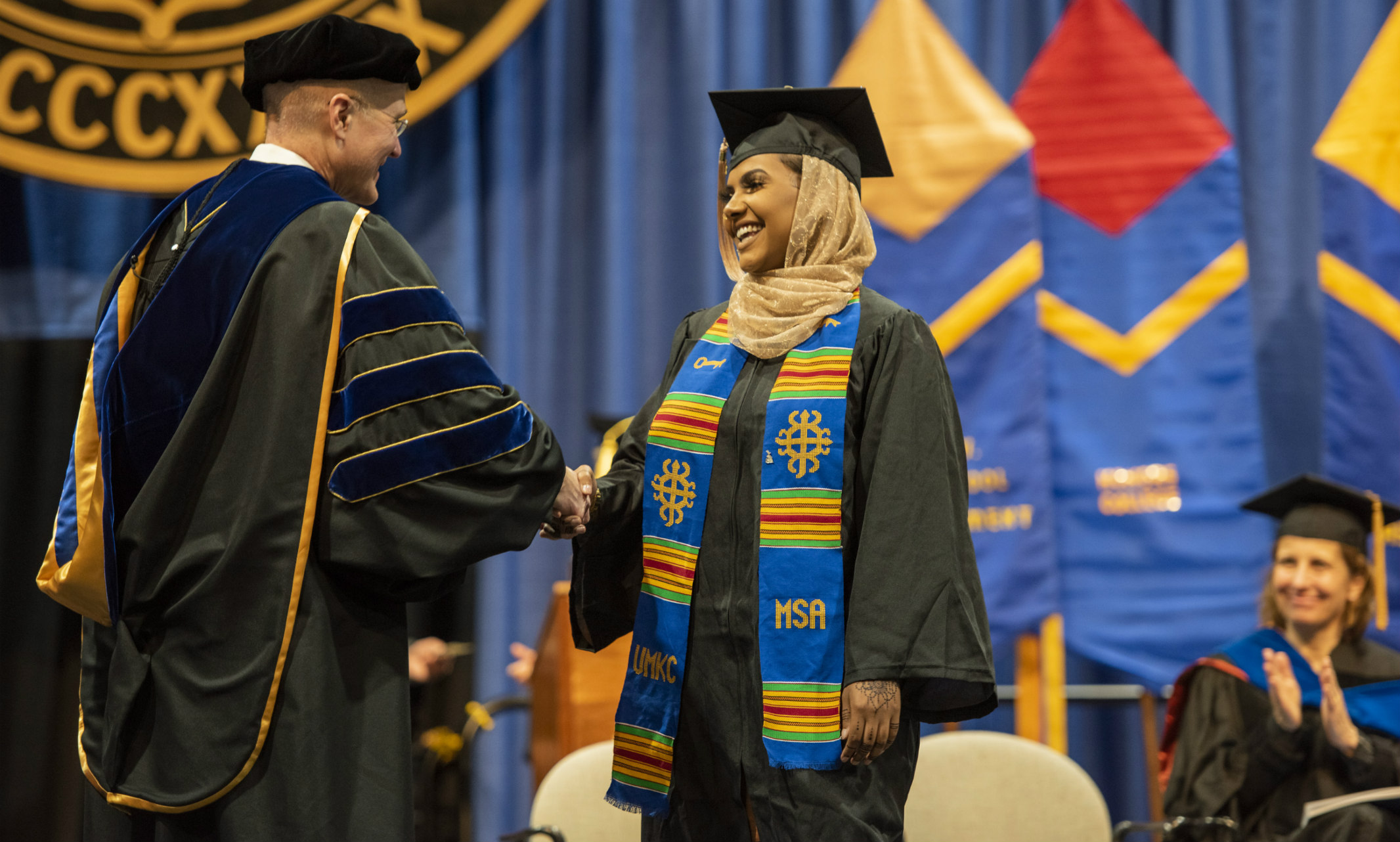
Class of 2019 graduates honored
Nearly 1,000 students received their degrees during University of Missouri-Kansas City mid-year Commencement exercises on Saturday, Dec. 14.
Festivities began with the College of Arts and Sciences Graduation with Distinction Luncheon where alumna Liz Cook (M.F.A. ’14) offered advice for the 70 students graduating with honors.
“You may not have all the answers right now, but you have the skills to find them,” said Cook, who works at the Federal Reserve Bank of Kansas City and as a writer for The Pitch.
Liz Cook, pictured left, with Chancellor Agrawal and fellow College of Arts and Sciences alumna, Anne Kniggendorf, pictured right.
Among the students graduating with recognition were the Dean of Students 2019 Honor Recipients. Faculty and staff nominate students for their academic excellence, leadership and service. Ten Roos were honored this fall.
Shahodat Azimova, School of Biological and Chemical Sciences
Shelby Chesbro, School of Medicine
Jordann Dhuse, School of Medicine
Lindsey Gard, School of Biological and Chemical Sciences
Fiona Isiavwe, Bloch School of Management
Leah Israel, School of Biological and Chemical Sciences
Anna Lillig, School of Nursing and Health Studies
Zach Randall, School of Medicine
Marcella Riley, School of Medicine
Landon Rohowetz, School of Medicine
Student crowd surfs in celebration outside Swinney Center after graduation.
On Saturday, Swinney Center was packed with students and their families celebrating the milestone of graduation. Chancellor Agrawal congratulated students saying, “You are ready to take on the world.”
During the Henry W. Bloch School of Management ceremony, alumnus Mike Plunkett (B.S. ’91) addressed students. Plunkett is the co-founder and COO of PayIt, an award-winning digital government platform that simplifies doing business with state, local and federal governments. As students move forward in life, he encouraged them to:
Dream: Get in the habit of visualizing attainable goals on a daily basis.
Work: The absolutely necessary step to making your dreams a reality.
Hope: Have the determination to be positive in life, even when things aren’t going well.
Give: Enrich your life by giving to others.
Alumnus Mike Plunkett offers advice to the class of 2019.
Student speaker Ian Njoroge encouraged his fellow graduates saying, “Believe that you will find opportunities. Look for opportunities and you’ll see that opportunities are looking for you.”
Dec 17, 2019
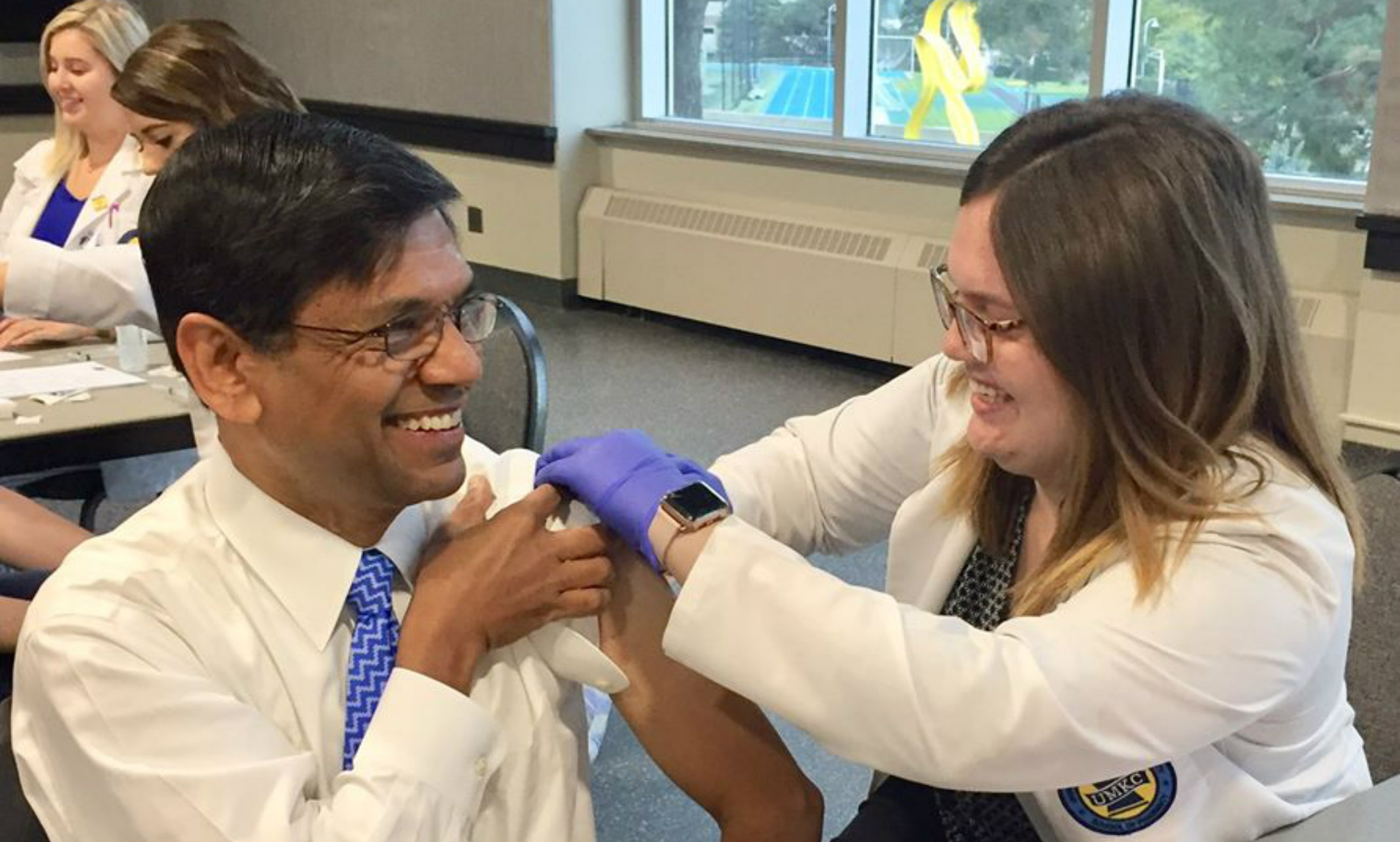
School held 59 flu-shot events throughout the state
‘Tis the season for colds and flu. And this fall, UMKC School of Pharmacy students were again busy battling the bug.
Third-year pharmacy students participate each year in a pharmacy-practice experience that includes learning to administer immunizations. This year, that involved giving 2,676 flu shots to patients at 59 immunization events throughout Missouri.
This is the eighth year the School of Pharmacy has been part of the flu shot initiative. It started in 2011 as a collaborative effort with the University of Missouri System Healthy for Life wellness program to administer the shots to faculty and staff.
“We have enjoyed an excellent collaboration with Healthy for Life,” said Val Ruehter, Pharm.D., BCPP, director of experiential learning. “In Kansas City, we also collaborate with Children’s Mercy, where we participated in flu shot clinics for its Family and Friends program.”
The collaborations expanded this year in Kansas City to include Hy-Vee Pharmacies, where students assisted with in-store clinics. In addition, immunization events were held at the John Knox Village retirement community.
Students at the Springfield campus collaborated with Alps Pharmacies and its locations in local businesses, and senior assisted living and nursing care centers; and Walgreens and its locations in local businesses, schools, veterans organizations and homeless charities. Clinics were also held at both Lawrence Drug and Sunshine Health Mart for patients at these pharmacies.
Students from all three UMKC School of Pharmacy campuses participated. In Kansas City, students participated in 14 immunization events and administered 1,453 flu shots. Springfield campus students participated in 44 events and gave 930 shots. And students from the Columbia campus administered 293 immunizations.
“These collaborations engage students in a variety of activities and allow us to demonstrate the knowledge, skills and impact that pharmacists can have on community health and wellness,” Ruehter said. “Our students were well-prepared, engaged and represented themselves as knowledgeable health care professionals.”
All vaccines administered by students are given under required protocol with oversight by a physician. Certified immunizer faculty members take the lead in managing the protocol and supervising the student training and immunization events.
The regional American Pharmacists Association-Academy of Student Pharmacists organization honored the UMKC School of Pharmacy earlier this year with an Operation Immunization chapter award. It recognized the extraordinary contributions pharmacists provide to improving vaccination rates in their communities. The UMKC chapter also received the national recognition in 2012.
Dec 17, 2019
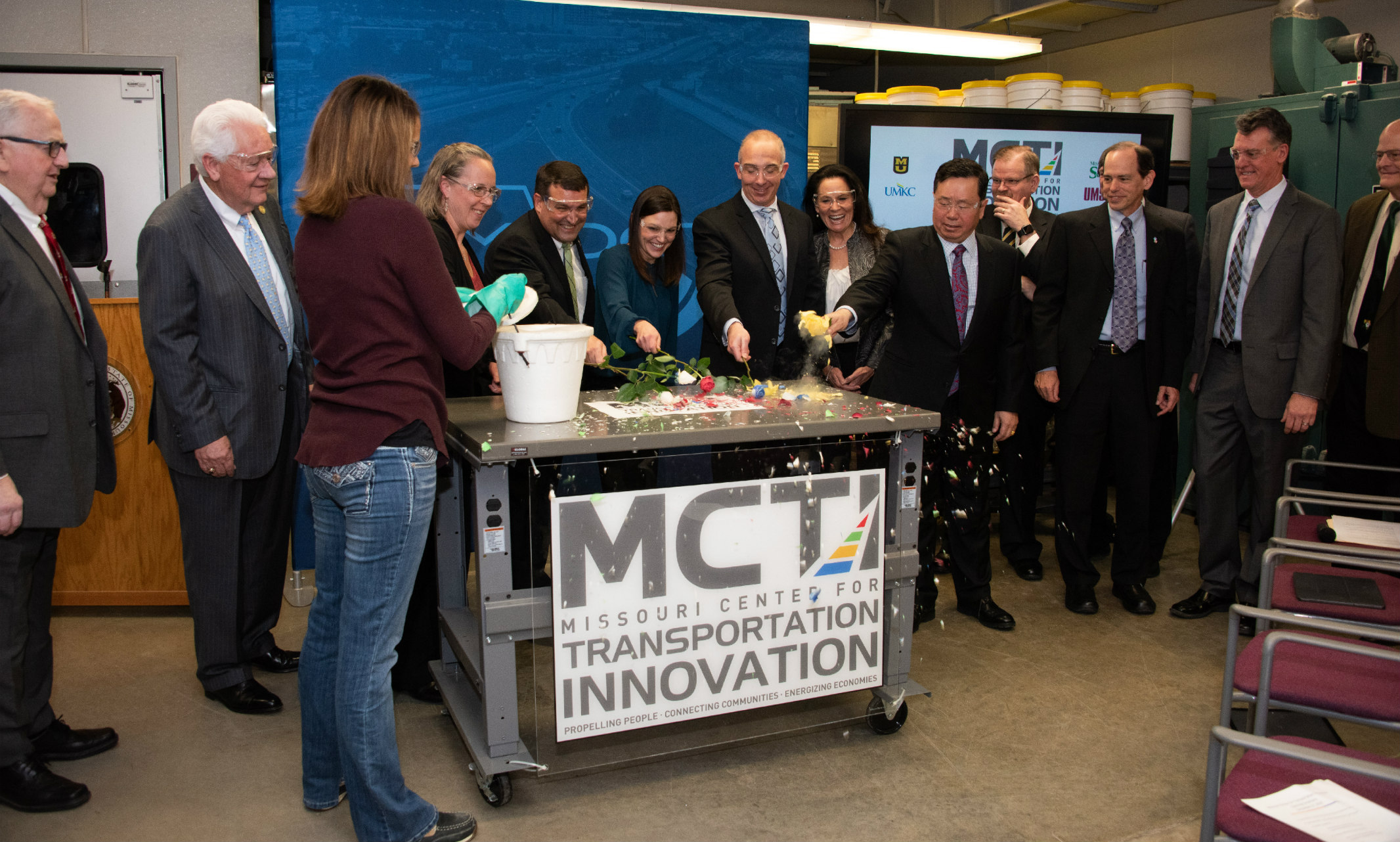
Professor John Kevern will help lead a UM System effort to bring cutting-edge technology and research to bear on the state’s transportation issues
Missouri’s roads and bridges need an upgrade, but state funding is tight. A new entity, the Missouri Center for Transportation Innovation, will combine academic research with industry partners and other stakeholders to create novel transportation solutions.
Innovative solutions are needed to address crumbling roads and bridges across Missouri. A new collaborative center within the University of Missouri System hopes to accelerate the future of transportation-related research by connecting academic minds and industry leaders.
The Missouri Center for Transportation Innovation (MCTI) will share academic research from each of the four UM System universities — UMKC, MU, UMSL and S&T— with the Missouri Department of Transportation (MoDOT) to maximize the impact of state-funded transportation research, and to attract large-scale, federal grants to pursue research on the cutting edge of transportation. Built around a common theme of innovation, MCTI research interests will include connected and autonomous vehicles; transportation safety; advanced materials for pavements and bridges; recycling and sustainability; resilience; big data in transportation; congestion relief; and transportation policy and economics.
Bill Buttlar, the Glen Barton Chair in Flexible Pavement Systems at the MU College of Engineering, will serve as the center’s director for its first three years, joined by John J. Myers, professor of civil engineering and associate dean of the College of Engineering and Computing at S&T as the deputy director. John Kevern, professor and chair of civil and mechanical engineering at UMKC; and Jill Bernard Bracy, assistant teaching professor in the College of Business Administration and assistant director of program development for the Center for Transportation Studies at UMSL; will also help lead MCTI by serving on the center’s operations cabinet.
“Combining the strengths of the UM System universities with MoDOT through the MCTI is a clear expression of our mission to foster research that benefits the people of Missouri, the nation, and the world,” UM System President Mun Choi said. “Building effective connections between our universities and the state will accelerate research breakthroughs and support economic development and improve transportation safety.”
The base funding for MCTI will be provided through the MoDOT state planning and research funding.
Myers notes that new transportation-related laboratories at both Missouri S&T and UMKC will also help facilitate the expansion of transportation-related research capabilities at all four UM System universities.
The $32 million Robert W. Plaster Free Enterprise and Research Center at UMKC, scheduled for a fall 2020 opening, will include leading-edge high-tech research and development capabilities.
And next spring, the $6.5 million Clayco Advanced Construction and Materials Laboratory (ACML), currently under construction at Missouri S&T, will combine civil infrastructure testing and analysis techniques with the development of new infrastructure materials and construction methods in the ACML.
Dec 17, 2019
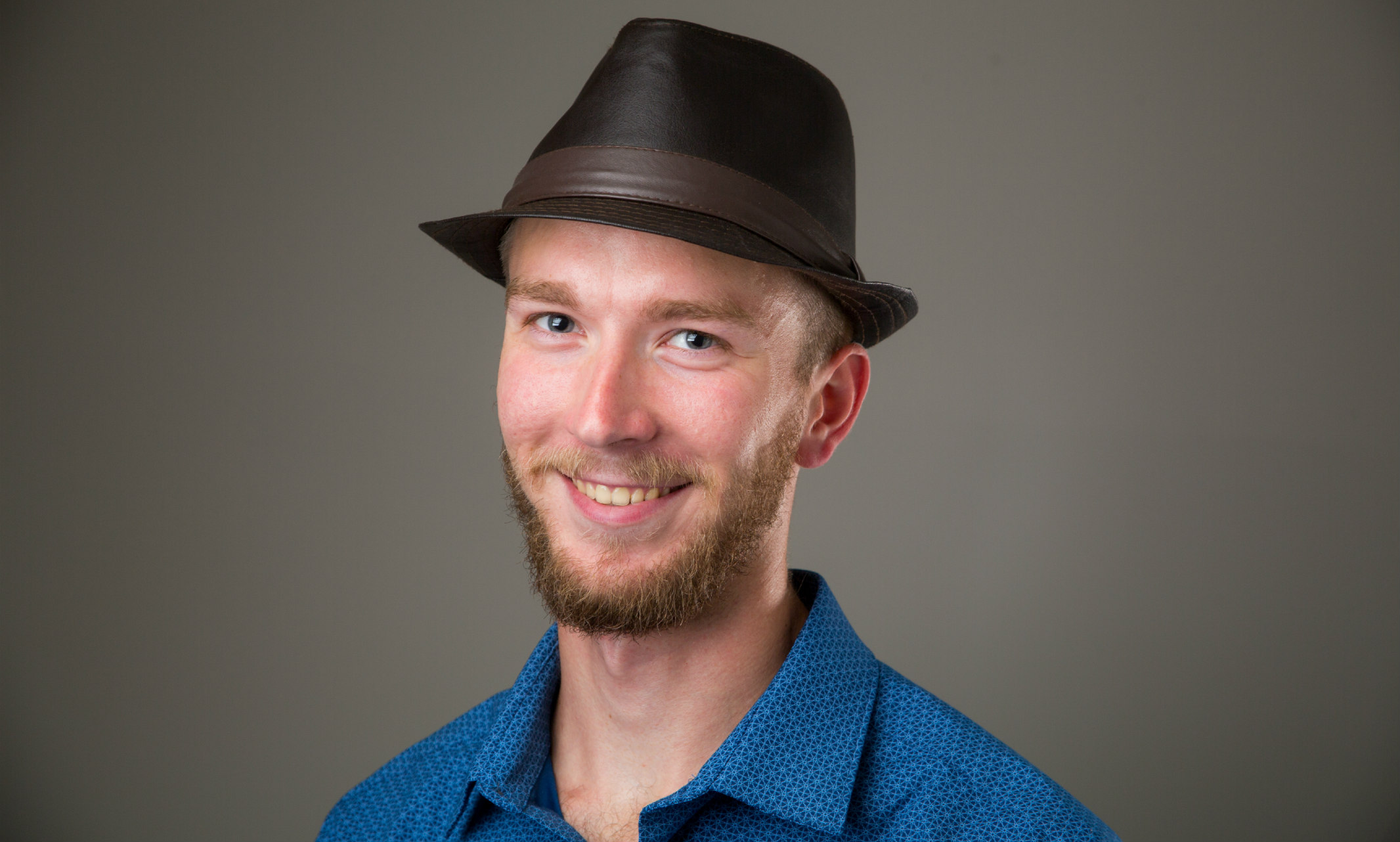
Brian Dieckman (1996-2019)
Brian Dieckman, a senior in the University of Missouri-Kansas City School of Computing and Engineering, died after a motorcycle accident in Lee’s Summit.
Dieckman was a mechanical engineering major and research assistant performing work for an Office of Naval Research project.
“Brian was a diligent, hard-working and careful student, balancing a full courseload with aspirations of studying materials science in his graduate career,” said Tony Caruso, professor and assistant vice chancellor for research at UMKC.
“He was kind and thoughtful, and his sense of humor helped him quickly make friends in his cohort,” said Stephan Young, a Ph.D. student who was Dieckman’s mentor. “Brian had an incredibly bright future, and will be greatly missed by those fortunate enough to have known him.”
Here is information about his services.
Dec 16, 2019
Area Transportation Authority cites UMKC study in story by US News & World Report
Removing fares is expected to save some families thousands of dollars per year, money that gets cycled back into the local economy; ATA's Robbie Makinen points to an impact study from the University of Missouri-Kansas City that found the measure could boost regional GDP by as much as $18 million. Read the story.
Dec 15, 2019
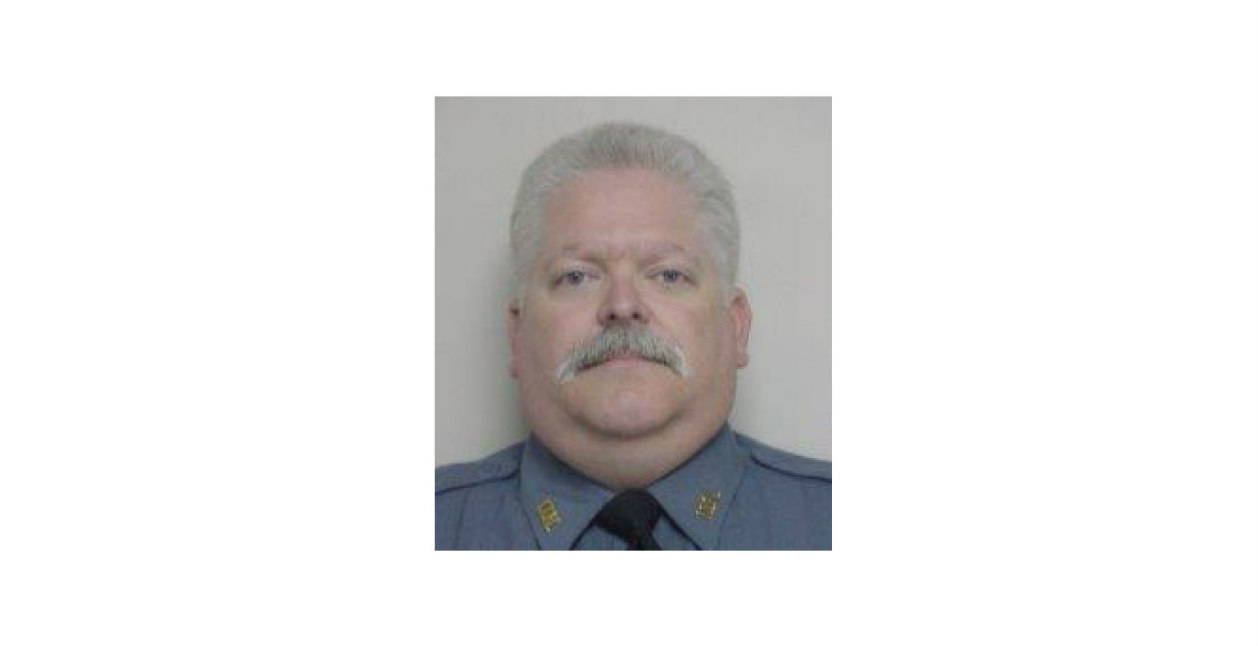
Timothy Layman (1957-2019)
Sgt. Timothy Joe Layman of the UMKC Police Department died unexpectedly due to health complications.
Layman (1957-2019) had been an officer with the UMKC Police Department for 40 years, and was the longest serving police officer in UMKC PD's history. Layman graduated from UMKC with a Bachelor of Science degree in 1985; and a Bachelor of Science degree in computer science and math in 1985. Layman graduated from the Independence Police Academy in May 1979, and began his decades-long career as a UMKC police officer. He was employed as a UMKC sergeant at the time of his death.
“Sgt. Layman had dedicated his life to proudly serving UMKC and the community,” said UMKC Police Chief Michael Bongartz. “Tim was the heart and soul of the UMKC PD, and our memories of him will never be forgotten.”
Layman’s professional memberships included International Association of Campus Law Enforcement Administrators (IACLEA), Federal Bureau of Investigation - Law Enforcement Executive Development Association (FBI - LEEDA) and National Association of Clery Compliance Officers and Professionals (NACCOP).
Layman, of Blue Springs, is survived by his wife of 40 years, Rebecca Brooks Layman; son, T.J. Layman, Jr.; and his parents.
Here is information about his services.
Dec 13, 2019
Greg Vonnahme, UMKC political science associate professor, talks with KCTV5
The House Judiciary Committee passed two articles of impeachment this morning, but what happens next? KCTV5 talked to Greg Vonnahme of UMKC about the impeachment process and set out to see what people in the metro had to say about it. View the report.
Dec 13, 2019
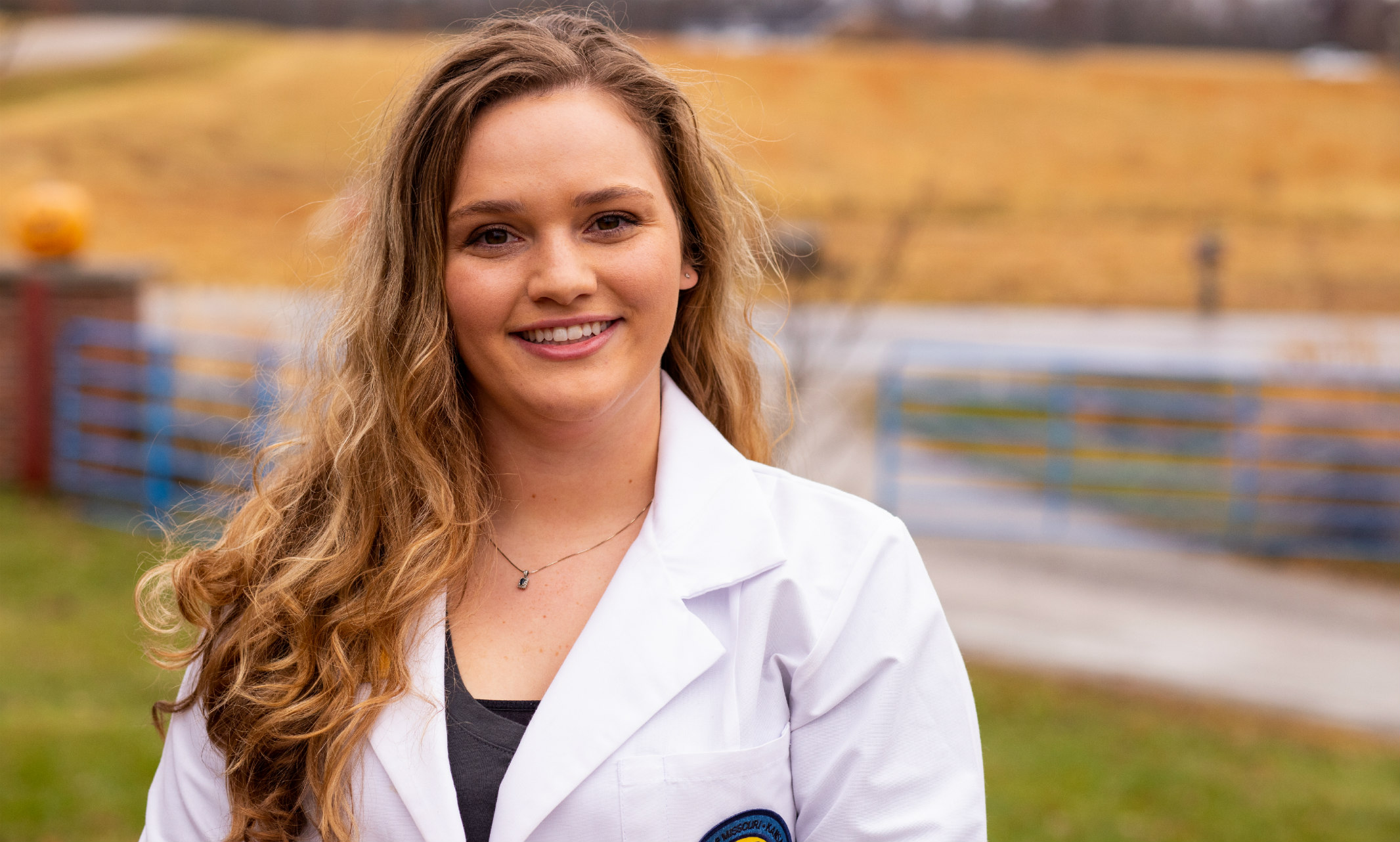
Third-year pharmacy student Raeann Kilgore discusses her passion for community pharmacy and why she chose to attend the UMKC School of Pharmacy at ...
Growing up in a small Missouri town riding horses on a cattle ranch is a part of Raeann Kilgore’s core framework. She loves rural life. She enjoys the tight-knit community she grew up in and interacting with people. So when it was time for the University of Missouri graduate to choose where she would attend pharmacy school, she chose the UMKC School of Pharmacy satellite location in Columbia.
“I chose the Columbia campus based on its location from home as well as the class size,” Kilgore said.
The petite, long-haired blonde from Green City, Missouri, isn’t interested in pursuing a career in big pharma — she would much rather have a large impact on improving access to health care in rural areas where she can connect with patients whose lives are similar to that of her family’s.
“I recognize the need for health care in these areas and have always had a strong desire to return to my community to provide health care in some form,” Kilgore said.
“While going to office hours in person isn’t really an option, my professors are more than willing to make arrangements to schedule a Zoom meeting or phone call, and they’re generally great at responding to email.”
Though she’s always been interested in medicine, it was a job shadowing experience she had with an independent pharmacy in high school that got the small-town woman interested in pharmacy. She fell in love with the personalized service and relationships the pharmacy had with its patients, employees and other care providers. That’s where she sees herself in the future.
“It helps to have relationships with patients because you have more personal connections with them and, as a farm girl myself, I can relate to them. I know their lifestyle and what kinds of things they’re doing. It’s a more holistic health care experience for both parties.”
Kilgore has already taken the initiative to immerse herself in diverse learning experiences to help her prepare for her pharmaceutical career. She spends her spare time volunteering at Cedar Creek Therapeutic Riding Center, a local horseback riding stable for people with disabilities in mid-Missouri.
“Cedar Creek gives me a sense of home away from home,” Kilgore said with a slight twang in her accent. “It also allows me to deal with diverse populations and broaden my perspective of health care. It teaches me how to communicate and bond with patients over a common passion.”
“It helps to have relationships with patients because you have more personal connections with them and, as a farm girl myself, I can relate to them.”
Given her expert riding experience – she’s been riding since she was three years old – Kilgore serves as a horse leader, guiding and directing the horse while patients ride. For people with disabilities, horse riding simulates a walking experience with the way their hips move as the horse is led around the stable.
“I once worked with a patient who had cerebral palsy. He had a particular horse he rode and, over time, learned to give commands. I nearly cried the first time I saw him ride by himself without me as a guide,” Kilgore recalled. According to Cedar Creek founder Karen Grindler, that patient eventually went on to ride at the American Royal.
In addition to her volunteer work, Kilgore is involved in numerous organizations through the School of Pharmacy and works as a pharmacy intern at University Hospital.
“My involvement in the American Pharmacy Association and other organizations gives me a chance to provide service to the community like blood pressure and blood glucose screenings, immunizations, drug take-back and other services that give me more career experience.”
“Being surrounded by like-minded individuals who are all passionate about the pharmacy profession has really given me inspiration to put 100% into everything I do at school and the organizations I’m involved with.”
Being based on a satellite campus, professors are nine times out of 10 not physically in the classroom. The satellite campus is a hallway of classrooms located in the lower level of the Mizzou Academic Support Center. When Kilgore goes to class, she’s sitting among her peers in front of a large projector screen where they can see the professor – usually based in Kansas City – teaching. Every chair has a microphone and a button, so if Kilgore needs to ask a question, she can press the button and wait to be called on. When she has the floor, she can speak directly into the microphone.
“Whether having the professor physically here or not is a challenge can be debatable,” she weighed. “While going to office hours in person isn’t really an option, my professors are more than willing to make arrangements to schedule a Zoom meeting or phone call, and they’re generally great at responding to email.”
That’s not to say satellite students don’t have professors to turn to. They have on-site faculty and advisors and the dean for the School of Pharmacy works closely with students.
“I love our class. We’re like a small family,” Kilgore exclaimed in her cheerful, high-pitched voice. “Being surrounded by like-minded individuals who are all passionate about the pharmacy profession has really given me the inspiration to put 100% into everything I do at school and the organizations I’m involved with. Doing so will allow me to be the best pharmacist I can be in the future and provide the newest services and best care to my future patients.”
“I recognize the need for health care in these areas and have always had a strong desire to return to my community to provide healthcare in some form.”
With only a semester left of her third year of pharmacy school, and having just completed the OSCE (objective structured clinical examination) – which she and her classmates “nearly freaked out over” in preparation – she’s looking forward to seeing where she matches for residency next year. She’s hoping to land in Washington, D.C., with the National Community Pharmacists Association.
Thinking ahead to the pharmacy school experiences she wants to carry into her career, Kilgore said she hopes to take away friendships that last a lifetime, knowledge to improve patients’ lives and leadership skills to someday lead her own team of community pharmacists.
Dec 11, 2019
UMKC law professor Sean O’Brien tells The Kansas City Star how a deeply flawed foster care system sets neglected children on a course to crime and ...
“We think foster care ought to be a protective factor for children and it’s not — foster care is a risk factor,” said Sean O’Brien, a law professor at the University of Missouri-Kansas City who has represented many former foster children. Read the story.
Dec 10, 2019
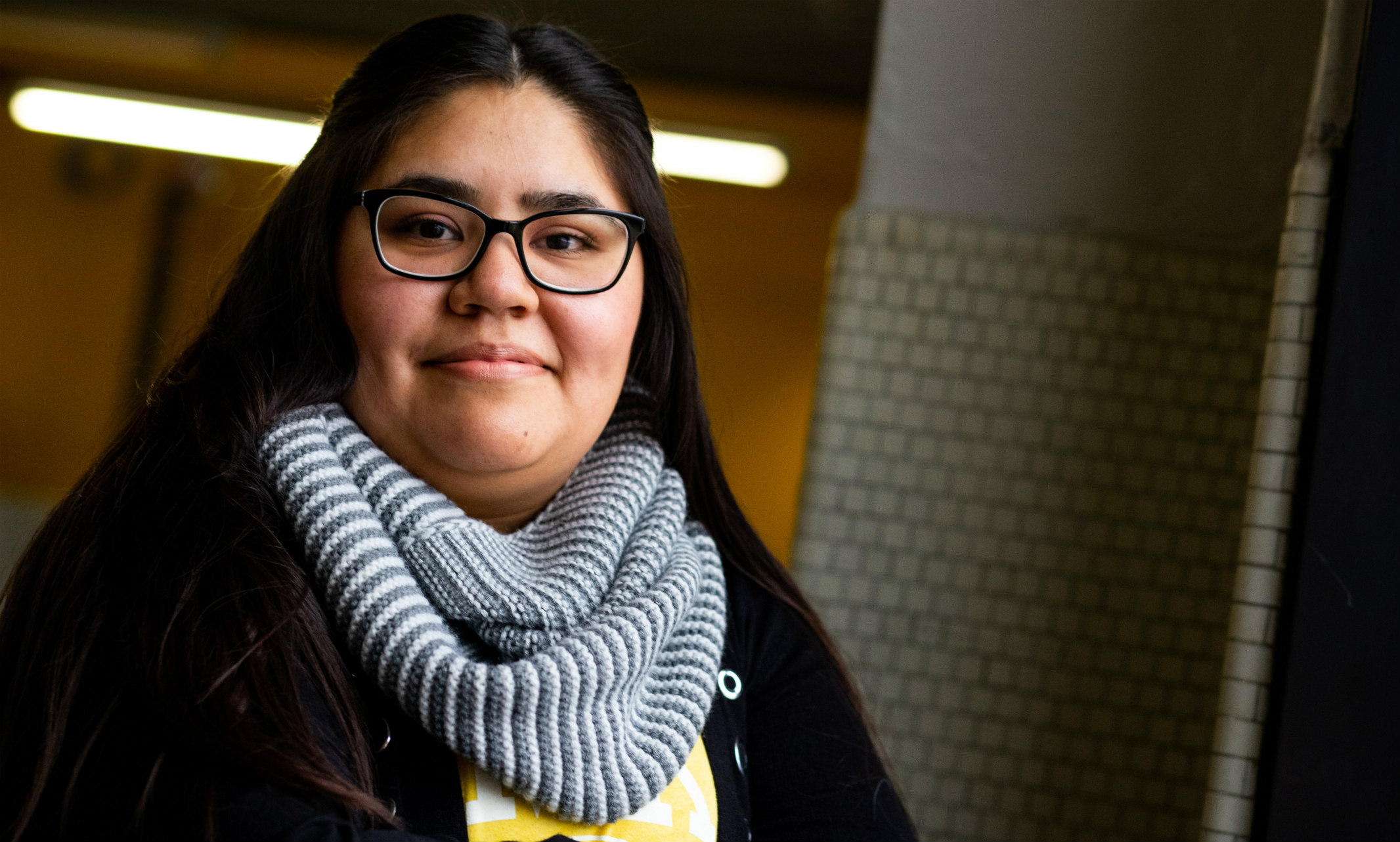
Astrid Vega’s career aspirations are inspired by her life experiences
Astrid Vega '22
Hometown: Kansas City, Kansas
High School: J.C. Harmon High School
Degree program: Education
Astrid Vega was five years old when she and her family moved from Mexico to the United States. As the product of two Spanish-speaking parents and a native Spanish speaker herself, starting school was a challenge due to the language barrier she had to overcome.
Thankfully, she had teachers who were willing to work with her as she learned to speak English. Fast forward several years later, the sophomore pre-elementary education student has the opportunity to pay it forward while working with English Language Learners (ELL) at Northeast Middle School as part of an Introduction to Language Acquisition and Diversity course (English 250) offered through the UMKC School of Education.
“I get the freedom to chart my own path and define my career.” — Astrid Vega
“I wanted to become a teacher because I want to work with kids, and I like to give back,” Vega said. “My teachers always pushed me to do my best and I want to impact kids and help them succeed.”
As a young mom, Vega’s college experience is nontraditional. She came to UMKC as a freshman interested in studying nursing but had to take time off to raise her son. After re-enrolling in school — this time at Metropolitan Community College — she changed her major to education.
“My parents didn’t go to college, but they always stressed the importance of going and finishing. And now I tell my younger sisters and my son ‘I made it, so you have to make it. No ifs, ands or buts.’”
Upon receiving her associate’s degree in education, Vega is back at UMKC working to complete her bachelor’s degree. Inspired by her own life experience and the School of Education's English 250 course, she’s considering becoming a teacher for English Language Learners.
“It’s amazing to see the students grow and, working a lot with Spanish-speaking kids, I like being an inspiration to help them see what they can become.”
Northeast Middle School is Kansas City Public School's district hub for English Language Learners. Children of various international backgrounds are bussed from all over the Kansas City metro to Northeast Middle for ELL classes. In class, children are grouped by comprehension level and UMKC students spend one day a week for 13 weeks working with them on reading and comprehension activities.
“It’s the small moments like seeing two children with different backgrounds and native languages speaking with one another in English that give me the most joy.” — Quinlinn O'Donnell, ELL teacher, Northeast Middle School
The Spanish-speaking students in Vega’s group were so excited that she speaks their language and can help them, although Vega says she tries to balance between Spanish and English so that they can practice communicating in both languages.
“I come up with different lesson plans and fun activities beyond what’s expected because I want them to learn,” Vega said. “I didn’t have Hispanic teachers growing up but my teachers were supportive and helped me learn more than I thought I could. The teachers at Northeast do an amazing job with the kids in the ELL class.”
The valuable lesson of diversity and inclusion reveals itself throughout the classroom as students are encouraged to help one another find creative ways to figure out how specific words in their respective languages translate to English.
“I wanted to become a teacher because I want to work with kids and I like to give back. My teachers always pushed me to do my best and I want to impact kids and help them succeed” — Astrid Vega
“It’s tough sometimes because these kids are trying to adjust to learning a new language on top of adjusting to a new home life as several of them are new Americans, but it’s the small moments like seeing two children with different backgrounds and native languages speaking with one another in English that give me the most joy,” said Quinlinn O’Donnell, Northeast Middle ELL teacher. “Or when a word they’ve been struggling with finally clicks and I’m like ‘Yes! You get it!’”
ELL students, some of which are refugees, are from countries all over the world ranging from Mexico to Myanmar to Somalia.
Vega said it's experiences like working with ELL students at Northeast that she enjoys most about her education at UMKC.
“I get the freedom to chart my own path and define my career,” Vega said. “I think teaching ELL will open up a lot of opportunities for me. I wish I can continue working with the students and seeing how far they go.”
Dec 09, 2019
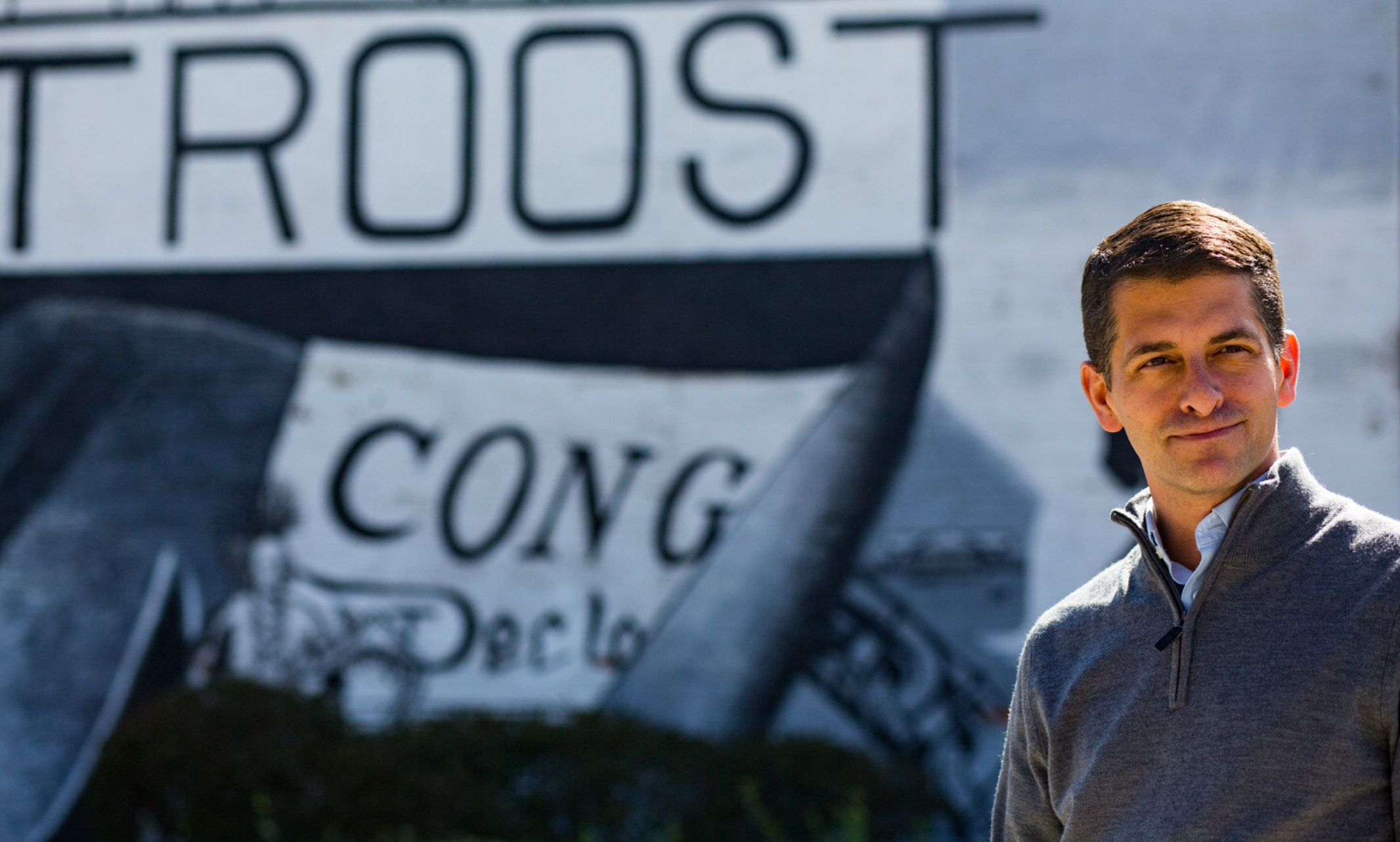
The 3 most important things you need to know about our new data sciences institute — plus its coordinator
Data scientist is the “sexiest job of the 21st century,” and now the University of Missouri-Kansas City is boosting that excitement and appeal for people in Greater Kansas City. Introducing the UMKC Institute for Data Education, Analytics and Science (IDEAS).
“Shortly after I arrived in Kansas City, I realized UMKC had enormous capabilities and opportunities in data science,” said Chancellor Mauli Agrawal, who created the institute. “There are exciting possibilities here for us, and for potential science and technology partner organizations throughout our community.”
The vision of the institute is positioning UMKC as the top option for data science training in the region, building on the university’s strengths in biomedical informatics, big data analytics, image analysis, digital humanities and geospatial analysis.
The coordinator of the new institute is Brent Never, associate professor at the Henry W. Bloch School of Management. There are no other specific faculty members attached to IDEAS. It is a space for all, with a focus on fostering connections to generate new ideas — pun intended — and move quickly on promising opportunities.
Never is a public-policy expert who uses city data to analyze abandoned housing, and was interviewed about his work by Lester Holt on NBC Nightly News.
“Scholars looking at real estate are often looking at how to finance new development, but I think about how we can empower communities to tackle distressed housing and vacant lots,” said Never, who last year with research partner and Bloch colleague, Jim DeLisle, won the national Alteryx Excellence Award.
Focus areas for UMKC IDEAS:
1. Workforce development
The institute will have vibrant educational opportunities for UMKC students and area professionals, positioning UMKC as the premiere source for data science in the region. This will mean evening and weekend opportunities, for both technicians as well as executive education. Pilot workshops have been held with more on the way. For UMKC students, it means they can earn data-science bonafides no matter their major.
“A philosophy major could apply her knowledge of ethics to the real concerns around privacy. A music composition student could use patterning in music to understanding trends in data,” Never said. “All students enrich our learning.”
2. Accelerating research
UMKC features strong research areas across the board. Examples include the Center for Health Insights at the School of Medicine, the Center for Big Learning at the School of Computing and Engineering and the Center for Economic Information at the College of Arts and Sciences.
“The goal is to foster more collaboration and get more faculty in the mix,” Never said. This will help spur more grant and contract development. “Data science is inherently complex and needs a full range of participation from all disciplines.”
3. Industry partnerships
IDEAS will be professional problem solvers for regional businesses for companies such as H & R Block, Cerner and engineering firms. “We’re partnering with industry and government to help provide new insight, something they might not be able to do in house.”
Grant Opportunity
An exciting opportunity is the Collaborative Data Science Grant Program, which helps UMKC faculty and research staff get their data science ideas off the ground. The funds, up to $25,000, can be used to conduct pilot projects, skill up in new techniques, or develop collaborative relationships with data scientists around the country. The deadline for submission is December 16, and submission materials can be found here.
For more information, contact Never at neverb@umkc.edu.
Dec 09, 2019

Enhanced Lifestyles for Metabolic Syndrome trial will test group vs. self-directed approaches
Many who set goals for the new year place top priority on becoming healthier. Now a national study can help take the guesswork and expense out of accomplishing a more active lifestyle. University of Missouri-Kansas City is one of five research sites in the U.S. for this study, which focuses on helping those at risk for metabolic syndrome.
UMKC is looking for participants.
Metabolic syndrome is a bundle of risk factors caused by common lifestyle choices that can lead to serious conditions such as diabetes, stroke, heart disease and cancer. Currently, one-third of Americans have metabolic syndrome, up from one-fourth a decade ago.
Over the next two years, with funding from the William G. McGowan Charitable Fund, the Enhanced Lifestyles for Metabolic Syndrome (ELM) Trial, developed at Rush University Medical Center in Chicago, aims to enroll 600 people who are at high-risk chronic disease and are interested in managing this risk by optimizing their lifestyle. In addition to UMKC at Truman Medical Centers in Kansas City, the other sites are Rush in Chicago; University of Colorado Denver; Geisinger Health System in Wilkes-Barre and Scranton, Pennsylvania; and Rochester Institute of Technology in New York.
The Kansas City study site is overseen by a prestigious UMKC School of Medicine team of principal investigators: endocrinologist Betty Drees, M.D., dean emeritus of the school and Jannette Berkley-Patton, Ph.D., director of the Health Equity Institute; and Matthew Lindquist, D.O.
“Metabolic syndrome is a serious condition because it is so common, and it can silently increase risk of heart disease and stroke without early warning symptoms,” Drees said. “Research into how to stop it early and keep it controlled is very important in preventing heart disease in individuals and in the population as a whole.”
Starting in January, participants will engage in the program for six months, and then will be followed for an additional 18 months, to allow for an assessment of how well they have been able to sustain the good habits they developed and the health benefits they received.
“We know that making these small lifestyle changes can have a big impact on people who have health issues that indicate they may have metabolic syndrome. Plus, everyone who participates will receive a free Fitbit. Other lifestyle-change programs can cost upwards of $500, but ELM will be free to our participants, which is awesome.” - Jannette Berkley-Patton
The ELM program provides tools, methods and support for healthier eating, increased physical activity and stress management. Guidelines include making vegetables half of every lunch and dinner, exercising for at least 30 minutes on most days, and learning to be less reactive to stressors.
The Rush team has been studying a group-based version of ELM for nearly a decade. The group approach, which has been shown to be effective, requires participants to attend meetings. While those can be helpful, they're time-consuming and may be inconvenient; from a public-health standpoint, groups are expensive and labor-intensive. So researchers want to know: Can we simplify this treatment? Can participants get the same or better health results under their own direction, with only minimal contact with the program?
“Metabolic syndrome is a serious condition because it is so common, and it can silently increase risk of heart disease and stroke without early warning symptoms. Research into how to stop it early and keep it controlled is very important in preventing heart disease in individuals and in the population as a whole.” - Betty Drees
For this study, a "self-directed" program will be compared to a group-based program, with the best lifestyle information available in clinical practice today provided in both..
Everyone in the self-directed arm will be assigned to a coordinator, and will receive a Fitbit activity tracker, access to the program's website and monthly tip sheets for six months.
In the group-based program, participants will get most of those things, too. But instead of the tip sheet, group members will meet for an hour and a half weekly for three months, biweekly for an additional three months, and monthly for 18 months after that. They will also have access to the ELM website. They will learn, for example, to distinguish when they are eating because they are hungry from when they turn to food because it is available or they are bored or sad.
Participants in both arms of the program will report for three follow-up visits so their progress can be assessed. They will receive lab results and physical measures after each visit.
“We are hoping we can learn how self-guided and group support programs can help people eat healthier and move more,” Berkley-Patton said. “We know that making these small lifestyle changes can have a big impact on people who have health issues that indicate they may have metabolic syndrome. Plus, everyone who participates will receive a free Fitbit. Other lifestyle-change programs can cost upwards of $500, but ELM will be free to our participants, which is awesome.”
How to participate
Participants in the study must be ages 18 years or older, not have diabetes, speak English, be willing to commit to a healthy lifestyle and have at least three of metabolic syndrome’s five risk factors:
Central fat (waist circumference of 40 inches or more for men, 35 inches or more for women)
High blood pressure
High blood sugar
Low HDL cholesterol
Elevated triglycerides
A condition of enrollment is a willingness to participate in either arm of the trial. Participants will not get to choose. To participate in the Kansas City area, email ELMtrial@tmcmed.org or call Alex Lyon at (816) 404-4418.
Dec 09, 2019
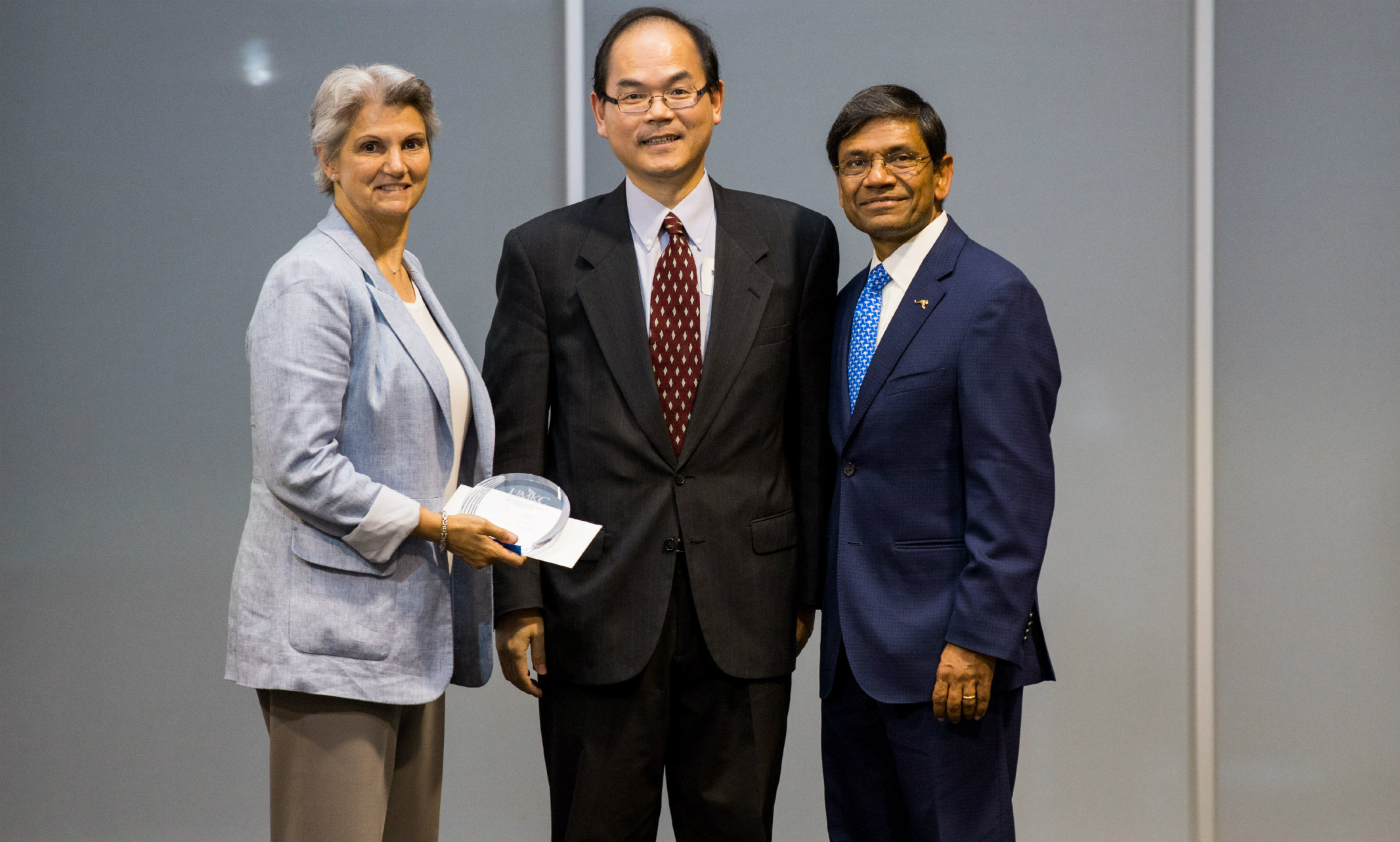
‘Applied Linguistics for Teachers of Culturally and Linguistically Diverse Learners’ selected as one of IGI Global’s Core Reference Titles for 2019
IGI Global, a leading international academic publisher, called “Applied Linguistics for Teachers of Culturally and Linguistically Diverse Learners” an essential scholarly publication that seeks to contribute to TESOL (teaching English to students of other languages) and language teacher education programs.
The book, co-written by Michael Wei, associate professor and TESOL program director in the Division of Teacher Education and Curriculum Studies at the UMKC School of Education, covers every aspect of applied linguistics for ESOL teachers: morphology, syntax, semantics, phonetics and sociolinguistics — to name a few.
“Strong language instruction is especially crucial given the fact that ELLs represent the fastest-growing segment of the student population in U.S. schools (ELLs make up about 10% of the total student population) and fall behind their native English-speaking peers and struggle academically in the K-12 setting,” Wei said.
Wei, the 2019 recipient of the UMKC Chancellor’s Award for Excellence in Teaching, has more than 25 years of experience working with English language learners. He’s taught TESOL programs in elementary and secondary schools in the U.S., middle schools in China, and at the university level in China, Thailand, and the U.S. He joined the UMKC faculty in 2006, and teaches graduate courses in applied linguistics, English grammar, second language acquisition and research methods.
“’Applied Linguistics for Teachers of Culturally and Linguistically Diverse Learners’ contains impactful and highly cited content that prompts thought-provoking discourse and inspires further discoveries, making it a pinnacle publication from our full collection of 5,300+ reference books,” according to IGI Global
This is the seventh book Wei has published in addition to one book translation, 28 chapters and articles and a translated film among other published works within his research areas — second-language acquisition, phonetics, reading/writing English as a second language and learning environments.
This publication is geared toward teacher candidates in TESOL programs across the globe and provides knowledge about linguistics for ESOL teachers who are going to teach about 5 million ESOL students in the nation.
Learn more about Wei's research and teaching
Dec 09, 2019

Ph.D. student Frances Bozsik's research on what constitutes the ideal female figure made international headlines
Frances Bozsik, a UMKC doctoral candidate in clinical psychology, has made international headlines for her research on body image. Now she's inviting women to participate in research for her dissertation.
She's conducting an online study examining body image in adult women, and is recruiting women between the ages of 45 and 60. People should feel free to take and/or pass along to others in their network. Participation is entirely online in a survey format. If interested, participants may enter their email address at the end of the survey to be sent a $10 VISA e-gift card. Email addresses will not be associated with responses.
Bozsik's research on what constitutes the ideal female figure earned media coverage around the globe.
“It’s really exciting,” said Bozsik, who is working to complete a clinical health psychology Ph.D. in 2020. “The study reflects the trend people are noticing that fitness and nutrition – vs. thinness – is the ideal.”
Models used in social media postings, or more than a decade’s worth of Miss USA beauty pageant winners, tell us that thin female bodies are still rated as attractive. However, U.S. women’s perceptions of what constitutes the perfect female figure have evolved in recent years to more of a muscular and toned ideal. This is according to Bozsik, who led a study published in 2018 in the journal Sex Roles.
Dec 08, 2019
Nancy Levit, a law professor at UMKC, tells Forbes that responding to the gender pay gap should be an issue of institutional, rather than individua...
The gender pay gap is alive and well. Women’s median annual earnings are almost $10,000 less per year than men’s. And the gender gap between the wages of new college graduates has grown since 2000. Law Professor Nancy Levit says the situation requires broader, systemic solutions. Read the story.
Dec 08, 2019
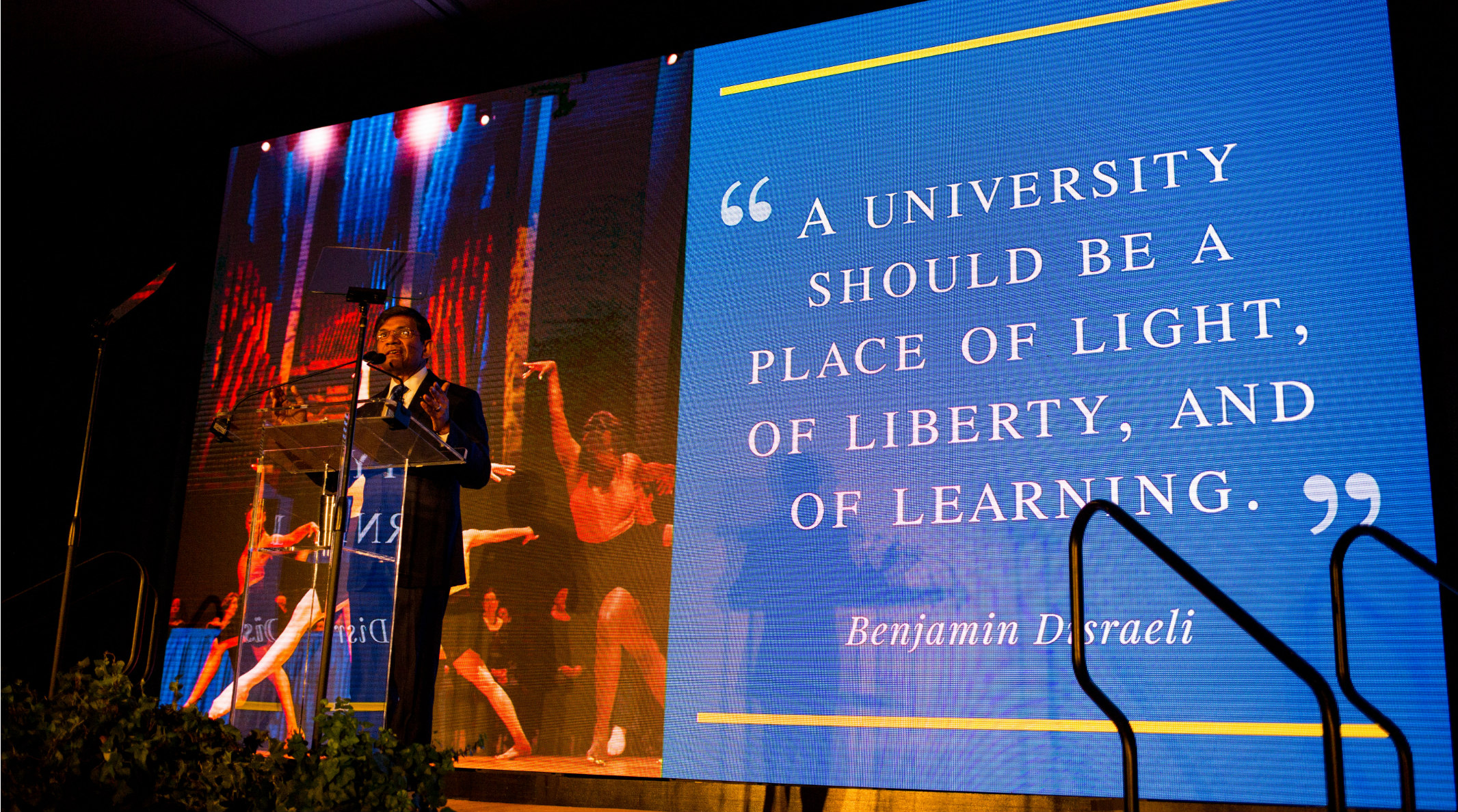
Growth and accolades abound
The year 2019 was one of monumental growth as UMKC and its community partners expanded opportunities for students. We’re also proud of the many significant accomplishments of our Roos. These are just a few of our top stories for this year.
Agrawal celebrates investiture with new initiatives
Mauli Agrawal, Ph.D., announced his dedication to establishing a Community of Excellence through five signature initiatives: Roo Strong, a student success initiative; the UMKC Institute for Data Education, Analytics and Science (IDEAS); TalentLink, a skill development initiative; Health Equity Institute, a new initiative to ensure equal opportunity for improved health; and Building Pride, a mentorship program.
Significant gifts support capital improvements and student success
The Marion and Henry Bloch Family Foundation committed $21 million to support programming and capital improvements for the Henry W. Bloch School of Management and RooStrong, a new student success initiative.
The Sunderland Foundation committed $15 million for capital improvements to the Bloch School of Management, School of Dentistry, University Libraries, the School of Law and the School of Computing and Engineering.
Bloch Family promotes student success by generating $20 million in scholarship funding
About 800 students will benefit from scholarship programs established by the Marion and Henry Bloch Family Foundation, the H & R Block Foundation and matching funds from the University of Missouri system.
University bids farewell to champion and supporter Henry Bloch
Entrepreneur, philanthropist and tireless UMKC supporter Henry Bloch died in April. His legacy will live on through the people he loved and the organizations to which he was committed.
Former First Lady Laura Bush visits campus
First Lady Laura Bush and First Daughter Barbara Pierce Bush were in conversation about their experiences in the White House and their family connection at the Starr Women’s Hall of Fame luncheon, which honors the legacy of women leaders in Kansas City.
UMKC composer named to American Academy of Arts and Letters
Chen Yi, Lorena Searcy Cravens/Millsap/Missouri Distinguished Professor of Composition, was inducted in the American Academy of Arts and Letters, an honor society of the country’s leading architects, artists, composers and writers.
School of Dentistry unveils state-of-the-art training lab
A multimillion-dollar makeover provides students with fully-equipped, ergonomically-correct work stations that is among the newest and largest in the U.S.
UMKC researcher helps discover new strain of HIV
Carole McArthur, M.D. ‘91, Ph.D., of the School of Dentistry, made news around the globe as part of a team of scientists who discovered a new subtype of HIV, which can be traced back to the Democratic Republic of Congo.
UMKC business students represent the U.S. in global competition
Three Bloch School of Management students represented the U.S. in the Unilever Future Leaders’ League, a global business-case competition in London. Students from 26 countries participated.
Elevating Athletics
Kansas City Athletics had a banner year under the leadership of Athletics Director Brandon Martin, Ph.D. The Roos returned to the Summit League, launched a new fighting Roo logo and a bold basketball court redesign.
Dental student delivers patient’s baby at clinic
A fourth-year student in the School of Dentistry started her first day of her new externship eager to treat as many patients as she could. Aliah Haghighat was prepping the tooth of her second patient when the woman’s water broke.
Dec 06, 2019
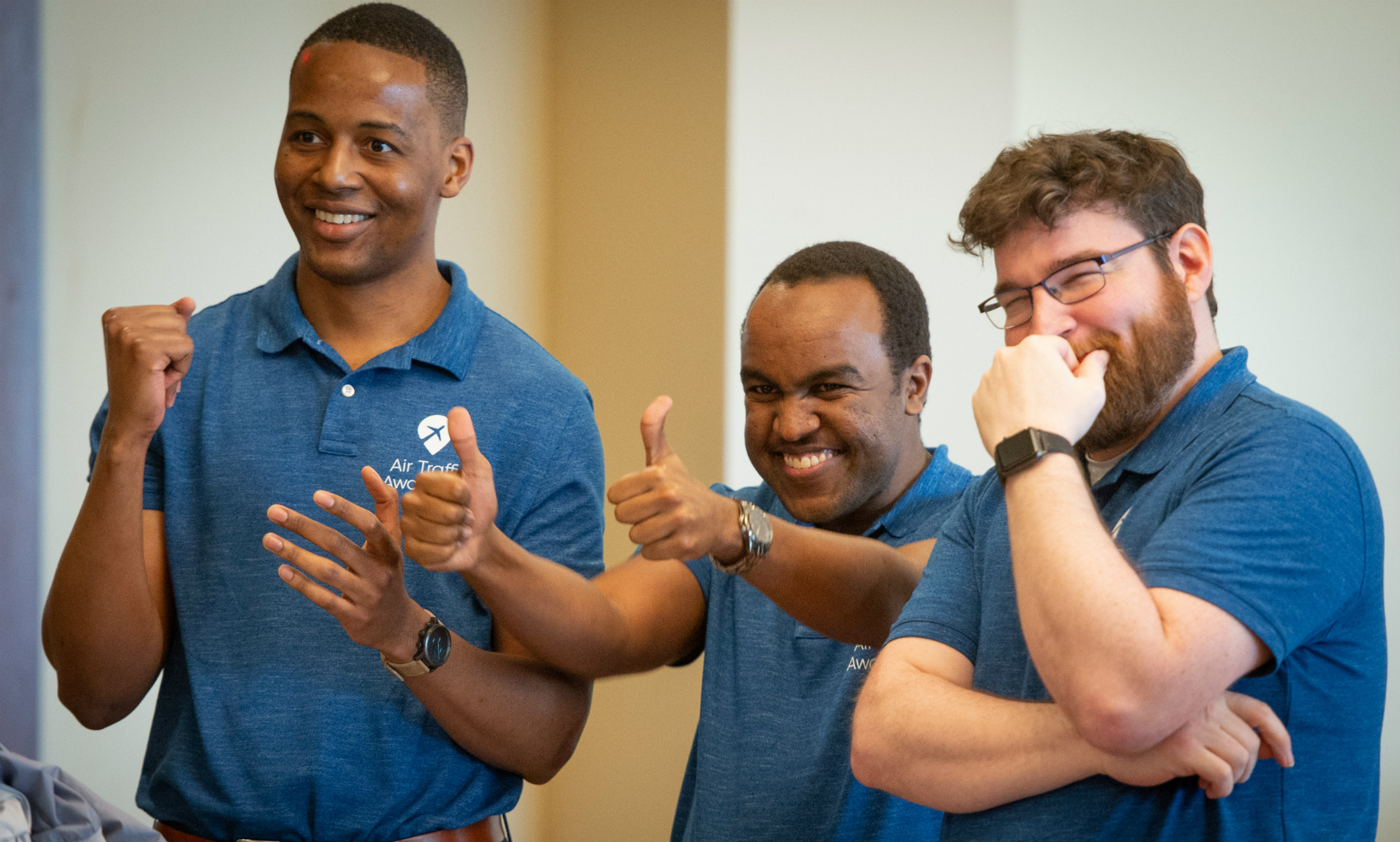
UMKC students pitch ventures in Entrepreneurship Quest Student Accelerator
Twelve student entrepreneur teams from UMKC will move on to the next round of the UM System pitch competition.
Last week, 20 teams pitched their ventures at the Henry W. Bloch School of Management Regnier Institute for Entrepreneurship and Innovation. All of the student entrepreneurs were solving problems through their business ventures that ranged from tech products to beauty products to apps and platforms to connect busy parents. Teams pitched in 10-minute time slots with 5 minutes for the pitch and 4 minutes for questions and answers. The next round of the UM System EQ Pitch Competition is in March 2020.
Here are the 12 ventures:
Pegasus Project
Thomas Murphy, business administration, undergraduate; Kyla McAuliffe, business administration, undergraduate; Abdulmajeed Baba Ahmed, mechanical engineering, undergraduate; Ami Khalsa, computer science, undergraduate
Project DescriptionPegasus upfits traditional bicycles to run with battery-electric-power assistance. The company is intent on creating an alternative and affordable transportation option for all residents. The target audience identifies as low-income, which drives Pegasus to provide a more effective and reliable mode of transportation for individuals to reach jobs, school and communities. An included bus pass will help manage instances of inclement weather. The team said market-rate customers will experience value from Pegasus’ cost leadership strategy, because an upfit will cost half the price of an equivalent quality new e-bike.
Vortex Cooling Systems
Jordan Berg, mechanical engineering, undergraduate
Project DescriptionAccording to Berg, there is an unmet demand for a business to create and sell direct water-cooled central processing units and graphics processing units. He said Vortex Cooling Systems would provide in-house integration of a cooling system and processor to create a much more powerful system than what is currently on the market. By professionally bonding a cooling system to the CPU, the thermal resistances present in currently-available cooling systems would be bypassed and the new cooling system would perform far better. The customer could then purchase the CPU and cooling system combo directly from the company instead of purchasing each component separately. Other business capabilities would include retrofitting customers current CPUs with a cooling system, or custom chained cooling system based on customers’ requirements. The goal of the company would be to keep up with the customizable nature of the gaming community.
Koil Hair Dryer
Konnie Wells, mechanical engineering, undergraduate; Zion Guerrier, mechanical engineering, undergraduate
Project DescriptionThe product is a hair dryer designed to help individuals with curly and coily hair textures to dry and/or straighten their hair. The student entrepreneurs said customers will no longer have to buy multiple devices to straighten or dry their hair, because attachments will be made specifically for curly and/or coily hair types. The hair dryer will also have an ergonomic handle that has better sensors to offer great heat control and power control. In addition, Wells and Guerrier said the attachments will be strong, because coily hair can place a large amount of resistance on them compared to the resistance from straighter hair textures. The hair dryers will be available online or can be bought in stores, giving customers a device tailored specifically for them.
Good Bitter Best
Jennifer Agnew, business administration, graduate
Project DescriptionBecause many of bars and restaurants in the Kansas City area use generic bitters, or make them in-house, Agnew plans to offer local bitters that are made from locally-sourced ingredients. Agnew said giving bars and restaurants access to a local company will allow them time to mix more creative drinks without the mess, hassle and expense of making their own. Providing local bitters would also allow for drink menus to change with the seasons or different events rather than sticking with one flavor all year. Good Bitter Best has already created a line of bitters, giving Agnew the bittering agents and experience with what works best to get the most flavor out of the ingredients.
Recipe Tree
Nathaniel Worcester, computer science, undergraduate
Project DescriptionWorcester believes the industrial food service and restaurant industry needs an across-platform recipe sharing application that supports different file-types. As the market stands, recipe sharing applications do not support file transfer in their native file format (docs, .txt, pdf, video, etc). Worcester said this requires the chef to manually update and replace old recipes by filling in fields in a recipe sharing application. Where the tech world has moved to “drag and drop,” functions, he said the food industry still uses the equivalent of static html applications that do not allow multimedia or anything outside a filled out form. File-sharing applications provided by Apple or Google Drive are currently being used in many instances in the food-service industry, but these programs do not support role-based access for files to allow the employee to edit, change or share a recipe where they should only be able to view it. Because of the hassle, Worcester said some companies are still using paper recipe books.
Compost Collective KC
Kyle McAllister, business administration, graduate
Project DescriptionCompost Collective KC solves two fundamental problems – the first is a global issue. McAllister said food waste is a major threat to the environment and is produced in the United States at an alarming rate. Approximately 30% to 40% of all waste going to landfills in the U.S. is food. He said that equates to approximately 33 billion pounds of food in landfills per year. That volume would fill the entire Rose Bowl in Pasadena, California, each day for an entire year. McAllister said this is a problem because food waste breaks down in a landfill without oxygen and, as a result, the process emits methane gas. Depending on the study, McAllister said methane gas has 25 to 84 times the climate-change impact than carbon dioxide. Given this issue, people are looking for more sustainable alternatives. McAllister cited a recent Yale study that found that 70% of Americans think environmental protection is more important than economic growth. McAllister believes Compost Collective KC can help solve the second problem – give people a simple way to have a positive environmental impact by composting.
Vest Heroes
Fahad Qureshi, medicine, undergraduate/graduate
Project DescriptionWhen Qureshi started shadowing physicians, he saw an unexpected problem when any surgical operation involving an X-ray or radioactive imaging technology requires the health care professional wear a heavy lead vest and skirt – the equipment was very heavy and often weighed between 30 and 69 pounds. Because failure to wear protective gear results in carcinogenic radioactive exposure, wearing of protective equipment is required by law. When questioned, Qureshi said surgeons complained of back pain and hindered operational mobility due to the excess weight. In addition, Qureshi said the pain worsened for physicians as they worked long surgeries and as they aged. To solve this problem, Qureshi realized he needed to add an engineering element to his medical background. He started an apprenticeship with a local engineer and learned how to work with his hands. Qureshi said his eyes were opened to the problem-solving nature of the field. He soon started constructing his own prototypes in the fashion of the pulleys and levers. The prototype consisted of a lead vest/skirt with a tether. This tether was hooked to a cord that ran to a small hook on a ceiling. Finally, the cord was connected to a weight that offset the weight of the vest. In this way, a simple pulley was created. He contacted an interventional nephrology practice that uses radioactive imaging called A.I.N. in Chicago who allowed him to build a model in the operating room with special sterile materials. Qureshi used a 50 pound weight to make a 60 pound vest and skirt feel like just 10 pounds. The physicians at the practice were astounded and asked for more, citing their immense need.
Unity Gain
Travis Fields, business administration, undergraduate
Project DescriptionFields is creating a 21st century solution to the fragmented local music scenes left in the wake of the 20th century recording industry. Unity Gain is a brand, anchored by a live music venue, artist’s hostel and a 24-hour diner built on local music communities offering local and touring musicians the resources, networking and support necessary to make their musical careers sustainable. By offering hostel-style sleeping quarters for touring musicians, as well as membership based production studios, digital marketing resources, mentorship and more to musicians, Fields said Unity Gain will create a community and value that will attract top talent, and in turn, the live music fans and supporters in those communities. Fields also expects to build relationships with the influencers of tomorrow.
Pythagorus
Adeesh Parvathaneni, medicine, undergraduate/graduate
Project DescriptionPythagorus provides an online service that would allow young people and athletes to have physical therapy whenever and wherever they would like it. By providing an online physical therapy experience using a webcam, the application would use copyrighted code to detect angles and thus, the exercise that the young person made. Therapists can then let patients know whether or not they did the exercise right. The program would also count the amount of reps completed, allowing a physical therapist to use the software to prescribe a workout to a young athlete through a video demo. The patient could then complete the exercises under the guidance of the software. Parvathaneni said the application differentiates itself by not only its marketing strategy, but by being the sole company that allows for physical therapy online. In addition, he said the solution is proprietary and utilizes Intel OpenVino software, which leverages deep learning technology.
DivviUp
Brad Starnes, information technology, undergraduate
Project DescriptionDivviUp would solve the problem of sharing or splitting automatic payments between peers. Currently, Starnes said consumers have to put one card on file if they plan use auto pay, and use other methods to get funds to their peers or make multiple payments to their merchant for a simple bill pay. DivviUp would allow consumers to put a virtual card on file with their merchant for monthly recurring transactions to then be separated by an algorithm for each person’s portion of their transaction via an ACH withdrawal. The DivviUp team integrated with a third-party banking service, Plaid, which allowed them to conduct real-time balance checks on consumers’ individual accounts prior to allowing the transaction to go through on a monthly basis. They utilize user input of each person’s percentage of the transaction to charge the dollar amount to each user’s checking account each month. Plaid allows them to check each user’s account to see if they have their specified amount, and if not, they send a notification rejecting the transaction. Starnes said this program gives the opportunity to transfer funds and re-attempt the transaction when funds are available. DivviUp will utilize data entered by the consumers on a mobile app, specifying what utility company in use, to market to those companies for an online API integration to reduce cost.
EEG Controlled IoT Devices
Syed Jawad Shah, computer science, graduate (PhD)
Project DescriptionShah has identified a problem for people who are physically disabled and don't have an effective communication medium. EEG Controlled IoT Devices is a brain-computer interface that directs IoT devices to take certain actions. It is an assistive and non-invasive technology that enables physically challenged individuals to complete their daily tasks with some degree of independence. They can also communicate with others in a more effective manner. Examples would be turning the light on or off or calling for help. The device also enables health care providers to provide better services to patients. The interface uses deep learning technology to learn distinct patterns in EEG signals and associates them to trigger certain actions on IoT devices. For example, a patient with no ability to move or talk can turn on a light in a dark room by thinking of an illuminated light bulb. In this way, Shah hopes his product will increase users’ confidence and provide positive a experience.
Genalytics
Greyson Twist, bioinformatics and computer science, graduate (PhD)
Project DescriptionThe core of Genalytics is to prepopulate data from experts in line with current FDA approved and supported/drug gene interactions in the required/proprietary format. Access is shared across all possible target customers but the interface and interaction may differ. In direct-to-consumer, uploaded relevant demographic information as well as genomic information, customers can present a potential medication, via barcode scanner or the drug NDC code. The system will screen the active ingredients and the genomic data, and return a red light or green light based on the results. A green light means it is safe, based on known information to take the medication. A red light means that some concerns exists. With the red/negative indication, the team would like to provide alternative medication options, such as a product minus the offending active ingredient, or suggestions to consult a pharmacist or doctor for dose adjustment guidance.
Read about the last pitch competition
Dec 06, 2019
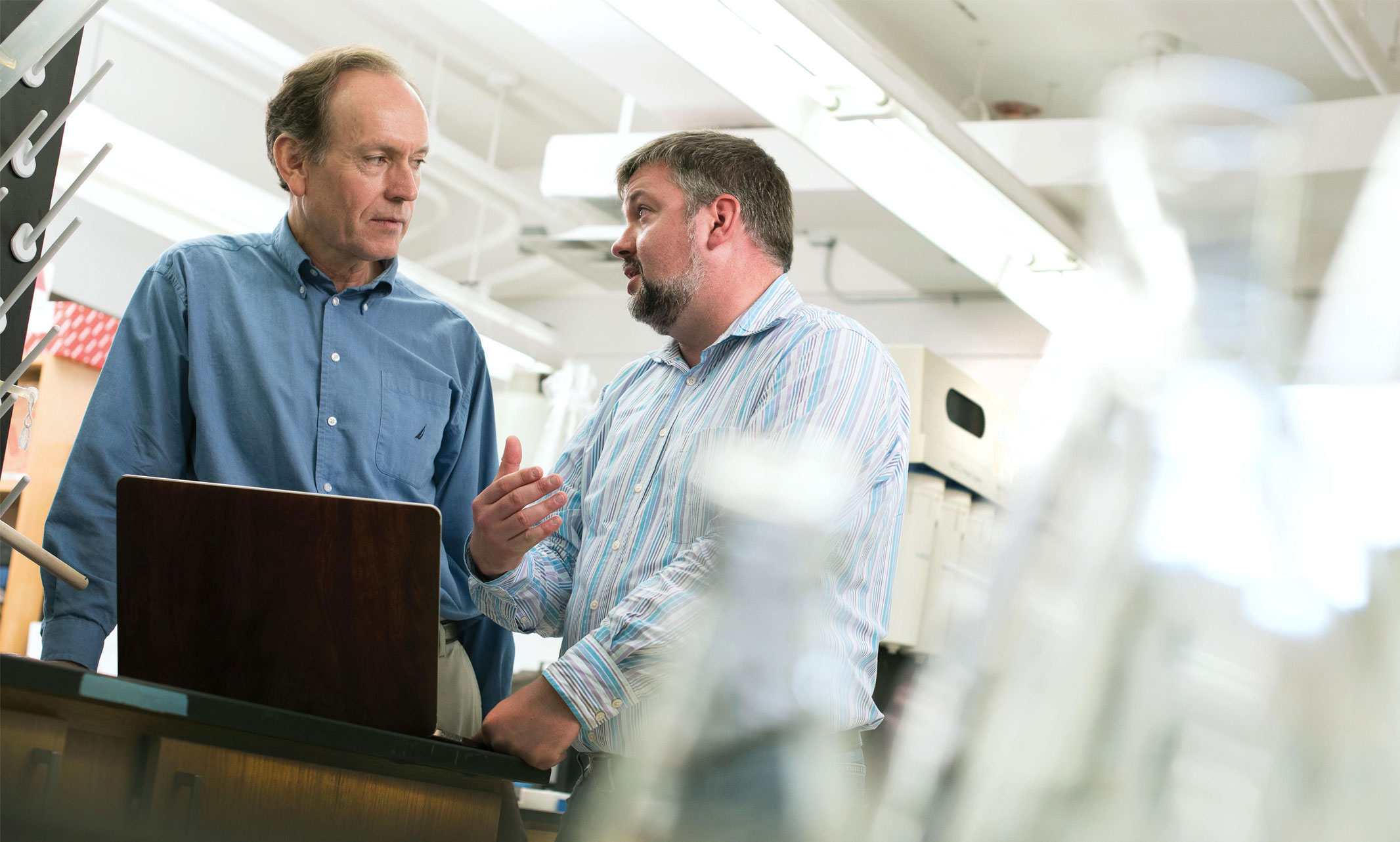
Whiteboard to Boardroom helps KC startups turn ideas into commercialization
The Kansas City Business Journal details how the UMKC Innovation Center's Whiteboard to Boardroom program helps local healthcare startups transition from from lab success to commercialization. Featured was UMKC Professor Gerald Wyckoff, at right, who created a computerized system that predicts problematic drug interactions.
Dec 06, 2019
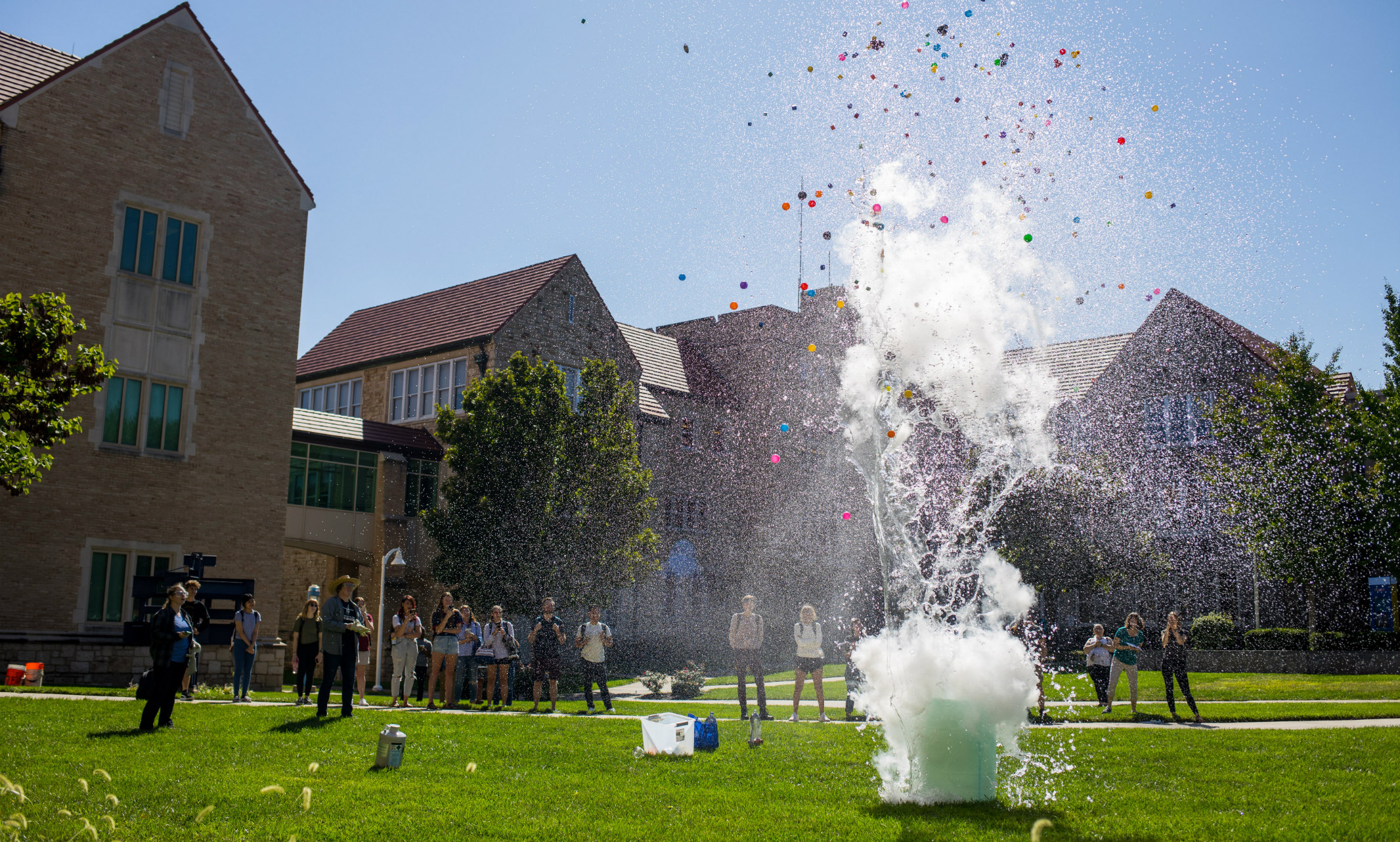
Images capture memorable moments of campus life
When we look back over the year, words often fail to describe exactly what we experienced or what it felt like to be present during certain moments. That’s where photos come in. Our university photographers Brandon Parigo and John Carmody excel at capturing what life here at UMKC is really like. We caught up with them to look at their favorite photos from 2019, and discuss what made each image memorable.
Trashcano (image above)
“Any time you can photograph an explosion, it’s a good day,” Brandon says. No further explanation needed.
Petting Zoo
The featured animal in the event before spring finals was, of course, a baby kangaroo, John says.
Soccer
The women’s soccer team is conducting a focused moment of quiet before a game, a meaningful part of their pre-game routine. Brandon also says that the “Roo Up” that follows is one of the most genuine expressions of school spirit that he has ever seen.
Therapy horses
Two therapy horses joined a nursing class, thanks to assistant professor Sharon White-Lewis who raises miniature horses and teaches about their benefits. John wonders “who knew there was such a thing?” Well “Parks and Recreation” fans sure do, hey Li’l Sebastian!
Basketball
Stillness and concentration are part of what makes this photograph special. Brandon notes that he likes the unique formation of her hand and the way she lingered in that exact position until she made sure the ball went through the net. Even the referee at the edge of the frame is focused on the ball, giving off the feeling that everyone in the room was holding their breath.
Marcus and Daphne at Miller Nichols Library
For Brandon, this photo shows how fun students can be, and how willing they are to go the extra mile to support campus. The expressions seen in the photo are also genuine reactions to the goofiness of Brandon’s directions, which makes him feel like he is reflected in this shot as well.
Snowball fight
Brandon appreciates the spontaneity of the photoshoot, capturing the impromptu snowball fight and all the action and movement in this particular shot.
Cross Country
John remembers how the brutal weather conditions including a two-hour lightning delay meant lots of mud, but the Roos still made a good showing.
Avanzando event
The dancing and celebrating on the patio of the Student Union reflected a unique side of UMKC that Brandon says he would love to see more of on campus.
Fall dance concert
Brandon loves how the shot was taken right as the lights were fading out, making the photo appear to be a blending of black and white and color. He also feels that this image complements the emotion and symbolism conveyed in this performance.
Dec 05, 2019
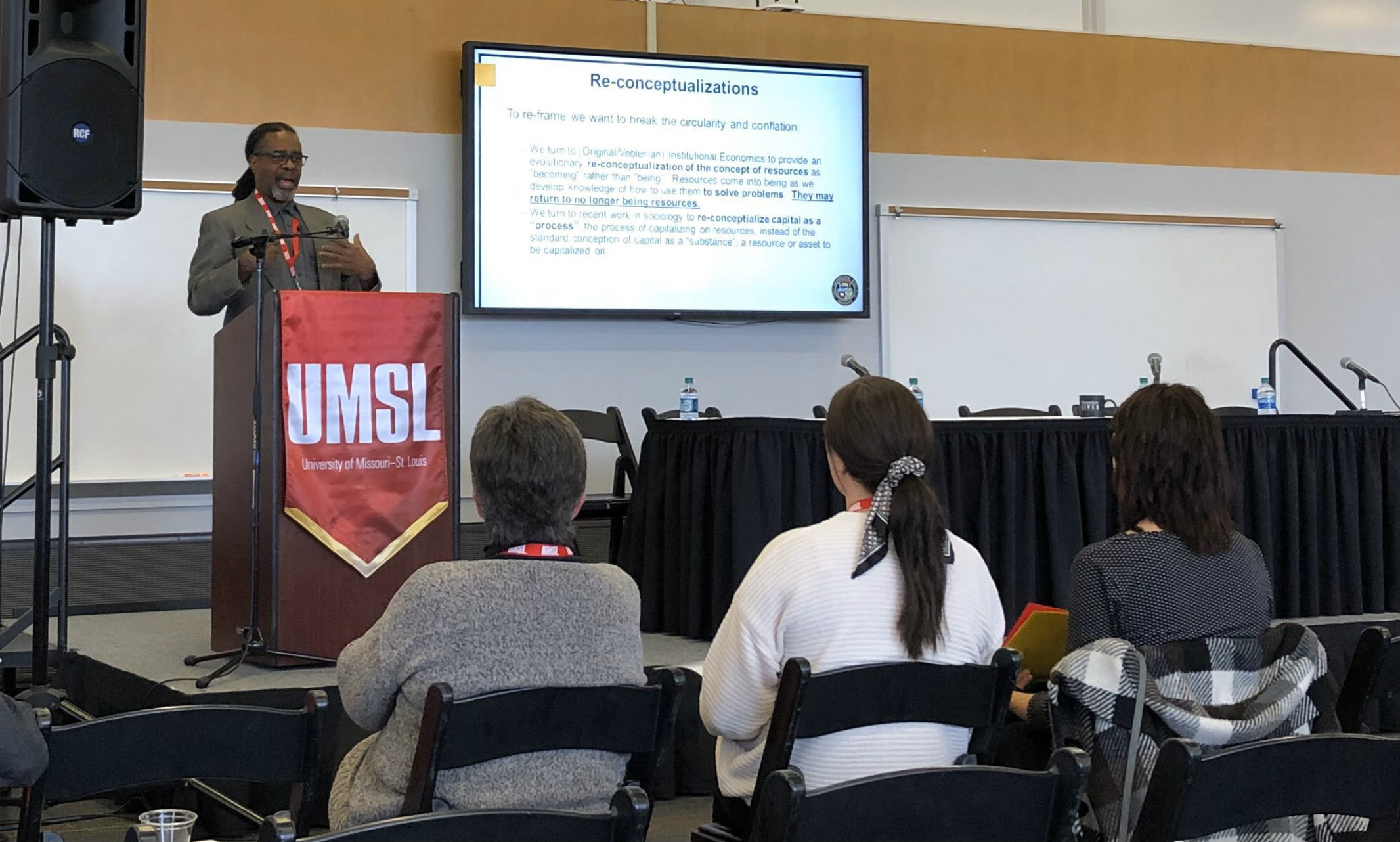
Four College of Arts and Sciences professors share sustainability ideas
Four University of Missouri-Kansas City professors from the College of Arts and Sciences presented their research at the UM System Collaborative Summit, “Converging Disciplines to Support Sustainable Development Goals (SDGs),” Nov. 20 at the University of Missouri-St. Louis.
In 2015, member states of the United Nations adopted “The 2030 Agenda for Sustainable Development” to support global action toward peace and prosperity for all nations. The agenda includes 17 Sustainable Development Goals (SDGs) to guide the global community in critical action to sustain the health and wellness of our planet and its inhabitants. The UM System Research Summit focused on several of these goals, including: no poverty; zero hunger; quality education; gender equality; affordable and clean energy; decent work and economic growth; reduced inequity; and peace, justice and strong institutions.
Presentation topics and brief descriptions for the four UMKC professors at the UM System Collaborative Summit are listed below. View session one and session two from the summit on YouTube.
Caroline Davies, associate professor, Department of Earth and Environmental Studies, on “Teaching the Sustainability Development Goals through Undergraduate Research and Community Engagement.”
The presentation described community engagement via a large format course around sustainability and the impacts of hands-on projects for students and community partners. To date there have been nearly 600 sustainability projects across the Kansas City metropolitan area.
Linwood Tauheed, associate professor and IPh.D. director of Economics, on “The ecological and community economic development: A methodological reconciliation.”
There is a significant conflation in the definitions of three concepts – resources, assets and capital – both in economic theory and in common usage. This conflation creates a cognitive frame in how the use of resources is discussed, which is biased in favor of increased resource usage, and leads to justifications for risk-taking behavior associated with increased resource usage and its effect on the global climate. A reconceptualization in the definitions of resources, assets and capital can help to normalize the framing around resource usage, and help bring to the forefront the liabilities of increased resource usage. This is a reconceptualization needed within ecological economics, if it’s to generate public support for its goal of creating an environmentally sustainable economy that simultaneously improves human well-being.
Jacob Marszalek, associate professor of Psychology, on “Promoting the development and assessment of social justice advocacy.”
A cornerstone for building institutions that promote peaceful and inclusive societies for sustainable development is to help their individual members (e.g., those in the helping professions) develop social justice advocacy (SJA), a pillar of Development Education. An important component of any type of education is assessment, and the Social Issues Advocacy Scale (SIAS; Nilsson, Marszalek, Linnemeyer, Bahner, & Misialek, 2011) was developed to measure the competency of SJA in students in the helping professions, and has been translated and used both nationally and internationally. The SIAS has been used to develop mastery profiles of SJA in students in clinical and counseling psychology, nursing and education, which may be used to assess growth in SJA attributes over the course of an academic program. The scale has been further developed into the SIAS-2 to account for a broader array of SJA dimensions, and ongoing research is refining a short form version for greater usability.
Sunghyop Kim, professor of Architecture, Urban Planning and Design, on “Equity in transportation mobility and safety: Issues in an aging Society.”
Aging population poses substantive equity issues. Safe mobility is critical to ensure a good quality of life regardless of one’s age. However, older adults often must deal with transportation disadvantages. Older adults who cannot drive face significant mobility challenges. A significant increase in bankruptcy rate and a growing financial insecurity among older adults pose added concerns. Gender and racial gaps in mobility exist among older adults. Older women, older minority women in particular, are more vulnerable than older men in meeting their mobility needs. Older adults aged 65+ are more likely than any other age groups to be fatally injured in pedestrian crashes. A number of recommendations have been made to address older adults’ transportation issues. However, specific strategies to promote safe and affordable mobility of older adults are still underexplored.
Dec 05, 2019
In a series of broadcasts, PBS NewsHour describes how Prof. Sean O'Brien and others at the UMKC School of Law fought for years to exonerate wrongly...
UMKC Law Prof. Sean O’Brien and client Ricky Kidd describe their two-decade-long struggle to exonerate Kidd from a false murder charge, and the overburdened public defender system that failed him.
See the broadcast.
Hear the podcast.
Dec 05, 2019
Joah Williams, a psychology professor at UMKC, tells KCUR about his new program.
“The goal of the project is to try to provide timely and responsive early intervention for survivors of nonfatal shootings,” says Joah Williams, a psychology professor at UMKC who runs RISE, Responsive Individualized Support & Early Intervention. Read the story.
Dec 05, 2019
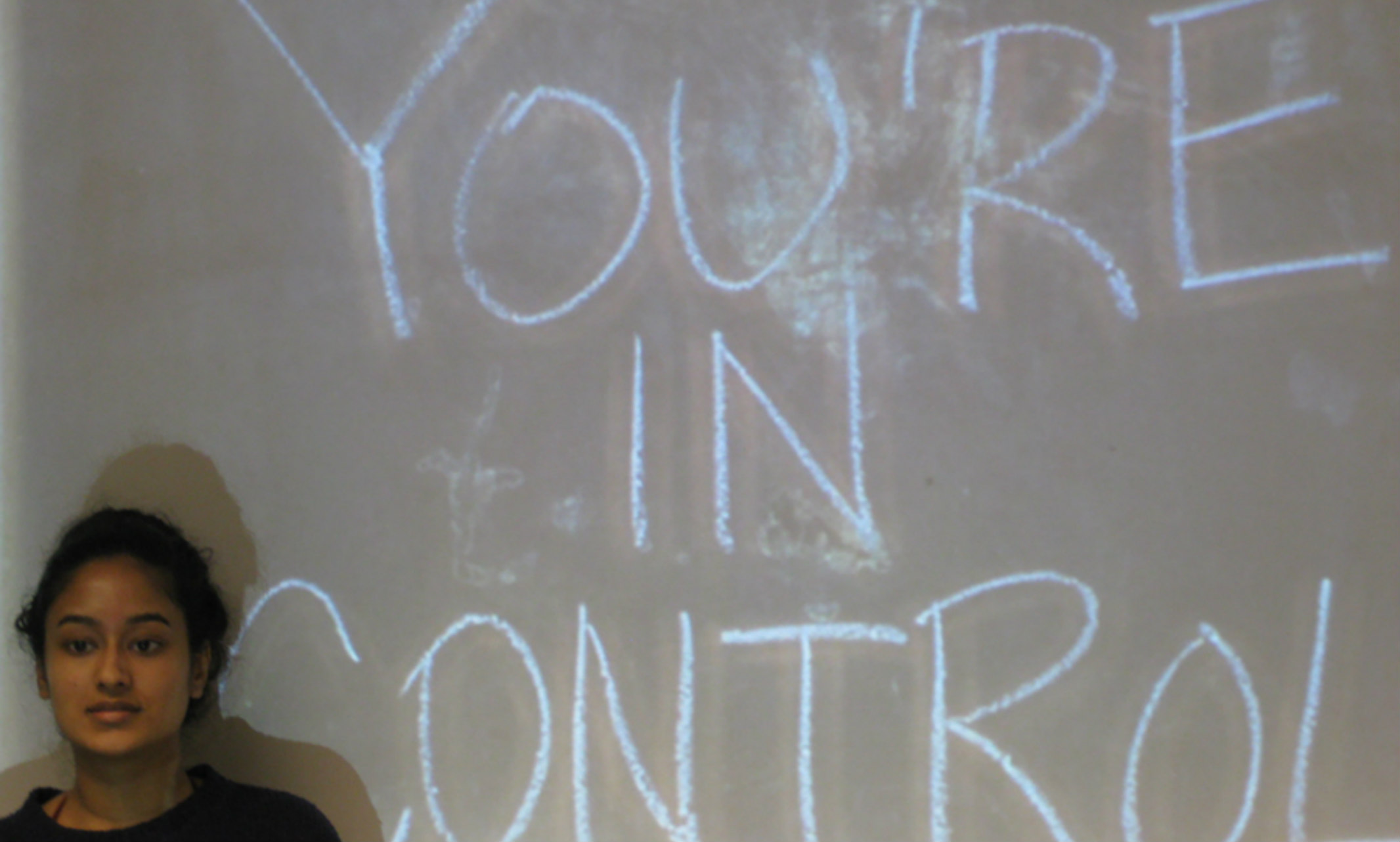
Dramatic collaboration shows the dangers of sexually transmitted diseases and HIV
Gus Frank begins to share his story with a group of Kansas City teenagers. For about 20 minutes, he describes how this local high school basketball player discovered that he is HIV-positive and must now live with consequences.
But the story is not really his own. It is, however, the unnerving and true story of a Kansas City teen whose life has been dramatically changed forever.
Frank is actually a fourth-year medical student at the UMKC School of Medicine acting in the production, “The Dramatic STD/HIV Project.” The partnership brings together health professions students from UMKC, the University of Kansas and Coterie Theatre actors to provide Kansas City teens with the facts about sexually transmitted diseases and HIV/AIDS.
“Some of the highest STD rates are among our youth and young adults ages 15 to 24. Education, knowledge and prevention are an important step in changing this risk to our youth.” —Stefanie Ellison, M.D.
In the roughly hour-long program — a 15- to 20-minute scripted presentation followed by an often-intense question-and-answer period — a professional actor from the Coterie pairs with a medical, pharmacy or nursing student to discuss the dangers of the diseases with audiences from eighth grade through high school.
“We’re there to inform the youth of Kansas City,” said Frank, now in his second year with the project. “We’re not doing this to tell them what they should do, but to inform them of the facts. We want them to be able to make their own informed decisions when the time comes.”
Evolution and impact
Joette Pelster is executive director of the Coterie Theatre and a co-founder of the project. She started the program with the theatre’s artistic director Jeff Church, an adjunct theater instructor at UMKC, and Christine Moranetz, then a faculty member at the University of Kansas Medical Center. That was 26 years ago when the AIDS epidemic was at its height, becoming the one-time leading cause of death among Americans ages of 25 and 44.
Wanting to create an educational program with credibility, Pelster reached out to the local medical community for help. She first enlisted aid from the University of Kansas School of Nursing. The UMKC School of Medicine joined the program in 2004, followed by the UMKC School of Pharmacy in 2008 and the UMKC School of Nursing and Health Studies in 2015.
“We wanted to do something that would have an impact,” Pelster said. “A lecture wasn’t going to do it. This was a perfect partnership because their weakness was our strength. We brought the acting, they brought the medical content and credibility. That’s why it’s lasted so long.”
“We’re there to inform the youth of Kansas City. We want them to be able to make their own informed decisions when the time comes.” —Gus Frank, medical student
UMKC faculty members Stefanie Ellison, M.D., at the School of Medicine and Mark Sawkin, Pharm.D., at the School of Pharmacy, serve as medical directors. They provide the actors with training on such things as current trends in infection rates, symptoms, testing and treatment. They also compile and routinely update a huge binder loaded with information to prepare the actors for what might be thrown at them during the question-and-answer portion of the program. Each actor has a copy of the binder that is updated throughout the year and training updates occur at least twice a year so that troupe members have current facts to share with at- risk students.
“UMKC was very influential in our talking about STDs because the incidence rate was rising so high,” Pelster said. “They are integral to the project and training for the question-and-answer periods that are vital to the project.”
“This is still relevant 25 years later,” Ellison said. “Some of the highest STD rates are among our youth and young adults ages 15 to 24. Kansas City has an increased incidence of gonorrhea, chlamydia and syphilis. Nationally, one in five new HIV diagnoses is in patients ages 13 to 24, and 20 percent of new diagnoses are among patients from ages 14 to 19. Education, knowledge and prevention are an important step in changing this risk to our youth.”
The production
Since 2008, the program has averaged more than 210 presentations a year in junior highs and high schools throughout the Kansas City Metro area. Through last school year, it had been presented 4,495 times, reaching more than 194,000 Kansas City teenagers.
This year’s cast includes 14 UMKC medical students, two UMKC pharmacy students, one UMKC nursing and health studies student, two University of Kansas nursing students and 17 professional Coterie actors, one a graduate of the UMKC theatre program.
“I would share with them that this (prescription) is something you’ll have to take the rest of your life; you’re stuck with it. Just being able to embed that in their memory by telling these kids was really helpful.” —Krista Bricker, pharmacy student
Every presentation pairs one male and one female of different ethnicities, helping to make the team more relatable to its audience. Each actor follows one of six different scripts to present the true story of a Kansas City teen that has contracted an STD or HIV/AIDS.
The productions require little theater other than the actors’ monologues, slides projected on a wall or screen behind them and music to help present each story. They take place in intimate settings of a single classroom of maybe 15-20 students to auditoriums filled with as many as 100 or more students. The actors say the small classroom sessions sometimes produce the most intense interactions because the students in their smaller, tight-knit setting become less inhibited during the Q&A periods.
“It feels like we’re talking student to student,” said Madison Iskierka, also a fourth-year medical student. “It doesn’t feel like you’re sitting in a lecture listening to someone preach about whatever you’re learning. It’s very personal and I like that.”
Frank admits feeling some early awkwardness when talking about such a sensitive subject with a young audience. But that faded after a few presentations.
“It’s something that we need to make not weird,” he said. “We need to destigmatize all the sexual education about HIV and all other STDs. If we could make those things something that is easier to talk about and comes up in conversation more often, it would probably make people more aware and more willing to get tested and get treated if they do have something.”
The actors are trained to hit on a list of key points during the question and answer sessions to highlight abstinence as the only sure way to avoid contracting infections, as well as discussing risky behaviors and sources of transmitting the diseases.
“We wanted to do something that would have an impact. A lecture wasn’t going to do it. This was a perfect partnership...we brought the acting, they brought the medical content and credibility. That’s why it’s lasted so long.” —Joette Pelster, Coterie Theatre
Krista Bricker, a fourth-year UMKC pharmacy student, was among the cast of student actors a year ago. She said she often leaned on her pharmacy background and honed in on the medications when sharing the hard reality of what is involved for patients living with these diseases.
“I would share with them that this is something you’ll have to take the rest of your life; you’re stuck with it,” she said. “Just being able to embed that in their memory by telling these kids was really helpful.”
Frank reflects on the story of the local teen he portrays. He is determined to get the details as perfect as possible during each presentation because if not, he says, “I’m messing up someone’s personal story.”
And for the young people hearing that story, Frank has one more message: “This could have been anyone. It could have been your classmate. It could have been you.”
Dec 03, 2019
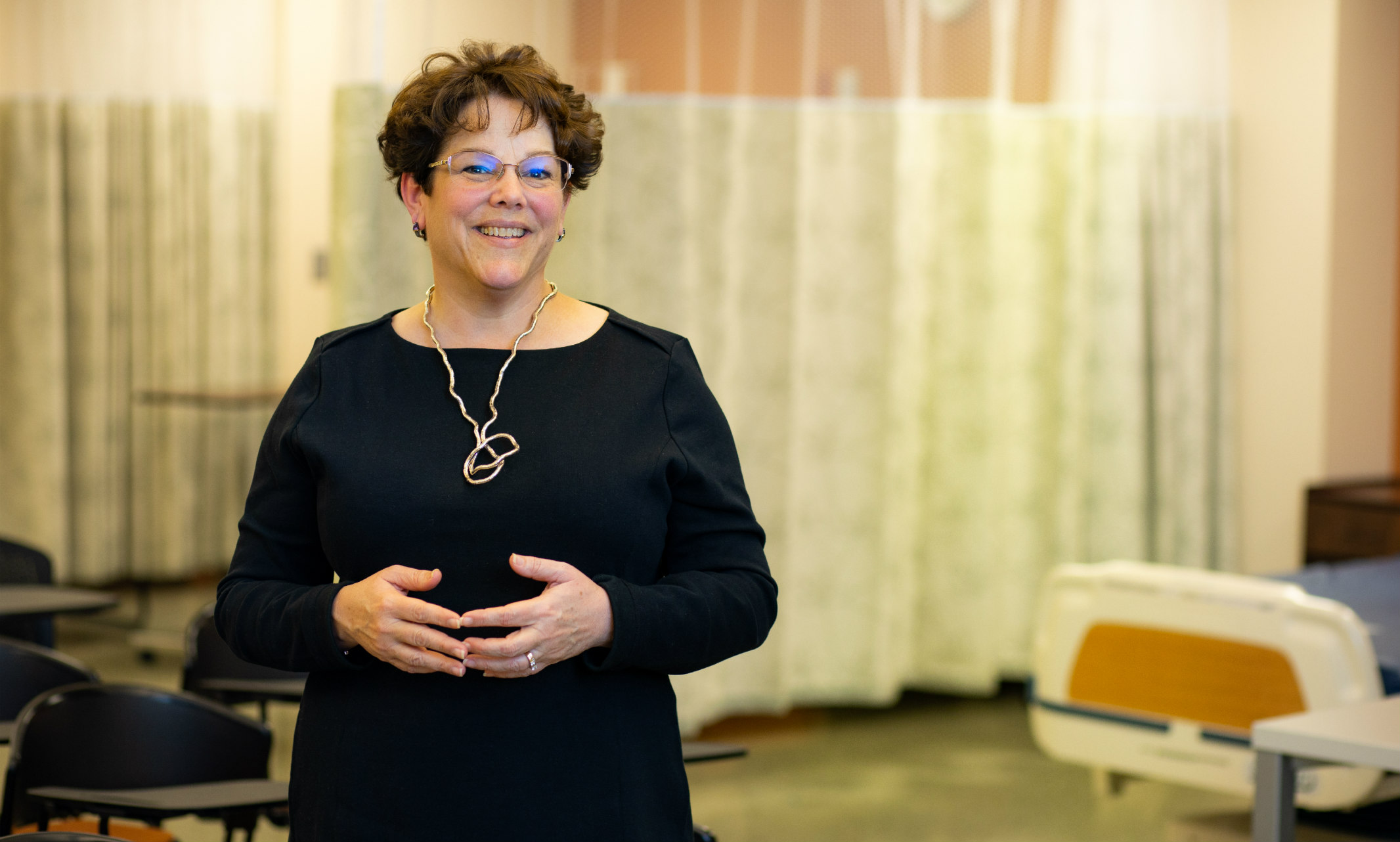
Joy Roberts’ CPR skills were pressed to action
Ever think about giving up a few hours for CPR training? You never know how important they can be.
That’s what Joy Roberts, interim dean at the UMKC School of Nursing and Health Studies, learned first-hand this month when her CPR skills were called to action.
Roberts and her daughter were attending a museum fundraiser in Columbia, Missouri. Her daughter, a Mizzou student studying textiles, was among those presenting artwork at the event.
While the crowd viewed the displays and mingled with refreshments, Roberts suddenly heard a loud crash, thinking someone had knocked over a table. But her daughter could see that a man had collapsed. “Mom,” she said, “you need to get over there.”
“With the holiday season right around the corner, I would encourage people to think about giving the gift of a CPR class to loved ones. As I know first-hand, it could really turn into the gift of life for someone else.” - Joy Roberts, interim dean at the UMKC School of Nursing and Health Studies
Roberts described the scene as chaotic, with people literally screaming and unsure of what to do. She reached the man at the same time as another patron was coming to help. That woman said she was an ICU nurse.
“Good,” Roberts said, “because I’m an old ICU nurse.”
The man had no pulse, no circulation and was not breathing. Roberts performed mouth-to-mouth and the other nurse did chest compressions. “When you’re in the thick of something like that, you have no sense of time,” said Roberts, who couldn’t guess how long they worked on the man.
Finally, he took a few breaths and they got a faint pulse – a sign it’s time to stop CPR. The man was still unconscious but was moving air on his own. Soon, emergency personnel arrived and transported him to a hospital. His current condition is unknown.
Fortunately, the delegation of duties worked out well for the two of nurses.
“She was quite a bit younger so it was probably for the best that she handled compressions,” Roberts said. “And I talk a lot, so I have a big oxygen capacity.”
As a nurse practitioner, Roberts has been called to scenes where her CPR skills were needed and she had access to other medical equipment. But this was the first case where she was armed with only her knowledge of CPR. And in this situation, it appeared the two nurses were the only patrons in the group that knew how to perform the life-saving procedure.
Roberts says it was unclear if the museum had an automated external defibrillator (AED), a portable device that can diagnose and treat life-threatening cardiac events. But she encourages people to note if and where their building has an AED -- and to learn how to use it.
“Knowing CPR is something that was really instilled in me at an early age. It’s such an important skill to have.” - Joy Roberts
Studies have shown that children as young as 9 can learn and retain CPR skills. Roberts was ahead of the curve, having her first CPR class when she was just 7 years old, part of her hometown’s community CPR training following the drowning of a local high school student.
“When you’re 7 and say, only 40 pounds, it’s not easy getting that mannequin’s lungs to go down,” she said.
Roberts took the training again in high school as a required class, something she hopes catches on in more districts across the country.
According to the American Heart Association, more than 350,000 emergency-medical-services (EMS)-assessed out-of-hospital cardiac arrests occur annually in the United States. Of that group, only 46 percent receive the immediate care needed before professional help arrives. “Knowing CPR is something that was really instilled in me at an early age,” said Roberts. “It’s such an important skill to have.”
Inspired by this experience, both her daughter and a UMKC faculty member have already signed up for CPR training - and the UMKC School of Nursing and Health Studies is training its students, faculty and staff Dec. 19. Roberts is encouraging other people and employers to do the same.
“With the holiday season right around the corner, I would encourage people to think about giving the gift of a CPR class to loved ones,” she said. “As I know first-hand, it could really turn into the gift of life for someone else.”
Be a Life Saver
The following groups provide CPR and other life-saving training:
American Heart Association
American Red Cross
The YMCA
In addition to these groups, many cities may offer these types of trainings. Contact your local municipality for more information.
Dec 03, 2019
David Van Horn, a chemistry professor at the University of Missouri-Kansas City, provides an in depth explanation to 41 Action News of what happens...
David Van Horn, a chemistry professor at the University of Missouri-Kansas City, explained that salt works by lowering the freezing point of water, preventing ice from forming on road surfaces. See the report.
Dec 03, 2019
10 students honored for academic excellence, leadership and service
Ten Roos will be honored as Dean of Students Honor Recipients this fall.
Graduating students who have excelled in both academic achievement and service may be nominated for the honor. This program recognizes the exceptional students who maintain high scholastic performance while actively participating in university and community leadership and service activities outside of the classroom.
Shahodat Azimova, School of Biological and Chemical Sciences, nominated by Tammy Welchert
Shelby Chesbro, School of Medicine, nominated by Jignesh Shah and Betsy Hendrick
Jordann Dhuse, School of Medicine, nominated by Stefanie Ellison
Lindsey Gard, School of Biological and Chemical Sciences, nominated by Mary Osbourne and Tammy Welchert
Fiona Isiavwe, Bloch School of Management, nominated by Jessica Elam and Krystal Schwenker
Leah Israel, School of Biological and Chemical Sciences, nominated by Tammy Welchert
Anna Lillig, School of Nursing and Health Studies, nominated by Ursula Gurney
Zach Randall, School of Medicine, nominated by Stefanie Ellison
Marcella Riley, School of Medicine, nominated by Nurry Pirani
Landon Rohowetz, School of Medicine, nominated by Peter Koulen and Betsy Hendrick
Dec 02, 2019
Stuart Hinds, curator of special collections and archives at UMKC University Libraries, was one of the local arts leaders sharing holiday tradition...
“It’s really more of an escape from the holidays, but I like to go by myself to Kauffman Memorial Garden, usually on or as close as possible to the winter solstice,” Hinds said. “I’m drawn to the dormant garden, because it’s a nice place to think about the year that’s passed and the year that is to be on that shortest day of the year — the day of transition from dark to light as the days get longer.” Read the story.
Dec 02, 2019
Study led by UMKC faculty physician suggests many heart surgeries are not necessary.
Some common heart procedures may be more common than they should be, a large-scale study led in part by a Kansas City doctor suggests. John Spertus is a cardiologist at Saint Luke’s Mid America Heart Institute and a professor at the University of Missouri-Kansas City. Read the story.
Dec 01, 2019
The American Dental Association featured the amazing story of a UMKC dental student who delivered a baby
Aliah Haghighat had just finished prepping her patient’s tooth before a restoration and was about to get the lead doctor to inspect her work, when her patient tells her something shocking. This story was also picked up by Becker’s Dental Review. Read the ADA story.
Nov 29, 2019
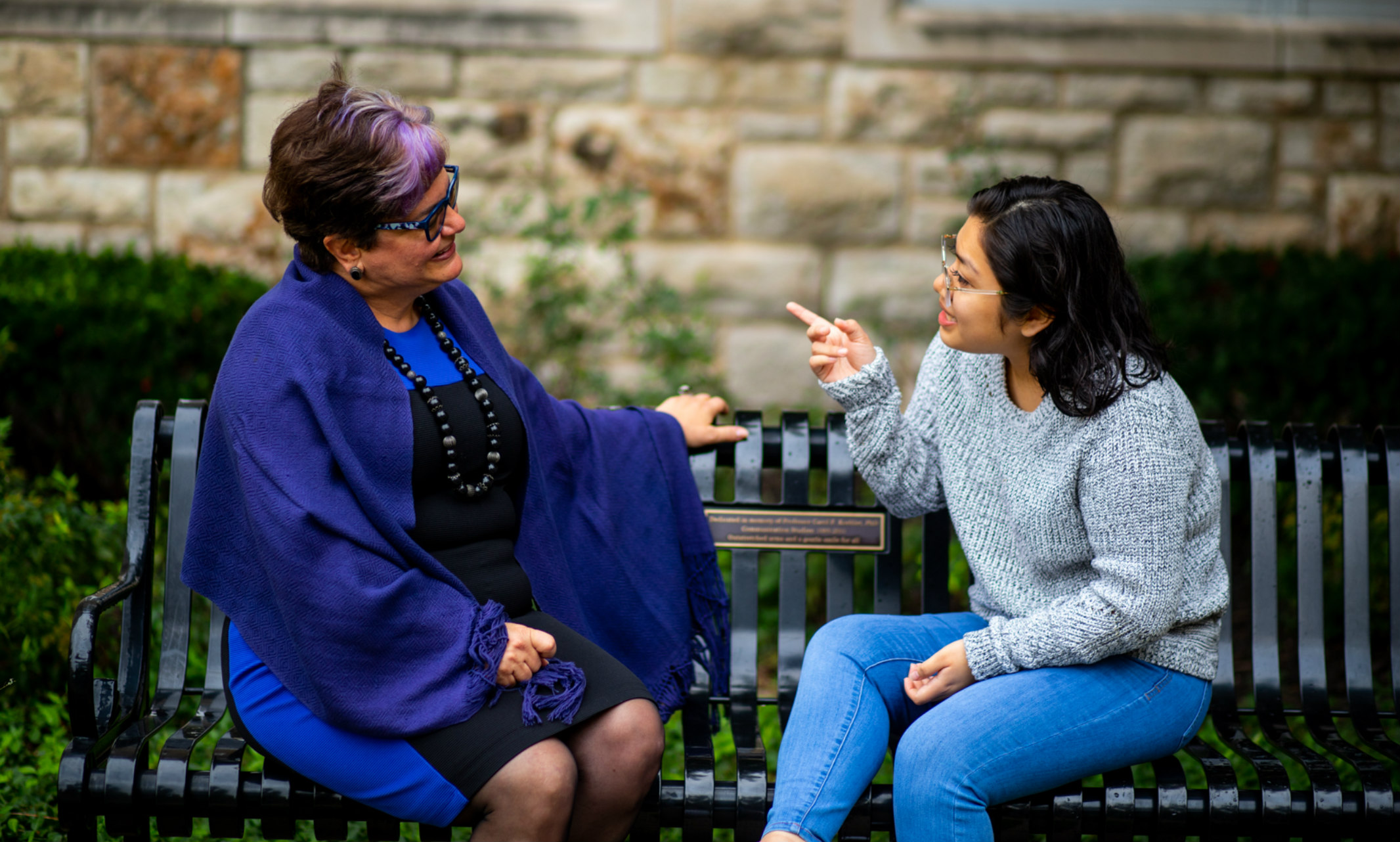
Mentor in the UMKC Avanzando program assists in journey
The heart of UMKC is our campus community. With lots of opportunities, it’s easy to develop student mentorship teams. And these rich relationships—our Dynamic Duos—are some of our best success stories.
When Aricela Guadalupe first arrived at UMKC, she spent a lot of time thinking about her parents - would she make them proud? Would she have what it takes to succeed in college?
As a first-generation college student, she was eager to take advantage of the opportunity she’d been given. But the path to graduation seemed uncertain.
“It was honestly scary, because you don’t know what to expect,” she says. “You doubt yourself. ‘Am I going to be able to do it? Am I doing this right?’ You don’t want to mess up.”
Guadalupe’s parents immigrated to the United States from a small Mexican village. Growing up, their main concern had been getting food on the table, not filling out college applications or studying for exams. They came to the U.S. so their children would have opportunities they’d never been able to aspire to.
Now, Guadalupe was living the dream her parents always wanted for her, but the transition to college was intimidating. Thankfully, she had an important resource to turn to: She was a member of the Avanzando program, which offers academic support and mentoring to Latinx students.
“It’s such a joy. It’s such a rewarding experience. And it’s a way of paying back all the opportunities I have had in life. If I hadn’t had mentors, I wouldn’t have come as far as I have.” - Clara Irazábal-Zurita
Through Avanzando, Guadalupe was connected with Clara Irazábal-Zurita, director of the Latinx and Latin American Studies Program and a professor in the Department of Architecture, Urban Planning + Design. Irazábal-Zurita quickly became a trusted friend and advisor, never more than a few buildings away on campus.
When asked how a mentor can help a student, especially a first-generation student like Guadalupe, Irazábal-Zurita’s answer is simple: They can help “with everything.”
“We’re here to be friends, to be companions in their journey of education, of growing up in general and maturing as people,” she says. “It is important that students have an opportunity to chat with others who can guide them through the experience, and sometimes even vent with the frustrations that come naturally with that process of growth.”
For Guadalupe, knowing she has a friend and advisor just a call, text or email away has made the college experience a lot less scary.
“I just know she’s there, that I have someone to go to to ask for guidance and advice,” she says. “I know I have someone to talk to.”
Guadalupe, a business administration major with an emphasis in management, says her goals for the future are to graduate from college and begin a career she likes, whatever that may be. She is also learning more about her history and culture as a Latinx and Latin American Studies minor.
She dreams of owning a business of her own someday, but for now, she’s happy with what she’s pursuing at UMKC: studying, networking and meeting new people in groups like Avanzando and the Latinx Student Union.
“I just know she’s there, that I have someone to go to to ask for guidance and advice. I know I have someone to talk to.” - Aricela Guadalupe
Her advice for future students? Don’t be afraid to put yourself out there or ask for help.
“Don’t be scared. Just talk to people,” she says. “Because everyone is going through the same thing. You never know, maybe they’re scared to make friends, too.”
Irazábal-Zurita also has a message, but for the parents and families of new college students.
“Instead of advice, I would want to congratulate families in general, and Latino families in particular, because they invest a lot in supporting their children to come to college and to do well in college,” she says. “Keep doing what you’re doing and realize that this is an investment for the long term.”
Mentoring students like Guadalupe, she says, is just as beneficial for her as it is for the students.
“It’s such a joy. It’s such a rewarding experience,” she says. “And it’s a way of paying back all the opportunities I have had in life. If I hadn’t had mentors, I wouldn’t have come as far as I have. I wouldn’t be where I am today. It’s very important for me to help out - to be that building stone for others who come behind me.”
Learn more about the Latinx and Latin American Studies Program
Nov 26, 2019
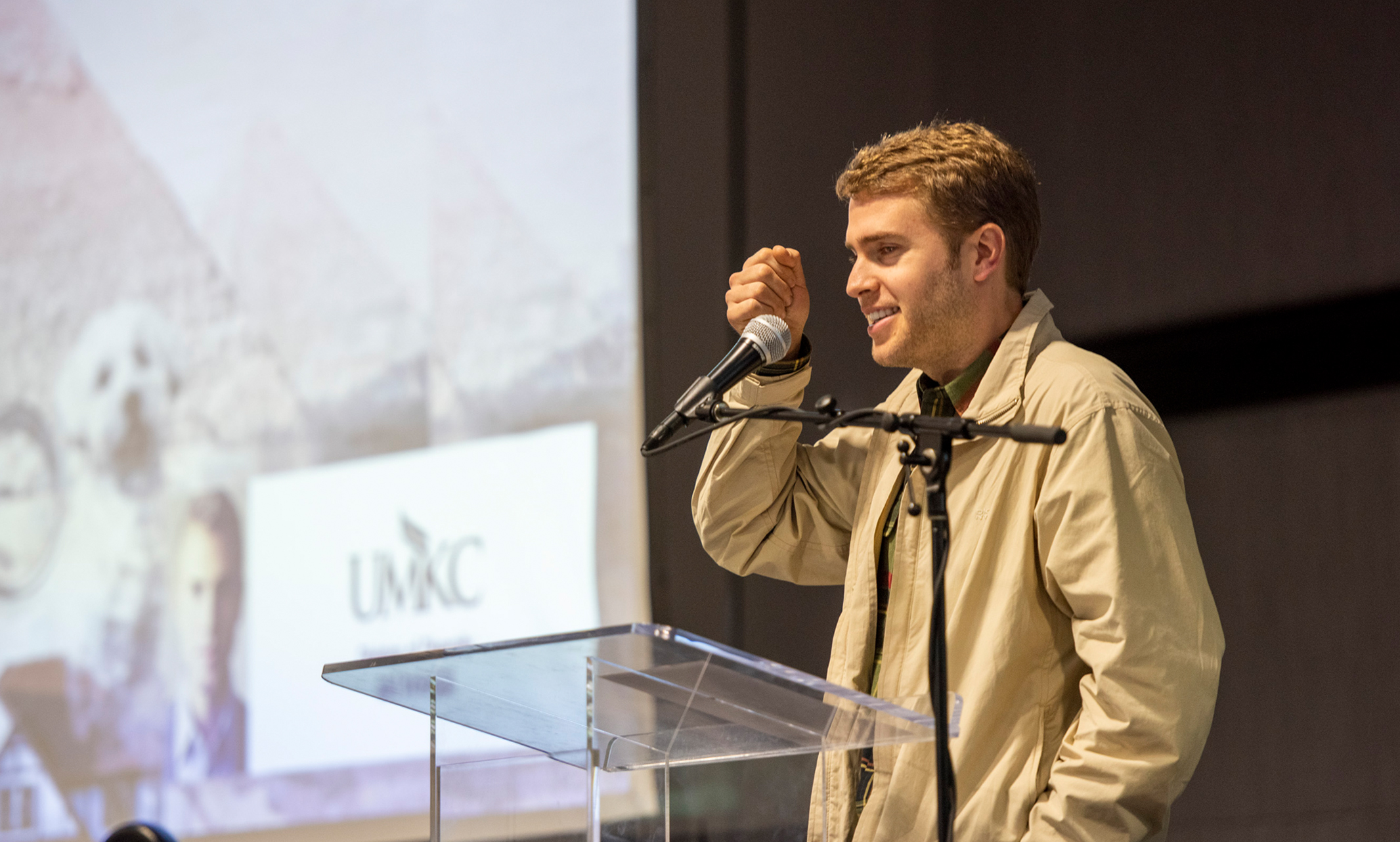
Shane Bitney Crone’s story is the topic of a documentary
Shane Bitney Crone was banned from the funeral of the love of his life. He went unmentioned at the ceremony and in the obituary. His partner’s family turned on him because he was the other half of a loving, committed gay couple. Crone shared his sorrow and ongoing recovery at the 13th annual UMKC Pride Lecture Nov. 21.
For Crone, telling his story is hard. But necessary, he said.
“It is so important that we have these conversations and share these stories, because it’s in telling these stories that we open people’s hearts and minds,” he said.
Crone and his partner, Tom Bridegroom, had been living together for more than five years when Bridgegroom fell to his death from a rooftop in 2012 while seeking a better angle for a photograph. As a couple, they traveled the world, started a successful business and promised to get married when it would be recognized by the federal government.
After the fall, Crone was initially not permitted to enter Bridegroom’s hospital room, though sympathetic hospital staff eventually ignored the rules and let him in. Bridegroom’s family had all the legal rights to his body, property and services. They shut Crone out completely, refusing to even tell him the day, time and site of the funeral.
On the one-year anniversary of Bridegroom's death, Shane uploaded a video to YouTube called "It Could Happen to You." His goal was to demonstrate that common humanity that we all share. The video went viral within a matter of days and has since been viewed more than 20 million times on social media.
“It is so important that we have these conversations and share these stories, because it’s in telling these stories that we open people’s hearts and minds.”
Hollywood producer Linda Bloodworth-Thomason was inspired by the video and approached Crone about turning his story into a feature-length documentary. The film, “Bridegroom: A Love Story, Unequaled,” premiered at the 2013 Tribeca Film Festival where it was introduced by former President Bill Clinton.
Today, Crone travels the world to show the film and, more importantly, ignite conversations that he hopes will lead those prejudiced against the LGBTQIA community to open their hearts and minds to think in different ways.
After showing the film, Crone took questions from the audience. One asked how he managed to pick up the pieces of his life following that painful tragedy.
“That first year was dark,” Crone responded. “I reminded myself what Tom would have wanted, and he would not have wanted me to stay in that space.”
In the seven years since Bridegroom’s death, Crone has become a speaker and activist, and found a new love. He’s now engaged.
“I want to think that Tom would be happy for me.”
Nov 25, 2019
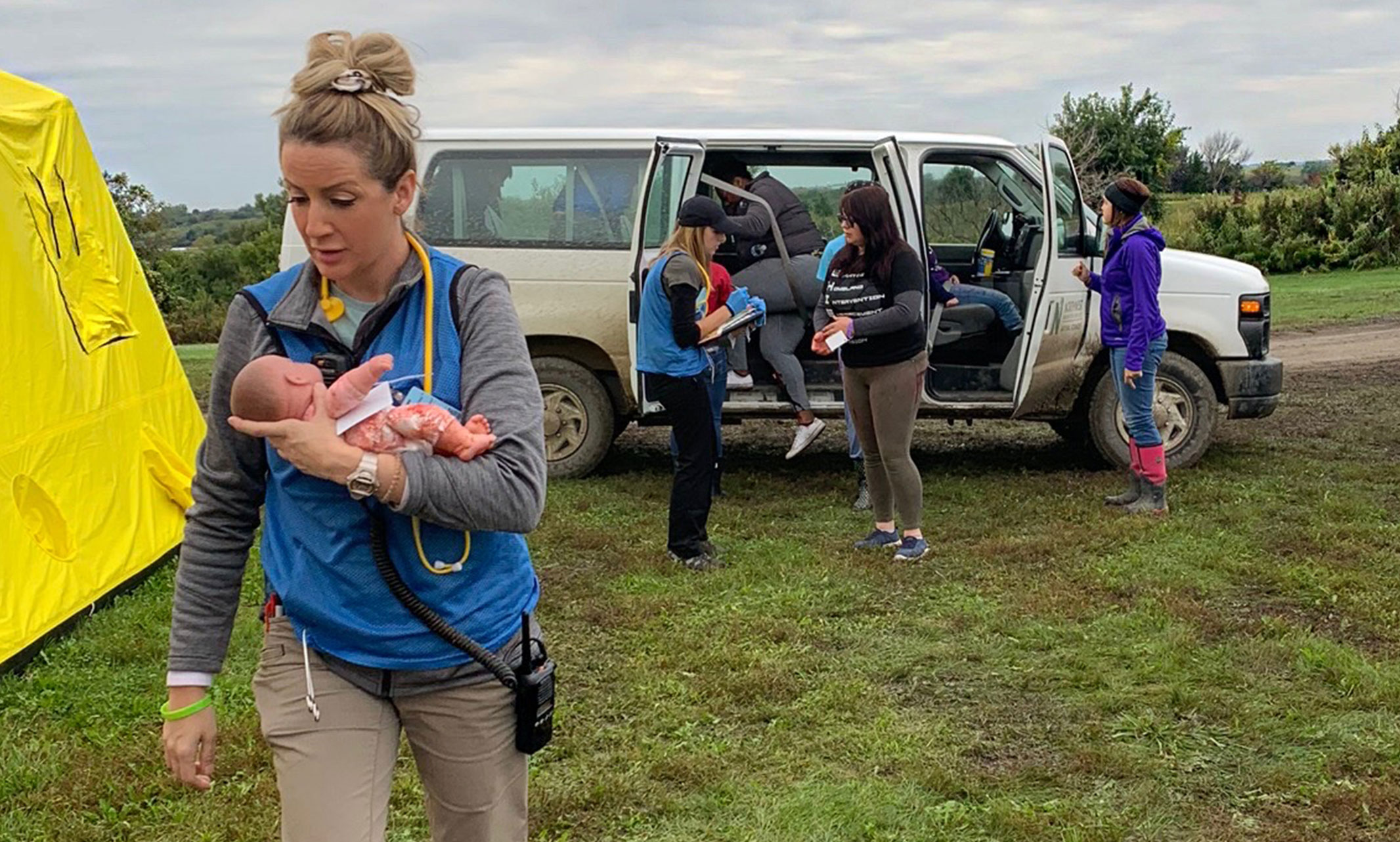
Large-scale emergency preparedness event held in Missouri
For Julie Miller, treating 65 patients in three hours in a makeshift medical tent really brought home the importance of being prepared when faced with the unexpected. Miller, a UMKC nursing student, recently participated in Missouri Hope, a national emergency preparedness event held each year at Northwest Missouri State University in Maryville.
Presented by the Consortium for Humanitarian Service and Education, the $2.4 million immersion exercise prepares students and professionals to manage a community’s needs when disaster strikes. Complete with patient actors, students are challenged with emergency scenarios including a water rescue and several mass casualty situations. They also participate in a high-ropes course, designed to help train for patient transports when steps or elevators are unavailable due to building damage or power outages.
Sharon White-Lewis, an assistant professor at UMKC, led a group of 16 students during Missouri Hope, which spans four days and three nights. UMKC was one of two nursing schools in the country providing student participants, who were joined by members of the military, homeland security, fire fighters and police.
“The Missouri Hope exercises are the only immersive exercises that train students to prepare for our worst days,” said White-Lewis. “Nurses deployed to these disasters are thrust into circumstances facing devastating destruction, dangerous situations and ethical dilemmas, all while trying to help survivors with severely limited resources and personnel. As the world keeps facing both man-made and natural disasters, our UMKC graduates will be prepared.”
According to Miller, at the time the opportunity was presented, there has been a deluge of natural disasters in the news. “A string of tornadoes and hurricanes had just happened, and I would sit and think, I wished there was something I could do that would be helpful.”
Missouri Hope was the answer.
The UMKC Nursing and Health Studies Alumni Board also saw the importance of this experience and offered its support. Because disaster simulations require supplies students normally wouldn’t have – such as disposable stethoscopes, duct tape and mylar blankets – the board stepped in and provided funding to acquire these items for the students.
By design, participants aren’t given a great deal of prep or lead up before the exercise, said White-Lewis, as organizers want to stay as close to the reality as possible. But she does provide students training in a few care techniques that are unique to emergency situations: makeshift gurneys and wound coverage, improvised splints and emergency triaging.
Miller said triage is particularly hard on health-care providers as it goes against everything they’re taught. For example, in a hospital, nurses work to make sure patients have all the care needed to get back in good health. But in an emergency, it’s a judgment call on how much time to spend on each patient.
“When you’re out at a disaster and there are 50 victims in a field, you have to figure out how you can do the most good for the most amount of people,” said Miller. “On the spot, you have to perform a rapid assessment and decide if you can help that person or not and sometimes, you have to make hard decisions.”
“With 3 million nurses in the United States alone, the more nurses that know what to do in a disaster, the more we maximize our ability to save lives. It’s as simple as that.” - Sally Ellis Fletcher
Miller says the exercise felt like a real disaster from the moment it began. She compared it to her experience in the UMKC patient simulation lab, where students interact with high-tech mannequins. While that offers valuable learning, it can feel artificial and require a bit of acting, she says. But at Missouri Hope, there was no feeling of having to act, as she treated every patient with the immediacy of an actual disaster.
The Consortium for Humanitarian Service and Education sponsors two other Hope initiatives – one in New York and one in Florida. All three provide unique disaster scenarios that would apply to that particular geographic area. Last year, UMKC students and faculty took part in both Florida Hope and New York Hope, and the school plans to continue that effort.
Sally Ellis Fletcher, associate dean of students at the school is a strong advocate for disaster preparedness opportunities for students. She believes these experiences will have lasting effects. “Disasters aren’t planned; they can happen anywhere or at any time,” she said. “With 3 million nurses in the United States alone, the more nurses that know what to do in a disaster, the more we maximize our ability to save lives. It’s as simple as that.”
Learn more about the School of Nursing and Health Studies
Nov 20, 2019
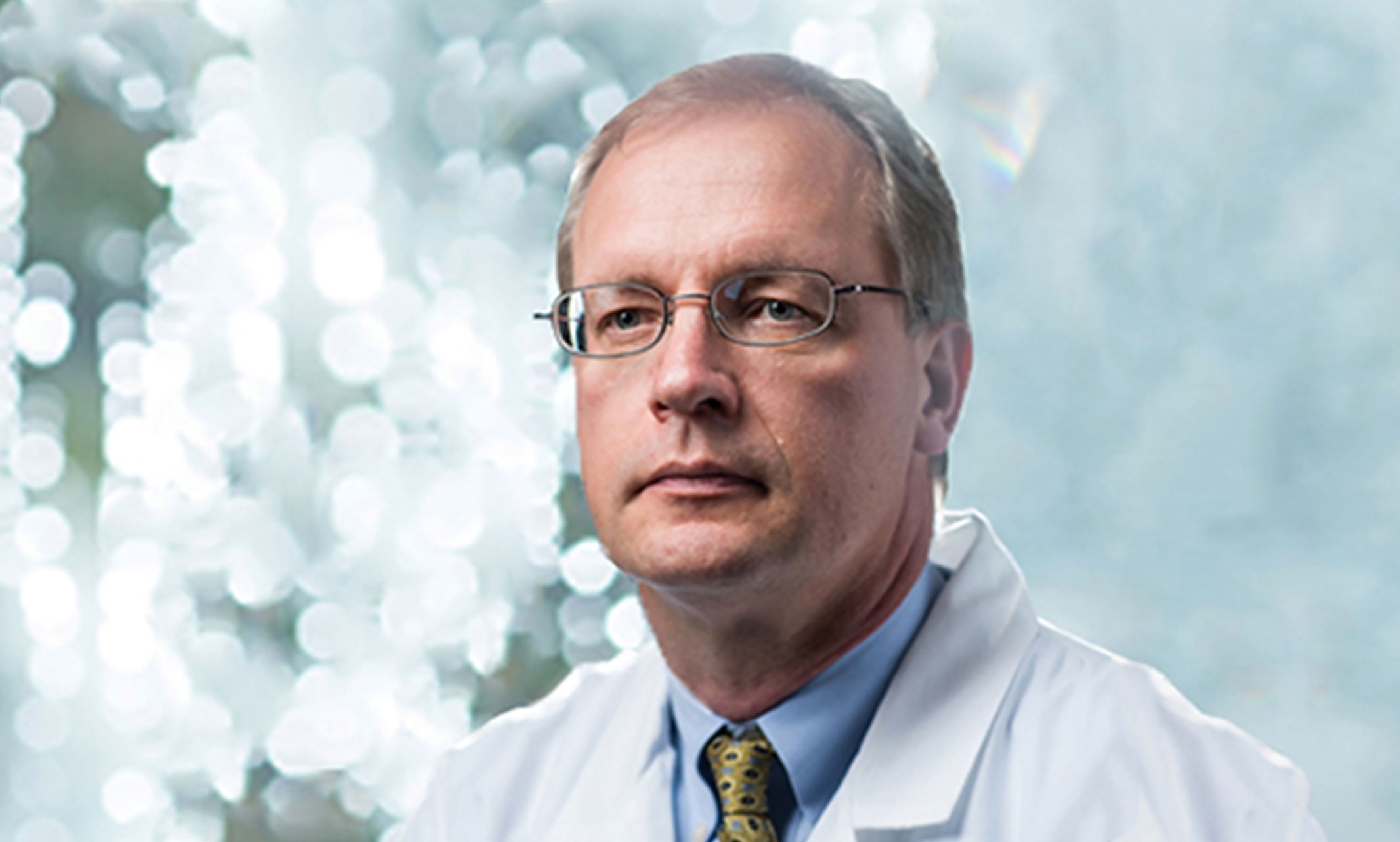
Peter Koulen is part of $1.5-million NIH grant working on novel tissue-preservation method
Surgeons around the world currently perform more than 240,000 corneal transplants a year to address a wide range of eye diseases. Researchers and physicians, however, estimate as many as 10 million patients could benefit from the procedure if enough viable tissue was available.
The University of Missouri-Kansas City Vision Research Center is part of a $1.5-million National Institutes of Health grant-funded project exploring the capability of a novel, ultra-fast technique of cryopreservation — the use of extremely low temperatures to preserve living cells and tissues — that could help meet those far-reaching clinical needs in ophthalmology and a number of other fields of medicine.
The NIH awarded a grant to CryoCrate, a Columbia, Missouri-based company active in biomedicine working with the University of Missouri-Kansas City Vision Research Center. The new two-year award is for $1.5 million and includes a subcontract of $722,870 to the UMKC Vision Research Center. It is a follow-up NIH grant for earlier collaborative work between CyroCrate and UMKC.
With current techniques, many types of cells and tissues, including cornea tissues, cannot be preserved at all or lose their function when subjected to the freeze-thaw process of cryopreservation. Peter Koulen, Ph.D., professor of ophthalmology, endowed chair in vision research at the UMKC School of Medicine and director of basic research at the UMKC Vision Research Center, and Xu Han, Ph.D., president and chief technology officer of CryoCrate, jointly developed a new cryopreservation technique to preserve the viability and functionality of cornea and bioartificial ocular tissues. This new phase of funding will allow Han and Koulen to extensively test and refine the technology before taking it to the clinics.
So far, traditional methods of cryopreservation have been unsuccessful to preserve and store human corneas for use in patients because cells critical for cornea function are lost during freezing. Corneas need adequate numbers of such cells to be present and properly functioning in the grafted tissue for the surgery to be successful. This currently limits storage of corneas to refrigeration, which is insufficient in delaying the deterioration of cornea tissue beyond a few days and creates numerous clinical challenges shared by other areas of transplantation.
CryoCrate is headquartered at the Missouri Innovation Center. It commercializes a new cooling method that better preserves tissue in a frozen state with only negligible mechanical damage to the tissue. The technology is co-developed and co-owned by CryoCrate and UMKC. It also eliminates the need for so called cryoprotectants, chemicals that facilitate successful recovery of live tissue from freezing, but pose a range of medical and regulatory challenges. International patents pending and patents by CryoCrate and UMKC protect the technology and will enable CryoCrate and Koulen’s team at UMKC to address the urgent worldwide clinical needs and rapidly evolving fields of transplantation medicine.
The new funding allows Han and Koulen to further develop an upgraded system that is equally effective in the cryopreservation of whole corneas and large bioartificial tissue. This would enable long-term storage of the tissues and could make them more readily available when and where needed for clinical use and research.
Early tests at the UMKC Vision Research Center detected no statistical difference in the number and quality of the cells that determine cornea health and function when comparing corneas cryopreserved using the new technology with fresh cornea tissue. This level of efficiency in preserving corneal tissue has not been achieved before with traditional corneal cryopreservation techniques.
If further tests prove to be equally effective, the goal is to introduce the new cryopreservation products for clinical use in patients following completion of the new grant and regulatory steps of product development.
Nov 20, 2019
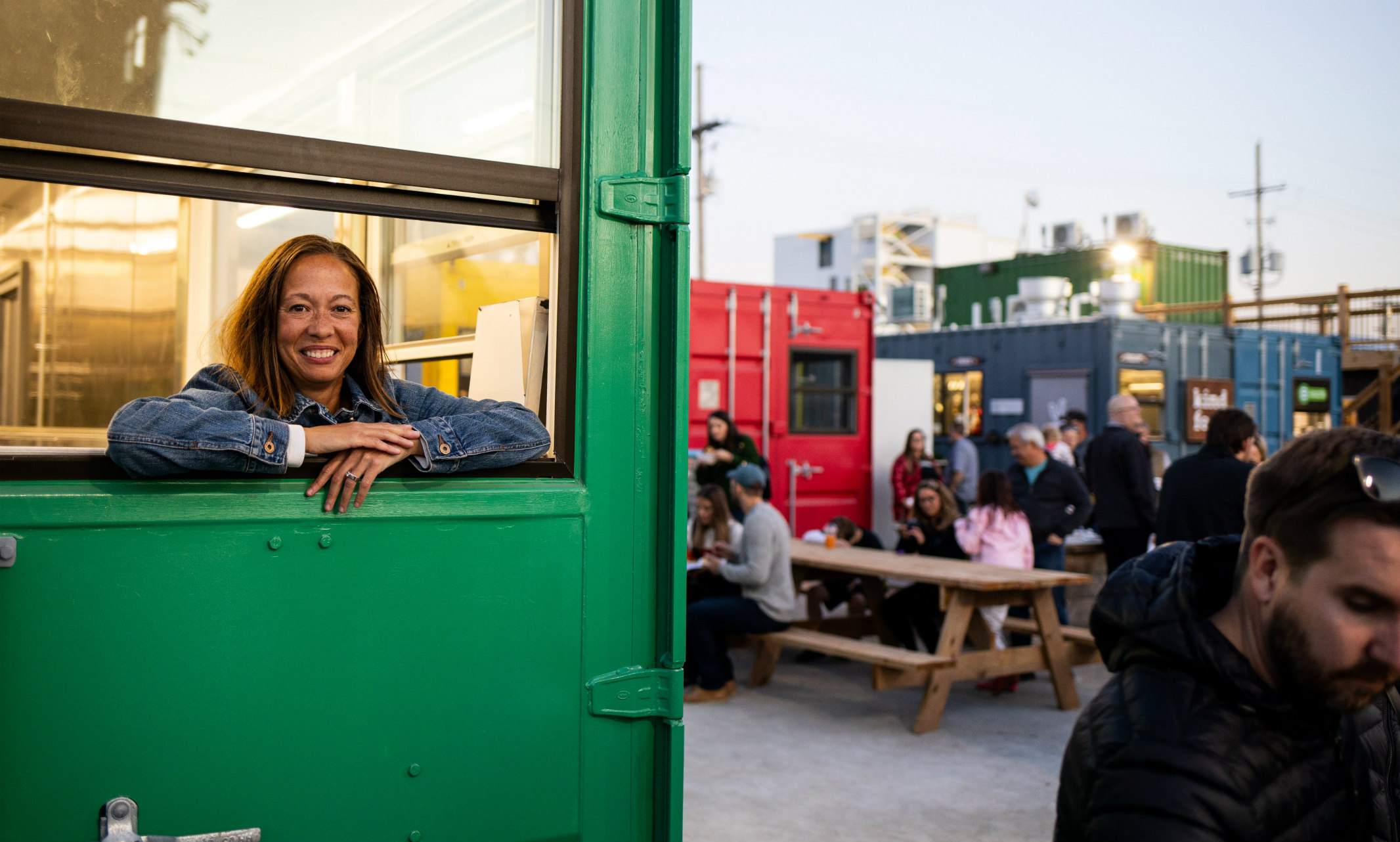
Rachel Kennedy Cuevas founded Iron District, an innovative dining and retail court made of shipping containers
Big things come in small packages. Rachel Kennedy Cuevas’ new business development is proof of the proverb.
Cuevas (B.B.A. ’98) is the brains behind Iron District, a new restaurant-retail destination made of 18 shipping containers in an industrial neighborhood at 16th and Iron in ever-growing downtown North Kansas City. The container park is a rare hybrid of two popular fast-casual dining concepts: food trucks and food halls.
Cuevas takes a small group on a tour of the containers, where red, green, yellow and blue boxes — some double-stacked — form a rectangle where picnic tables are arranged inside the center forcommunal eating.
“There’s not much like this in the U.S. except in Las Vegas,” Cuevas says. “And the businesses there are mostly bigger brands.”
The Iron District containers — including one with a rooftop bar — offers plenty of home-grown eating and beverage options to choose from: vegan, ice cream, coffee and even an avocado bar. And it’s her own Cuban fusion restaurant, Plantain District — originally a food truck — that led to the Iron District in the first place.
Cuevas founded Plantain District after eating a Cuban sandwich with her husband, Yvan Cuevas (B.B.A. ’98, MBA ’00), who had lived in Cuba. The two met while they were students at the Bloch School of Management. After taking a few bites, she had a revelation: “I can make something better.”
“The food truck thrived because I had the business education and hired chefs to do the cooking — a recipe for success,” Cuevas says. “UMKC, through the Bloch School, gave me the business background, and that’s why I’m now a developer working with other entrepreneurs.”
After its creation in 2014, Plantain District motored along swiftly, catering at food truck rallies, corporate events and weddings. But the nature of the business made Cuevas anxious: a livelihood based on an expensive kitchen that could be sidelined by a flat tire.
“It means collaborating with others. It means fostering a community, which is one of my favorite parts of business.” — Rachel Kennedy Cuevas
Though her fears never played out, they led to the Iron District concept. The size of shipping containers are roughly the same dimensions as food trucks and don’t include the threat of engine failure. She pitched the concept to North Kansas City leaders and was greeted with enthusiasm.
“It means collaborating with others,” Cuevas says. “It means fostering a community, which is one of my favorite parts of business.”
After more than two years of working on the container park, Iron District finally opened in October 2019. Vivid art murals greet customers from the sides of the containers, along with a diversity of culinary options. Cuevas fervently talks about future plans, including adding walkways between containers.
Cuevas considers Iron District a proof-of-concept incubator for startups. The restaurants and businesses, including clothing boutiques and a wellness center with a rotating schedule of yoga and massage practitioners, have short-term leases. One container is devoted to conference space and can be rented hourly to entrepreneurs for meetings.
“If any businesses outgrow their space, I’ll consider that a win,” Cuevas says. “It means they can attribute some of their success to what we’ve built at the Iron District.”
This story orginally appeared in Perspectives magazine, vol. 29.
Nov 20, 2019
David Van Horn, associate chemistry professor, talked to KSHB about rock salt variations that are harmful to pets and the environment
“When you go to the store, you will now find a magnitude of products. Some get down to different freezing levels...typically any salt [sodium chloride] will work. Some are touted as being more environmentally safe or pet friendly, so those are with calcium chloride or magnesium chloride as their ingredients,” David Van Horn, associate chemistry professor at University of Missouri-Kansas City, explained. More.
Nov 20, 2019
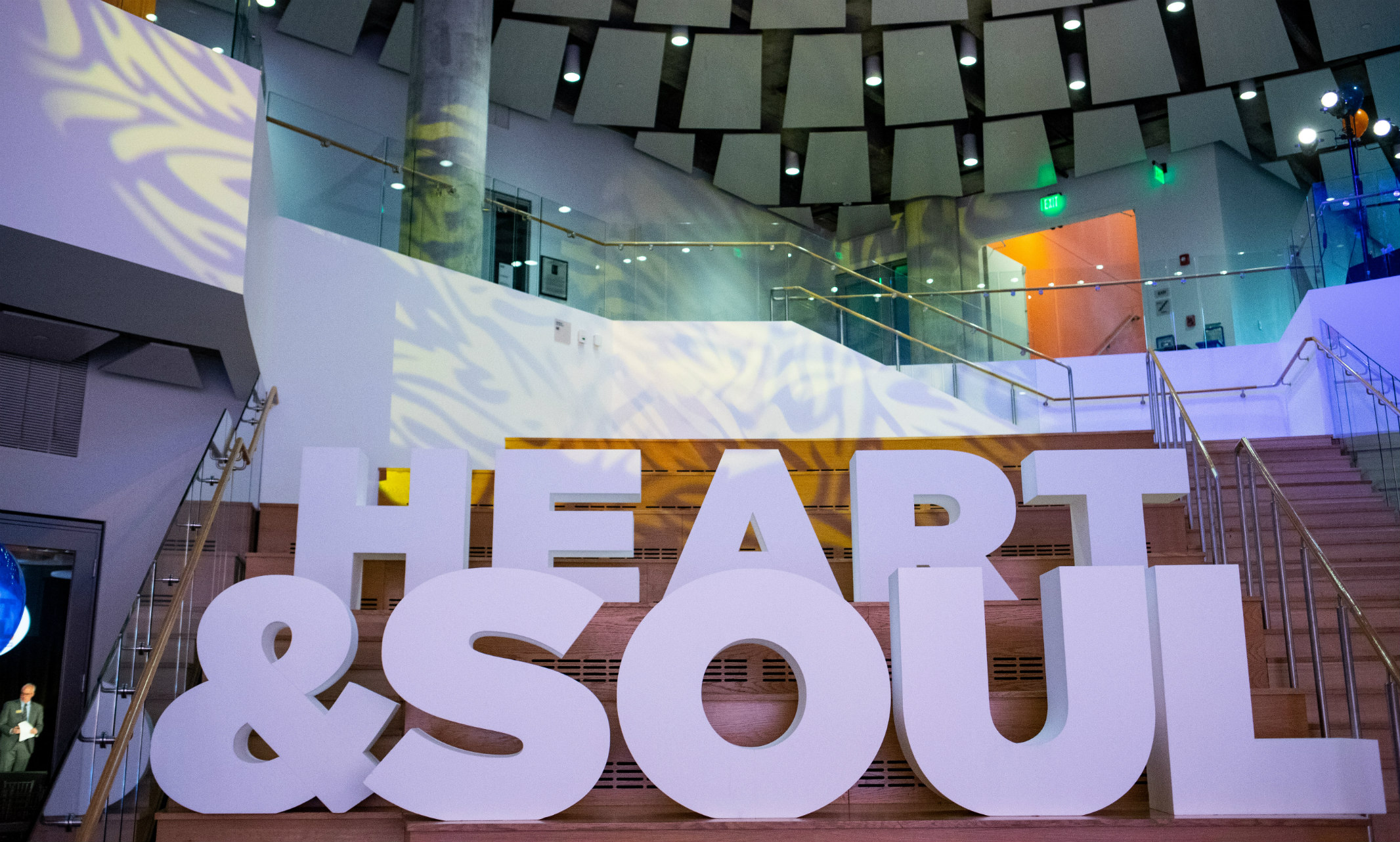
34th annual celebration recognizes Cerner founders and Kansas City leaders
“Everything that Henry touched was heart and soul first,” said Roasterie founder Danny O’Neil in a warming tribute to the late Henry W. Bloch.
That’s just one of the many lessons Bloch shared with a community of entrepreneurs who sat at his feet and sought his wisdom. And, in true Henry Bloch fashion, the 34th Entrepreneur of the Year Awards, hosted by the UMKC Henry W. Bloch School of Management, was celebratory of the collaborative work it takes to turn dreams into reality.
“In the past few years, we’ve been saying ‘let’s make Kansas City America’s most entrepreneurial city,’ and we’ve worked together to make that happen,” said UMKC Innovation Center Director Maria Meyers, the Marion and John Kreamer Awardee for Social Entrepreneurship. Meyers founded KCSourceLink, a repository of resources for entrepreneurs in the Kansas City region that has been replicated across the nation.
Many of the 2019 honorees shed light on their climbs to success, the leaps of faith it took to get their ideas off the ground and the support from the Kansas City community it took to not give up. People, passion and persistence were the rippling themes of the evening.
“Persistence is the most important character trait for an entrepreneur. It’s essential for success,” said Kansas City Entrepreneur of the Year Michael Rea. “During the difficult times, knowing what you’re fighting for will get you through.”
“Kansas City is a town built by entrepreneurs,” - Cerner co-founder Cliff Illig, International Entrepreneur of the Year/Entrepreneur Hall of Fame inductee
Rea, founder and CEO of Rx Savings Solutions, added that he didn’t start his company because he thought it would make him rich but because he thought it was the right thing to do.
“If you’re not actually creating a change or making a difference in someone’s life, so what?” repeated Zach Anderson Pettet, managing director of Fountain City Fintech at nbckc bank, in his recollection of lessons Bloch passed down.
“Through their entrepreneurial spirits, our honorees have shown what it takes to grow an idea into a successful business and that education these days is more than just about landing your dream job. Education, now, is about creating your dream job,” said Brian Klaas, dean of the Bloch School. Which is what junior business administration major, Ali Brandolino, leans on to find her drive and success in college – through entrepreneurial experiences as a member of UMKC Enactus.
“I’ve realized that my idea of entrepreneurship wasn’t changing the world myself, but inspiring others to change the world. I’m a social entrepreneur and I hope to create my own social venture someday,” said the Enactus vice president and Student Entrepreneur of the Year.
“There’s a long-existing theory that suggests when you dream out loud – when you speak your ideas into the universe – they are more likely to come back to you,” said Tom Bloch. “We could say that’s what happened for Cerner co-founders and Entrepreneur Hall of Fame inductees Neal Patterson, Paul Gorup and Cliff Illig.
From an idea generated around a park bench to one of the largest healthcare technology companies in the world 40 years later, Cerner employs more than 29,000 associates in 26 countries worldwide. Illig shared gems from the founders’ journey for attendees to take away.
Treat employees as business associates
Create a collaborative culture to tackle complex problems together
Share the success with your team
Get all of your employees in a room and talk
“I’ve realized that my idea of entrepreneurship wasn’t changing the world myself, but inspiring others to change the world." - Ali Brandolino
“Kansas City is a town built by entrepreneurs,” said Illig. Recalling words from co-founder Neal Patterson, he said “the only way that Kansas City can grow and thrive is through the efforts of its entrepreneurs. We’re not going to attract the big national companies to relocate or headquarter in our city. We have to grow our own.”
All proceeds from the Entrepreneur of the Year awards directly benefit the Regnier Institute for Entrepreneurship and Innovation’s student and community programs. The Regnier Institute at the Bloch School focuses on connecting students and community members with a comprehensive combination of world-class research, renowned faculty, cutting-edge curriculum and experimental programs driven to deliver results and nurture the next generation of entrepreneurs.
Learn more about the Regnier Institute
Nov 18, 2019
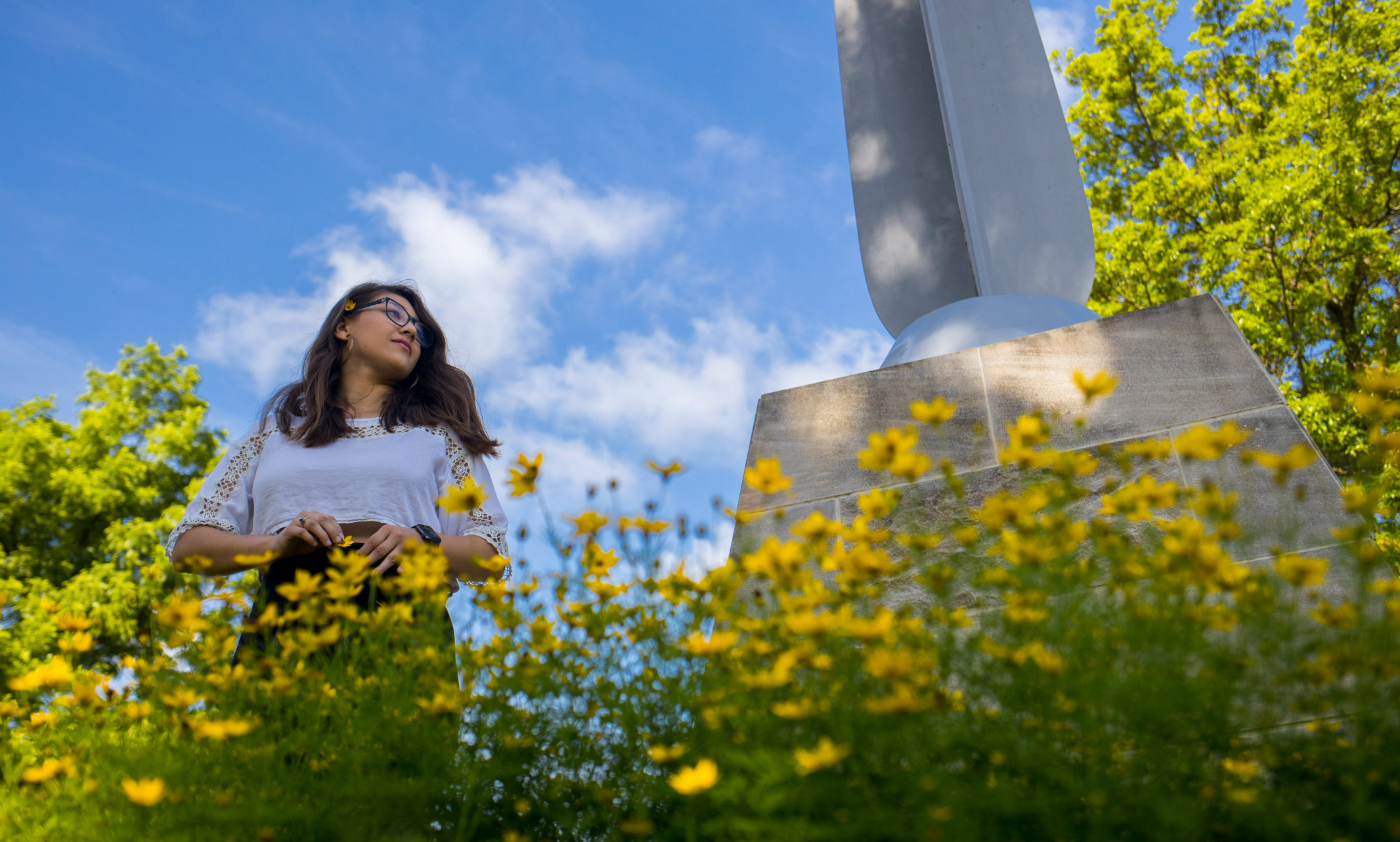
Student ambassadors take you on a quick tour
As campus ambassadors, we’re always showing prospective students all around UMKC. There are a ton of cool spots to snap a pic. Here are five of our favorites – all within about a short walk around the Volker Campus.
1. Miller Nichols Library and Learning Center
The library is a great place to hang out because not every place is a quiet spot, plus it’s super photogenic. The Minecraft-esque lime-green-and-emerald study area as you enter literally has us leaping for joy.
2. UMKC Student Union Rooftop
Of course we need to mention nearly every student’s favorite spot to hang when the weather’s still nice. There are lots of fun angles – whether you’re lounging atop or looking at it from afar.
3. Big Stairs on Oak Street
This pedestrian gateway to Volker Campus is one of the most defining features of UMKC. As you walk up — and up, and up — you’re surrounded by scenes of campus and Kansas City. Another bonus: you get a decent workout.
4. Archipenko Sculptures
Plenty of other colleges have typical, traditional columns, but few can claim a pair of funky abstract sculptures by the internationally-acclaimed Alexander Archipenko, who was an artist-in-residence at UMKC. Fun fact: the two painted, sheet-iron sculptures are actually identical — one is just rotated 90 degrees from the other to give the appearance of two different sculptures.
5. Epperson House
Everyone wants to go inside this 56-room Tudor-style mansion that was built in 1923, but it’s closed to the public until a future use of this turreted, brick building is determined. However, it’s definitely an interesting enough place to snap a selfie. The house’s claim to fame is that it’s reportedly haunted – boo!
Nov 18, 2019
News 3 Now and Channel 3000 in Wisconsin picked up a story from Matt Egan, CNN Business, about UMKC Alumna Mary Daly
Mary Daly earned her bachelor’s degree in 1985 in economics and philosophy from the University of Missouri-Kansas City. That’s when she achieved what she calls her “escape velocity.” A podcast interview by CNN’s Poppy Harlow is also available online. Read the Channel 3000 story.
Nov 16, 2019
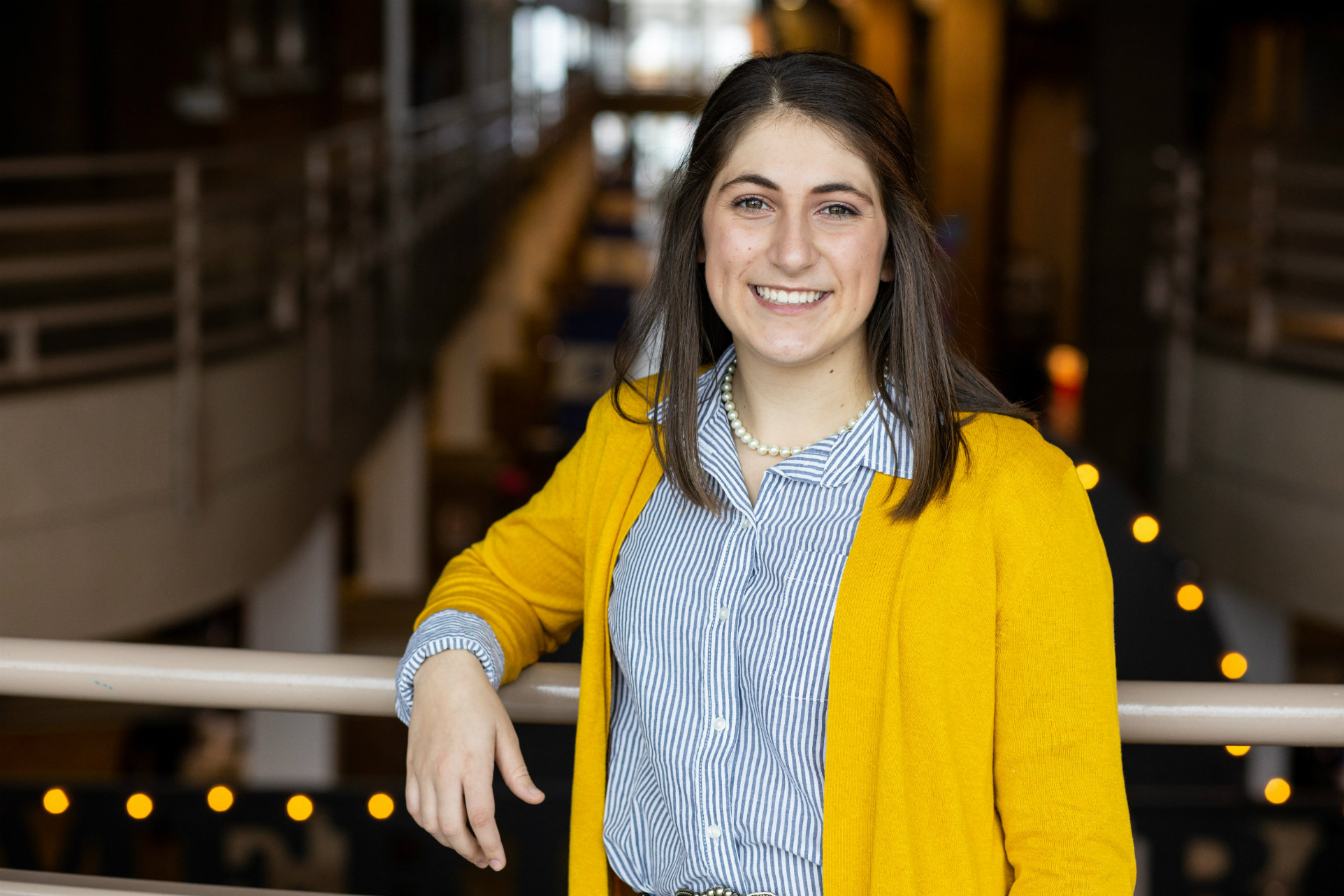
While Marlena Long grew up caring for livestock, her lifelong plan has been curing patients
Marlena Long '25Hometown: Paris, MissouriHigh School: Paris High SchoolDegree program: Six-year B.A./M.D.
Marlena Long has always loved science. But it was her exposure to life, death and medicine—through farm life and personal experiences—that led her to the six-year B.A./M.D. program at UMKC.
“My grandfather died when I was 7 years old. We would travel to the cancer center in Columbia, Missouri, and I would sit with my grandpa while he received chemotherapy treatments,” Long says. “I noticed how the doctors and nurses made my grandpa feel better, and I knew that I wanted to do that someday. Ever since then, I have dreamed of being a doctor.”
Long shadowed with a cardiologist while she was in high school. Just as the medical professionals who treated her grandfather influenced her, this experience further confirmed her interest in becoming a doctor.
"I have learned so much about myself in just the first month at UMKC. Now I know I have a very bright future in front of me if I continue to work hard." Marlena Long
Long completed her associate’s degree at Moberly Area Community College before coming to UMKC. She says the classroom experience gave her an idea of what to expect, but getting acclimated to college life has been different.
“The courses have been intense,” Long says. “I have been able to learn so much in my short time here due to my professors working so hard to make sure I understand what I need to for my future. But there are advantages, too. Not taking the MCAT decreased the time I need to receive my degree, and I’m able to start clinic work my first year.”
While Long is taking her studies seriously, she is also making the time to make connections.
“I didn’t know my roommate before school started, but we are close friends now. All my friends have different backgrounds, but I’m the only farm kid,” says Long, who grew up raising pigs and cattle on her family farm through 4-H and the National FFA Organization. “They are really curious about it. I’m planning a trip home with them this winter so that they can see the piglets that I’ll be showing next summer.”
While Long grew up exposed to the practice of animal medicine, she was never interested in being a veterinarian.
"The biggest advantage is understanding the circle of life."
“That seems like my parents’ life,” she says. “My mother works at BASF (a company that develops chemical products for agriculture with a focus on sustainability). She told me she may be able to help me get a job in that business. But I want to be a doctor.”
Regardless of her career choice, Long does value her experience growing up on a farm.
“There’s so much responsibility. When it’s snowing outside on Christmas morning, you still have to go outside and heat up the water for the animals to drink,” she says. “But the biggest advantage is understanding the circle of life. I’ve seen animals be born, do all the things they are supposed to do and then pass away. I learned that so early.”
Long showed her pigs at the American Royal this fall. She’s confident and comfortable moving through the rows and pens of the livestock. While she is very independent, she still visits home a lot and has one foot firmly on her home turf.
“I’m going to be a doctor, but I don’t think I’ll ever stop showing pigs.” Long smiles and nods slowly. “I mean, my kids will show pigs.”
Nov 14, 2019
From the Kansas City Business Journal: The UMKC Bloch School Entrepreneur of the Year awards program honors several entrepreneurs
The University of Missouri-Kansas City Regnier Institute for Entrepreneurship and Innovation is gave a nod to Cerner Corp. this year in the annual Entrepreneur of the Year awards program. Read more.
Nov 13, 2019
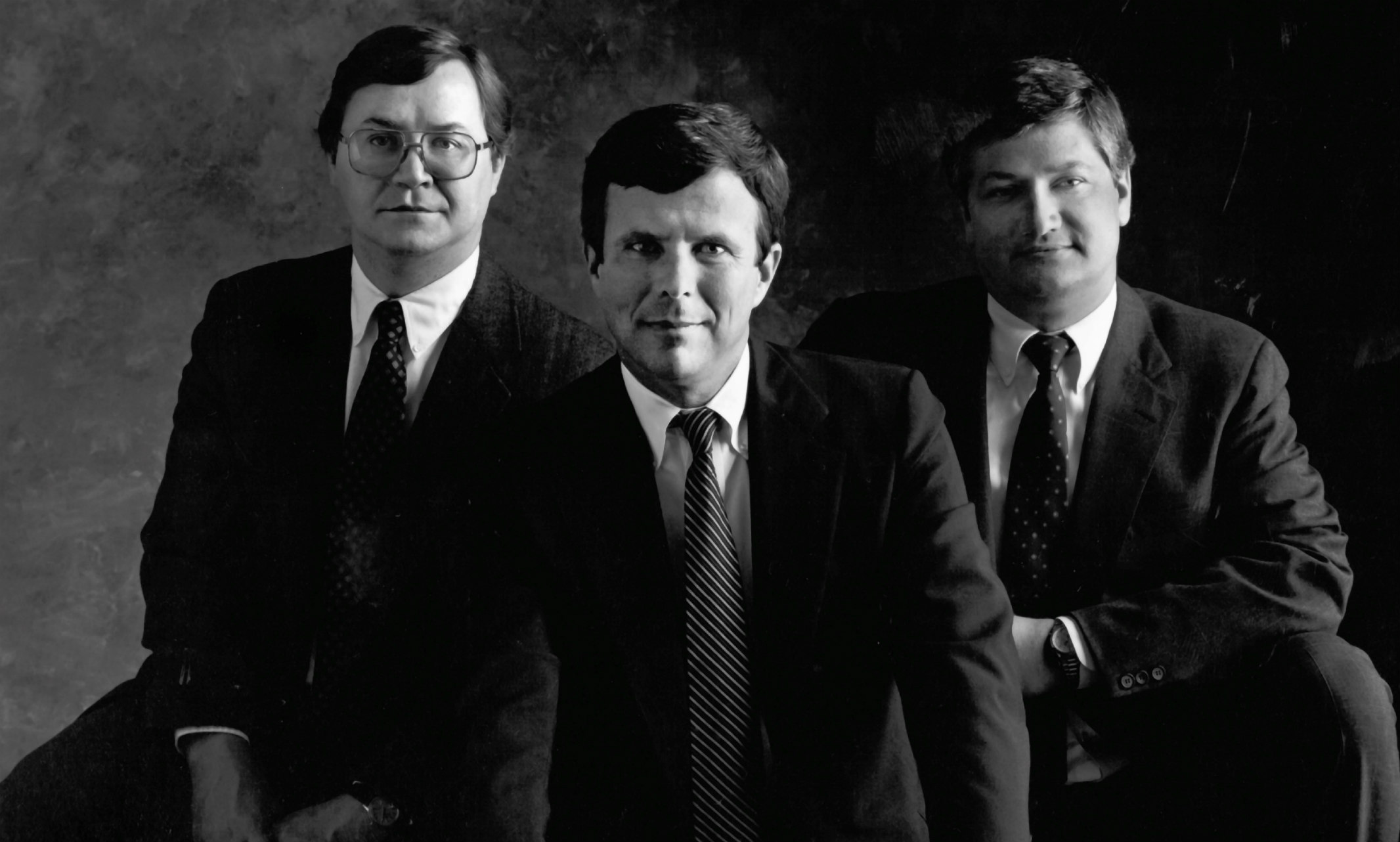
Cerner founders among UMKC honorees for 34th annual event
KANSAS CITY, Mo. – The University of Missouri-Kansas City has announced the honorees for its 34th Annual Entrepreneur of the Year awards. The celebration is sponsored by the Regnier Institute for Entrepreneurship and Innovation at the university’s Henry W. Bloch School of Management.
The event is Friday, Nov. 15 at Bloch Executive Hall, 5108 Cherry St., Kansas City, Missouri. A Venture Showcase and Reception begins at 5:30 p.m. with the awards program following at 7 p.m. Here is ticket and sponsorship information.
Past inductions for the Bloch School’s Entrepreneur Hall of Fame are included in the program.
"This year’s Entrepreneur of the Year Awards is particularly meaningful for us as we celebrate the lessons we learned from our friend, the late Henry Bloch; lessons that we are responsible to carry on and teach the next generation of young, ambitious entrepreneurs."
- Chancellor C. Mauli Agrawal
The Entrepreneur of the Year Awards event is an iconic Kansas City tradition started in 1985. Beyond its philanthropic cause, this event is a valuable forum where Kansas City CEOs, entrepreneurs, business owners, industry legends, world-class faculty and students alike are able to celebrate a common passion. The event celebrates entrepreneurial spirit and serves as a source of inspiration to future generations of innovative entrepreneurs.
All proceeds from this event directly benefit the Regnier Institute for Entrepreneurship and Innovation’s student and community programs. The Regnier Institute at the Bloch School focuses on connecting students and community members with a comprehensive combination of world-class research, renowned faculty, cutting-edge curriculum and experimental programs driven to deliver results and nurture the next generation of entrepreneurs.
Nov 12, 2019

Chancellor Agrawal and UM System launch initiatives to improve wellness
Chancellor Agrawal’s new initiative at the University of Missouri-Kansas City, Roos for Mental Health, is part of the university’s commitment to maintaining a culture of care.
Did you know that one in four adults will be affected by mental illness at some point in their lives? And that nearly two-thirds of people don’t seek treatment because of stigma, discrimination or lack of understanding?
Roos for Mental Health is aimed at reducing the stigma around mental illness, creating opportunities to enhance self-care for students, faculty and staff and offering education about the importance of nutrition, physical activity and communication.
“Seventy-five percent of serious adult mental illness starts by the age of 25 and these conditions are better managed when diagnosed and treated early on,” says Kathryn Brewer, visiting assistant professor and co-chair of Roos for Mental Health.
The initiative will kick off a year-long campaign during the Kansas City Roos men’s basketball game on Monday, Nov. 18, followed by activities throughout the week including a lunch-and-learn on Tuesday, Nov. 19, from noon–1 p.m. in Swinney Center. The topic will be how nutrition affects mental health. It is free to attend and open to students, faculty and staff. Sign-up through the IMLeagues website.
“The program wouldn’t be possible without the work and dedication of the staff, faculty and students who are volunteering their time to the committee and at events,” says Brewer.
In 2020, each month will focus on a related topic with corresponding events and resources.
January: Drugs and Alcohol
February: Eating Disorders
March: Self-Injury
April: Sexual Assault
May: Mental Health
June: PTSD
July: Grief and Loss
August: Happiness
September: Suicide
October: Domestic Violence
November: Depression
December: Stress and Anxiety
“We take a holistic approach when looking at mental health and wellbeing — not just in terms of counseling but also by looking at things like exercise, healthy sleep patterns, social support and other activities that contribute to a healthy and balanced life,” says Arnold Abels, director of Counseling, Health, Testing and Disability Services and co-chair of Roos for Mental Health.
“These initiatives will save lives. The incidence of mental health issues is on the rise for college students." —Kathryn Brewer, co-chair Roos for Mental Health
“We are working to better utilize our existing services and develop more proactive strategies to address the needs of students, faculty and staff,” says Brewer. “The Sanvello app is a good example of that.”
The Sanvello app offers on-demand help for stress, anxiety and depression. The University of Missouri System is making the app available for free to anyone who has a UMKC email address. Sanvello has a range of features including mood tracking, coping tools, guided journeys and community support to promote healthy habits and behaviors.
“These initiatives will save lives,” Brewer says. “The incidence of mental health issues is on the rise for college students. Through Roos for Mental Health we’ll provide the resources and support to help students on their path to mental health and wellness.”
Below are more resources available to UMKC students, faculty and staff.
Online Self-Help
UMKC Counseling offers to students, faculty and staff to promote mental health.
Personal counseling
Counseling Services provides several opportunities for students. Walk-in crisis hours for any student weekdays at 10 a.m. and 2 p.m. Most group meetings are available on-line and counseling appointments are telehealth as well. Mind Body Connection will be reopening with limited services as soon as student staff workers are hired.
Mind Over Mood
A three-week workshop focused on grief and anxiety. The counseling office is working to provide ADA- compatible transcripts and videos on the site as additional resources.
Campus Recreation
Fitness classes available on campus, Instagram stories and Esports including PS4 and X-Box Fifa and Madden
Disability Services is open from 8:30 a.m. to 5 p.m. Monday through Friday, but the office is encouraging virtual visits. To set up an Accommodations Plan or address questions about accommodated exams or notetaking, details are available on the site.
The Suicide Prevention Hotline is 1-800-273-8255 (TALK.)
Nov 11, 2019
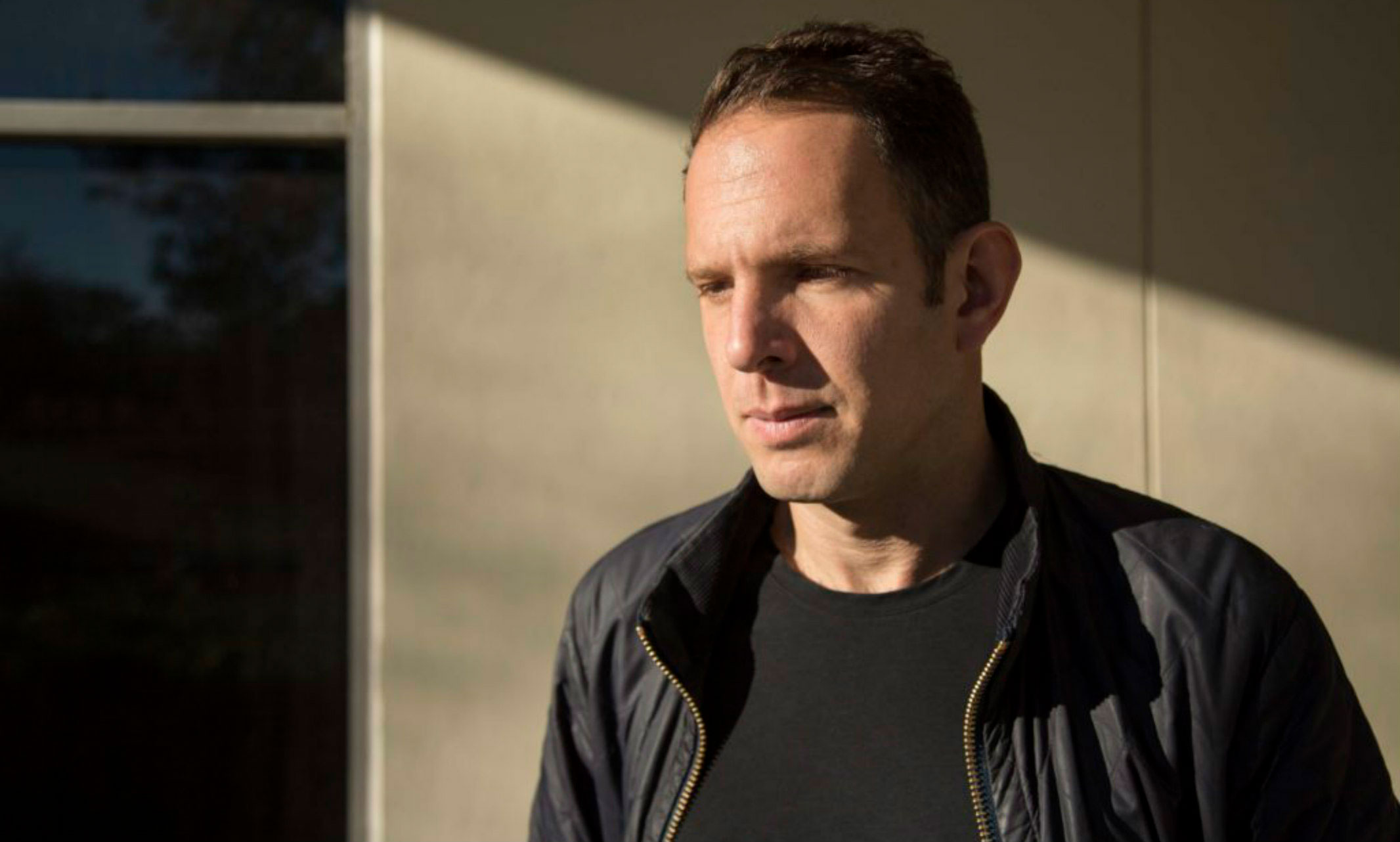
Conservatory's Yotam Haber is one of three winners of the 2020 Azrieli Music Prizes
The Conservatory is pleased to note that Associate Professor of Music Composition Yotam Haber is one of three winners of The Azrieli Foundation awards. Haber has won the Azrieli Commission for Jewish Music. Established in 2014, the biennial Azrieli Music Prizes offer opportunities for the discovery, creation, performance, and celebration of excellence in music composition.
The release notes, "The Azrieli Commission for Jewish Music is awarded to the composer who displays the utmost creativity, artistry, and musical excellence in proposing a response to the question – "What is Jewish music?" – in the shape of a musical work. 2020 Commission winner, Yotam Haber, has been awarded to write a new song cycle for voice and ensemble. His new work – Estro Poetico Armonico III – will continue baroque composer Benedetto Marcello's "telephone game" of hearing and re-hearing music he transcribed in a Venice Synagogue, and remembering and misremembering."
Nov 11, 2019
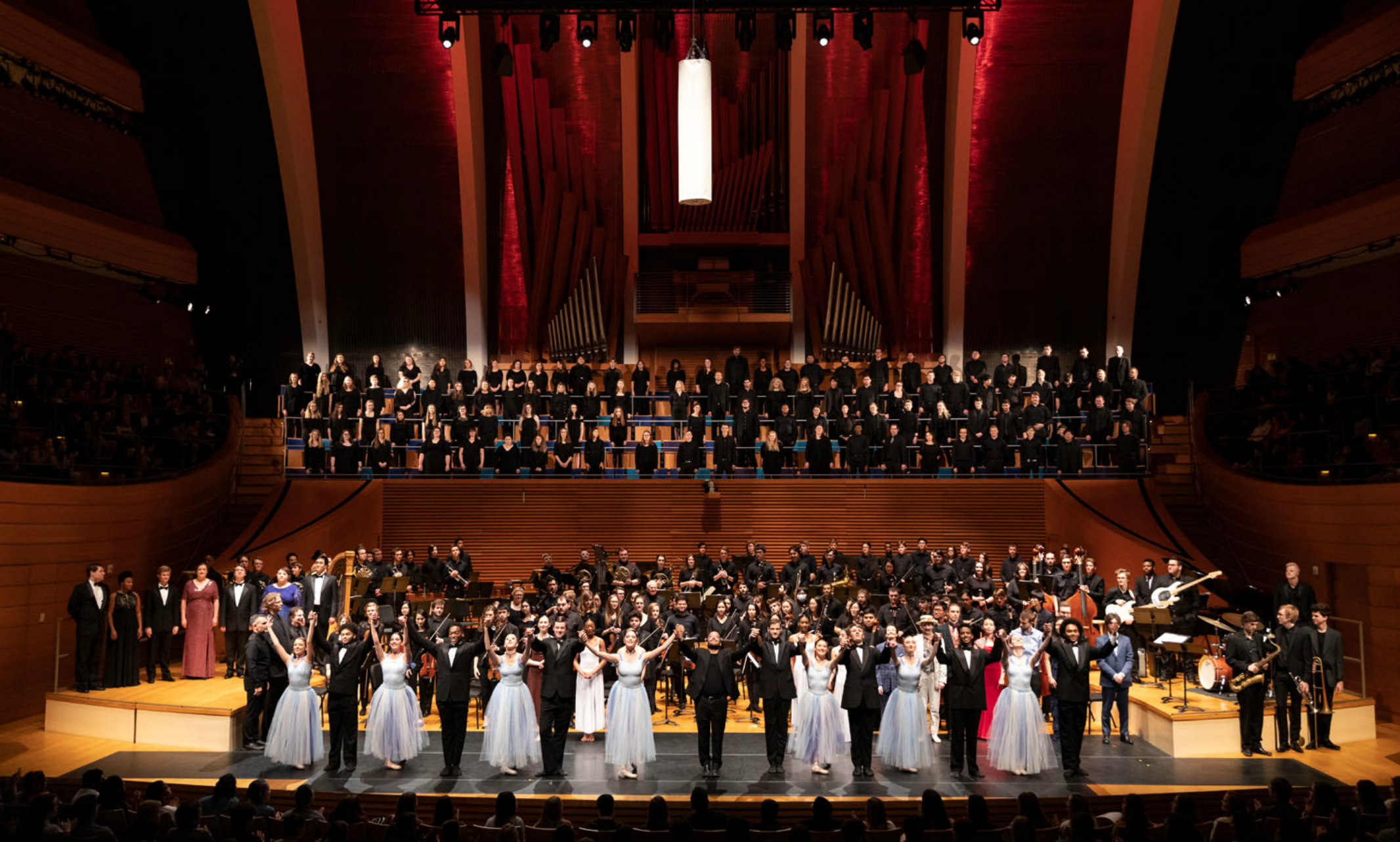
More than 300 students, faculty perform in annual concert
The talent of more than 300 University of Missouri-Kansas City Conservatory faculty and students was on display Nov. 8 at Crescendo.
Held in the stunning Helzberg Hall at the Kauffman Center for Performing Arts, Crescendo is the signature event for the UMKC Conservatory and a scholarship fundraiser for UMKC Conservatory students. This year’s gala and concert raised more than $600,000 as of event night and the total is expected to increase as donations continue to come in.
“Many of these young artists would not have the opportunity to pursue their dreams without your patronage,” said Conservatory Dean Diane Petrella before the concert. “Since moving Crescendo to the Kauffman Center in 2012, we have raised over $2.5 million in scholarship funds.”
In addition to raising scholarship dollars, this year’s Crescendo accepted donations to the Conservatory’s piano fund to improve the quality of the piano inventory. Pianos play a critical role in Conservatory programs. The average age of the current piano inventory is 42 years old, with the condition of these instruments deteriorating under the near constant use they are subjected to on a daily basis. Last June, The Richard J. Stern Foundation for the Arts generously awarded the Conservatory a $75,000 grant to use towards the purchase of new pianos. The Conservatory is currently in a campaign to match that grant by raising an additional $75,000 through private donations. The goal is to purchase a new concert grand piano for the White Recital Hall stage on the UMKC campus.
As Crescendo has also grown over the years, Petrella said they have actively sought ways to expand the impact of the performance. Three years ago, the Conservatory began hosting an annual special matinee performance, busing middle and high school students from all over the Kansas City area to the Kauffman Center. For many of the children, this was the first time they’ve experienced a performance of this caliber in a setting this spectacular.
“These performances not only support our efforts in community outreach, but also help us to connect with local talent to recruit the next generation of artists to the Conservatory,” Petrella said. This year, through grant and private funding, the Conservatory expanded this outreach to two performances, with more than 2,500 students attending matinees earlier in the day.
The fast-paced performance began with Masquerade (2013), Anna Clyne (b. 1980) trans. Dennis Llinás, performed by the Conservatory Wind Symphony, Professor Steven D. Davis, conductor. It was quickly followed by O Clap Your Hands (1920), Ralph Vaughan Williams (1872-958), sung by the Combined Choral Ensembles with Professor Charles Robinson as conductor.
UMKC piano students delighted the audience with Galop-marche á huit mains (1898), Albert Lavignac (1846-1916); followed by Libertango (1974), Astor Piazzolla (1921-1992) arr. Jeff Scott, performed by the UMKC Graduate Fellowship Woodwind Quintet and Professor Celeste Johnson as coach. UMKC Brass students also played “Nimrod” from Enigma Variations (1898-99), Edward Elgar (1857-1934).
The program then featured a scene from An Italian Straw Hat (1851), Eugene Labiche (1815-1888) Marc-Michel (1812-1868), and translated by Professor Felicia Londré.
The Conservatory Orchestra, with Conductor Professor Adam Boyles, performed Music to Shakespeare’s Romeo and Juliet (1947), David Diamond (1915-2005), 1. Overture. Allegro Maestoso.
The UMKC Jazz Combo entertained with Night and Day (1932), Cole Porter (1891-1964) arranged by Zak Jonas; followed by Precious Lord (1938/1996), Thomas A. Dorsey (1899-1933) arranged by Arnold Sevier, sung by Conservatory Singers and with Professor Eph Ehly as conductor.
Courtesy of Wylliams/Henry Contemporary Dance Company, the audience was tantalized by Sweet in the Morning (1992) with choreography by Leni Wylliams (1961-1996), music by Bobby McFerrin and restaged by Professor DeeAnna Hiett.
Wrapping another amazing year, Crescendo’s last performance was “Make Our Garden Grow” from Candide (1956), Leonard Bernstein (1918-1990), performed by the Conservatory Orchestra, Combined Choral Ensembles and Professor Adam Boyles as conductor.
The 2019 Crescendo honorary co-chairs were Julie Quinn and Teri Miller; and Mark Sappington and David McGee. Co-Chairs were Marylou Turner and Michael Henry.
Nov 11, 2019
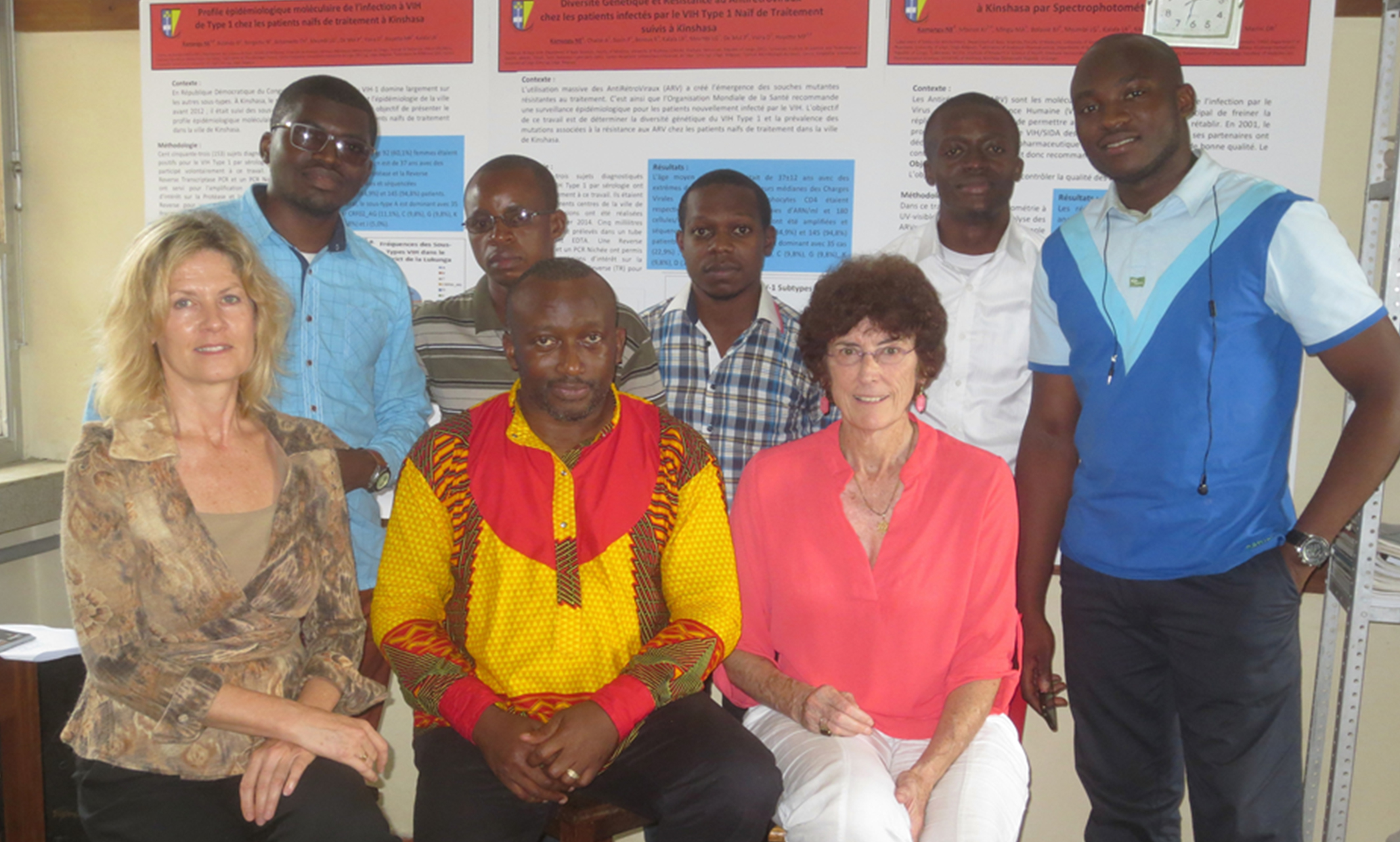
First time a new subtype of HIV-1 has been discovered since 2000
Carole McArthur, M.D. '91, Ph.D., of the UMKC School of Dentistry and UMKC School of Medicine, was part of a team of scientists who discovered a new strain of HIV.
The new subtype is referred to as HIV-1 Group M, subtype L—and is part of the Group M viruses that are responsible for the global pandemic, which can be traced back to the Democratic Republic of Congo.
"In an increasingly connected world, we can no longer think of viruses being contained to one location," said McArthur, one of the study authors. "This discovery reminds us that to end the HIV pandemic, we must continue to outthink this continuously changing virus and use the latest advancements in technology and resources to monitor its evolution."
In order to determine whether an unusual virus is a new HIV subtype, three cases have to be discovered independently. The first two for this subtype was discovered in 1980s and 1990s and this third was collected in 2001 but difficult to sequence until now.
Today, technology allows researchers to build entire genomes at higher speeds and partnering scientists at Abbott had to develop new techniques in order to confirm the discovery.
“This discovery reminds us that to end the HIV pandemic, we must continue to outthink this continuously changing virus and use the latest advancements in technology and resources to monitor its evolution.” – Carole McArthur, M.D., Ph.D.
Mary Rodgers, Ph.D., one of the Abbott scientists who co-authored the study with McArthur, said identifying viruses like this one are like searching for a needle in a haystack; however, with new technologies it feels as though they are now “pulling the needle out with a magnet.”
“This scientific discovery can help us ensure we are stopping new pandemics in their tracks," she said.
Abbott’s Global Viral Surveillance Program monitors HIV and hepatitis viruses, specifically, to ensure the company’s diagnostic tests remain up to date. And now that this new strain has been identified, they are able to detect it.
You can read the full release here.
The study was published in the Journal of Acquired Immune Deficiency Syndromes (JAIDS).
In the News
Hundreds of outlets around the world published this discovery, including:
CNN
Daily Mail
Forbes
Kansas City Business Journal
MSNBC
Newsweek
USA Today
Nov 08, 2019
New location places Regnier Institute entrepreneurship facility at heart of KC startup community
The Bloch VentureHub will join entrepreneurs from across Kansas City at Plexpod Westport Commons with permanent office space in the giant co-working building. The redesigned VentureHub will feature mentors on site, a resource library and open co-working hours for students and entrepreneurs.
The Regnier Institute for Entrepreneurship and Innovation, a program of the Henry W. Bloch School of Management at the University of Missouri-Kansas City, announced a multi-year agreement this fall with Plexpod. The Plexpod Westport Commons in Midtown Kansas City will be the new home of the Bloch VentureHub, which has moved from its previous location at 43rd and Madison streets.
The historic Plexpod building once housed Westport Junior High School. A 2017 renovation transformed the 1923 structure into one of the world’s largest co-working communities, meshing a modern office space with eclectic whispers from the building’s past such as restored hardwood floors, metal lockers and a historic 600-person theater.
The Bloch VentureHub plans to offer Coworking Wednesdays where enrollees in the Institute’s Entrepreneurship Scholars program, program alumni, UMKC students and other entrepreneurs can work in the space and enjoy the benefit of Institute mentors on site and a resource library. The move to Plexpod puts the VentureHub on a purposeful collision path with entrepreneurs in Kansas City.
“The mission of the Regnier Institute is to take entrepreneurship beyond the classroom. This is a deliberate step to offer RIEI resources to the community,” said Andy Heise, assistant director.
In addition to housing active ventures, Plexpod hosts One Million Cups and community events. The building offers a rooftop deck with 360 degree views of Kansas City, a gourmet café, boardrooms, meeting rooms, and creative space – all intriguing options for hosting future Regnier Institute programs and events on key topics such as ideation, modeling, scaling the venture, and business basics in close proximity to entrepreneurs who can put the information to use.
The VentureHub’s new home places the Regnier Institute in the center of Kansas City’s entrepreneurial ecosystem. Institute Managing Director for Venture Creation Bryan Boots oversaw the development of the agreement and said, “Being here will help the Regnier Institute stay close to the pulse of entrepreneurship communities.”
Along with this new Plexpod annex, the Regnier Institute for Entrepreneurship and Innovation will maintain its core offices in Bloch Executive Hall on the UMKC campus.
The Regnier Institute for Entrepreneurship and Innovation (RIEI) inspires and nurtures entrepreneurs and innovators through transformational education, research, and programs. RIEI offers formal entrepreneurship education to enrolled students at the University of Missouri-Kansas City and provides educational opportunities for members of the community who are looking for guidance and support as they prepare to launch new ventures. RIEI programs are designed to advance entrepreneurship and innovation across the University of Missouri-Kansas City campus, locally in the Kansas City region, and around the world.
Nov 07, 2019
The Bloch VentureHub's move to Plexpod Westport Commons was recently featured in the Kansas City Business Journal
The Bloch VentureHub, a program of the UMKC Henry W. Bloch School of Management, will get a new home in Plexpod Westport Commons. Read the story and view the photos.
Nov 07, 2019
CNN and a number of news outlets wrote about the research, co-authored by Carole McArthur at UMKC
“This discovery reminds us that to end the HIV pandemic, we must continue to out think this continuously changing virus and use the latest advancements in technology and resources to monitor its evolution,” study co-author, Carole McArthur, a professor in the department of oral and craniofacial sciences at the University of Missouri-Kansas City, said in a statement. Read more.
Nov 06, 2019
More about the exhibit was published in The Scientist
Steph Nowotarski, an artist and postdoc in Alejandro Sanchez Alvarado’s lab at the Stowers Institute for Medical Research in Kansas City, Missouri, studies how planarian flatworms (class Turbellaria) regenerate. “[I] can cut a 1 cm worm into multiple pieces, and each piece, regardless of where in the animal it was taken from, will make a whole new animal in just 14 days,” she says in an email to The Scientist.
Nowotarski is teaming up with other Kansas City–based artists to create an exhibit inspired by flatworm research in the University of Missouri–Kansas City Gallery of Art. Read more.
Oct 31, 2019
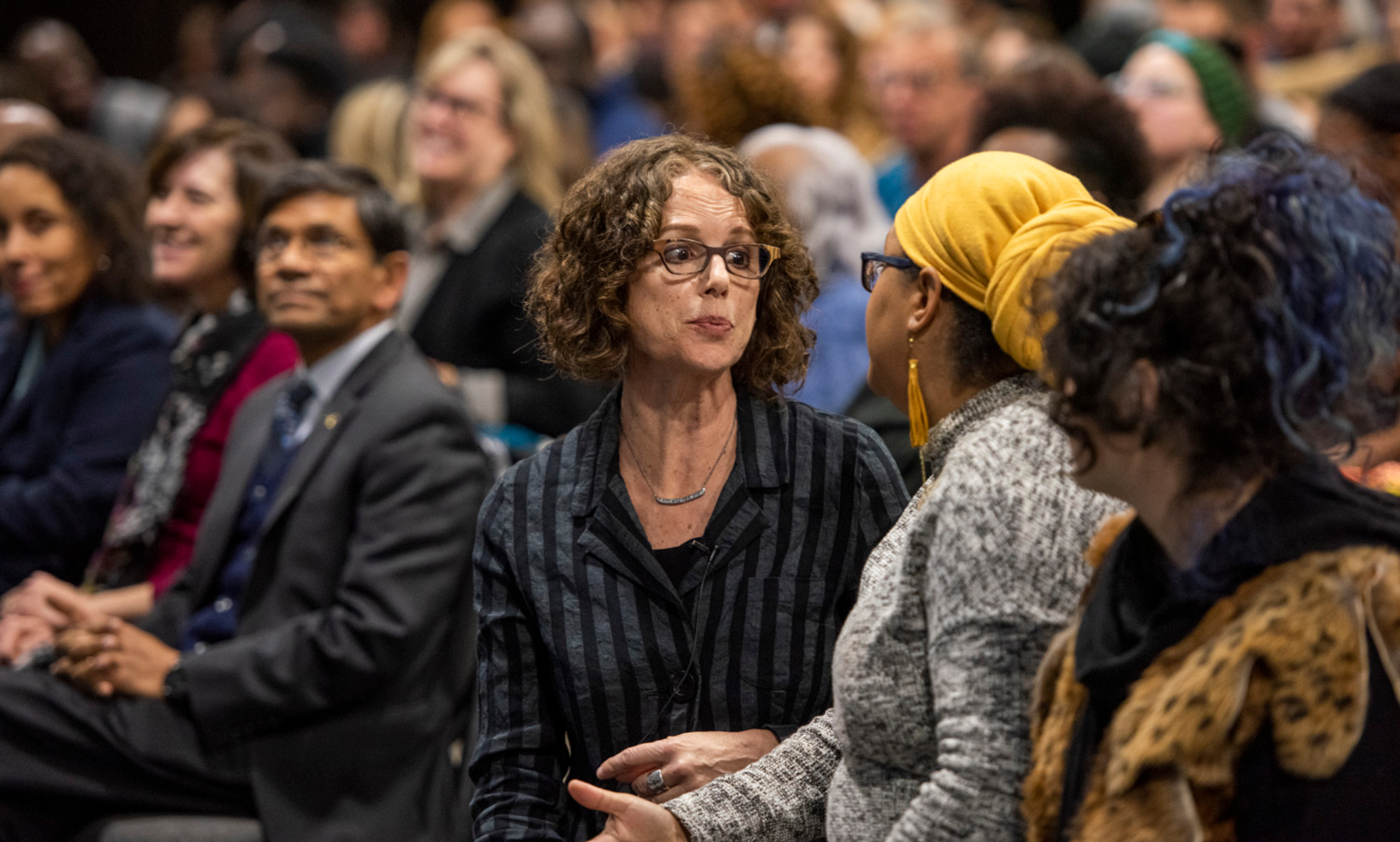
‘Racism is a System, Not an Event’
Author and scholar Robin DiAngelo, Ph.D., examined the unconscious and unintentional forms of racism at UMKC Diversity and Inclusion’s 13th annual Social Justice Book Lecture.
DiAngelo is an associate professor of education at the University of Washington, and has been an educator and trainer on issues of social justice for over 20 years. Her book, White Fragility: Why It’s So Hard For White People To Talk About Racism, was released in June of 2018 and debuted on the New York Times Bestseller List.
At the Social Justice Book Lecture, DiAngelo explained to a capacity audience that many white people simply do not understand the true nature of racism. They think of racism as deliberately offensive acts committed by people with clearly hurtful intent. Since they do not commit or condone such behavior, they believe they are not racist.
What they miss, DiAngelo said, is that they live in, and benefit greatly from, a system that provides enormous advantages to white people from cradle to grave, in areas ranging from education to careers to health care to justice. Those advantages confer on white people a responsibility to educate themselves on the racist nature of society and its impact, and to approach that responsibility from a position of humility.
“Niceness is not anti-racism.” – Robin DiAngelo
Numerous scientific studies over many years have demonstrated that all people carry unconscious biases, DiAngelo said; the difference for white people is that their biases are supported by legal authority and powerful institutions.
Defining racism as intentional individual actions, she said, actually helps perpetuate the systemic racism of society by diverting attention away from it.
“The white experience is deeply separate and unequal,” she said. And while white progressives often attribute racist actions and intent to conservatives, “white progressives produce the most daily toxicity for people of color.”
“We are the ones who send our co-workers home every evening with stress, wrestling over whether they should address the unconscious indignities they endure from us.”
DiAngelo’s closing thought: “Niceness is not anti-racism.”
“Focusing on intent allows us to avoid taking responsibility for impact.”
About the Social Justice Book and Lecture Series
The UMKC Division of Diversity and Inclusion’s Social Justice Book and Lecture Series brings to campus thought leaders from across the country and various fields to explore issues of social justice with our students, faculty and staff. The objectives of the series are to:
Foster a sense of community on our campus through shared literature and relevant dialogue.
Prompt participants to think critically about the historical context of social justice issues while focusing on current social justice challenges and the interdisciplinary thought and leadership skills necessary for solving such challenges.
Provide a platform for further reflection, dialogue and action within our campus and greater communities through related coursework, gatherings and exposure to local, regional and national social justice projects and initiatives.
Oct 30, 2019
Kansas City religious leaders grapple with the notion of ghosts
A few locations routinely pop up when taking inventory of haunted places in Kansas City.
The most legendary of all local haunts is the Epperson House on the University of Missouri-Kansas City campus, according to Darren Hinesley, a local expert on Kansas City hauntings and host of the podcast Creepy in KC. Hotels such as the historic hotel Savoy and places of worship such as St. Mary’s Episcopal Church also are thought by some to be scenes of paranormal activity. Read more.
Oct 30, 2019
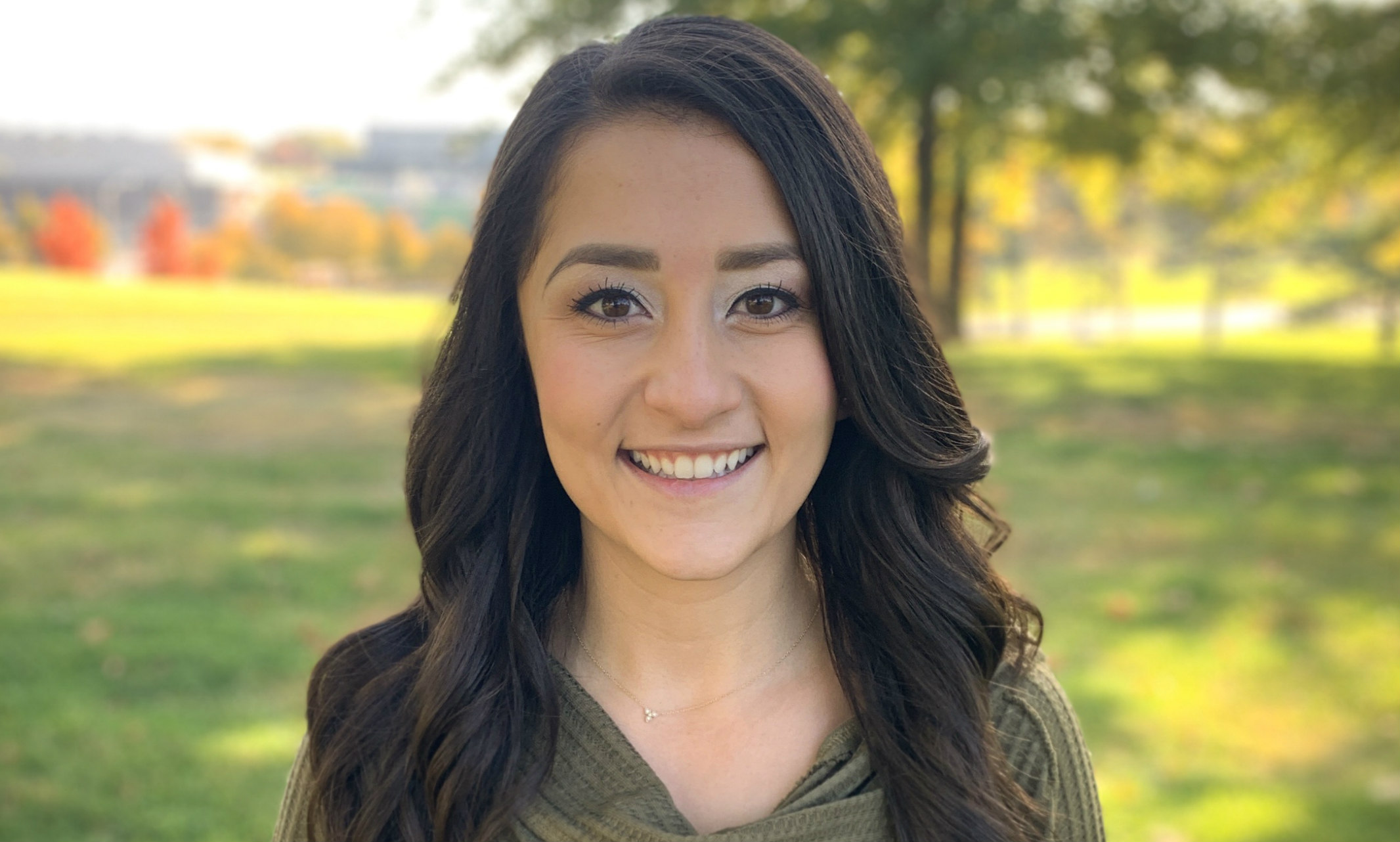
Patient came for a filling, left with a son
The email subject line to UMKC School of Dentistry faculty read: “There is no limit to what our students can do!”
The email detailed something completely unexpected that happened on fourth-year dental student Aliah Haghighat’s first day of an externship rotation at Samuel Rodgers Health Center in Kansas City.
“It was definitely a day I will never forget,” Haghighat said.
Oct. 21, 2019
It was Monday morning, the first day of her new externship, and Haghighat was eager to treat as many patients as she could. A woman was her second patient of the day, and everything was going great with prepping her tooth. As Haghighat stood up to get the lead doctor to check her work before the filling, the patient exclaimed that her water broke.
Haghighat ran to tell the doctor, and then went straight back to help her patient. She remembers the woman was off the dental chair and was worried about the water everywhere. Haghighat assured her that it was going to be okay, and made efforts to try to call someone to give her a ride to the hospital. At this point, the lead doctor went to the other side of the clinic to get more help.
“It was definitely a day I will never forget.” -Aliah Haghighat
Soon after, Haghighat remembers the patient saying the baby was coming and then jumping back on the dental chair. The only other people in the room at the time were Haghighat and a dental assistant.
“We were both in shock and in disbelief of what was happening,” Haghighat said.
The woman exclaimed “grab my baby,” and both Haghighat and the assistant reached down to grab hold of the baby boy and handed him carefully to the mother. The baby was crying and had a full head of hair.
About 10 seconds later, the lead doctor came back and saw that the baby was delivered. She immediately called 911, and at this point, many providers from women’s health including a doctor came to help.
Haghighat and the others used equipment to suction the baby’s mouth and covered both mom and baby in personal protective equipment gowns to keep them warm.
“The patient only spoke Spanish...Thankfully, I am fluent in Spanish and was able to speak to her to keep her calm and translate for her as well.” -Aliah Haghighat
The paramedics arrived within 10 minutes. The baby opened his eyes to a room full of people trying to help. The paramedics cut the cord and rushed the mom and baby boy to the hospital.
“The patient only spoke Spanish so this entire incident was happening in Spanish,” Haghighat said. “Thankfully, I am fluent in Spanish and was able to speak to her to keep her calm and translate for her as well.”
Haghighat thought back to a UMKC School of Dentistry course she took, Medical Emergencies, that prepares dental students for incidents that could occur in the dental chair. And this isn’t the first time she’s had to put what she learned in that course to work. Last year, Haghighat had a patient who had a 5-minute-long seizure in the UMKC dental clinic.
“Although delivering a child was not a part of the curriculum, I feel that this class and the experience with a patient who had a seizure helped me remain calm,” Haghighat said.
Nearly a week later, Haghighat remains both delighted and amazed at having helped deliver a baby.
“I am overwhelmed with joy that everything went okay, and that both the mom and baby are healthy and happy,” she said.
She called the patient’s husband later that day to make sure everyone was doing well.
“This is an experience I will never forget, and I know now that I will be able to handle any situation while practicing dentistry,” she said.
She has no thoughts, though, of switching her studies from dentistry to obstetrics.
“I am definitely in the right profession.”
Oct 28, 2019
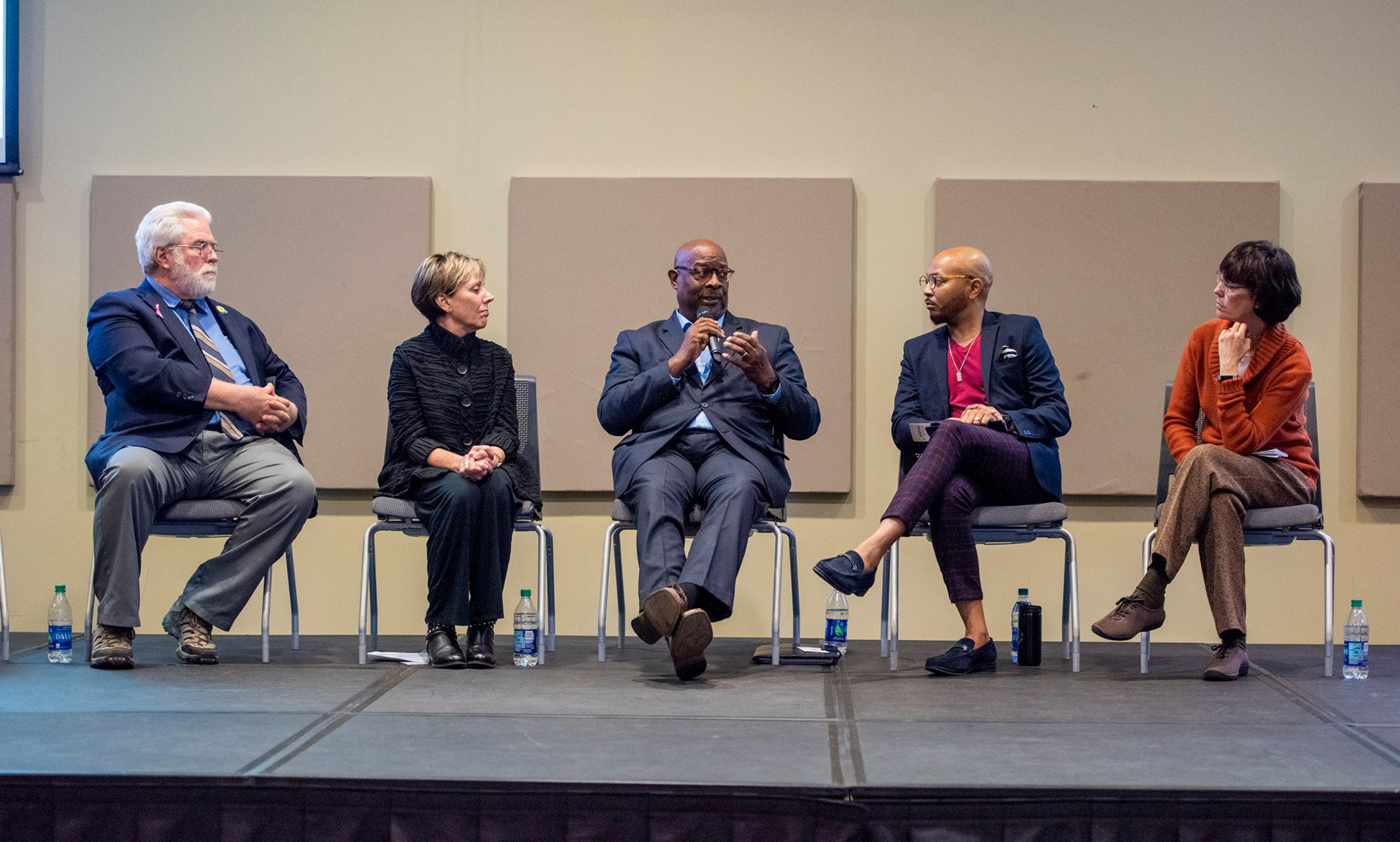
Community leaders discuss UMKC efforts to close gaps
Health equity is a broad concept that encompasses differences in disease and mortality rates, and in access to healthcare services, among different population groups. It also includes differences in social determinants of health, such as poverty, exposure to toxins and access to healthy food.
UMKC leadership quantifying and addressing these differences was the focal point of the UMKC Engagement Showcase, the university's signature event celebrating Engagement Week – a special week of engaged leadership, partnership and learning hosted by UMKC and the UM System.
The event included a demonstration of the System’s new online Engagement Portal and a panel discussion on health equity led by the director of the new UMKC Health Equity Institute, Jannette Berkley-Patton, Ph.D., of the UMKC School of Medicine.
Engagement with community partners by the UM System and its four universities is hardly a new phenomenon. Curt Crespino, UMKC vice chancellor for external relations and constituent engagement, noted that UMKC history is rooted in an enduring city-campus partnership.
Marshall Stewart, chief engagement officer for the UM System, said what’s new is a more systematic and coordinated approach to engagement, including a transformation of the system’s Extension programs, designed to expand engagement beyond Extension’s original rural focus to forge engagement partnerships in every community and corner of the state.
“Urban and rural communities are facing very similar issues across Missouri. Our mission is to work together with all of our stakeholders to expand our impact by using our research to help transform lives,” said UMKC Chancellor Mauli Agrawal. “That spirit of connection to the city and engagement with our community was woven into the origin story of UMKC. And we are excited to take those efforts to the next level in collaboration with the efforts being led by the system.”
Following are excerpted highlights of the health equity panel.
Jannette Berkley-Patton, director, UMKC Health Equity Institute:
“We spend billions on healthcare but are still one of the unhealthiest countries in the world.” The burden of health disparities rests primarily on groups outside the mainstream, including people of color, rural communities, veterans and seniors. Large federal grants allow for the creation of effective programs, “but what happens when the grant ends? Everything goes away. We need to figure out how to take the Cadillacs we create with these million-dollar grants and turn them into Pintos.”
Rex Archer, director, Kansas City Health Department:
“We need to change the structural issues that create the (health equity) problem.” These include issues with disparities in housing, poverty, education, safety and more.
Mary Anne Jackson, interim dean, UMKC School of Medicine:
In 2014, the Kansas City area had to contend with a large outbreak of a serious respiratory illness among school-age children. Researchers were notified early enough to identify the virus responsible and contain the outbreak. “We were able to address this in time because of the strong connections we have with people in the community who brought it to our attention.”
Eric Williams, pastor, Calvary Temple Baptist Church:
Conducting funerals for victims of gang violence and AIDS led Williams to involvement in public health. “Conversations about HIV were happening, but it was all on the down-low. (Berkley-Patton) helped us to understand that some of the things we were already doing were working” to change behaviors.
Rashaan Gilmore, founder and director, BlaqOut:
BlaqOut surveyed gay African Americans about their health care priorities, and the top response was health care access. “It was because they didn’t feel welcomed by traditional providers. We asked them to recommend strategies to address that, and we developed interventions based on those results.”
Bridget McCandless, former president and CEO, Health Forward Foundation:
After 15 years working in a free health clinic, she changed her approach from providing care to impacting policy “because I saw that policy could be far more effective.” Citing a sampling of dramatic health disparities between local white and black populations, she said “there’s no excuse for us to have disparities like that.” Data analysis can empower highly effective strategies if we act on the findings. “We’re getting smart enough to figure this out. (Data-driven policy) can be the new germ theory; it can revolutionize the delivery and effectiveness of health care.”
Oct 28, 2019
Psychologist Carolyn Pepper of UMKC Counseling Services was a guest
A mental health diagnosis for one person can inadvertantly affect their family members and caretakers, and lead to confusion, concern and guilt. One mother shares her experience in caring for her adult daughter, whose bipolar disorder and schizophrenia often manifested itself as violence and tension. Her suggestion to other caretakers is to seek support. "I can't help her before I can help myself," she says. Listen here.
Lori Mitchell, mother and caretaker of someone diagnosed as bipolar-schizophrenic
Carolyn Pepper, psychologist, UMKC Counseling Services
Oct 28, 2019
Shacura Wade is part of the national tour of The Lion King
For Shacura Wade (B.F.A. ’15), the journey after graduation has been unexpected.
“I thought the Broadway world was very cheesy and over-commercialized, so I didn’t think it had a place for me,” Wade says.
But she had a change of heart two years ago, when she was cast as an ensemble member in the national tour of The Lion King. Now she performs on stages across the country, spreading a message she deeply believes in.
“I always wanted to be a part of something that had a deeper meaning, and The Lion King is such a spiritual show,” Wade says. “It has a great story about unity and how everything is connected.”
It also allows her to combine her love of dance with two other talents: singing and acting. Wade says the Conservatory curriculum helped prepare her for her current role because she was able to take classes in other performing arts disciplines, like music.
“You don’t always get that variety at a lot of schools,” Wade explains. “That’s why [the Conservatory] produces such well-rounded dancers in general.”
She also credits her teachers at the Conservatory for helping her develop skills that set her apart in auditions.
“It’s a passion, it’s a hunger, it’s a confidence, it’s a boldness I feel as though I learned from the faculty,” Wade says. “You don’t really realize it when you’re in school, training every single day, and you’re exhausted. But when you get out in the world and allow your training to speak for itself? It separated me a lot."
This story originally appeared in Encore, the UMKC Conservatory magazine.
Oct 25, 2019
Nov. 13 dinner celebrates the power of expression through creative writing and reading
KANSAS CITY, Missouri — Kevin Willmott, the Academy Award winning screenwriter from Lawrence, Kansas, will be the featured speaker this year at the annual Writers for Readers dinner at the University of Missouri-Kansas City.
Willmott will discuss his screenwriting and filmmaking career, including his work on “BlacKkKlansman” and other collaborations with director Spike Lee, with local scriptwriter Mitch Bryan and author Whitney Terrell, UMKC associate professor of English. Kansas City Mayor Quinton Lucas is also scheduled to speak.
Writers for Readers is an event celebrating the power of expression through creative writing and reading. Proceeds benefit a new creative writing initiative co-sponsored by the Kansas City Public Library and UMKC, providing scholarships for UMKC graduate students in Creative Writing. The students will be teaching creative writing classes for underserved populations at the Kansas City Public Library and helping the library organize a new literary festival and a new literary award.
Writers for Readers will take place at 6:30 p.m. Wednesday, Nov. 13 in Room 401 of the UMKC Student Union, 5100 Cherry St. Tickets include dinner, open bar and admission to the event. For tickets, click here.
Oct 25, 2019
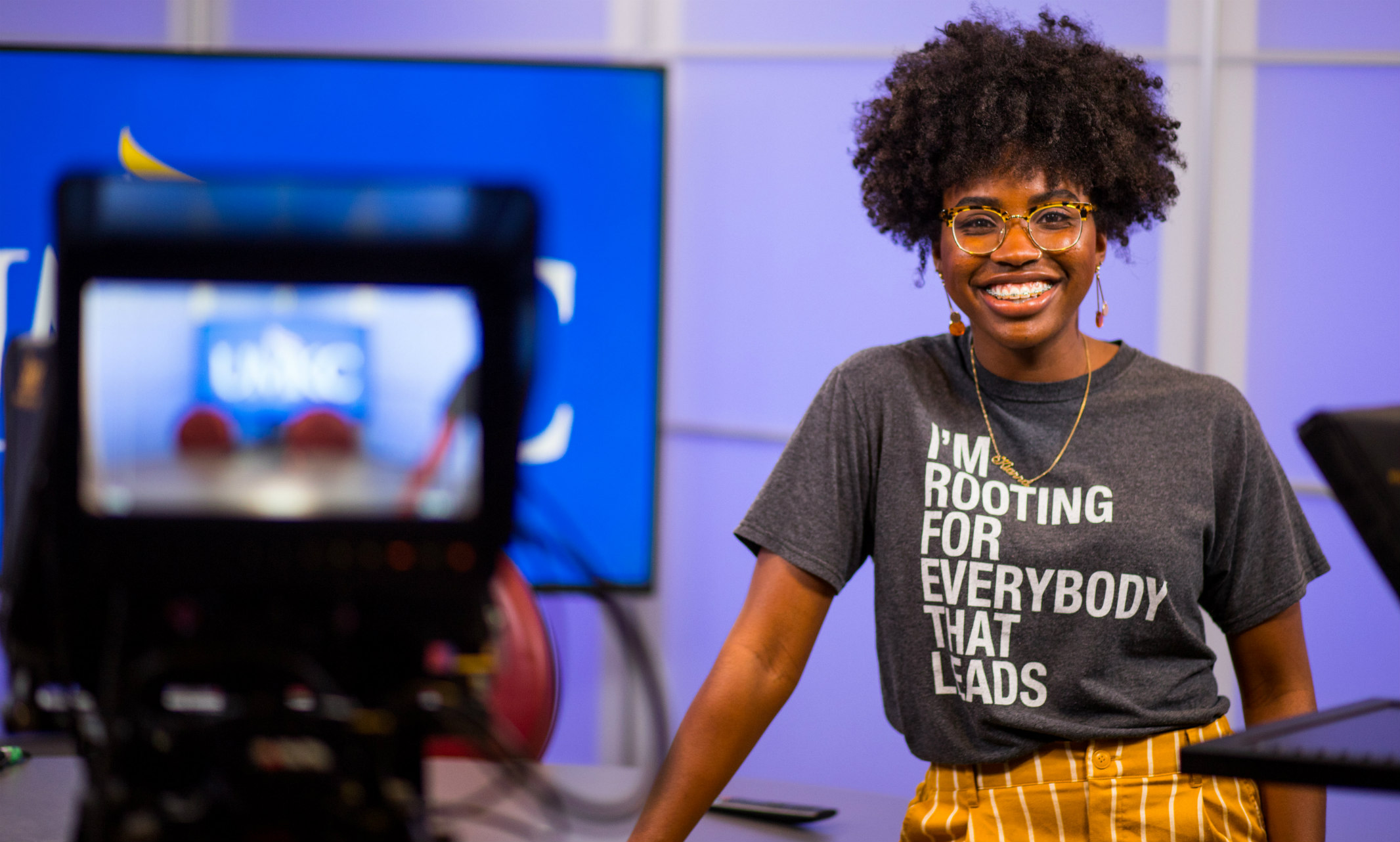
How positivity and creative thinking are making Kiarra's dreams come true
Our ongoing story starts with people from around the world, converging here at UMKC. Get to know our people and you’ll know what UMKC is all about.
Kiarra Brown-Edwards is the entertainment publicist you want to meet. Recently named among the 2019 class of Forbes Under 30 Scholars, the former Conservatory dancer turned Communication Studies student has made it her mission to serve as a voice for the culture. And she isn’t afraid to get creative to make her dreams come true.
Kiarra Brown-Edwards '19Hometown: Kansas City, MissouriHigh School: Paseo Academy of Fine and Performing ArtsUMKC degree program: Communication Studies
Why did you choose UMKC?
I transferred to UMKC as a dance major in the fall of 2016. I loved how elite the conservatory is here. I eventually changed my major from dance to Communication Studies because there’s so much more I want to do. People need to hear me. I realized, then, how great the Communication Studies department actually is.
Choosing UMKC was a great decision for me. Not only do I love the people here, but I love that there are a great deal of faculty and staff who want you to succeed just as much as you want to succeed. College can be tough and the “real world” is tougher. At UMKC, students are accepted for who we are as individuals.
Why did you choose communications?
I chose to be a mass communications major because I enjoy, and also understand, the importance of being a voice for black and brown people. Whether it be politically or in the realm of entertainment, people of color are either under-represented or incorrectly represented, and I want to change that. The media industry always keeps me on the edge of my seat. There is always something to be learned … or unlearned.
“Choosing UMKC was a great decision for me. Not only do I love the people here, but I love that there is a great deal of faculty and staff who want you to succeed just as much as you want to succeed.”
What are the benefits and challenges of the program?
The benefit of this program is being able to get that much needed one-on-one time with professors. In media, we have to put in extra work to perfect our craft no matter our focus. Being able to get that extra help or a pep talk from professors, who are also professionals, is a benefit that I value greatly.
My challenge with this program is not having professors who look like me. Though I find a majority of Communication Studies professors valuable and an asset to students, I think it’s also important to not only maintain the diversity among students and professors alike. My experience as a black woman in media will be different than others in the same field. And not because I want it to be, that’s the reality.
How do you find mentorship and connection in your field given that a lot of your field given that a lot of your professors themselves don’t look like you?
I'm an active student member of the National Association of Black Journalists. It literally provides black students with everything we need in this field. Being a member has helped me meet other black professionals in media.
Since entering college, what have you learned about yourself?
Since entering college, I’ve learned how hard I will work for something that I believe in, no matter if anyone else believes it or not. I don’t settle for anything that I believe is less than what I deserve. This mindset, and knowing how to communicate this in the proper manner, has granted me many life-changing opportunities.
“LinkedIn is the plug!”
Since transferring to UMKC I have been actively involved with campus organizations. I was the president of Sister Circle, an organization for women of color from May 2016 to May 2018. Now I support by being a general body member. I am also a general body member of The African American Student Union and am also a contributing writer for U-News. On Tuesdays at 4:30 p.m. I have a radio show on K-Roo radio, “Your Weekly Dose with Ki & Los,” where we talk about culture, what’s happening around campus and current events in mainstream media.
Wow! You do a lot on campus. What about off campus? Have you had any internship experiences?
I have had a nice amount of valuable internships. I am currently a public relations and marketing administrative intern for IMPACT Strategies, a political advocacy firm founded by NPR Political Analyst and CNN commentator Angela Rye. My job is to oversee incoming interns, pitch ideas, news releases, prepare briefs and network with my across the country. There are several college students who intern remotely. Shout out to NABJ for giving the confidence to apply.
My second gig is working for BET Networks as a public relations/talent escort. I coordinate guest check-ins, assist production with red carpet setup, escort celebrity talent to the various media outlets and assist with in-house show production. I began working with BET at the 2018 Soul Train Awards in Las Vegas and have worked every award show since. Most recently, I worked the BLACK GIRLS ROCK! 2019 show and got to see Angela Bassett in the flesh! I’m proud that I didn’t freak out. We have to learn how to not freak out around celebrities.
I’ve also interned for a local television news station and help my friends with PR for the various projects and events they put on throughout the city.
“Be kind, you never know who you'll meet.”
You also recently received some big news -- your selection as a Forbes Under 30 Scholar. What does that mean to you?
It means a lot. Being chosen as a Forbes Under 30 Scholar, I am granted access to the Forbes 30 Under 30 Summit. This is one of the biggest leadership summits of the year with top-notch innovators and entrepreneurs. I will have access to leadership sessions and networking events with many of the amazing people who lead top companies we know of today.
There were over 2,000 applications for the Forbes Under 30 Scholarship Program and only a few hundred were chosen. I am proud to be one of the only scholars chosen from the Kansas City area. The Summit be held Sunday, Oct. 27 to 30 in Detroit, Mich. I will be in rooms with Serena Williams, Kevin Durant, and 21 Savage to name a few.
What are your plans after graduation?
My goal is to land a job or fellowship in entertainment PR. I want to move to Harlem, New York. I’ve been to New York a few times and loved it — though I was the only one walking down the street smiling at everyone. I love the culture in Harlem, though, and hope to land a job that’ll allow me to be there.
Which of your experiences at UMKC do you hope to take into your professional career?
At UMKC I have had the pleasure of building relationships with all kinds of different people. And I walk away from every conversation having learned something new. It’s because I am kind and don’t judge a book by its cover. Going into my professional career, this is something I will take with me; be kind, you never know who you’ll meet.
Oct 22, 2019
Kansas City poet Natasha Ria El-Scari is the author of 'Mama Sutra'
When it comes to talking about sex, the accepted wisdom is that parents and kids alike would just rather not. But Kansas City poet Natasha Ria El-Scari doesn't think that's healthy.
Neither does her college-age son, who says he's benefited from his mother's openness and candor in a way his peers are missing out on.
El-Scari attended a historically black college, then went on graduate studies at UMKC, ultimately leaving academia to become a writer and tell the stories of "ordinary black women."
The KCUR story ran in the Associated Press.
Oct 18, 2019
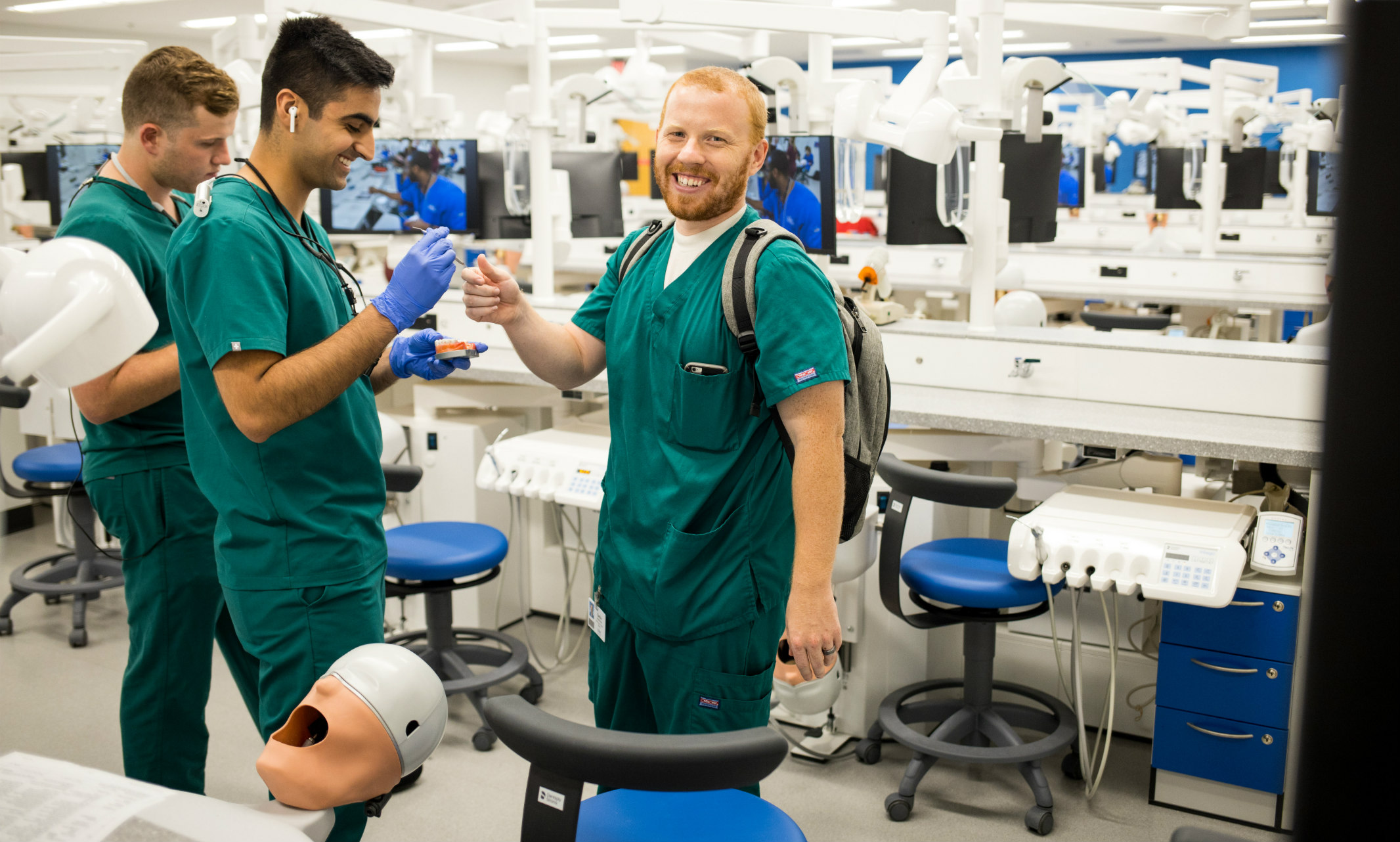
Simulation lab is the newest in the U.S. — and among the largest
The University of Missouri-Kansas City School of Dentistry now includes a new state-of-the-art training lab for students, thanks to a multimillion-dollar makeover. The dental simulation lab is among the newest in the U.S. — and the largest.
Before: first-and-second-year dental students worked on mouth models attached to metal rods, each euphemistically referred to by students as a “head on a stick.”
Now: 110 fully-equipped, ergonomically-correct work stations feature head-and-torso simulated patients. Each also includes water for rinsing and suction– like a real dental operatory.
“The lab is spectacular,” said Marsha Pyle, dean of the UMKC School of Dentistry, who has been advocating for the lab renovation for years. “This will give our students more real-life experiences before performing dental care on people.”
The students were impressed, too, when they got their first chance to check it out.
“The lab feels so open and bright now,” said Bryce Boyd, a second-year dental student, after her first class in the new facility. “It felt like being in a real clinical setting, being able to drill with water and having to position ourselves properly around a patient. Last year, instructors always emphasized posture and positioning, but with the new work stations, we have to practice those things. I also think it will make the transition much easier next year when we are working on real patients.”
Better ergonomic training — to eventually improve patient care and to help avoid disabilities later in dental careers — was a big reason why Pyle wanted the renovation. She also wanted to maintain the school’s reputation for high-quality instruction and its ability to recruit top students.
Pyle’s efforts to finance the $4 million project attracted substantial contributions from alumni, support from the school’s Rinehart Foundation and a generous match from the school’s Dental Alumni Association. The needed fundraising was completed when the Sunderland Foundation gave $2 million to the project, which not only included the lab renovation and equipment, but a new air handler and HVAC system for the space.
“It felt like being in a real clinical setting, being able to drill with water and having to position ourselves properly around a patient…I also think it will make the transition much easier next year when we are working on real patients.” – Bryce Boyd, student
Cynthia Petrie, DDS, the department chair who oversees the classes taught in the lab, said that besides teaching proper positioning, the new mannequins and dental simulators manufactured and installed by the Dentsply Sirona “also replicate all the orofacial structures as closely as possible to human conditions. The students can practice using and manipulating dental instruments and handpieces in the same way that they will later do intra-orally on a patient.”
Petrie said the stations also integrate training videos and simulated patient record-keeping software.
“The entire lab space has been designed to be conducive for student learning,” she said. “Each station has its own monitor where the student can view educational resources such as photos and example videos of the exercises that they will perform. The stations are set in a way that faculty can navigate around the room and observe the students’ performance and provide appropriate instruction.”
Student Nicole Kurlbaum, president of the school’s DDS Class of 2022, said: “I have worked as a dental assistant, and the new lab is much more like being in a real practice. I know years of planning and fundraising went into this project, and now we all can appreciate it.”
“The lab is spectacular. This will give our students more real-life experiences before performing dental care on people.” – Marsha Pyle, dean of the UMKC School of Dentistry
Oct 17, 2019
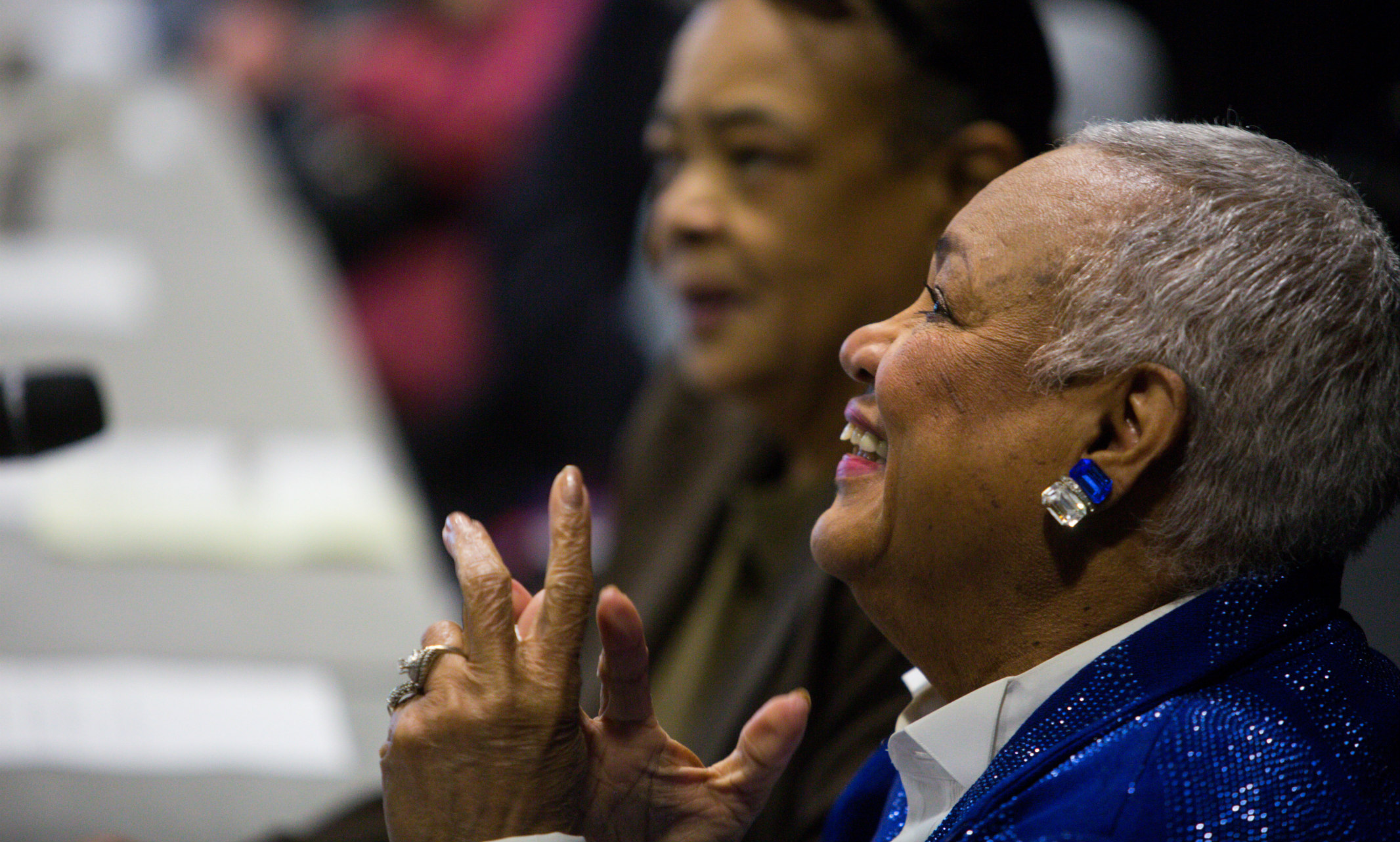
UMKC remembers alumna and advocate Yvonne Wilson
The University of Missouri-Kansas City is celebrating the life of former Missouri State Senator Yvonne Wilson (1929-2019) for her commitment and devotion to education, the university and the Kansas City community.
Yvonne Wilson (MA ’71, EDSP ’76) worked in the Kansas City, Missouri School District for 35 years as a teacher, principal and director of elementary education. In an interview with the UMKC School of Education she recounted always wanting to be a teacher.
“I started teaching neighborhood children on my grandmother’s steps,” she said of the house in her segregated Leeds neighborhood. “I’ve never been anything other than a teacher.”
Wilson attended Lincoln University and UMKC. She was an advisor to the UMKC School of Education and served on the advisory board for the Institute for Urban Education. The Missouri Association of Elementary School Principals recognized Wilson as a “Pioneer in Education” in 2007.
Wilson began her career during desegregation and was the first African American principal of Rockhill Elementary and the first African American to serve as president of the Missouri Association of Elementary School Principals. As a principal at Woodland School, she introduced Samuel Rodgers dental care to each classroom and ensured each child received care.
An advocate of early education throughout the district, she advocated for pre-school programs and was a proponent of Head Start.
A Starr Women’s Hall of Fame inductee in 2017, retired educator and Wilson’s nominator Marjorie Williams lauded the breadth of Wilson’s influence.
“Wilson’s educational leadership was undisputed and continued though her retirement and beyond.”
While Wilson was a teacher at heart, her community influence and broad career in education and public service exemplify her dedication to enriching the city through strong neighborhoods and schools. After retiring from education, she became a community activist, serving as a member of the Missouri House of Representatives and the Missouri Senate. As a tireless advocate for education, she was known for working across party lines.
Beyond her political commitments, Wilson volunteered for many community organizations including the Kansas City of Fountains Foundation, the Mid-America Regional Council Early Learning Board and the Kansas City Sister Cities Association.
Wilson led her classrooms, her schools and her community with a quiet courage and endless energy. She focused on understanding others’ views and developing relationships to further the success of individual children and broad constituencies. Her legacy will be a timeless reminder of the possibility of a steadfast commitment to a love of learning.
Wilson's services are scheduled for Friday, October 25, 2019. Details are available through Watkins Heritage Chapel.
Oct 15, 2019
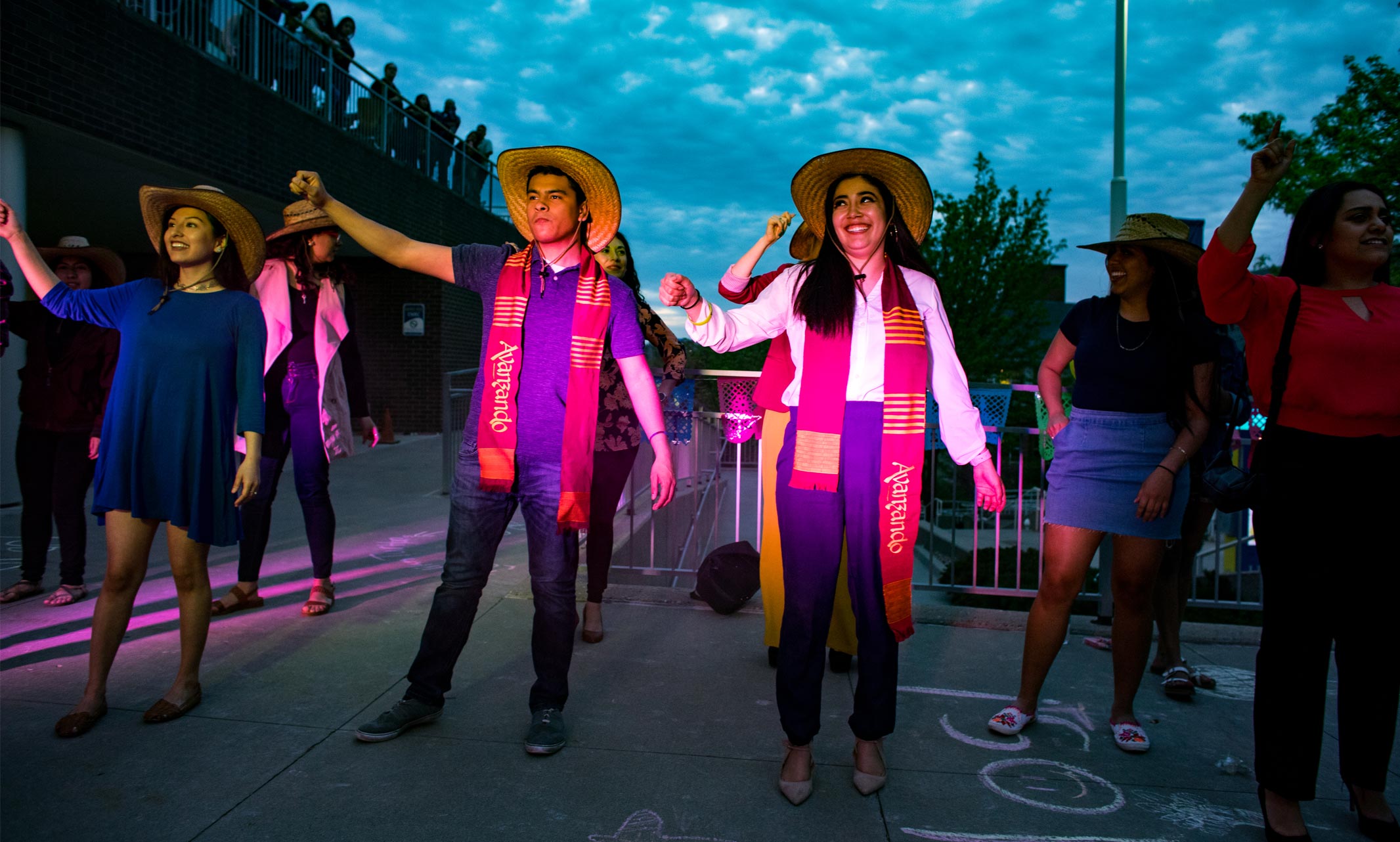
Celebrating beyond National Hispanic Heritage Month
As we wrap up National Hispanic Heritage Month, celebrating the influential and impactful contributions from those of Hispanic and Latino descent, we want to provide a quick list of resources for students looking to celebrate and connect throughout the rest of the year.
Every year during National Hispanic Heritage Month, we enjoy listening to speakers through the César Chávez Lecture Series and attending campus and community events with food and music from the Latinx perspective. Celebrating culture, traditions, history and heritage is important to us at UMKC. And it’s important these students know they have access programs, organizations and opportunities to make them feel at home.
Here is a list of some of the Hispanic and Latinx resources at UMKC.
UMKC Division of Diversity and Inclusion
The Division of Diversity and Inclusion thrives through the principle of teaching and learning through the broad areas of diversities within race, gender identity, sexual orientation, culture, nationality, learning style, educational level, life experiences and more. Events and programming engage students in socially constructed conversations and topics important to the multi-faceted purpose of culture.
Multicultural Student Affairs
Success is a key element for Multicultural Student Affairs. Aimed to encourage the value of diversity, the organization offers services such as a lounge and study meeting and event space for students to interact and fulfill academic goals. Additional programs such as monthly celebrations, staff-student academic check-ins and multicultural presentations serve to broaden students’ leadership roles and skills.
Avanzando
With over a hundred students and growing, Avanzando offers individualized support in increasing scholar retention, improving graduation rates and assuring a smooth transition into graduate school and careers post-graduation. Avanzando scholars are matched with a like-minded mentor who will link them to campus and outside resources beneficial to their future. Annual events throughout the year include leadership summits meant to embrace the Latinx identity and offer interactive workshops and self-development resources. The Avanzando Program is designed to support all Latinx Students on campus as well as Hispanic Development Fund and Agapito Mendoza Scholarship recipients
Mi Gente! For and With Latinx
For students who identify as Latinx, MiGente is a safe space for those to discuss acceptance of identity and important issues and topics touching the Latinx community and on campus. MiGente furthers the interest and celebration of the diversity within Latinx and Hispanic culture; creating social opportunities for those who are members. Contact Diversity and Inclusion or the employee affinity group MiGente for more information.
Latinx and Latin American Studies Program
Through the Latinx and Latin American Studies Program, students uncover the diversity of Latinx cultures within the U.S. and Latin America. Those enrolled are also connected to those within their culture who reside throughout Kansas City. Student interest in research, history and further expanding their education of Latinx culture is greatly supported through multiple internship and fellowship opportunities to finance their studies.
Hispanic Law Students Association
Created with the goal of diversifying the legal community, the Hispanic Law Students Association provides an array of networking opportunities through enforcing professional development skills and resources. HLSA, through fundraising and the importance of inclusion, works to increase support and membership in hopes of encouraging minorities in law.
Latino Medical Student Association
The mission of the Latino Medical Student Association is to create effective care for Kansas City’s growing Hispanic population and those of other underserved communities. Members of the association participate in community service activities and events (i.e. health fairs, informative sessions) benefiting the wellbeing of Kansas City community members.
Spanish Department
The Spanish Department offers multiple resources for students interested in effectively learning and using the language. In addition, they offer courses on Iberian, Latin American and South American culture, history and politics. The department’s faculty offers courses and conduct research on topics centered around and from the Spanish Golden Age, to contemporary Argentine culture.
Association of Latino Professionals for America at UMKC
The Association of Latino Professionals for America serves as a connection for Latinx leaders who are passionate about making an impact. With the goal of empowering and developing social and practical skills for Latino men and women in order to become leaders of character for their communities, the organization has been able to provide internship and career opportunities for its members.
Sigma Lambda Gamma
This historically Latina-based national sorority is committed to providing an outlet to all-things women empowerment. Their sisterhood strives to take responsibility and action within their global communities by implementing morals, ethics and education into their daily lives to serve as neighbors to other cultures through mutual respect and philanthropy. Get more information on requirements and the story of Sigma Lambda Gamma.
Latinx Student Union
Latinx Student Union is the base organization for Latinx students, culturally and socially. Students are impacted by an array of beneficial, lifelong skills dedicated to leadership, professionalism, unity, and strength. In addition, the organization work toward the goal of bringing awareness to UMKC students and faculty’s view and contribution to the Latinx community.
Oct 15, 2019
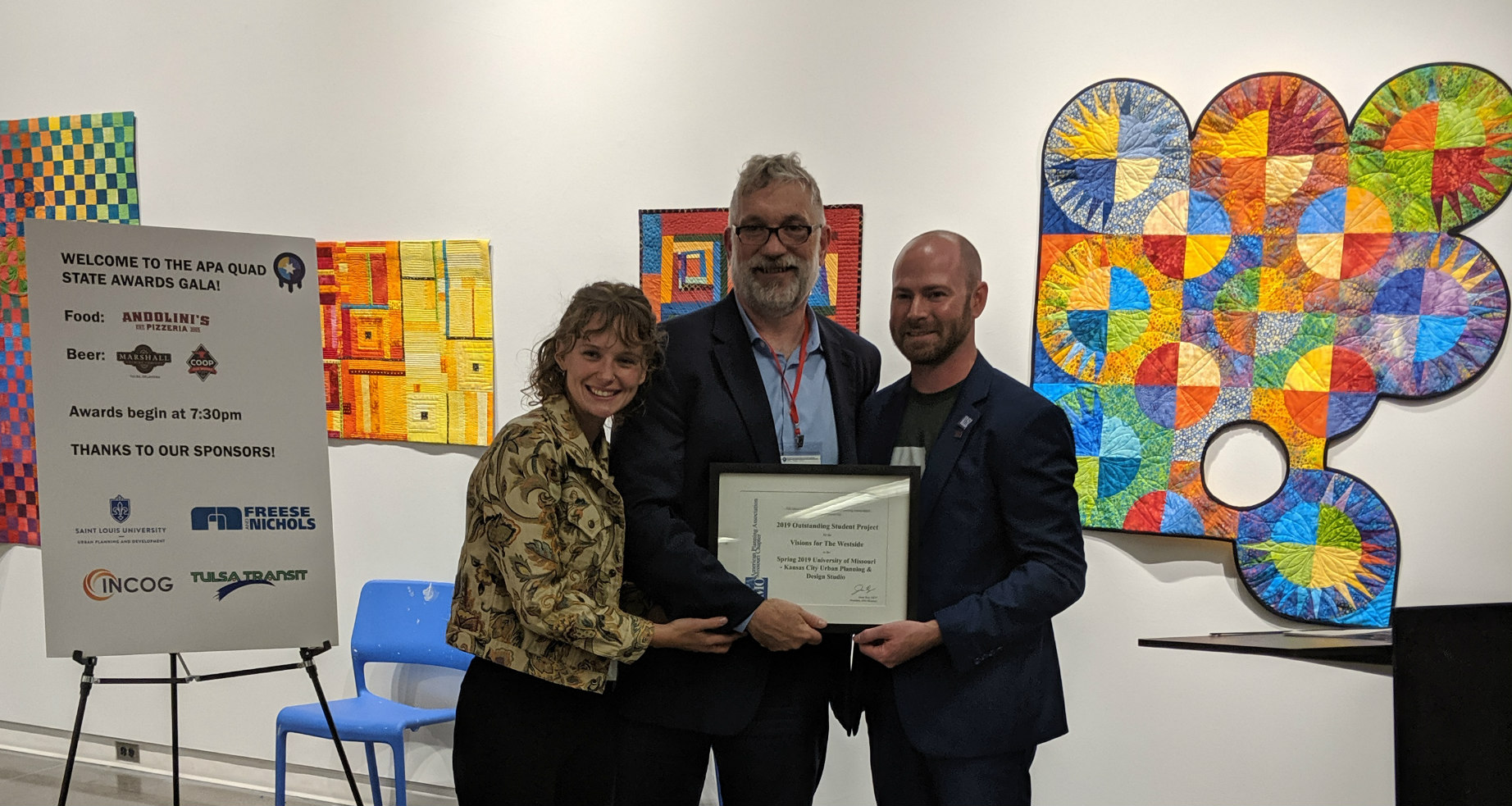
Fall 2018 Planning Studio class develops plan for the Westside
Eight UMKC Architecture Urban Planning + Design students received the Missouri State American Planning Association Outstanding Student Project Award for “Visions for The Westside.”
The project was part of the Fall 2018 Planning Studio class, and was completed in collaboration with the Hispanic Economic Development Corporation. The award recognizes an outstanding paper or class project that demonstrates the contribution of planning to contemporary issues; best applies the planning process; or applied planning research.
Through research, the Planning Studio class found that the Westside, as other inner-city neighborhoods and particularly minority neighborhoods, has historically been affected by urban renewal, freeway construction projects and disinvestment, creating challenges that persist today. In addition, the Westside is experiencing gentrification as it attracts interest from contemporary downtown planning revitalization efforts and real estate pressures. Their findings showed as a demographic group, Latinx people face specific challenges that also demand planning interventions.
The students synthesized the challenges and selected a few to focus on more deeply. They then searched for precedents of planning interventions that were successful elsewhere, distilled from those precedents lessons to be used in this project, tested multiple ideas for intervention and settled on the ones that made the most sense.
The students learned scenario planning techniques and developed three different scenarios to envision a more sustainable and equitable Westside by 2030:
Status quo remained within the current constraints and within the confines of current regulations and political mindsets and traditions.
Reform gently pushed for improvements in regulations, traditions and/or typologies.
Revolution radically pushed to transform the status quo so as to fully resolve the urban challenges identified in the neighborhood.
The Missouri APA Student Project Award was presented Oct. 10 at the Awards Banquet of the Quad State Conference, the annual conference of the Missouri, Kansas, Oklahoma and Arkansas chapters of the APA. Annamarie Weddle, AUPD alumna who worked on the project; and Michael Frisch, Ph.D., AICP, department chair and associate professor of the AUPD Department, accepted the award on behalf of Clara Irazábal- Zurita, Ph.D., UMKC AUPD professor who taught the studio course. AUPD students who worked on the project included Saphirah Pociluyko, Jesús Fernández, Rebeca Quiroz Villacis, Maitland Mehlhaff, Annamarie Weddle, Samantha Kaiser, Jenna Baker and Tyler Lehde.
“This is a wonderful achievement for our students and faculty,” Frisch said.
Oct 15, 2019
What to know about baccalaureate-M.D. programs
Baccalaureate-M.D. programs range in length from six to nine years, according to U.S. News and World Report. For example, the University of Missouri-Kansas City has a year-round curriculum that allows students to complete their undergraduate and medical degree in six years. Yahoo Finance also published the story.
Oct 15, 2019
Celebrate the power of expression through creative writing and reading
Kevin Willmott, the Academy Award winning screenwriter from Lawrence, Kansas, will be the featured speaker this year at the annual Writers for Readers dinner.
Willmott will discuss his screenwriting and filmmaking career, including his work on BlacKkKlansman and other collaborations with director Spike Lee, with local scriptwriter Mitch Bryan and author Whitney Terrell, UMKC associate professor of English. Mayor Quinton Lucas is also scheduled to speak.
Writers for Readers is an event celebrating the power of expression through creative writing and reading. Proceeds benefit a new creative writing initiative cosponsored by the Kansas City Public Library and UMKC, providing scholarships for MFA students in Creative Writing. The students will be teaching creative writing classes for underserved populations at the Kansas City Public Library and helping the library organize a new literary festival and a new literary award.
Writers for Readers will take place at 6:30 p.m. Wednesday, Nov. 13 in Room 401 of the Student Union. Tickets include dinner and admission to the event. For tickets, click here.
Oct 14, 2019
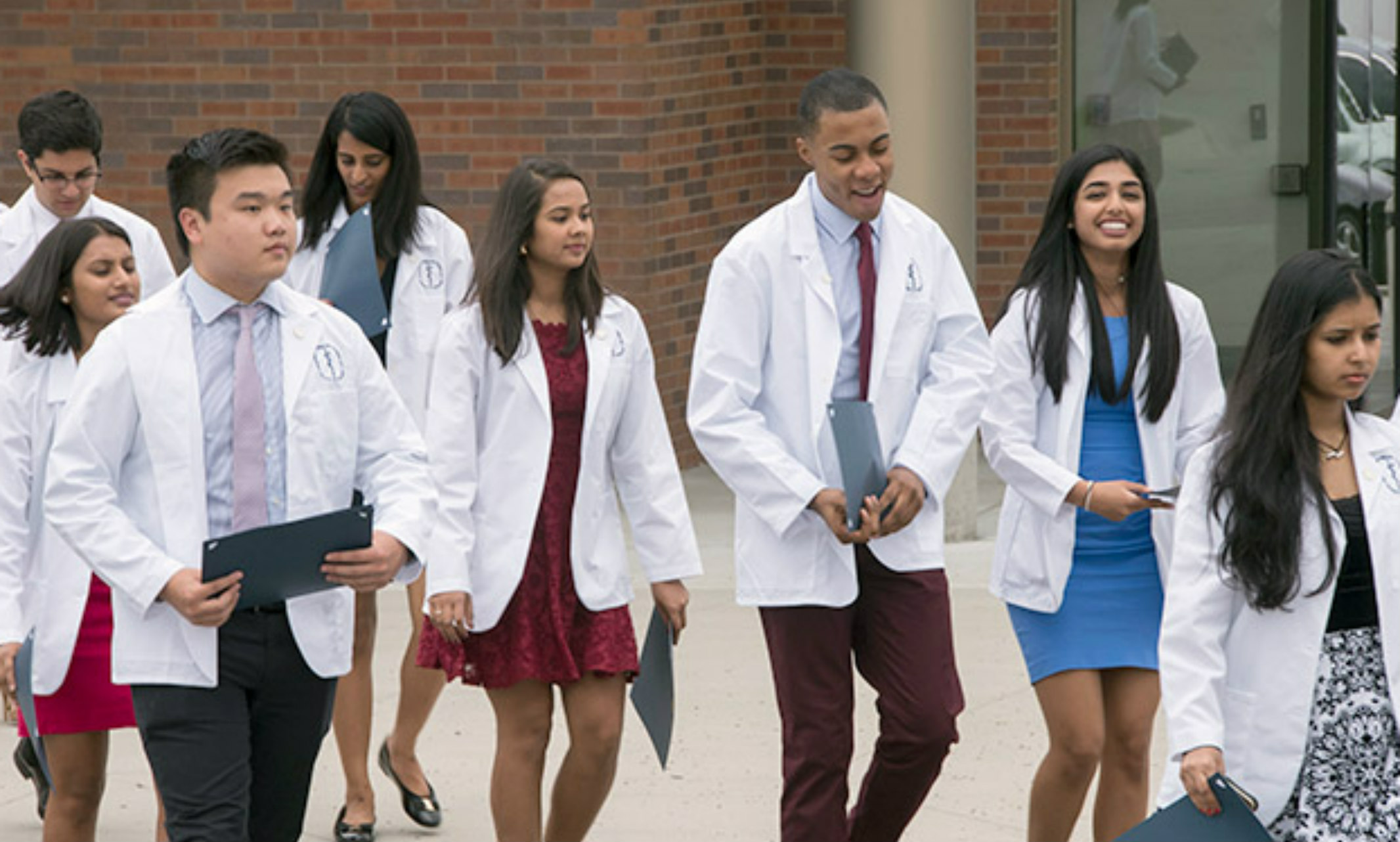
Committee announced; final candidates expected by spring 2020
UMKC Chancellor Mauli Agrawal has appointed a committee to lead a nationwide search for a new dean for the UMKC School of Medicine.
Barbara Bichelmeyer, provost and executive vice chancellor, will chair the committee. The search committee will work with Isaacson Miller, an executive search firm specializing in academic medical centers and healthcare institutions. The committee will begin the search process in October, considering local candidates and those from across the country, with the goal of holding interviews with final candidates in spring 2020. Conducting a search in this fashion is considered a best practice for senior leadership positions at a university.
Mary Anne Jackson, who has served as interim dean since July 2018, will continue to serve as interim dean during the search process. She was appointed the Special Advisor to the Chancellor on Health Affairs, and will assist in the search process. The American Academy of Pediatrics Section on Infectious Diseases will present Jackson with a Lifetime Achievement award on Oct. 28. Read a Children's Mercy article about her career.
The search committee represents campus and community leaders in the health professions – people who understand the vital role that the UMKC School of Medicine plays in the overall health of our community and region, and the importance of strong, visionary leadership for the school.
The committee is searching for a leader to build on the school’s reputation for innovative and highly effective medical education.
Founded in 1971, the UMKC School of Medicine is a docent model of medical education in which students begin training directly after high school, completing a combined baccalaureate/Doctor of Medicine program, which allows students to graduate in six years with their medical degree prior to beginning residency. The school’s innovative curriculum provides students with early and continuous patient-care experience and fully integrates liberal arts/humanities, basic sciences and clinical medicine. Students begin learning about medicine and interacting with patients from the first day of class. They also learn the skills and attitudes that foster compassion, honesty and integrity. Hands-on learning and clinical experience are integrated throughout all the years of the program.
Search Committee
Barbara Bichelmeyer, chair, provost and executive vice chancellor, UMKC
Jannette Berkley-Patton, professor, UMKC School of Medicine
Denise Bratcher, physician, Children’s Mercy, and professor of pediatrics, UMKC School of Medicine
Diana Dark, physician, and associate dean of Saint Luke’s Health Programs and professor, UMKC School of Medicine
Marc Hahn, president and CEO, Kansas City University of Medicine and Biosciences
Jani Johnson, CEO, Saint Luke’s Hospital of Kansas City
Peter Koulen, professor, UMKC School of Medicine
Kamani Lankachandra, president, Truman Medical Centers medical staff, and professor and chair of pathology, UMKC School of Medicine
Chris Liu, vice chancellor for research, UMKC
Russell Melchert, dean, UMKC School of Pharmacy
Paula Monaghan Nichols, professor and associate dean, UMKC School of Medicine
Marion Pierson, physician, Village Pediatrics
Megan Roedel, chief operating officer, Center for Behavioral Medicine of the Missouri Department of Mental Health
Charlie Shields, president and CEO, Truman Medical Centers
Gary Salzman, professor, UMKC School of Medicine
Nathan Thomas, associate dean of diversity and inclusion, UMKC School of Medicine
Kevin Truman, dean, UMKC School of Computing and Engineering
Timothy Weber, student, UMKC School of Medicine
Oct 10, 2019
American Board of Radiology featured radiologist Amy Patel
Amy Patel, M.D. was one of five finalists for the Champions of Hope award. Patel is a breast imaging specialist at Liberty Hospital in Missouri and assistant professor of Radiology at the UMKC School of Medicine.
Oct 08, 2019
Partnership to provide comprehensive care for student-athletes
Kansas City Athletics and Truman Medical Centers/ University Health (TMC) are announcing the creation of a winning healthcare partnership.
Kansas City Roos' Director of Athletics Dr. Brandon Martin and TMC President and CEO Charlie Shields say when a university and an academic medical center team up, it creates new and exciting opportunities. Especially in areas that matter to the community, like health, education, and athletics.
This partnership means TMC/ University Health will be known as the "Official Healthcare Provider of Kansas City Athletics." The providers at TMC/ University Health will help keep student athletes at their healthiest by providing quality, comprehensive care and education about living their healthiest lives.
"Truman Medical Center's founding mission includes our commitment to partner with others in the community to improve the quality of life, and we believe this aligns with that goal. We would not be an Academic Medical Center without our very important partnership with UMKC's schools of Medicine, Pharmacy, Nursing and Dentistry and this sponsorship is one more way of aligning with UMKC. As it works with us to keep the community healthy, we get to work with the university to ensure its student athletes stay in great shape, or get back on track after an injury. It helps that our academic clinicians train the doctors and health professionals of the future, staying ahead of the curve in healthcare. What's good for Kansas City, will be great for Kansas City Athletics," said Charlie Shields, president and CEO of Truman Medical Centers/ University Health.
TMC/ University Health is proud to be highlighted on signage and videoboards at UMKC, but is equally proud to let its patients know about this new extension to the TMC/ University Health – UMKC partnership. Other assets include TMC/ University Health serving as the presenting sponsor of both the official athletics website, KCRoos.com, and the soon-to-be released KCRoos app. TMC/ University Health will also be the presenting sponsor of the Roo Basketball Gala on Oct. 25 as well as KC's Crew, the official kid's club of Kansas City Athletics.
"This new partnership with TMC/ University Health is another giant jump forward for the Roos," said Dr. Martin. "We're proud to work with our friends at TMC/ University Health to create a meaningful partnership that will benefit us all and set the bar for similar partnerships across campus."
About Truman Medical Centers/ University Health
Truman Medical Centers (TMC)/ University Health offer essential, state-of-the-art care to Kansas City. From a Level One Trauma Center, to the birthplace of nearly half of all babies born in Kansas City, MO, our dedicated experts provide a range of healthcare services. Caring for patients at both TMC/ University Health, our specialists treat chronic diseases, chronic pain, high risk pregnancies, sickle cell anemia and sleep disorders. Our state-of-the art Richard and Annette Bloch Cancer Center is home to comprehensive cancer care, designed to help our patients through their diagnosis and journey. TMC/ University Health's beautiful new outpatient care and day-surgery center- the only outpatient surgery center in downtown KC- offers 15 clinics and multiple primary care practices including the Sabates Eye Center, Plastic Surgery, Obstetrics & Gynecology, Orthopedics and Medical Imaging with Siemens 3D Mammography. We offer the area's most comprehensive behavioral health program in addition to a long-term care facility and multiple primary care practices throughout eastern Jackson County. TMC/ University Health is a primary teaching hospital for the University of Missouri-Kansas City Schools of Medicine, Nursing, Pharmacy and Dentistry so our doctors are academic specialists who teach the providers of the future.
About the University of Missouri-Kansas City
The University of Missouri-Kansas City, one of four University of Missouri campuses, is a public university serving more than 16,000 undergraduate, graduate and professional students. Located in the heart of a thriving urban setting, the university is surrounded by arts, entertainment, culture and sports. The university engages with the community and economy based on a four-part mission: life and health sciences; visual and performing arts; urban issues and education; and a vibrant learning and campus life experience. The small class sizes give students a personal education and create a small-college feel, while Kansas City's metropolitan environment provides extensive opportunities for internships and networking as well as culture and entertainment.
About Kansas City Athletics
Kansas City Athletics is a NCAA Division I member and in its seventh year of membership in the Western Athletic Conference. Under the guidance of Director of Athletics Dr. Brandon Martin, the Roos field 16 varsity sports with 240-plus student-athletes. During the summer of 2019, the athletics department announced a new logo and re-branding, switching from UMKC Athletics to Kansas City Athletics. For more information, visit KCRoos.com or follow us on social media @KCRoosAthletics.
Oct 07, 2019
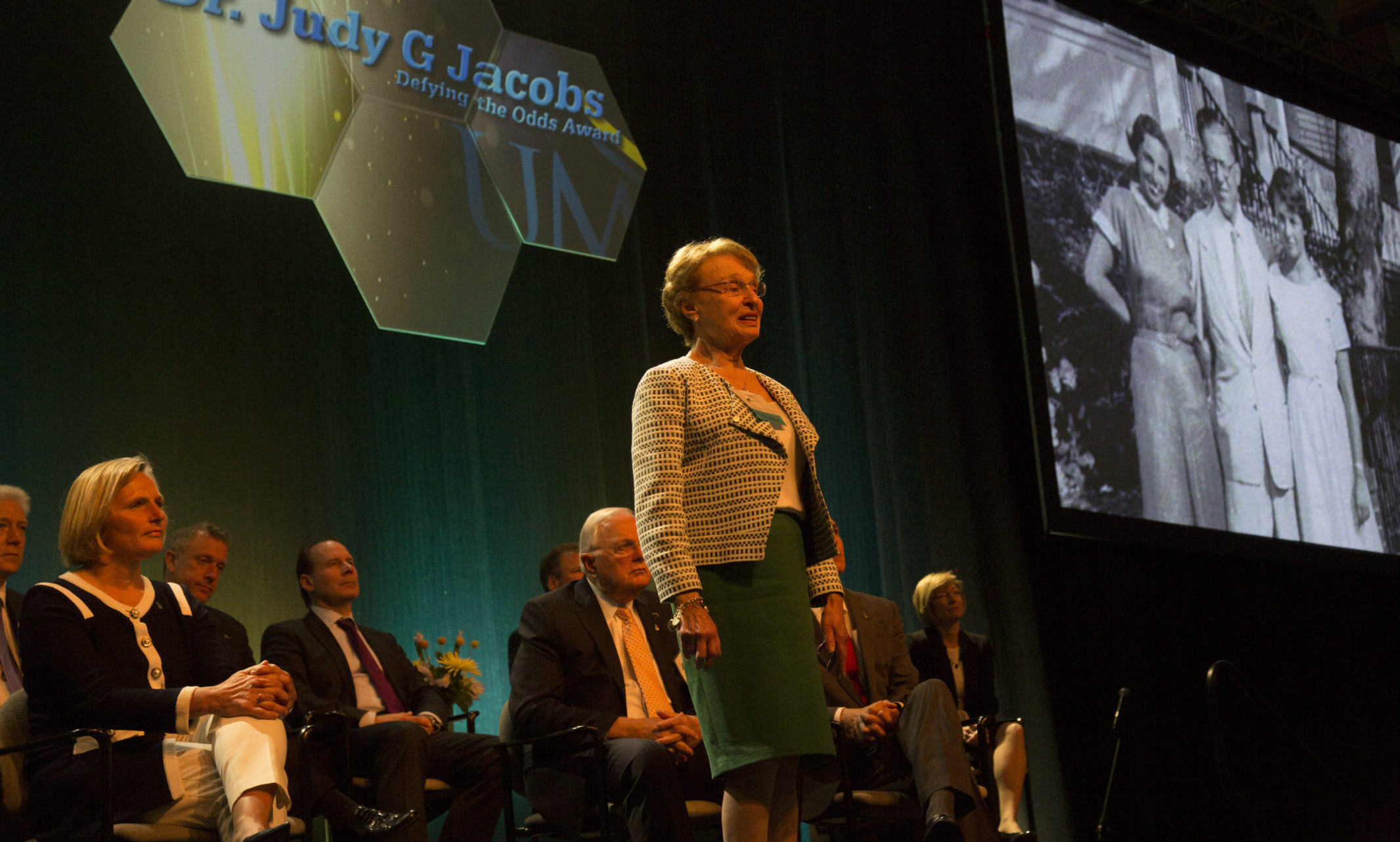
Judy Jacobs is one of 70 survivors photographed for "Lest We Forget"
Alumna Judy Jacobs' portrait by Luigi Toscano is featured in "Lest We Forget," a Holocaust memorial exhibit at the World War I Museum and Memorial courtyard through Oct. 6.
Judy Jacobs (MBA '77, Ph.D. '86) was the 2016 University of Missouri-Kansas City Defying the Odds Alumni Award recipient. She previously shared her powerful story with us. Here's our discussion about her childhood in Hungary and time in the Bergen-Belsen camp.
What was your childhood like before that horrible day in 1944?
My early childhood in Budapest was idyllic. We were an upper middle-class family, with a lovely home and an enviable lifestyle. I am an only child and my parents gave me all the attention I craved. I was also the only grandchild on my mother’s side. I had many aunts, uncles and cousins in Budapest. The relatives, coupled with a large number of friends, provided a happy environment. Although my father was a busy radiologist, he always had time for me. In the winters we ice skated together every day. My mother was credentialed in art and design. She and I spent many hours on craft projects and making doll clothes. I spent much of every summer with my maternal grandparents in Bekes, a small town in southeast Hungary, allowing me to enjoy the outdoor activities unavailable to a city dweller.
There was more than one “horrible day.” The quality of our lives steadily deteriorated as anti-Semitism became institutionalized, beginning about the time Hungary joined the Axis in 1943. From then on, we increasingly felt the general effects of the War and were subjected to an ever growing list of restrictions because we were Jewish.
The Nazis occupied Hungary on March 19, 1944, marking the beginning of the end for Hungarian Jewry. From then on our lives were defined by fear, deprivation and uncertainty. Our time outdoors was limited to a few hours in the afternoon. The Nazis often sealed off both ends of a given block and arrested all Jews there, who were easily identified by the yellow stars on their outer garments. Some were jailed, some were immediately deported to a concentration camp and others were marched to the Danube where they were shot into the river. We were barred from using any type of transportation and our mail and newspapers were censored. We never knew what would happen next. As a young child, I was always frightened.
How do you describe life in Bergen-Belsen when sharing your story?
Life in Bergen-Belsen was hell! The Nazis referred to us as subhuman, and treated us accordingly. We suffered no direct physical abuse, but the psychological degradation to which we were subjected is indescribable. During daily roll call, the Nazis brandished their whips and menacingly pointed their guns at us; they repeatedly called us vermin unworthy of living, filthy pigs and parasites. As a seven-year-old child I began to wonder if I really was a subhuman, filthy, Jewish pig.
Our daily rations of about 350 calories were barely edible. There were bunks in our filthy and unventilated barrack; three abreast and three high. They were covered with dirty straw. Vermin of all kinds including mice, rats, bedbugs and fleas became our constant bedfellows. There was no hot water or soap. Such unsanitary living conditions and substandard diet caused extensive disease, but the Nazis provided neither medical care nor drugs or supplies.
"I was seven years old in the concentration camp. I lived in constant fear, fear of Nazi terror, fear of being separated from my parents and fear of the unknown." —Judy Jacobs
Many hopeless inmates spent most of the day on their bunks, with eyes glazed. My parents recognized the importance of maintaining their humanity. My father and some of his colleagues organized “clinics” for the sick. They had neither equipment nor supplies but they were able to provide a modicum of care, mostly in an advisory capacity. By helping fellow inmates, they were able to regain some dignity and, thus, their humanity. My mother, despondent as the rest, recognized the importance of morale and she taught drawing to some interested children. With no available art supplies, she used a stick and the dirt at her feet instead of drawing paper and pencils.
I was seven years old in the concentration camp. I lived in constant fear, fear of Nazi terror, fear of being separated from my parents and fear of the unknown. I had nothing to do most of the time and just followed my parents around, intently listening to their conversations and always keeping my eyes cast downward, hoping not to be noticed. According to my birth certificate I was a seven-year-old child. In reality I was seven years old, but I had no opportunity to be a child.
How were you liberated from Bergen-Belsen?
We had come to Bergen-Belsen on the Kasztner Train, a rescue operation named after the man who organized it. Kasztner reached a deal with the Nazis whereby they agreed to transport a trainful of Jews (ultimately 1,686) to the safety of a neutral country for about $1,000 per person. They received a portion of the money in advance; the balance was payable when the train reached its destination. Instead of a neutral country, the train went to Bergen-Belsen. Desperate for money near the end of the War, the Nazis released us to Switzerland and received the balance due at the Swiss border.
In June, we had gone to Bergen-Belsen in overcrowded, filthy cattle cars. Six months later, we left the train station in a heated passenger train, not knowing where we were headed. The Nazis provided edible food. I remember sardines and chocolate. We realize we had been freed as we heard the church bells of St. Gallen, Switzerland.
Oct 03, 2019
Christopher Garmon talks to The Sun Chronicle
Christopher Garmon, an assistant professor of health administration at the UMKC Bloch School, specializes his research on surprise bills and says that ambulance bills can be staggering.
Oct 01, 2019
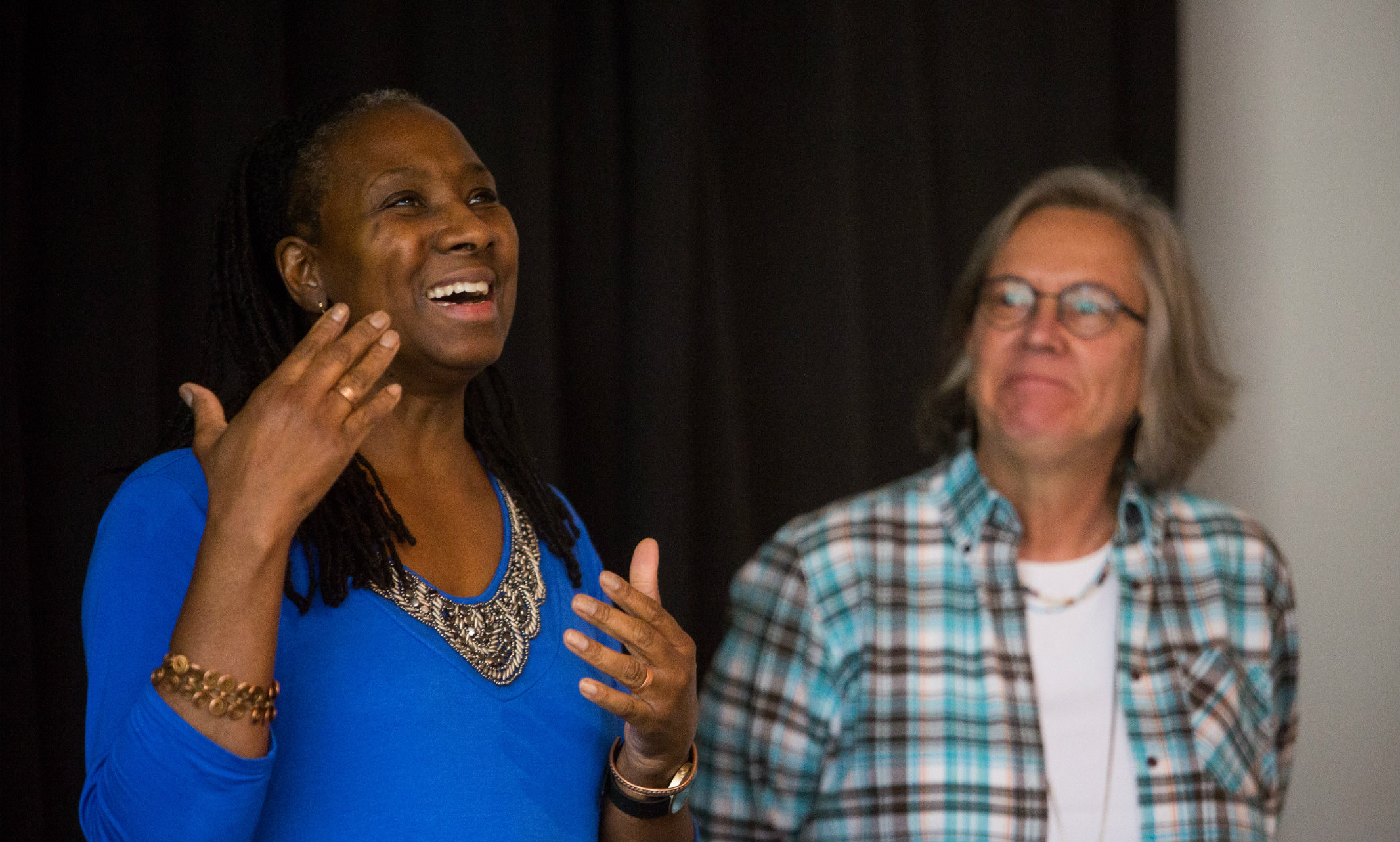
Second round of funding awarded
Grandparents are increasingly becoming the primary caregivers for their grandchildren. The UMKC Psychology Department at the College of Arts and Sciences has recently received a second round of funding from the Health Forward Foundation for a program that supports grandparents in this role.
More than 2.5 million grandparents in the United States are raising grandchildren, according to the 2017 U.S. census. Compared to non-relative foster homes, the children living with their grandparents are more likely to have a permanent home, less likely to run away and are more likely to report feeling loved and stay in contact with extended family.
“Our grandparents are fiercely independent and the idea of a ‘support group’ was not attractive.”
-
Joan McDowd, professor of psychology and director of gerontology programs
While this speaks well of the relationships, there are significant – and often overlooked - challenges for grandparents in this situation.
Recognizing the need, Joan McDowd, professor of psychology and director of gerontology programs at UMKC, has developed a program for these older adults who are managing a second round of parenting.
“Four years ago, I stared exploring the possibility of collaborating with a community-based partner,” McDowd said. “I connected with Palestine Missionary Baptist Church and Senior Citizens Activity Center and started talking to people. We thought an intergenerational program would be interesting.”
The team began to talk with grandparents in the community at churches and health fairs as well as the grandparents at Pemberton Park, an apartment complex specifically designed by the Housing Authority of Kansas City for “grandfamilies.”
“We set up tables at health fairs to do a needs assessment,” McDowd said. “We threw a Halloween party so that the grandparents could take a break and the kids could have fun.”
This informal information gathering led to a pilot project with Palestine Church hosting monthly meetings for grandparents. Once the team determined what was working, they submitted a request to Health Forward and received funding.
“As a foundation, we are always interested in how to support collaborative efforts that bring in the stakeholders as part of a larger community-wide project,” Andres Dominguez, senior program officer for the Health Forward Foundation said. “This grant seeks to address a concern of engaging an intergenerational approach to sustained family well-being.”
“The first year of funding allowed us to develop a series of meetings on topics that the grandparents had identified,” McDowd said. “We had lawyers address family law. We invited a financial planner to discuss preparing for the future. We hosted psychologists to talk about trauma and self-care.”
In addition to these “Saturday Sessions”, the team tried to set up smaller support groups so grandparents could use one another as resources for emotional or practical support. McDowd’s team created leaders’ manuals on how to organize a group and what subjects to cover. They created YouTube videos where they play-acted how to handle difficult situations like managing someone who talks too much or the person who doesn’t talk at all. However, when the team tried to organize support groups, grandparents hesitated to join.
“Our grandparents are fiercely independent, and the idea of a ‘support group’ was not attractive,” McDowd said. “But when we would ask what was working and what they wanted more of, they would often say, ‘More time to share our stories,’ or ‘More time to talk.’ But ‘support group’ had a negative connotation.” Using this feedback, the team has now developed a program component called “Grandparents Café” that provides the opportunity for grandparents to break into small groups and discuss topics of the day.
“If grandchildren are living with their grandparents, often it is because something bad has happened,” McDowd said. “Still there’s no law that says that if something happens you have to take your grandchildren. These people have stepped up.”
Danita Hoard, B.A. ’16, M.S.W. ’19, worked with McDowd gathering information determining grandparents’ needs and developing the program manual.
“I was interested in this program because I was raised by my grandmother,” Hoard says. “It was great to see that these meetings allowed the grandparents to work through the trauma their grandchildren were facing, but also connect with other grandparents and programs. But it also made me aware that growing up my needs were being met, but I wasn’t aware of what of my grandmother experienced.”
It's not unusual that even the people closest to these situations overlook the strain that grandparent caregivers are under. McDowd thinks that is why the program has been successful.
“I’ve really seen the grandparents come out of their shells because they can relate to both the subject matter and each other. The speaker may be talking about the financial planning - that's all super important information, but when you get down to it, they are hurting and when a facilitator is addressing those issues it becomes much more powerful. What we're doing has become more powerful.”
The success of these sessions – and the resulting sustainability plan - led to a second round of funding from the Health Forward Foundation.
“Joan and her team have shown us that they have the ability to take what has already been accomplished and build on it,” Dominguez says. “Reinvestment can always add value to our grant work. In addition, programs and projects like this are able to reach seniors and bring life to the concept of age-friendly communities. As this city and nation ages, and with baby boomers now being at the cusp of ‘retirement,’ projects that can share their findings and accomplishment can become models for replication.”
Oct 01, 2019
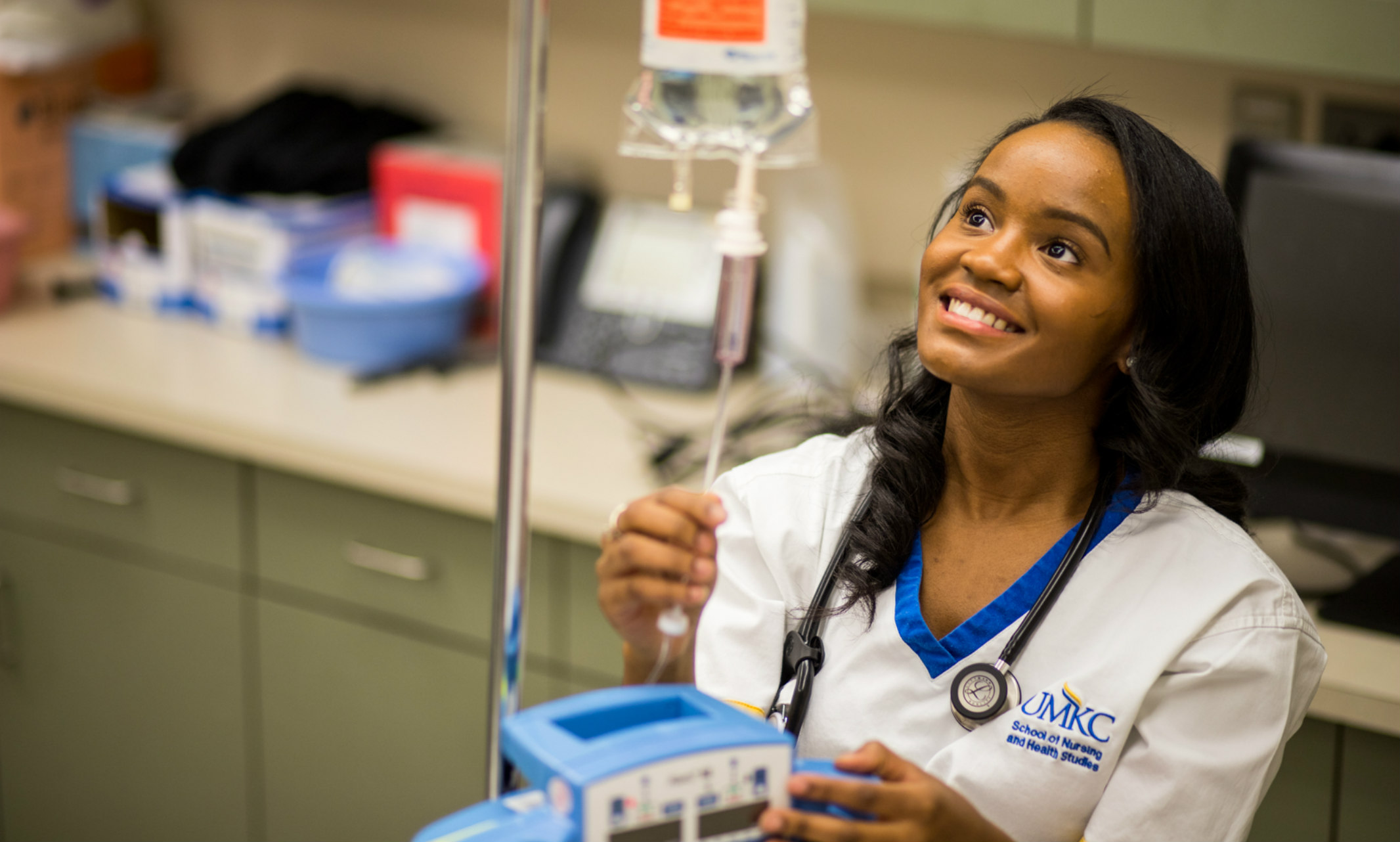
UMKC provided key connections and support
Get to know our people and you’ll know what UMKC is all about.
Alauna Christian '19 Hometown: St. Louis, Missouri High School: Clyde C. Miller Career Academy Degree program: Nursing Career: Nurse at VA Hospital and Signature Psychiatric Hospital
Why did you choose UMKC?
I selected UMKC because of its reputation for health-care professions. Initially I wanted to go through the six-year medical program when I decided to apply here. However, I realized the patient connection I thrived in was within the field of nursing. Visualizing the way nurses cared for my family members throughout their illnesses created a passion in myself to do the same for others.
UMKC offered me a lot of different opportunities, including scholarships, internships and connections. They helped me develop my leadership skills and land the career I wanted in nursing.
Tell us about your internships.
I completed an internship at the Kansas City VA Hospital in their VALOR Program. It allowed me to understand the socioeconomic struggles our veterans endure throughout their lives. I enjoyed working with this population because I learned a lot about critical care and mental illness. This experience confirmed my career aspirations to become a psychiatric nurse practitioner.
"UMKC offered me a lot of different opportunities, including scholarships, internships and connections. They helped me develop my leadership skills and land the career I wanted in nursing."
Why do you focus on mental illness?
I think mental health is definitely an aspect that has been ignored and is broken in the community. Growing up seeing people with mental health issues, and understanding how people in the African American community suffer from mental illness, I've always wanted to identify the reason behind that. And help people who have it. And not just the people who have mental illness, but the people and their families.
What was the nursing program like?
The challenges of the nursing program are time management and critical thinking. It is important to balance studying and clinical hours. The benefits to the program are the number clinical hours and variety of clinical sites offered. UMKC gave me the opportunity to visit several health-care facilities for the specialties within our program. For example, UMKC has clinical rotations for pediatrics, community health, mental health, obstetrics, critical care and many more.
How has your program inspired you?
It has inspired me to further my education in mental health and receive my Doctorate in Nursing Practice for psychiatric mental health. My future plan is to establish a nonprofit organization to assist those with mental illness and raise awareness within the community. UMKC has inspired me to evolve into a leader in the nursing community.
What extracurricular activities were you involved in at UMKC?
I was involved in a lot of student organizations on campus and held a lot of leadership positions. I was the president of the Student Council of Nursing and Health Studies, vice president of the Student Nursing Association, selection chair for the Mortar Board Honor Society and a mentor for nursing students.
"Growing up seeing people with mental health issues, and understanding how people in the African American community suffer from mental illness, I've always wanted to identify the reason behind that."
What UMKC experiences are you taking into your professional career?
I hope to take the experiences of mentorship into my professional career as a nursing. I would like to help other students reach their career aspirations to become a nurse because I was also mentored into my position. The mentors at the Multicultural Student Affairs Office helped me to succeed during the first couple years of my college career.
Oct 01, 2019
IN Kansas City magazine catches up with the renowned Conservatory professor
The magazine caught up with Chen Yi, a doctor of musical arts and Lorena Searcy Cravens/Millsap/Missouri Distinguished Professor in Music Composition at UMKC.
Oct 01, 2019
UMKC has significant role to play in University of Missouri president Mun Choi's bold initiative
KCUR's Up to Date hosted President Choi to discuss his ambitious NextGen Precision Health Intiative designed to push all four University of Missouri system campuses into the forefront of health care advances. UMKC's role will be to develop a center for excellence in data analytics.
Sep 30, 2019
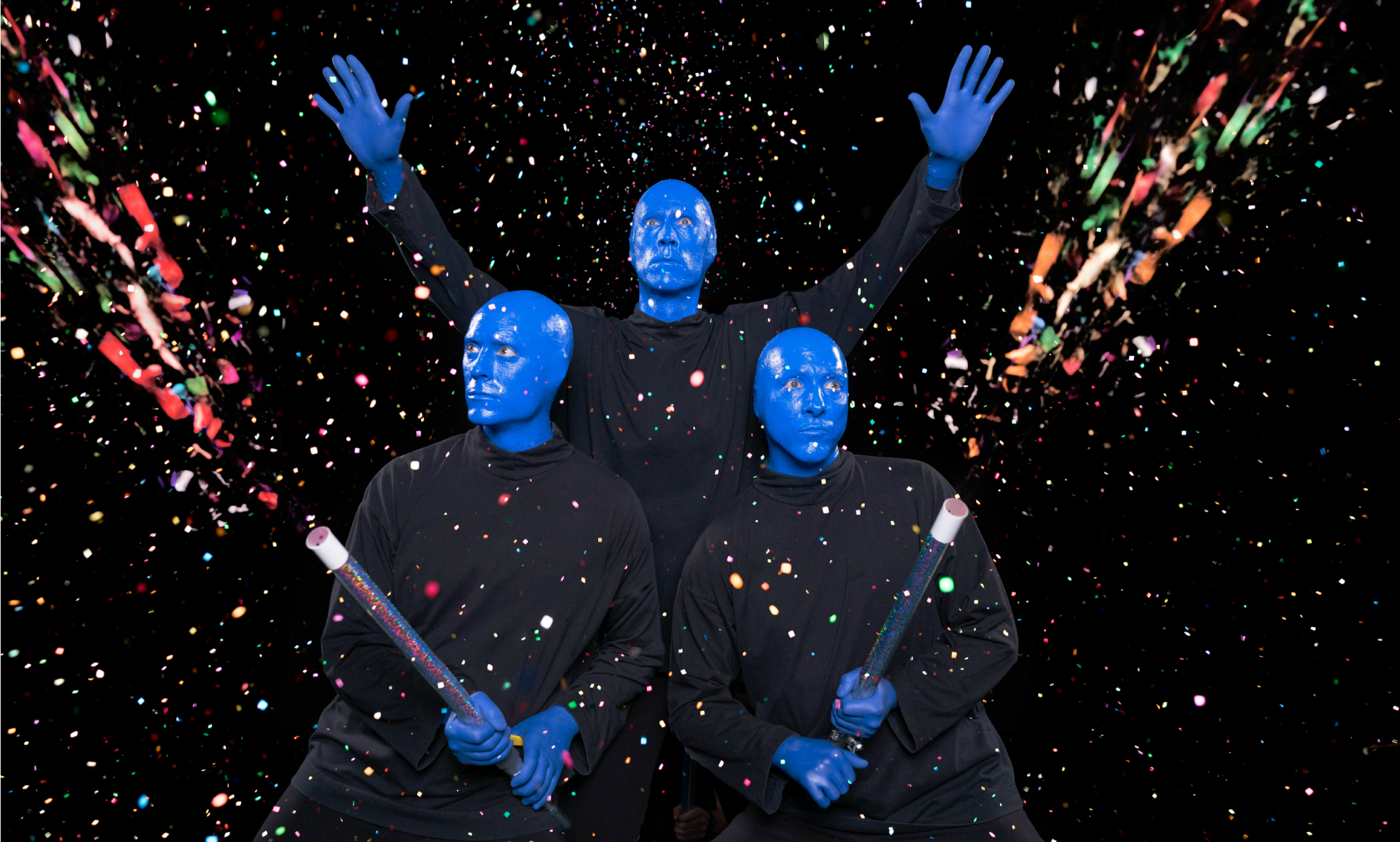
The UMKC Theatre alumnus reflects on his nearly 20 years in blue
Matt Ramsey (M.F.A. '00) was hired as a Blue Man fresh out of grad school. What he expected to be a year-long stint has become a "bona-fide career."
The internationally recognized Blue Man Group has entertained more than 35 million people in 25 countries with their unique performances that incorporate drums, paint and marshmallows.
Ramsey recently spoke to us about his time in the group.
What was the training like to become a Blue Man?
It’s generally about a three-month process in which we teach the blocking, the music, and most importantly the acting. The last part is the hardest thing to learn: how the character thinks and behaves. For me, training to be a Blue Man was like an extension of graduate school. It’s a performance style that requires a mental and physical discipline that I was well prepared for after UMKC.
The most bizarre part of training was practicing catching marshmallows in my mouth. Every day for three months.
What are some of the most interesting things you've gotten to do with the group?
I’ve had so many incredible experiences: throwing out the first pitch for the Chicago Cubs, performing on the Tonight Show and performing at the Olympic Stadium in Berlin.
I’ve performed with The Roots, Neil Patrick Harris, Shaquille O’Neill, and this summer I was at a Mets game at Citi Field throwing t-shirts into the crowd with Mr. Met. Also, it’s me on the cover of the Blue Man Group album called Three.
I think the most surreal moment was being an answer in Jeopardy. I was named in a question about Blue Man Group, to hear Alex Trebek say “Matt Ramsey” on Jeopardy was amazing!
Ramsey in costume, left, before throwing t-shirts out at a New York Mets game and helping other Blue Men during a photoshoot, he's pictured out of costume top left.
What keeps you coming back to being a Blue Man?
I’m often asked if I get tired of doing the same show. There have been times, naturally, when I can’t believe I have to put on blue greasepaint again. But it’s not long before I’m reminded again how special it is to perform this character. The level of listening, commitment, and focus required to connect with a theater full of strangers without saying a word is an incredible feeling. It’s why I’ve stayed for this long- the connection on stage between the three Blue Men is something I’ve rarely experienced in other shows. It’s very satisfying.
Sep 27, 2019
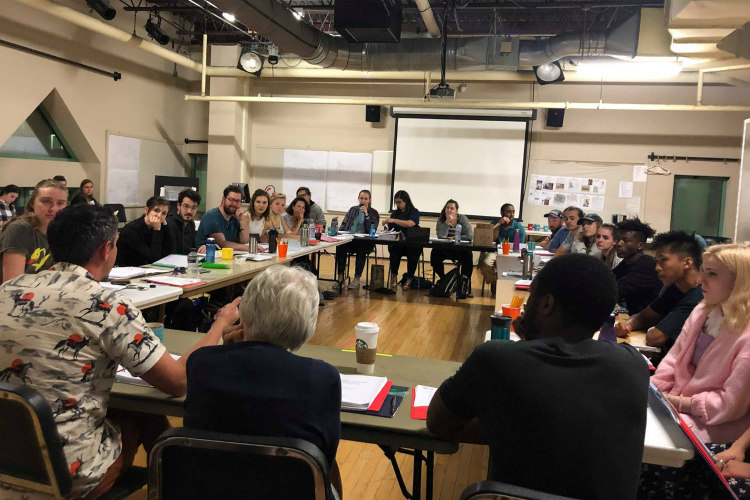
New season features exceptional talent, quality shows
Rehearsals are underway for the first production of the University of Missouri-Kansas City Theatre 2019-20 season with “An Italian Straw Hat” on Oct. 18.
“For decades, UMKC Theatre has been enriching the Kansas City theatre scene by providing actors, dramaturgs, costume designers, stage managers, production managers, sound designers and more,” said Kenneth Martin, UMKC Theatre chair and Patricia McIlrath Endowed Professor of Theatre. “We’re proud to continue that tradition with a strong first production, ‘An Italian Straw Hat.’ ”
The Productions
An Italian Straw Hat
Oct. 18 through Oct. 27 in Spencer Theatre
This is an undergraduate and graduate production by Eugène Labiche and Marc-Michel, and newly translated by Felica Londré, Ph.D., Curators’ Distinguished Professor. The show is directed by Ian Crawford, associate artistic director at Unicorn Theatre.
Groom-to-be Fadinard gallops all over Paris on his wedding day in search of a straw hat to replace one his horse has inadvertently eaten. Followed in hot pursuit by his fiancée, her blustering father and a giant wedding party of her country relatives, Fadinard makes his way through increasingly ridiculous situations to try to save his big day. In a new translation by Londré, with a contemporary pop music score, this hysterical French farce is not to be missed.
Tickets are $12 each. For more information and to purchase tickets, visit the UMKC Central Ticket Office.
Discovery Project
Oct. 18 through Oct. 21 in Studio 116 of the Olson Performing Arts Center
The Discovery Project is an opportunity for first-year MFA acting and design students to deepen and express the discoveries they are making in their first few months of training. It is a personal and creative lab. This production is free. Tickets are not required.
Fall Intensive
Nov. 14 through Nov. 18 in Room 105 of Grant Hall
This is an undergraduate production directed by Heidi Van, producing artistic director at Fishtank Theatre.
Annually, Fishtank Theatre works with UMKC undergraduate theatre students on a production that fuses form and idea in a devised piece based on the students’ themed class work.
This production is free. Tickets are not required.
The Moors
Nov. 29 through Dec. 8 in Studio 116 of Olson Performing Arts Center
This is a graduate production by Jen Silverman and directed by Kim Martin-Cotten.
Two sisters and a dog live out their lives on the bleak English moors, and dream of love and power. The arrival of a hapless governess and a moor-hen set all three on a strange and dangerous path. “The Moors” is a dark comedy about love, desperation and visibility.
Tickets are $12 each. For more information and to purchase tickets, visit the UMKC Central Ticket Office.
White Rose: We Defied Hitler
Jan. 24, 2020, through Feb. 9, 2020, at Crown Center, 2450 Grand Ave., Suite 144
This is a graduate co-production with Coterie Theatre by David Meyers, and directed by Jeff Church and Markus Potter.
Based on real events, “White Rose: We Defied Hitler” is a challenging new work that examines the role of ordinary people in extraordinary times. This gripping and intriguing play tells the true story of Sophie Scholl, a German college student who led one of the major acts of public resistance to the Nazis during the Second World War. The play contains little-known facts about Sophie, her brother Hans, and the civil disobedience of the White Rose movement in Nazi Germany. Scholl’s moral strength is tested while being interrogated for her crimes, leading her to question whether to save her own life or continue her righteous crusade.
Tickets start at $15 each. For more information and to purchase tickets, visit the Coterie Theatre.
Blood Wedding
March 6 through March 15 in Studio 116 of Olson Performing Arts Center
This is an undergraduate production by Federico García Lorca and directed by Vanessa Severo.
Two families in semi-mythical rural Spain are intricately bound in an unbreakable cycle of murder and revenge. The death-bound love triangle at the center of the play fuels these passions to a fever pitch and propels the story to its unstoppable tragic conclusion. An arranged country marriage between the children of rich landowners is about to take place. A past lover, himself in a loveless marriage, cannot allow the wedding to take place and spirits the bride away, who goes with him willingly on her wedding night. An entire town goes after the lovers in the middle of the night where pursuers and pursued plunge into a realm of deep darkness where the moonlight is not friendly and the forest not shelter enough.
Tickets start at $12 each. For more information and to purchase tickets, visit the UMKC Central Ticket Office.
Playwright Showcase
April 16 through April 20 in Room 105 of Grant Hall
This is an undergraduate production. Playwrights and directors will be announced later. The show includes staged premieres by UMKC Theatre undergraduate, graduate and alumni playwrights performed by undergraduate actors.
This production is free. Tickets are not required.
Divided
April 24 through May 3 in Studio 116 of Olson Performing Arts Center
This is a graduate production and devised production about what sets Americans apart and what brings us together. It is co-created by Stephanie Roberts, associate professor of Physical Theatre; and the second year MFA Acting Ensemble.
How do we cope in an increasingly divided nation? Where do we turn when the growing schisms within politics, race, gender, sexuality, religion and class have become part of our daily lives? Using physical theatre, interviews, music, comedy and personal storytelling, the second-year MFA acting students take on these questions to discover how looking at America’s divisions can ultimately bring us together.
Tickets start at $12 each. For more information and to purchase tickets, contact the UMKC Central Ticket Office.
About UMKC Theatre
The UMKC Theatre program offers students intensive, hands-on experience for all aspects of theatre production. The department has an established tradition of working with local theatres so that its actors, designers and stage managers may benefit from working alongside local and national professionals. UMKC partners with the Unicorn Theatre, The Coterie, Kansas City Repertory Theatre, Kansas City Actors Theatre and Fishtank Performance Studio, granting students the unique opportunity to establish relationships and build their professional career while earning their degree.
Sep 26, 2019
KCTV interviews Benjamin Woodson
Woodson outlines the possible next steps in the Trump impeachment inquiry.
Sep 25, 2019
KCTV5 interviews alumnus Daniel Beeman
Daniel Beeman discusses playing Cornelius in a touring production of the iconic Broadway musical, "Hello, Dolly!" at Starlight Theatre.
Sep 25, 2019
MedPage Today investigates cause of recent suicides on USS George H.W. Bush
Charles Van Way III, M.D., U.S. Army Reserve Medical Command and emeritus professor of surgery at UMKC answers questions about the increase and military suicide prevention.
Sep 25, 2019
Round up of most anticipated shows this year includes UMKC Theatre co-production
In a national round up of most-anticipated productions by American Theatre, Jay Mcadams, executive director, 24th Street Theatre, Los Angeles, mentions the Coterie Theatre's co-production with the UMKC Theatre of The White Rose: We Defied Hitler by David Meyers, directed by Jeff Church.
Sep 24, 2019
Healthline reports that research shows hot flashes could be a signal of higher risk of heart disease
A new study from the University of Pittsburgh finds that frequent or persistent hot flashes could be a sign that a woman is at higher risk for heart attack or stroke. "Unfortunately, before now, there's not been a lot of studies of large numbers of women to really confirm what we know or what we don't know," said Tracy Stevens, a cardiologist with Saint Luke's Mid America Heart Institute and a professor of medicine at UMKC. The study will be presented at the North American Menopause Society.
Sep 24, 2019
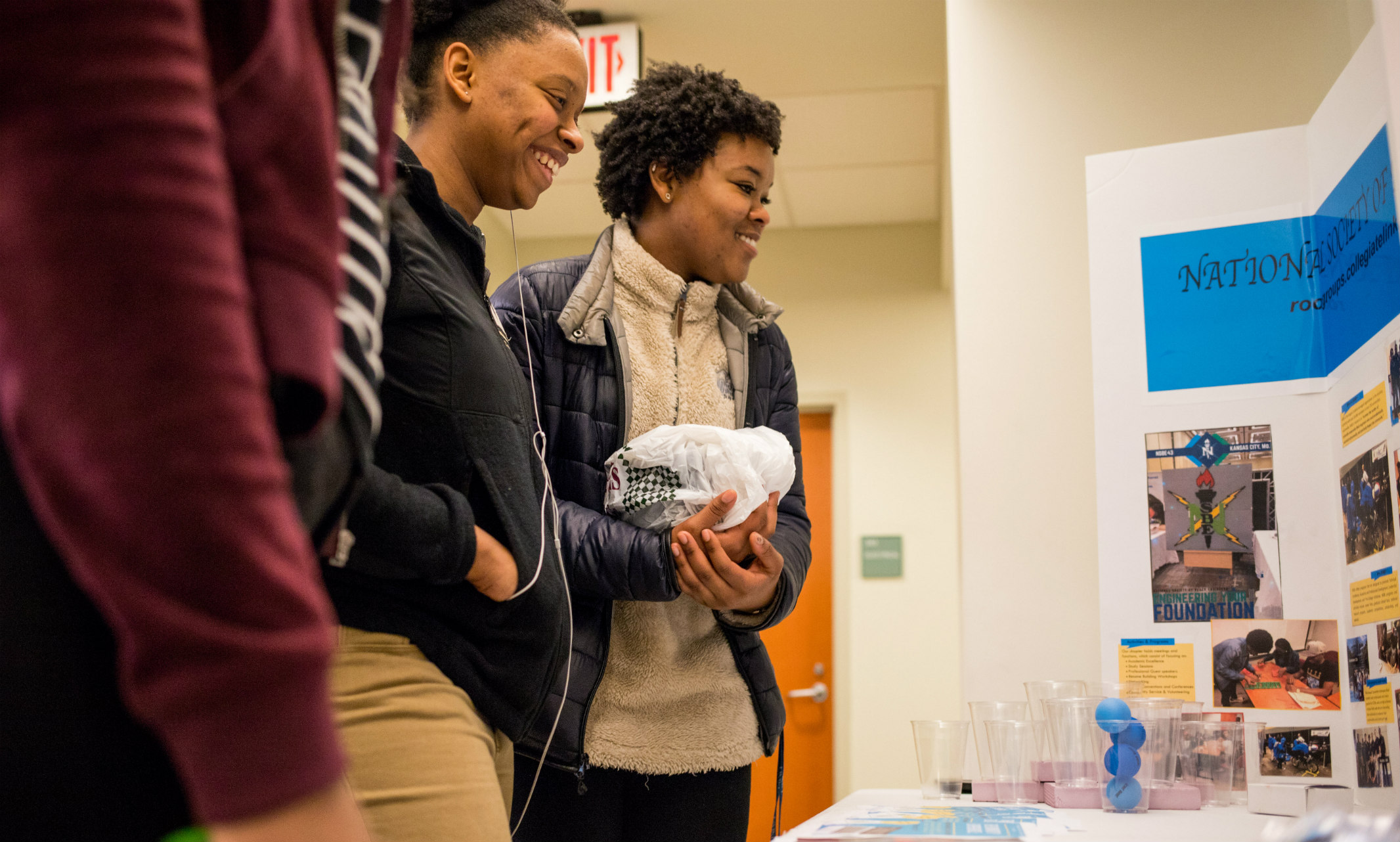
Transfer students will receive scholarships to replace off-campus work with paid undergraduate research opportunities
On average, more than 80% of civil and mechanical engineering students at UMKC attend school while working. While that doesn’t seem so odd given the ever-increasing cost of higher education, trying to work and make ends meet can often stifle academic excellence.
A team of faculty from the Schools of Computing and Engineering, College of Arts and Sciences, and School of Education, led by Darran Cairns, Ph.D., School of Computing and Engineering director of program operations, recently received a $1 million grant from the National Science Foundation to break this cycle and increase bachelor’s-degree completion rates among engineering transfer students.
Through a new program partnership with Metropolitan Community College, transfer students studying civil and mechanical engineering can follow an enrollment pathway into the School of Computing and Engineering and — rather than having to worry about a full-time job — receive a stipend to cover their expenses while working on undergraduate research and gaining more experience in their field of study.
The team, which includes Michelle Maher, Ph.D., chair of educational leadership, policy and foundations at the School of Education and Jacob Marszalek, Ph.D., associate professor of psychology and research fellow in the UMKC Urban Education Research Center, worked collaboratively to design a program that would have maximum impact for the students it aims to serve – primarily students from disadvantaged backgrounds.
“We wanted to develop a holistic approach to create a culture of openness, curiosity and collaboration,” Cairns said.
“Transfer students have a harder time fitting in because they're not freshmen and they also didn't come in with their peers, so they don't always feel empowered to get involved and lead.”-Michelle Maher, chair of educational leadership, policy and foundations; School of Education
This new program will work to change that narrative by helping students free up more time to get involved in campus life and offering both peer and professional mentorship to get them through to graduation and into the workforce.
“We’re paying students to get richer experiences.”- John Kevern, Ph.D., chair of civil and mechanical engineering, School of Computing and Engineering
Of the $1 million grant, the majority will go toward student scholarships and provide students opportunities to perform research focused on improving urban infrastructure. The team is working with the city of Kansas City and local companies to identify livable city projects ranging from sidewalk repair to designing material for cool pavements to urban agriculture.
“Our goals for this project are to increase the number of transfers from MCC and also track their journey – what gets them to come and what gets them to stay,” Marszalek said.
The program will start in the fall with 24 students – eight first-year Metropolitan Community College students, eight second-year MCC students and eight first-year UMKC transfer students.
The program also will impact Kansas City Public Schools, where the School of Computing and Engineering recently established a math academy for high school juniors and seniors taking classes in pre-engineering at Manual Career and Technology Center, with support from the Bloch Family Foundation. The center is using growth-mindset models to help students develop their abilities to persist with challenging math classes and overcome widely held preconceptions about who can and who can’t do well in math. Seniors from Kansas City Public Schools will be eligible to be part of the first cohort of students at the program in fall 2020.
“This program essentially creates a support that travels with students from public school to college graduation,” Cairns said. “We also want them to be able to pay it forward and become peer mentors.”
As part of the program, the department of civil and mechanical engineering will develop new courses and alter existing ones to maximize the impact on students.
The program also helps to diversify the engineering field. As students get closer to graduation, they’ll be encouraged to apply for National Science Foundation fellowships that will help pay for graduate school as the NSF wants to see more students from underrepresented groups obtain graduate engineering degrees.
“This grant speaks to the needs of Kansas City and the mission of UMKC to go above and beyond for our students,” Maher said.
The team is also working with the director of engineering at Metropolitan Community College to identify students for consideration. Details on how to apply are still to come.
Scholarship awards will be announced during the spring 2020 semester.
Explore More Scholarship Opportunities
Sep 23, 2019
KCUR hosts area artists to discuss Kansas City's art climate
KCUR hosted Davin Watne, artist and curator, UMKC Gallery of Art, Patricia Bordallo Dilbadox, artist, Front Space and Brandon Frederick, artist, Open House, to discuss the challenges and opportunities of living and working in Kansas City today.
Sep 23, 2019
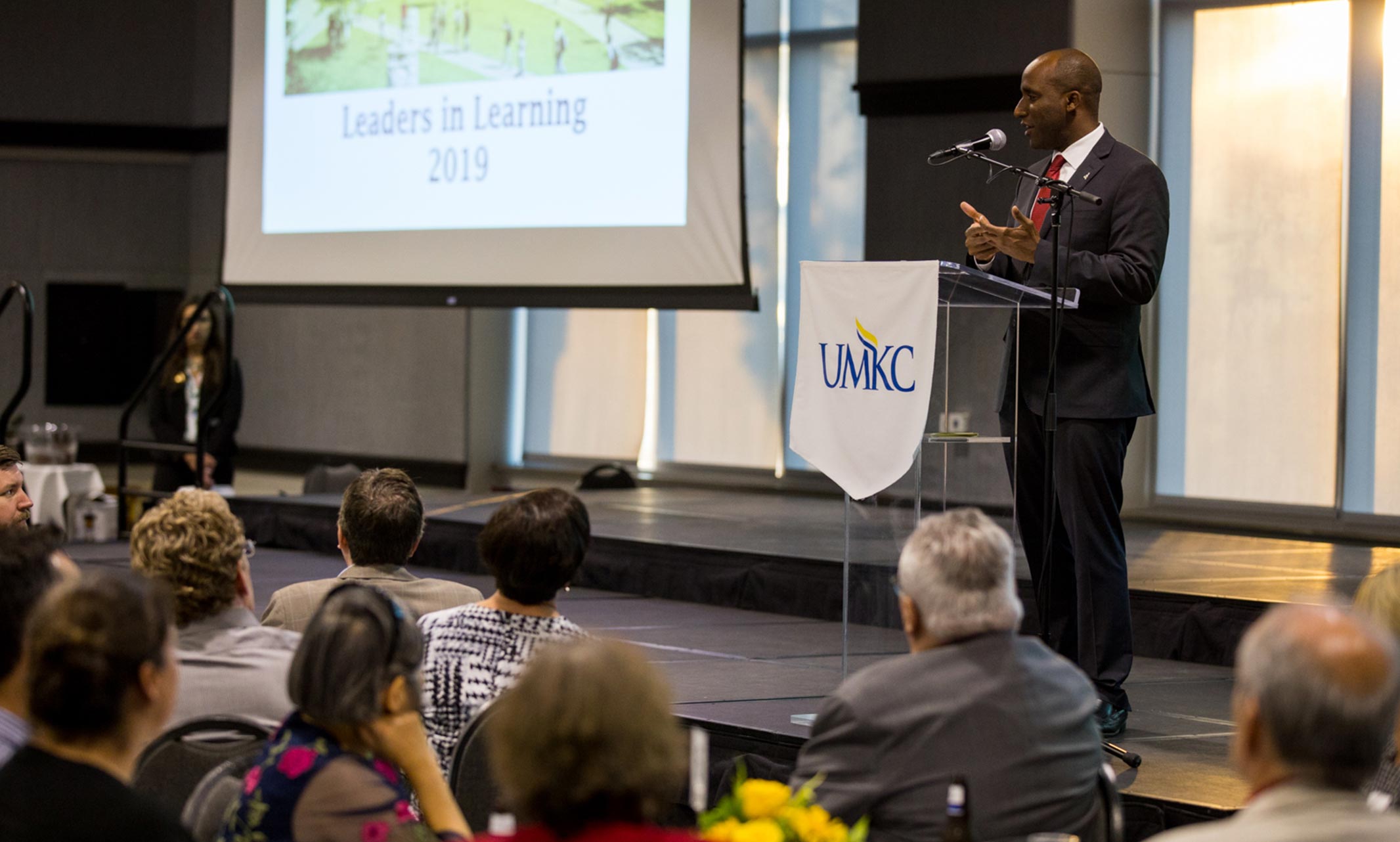
Kansas City mayor joined in night of recognition
Kansas City, Missouri Mayor Quinton Lucas’ speech synopsis: Great UMKC faculty make Kansas City great.
UMKC Provost Barbara Bichelmeyer and UMKC Chancellor Mauli Agrawal led the celebration.
“Our faculty work day in and day out creating a culture of care for our students, teaching and guiding them toward academic excellence,” Bichelmeyer said. “At the same time, faculty are publishing breakthrough research and award-winning creative works, and striving to achieve promotion and tenure. Most importantly, faculty challenge our students every day to maximize their full potential and reach their goals. UMKC faculty are a key reason why UMKC is the university it is today.”
Among the evening’s honorees:
Curators' and Governor's Awards
New Curators’ Distinguished Professors in 2019
A curators’ distinguished professorship is the highest and most prestigious academic rank awarded by the Board of Curators of the University of Missouri.
Virginia Blanton, College of Arts and Sciences, Curators’ Distinguished Professor of English Language and Literature
Kun Cheng, School of Pharmacy, Curators’ Distinguished Professor of Pharmacy
Jane Greer, College of Arts and Sciences, Curators’ Distinguished Professor of English Language and Literature
Jeffery Hornsby, Henry W. Bloch School of Management, Curators’ Distinguished Professor of Global Entrepreneurship
Joe Parisi, Conservatory, Curators’ Distinguished Professor of Conducting/Music Education
New Curators’ Distinguished Professors Emeriti in 2019
A curators’ distinguished professorship is the highest and most prestigious academic rank awarded by the Board of Curators of the University of Missouri.
Joan FitzPatrick Dean, College of Arts and Sciences, Curators’ Distinguished Teaching Professor of English Emerita
Dennis Merrill, College of Arts and Sciences, Curators’ Distinguished Teaching Professor of History Emeritus
Wai-Yim Ching, College of Arts and Sciences, Curators’ Distinguished Professor of Physics Emeritus
Max J. Skidmore, College of Arts and Sciences, Curators’ Distinguished Professor of Political Science Emeritus
Felicia H. Londre, Conservatory, Curators’ Distinguished Professor of Theatre Emerita
Jerry R. Dias, School of Biological and Chemical Sciences, Curators’ Distinguished Professor of Chemistry Emeritus
Governor’s Award for Excellence in Teaching
The Governor’s Award for Excellence in Teaching is presented to an outstanding faculty member from each participating higher education institution in the state based on evidence of effective teaching, effective advising, a commitment to high standards of excellence and success in nurturing student achievement.
Kym Bennett, College of Arts and Sciences, associate professor, psychology
Service and Engagement Awards
Chancellor’s Award for Career Contributions to the University
One of the highest honors for a UMKC empoloyee (faculty or staff) who has made significant contributions to higher education at UMKC over the course of his or her career and has significantly enhanced the mission of the university.
Max Skidmore, College of Arts and Sciences, professor, political science
Chancellor’s Award for Embracing Diversity
This award recognizes and celebrates UMKC faculty, staff and registered student organizations that embrace diversity by celebrating diversity in all aspects of university life, creating inclusive environments, culturally competent citizens and globally-oriented curricula and programs.
Sandy Rodriguez, University Libraries, assistant dean of special collections and archives
Omiunota Ukpokodu, School of Education, professor, teacher education and curriculum studies
Chancellor’s Award for Community Engagement
This award recognizes and celebrates faculty, staff, units and campus organizations that have made engagement with the community a central aspect of their approach to student learning and scholarship.
Department of History, College of Arts and Sciences
UM System Awards
Presidential Engagement Fellows
Named by the UM System president, the fellows are tasked with fulfilling the university’s land-grant mission by sharing research discoveries with Missouri citizens in every county. They were selected for their excellent teaching, breakthrough research and creative achievements.
Jannette Berkley-Patton, School of Medicine, professor, biomedical and health informatics
Barbara Pahud, School of Medicine, assistant professor, pediatric medicine
Gerald Wyckoff, School of Pharmacy and School of Biological and Chemical Sciences, professor, pharmacology and pharmaceutical sciences
Teaching Awards
Chancellor’s Early Career Award for Excellence in Teaching
This award recognizes and celebrates UMKC assistant professors who have achieved excellence in teaching early in their professional careers.
Rebecca Best, College of Arts and Sciences, assistant professor, political science
Chancellor’s Award for Excellence in Teaching
The university’s highest honor for excellence in teaching recognizes and celebrates UMKC faculty who are consistently superior teachers at the graduate, undergraduate or professional level over an extended period of time.
Michael Wei, School of Education, associate professor, teacher education and curriculum studies
Provost’s Award for Excellence in Teaching
This award recognizes and celebrates teaching excellence among UMKC clinical and teaching faculty
James Benevides, School of Biological and Chemical Sciences, teaching professor in cell biology and biophysics
Chancellor’s Award for Excellence in Graduate Mentoring
This award recognizes UMKC graduate faculty advisors with a long-established career at the university who have made significant contributions to higher education through exceptional mentoring.
Loyce Caruthers, School of Education, professor, educational leadership, policy and foundations
Elmore F. Pierson Good Teaching Awards
Awarded annually to outstanding teachers in the Henry W. Bloch School of Management, and the Schools of Dentistry, Law and Medicine.
Roozmehr Safi, Henry W. Bloch School of Management, assistant professor, management
Michaelle Tobin, School of Law, associate clinical professor
Amgad Gerges Masoud, School of Medicine, associate professor, internal medicine
Tanya Villalpando Mitchell, School of Dentistry, professor, dental hygiene
Award for Excellence in Mentoring Undergraduate Researchers, Scholars and Artists
Fenpeng Sun, College of Arts and Sciences, assistant professor, earth and environmental sciences
Research and Creativity Awards
N.T. Veatch Award for Distinguished Research and Creative Activity
Recognizes distinguished research and other scholarly or creative activity accomplished by UMKC faculty.
Kun Cheng, School of Pharmacy, Curators’ Distinguished Professor, pharmacology and pharmaceutical sciences
Trustees’ Faculty Fellows Award
Trustees are recognizing the very best faculty who distinguished themselves through scholarship and creativity.
Jeffrey Price, School of Biological and Chemical Sciences, professor, biology and biophysics
Trustees’ Faculty Scholar Award
Recognizes faculty members who show exceptional promise for outstanding future research and/or creative accomplishments.
Benjamin Woodson, College of Arts and Sciences, associate professor, political science
Promotion and Tenure
Eduardo Abreu, School of Nursing and Health Studies, tenure with promotion to associate professor
Carolyn Barber, School of Education, promotion to professor
Jannette Berkley-Patton, School of Medicine, promotion to professor
An-Lin Cheng, School of Medicine, promotion to professor
Masud Chowdhury, School of Computing and Engineering, promotion to professor
Reza Derakhshani, School of Computing and Engineering, promotion to professor
Travis Fields, School of Computing and Engineering, tenure with promotion to associate professor
Scott Fullwiler, College of Arts and Sciences, tenure with promotion to associate professor
Orisa Igwe, School of Pharmacy, promotion to professor
Jeff Johnson, Henry W. Bloch School of Management, tenure with promotion to associate professor
John Kevern, School of Computing and Engineering, promotion to professor
Sungyop Kim, College of Arts and Sciences, promotion to professor
JeJung Lee, College of Arts and Sciences, promotion to professor
Debra Leiter, College of Arts and Sciences, tenure with promotion to associate professor
Zhu Li, School of Computing and Engineering, tenure
Jennifer Owens, College of Arts and Sciences, tenure with promotion to associate professor
Tammie Schaefer, Henry W. Bloch School of Management, tenure with promotion to associate professor
Zach Shemon, Conservatory, tenure with promotion to associate professor
Hye Young Shin, College of Arts and Sciences, tenure with promotion to associate professor
Michelle Smirnova, College of Arts and Sciences, tenure with promotion to associate professor
Kim Smolderen, School of Medicine, tenure with promotion to associate professor
Massimiliano Vitiello, College of Arts and Sciences, promotion to professor
Ben Woodson, College of Arts and Sciences, tenure with promotion to associate professor
Promotion, Non-Tenure Track
John Ball, School of Dentistry, promotion to clinical professor
Kylie Barnes, School of Pharmacy, promotion to clinical associate professor
James Benevides, School of Biological and Chemical Sciences, promotion to teaching professor
Scott Curtis, UMKC Libraries, promotion to librarian IV
Kenneth Frick, School of Dentistry, promotion to clinical professor
Monica Gaddis, School of Medicine, promotion to associate teaching professor
Melanie Guthrie, School of Medicine, promotion to associate teaching professor
Tamas Kapros, School of Biological and Chemical Sciences, promotion to teaching professor
Floyd Likins, School of Biological and Chemical Sciences, promotion to assistant teaching professor
Angellar Manguvo, School of Medicine, promotion to associate teaching professor
Steven Melling, College of Arts and Sciences, promotion to associate teaching professor
Dhananjay Pal, School of Pharmacy, promotion to research professor
Natalia Rivera, Conservatory, promotion to associate teaching professor
Amanda Stahnke, School of Pharmacy, promotion to clinical associate professor
Yesim Tunkuc, School of Dentistry, promotion to clinical professor
Henrietta Rix Wood, Honors College, promotion to teaching professor
Sep 20, 2019
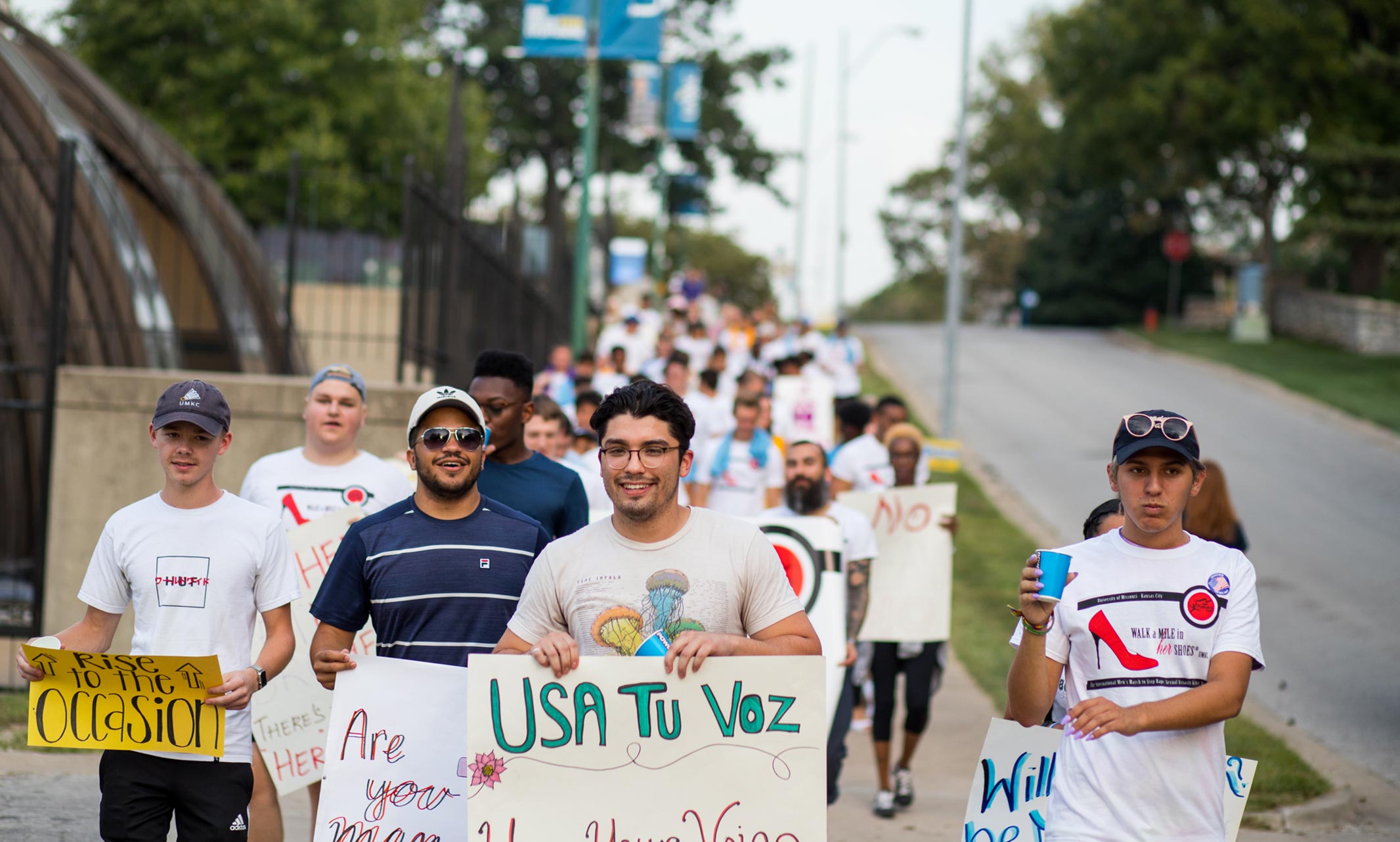
Students take a stand against sexual assault and violence at annual Walk-A-Mile event
A large crowd in high heels and sleek flats joined forces with the UMKC Women’s Center to raise awareness of sexual assault and violence.
Walk-A-Mile in Her Shoes is an annual internationally coordinated event that invites participants to understand and appreciate women’s experiences in order to help change perspectives, improve relationships and decrease the potential for violence.
Bearing brightly colored signs and stepping out in leather pumps, many of the participants shared with each other the reasons why they march.
Here is what a few of them said:
“I love walking in heels. I’ve seen women in my life go through sexual assault. I want to support all the women in my life.” — Andrew Schappe, freshman, theatre performance
“I’m walking to support women. They tell me their stories and anything we can do to help, I want to.” — Angel Rojas, senior biology, member of Sigma Phi Epsilon
“It’s important as a fraternity member. We want to continue to show up and let people know you’re not too manly to walk. It’s a good cause.”— Nicholas Arriagoda, junior, business administration, member of Sigma Phi Epsilon
“We always come out and show support. It’s important to show women as equals.”— Marissa Iden, junior, political science
“I walk with my fraternity and friends. I feel like women’s rights are not talked about in society and needs to be fixed.”— Evan Stoner, freshman, accounting
Helpful Resources
If you or someone you know has experienced relationship violence, UMKC has several resources to help you. Here are some of the best places to start.
UMKC Women’s Center advocates, educates, and provides support services for the advancement of women’s equity on campus and within the community. In addition to helpful resources, they host several events on campus throughout the year.
The Office of Violence Prevention and Response has several resources on their website, like how to help a friend, how to get help for yourself and many other resources at UMKC and in the community.
If you are dealing with sexual assault or harassment, the Title IX Office can help you get the support that you need.
In addition, UMKC has made Not Anymore online training free and available to students so you can learn how to be proactive in preventing interpersonal violence in our community.
Sep 20, 2019
Kansas City Business Journal and Startland News profile Meyer, senior director of technology ventures
The Kansas City Business Journal and Startland News profiled Jill Meyer, newly promoted senior director of technology ventures for the UMKC Innovation Center. Meyer will lead the center's early-venture initiatives.
Sep 20, 2019
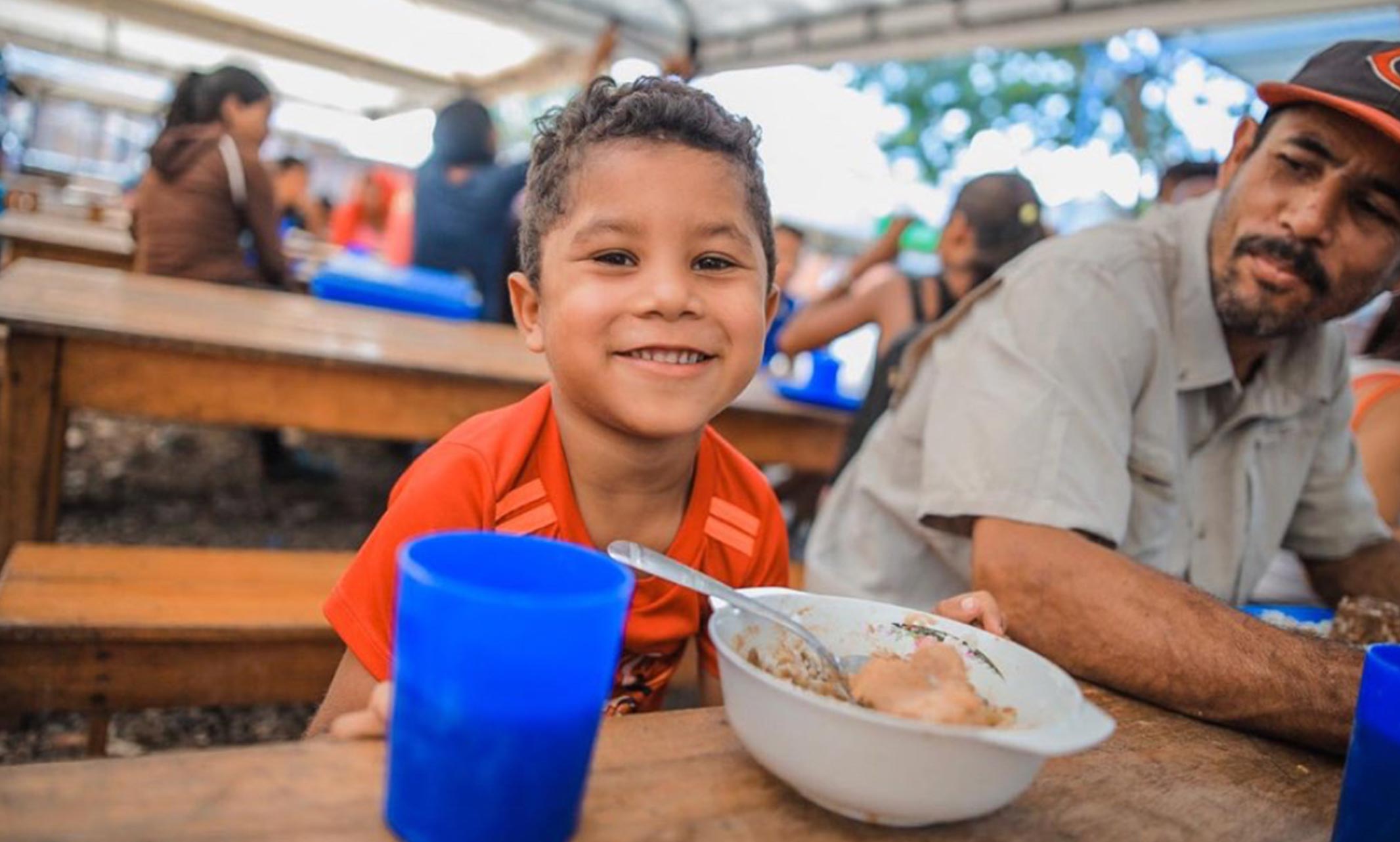
UMKC faculty and staff work together to help refugees make transition to Colombia
Fewer human experiences can be more traumatizing than being a refugee in a foreign country. A team at the University of Missouri-Kansas City School of Nursing and Health Studies is easing some of that trauma through its expertise.
Alex Azar, U.S. secretary of Health and Human Services, asked the Collaborative to Advance Health Services at UMKC to create training modules for first responders in Colombia to help Venezuelan refugees. This will help Venezuelans fleeing that nation’s ongoing economic crisis to get the mental-health assistance they need. The Collaborative oversees numerous federal grants and is home to several national-based centers that implement evidence-based clinical practices into substance use and mental health treatment.
“We felt compelled and passionate to do this,” said Laurie Krom, program director of the Collaborative. “We wanted to help in any way we could.”
“I have family members who live in the area so I know how difficult the situation is,” said team member Susan Garrett, assistant teaching professor at the School of Nursing and Health Studies, who has an aunt who worked for the Honduran embassy in Venezuela. “People are leaving their homes with only the clothes on their backs to walk to Colombia. We can’t even imagine what people are going through.”
“We wanted to help in any way we could.” — Laurie Krom
Because of the urgency, producing these training modules meant a quick turnaround time. The Collective delivered the scope of the project in just five weeks, a task which often takes a half year to do. And it was a volunteer project. Krom, Garrett and the rest of the team used nights and weekends of their personal time this summer to complete it. They collaborated with others from the Universidad Central del Caribe and National Latino Behavioral Health Association on expertise, translation and other tasks.
The UMKC team, which also included the Collaborative’s associate project director Erin Hobbs and web developer Eric Barr, concentrated on the overall migration process in creating the four, 45-minute training modules translated in both Spanish and Portuguese.
“People are leaving their homes with only the clothes on their backs to walk to Colombia. We can’t even imagine what people are going through.”— Susan Garrett
The modules focus on what trauma means for different groups: men, women and children. One of the modules focuses on secondary trauma experienced by the workers at the border.
“They’re suffering ‘compassion fatigue’ because they’re dealing with a lot themselves,” Krom said.
The modules were delivered a few weeks ago to Colombia — and welcomed as much-needed mental-health assistance.
“I really hope everyone knows how much you are appreciated for doing this on your own time,” said Pierluigi Mancini, project director of the National Latino Behavioral Health Association who traveled with Azar and other U.S. health officials to Colombia to help implement the project. “I wish I could have bottled the gratitude people expressed so I can share it with you — please know many people are grateful.”
Sep 19, 2019
Kansas City Star article on a recent case concerning an unvaccinated child features UMKC law professor, Ann Marie Marciarille
UMKC Law professor, Ann Marie Marciarille clarifies exemptions and complexities of mandatory vaccinations in what she refers to as the "vaccine wars."
Sep 19, 2019
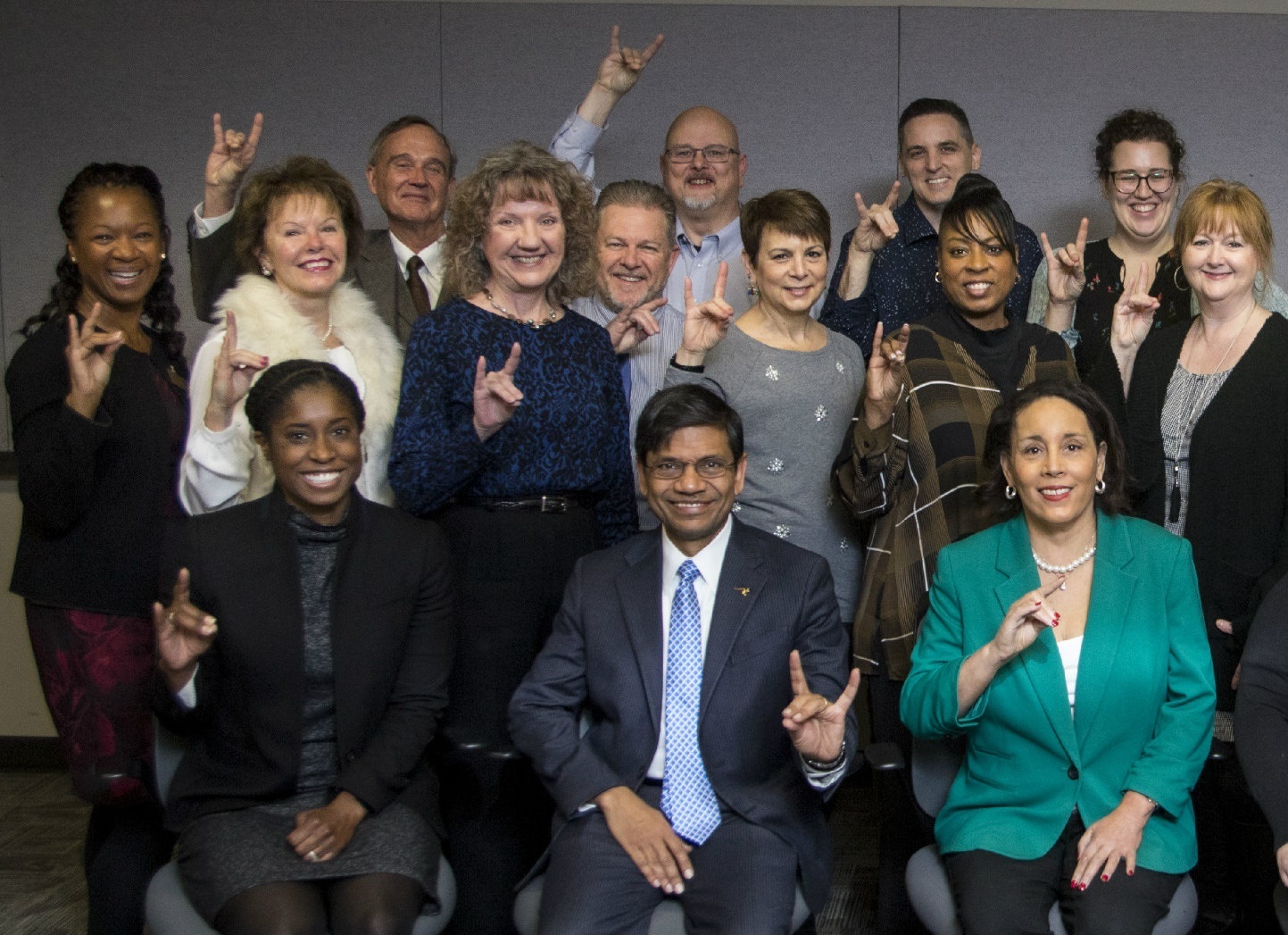
Outstanding commitment to diversity and inclusion brings national recognition
The University of Missouri-Kansas City has received the 2019 Higher Education Excellence in Diversity (HEED) award from INSIGHT Into Diversity magazine, the oldest and largest publication focused on diversity and inclusion in higher education.
Each year INSIGHT Into Diversity evaluates universities’ practices relating to recruitment and retention of students, faculty and staff. The process also considers the universities’ leadership commitment and program support.
UMKC embraces a broad spectrum of diversities including race, ethnicity, culture, nationality, gender, age, sexual orientation, disability, linguistic ability, learning style, religion, socioeconomic and veteran status, life experiences, educational level and family structure.
“We are thrilled to be recognized for outstanding work in creating an inclusive environment for our students, faculty and staff.”—Susan Wilson
Susan Wilson, Ph.D., vice chancellor of the division of diversity and inclusion, leads the university’s diversity organizational development strategy.
“We are thrilled to be recognized for outstanding work in creating an inclusive environment for our students, faculty and staff,” Wilson said. “This award is even more special as we remember how far we have come as an institution. This accomplishment is truly a team effort, as many across campus worked with the Division of Diversity and Inclusion to reach this milestone.”
The HEED Award and the Health Professions HEED Award are the only national awards that honor individual institutions for being outstanding examples of colleges, universities or health professions schools that are committed to making diversity and inclusion a top priority across their campuses.
“The HEED Award process consists of a comprehensive and rigorous application that includes questions relating to the recruitment and retention of students and employees — and best practices for both — continued leadership support for diversity, and other aspects of campus diversity and inclusion,” said Lenore Pearlstein, publisher of INSIGHT Into Diversity magazine. “We take a detailed approach to reviewing each application in deciding who will be named a HEED Award recipient. Our standards are high, and we look for institutions where diversity and inclusion are woven into the work being done every day across their campus.”
UMKC will be featured along with the other 92 recipients in the November 2019 issue of INSIGHT Into Diversity magazine. It was the only college in Missouri to receive the recognition. The UMKC School of Medicine received a HEED award in 2018 and the School of Dentistry received the award in 2016.
Sep 18, 2019
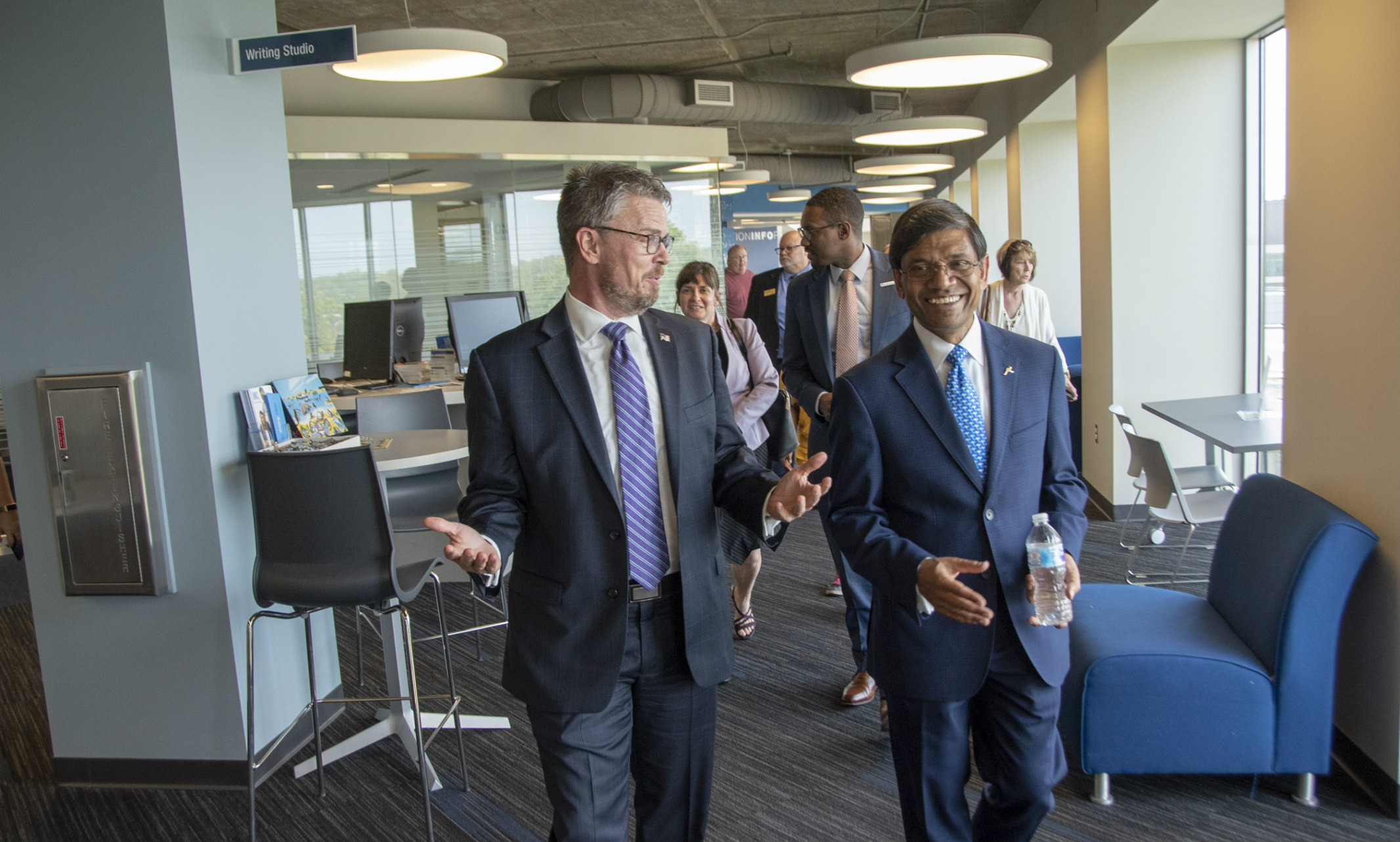
Johnny Collett comes from Washington for first-hand look at Propel and International Center for Supplemental Instruction
UMKC has been a pioneer in development of highly effective programs that promote success for a wide variety of students. A top education official visited campus to get a close-up look at two of them.
Mauli Agrawal and Johnny Collett sat in a meeting room at the University of Missouri-Kansas City to discuss the focus on student success that is becoming pervasive in American higher education. They agreed that the “sink or swim” attitude that held sway for generations is no longer workable; the nation’s skilled workforce needs are too great to allow universities to stand by and watch capable students fail.
Agrawal is the chancellor of UMKC; Collett is the assistant U.S. secretary of education. They met after Collett toured two highly successful programs at UMKC: Propel, a certificate-granting transition program for young adults with intellectual developmental disabilities; and the International Center for Supplemental Instruction, a student peer-driven program based on out-of-class group study sessions, developed at UMKC in the 1970s.
A recent study by Civitas Learning included Supplemental Instruction, founded by UMKC, among the top five student-success programs nationwide out of almost 1,000 reviewed.
Agrawal compared the modern approach – research-driven student success programs designed to provide individualize support for students to reach their full potential – to the practice of genetically individualized medicine.
“We all have an academic DNA as well,” Agrawal said. “Your educational needs will be different than mine.”
Collett nodded in agreement, adding that his federal department is dedicated to success for all students.
“When we say all, we really mean all. And all has to mean each,” Collett said.
Collett began his campus visit with a tour of the Propel program; he was accompanied by Gerren McHam, special assistant for external relations for the Missouri Department of Higher Education. They were greeted by John Herron, interim dean of the College of Arts and Sciences; and Alexis Petri, associate research professor of psychology, who directs the Propel program.
Many of the 46 students currently enrolled in Propel live in on-campus student housing. Petri said they take 60 to 70 percent of their credits in standard classes with traditional degree-seeking students; 60 percent of the Propel students are eligible for Pell low-income tuition grants.
Herron said having Propel students immersed in the mix of the general student body is a teaching opportunity for all students, and campus visitors as well.
“We’re sending a message about what kind of place this is – a message about what we care about and what we value,” Herron said.
Collett asked about concerns of parents about their students succeeding in the college environment.
“Parents need to understand that this is a safe space for their student to bump into challenges, a place where we have support systems in place to help them meet those challenges,” Petri said.
The tour then moved from Cherry Hall, home of the Propel program, to the Atterbury Student Success Center, where the International Center for Supplemental Instruction (SI) is housed. Julie A. Collins, Ed.D., executive director of the center, led that tour.
Collins explained that SI is targeted to “high-risk” courses – courses necessary for graduation that have a historically high failure rate. Undergraduate students who have previously passed the course are hired to be peer coaches who lead small-group out-of-class study sessions focused on the hurdles individual students are facing.
A recent study by Civitas Learning included SI among the top five student-success programs nationwide out of almost 1,000 reviewed.
Following the meeting with Agrawal and Provost and Executive Vice Chancellor Barbara A. Bichelmeyer, Collett announced that the Department of Education had just released new guidelines on the use of federal funds for higher education programs for young people with disabilities.
Collett said the department wanted to clear up confusion by stating that vocational rehabilitation and Individuals with Disabilities Education Act (IDEA) funds can be used to support dual enrollment, comprehensive transition and other postsecondary education programs for students and youth with disabilities.
Sep 18, 2019
KCTV reports on a leaked poll that predicts GOP loss if Kris Kobach is the nominee
UMKC political science professor, Greg Vonnahme, says that numbers reflected in a leaked poll are consistent with the results from 2018 when Kobach unsuccessfully ran for governor.
Sep 18, 2019
Research shows one in two youth have been exposed to community violence.
WDAF-TV Kansas City reports on UMKC School of Medicine professor Jannette Berkley-Patton's research on the affects of community violence on youth.
Sep 16, 2019
Siabhan May-Washington, BA '88, MA, '91 takes the helm at local school for girls
The Catholic Key reports that Siabhan May-Washington, Ph.D. is the new president at St. Teresa's Academy, a Kansas City high school for girls.
Sep 16, 2019
Open Spaces public art donated by the R.C. Kemper Charitable Trust
A new work of art will find a home on Volker Campus, thanks to a gift by the R.C. Kemper Charitable Trust.
The sculpture, titled “Any Word Except Wait” by Flávio Cerqueira, is one of three pieces that are being gifted to the city of Kansas City, Missouri.
The sculpture by Flávio Cerqueira, titled “Any Word Except Wait."
The public art was part of last year’s inaugural Open Spaces, a two-month citywide visual and performing arts festival that was a collaboration between the City’s Office of Culture and Creative Services and a private arts initiative to highlight Kansas City’s arts, culture and creativity. The event, which gained national media attention, expanded opportunities for residents to experience world-class art created specifically for our city.
“Open Spaces 2018 illuminated the ability of public art to connect and unify people, enriching lives and communities through shared experience,” said Mary Kemper Wolf with the R.C. Kemper Charitable Trust. “The Trust is proud to underwrite the permanent placement of three significant works from the inaugural Open Spaces.”
Sep 12, 2019
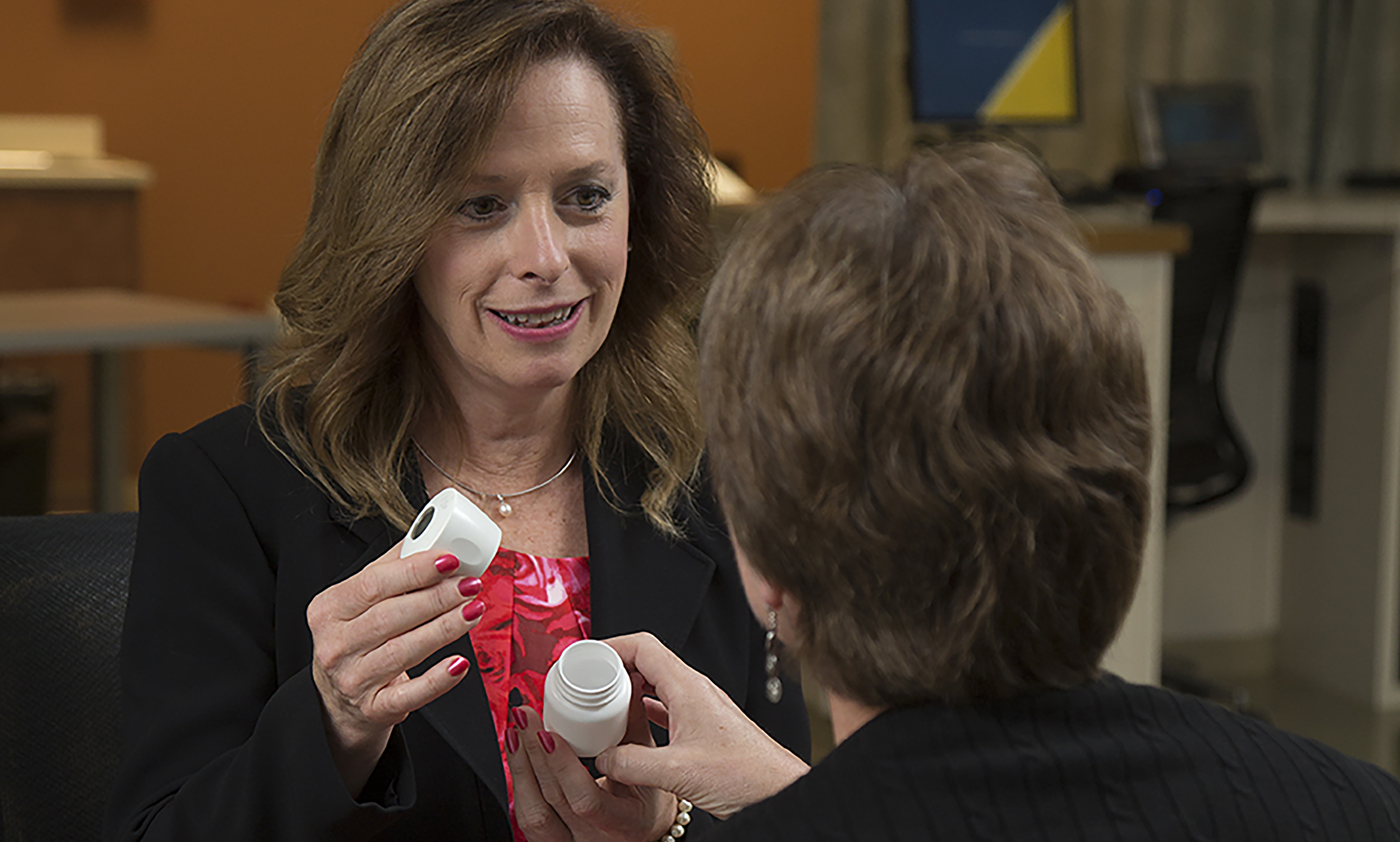
UMKC study shows solution with intervention technique
Half of Americans who are prescribed medications don’t take them as directed. That’s a $300 billion healthcare problem, but a University of Missouri-Kansas City study shows progress using a personal-systems approach to taking medicine.
The UMKC study tracked the medication practices of kidney transplant patients. UMKC Professor Cynthia Russell is the primary investigator on the Medication Adherence Given Individual Change — or MAGIC — study, recently published by the American Society of Transplantation and the American Society of Transplant Surgeons. Her team, funded by a $2.585 million National Institutes of Health grant, includes researchers from University of Missouri, Children’s Mercy, University of Tennessee and Indiana University.
“Though they have received the ‘gift of life,’ about 75 percent of people with a kidney transplant struggle to take transplant medicines on time every day for the life of the transplant,” said Russell, past president of the International Transplant Nurses Society. “Without these critical medications, the kidney will not survive. Our goal is to help people keep their gift of life for a very long time. More kidneys will be available to those in need of this critical resource, since they won’t have to rejoin the transplant list.”
“Though they have received the ‘gift of life,’ about 75 percent of people with a kidney transplant struggle to take transplant medicines on time every day for the life of the transplant. Without these critical medications, the kidney will not survive.”-Cindy Russell, Ph.D., UMKC School of Nursing and Health Studies
In the MAGIC study, Russell’s team used the SystemCHANGE intervention, which has been shown to be effective with difficult-to-change behaviors like exercise. With the intervention, the patient is taught to modify daily routines and habits. They track success using data from an electronic medication monitoring system. The SystemCHANGE approach moves away from traditional interventions that focus on motivation and intention and instead improves the patient’s ability to monitor small environmental changes and determine the effectiveness of the changes using data.
The MAGIC study was conducted with 89 kidney transplant patients at Saint Luke’s Hospital in Kansas City; University of Kansas Medical Center; University of Missouri Healthcare in Columbia; Barnes Jewish Hospital in St. Louis and the University of Tennessee Health Science Center in Memphis.
“...not only are kidney transplant patients able to benefit from this research, but patients with other diseases will soon gain from this model of scientific investigation.” -Mark Wakefield, M.D., University of Missouri Health Care
The result: using SystemCHANGE “demonstrated large, clinically meaningful improvements in medication adherence.”
Russell’s recently published research represents a capstone of nearly 20 years of discovery to understand and improve medication adherence in transplant patients, said Mark Wakefield, M.D., director of the renal transplant program at University of Missouri Health Care.
“During this journey, she has successfully collaborated across disciplines and among institutions, which has allowed for a greater clinical impact among a more diverse population of patients,” Wakefield said. “As a result, not only are kidney transplant patients able to benefit from this research, but patients with other diseases will soon gain from this model of scientific investigation.”
“Our intervention with transplant patients is now being tested in other chronic illnesses such as heart failure, stroke and soon, chronic kidney disease,” Russell said.
Sep 11, 2019
KCUR explores balancing the enthusiasm for football with concern for players' health
KCUR's Ethics Professors consider the conflict of supporting sports that can lead to irreparable brain damage.
Sep 10, 2019
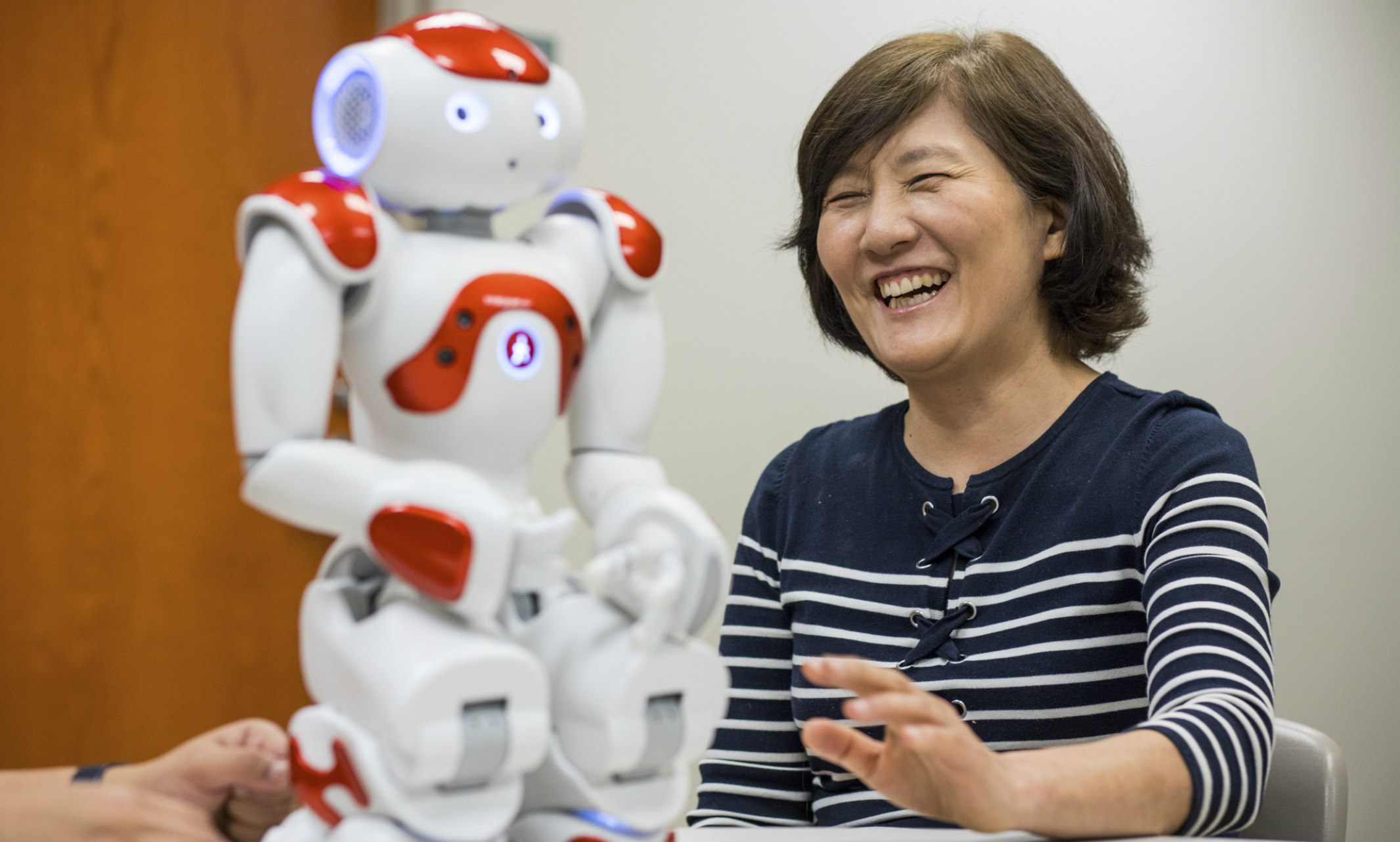
Professor Yugi Lee receives Central Exchange award for her mentorship efforts
The heart of UMKC is our campus community. With small class sizes and lots of opportunities, it’s easy to develop student mentorship teams. And these rich relationships—our Dynamic Duos—are some of our best success stories.
As an internationally-recognized expert in computer science, Yugi Lee, professor of computer science at the School of Computing and Engineering, says her motto is that teaching and research are not separate. Throughout her 20-year tenure at the SCE, she’s continued to mentor and equip her students to survive in any work environment – teaching or industry – an experience she said also helps to inform her research and make a difference for women in STEM following her footsteps. It’s her impact and engagement with students that landed Lee among Central Exchange’s 2019 STEMMy Award recipients.
Lee and mentee, Ph.D. student Mayanka Chandra Shekar, sat down to discuss the importance of mentorship and its significance for women in STEM.
What makes faculty mentorship critical to the success of students?
Lee: Students have their own goals. Sometimes they know what their goal is and they need someone to help guide and sometimes we help them identify their goals. That’s why it’s critical to have the right advisor, especially for graduate students. Sometimes their research may not be accepted, sometimes a project they’re working on may not go right and they get down. Additionally, mentorship is really important for female students in engineering where there aren’t many female faculty.
“In the last five years I’ve been at UMKC, our number of female Ph.D. students in computer science has significantly increased. When I joined the program there were three of us, now we have between 15 and 20!”
- Chandra Shekar
How has your mentor inspired you?
Chandra Shekar: How I perceive research is how Dr. Lee has taught me. She’s the most approachable faculty I’ve ever encountered. Every time there’s a new technology Dr. Lee says “let’s teach it,” because you become an expert through teaching.
I had limited exposure to research when I came to UMKC, but in my time here I’ve received a Google Lime scholarship, I’ve been selected to receive research funding from the School of Graduate Studies three times and has received the UMKC Women’s Council’s Graduate Assistance Fund scholarship five times.
Lee: Mayanka is one of the more popular students in our department. She’s got a lot of energy and fresh ideas. Her presentation is great and she can teach almost anything. She’s currently supervising 10 master’s degree students and mentors five project groups, and will apply to a faculty position when she graduates. She even received a scholarship to attend the Grace Hopper Celebration, which is one of the largest conferences for women in technology. She is applying to some faculty positions. I think she will land somewhere great.
What led you to UMKC?
Chandra Shekar: When I came to UMKC in 2014, I had limited exposure to research. Where I’m from, in India, UMKC had positive reviews. I am only one of two students from my master’s program who came to the United States.
One of two? Wow! How many of you were there?
Chandra Shekar: I received my bachelor’s and master’s degrees from a women’s college in India. We had 16 master’s students. Some are working, some got married and started families and two of us went on to pursue Ph.Ds. There just aren’t a lot of women in computer science. In the last five years I’ve been at UMKC, our number of female Ph.D. students in computer science has significantly increased. When I joined the program there were three of us, now we have between 15 and 20!
I’m getting married in December so I’ll be learning to juggle marriage and completing my program. I graduate in May.
"Teaching is part of the life cycle of research."
- Yugi Lee
What qualities make a good mentor?
Lee: Understanding. It’s important to understand the student’s abilities and family situations. You have to be able to adjust to what’s going on with them and work with them to persist. Build a relationship with your students and be a support system for them. Finally, it’s important to be a good trainer and equip your students to be able to survive in any work environment – industry or teaching.
What’s your favorite part about being a mentor?
Lee: Relationships. I’ve overseen more than 20 PhD students in 20 years. Every year we have new faces coming in and sometimes I get students that challenge me in different ways. Each year students will have new questions, ideas, problems... Not all graduate students teach, but mine do. My philosophy is: teaching and research are not separate. Teaching is part of the life cycle of research.
“All of her hard work has made such a difference in the lives of many.”
- Kevin Z. Truman, dean of the School of Computing and Engineering
How has your mentor helped you grow as a person?
Chandra Shekar: Dr. Lee has been a big source of support for me when I needed it – inside and outside of the classroom. When I was really sick, she supported me and motivated me to not want to stop learning. I was in the hospital coding! I was wheelchair-bound for a while and my mom came from India and stayed with me for close to a year. She and Dr. Lee helped me get around to my classes. They’ve been really fundamental women in my life.
If you’re giving advice to a student on finding a mentor, what would you tell them?
Lee: You have to meet every faculty member to find the best advisor or mentor. Sometimes without the right advisor, students won’t complete their degree program. You need good chemistry and you should have similar work styles. But if you don’t meet all the faculty, you won’t know who that person is.
Finally, Yugi, what does your Central Exchange recognition mean to you?
Lee: Recognition for women in STEM doesn’t come as often as it does for men. Computer science is a male-dominated field everywhere. I was the first female faculty member in our department only 20 years ago. While there are more women in the field than before, it’s important for women to have support systems. Central Exchange helps to create that. Women contribute a lot to STEM – we have a lot of creativity and pay close attention to detail…things you need in computer science.
Kevin Truman, dean of the School of Computing and Engineering, nominated me to receive a STEMMy Award and I’m honored to have been selected.
Truman said of Lee’s honor: “Yugi is so deserving of this award, SCE and I are proud to have her as one of our leading faculty. All of her hard work has made such a difference in the lives of many.”
Lee will receive the WISTEMM Educator Award for full-time faculty in STEMM fields at the STEMMy Awards ceremony on Sept. 17.
Read more UMKC mentorship stories
Sep 09, 2019
The Kansas City Star profiles alumnus Steve Lewis
The Kansas City Star profiles the Midwest Chamber Ensemble's founder alumnus Steve Lewis.
Sep 07, 2019
Fox4KC focuses on scarcity of metro dentists caring for patients with special needs.
Alumnus Seth Cohen, DDS '14 and Tom Vopat, DDS, UMKC School of Dentistry clinical professor support focus on sensitive care for patients with special needs.
Sep 06, 2019
Chuck Haddix host of KCUR's Fish Fry and director of UMKC's Marr Sound Archives discusses history of music in Missouri
Country music is thriving in the Kansas City area and Chuck Haddix weighs in on why.
Sep 05, 2019
KCTV and Fox 4 interview Stephen Pruitt, Gottlieb Chair of Finance at the UMKC Henry W. Bloch School of Management
KCTV and Fox 4 interview Stephen Pruitt, Gottlieb Chair of Finance at the UMKC Henry W. Bloch School of Management regarding Cerner reorganization.
Sep 04, 2019
Lee Salem signed "Calvin and Hobbes" and discovered "Cathy" for Universal Press Syndicate
The Washington Post recognized alumnus Lee Salem, MA '73, a legendary comics editor who died September 2nd.
Sep 04, 2019
Media report on new Kansas City Repertory Theatre's new artistic director, Stuart Carden
Read the Kansas City Star article: 'A really wonderful guy': Meet the new artistic director of the KC Repertory Theatre
Read the Broadway World article: Stuart Carden Named New Artistic Director of KCRep
Read the American Theatre article: Stuart Carden Named New Artistic Director of the Kansas City Rep
Sep 03, 2019
Kansas City Star article and editorial explore causes of violence
Ken Novak, UMKC professor of criminal justice and criminology wrote a guest commentary on breaking the cycle of violence.
Novak debunks the myth that heat causes an increase in crime.
Sep 03, 2019
KCUR announces hometown team's sale
Kansas City businessman and UMKC Trustee, John Sherman, will buy the Kansas City Royals.
Sep 03, 2019
Musical American Worldwide reports Sean Chen, currently a Millsap Artist in Residence at the UMKC Conservatory, joins Jonathan Wentworth Associates...
Musical America Worldwide recognizes 2013 American Pianists Award Winner representation.
Sep 03, 2019
Media report on the release of Ricky Kidd from 23 years of wrongful imprisonment with the help of UMKC School of Law Professor Sean O'Brien
Read the KMBC Article: Man Walks Out Of Prison After 23 Years Following Judge's Ruling He's Innocent
Read the Fox4KC Article: Ricky Kidd Celebrates With UMKC Law Students Who Helped Him Walk Out Of Prison After 23 Years
Aug 30, 2019
The Kansas City Business Journal reports on the 2019 Women Who Mean Business Honorees including UMKC Provost and Executive Vice Chancellor Barbara ...
Provost and Executive Vice Chancellor Barbara A. Bichelmeyer is named a 2019 Women Who Mean Business Honoree. She and her other awardees were recognized with newspaper profiles and a celebratory luncheon.
Aug 30, 2019
UM System grant funds speaker series
The UMKC Health Sciences Diversity and Inclusion Council is hosting a cultural competency in health care speaker series through October.
With financial support from a University of Missouri System Inclusive Excellence grant, sessions are free and open to students, faculty, staff and the community. The council found topics that will be especially beneficial to those at all four UMKC health professions schools: School of Dentistry, School of Medicine, School of Nursing and Health Studies and School of Pharmacy.
“One of our goals is to provide educational programming that can make an impact on knowledge, self-awareness, attitude and cross-cultural skills,” said Tamica Lige, a staff member at the School of Pharmacy and chair of the council.
Sessions are held in the UMKC Health Sciences Building, 2464 Charlotte St. Registration is encouraged for space considerations, but not required to attend.
Maternal Mortality Rate in African American Mothers Sept. 4, noon to 12:50 p.m., room 5301 Traci Johnson, M.D., UMKC assistant professor of obstetrics and gynecology, is leading the session.
Creating Safe and Inclusive Spaces for the LGBTQIA Community: Session One – The Basics Sept. 25, noon to 2 p.m., room 4301 Kari Jo Freudigmann, M.S., assistant director, UMKC LGBTQIA programs and services, and Kimberly Tilson, B.S.N., R.N., nurse care manager, TMC Behavioral Health Community Access Program, LGBTQIA patient care advocate, are leading the session.
Creating Safe and Inclusive Spaces for the LGBTQIA Community: Session Two – Application and Skills Oct. 3, 10 a.m. to noon, room 3301 Henry Ng, M.D., a public health LGBT health physician leader and advisor, will facilitate a panel of members from the LGBTQIA community and clinicians in a question-and-answer session followed by breakout sessions with video vignettes and small-group discussions.
Biodiversity and the Medicines from Nature Oct. 30, noon to 1 p.m. Cesar Compadre, Ph.D., professor in the department of pharmaceutical sciences and director of the Biomedical Visualization Center at University of Arkansas for Medical Sciences, is speaking about ethnopharmacology, the study of medicinal plant use in specific cultural groups and the study of differences in response to drugs by different cultures.
Aug 30, 2019
Media report on the Bloch Foundation gift to the UMKC Henry B. School of Management
Read the Kansas City Star Article: More Money For UMKC's Bloch School: Foundation Donates $21 Million
Read the Kansas City Business Journal Article: Bloch Foundation Donates $21M to UMKC
Read the Associated Press Article: Foundation Gives $21 Million to Missouri-Kansas City School
Aug 29, 2019
New York Daily News reports on new research about the ability of crocodiles to grow new teeth
Current UMKC School of Dentistry student Brianne Schmiegelow is quoted on this topic and speaks about the implications it can have for the future of dentistry.
Researchers at MU also contributed to this research.
Aug 29, 2019
Startland News reports on the $50K investment made to the UMKC Innovation Center
The $50,000 investment from the JPMorgan Chase Foundation was awarded to the UMKC Innovation Center, which partners with Project UK to deliver programming, resources and develop curriculum, said Sarah Mote, marketing director for the center.
Aug 29, 2019
Maggie Green's journey from pre-med to city government
It’s apparent when meeting Maggie Green (B.S. ’12, M.P.A. ’17) that cycling and community are important to her. In fact, she biked through the rain to get to talk with us about her new job at Kansas City, Missouri Public Works serving the community.
Green came to the University of Missouri–Kansas City as a student in the six-year medical school program. After a couple of years, she realized she was more interested in the public health part of medicine than being a doctor.
Around the time she graduated with her degree in biology, Green began volunteering at a community bike shop in Kansas City, 816 Bicycle Collective. Going to the bike shop on the weekends and fixing bikes for people with no other means of transportation had a profound effect on her and sparked her drive to give back. She also began volunteering with BikeWalkKC, a bicycle and pedestrian advocacy organization. Soon, her one-day-a-week volunteering became a full-time position as director of programs.
Left: Green in front of her office building, City Hall. Right: Yes, she rides her bike in heels! Photos courtesy of Maggie Green.
“I was at a place at BikeWalkKC where I was really interested in learning more about nonprofit organizational theory and organizational management,” Green says of her decision to pursue a master’s of public administration degree at UMKC. She completed the program in a year and a half and learned about the importance of cross-sector collaboration.
“I can’t underestimate how important it is for local government to work with nonprofits and vice versa,” Green said.
“I’m proud of the work BikeWalkKC is doing and still care about the cause but I’m seeing a different way my work can have an impact in Kansas City and that’s exciting.” —Maggie Green
Equipped with newfound knowledge, Maggie was ready to find a new way to serve the public. Her M.P.A. gave her a solid foundation to step into the position of public information officer for KCMO Public Works. The Public Works Department maintains public infrastructure by ensuring safe transportation for motorists, pedestrians and bicyclists. In her new role, she serves as the link between the Kansas City community and the city’s engineers and crews. And she still bikes to work regularly.
“I’m proud of the work BikeWalkKC is doing and still care about the cause but I’m seeing a different way my work can have an impact in Kansas City and that’s exciting,” said Green.
Aug 28, 2019
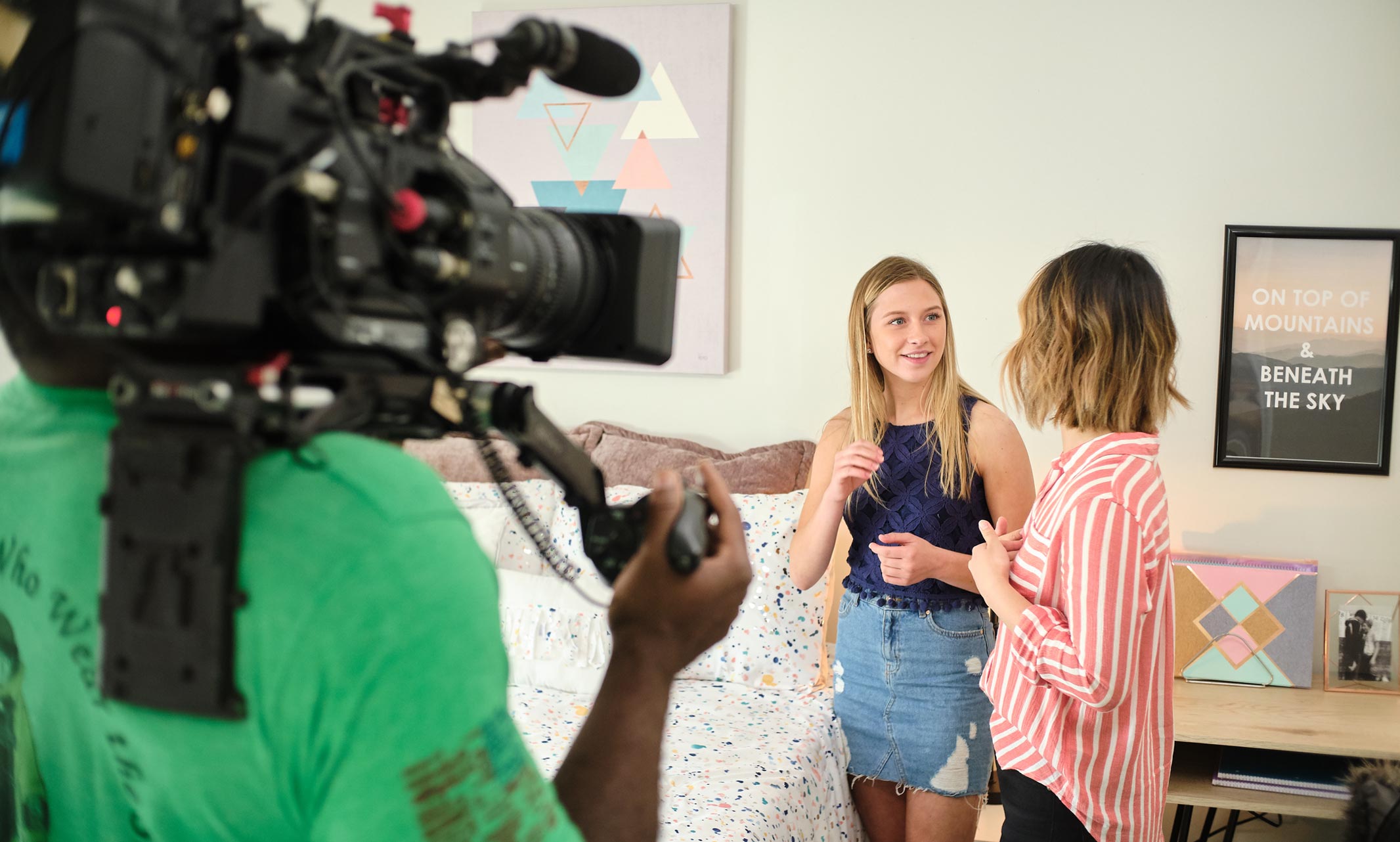
Two Roos get dorm room makeovers
Walmart is releasing a new "Transform Your Dorm" video series on social, featuring three colleges across the U.S.--one of those being UMKC! The filming took place this summer at the Hospital Hill Apartments and two students received dorm room makeovers. Grace Stohs, a studio art student, was featured in the first UMKC video released. Another video featuring Jacob Sumner, a nursing student, was released soon after. The video producer, Brandon Lingle is a UMKC alum and thought it would be great to add his alma mater to the list of universities for Walmart to consider. And UMKC was chosen! UMKC Roos are Everywhere! Here are some of the behind-the-scenes shots from the video shoot.
Jacob Sumner, an accelerated track nursing student, is interviewed at the Hospital Hill Apartments.
Behind-the-scenes with alumnus and producer Jacob Lingle.
Outside the video shoot at the Hospital Hill Apartments on a beautiful summer day.
Aug 28, 2019
Susan Wilson listed among contemporary icons of the African American community at sculpture site
The plaque below the sculpture is emblazoned with the names of giants, 18 in all, including Lucille Bluford, Julia Hill, Mamie Hughes, Leon Jordan, Ollie Gates, Bruce Watkins — and UMKC Vice Chancellor for Diversity and Inclusion Susan B. Wilson, Ph.D.
The plaque accompanies a statue, "Phoenix Rising Out of the Ashes," erected earlier this year at the redeveloped Linwood Shopping Center at the intersection of 31st Street and Prospect Avenue. Created by sculptor Ed Dwight, the artwork is a tribute to the perseverance and resiliency of the people in the surrounding neighborhoods, and their effort to overcome generations of oppression and neglect.
Several plaques surround the sculpture; the one that includes Wilson is a salute to “the contemporary contributors to the progress, the legacy, the culture and the economic viability of Kansas City.”
There was no blue-ribbon committee appointed to choose the individuals to be honored. The artist made the decision on his own.
“I looked for people who struck a chord within me,” as he did his research for the statue, Dwight said. He grew up in Kansas City, Kansas, but left decades ago and is a longtime resident of Denver. He combed through the Black Archives of Mid America, seeking inspiration.
Wilson “teaches people the value of diversity and inclusion,” Dwight said. “That’s what I do through my art, and as I read about her, I felt some kinship with what she was doing.”
Wilson has a long history as a diversity advocate, psychologist and educator. In her work as a community mental health director, she sought to bringing culturally competent care to central city African Americans. She led the implementation of Jackson County‘s first-ever mental health court, working with municipal court to divert non-violent individuals with mental health issues to treatment, not jail. She has served as a treating clinician for the Kansas City Chiefs and the National Football League.
A UMKC vice chancellor since 2014, Wilson implemented a comprehensive, campus-wide plan for diversity and inclusion, built diversity and inclusion training programs and led efforts to conduct a climate survey. She has also worked with numerous school districts and community organizations to advance diversity and inclusion.
Wilson had no idea the honor was coming. Dwight did not reveal the names of honorees in advance of the unveiling.
“A friend texted me from the unveiling,” Wilson recalled. “I was shocked. It is very flattering to be on a plaque with some of the great leaders of Kansas City. With the kind of work I do, people don’t often know what kind of impact I make.”
Wilson said her post at UMKC is just one example of the university’s close ties to the metro Kansas City community.
“Some universities can be like ivory towers on a high hill above their community,” Wilson said. “UMKC’s practice of hiring people with community connections is a real plus.”
Aug 27, 2019
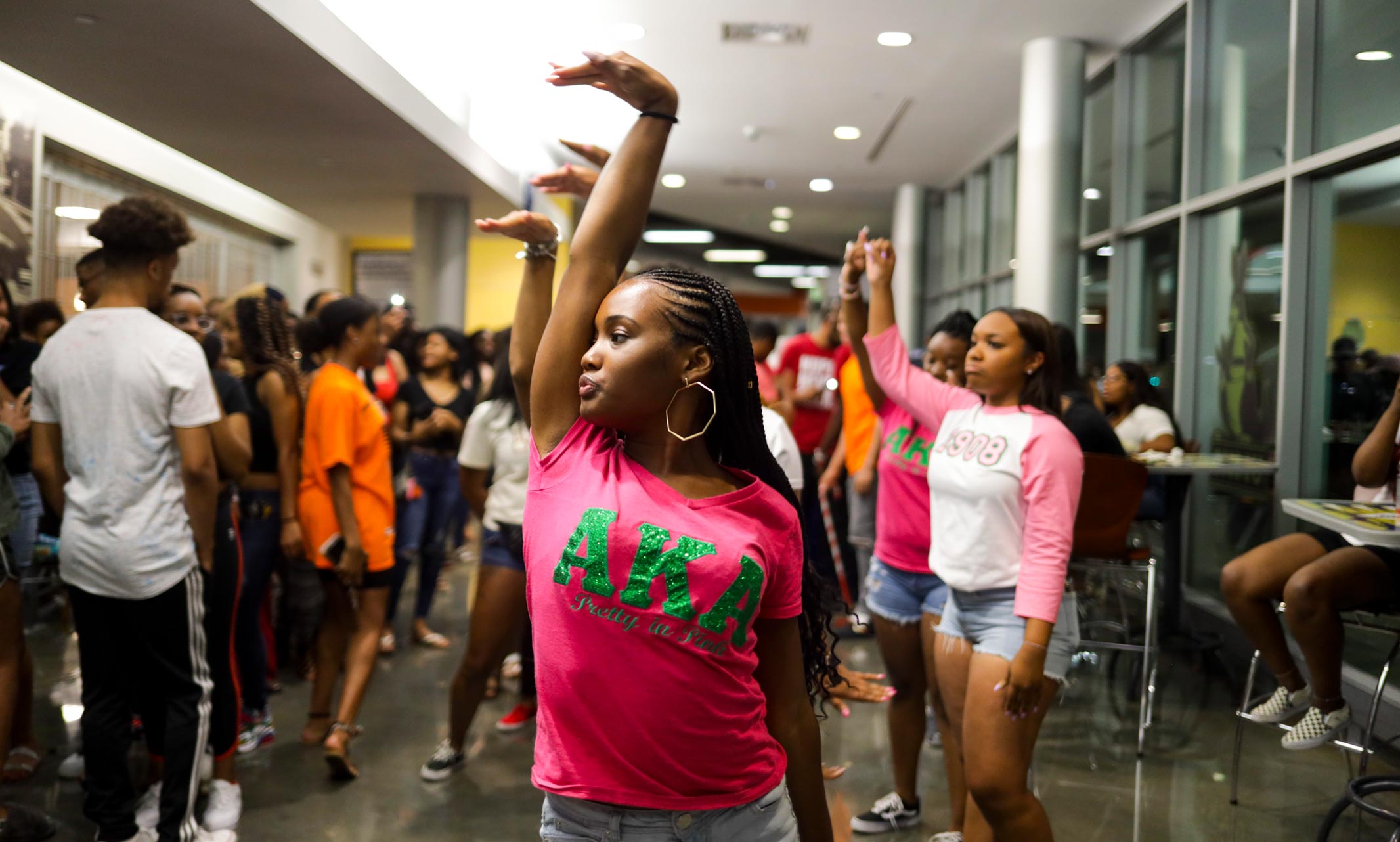
Some great photos of our new Roos' exciting introduction to campus life
A busy Week of Welcome officially kicked off the fall semester for our new Roos.
We welcomed newcomers to campus with some exciting events. Students received new UMKC gear and learned the fight song at Convocation. They learned how to start off on the right foot academically with an info session on campus resources. They also got to meet fellow students in Roo Groups at Unionfest. Then they cheered on our KC Roos during a double-header soccer match, and did so much more! Here are a few of our favorite photos from the week's activities.
Aug 26, 2019
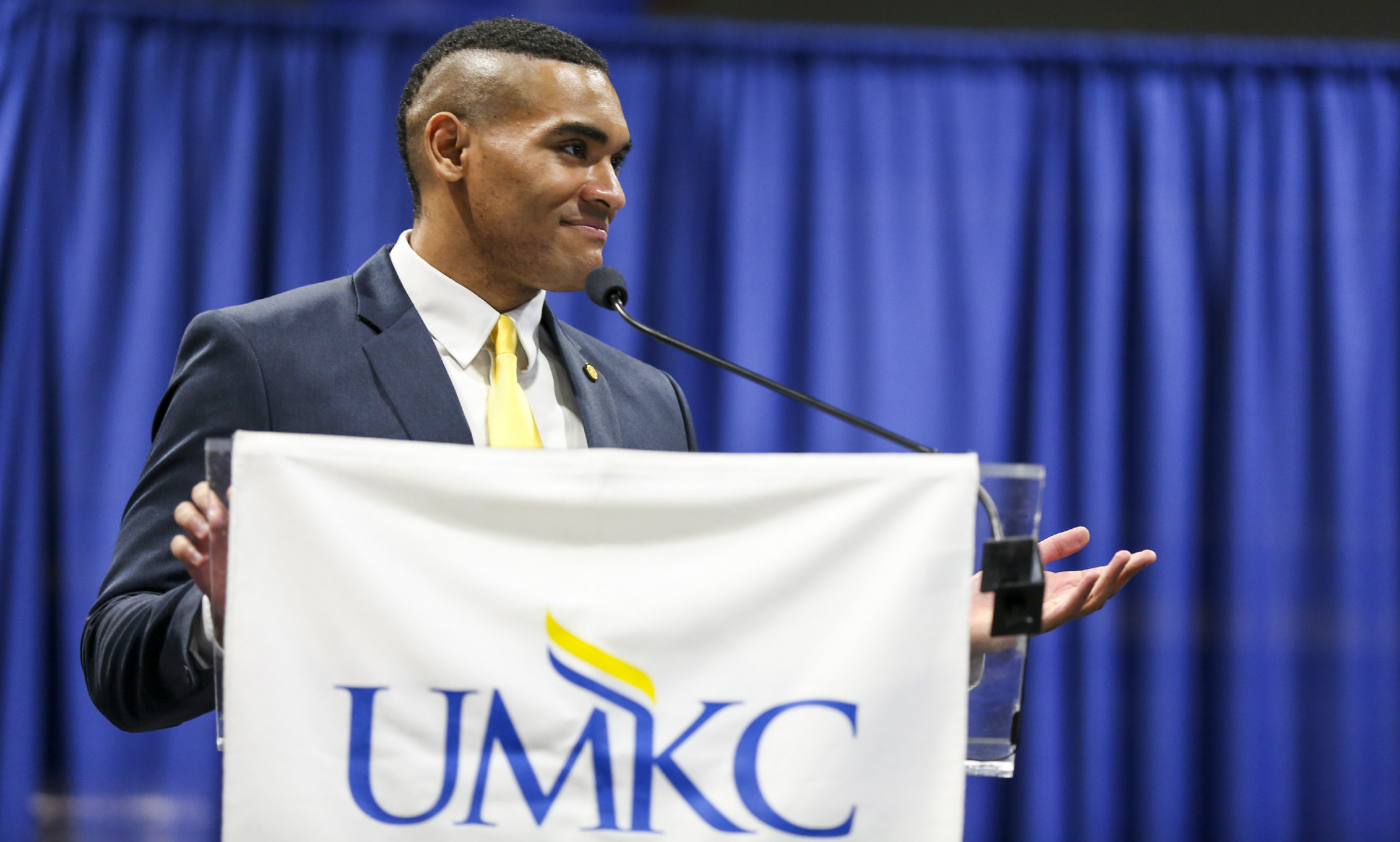
With his eye on the Missouri governor’s mansion, Justice Horn has big plans to improve life on campus and beyond
Get to know our people and you’ll know what UMKC is all about.
Justice Horn ’21Hometown: Blue Springs, MissouriHigh school: Blue Springs High SchoolDegree program: Business Administration
Justice Horn went from being a transfer student to UMKC Student Government Association’s first black and openly gay president in one semester. A former college athlete, whose coming out received national attention, he has shifted his focus and determination to serving the UMKC and Kansas City communities.
You started college at Northern State University in South Dakota as a wrestler and transferred to UMKC after your first year. How was the transition, and how was being a transfer student different than your experience as a freshman?
I don’t feel as if I was treated differently when I came to UMKC even though I didn’t start as a freshman. I’m living proof that new people — black, white, Christian, Muslim — all over campus are accepted. I think that that is something that really makes us different from other schools. That’s why I’m happy to represent the university. There are so many examples of inclusion across campus.
Are you a first-generation college student?
I am not a first-generation college student, but my mother is. She returned to college at UMKC to finish her undergrad degree when I was in elementary school. I remember playing on the campus green with my dad and siblings while waiting for her to get out of class.
Your mother was the sole financial support for your family because of your father’s seizure disorder. How did growing up with the uncertainty of his health affect you?
It was a really interesting environment. There was always some anxiety – you never knew what would happen next, or if this seizure would be the last one. But it gave me a constant feeling of understanding that you never know what people are going through. It made me aware of the need to always be kind.
“I’m living proof that new people — black, white, Christian, Muslim — all over campus are accepted. I think that that is something that really makes us different from other schools.”
Why did you choose UMKC?
I chose UMKC for a couple of reasons. I had a life-changing experience that made me revaluate what would truly make me happy and I realized that I need to serve others. Last fall, I lost my friend and teammate, Curtis LeMair. This changed my life and pushed me to reevaluate what I was doing. I woke up one day and thought, “is being involved in wrestling really giving back to the world? Is that what I want to be remembered for?” That led me to UMKC.
Do you miss wrestling?
I do miss wrestling and I've been grappling with that for a couple of weeks. I miss the camaraderie of my teammates and my coaches, especially because they really gave me the faith and the strength to come out.
You’ve said that you were inspired by Michael Sam, who played at the University of Missouri and was the first openly gay NFL player, when you were considering coming out. While it’s impressive to be so open in such traditionally male, heterosexual environments, do you ever wish that someday sexual orientation won’t be of note?
I have been the first at a lot of things, but I’m aware of the shoulders I stand on and how my actions affect the people who come after me. That’s why I do it. I wonder when we will get to a day that it’s not a big deal, but that only happens when someone is first. We don’t talk about who the first woman student body president was here because it happened. It was a big deal! But now it’s the norm. We have to move through these firsts and it does take time.
How does being back in Kansas City feel?
It feels great, but also like a responsibility. I feel as if I need to set an example. I don’t want to compare myself to President Obama, but a lot of people have stereotypes about what a gay, lesbian or transgender person is like. It’s almost like being an ambassador for my community to break those old stigmas. That goes for me being in the LBGT community, but also being a person of color.
“I have been the first at a lot of things, but I’m aware of the shoulders I stand on and how my actions affect the people who come after me. That’s why I do it.”
Scrolling through your Twitter and Instagram feeds it almost looks as if you were embedded in the Kansas City mayoral election. Rather than aligning with one candidate you were able to interact with several of the candidates. Was that intentional?
Yes. During the election I knew that I wanted to run for student body president. There were people who wanted me to make an endorsement, but the city will be looking at transportation – including the new street car extensions – and housing around campus. I like getting involved, but I took a back seat and watched so that I would be better prepared in this role no matter who our next mayor was.
Do you see UMKC playing a role in the growth of the city?
It seems like everyone is buying in at the same time. We have a new mayor and a new chancellor. We have a new athletic director, head basketball coach and Roo. The provost is launching her new student success plan. The best thing we can do is support each other and just – I’m not saying do nothing – but ride the wave.
Visit Campus
Aug 24, 2019

An easy, friendly way to get help with classes
Sitting in a huge lecture room crammed with 200+ students can be a bit overwhelming. Leaving that lecture completely confused about what the professor talked out about is an even worse feeling. But don’t fret, that’s what Supplemental Instruction is for!
Supplemental Instruction (SI) consists of student-led, free, weekly sessions where you can review the material that was covered in lecture.
Here are the top four advantages of being in SI:
1. Student-to-student interaction
SI is a great way to meet students in your classes and get interaction that you may not receive if you just go from the lecture hall to your dorm room to study. Each SI session is led by a student who’s been through the class and done well. They’ll lead a group of students like you are currently in the same course and you’ll work together to excel!
2. Higher Grades=Higher GPA
It has been statistically proven that attending SI sessions greatly improves test scores, resulting in an overall higher grade in the class. So if you need a higher GPA to get into your major program, apply to graduate school or maintain your scholarships, attending SI sessions can help with that!
3. Less stress
No one likes stressing the night before the exam, trying to cram five weeks’ worth of material into one night. Instead of sacrificing your sleep, start reviewing early by attending weekly SI sessions. Your SI leader has taken the class before and knows the professor’s teaching and testing style well. They are there to help you succeed! Their weekly sessions are designed to review the material in a fun way so you are fully prepared for each exam.
4. Become an SI leader
After you’ve attended SI sessions and performed well in the class, you can apply to be a leader! Being an SI leader is a great way to get involved at UMKC (especially since UMKC is the International Center for SI) and help other students, just like your SI leader helped you. Through being an SI leader, you gain leadership and people skills, a relationship with the professor, and additional review of the material that will be covered on any professional school tests you may take.
I cannot thank the SI program enough for helping me grow as a person and gain so much experience along the way. I think a lot of leaders can agree that it’s one of the most rewarding experiences at UMKC. We are always here to provide support to our fellow students and UMKC community!
Aug 23, 2019
Innocent man’s freedom won by law students, professors
University of Missouri-Kansas City School of Law students, professors and members of the Kansas City community gathered Aug. 22 to celebrate the exoneration of Ricky Kidd. He was incarcerated for 23 years for a double homicide he did not commit.
UMKC professors Sean O'Brien and Lindsay Runnels, along with as many as 50 different students from the UMKC School of Law, have worked on Kidd’s case since 2005.
“In law school classrooms, we can teach about law and procedure. But it’s when you have a client that you learn what it means to be a lawyer. What our students have learned working with Professor O’Brien and Ricky Kidd is how to have faith in a system that has been faithless and how to have hope in a situation that seems hopeless,” said Barbara Glesner Fines, UMKC School of Law dean.
“Make no mistake, the past 23 years has been a severe challenge for my family and I. But today, I am much better. When you have strangers and volunteers dedicated to fighting for you, anything can happen. I feel like we were all exonerated. We kept on pushing. Everyone working on my case, and these law students, made the impossible possible." -Ricky Kidd
O’Brien, who graduated from the UMKC School of Law in 1980, has been dedicated to justice since his early days as an attorney. He enjoys working with like-minded people, many of whom were and are UMKC students. They share a passion for seeking the truth and righting wrongs when they occur.
“This mission is about love. It takes a village. The people who work behind the scenes, such as the law students, don’t receive recognition. Ricky is meeting people who have worked on his case for the first time. They all work behind the scenes. The Midwest Innocence Project gave their best people to work on the case.” – O’Brien
Over the years, Kidd and O’Brien experienced many highs and lows. Kidd lost his case 11 times.
“Make no mistake, the past 23 years has been a severe challenge for my family and I. But today, I am much better. When you have strangers and volunteers dedicated to fighting for you, anything can happen. I feel like we were all exonerated. We kept on pushing. Everyone working on my case, and these law students, made the impossible possible." - Ricky Kidd
O’Brien was present last week when Kidd met his daughter Jasmine for the first time as a free man. She was five years old when he was incarcerated. Watch the emotional reunion, recorded by O’Brien’s wife.
Aug 23, 2019

Collaborative Missouri task force to explore optimal opioid prescribing practices
Once again, the University of Missouri-Kansas City is leading the fight against opioid misuse.
With a grant from the Cardinal Health Foundation, the UMKC School of Pharmacy is partnering with the Missouri Pharmacy Association and St. Louis College of Pharmacy to improve prescribing practices for pain management throughout the state of Missouri.
The $120,000, two-year grant was awarded as part of the Cardinal Health Foundation’s new, nationwide Optimal Prescribing in Pain Management initiative. The initiative pairs schools of pharmacy with state pharmacy associations to develop strategies to drive the optimal prescribing of pain medications and the appropriate use of opioid medications in their states. In addition to Missouri, the other collaborators are from Maryland, Ohio, North Carolina and Wisconsin.
The Cardinal Health Foundation, in partnership with the National Alliance of State Pharmacy Associations (NASPA) and the American Association of Colleges of Pharmacy (AACP), is the national convener of the program.
“We are honored to be a leader in this initiative, and feel fortunate we can canvas such a big area of the state,” said Heather Lyons-Burney, clinical assistant professor at the UMKC School of Pharmacy and the principal investigator on the grant. The UMKC School of Pharmacy features three campuses: in Kansas City, Columbia and Springfield.
“Opioid misuse is not just an urban problem or a rural problem, it’s an everywhere problem. One thing is not going to fix this. We have to attack it from different angles.”
Using the grant funds, Lyons-Burney will lead a task force that develops a “Training of Trainers” curriculum using current guidelines, evidence-based practices and proven intervention strategies for optimal prescribing practices. Following the curriculum development, faculty will deliver the program to pharmacists across Missouri through live trainings and virtual conferencing software. Trained pharmacists will then use strategies learned from the curriculum to educate prescribers on optimal pain management to improve patient health.
“Opioid misuse is not just an urban problem or a rural problem, it’s an everywhere problem. One thing is not going to fix this. We have to attack it from different angles.” - Heather Lyons-Burney
The goal is to help reduce long-term opioid dispensing rates in Missouri, increase the use of the prescription-drug monitoring program by pharmacists and health-care providers to identify those at risk and strengthen relationships between health professional organizations in the state through the support of joint educational and legislative efforts.
“We are grateful for our partnership with the Cardinal Health Foundation, the Missouri Pharmacy Association and St. Louis College of Pharmacy,” said Russell Melchert, dean of the UMKC School of Pharmacy. “We have expert faculty leading the way.”
UMKC has ongoing experience with preventing and assessing opioid misuse at national and local levels:
The Collaborative to Advance Health Services at the School of Nursing and Health Studies, in partnership with the American Academy of Addiction Psychiatry, was awarded a two-year, $8 million federal grant in 2018 to address workforce capacity issues. The funding goes toward providing training and assistance to build the capacity of physicians and counselors to provide treatment.
The Collaborative also started the KC Perinatal Recovery Collaborative in 2018 to improve family-centered addiction care for pregnant and parenting women and their families in the Kansas City metro area through cross-systems partnerships. The need is there: Missouri had a 358 percent increase in neonatal abstinence syndrome— called NAS — in just five years, between 2011 and 2016. NAS occurs when a mother uses drugs while pregnant or passes the substance through breast milk or the placenta. Infants born with NAS might experience a wide range of withdrawal symptoms including mild tremors and irritability, fever, excessive weight loss and seizures.
Maureen Knell, a clinical associate professor in the School of Pharmacy, analyzes data from about 690 million outpatient clinic visits by patients who suffer from chronic pain not related to cancer. She and collaborators research opioid prescriptions to better determine what’s happening across the country.
Aug 22, 2019
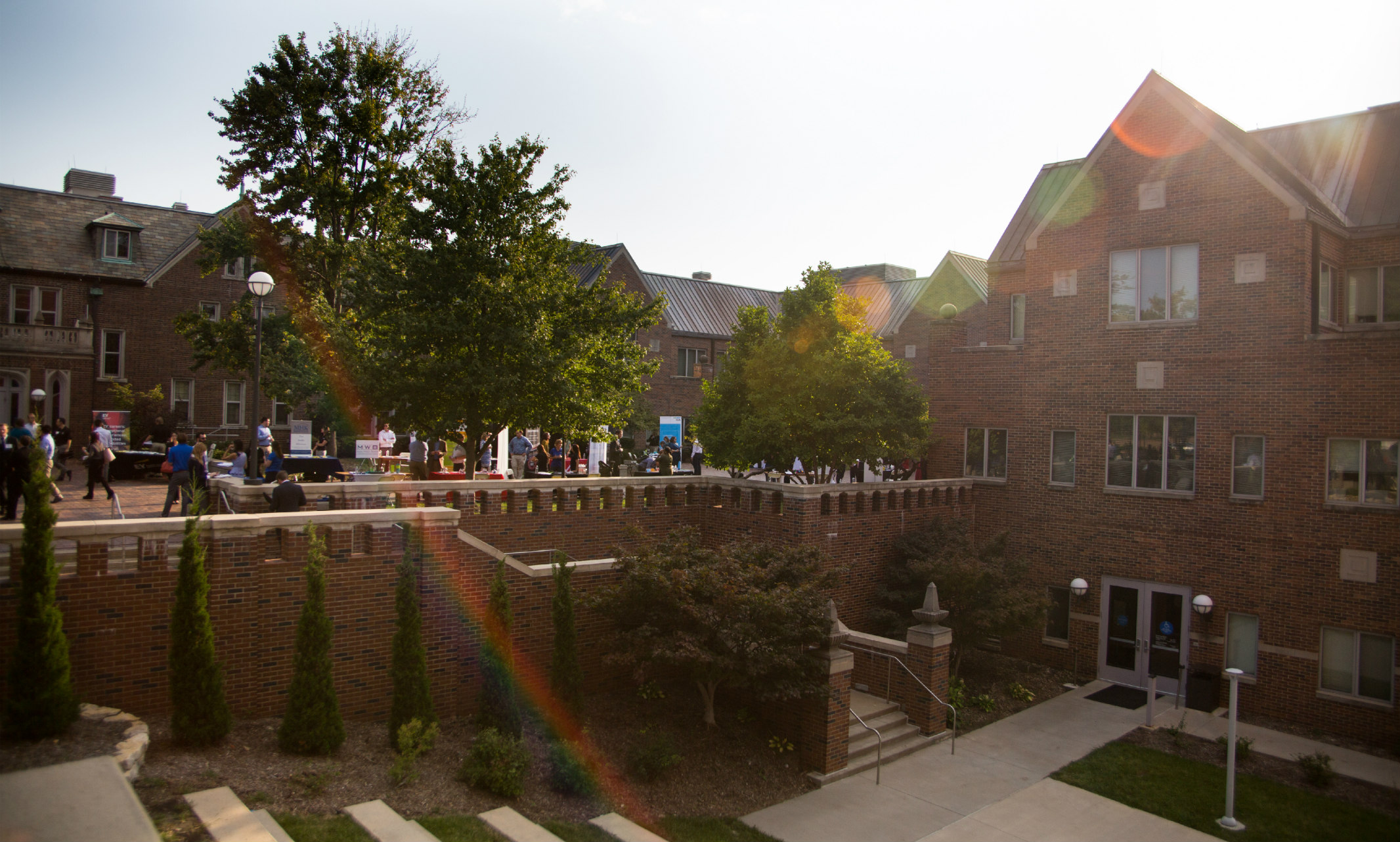
New faces, construction, major gift announcements and name changes reflect growth
UMKC is constantly evolving, even in the quiet months of summer. Here’s what you might have missed while you were away.
1. Building for Success: Campus Expansions and Major Gift Announcements
Hang on to your hardhats! Several buildings on campus have seen changes and more updates are on the horizon.
While the infrastructure for the basement of the Robert W. Plaster Free Enterprise and Research Center next to the School of Computing and Engineering’s Flarsheim Hall was visible last May, now the building is well above ground level. We look forward to watching construction throughout the year. Scheduled completion is 2020.
The Marion and Henry W. Bloch Foundation has committed $21 million to support the Henry W. Bloch School of Management. The gift will be used to support the Henry W. Bloch School of Management via programming enhancements, expansion and renovation of Bloch Heritage Hall, and support programs that will help students during pivotal times in their university careers.Several buildings on both campuses will receive updates, thanks to a $15 million multi-school gift from the Sunderland Foundation.
Flarsheim Hall will add a virtual reality lab, a clean room and other state of the art technologies that will bring it in line with the Plaster Center.
Henry W. Bloch School of Management will receive funds to renovate and update technology in Bloch Heritage Hall.
University Libraries will renovate the Miller Nichols Library third floor for a digital humanities and digital scholarship center and in preparation for the planned relocation of the State Historical Society of Missouri.
The School of Law will renovate classrooms to better accommodate the more interactive experiences between professors and students.
The School of Dentistry will renovate the pre-clinic laboratory and include replacing dated equipment with state-of-the-art technology.
2. Haven't We Met? New UMKC Athletics Identity
New look, new Roo. UMKC Athletics announced a new brand identity that features a fierce “fighting Roo.” While Walt Disney’s smiling original is beloved, this new Roo reflects the strength, determination and pride of Kansas City. A bold, new basketball court design features the Roo and the Kansas City skyline, showing our unfailing hometown pride. Kansas City pride shines through in a new interlocking “KC” mark. Shirts and hats featuring the new logos are available online and the full collection will be in the bookstores soon.
3. What’s In A Name? Academic-Unit Mergers
The UMKC Department of Theatre, which attracts national talent and graduates outstanding theatre performers, designers and technicians, merged with the school formerly referred to as the UMKC Conservatory of Music and Dance. The new name of these wildly successful and creative entities is the UMKC Conservatory.
While the School of Biological Sciences and the department of chemistry had been neighbors and collaborators for years, they joined forces this summer as the School of Biological and Chemical Sciences.
4. Welcome To The Troop! Key Administrative Hires
UMKC was thrilled to welcome two outstanding new members to our executive team this summer.
Lisa B. Baronio, EMBA, has joined UMKC as the president of the UMKC Foundation and chief advancement officer. She will lead corporate and foundation relations, major gifts and gift planning programs, endowment, capital campaigns, stewardship and advancement services.
Yusheng (Chris) Liu, Ph.D, is the new UMKC vice chancellor for research. Liu brings more than 20 years of experience in working for public research universities as an educator and chief research officer, and he also served as a program director at the National Science Foundation, based out of the Washington, D.C., area.
Aug 15, 2019
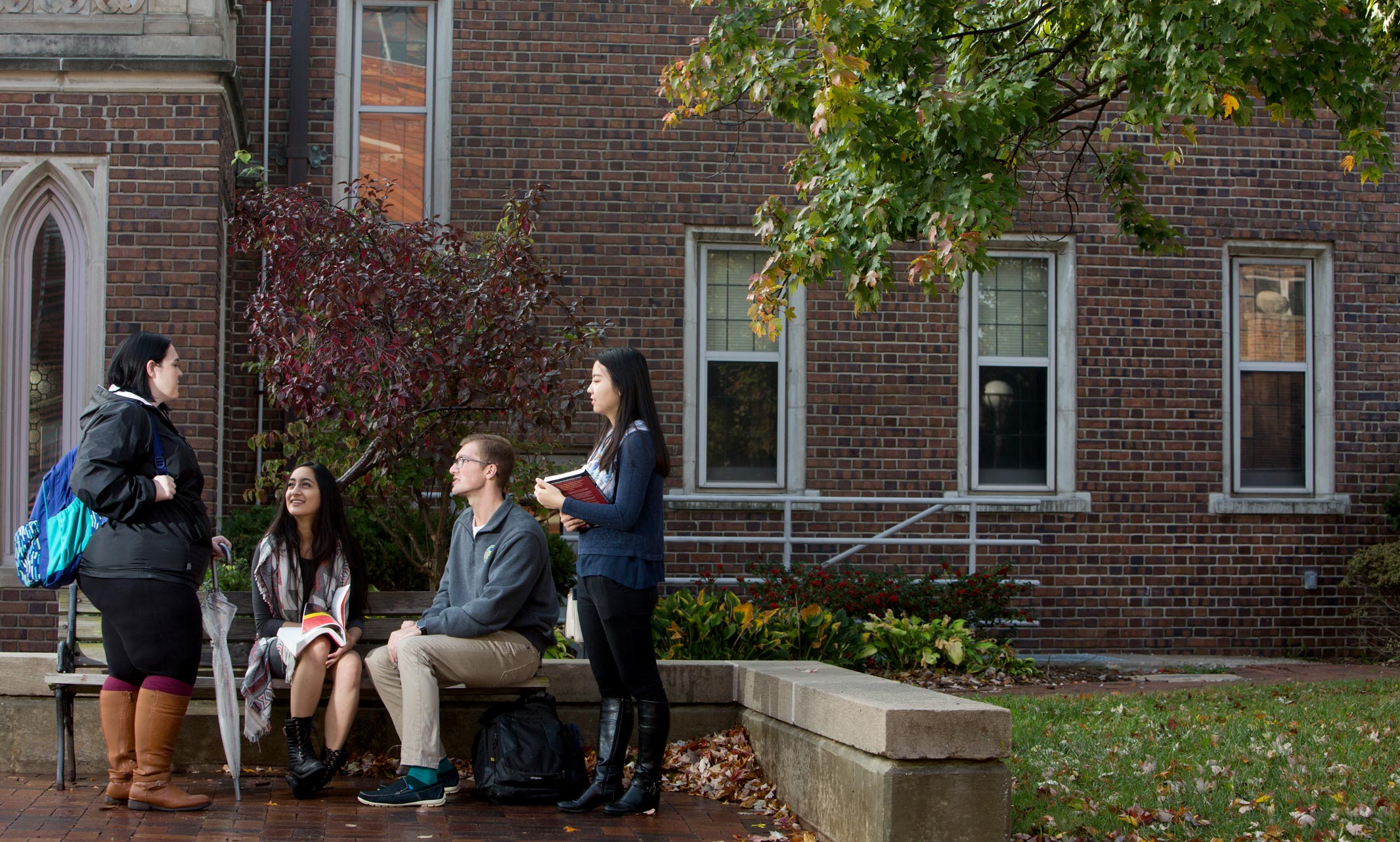
Gift to UMKC Foundation will be divided among three major initiatives
The Marion and Henry Bloch Family Foundation is donating $21 million to the University of Missouri-Kansas City Foundation.
The gift will be used to support the Henry W. Bloch School of Management via programming enhancements, expansion and renovation of Bloch Heritage Hall, and support programs that will help students during pivotal times in their university careers.
This $21 million gift will be shared by three major initiatives: $11.8 million for programming within the Bloch School of Management; $8 million for infrastructure improvements to and expansion of the Bloch Heritage Hall building; and $1.2 million to support RooStrong, the university’s new program for increasing student retention, six-year graduation rates and career outcomes.
This new gift comes less than a year after the announcement of a new $20 million scholarship program funded by $10 million from the Bloch Family Foundation and the H & R Block Foundation and $10 million from UMKC and the University of Missouri System. About 800 students will benefit over the next nine years from the earlier scholarship gift.
“My parents believed in Kansas City, and they believed in UMKC as a key engine for progress in the community they loved.”— Tom Bloch
“The commitment of the Bloch Family to Kansas City and to Kansas City’s university has been steadfast, highly impactful and beyond generous,” said UMKC Chancellor Mauli Agrawal, Ph.D. “This gift honors the memory of Marion and Henry Bloch by building upon the legacy they created with the Henry W. Bloch School of Management as the provider of premier business education that Kansas City needs and deserves.”
Tom Bloch, chairman of the Bloch Family Foundation, said the gift demonstrates the continuing legacy of Marion and Henry Bloch.
“My parents believed in Kansas City, and they believed in UMKC as a key engine for progress in the community they loved. The Bloch Family Foundation has consistently supported growth through access to high-quality business education in greater Kansas City, and we are confident that the initiatives supported by this gift will advance that goal,” Bloch said.
A portion of the generous gift will go toward the renovation and expansion of Bloch Heritage Hall.
Lisa B. Baronio, EMBA, president of the UMKC Foundation and chief advancement officer of UMKC, added: “With two significant investments in UMKC immediately prior to the beginning of a new academic year, it is clear that the community recognizes the effect that UMKC has on transforming lives. The excitement is everywhere and it is contagious. The $21 million gift from the Bloch Family Foundation, and the $15 million gift from the Sunderland Foundation announced in July, demonstrate the commitment of Kansas City’s philanthropic community and their high regard for UMKC.”
The entrepreneurial engine of the Kansas City region is fueled by graduates of the Henry W. Bloch School of Management. Kansas City’s Business School is inspired by the innovative and civic mindset of its namesake. Henry W. Bloch co-founded the tax empire H & R Block and is considered one of the world’s greatest entrepreneurs. He embodied the philosophy of working hard, generating success and completing the continuum by giving back to the community through philanthropy and social entrepreneurship.
Aug 13, 2019
KCTV5 featured the UMKC Augmented and Virtual Reality Lab to show how VR tech can help train employees.
Educators at UMKC have taken note. In the spring 2019 semester, the college unveiled a facility dedicated to VR job education and training at the School of Computing and Engineering. Kevin Truman, the dean of the school, said the university is already planning on expanding the facility.
Aug 09, 2019
Media report on the Sunderland Foundation gift that will impact hundreds of students
Read the Kansas City Star Article: $15 Million Donation Will Fix Up Classrooms And Labs On UMKC's Campus
Read the Philanthropy News Digest Article: Sunderland Foundation Awards $15 Million to UMKC For Renovations
Read the Kansas City Business Journal Article: Sunderland Foundation Will Give $15M To Five UMKC Projects
Aug 09, 2019
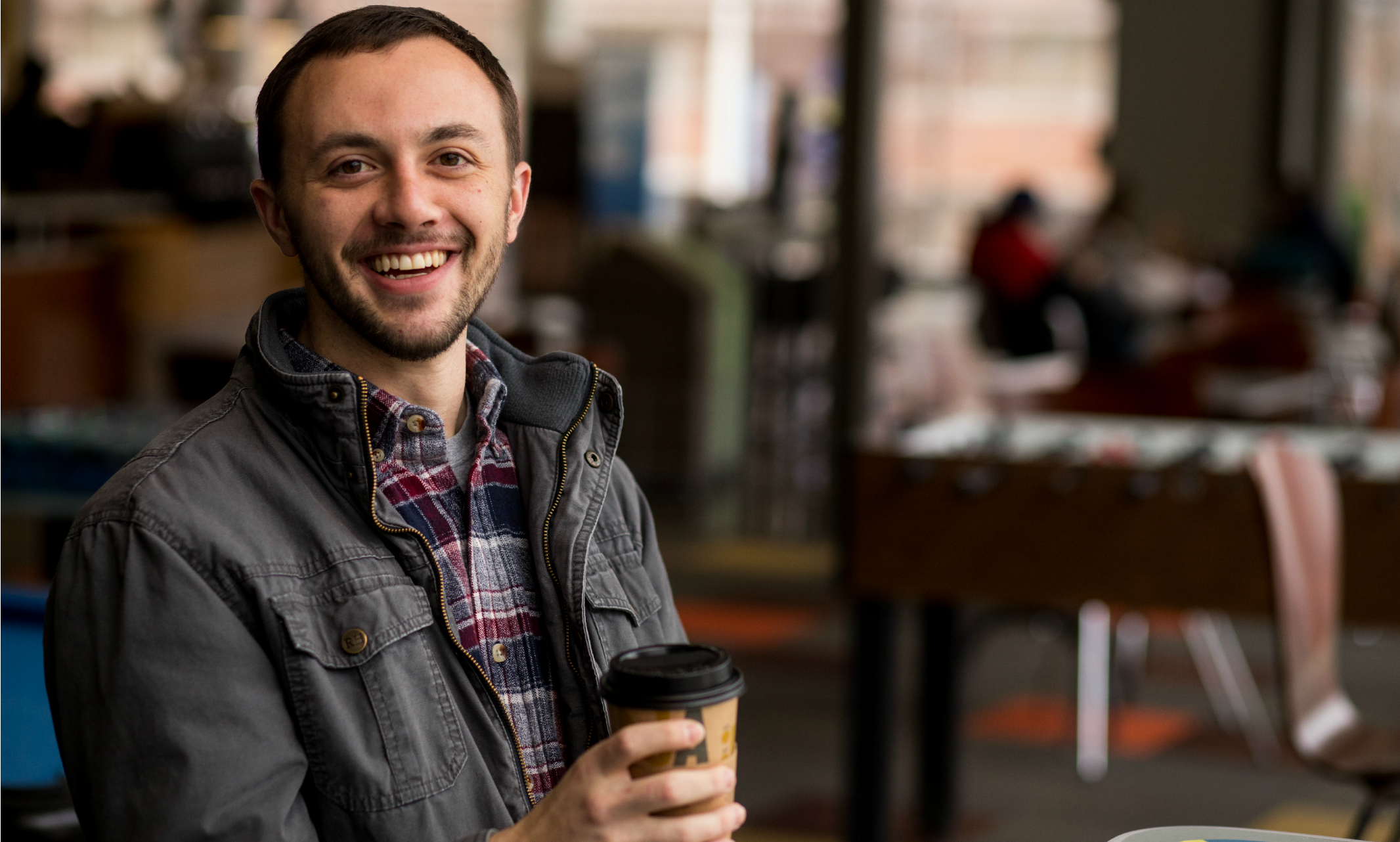
Joseph Allen follows his passion for medicine and research
Get to know our people and you’ll know what UMKC is all about.
Joseph Allen, ’20
Hometown: Albuquerque, New Mexico
Degree program: Biology with an emphasis in biomedical sciences and a minor in Chemistry
Why did you choose your field of study?
I have always dreamed of being a doctor. The idea of being a part of something that has such a profound effect in peoples’ lives, inspired me to start on this challenging yet rewarding path. I chose biology and chemistry in order to obtain the foundation needed for a career in medicine. Shortly after my first semester, I was given an incredible opportunity to work as an undergraduate researcher in the School of Biological Sciences. I soon discovered that I had a passion for both medicine and research, so I decided to pursue both. With the education and training I am receiving at UMKC, I feel prepared for the challenges that lie ahead.
How has your college program inspired you?
Every day we hear stories about someone who is doing extraordinary things to help their community, the environment, and people around the world. I wanted to make a difference as well, but I wasn’t sure how to start being that kind of person and doing those kinds of things. I’ve now realized that all it takes is recognizing that something could be better, a commitment to see it changed, and a determined persistence to follow through. College has inspired me to have the confidence to not just dream of a better world but to make it a reality.
"With the education and training I am receiving at UMKC, I feel prepared for the challenges that lie ahead." — Joseph Allen
What extracurricular activities are you involved in at UMKC?
I am the editor-in-chief of Lucerna, the UMKC undergraduate research journal. I lead the honors discussion sections for General Chemistry I and II, am on the Pre-Medical Society leadership board, and this semester I have been working with organizations across campus to start the first collaborative blood drive at UMKC this spring.
Have you had and internship or job shadow? What did you learn?
The past few years I’ve been studying the molecular basis of neurodegenerative disease in Dr. Ryan Mohan’s laboratory. Before coming to UMKC, I never thought I would have the opportunity to be engaged in leading-edge research, yet here I am. Being a part of this lab has taught me so many things. I’ve learned to think about problems in a different way, have confidence in my ability to understand and describe complex concepts, and never allow an experiment that didn’t work to hold me back.
What are your lifelong goals?
After graduating from UMKC, I plan to attend medical school and attain an M.D.-Ph.D. with the goal of becoming a neurosurgeon. This path allows me to combine my interest in medicine and research, and hopefully will give me the opportunity to be involved in some incredible things.
In his free time, Joseph enjoys painting and drawing. He even considered pursuing a fine arts degree. Images courtesy of Joseph Allen.
What do you do in your free time?
I enjoy hiking, fishing, cooking, playing piano, or sitting down to a good book and a cup of coffee. Most people don’t know this, but I paint and draw quite a bit. I considered pursuing a degree in fine arts yet decided to keep it as something I could relax and enjoy doing in my free time.
Visit Campus
Aug 08, 2019
Winners include Dara Yen Elerath of New Mexico, Scott Nadelson of Oregon
BkMk Press at the University of Missouri-Kansas City announced the 2019 winners of its book prizes for poetry and short fiction.
Dara Yen Elerath of Albuquerque, New Mexico, won the 20th John Ciardi Prize for Poetry for her manuscript The Dark Braid. Finalists included Brad Buchanan, Fay Dillof, Peter Krumbach, Emily Schulten, Emily Tuszynska, Roy White and Helen Wickes.
“What makes these poems so engaging is the way the poet constructs them from contradictory elements. The works feel both personal and mythic,” said prize judge Doug Ramspeck.
Scott Nadelson of Salem, Oregon, won the 18th G. S. Sharat Chandra Prize for Short Fiction for his manuscript One of Us. Finalists included Corie Adjmi, Naira Kuzmich and Amy Foster Myer.
“These stories challenge the ways we identify in terms of nation, race, class and religion; and ask readers to consider who really belongs,” said prize judge Amina Gautier.
Each author will receive $1,000 plus book publication in fall 2020 by BkMk Press. The John Ciardi Prize for Poetry was founded in 1998 to honor the legacy of Ciardi, who taught for a time at UMKC and was a poet, translator and editor at The Saturday Review, and a commentator on NPR. BkMk Press founded the G. S. Sharat Chandra Prize for Short Fiction in 2001 in memory of Chandra, who was an author and professor of English at UMKC. Previous winners of BkMk’s annual writing contests have gone on to receive wide literary acclaim. A full list of past recipients, as well as information on submitting to the 2020 contests, can be found online.
Aug 08, 2019
Will make personal connections with Missouri residents statewide
Three University of Missouri-Kansas City faculty members have been named UM System Presidential Engagement Fellows: Jannette Berkley-Patton, Ph.D. and Barbara Pahud, M.D., both of the School of Medicine; and Gerald Wyckoff, Ph.D., School of Pharmacy and School of Biological and Chemical Sciences.
The Presidential Engagement Fellows program was established to share faculty accomplishments with Missouri residents in their own communities. It allows faculty to make personal connections and deliver on the mission to disseminate and apply knowledge for the benefit all Missourians.
To participate in the Presidential Engagement Fellows program, faculty members were nominated or self-nominated at the campus level based on their demonstrated excellence as well as their ability to communicate their research to the public. Fellows participated in a training and orientation session and represent the UM System at a minimum of three to five speaking events per year. This program is administered by the UM System Office of Engagement and Outreach.
Jannette Berkley-Patton
Berkley-Patton is a professor in the School of Medicine Biomedical and Health Informatics Department, the director of the Community Health Research Group, the director of the UMKC Health Equity Institute and adjunct faculty in the Department of Psychology.
As a principal investigator of National Institutes of Health- and foundation-funded studies, she uses community-engaged approaches to develop and test prevention, screening and linkage to care interventions focused on HIV, STDs, hepatitis C, diabetes, heart disease and mental health in faith communities. Her research engages faith, community and health agency partners along with students and faculty in implementing these interventions to address health disparities using sustainable methods. Berkley-Patton’s research also extends to working with faith communities in Jamaica, West Indies on diabetes and heart disease prevention. She has been inducted into the KU Women’s Hall of Fame, awarded the University of Missouri System Cross-Cultural Community Engagement Presidential Award and appointed as a University of Missouri System Presidential Engagement Fellow.
Speaker Topics:
Sharing your passion with others to expand educational and career opportunities
Conducting research in church settings: faith communities empowered to create change
Engaging underserved communities in addressing health equity
Education and research: Why your voice matters
Barbara Pahud
Pahud is an associate professor of pediatrics at Children’s Mercy and University of Kansas Medical Center. She is the associate director of the NIH Vaccine and Treatment Evaluation Unit at Children’s Mercy.
Pahud received her medical degree from La Salle University, Mexico City, Mexico; her master’s degree in public health from Columbia University, New York; and completed her residency in pediatrics at Maimonides Medical Center in Brooklyn, New York. Subsequently, she fulfilled a fellowship in pediatric infectious diseases from the University of California, San Francisco, followed by a fellowship in vaccine safety from the Centers for Disease Control and Prevention (CDC) in collaboration with Stanford University Medical Center.
Pahud is the principal investigator for the National Institutes of Health Sunflower Pediatric Clinical Trials Research Extension (SPeCTRE) and for the Collaboration for Vaccination Education and Research (CoVER) study, as well as being a co-investigator in an ongoing CDC- and National Institute for Allergy and Infectious Diseases-sponsored surveillance program for acute gastroenteritis and acute respiratory illness in children. She has also presented numerous abstracts and lectured internationally, nationally and locally.
Speaker Topics:
Improving the health of our communities through HPV vaccination
Overcoming vaccine hesitancy – practical tips for talking to patients and families
Prevention of influenza disease and deaths in our community
Also able to discuss other vaccine related topics and tailor them to the specific group
Gerald Wyckoff
About 30 million people in the U.S. live with a rare disease – about as many as suffer from cancer – but the majority of those 7,000 rare diseases have no cure. Many Missourians, therefore, are affected by a lack of needed treatments. For these desperately needed new drugs to be developed efficiently, we need an integrated, data-driven approach, whether the data comes from a human doctor or an animal veterinarian.
This is the work that Wyckoff came to the University of Missouri-Kansas City to do. Growing up in New York, he earned his B.S. in biology from the Cornell University College of Agriculture and Life where he learned to calculate trait heritability in cattle, and his Ph.D. in genetics from the University of Chicago, eventually studying human genetics. An affinity for computers led him to create complex programs and systems to support his work, starting the 1Data project to help integrate human and animal health data across state lines and institutional boundaries to compile data for more effective drug development.
He has helped develop software applications for biology and chemistry, and this led to his entrepreneurial efforts outside of the academy as a founder of one company and co-founder of another, making use of the resources at UMKC and in the Kansas City region to launch his visions. This makes him keenly aware of workforce development issues and how the UM System helps meet the needs of Missouri small businesses. He has won the Missouri Governor’s Teaching Award in 2018 in part for his ability to take complex ideas and make them relatable to real-world applications and problems.
Speaker Topics:
How evolution contributes to our ability to create drugs to target diseases
A “one-health” approach to data sharing that integrates data across animals and humans, from farms to pharmacies
Precision medicine as a focus for study from bench to bedside
Aug 05, 2019

Five professors to participate in UM System’s Excellence through Innovation Program
Five University of Missouri-Kansas City faculty members have been chosen to participate in innovative, high-priority research projects funded with more than $20 million in investments from the UM System and its four universities.
System President Mun Choi, along with the four university chancellors and the system’s vice president for research and economic development, announced the series of investments Aug. 8, as the first stage of the system’s Excellence through Innovation research program.
Participating UMKC faculty members are Praveen Rao, Associate Professor of Computer Science and Electrical Engineering; Zhu Li, Associate Professor of Computer Science and Electrical Engineering; Viviana Grieco, Associate Professor of History & Latin American and Latinx Studies; Tony Luppino, Rubey M. Hulen Professor of Law; and Douglas Bowles, Professor of Economics.
The system-wide research investments support the UM System’s vision to advance opportunities for success and well-being for Missouri, the nation and the world through transformative teaching, research, innovation, engagement and inclusion. Choi has identified research as a key investment area along with areas such as affordability. Growing the research enterprise helps to attract research dollars, distinguished faculty members and students, many of whom engage in research as undergraduates.
“Within the UM System, we have an outstanding group of faculty members who are committed to research excellence,” Choi said. “It’s our job as academic leaders to provide them with the opportunities and resources to significantly grow research efforts that are bold and transformative, especially as it pertains to our highest priority, the NextGen Precision Health Initiative and Institute. These projects will be critical to catalyzing the collaboration and infrastructure investments that are needed to grow extramural funding for our universities.”
The invested funds will help train the next generation of leaders to meet workforce needs, create breakthrough discoveries to improve the human condition and convey the benefits of teaching and research to Missouri communities.
This year, there are 19 innovative research projects that will receive funding from the UM System and its four universities. The projects include research supporting the core instruments and infrastructure of the NextGen Precision Health Institute; research advancing the systemwide NextGen Precision Health Initiative; and research serving other key priorities of the System’s four universities.
The selection of the 19 projects was the result of a formal proposal process with more than 115 proposals submitted. These projects will be funded up to $20.5 million, with $11 million from UM System and the remaining funds from the four universities. These strategic investments will achieve excellence in research and provide meaningful economic and workforce development to Missouri and beyond.
The projects in which UMKC faculty are participating are listed below. The full list of 19 research projects is available online.
Establishment of the NextGen Data Analytics Center
Primary Investigators: Praveen Rao, UMKC; Prasad Calyam, MU
Co-PIs: Zhu Li, Viviana Grieco, UMKC; Peter Tonellato, Deepthi Rao, Prasad Calyam, MU; Sanjay Madria, Missouri S&T; Timothy Middelkoop, Kannappan Palaniappan, Satish Nair, Ye Duan, Trupti Joshi, MU
University of Missouri-Kansas City’s Praveen Rao and MU’s Prasad Calyam are leading a project to develop a hyper-converged computational hub that will be capable of analyzing and storing massive datasets to support the NextGen Precision Health Initiative as well as other collaborative research projects across the UM System. They are joined by Zhu Li and Viviana Grieco with UMKC; Peter Tonellato, Deepthi Rao, Timothy Middelkoop, Kannappan Palaniappan, Satish Nair, Ye Duan and Trupti Joshi with MU; and Missouri S&T’s Sanjay Madria. In the coming months, university leaders will coordinate with Rao and Calyam and other faculty colleagues to leverage this investment to develop the NextGen Data Analytics Center with donors and industry partners.
Building a Convergent Research Community for Smart City Center Procurement
PI: Bill Buttlar, MU
Co-PIs: Tony Luppino, UMKC; Bimal Balakrishnan, Tojan Rahhal, Enos Inniss, MU; Kamal Khayat, S&T
This project seeks to advance system-level efforts to build a convergent research community around the concept of Future Urban Infrastructure, Integrating Smart Materials and Architecture – as envisioned in a National Science Foundation initiative backed by more than $50 million in funding. The goal of this proposal is to build and strengthen UM System research teams that can successfully compete for funding in this major national initiative, as well as gain support from industry and other agencies.
Building Research Capacity for Geospatial-Enabled Data-Driven Discoveries (GED3)
PI: Chi-Ren Shyu, MU
Co-PIs: Douglas Bowles, UMKC; Eileen Avery, Grant Scott, Lincoln Sheets, Henry X. Wan, MU; Stephen S. Gao, S&T
Geospatial information, such as data used to map health disparities, crime density, environmental exposures and countless other datasets, is foundational to developing solutions to our greatest challenges. However, time and effort are often wasted reorganizing and reanalyzing the same public sources of information. This highly collaborative proposal aims to create innovative tools to efficiently organize geospatial resource data in a community-based repository for use across the UM System and beyond.
Aug 05, 2019
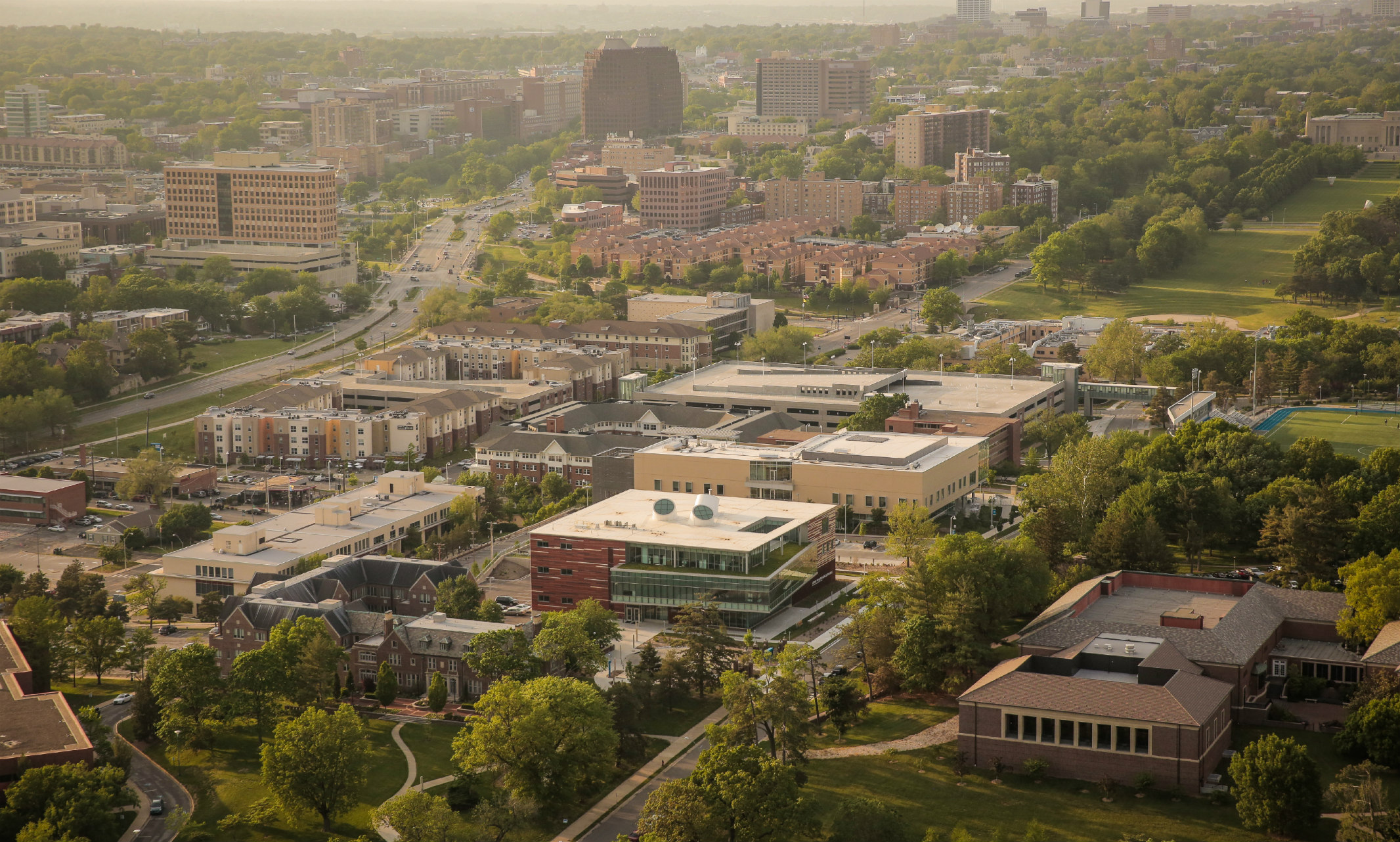
Fittingly, the significant gift will go toward campus renovations and construction
The Sunderland Foundation investment will benefit both UMKC campuses in Kansas City — Volker near the Country Club Plaza and Health Sciences next to Children’s Mercy and Truman Medical Centers — by improving classrooms, laboratories and spaces for research and student support.
“The Sunderland Foundation has been a supporter and advocate for UMKC for more than three decades,” Chancellor C. Mauli Agrawal said. “We are honored and excited that they continue to invest in our growth and recognize that improving the function of existing resources furthers the university’s ability to engage students and the community and support research and development of new technology.”
The Henry W. Bloch School of Management will receive $5 million for renovation and construction of the Bloch Heritage Hall, the original home of the Bloch School. While the state-of-the-art Bloch Executive Hall for Entrepreneurship and Innovation opened in 2013, Heritage Hall has not received an upgrade since 1986. Heritage Hall incorporates the original Tudor-style Shields Mansion, built at the turn of the 20th century, and an addition that was completed in 1986. The renovation and technology update will support advanced teaching methods and anticipated enrollment growth, bringing this essential space in line with UMKC’s commitment to providing students tools for their success.
University Libraries will receive $3 million for the renovation of the Miller Nichols Library third floor for a digital humanities and digital scholarship center, and in preparation for the relocation of the State Historical Society of Missouri, currently housed in Newcomb Hall. Beyond being a resource for students and faculty, the Miller Nichols Library is a recognized community resource for both historical enthusiasts and professional researchers. After the society raises an additional $3 million, the plan is to move the society's offices from Newcomb to the library next to the LaBudde Special Collections, enabling scholars and enthusiasts to optimize their research of the two rare collections on the third floor of the library.
The School of Law will receive $3 million for renovations to classrooms and student services. The school will celebrate its 125th anniversary in 2020, and is one of only six law schools to have educated a U.S. president (Harry Truman) and a Supreme Court justice (Charles Whittaker). Its interactive classrooms and student success suite are key components of student-focused education. Renovating 40-year-old classrooms to better accommodate the more interactive experience between professor and students will attract new students and improve current students’ learning.
The School of Dentistry will receive $2 million for renovations to the pre-clinic laboratory. Comprehensive dental care is shown to improve overall health and decrease risk of complications during dental procedures. The planned improvements will include replacing dated equipment with state-of-the-art technology that will enable simulation of patient care, proper exam positioning and clinical skills in an authentic learning environment.
The School of Computing and Engineering will receive $2 million for the renovation of Flarsheim Hall that will reconfigure existing space in conjunction with the completion of the new $20 million Robert W. Plaster Free Enterprise and Research Center, scheduled to be finished in 2020. In 2018, the Sunderland Foundation provided the lead gift on the center, which will be a significant addition to the community as well as the university and will include a virtual reality lab, a clean room and other state-of-the-art technologies.
The Sunderland Foundation was established in 1945 by Lester T. Sunderland, who served as president of Ash Grove Cement Company for 33 years. His grandson, Kent Sunderland, president of the UMKC Foundation, UMKC Trustee and former vice chairman of Ash Grove Cement, now serves as president of the Sunderland Foundation board of trustees. Since its inception the Sunderland Foundation has supported construction projects.
“We focus on capital funding because building was at the heart of our business when my family owned Ash Grove cement,” said Kent Sunderland. “We understand the value of buildings that work for people. Providing resources for organizations that enhance Kansas City is integral to our family’s foundation mission.”
Lisa Baronio, UMKC Foundation president and UMKC chief advancement officer, recognizes the significance of the investment in capital improvements as essential to student success.
“The Sunderland Foundation understands that one of the significant components of excellent education is state-of-the-art physical space, technology and equipment that allow our faculty, staff and students to perform at their highest levels. We are grateful and excited to make these buildings reflect the same high level of quality as our human capital.”
Jul 31, 2019
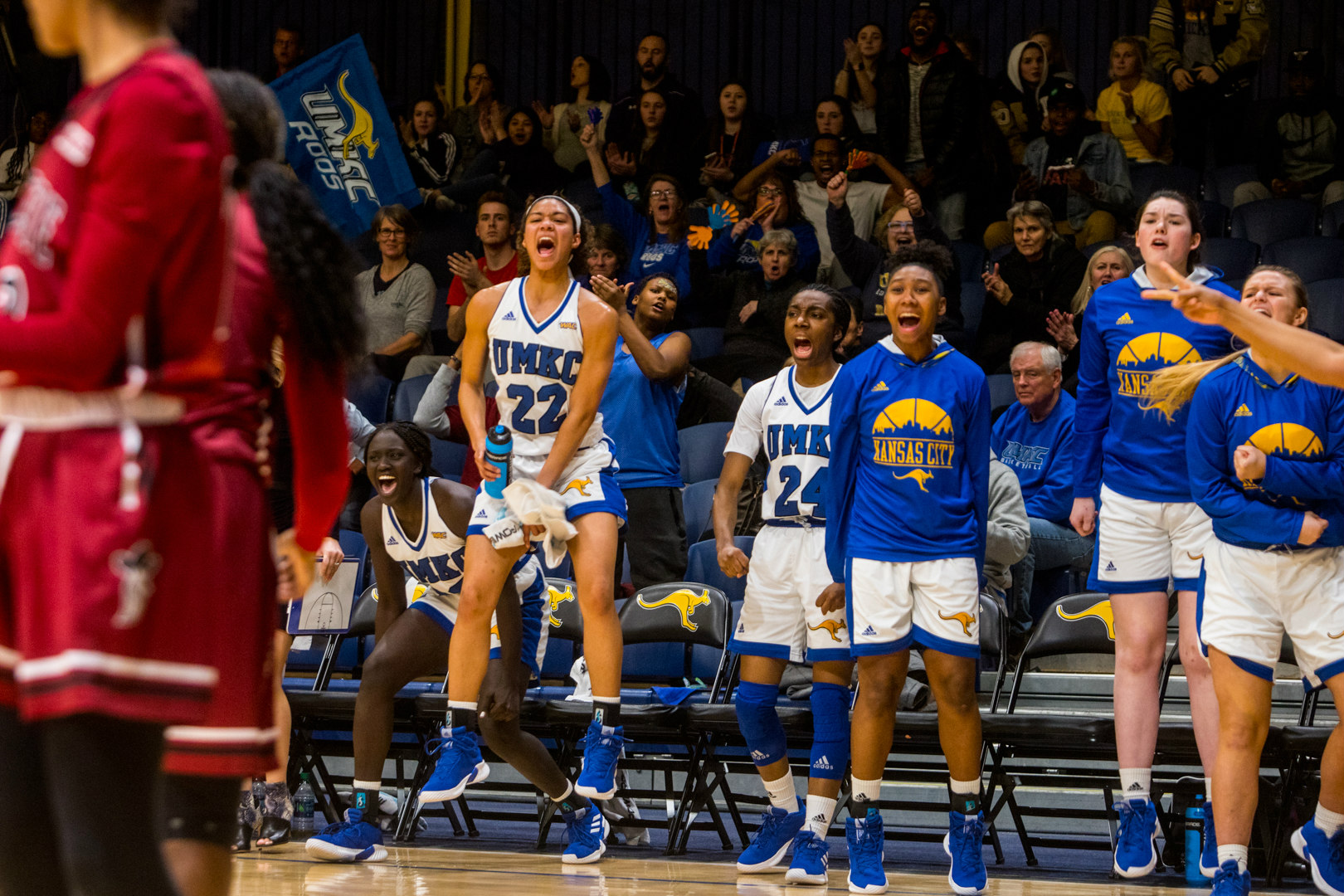
Donors honor father’s enthusiasm for the team with valuable support
The Breidenthal Foundation has committed $250,000 for a memorial gift to UMKC women’s basketball in honor of George Breidenthal, who was an avid sports fan. The gift is the largest in the women’s basketball team history.
“This gift will undoubtedly elevate the program and prepare us for excellence for years to come.” — Brandon Martin, Ph.D., director of UMKC Athletics
The donation will provide new opportunities for UMKC women’s basketball.
“The Breidenthals’ investment will help us tremendously,” said Jacie Hoyt, head coach of UMKC women’s basketball. “These resources will help take our program to new heights in areas such as team travel and facility upgrades.”
McKenzie Breidenthal and her brother Ben Breidenthal, who are Breidenthal Foundation co-presidents, are inspired by their late father. George Breidenthal was a community leader and avid sports fan, particularly for women’s college basketball in Kansas and Missouri.
“My dad’s giving was very heart-driven,” McKenzie said. “If he saw people in need and he felt he could make an impact – whether it was in education, in the community or on the court- he did so.”
The Breidenthals’ gift will make a significant difference for the women’s basketball team.
“This gift will undoubtedly elevate the program and prepare us for excellence for years to come,” said Brandon Martin, Ph.D., director of UMKC Athletics. “We are grateful to have the Breidenthals as members of our Roo family.”
In two short years as head coach Hoyt and her coaching staff have already had the most season wins in a decade. This gift from the Breidenthal Foundation will enable UMKC Athletics to improve experiences for both athletes and fans.
Jul 30, 2019
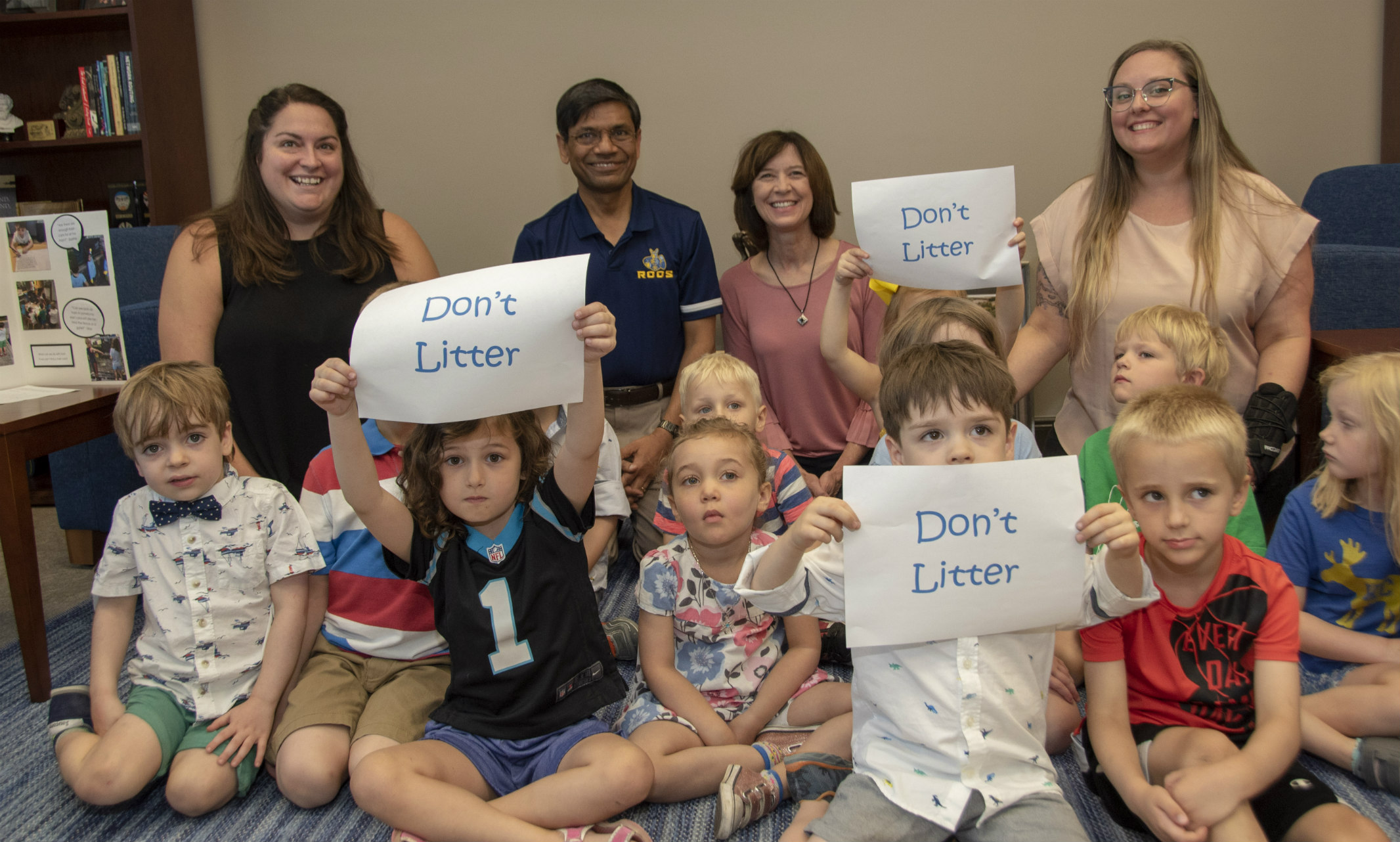
Berkley Center students’ message: ‘Don’t Litter’
When people hear about school children tackling social issues, many may not think of the children being preschool age. At the Edgar L. and Rheta A. Berkley Child and Family Development Center on the University of Missouri-Kansas City campus, preschool children learn valuable skills to become contributing citizens within the community.
The center, which celebrated its 25th anniversary in 2018, was developed by the UMKC School of Education and an interdisciplinary team of experts who designed the state-of-the-art early childhood program. The Berkley Center recently received high marks in an accreditation review for this project-based learning. Children at the Berkley Center have participated in many service projects, including a food drive in May.
A dozen children from a preschool classroom at the Berkley Center visited UMKC Chancellor Mauli Agrawal and his wife Sue to share their service project and ideas for litter improvement on the campus. Their message was “Don’t Litter.”
In late May, the children and their teachers found two birds tangled in plastic netting hanging from a bamboo structure. This inspired a conversation about how people and trash affect people in their environments. The next day when walking near the entrance to Cockefair Hall, the children noticed bits of the same netting they saw tangled around the birds and wanted to know where the trash came from. The children saw groundskeepers mowing over the same plastic netting that tangled the birds.
“At that moment the children were compelled to reach out to the groundskeepers and explain what happened to the birds,” said Polly Prendergast, senior director of programs/projects at the Berkley Center.
The groundskeepers talked to the children and explained the purpose of the netting, which is used to keep new grass in place. Back in the classroom, the children discussed what they saw and this sparked a long-term investigation, which is called project-based learning (PBL).
“Facilitated by the teachers the children launched a service project to take action with a problem they saw regarding litter and discarded landscaping material on campus,” said Asia Whisenhunt Brockman, senior child development teacher. Using a mind-map strategy to organize the children’s ideas, thoughts and questions, the teachers helped the children take notes about their experience and formulate a plan to implement it.
“They identified issues such as what they know about trash; why trash is not good for people, the environment and animals; ways to make sure trash fits in a can; and why trash may escape from a dumpster,” said Kelly McDonald, co-senior child development teacher. The children also interviewed a landscape contractor via a phone call and asked if there were safer materials for people to use that would not harm animals or people. The answer was yes, there is a biodegradable erosion control cloth made from cotton fibers.
“This is their service project – pretty cool for four and five year olds,” Prendergast said. The children named their team “UMKC Roo Litter Helpers.” Decked out in their personalized T-shirts, the children and their teachers regularly pick up trash around campus. But the service project didn’t end with that.
Their discussion with UMKC groundskeepers and activities for their classroom service project led the children to want to talk with someone in charge about other litter on campus. That led to the meeting with the chancellor, which included a presentation of their ideas July 25. The children asked the chancellor to help them communicate with the greater UMKC community about preventing littering on campus.
In return for their dedication to keeping the UMKC campus free from litter, Agrawal presented the children with a recycle bin that includes a “RooUp and Recycle” plaque thanking the Berkley Center children.
Jul 29, 2019
In Runner’s World, UMKC alumna Courtney Frerichs shared how she begins her days during training and competitions.
Courtney Frerichs, 26, has a thing for busting through — and leaping over — barriers. After establishing her dominance in the steeplechase at the University of Missouri-Kansas City and University of New Mexico, she joined the Bowerman Track Club (BTC), where she has become one of the best steeplechasers in the world alongside a talented team that includes fellow steeple star Colleen Quigley and distance powerhouse Shelby Houlihan. Read more.
Jul 29, 2019
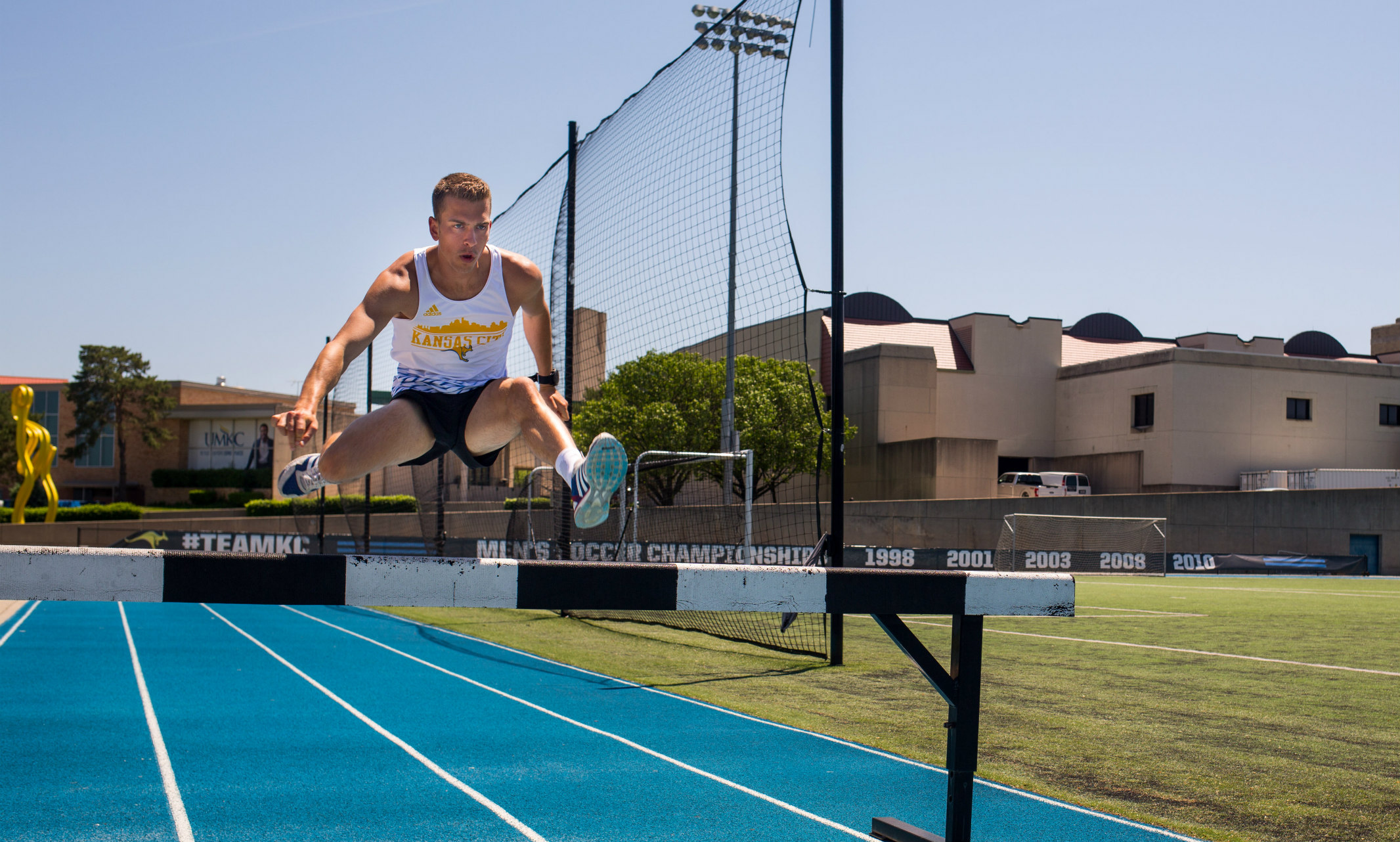
Student-athlete already has health career at Children’s Mercy
Get to know our people and you’ll know what UMKC is all about.
Bryce Miller ‘20 Hometown: Ashland, Wisconsin High School: Ashland High School Degree programs: Master's in Health Professions Education; Health Sciences ’18
Why did you choose UMKC?
I was recruited to compete for the cross country and track and field team and decided to make the 10 ½-hour trek down from my hometown in northern Wisconsin. Little did I know, I would become much more accustomed to making this drive, as I committed to attend UMKC shortly after my visit.
Initially, I was drawn in by the team culture, and was convinced that this could be a place for me to develop into a high-level athlete at the Division I level. I also liked the smaller campus feel paired with big city opportunity.
You’ve competed in the 2016 Olympic trials for steeplechase (which involves running, jumping over hurdles and a water trap) and are competing this summer, too, for the 2020 games. What got you started with the steeplechase?
I was originally a basketball player, and then competed in the Presidential Fitness competitions, and thought “hey, running is fun, and I’m pretty good at it”.
When I came to UMKC, I’d never run the steeplechase – the coach, James Butler, remembered my basketball background and thought I’d be good at it. This was the same coach who urged Courtney Frerichs (UMKC alumnus and 2016 Olympian) to run the steeplechase because of her gymnastics background.
Wow! That’s incredible. It sounds like you’ve had great coaching at UMKC.
There are past and current coaches/administrative personnel in UMKC Athletics who have influenced me to become a better version of myself. My current coach, Brett Guemmer, has been a role model, mentor and leader for me during the past three and a half years. He’s someone I admire and strive to replicate as I grow as a person. I'm not sure where I could be without him, but I sure am glad to be in the position I am right now, and I owe a lot to him and his level of care that he has shown to me and the other athletes that he works with.
Another person I admire at UMKC is Barb Bichelmeyer, provost and executive vice chancellor. I admire her ability to balance co-leading our university and maintaining relationships and connections with students such as myself. She has leadership characteristics and communication skills that we all could takes notes from.
Why did you choose health sciences?
I have always been terrible at answering the question, "What do you want to be when you grow up?" I started at UMKC as undecided and used the first semester to explore my interests and see how they fit into the educational pathways that UMKC had to offer. I ultimately decided on the Bachelor of Health Sciences program because it would prepare me for a variety of career paths: public health, health care or research. I was able to further refine my educational focus by adding minors in exercise science and business administration.
So, what are you doing now?
My unique mix of classes allowed me to secure an internship at Children's Mercy in my final semester of the health science program, and upon graduating, I accepted a position as a graduate assistant researcher on Children's Mercy Energy Balance Research team. After several months of work on healthy lifestyles initiatives and research on adolescent activity, appetite and metabolism, I decided to further my education at UMKC in the Master of Health Professions Education program. My interest for this education program was inspired by experiences with my teachers, colleagues, coaches, teammates and co-workers at UMKC and Children's Mercy.
How has your college program inspired you?
My education at UMKC has inspired me to make change in the Kansas City community! I now have a passion for preventative health, healthy lifestyles promotion and improving health outcomes in at-risk populations. The course work has opened my eyes to areas of health concern and also developed my leadership skills to use when addressing these areas of concern in the community.
Are you a first-generation college student?
No, but I am the first of my siblings to attend college. I have twin brothers who are five years younger than me, so paving the way for them to be successful in school and sports is something I continue to push for. At the beginning of this school year, my dream of growth alongside them in school and sport came true. They committed to attend UMKC and run on the track and cross country teams! I was then granted a sixth-year medical hardship extension waiver to use my final season of track and field eligibility. My younger brothers and I competed in outdoor track and field together this past season. Younger-older brother rivalry!
What’s the best piece of advice you have ever received from a professor?
A professor once told me that the best way to prove that you actually know something, is by learning to teach it. If you can teach a concept, you will remember that concept. I have since used this approach in training with teammates and educational instruction.
Which extracurricular activities are you involved in at UMKC (study abroad, student clubs, athletics, community volunteer opportunities,)?
I finished my final semester on the UMKC track and field team. The past five and a half years have allowed me to travel around the country while representing UMKC and developing into the best version of myself as an athlete. UMKC's resources, my coaches and my teammates have helped me become a two-time NCAA Division I All-American in the steeplechase, a nine-time Western Athletic Conference (WAC) Champion and a 10th place finisher at the 2016 Olympic Trials in the steeplechase. Additionally, the memories I am most fond of as a captain for the Roos, were during our back-to-back WAC Championships in cross country. These team accomplishments definitely bring me the most joy and satisfaction.
I have also been involved with the UMKC Student-Athletic Advisory Committee, the WAC Student-Athletic Advisory Committee, and the Mortar Board Honor Society. My favorite part of my commitment to these organizations has been the community outreach efforts carried out here in the city. I have been able to volunteer with more than 15 organizations over the past five years.
Have you had an internship? What did you learn?
I interned with the Weighing In team in the Center for Children's Healthy Lifestyles and Nutrition department of Children's Mercy. I gained experience in research, health promotion and preventative health education. I accepted a research position on the Energy Balance Research team, in the same department this summer and continue to work with the Weighing In team in communications.
What do you hope to take from your experiences at UMKC into your professional career?
During my undergraduate education and current master's degree classes, a common learning theme and area of personal development for me has been leadership. As a captain on the UMKC track and field and cross country teams for two years, these classes proved valuable for translating concepts into practice. As I've progressed further in health studies, my interest has drifted more into the leadership and teamwork aspects of healthcare.
What is one word that best describes you?
Dynamic. I am not afraid of change and I want to always strive for progress. As I've grown here at UMKC, so have my connections and responsibilities, making it difficult to balance them all. With constant adjustment—and advice from those around me—I've found ways to embrace challenges and opportunities. For me the most important key to continuing to be dynamic has been framing situations in a positive light and surrounding myself with like-minded people.
Read Other UMKC Stories About Mentorship
Jul 25, 2019
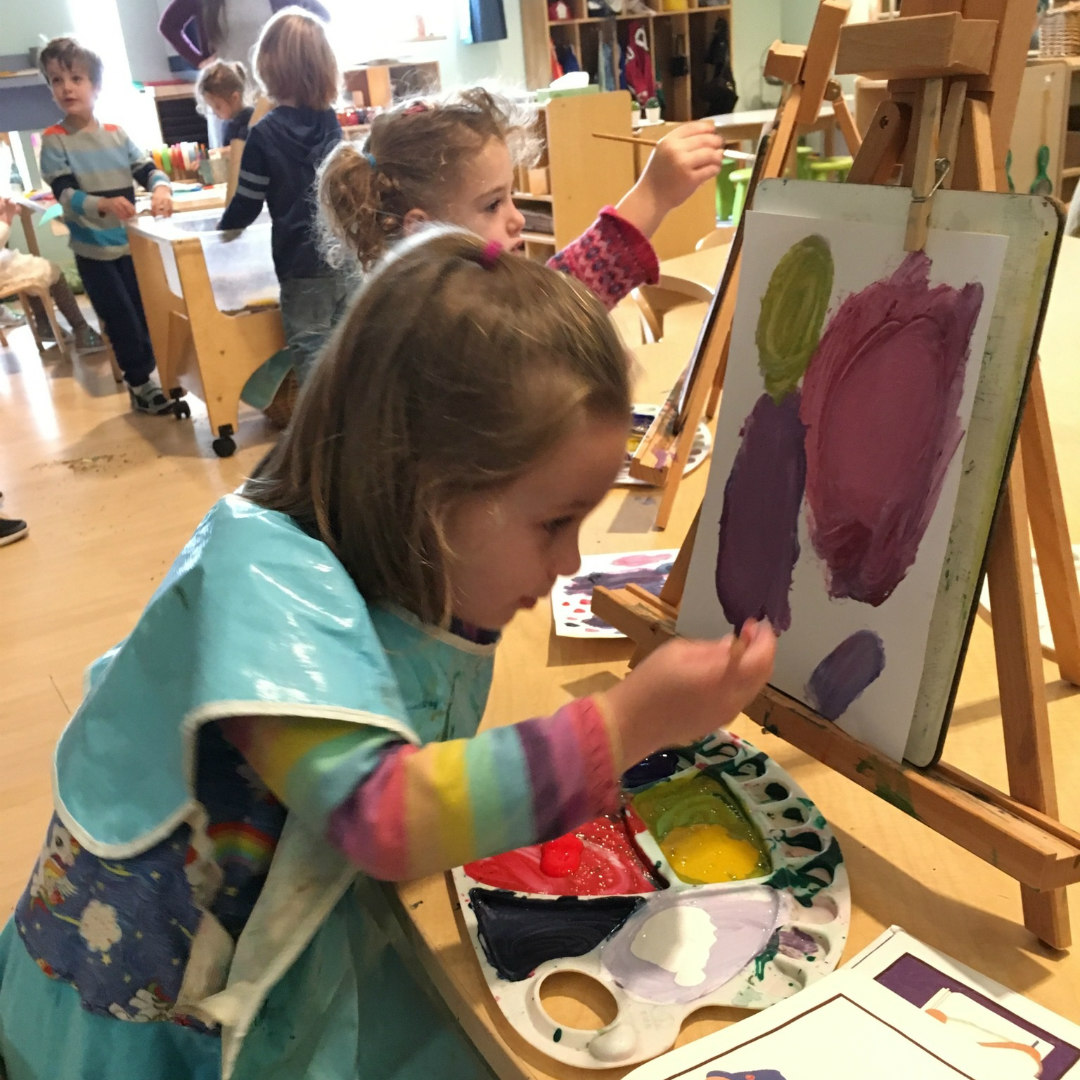
Children receive outstanding care and education at the UMKC Berkley Child Development Center
The Edgar L. and Rheta A. Berkley Child and Family Development Center at UMKC has received an outstanding assessment from the National Association of the Education of Young Children. The Center received high marks in each of the ten categories, with nine receiving 100%+ approval ratings.
Polly Prendergast, senior director of programs/projects at the Berkley Center, says the accreditation is significant for many reasons. Beyond being an unbiased measure of the quality of education, it is a valuable tool for people searching for high quality early education.
“NAEYC Accreditation helps parents find the best possible early childhood experience for their child. Also, it is a mark of quality for the teaching staff and administration,” Prendergast says. “Schools and organizations who voluntarily go through a rigorous accreditation process of evaluation are demonstrating their level of competence in a field and their commitment to providing the highest level of quality in early learning.”
“The faculty and staff at Berkley come to work every day with a passion to make change in these little people.” Katie Anton, parent
NAEYC assesses child care agencies in ten areas; relationships, curriculum, teaching, assessment of child progress, teachers, family and community, relationships, physical environment, leadership and management and health.
Prendergast and her colleagues were thrilled with their accreditation results.
“While we have received high scores consistently over the years, it is thrilling to know our hard work and continuing quality improvement is validated.”
The Berkley Center’s parents recognize and celebrate the faculty and staff’s commitment to excellence.
“The faculty and staff at Berkley come to work every day with a passion to make change in these little people,” Katie Anton, UMKC director of scholarships and Berkley parent says. “They are intentional in everything they do and strive daily to grow healthy minds and bodies.”
The University of Missouri–Kansas City Edgar L. and Rheta A. Berkley Child and Family Development Center was established in 1993. The UMKC School of Education and an interdisciplinary team of experts worked together to develop a state-of-the-art early childhood program.
Berkley is part of UMKC School of Education, and serves as a learning laboratory for early childhood students. As a NAEYC nationally accredited program, Berkley enrolls children of UMKC employees, students, and the community. We offer full day twelve month a year early care and education. Building an equal relationship between family, child, and teacher is a cornerstone of our philosophy.
Jul 24, 2019
Kansas City’s university awards seven for 2019
Isabelle Daab, a spring 2019 Francis Howell High School graduate, has been named a University of Missouri-Kansas City Trustees’ Scholar.
When Daab begins biology/pre-medicine studies at UMKC in the fall, she will receive a scholarship valued at $60,000 over four years. Her award is supported by the UMKC Board of Trustees, the founder of the scholarship program.
Daab was a member of the National Honor Society, HOSA-Future Health Professionals, Viking Leadership Academy, cross county and basketball. She worked at the Garden Villas of O’Fallon, completed A+ service hours at Meadows Parkway Early Childhood Center, volunteered with basketball camps, St. John’s Church of Christ and the Salvation Army.
In the essay submitted to the Trustees’ Scholars selection committee, Daab said she wants to help athletes with injuries.
“I hope to someday use my UMKC degree to begin a nationwide program that will be implemented within high schools and competitive sports clubs that will teach athletes knee injury prevention tactics in hopes of saving many young athletes from the tortuous experience of destroying their once healthy knees,” Daab said. “Obtaining a UMKC degree arms me with a background of undergraduate research and opportunities to develop connections with figures that have expertise in sports medicine.”
The Trustees’ Scholarship provides educational fees and on-campus room and board for the first two years. In the third and fourth years, the package provides educational fees and $2,000 for room and board. Each Trustees’ Scholar also receives $500 toward books each year. To qualify as Trustees’ Scholars, students must meet at least two of the following three criteria: score a minimum ACT Composite of 30, rank in the top five percent of the graduating class, or have a cumulative grade point average of 3.5 or more in a 17-class core curriculum. Trustees’ Scholars must enroll full time, be seeking an undergraduate degree and commit to living on campus for the first two years.
The UMKC Trustees’ Scholars Program is unique in that it aligns students closely with corporate sponsors, who give students access to their professional knowledge and experience, insight into the inner workings of the company or institution they represent, and a strong mentor relationship throughout the college experience. Students have opportunities to network and find internships or jobs through the Trustees and their connections in the community.
The UMKC Board of Trustees is a non-profit organization established by civic and community leaders to support the University. Members advocate on the University's behalf, provide community feedback and forge partnerships to help the University achieve its strategic priorities and financial objectives.
Jul 24, 2019
Kansas City’s university awards seven for 2019
Lanisha Stevens, a spring 2019 McCluer North High School graduate, has been named a University of Missouri-Kansas City Trustees’ Scholar.
When Stevens begins psychology studies at UMKC in the fall, she will receive a scholarship valued at $60,000 over four years. Her award is supported by the UMKC Board of Trustees, the founder of the scholarship program.
Stevens was vice president of Rhoer Club, Sigma Chapter, Sigma Gamma Rho Sorority; member of the Principal’s Student Advisory Council; and president of the youth division of Restoration House Community Church. She was inducted into the National Honor Society, an all-state finalist in the string orchestra, member of the National Spanish Honor Society, McCluer North Stars “A” Honor Roll student, St. Louis Post-Dispatch “A” Honor Roll student and a student-athlete.
Stevens was awarded the McCluer North Celebration of Excellence-Middlebury College Memorial Book Award in 2018. She was an A+ tutor and volunteer for the Police Athletic League and McCluer North Special Olympics.
In the essay submitted to the Trustees’ Scholars selection committee, Stevens said she wants to serve as a voice for people who have a mental illness by becoming a counseling psychologist.
“My future career goals of studying psychology and going on to a graduate degree program in counseling will be cultivated in the psychology department at UMKC”, Stevens said. “Working with faculty that are dedicated toward the field of mental health across disciplines is exciting.”
The Trustees’ Scholarship provides educational fees and on-campus room and board for the first two years. In the third and fourth years, the package provides educational fees and $2,000 for room and board. Each Trustees’ Scholar also receives $500 toward books each year. To qualify as Trustees’ Scholars, students must meet at least two of the following three criteria: score a minimum ACT Composite of 30, rank in the top five percent of the graduating class, or have a cumulative grade point average of 3.5 or more in a 17-class core curriculum. Trustees’ Scholars must enroll full time, be seeking an undergraduate degree and commit to living on campus for the first two years.
The UMKC Trustees’ Scholars Program is unique in that it aligns students closely with corporate sponsors, who give students access to their professional knowledge and experience, insight into the inner workings of the company or institution they represent, and a strong mentor relationship throughout the college experience. Students have opportunities to network and find internships or jobs through the Trustees and their connections in the community.
The UMKC Board of Trustees is a non-profit organization established by civic and community leaders to support the University. Members advocate on the University's behalf, provide community feedback and forge partnerships to help the University achieve its strategic priorities and financial objectives.
Jul 24, 2019
Kansas City’s university awards seven for 2019
Nikita Joshi, a spring 2019 Blue Valley High School graduate, has been named a University of Missouri-Kansas City Trustees’ Scholar.
When Joshi begins history studies at UMKC in the fall, she will receive a scholarship valued at $60,000 over four years. Her award is supported by the UMKC Board of Trustees, the founder of the scholarship program.
Joshi was a member of the National Speech & Debate Association, National Honor Society; and was a Blue Valley High School Social Studies Scholar honoree and Kansas Honor Scholar.
Joshi worked at Kumon Math and Reading Education Center as a tutor and was a volunteer for March for our Lives and Eastern Kansas VA. Her extracurricular activities included the Blue Valley Young Progressives Club, UNICEF Club and was a mentor for the incoming freshman class at her high school.
In the essay submitted to the Trustees’ Scholars selection committee, Joshi said she wants to share her passions with people and spark action to create something better for the future.
“With an education from UMKC, I know I would get the personal attention I need in order to become a truly well-rounded individual and compelling champion of changes,” Joshi said. “Whether I choose to become a filmmaker documenting the stories of Syrian refugees, an environmental lawyer for the World Wildlife Fund or a congresswoman, I know that UMKC will help me develop the skills I need in order to leave my mark on the world.”
The Trustees’ Scholarship provides educational fees and on-campus room and board for the first two years. In the third and fourth years, the package provides educational fees and $2,000 for room and board. Each Trustees’ Scholar also receives $500 toward books each year. To qualify as Trustees’ Scholars, students must meet at least two of the following three criteria: score a minimum ACT Composite of 30, rank in the top five percent of the graduating class, or have a cumulative grade point average of 3.5 or more in a 17-class core curriculum. Trustees’ Scholars must enroll full time, be seeking an undergraduate degree and commit to living on campus for the first two years.
The UMKC Trustees’ Scholars Program is unique in that it aligns students closely with corporate sponsors, who give students access to their professional knowledge and experience, insight into the inner workings of the company or institution they represent, and a strong mentor relationship throughout the college experience. Students have opportunities to network and find internships or jobs through the Trustees and their connections in the community.
The UMKC Board of Trustees is a non-profit organization established by civic and community leaders to support the University. Members advocate on the University's behalf, provide community feedback and forge partnerships to help the University achieve its strategic priorities and financial objectives.
Jul 24, 2019
Jill James Hoffman's U.S. Naval career took her from UMKC Law to Italy and California — and wine entrepreneurship
Jill James Hoffman has lived a life of discovery, from her time at UMKC School of Law to practicing law around the globe with the U.S. Navy’s Judge Advocate General’s Corps (JAG) to becoming a California entrepreneur.
Today, Hoffman (B.A. ’86, J.D. ’89) runs Qorkz Wine (pronounced “corks”), an e-commerce platform connecting wine lovers with a network of small producers. She still practices with the Naval Reserve JAG, and makes time for skiing at Lake Tahoe, sailing on San Francisco Bay and serving on the Sausalito City Council. Hoffman, who grew up in Liberty, Missouri, spent some time with us recounting her journey.
What drew you to UMKC?
I spent my first two years of college in a small town, and I missed living near a large city. UMKC was/is a great school and allowed me to return to Kansas City. It was kind of a no-brainer — I could go to a wonderful university, live on the Plaza and go to a great school in a lovely urban environment. After undergrad, I was lucky enough to be admitted to UMKC School of Law, so I stayed. My reasoning was that attending law school in Kansas City would afford me greater opportunities for summer clerkships and creating contacts during my time in law school than in the smaller towns where MU and KU schools of law were located, which turned out to be true.
How did you end up in the Navy?
I always wanted to practice litigation, specifically criminal law. The appealing thing about the U.S. Navy Judge Advocate General’s Corps was that I could practice criminal litigation anywhere in the world with my Missouri bar license. Acceptance was competitive and has become even more so since then; however, I was accepted and was commissioned as an ensign. I reported for active duty after taking and passing the Missouri Bar. I completed three active duty tours: two years at Naval Legal Service Office, Treasure Island, San Francisco; two years at Naval Support Activity, Naples, Italy; and my last active duty tour was at Naval Legal Service Office West, San Francisco. Since I left active duty, I have been in the Reserves. My specialty is as a litigator in the Military Justice Pillar of our Reserve community.
What was your introduction to wine?
I really became interested in wine when I was stationed in Naples for two years in the early 1990s. In addition to a fascinating and exciting litigation practice all over Europe and the Middle East, I tasted a lot of excellent locally produced wine. For the first time, I really experienced good food and good wine as an everyday experience. Restaurant meals included the option of the “vino da tavola” (table wine), which we almost always chose.
How did you make the leap into the wine industry?
When I returned to San Francisco, which had been my first duty station, I began exploring the California offerings in earnest. At the same time, I became fascinated as an attorney by the regulatory challenges of the small producers, who were of the greatest interest to me, probably stemming from my time in Italy when we tasted such great wine produced by the restaurant owners or other local vintners in small quantities. At the time, there was the explosion of the internet as a sales channel for direct-to-consumer sales and a gradual opening of direct sales to states other than California, through two or three U.S. Supreme Court cases. The small producers were a growing and largely underserved community with regard to legal services that specialized in that area of law. I started doing more outreach to that community of small winemakers about seven to eight years ago. The idea for Qorkz Wine as an e-commerce platform to help facilitate the direct-to-consumer sales channel for the 5,000+ small producers evolved from there. I left the law firm at the end of 2014 to start Qorkz Wine.
"As an entrepreneur, I see the value in not just the business proposition of a successful and profitable venture, but how this effort can support and maintain an important part of the California wine industry." — Jill James Hoffman
What's the appeal for you in running this business?
The appeal is seeing the opportunity and challenge to enable the small producers to access the direct-to-consumer sales channel, which from a business perspective is their best and most profitable channel, but also the most underutilized. It is a constant and challenging but exciting puzzle every day. As an entrepreneur, I see the value in not just the business proposition of a successful and profitable venture, but how this effort can support and maintain an important part of the California wine industry.
How is your UMKC education relevant in your life today?
The habits instilled by a law degree come into play every day. Almost every effort I am involved in somehow references back to the legal perspective, from working and developing Qorkz Wine and my Naval Reserve work, to volunteer efforts with my son’s schools, on the Sausalito City Council or other volunteer efforts. My experience has been that as an attorney, particularly a litigator, I become a source of empowerment and ability for whatever effort in which I engage. These organizational and analytical skills, as well as the basic Midwestern Kansas City work ethic, integrity, toughness and grit, are embedded in my DNA.
This article was featured in Res Ipsa, the UMKC School of Law alumni magazine.
Jul 24, 2019
Kansas City’s university awards seven for 2019
Gavin Ott, a spring 2019 Saint Pius X High School graduate, has been named a University of Missouri-Kansas City Trustees’ Scholar.
When Ott begins business administration studies at UMKC in the fall, he will receive a scholarship valued at $60,000 over four years. His award is supported by the UMKC Board of Trustees, the founder of the scholarship program.
Ott was a member of Students Against Destructive Decisions, Vincit Christus (Christ Conquers), the Business Club, Student Council, Interact Club Youth Rotary and was a student-athlete. Ott is an Eagle Scout; and was a National Merit Commended Scholar, Missouri Bright Flight Scholar and KC Junior Scholar.
Ott was a team lead for Eighteen Ninety event space; and worked at Centurion Moving and Storage and St. Therese North School.
In the essay submitted to the Trustees’ Scholars selection committee, Ott said he believes a degree from UMKC would help him become successful.
“I full-heartedly believe in the limitless possibilities a UMKC education will provide me, and accordingly, the vastness to which I will be able to give back to educating our young community, our future leaders and pioneers,” Ott said.
The Trustees’ Scholarship provides educational fees and on-campus room and board for the first two years. In the third and fourth years, the package provides educational fees and $2,000 for room and board. Each Trustees’ Scholar also receives $500 toward books each year. To qualify as Trustees’ Scholars, students must meet at least two of the following three criteria: score a minimum ACT Composite of 30, rank in the top five percent of the graduating class, or have a cumulative grade point average of 3.5 or more in a 17-class core curriculum. Trustees’ Scholars must enroll full time, be seeking an undergraduate degree and commit to living on campus for the first two years.
The UMKC Trustees’ Scholars Program is unique in that it aligns students closely with corporate sponsors, who give students access to their professional knowledge and experience, insight into the inner workings of the company or institution they represent, and a strong mentor relationship throughout the college experience. Students have opportunities to network and find internships or jobs through the Trustees and their connections in the community.
The UMKC Board of Trustees is a non-profit organization established by civic and community leaders to support the University. Members advocate on the University's behalf, provide community feedback and forge partnerships to help the University achieve its strategic priorities and financial objectives.
Jul 24, 2019
Kansas City’s university awards seven for 2019
Tia Kahwaji, a spring 2019 Lee’s Summit North High School graduate, has been named a University of Missouri-Kansas City Trustees’ Scholar.
When Kahwaji begins biology/pre-dental studies at UMKC in the fall, she will receive a scholarship valued at $60,000 over four years. Her award is supported by the UMKC Board of Trustees, the founder of the scholarship program.
Kahwaji was a member of the National Honor Society, French Club, French Honor Society, Speech and Debate, youth government, orchestra and the tennis team. She was in the top one percent of her class, was math student of the year for three years, Questbridge College Prep Scholar, Questbridge National College Match finalist and KC Scholars award recipient. She also tutored elementary school students.
Kahwaji worked at Applebee’s; volunteered six hours a week for a local dentist; gave free tennis lessons to low-income elementary students; volunteered at Coldwater, an organization that provides food and resources to families in need; and participated in a biyearly cleanup program.
In the essay submitted to the Trustees’ Scholars selection committee, Kahwaji said she believes a degree from UMKC will help her achieve her dreams.
“Coupled with my passion for biology is my desire to help others,” Kahwaji said. “I strive to be a catalyst for change in low income and minority communities in Kansas City. With my degree, I can cultivate change through volunteering in places where dental care is not as easily accessible by the people.”
The Trustees’ Scholarship provides educational fees and on-campus room and board for the first two years. In the third and fourth years, the package provides educational fees and $2,000 for room and board. Each Trustees’ Scholar also receives $500 toward books each year. To qualify as Trustees’ Scholars, students must meet at least two of the following three criteria: score a minimum ACT Composite of 30, rank in the top five percent of the graduating class, or have a cumulative grade point average of 3.5 or more in a 17-class core curriculum. Trustees’ Scholars must enroll full time, be seeking an undergraduate degree and commit to living on campus for the first two years.
The UMKC Trustees’ Scholars Program is unique in that it aligns students closely with corporate sponsors, who give students access to their professional knowledge and experience, insight into the inner workings of the company or institution they represent, and a strong mentor relationship throughout the college experience. Students have opportunities to network and find internships or jobs through the Trustees and their connections in the community.
The UMKC Board of Trustees is a non-profit organization established by civic and community leaders to support the University. Members advocate on the University's behalf, provide community feedback and forge partnerships to help the University achieve its strategic priorities and financial objectives.
Jul 24, 2019
Kansas City’s university awards seven for 2019
Taylor Hamilton, a spring 2019 Battle High School graduate, has been named a University of Missouri-Kansas City Trustees’ Scholar.
When Hamilton begins nursing studies at UMKC in the fall, she will receive a scholarship valued at $60,000 over four years. Her award is supported by the UMKC Board of Trustees, the founder of the scholarship program.
Hamilton was a member Student Council, track and field, A+ Program, HOSA-Future Health Professionals and Science Club. She was on the “A” honor roll 2015-2018; was named Panera Associate of the Year in 2018; received the Science Department Choice Award in 2016; was an all-state track and field athlete in 2016; received the Spartan Excellence Award in 2016 and 2017; and received the Principal’s Award in 2016 and 2017.
Hamilton worked at Panera Bread Company and was a clinical student at the Lenoir Woods Nursing Home in Columbia, Missouri.
In the essay submitted to the Trustees’ Scholars selection committee, Hamilton said she plans to obtain a degree in nursing from UMKC and further her education to become a physician’s assistant.
“Working as a physician assistant with a medical degree from UMKC, I will have the opportunity to shape the future of health policies,” Hamilton said. “Further, I will educate people so they can remain healthy or regain their health.”
The Trustees’ Scholarship provides educational fees and on-campus room and board for the first two years. In the third and fourth years, the package provides educational fees and $2,000 for room and board. Each Trustees’ Scholar also receives $500 toward books each year. To qualify as Trustees’ Scholars, students must meet at least two of the following three criteria: score a minimum ACT Composite of 30, rank in the top five percent of the graduating class, or have a cumulative grade point average of 3.5 or more in a 17-class core curriculum. Trustees’ Scholars must enroll full time, be seeking an undergraduate degree and commit to living on campus for the first two years.
The UMKC Trustees’ Scholars Program is unique in that it aligns students closely with corporate sponsors, who give students access to their professional knowledge and experience, insight into the inner workings of the company or institution they represent, and a strong mentor relationship throughout the college experience. Students have opportunities to network and find internships or jobs through the Trustees and their connections in the community.
The UMKC Board of Trustees is a non-profit organization established by civic and community leaders to support the University. Members advocate on the University's behalf, provide community feedback and forge partnerships to help the University achieve its strategic priorities and financial objectives.
Jul 24, 2019
Kansas City’s university awards seven for 2019
Sofia Martinez, a spring 2019 Olathe North High School graduate, has been named a University of Missouri-Kansas City Trustees’ Scholar.
When Martinez begins philosophy studies at UMKC in the fall, she will receive a scholarship valued at $60,000 over four years. Her award is supported by the UMKC Board of Trustees, the founder of the scholarship program.
Martinez was a member of the Diversity Student Council, Eagle Service Club, Hispanic Leadership Club, Lowrider Bike Club, Latina Leadership, Leadership Olathe, Mock Trial, Student Council, Relay for Life, marching band, symphonic band and wind ensemble.
Martinez was on the honor roll 2015-2018, was a Questbridge finalist in 2018, Hispanic Heritage Month Student in 2017, and received the Gold Presidential Award for community service 2015 through 2017. She was a member of the Good Shepherd choir; and volunteered for the Good Shepherd Quince retreat and Saturday scholars.
In the essay submitted to the Trustees’ Scholars selection committee, Martinez said she has learned to be resilient and charitable.
“With the help of people at UMKC, I hope to become an immigration lawyer and help build a bridge for people like me,” Martinez said. “As a philosophy major, I would be able to use what I know as I pursue a law degree. As I continue down this path of self-discovery, I know that UMKC can provide an environment where I can really establish my role in helping my community.”
The Trustees’ Scholarship provides educational fees and on-campus room and board for the first two years. In the third and fourth years, the package provides educational fees and $2,000 for room and board. Each Trustees’ Scholar also receives $500 toward books each year. To qualify as Trustees’ Scholars, students must meet at least two of the following three criteria: score a minimum ACT Composite of 30, rank in the top five percent of the graduating class, or have a cumulative grade point average of 3.5 or more in a 17-class core curriculum. Trustees’ Scholars must enroll full time, be seeking an undergraduate degree and commit to living on campus for the first two years.
The UMKC Trustees’ Scholars Program is unique in that it aligns students closely with corporate sponsors, who give students access to their professional knowledge and experience, insight into the inner workings of the company or institution they represent, and a strong mentor relationship throughout the college experience. Students have opportunities to network and find internships or jobs through the Trustees and their connections in the community.
The UMKC Board of Trustees is a non-profit organization established by civic and community leaders to support the University. Members advocate on the University's behalf, provide community feedback and forge partnerships to help the University achieve its strategic priorities and financial objectives.
Jul 24, 2019
Government Technology recently featured a collaboration between the city and UMKC
The article in Government Technology features the "The Abandoned to Vacant project," led by UMKC Professors James DeLisle and Brent Never of the Henry W. Bloch School of Management. Read more.
Jul 24, 2019
School of Computing and Engineering grad helped design the parachute system for the Mars 2020 mission
John Bazin (B.S. '15, M.S. '16) spoke with us about his job designing the parachute for the Mars 2020 rover mission's spacecraft.
Tell us about your current position.
I am a design engineer at Airborne Systems in Santa Ana, California. I design and develop aerodynamic decelerators for a number of government organizations. I have been working on the Mars 2020 Rover Parachute system for the past year.
How did you end up working on the Mars 2020 parachute system?
Not a lot of people have experience designing or working with parachutes in the engineering community. I worked with parachutes with Dr. Travis Fields at UMKC. I used to do drop tests in the atrium in Flarsheim Hall. I was fortunate enough to win a student paper competition and have a paper on parachutes published. I met one of the supervisors at Airborne Systems at the conference I went to where I was presenting that paper.
Having the research experience and a master's degree set me apart from the rest of the group. That, combined with good communications skills, are the reasons I believe I was chosen to work on the program.
Did you have to learn about Mars in order to work on the parachute system? For example, how does a parachute deploy differently in Earth's atmosphere compared to Mars'?
Yes, there was a lot of research and work that I had to do to prepare myself for the program. I did this research on work time and was given about a week to learn what I needed to so that I could immediately start contributing. The learning never stops though, that was just the amount of time they gave me to get as familiar as I could with the system before I started doing work.
Mars' atmosphere is more than twice as thin as Earth's atmosphere. It has just enough density that you have to deal with it, otherwise it will destroy the spacecraft. Our parachute deploys at more than twice the speed of sound. It is about 60 feet in diameter and deploys in less than 0.5 seconds. These harsh conditions require it to be incredibly strong. The parachute we have developed and tested so is the biggest and strongest supersonic parachute that has ever been built.
What is a typical day at work like for you?
It's hard to know what I'm going to be working on past a week or two. Tasks change priority and things come up all the time that you have to be able to adapt to. I would say though it's about 80 percent desk work and 20 percent field work, which is nice.
I got to go to the largest wind tunnel in the world and see our parachute deployed under rigorous test conditions. After the test was over, the wind speed was lowered to about 20 miles per hour and we were allowed to walk around the tunnel with the parachute inflated. It was by far the most amazing and spectacular thing I have ever seen in my life.
To learn more about the Mars 2020 mission, visit mars.nasa.gov/mars2020.
Jul 18, 2019
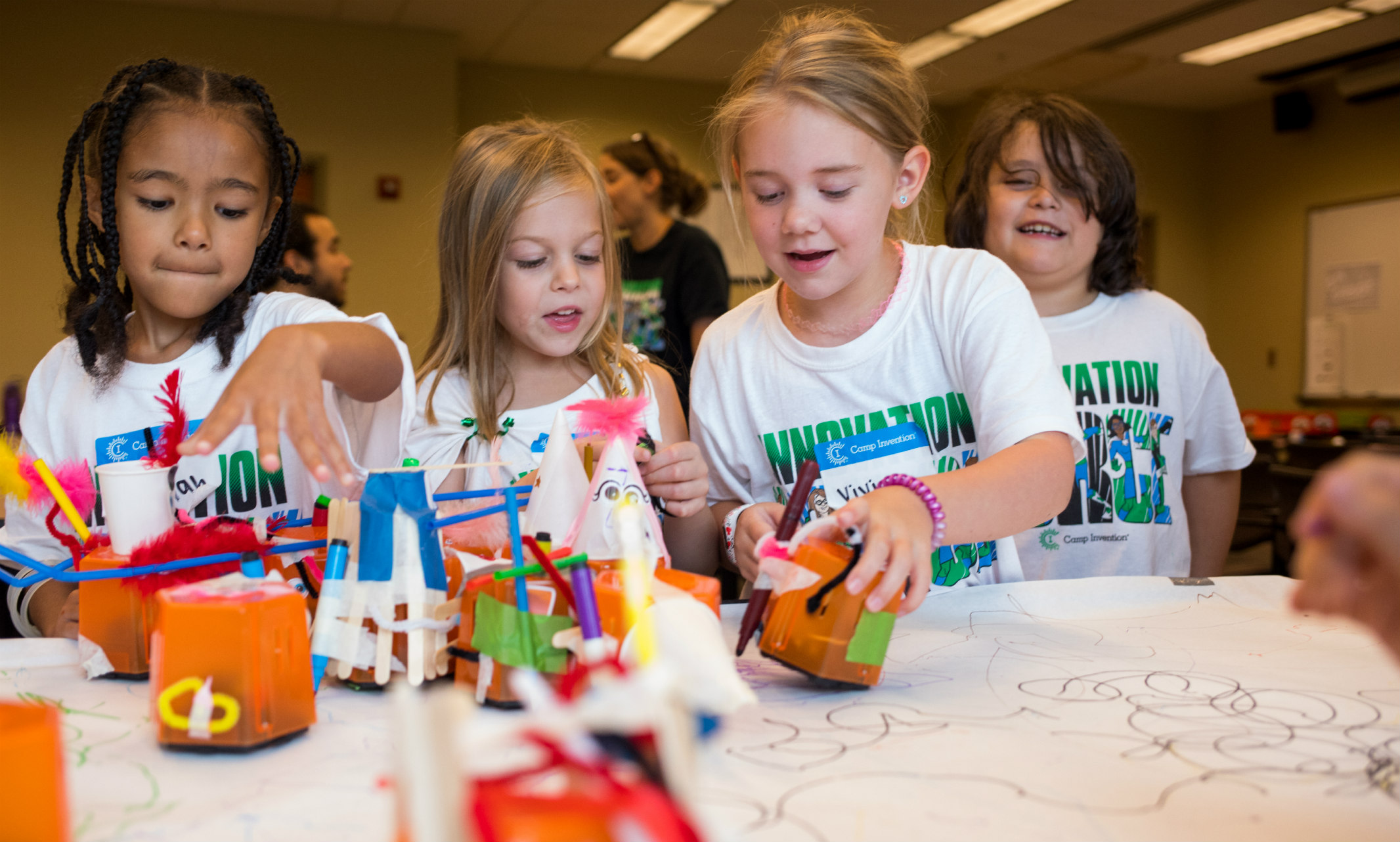
School of Computing and Engineering Expands Access to STEM Through Summer Camps
What happens when 57 curious kindergarten through sixth grade students visit campus for one week? They turn their curiosity into innovation. At least that's what happened this summer when children from across the Greater Kansas City area spent a week at UMKC participating in a new day camp experience, Camp Invention, at the School of Computing and Engineering.
An extension of the National Inventors Hall of Fame in Alexandria, Virginia, Camp Invention is a national program designed to keep kids engaged and help them build skills for the future. Throughout the week, these junior inventors work through activities that help them see ideas through from concept to creation while learning problem-solving collaboration, creativity and, of course, STEM. The theme for this year was “Supercharged.”
“This year, through our partnership with Google Fiber, we were able to provide scholarships for students who otherwise wouldn’t be able to afford to attend the camp,” said assistant dean Marjory Eisenman. That also helped to diversify the group and ensure that all kids were welcome to participate without having to worry about cost.
“We had to make things to throw hay into a box!” said Elise, explaining her favorite activity of the week.
Campers took on four challenges during camp that allowed them to use their imagination for creative problem solving:
Farm Tech: Children manage their own farm as they learn the basics of running a business.
Deep Sea Mystery: Using lessons and advice from Hall of Fame Inductees, children work in teams to invent island-survival tools and underwater equipment and navigate their way back home.
Innovation Force: children create a device to retrieve the stolen ideas, they learn about the importance of collaboration and patents.
DIY Orbot: Children explore frequency, circuit boards, motors and gears as they use real tools to reverse engineer a remote-controlled DIY Orbot, which is the students’ personalized version of a small bot.
The 57 campers were led through the activities by a combination of local teachers, SCE students and seventh- through ninth-grade youth who served as classroom instructors, interns and leaders in training.
“Getting students to help out with the camp sells the kids on UMKC or, at the very least, studying STEM,” said Eisenman.
Camp Invention is just one way the SCE works to expand access to STEM. The school also hosted a biomechanical camp for high school students this summer and worked with 15 students on measuring the force of impacts on the musculoskeletal system, operating the school’s motion capture lab and high-tech equipment for 3D printing and bone analysis.
SCE also offers year-round youth activities through its affiliate organization KC STEM Alliance, a collaborative network of educators, business partners and organizations that inspires interest in Science, Technology, Engineering and Math careers to generate a robust workforce of related professionals for our community.
Get Involved With The SCE
Jul 18, 2019
College of Arts and Sciences graduate Ally Kateusz's research is presented in the National Catholic Reporter.
Ally Kateusz has found artifacts that depict women at the church altar in "three of the most important churches in Christendom."
Jul 15, 2019
Topeka Capital-Journal reports on partnership between KU and UMKC Computing and Engineering professors.
A research team led by a KU faculty member earned a $1.4 million grant from the National Science Foundation to improve technology skills of women leaving prison and hungry for skills useful in landing a job or continuing their education. The KU team will collaborate with Baek-Young Choi and Sejun Song, associate professors in the School of Computing and Engineering.
Jul 11, 2019
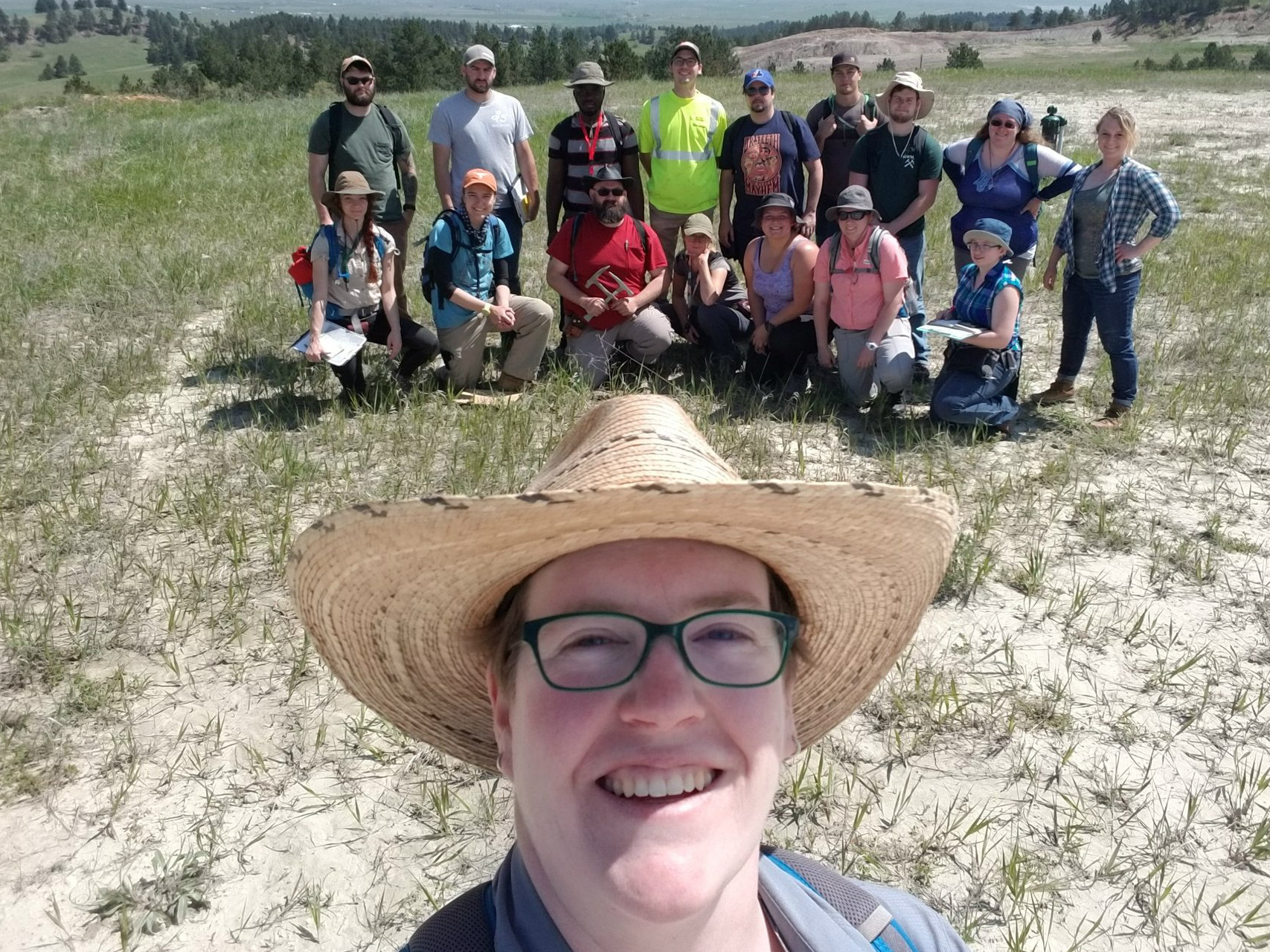
NPR showcases UMKC geosciences undergrads who attended summer workshop
Summer can be a busy time for university faculty members, especially field scientists. They often spend weeks getting up close and personal with their chosen research subjects.
As an assistant professor in the UMKC Department of Geosciences, Alison Graettinger is a big proponent of taking students into the field to get this firsthand experience. Last summer, she took several students to study volcanic eruption simulations in Buffalo, New York.
Volcanoes can be difficult and often dangerous test subjects. The simulation workshop was an exciting opportunity for volcanologists to get together and study rapid-fire eruptions in a safe environment for the first time. A recent article by NPR documented the exciting work that took place at this workshop. Accompanying Graettinger were undergraduate students Julia Boyd and Sierra McCollum as well as graduate student Kadie Bennis.
So what do students get to do in the field and why is it important for students to have these experiences?
At the simulation workshop, both Boyd and McCollum performed meaningful analysis. Boyd measured the shape of the craters created by the explosions because it can be used to better understand explosion histories. McCollum participated in an experiment with re-melted lava to research the kinds of particles formed during eruptions.
“Field experiences can shape a student’s future career. Exposing students to different, world class scientists all conducting different research allows students to see just how open their options are. It blows their mind how much is out there.” -Alison Graettinger
Upcoming field experiments are allowing students Alex Bearden and Joseph Nolan to build off previous student work. Bearden and Nolan have plans to travel to Diamond Craters in Oregon to conduct a drone study of crater sizes. Their work will directly benefit from the measurement techniques Boyd analyzed at the simulation workshop.
Last year, another student, Emma Reynolds, traveled to Idaho to study particles ejected in a 4-million-year-old explosion. Reynolds is another student taking part in field research with Graettinger this summer.
At field camp, Graettinger gives students a broad introduction to geology, allowing them to experience many different facets of geological research. Adding to the student experience is learning how immersive field research is and how different that is from what students experience in a classroom. Graettinger said a typical day out in the field includes a full day of hands-on work, which then becomes the main topic of discussion over dinner. The ever-present focus on research allows more time for questions and provides an environment of constant discovery and learning.
“Field experiences can shape a student’s future career,” Graettinger said. “Exposing students to different, world class scientists all conducting different research allows students to see just how open their options are. It blows their mind how much is out there.”
One of Graettinger’s most valuable pieces of advice is to sample everything. She thinks it is important that students get the opportunity to experience new things and meet people that they wouldn’t otherwise meet in their classrooms, noting that these encounters can ultimately change their lives.
Learn More About Student Research Opportunities
Jul 09, 2019
Max Skidmore on KCUR's Up To Date
Curators' Distinguished Professor of political science and Thomas Jefferson Fellow, Max Skidmore, was on KCUR's Up To Date to discuss American patriotism through the years.
Jul 08, 2019
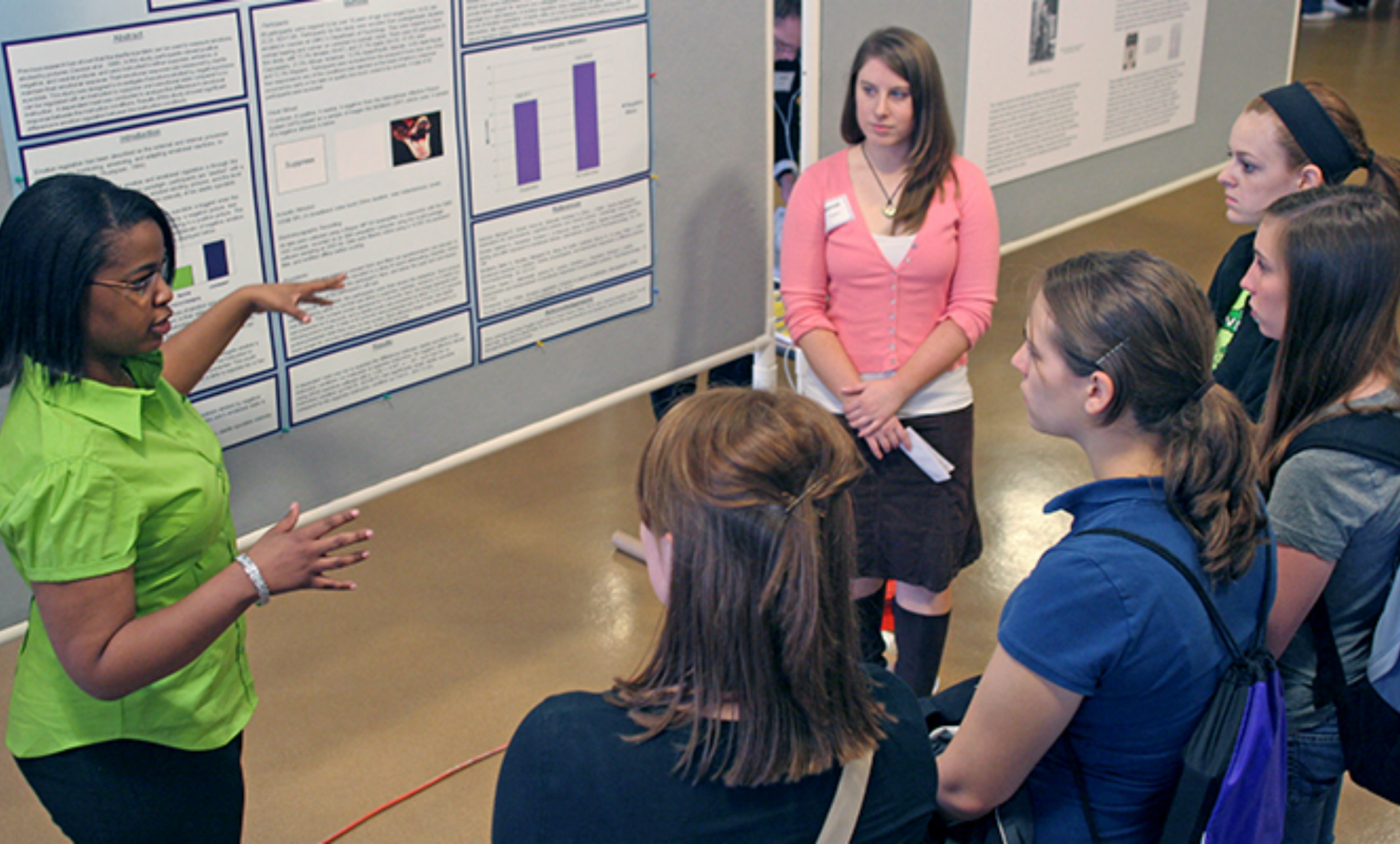
How to find the right research topic and support
Research isn’t solely for faculty and graduate students. At UMKC, undergraduates have researched the evolution of galaxies, helped develop more environmentally-friendly formulas for concrete, and studied the effects of disrupted sleep on the stress levels of college students.
UMKC encourages undergraduate students to conduct research as a key element of their bachelor’s degree program. It can play a critical role in gaining hands-on experience in your field of study, learning to think creatively and develop problem solving skills, gaining an understanding of research methods and ethics, and exploring potential careers. And as an undergraduate, you can do abroad, apply for undergraduate research and national fellowships, and earn academic credit for individual research and creative projects.
Here’s a step-by-step guide to launching your undergraduate research project:
1. Decide on your research area of interest.
What stimulates your curiosity? What do you enjoy reading and learning about? What questions do you have that don’t seem to have answers — yet? Look for faculty (see Step Two) who have explored similar topics or ideas, can help steer you in a productive direction and help you focus on something that is doable in one or two semesters of part-time research.
“Don’t be afraid to research a topic you don’t fully understand,” says Joseph Allen, an experienced undergraduate researcher majoring in biology and chemistry. “As long as you go in with an open mindset and are willing to put in the work required to achieve understanding, who knows what fascinating things may result?”
A good way to get a feel for undergraduate research is to explore EUReka! Courses (Experiences in Undergraduate Research). EUReka classes are offered in disciplines and departments from across the university. Students can search for EUReka classes in Pathway as an "attribute" of any section of a course.
2. Find a faculty mentor.
If you know a faculty member with experience in your field of interest, send them an email or catch them during office hours. If you don't have someone in mind, browse this list of undergraduate research contacts for suggestions. You can also browse the undergraduate research database to find faculty who share your interests. It includes faculty profiles as well as more specific information about their research projects and artistic endeavors.
“Find articles written by the faculty member you’re interested in, especially ones related to their current research, and thoroughly read them,” Allen advises. “It is so beneficial to walk into a conversation with a faculty member and be able to pull out copies of their articles, highlighted with notes in the margins, and ask questions about what they are working on.”
3. Ask for money to fund your research: Complete a SEARCH or SUROP application.
SEARCH grants (Students Engaged in the Arts and Research) provide up to $1,250 in reimbursable research expenses undertaken during the academic year; SUROP grants (Summer Undergraduate Research Opportunity) provide students with a $2,000 tuition grant and cover reimbursable expenses (up to $1,250) for projects undertaken during the summer session. You can complete your SEARCH or SUROP application online.
The extensive opportunities – and support – for undergraduate research really set UMKC apart. It’s up to you to take the initiative to make it happen. If you’re willing to put in the time and effort, it’s a great way to add value to your undergraduate experience.
Jul 05, 2019
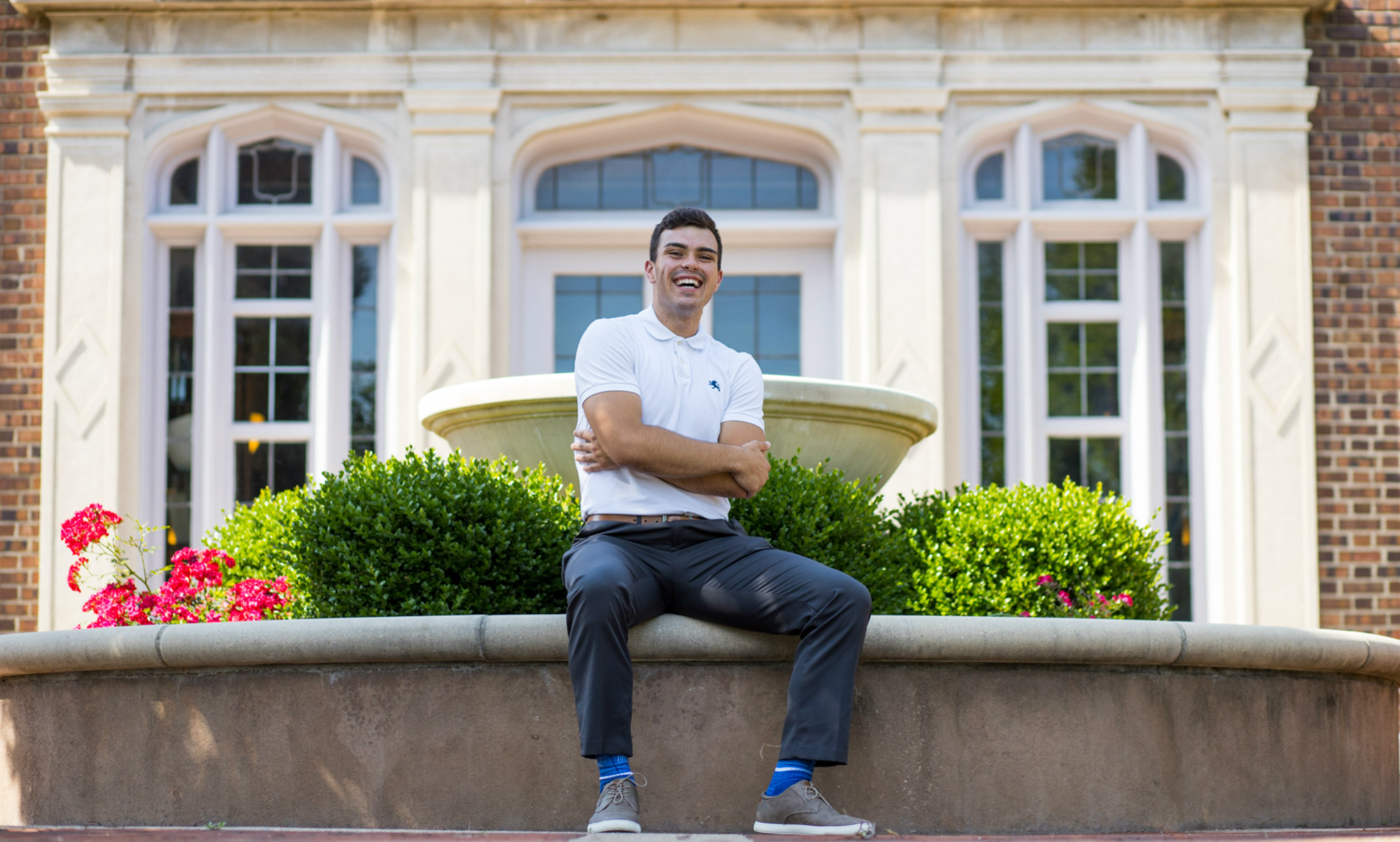
Trae Tucker has experienced connections through involvement and internships
Get to know our people and you'll know what UMKC is all about.
Trae Tucker, '20 Hometown: St. James, Missouri High School: St. James High School Degree programs: Business Management and Communications
Why did you choose UMKC?
I chose UMKC because it gave me a place where I could be my true self. In high school, when I hadn't come out of the closet yet. I wanted to be who I was. I looked up gay-friendly colleges in the U.S., and UMKC came up. I was like, hey, that's in Missouri! I think I found my home.
Why did you choose your field of study?
The reason I chose my field of studies is because my father owns a family business back in my hometown, and while growing up I knew that business was just something I gravitate towards. And I love talking to people, and I wanted to learn deeper on how to effectively have good conversations that I can implement into my field of work.
What do you like about the business and communications programs?
Hands down the connections that you can establish through the Bloch School are profound. However, with that being said, you have to be willing to put yourself out there and introduce yourself to those connections. The resources are there, but you have to willing to reach out to grasp the opportunities.
As for the communication degree, it is funny, but the biggest benefit that I have had would be learning how to effectively listen because that is such a big factor in being a great communicator. I remember starting in the program and I was too much of an active extrovert to really listen when spoken to and I learned that you miss so much when you aren't effectively listening to the one speaking to you.
My programs have inspired me to really reach for my goals and aspirations. I think that the environment you are in plays an extremely important role when getting your degree. If you aren't being told that you can reach your goals, you won't fully believe in yourself. The support you get in programs at UMKC is amazing and imperative when looking for a place to foster your ambitions and goals.
Since entering college, what have you learned about yourself?
Coming to college has opened my eyes to a more worldly view. College has also taught me to learn to be okay with entering into uncomfortable situations because it is in those moments when the most personal growth happens. For example, it isn't comfy to give a speech in front of hundreds of people, but after accepting and entering into that uncomfortable situation, I have grown and found a further belief in myself and what I can do and accomplish.
What do you admire most at UMKC?
I admire all of the amazing and loving people that I have met while in college. College is such a melting pot of different people with different views and I could not be more thankful for that. I am constantly being challenged on my views and what I believe in and a lot of the times it gives me a broader perspective on life and how people live in the world. I think that is such a valuable lesson to learn for any person both in and not in college.
What extracurricular activities are you involved in at UMKC?
I am involved in a range of things here at UMKC such as sitting as the president of the LGBT Affairs Council, formal chair for my fraternity Sigma Alpha Epsilon, resident assistant in Oak Street Hall, an ambassador for the Bloch School and intramurals here on campus: volleyball and basketball. I love all of these organizations and they all have played a part of making my college experience great!
Do you have any scholarships?
LGBT Leadership Scholarship: this award means the absolute most to me because it helps me feel welcomed and included in such a diverse community. It also gives others like me - a member of the LGBTQIA community - a chance to learn and enjoy college with less of a financial stress.
Resident Life Assistant Scholarship: this is also a near and dear scholarship to me because it allows me to have free room/board and meal plan. Without that, it would be 100 times harder living at UMKC. Res Life is absolutely amazing, and I love working for them.
Bloch Student Ambassador Scholarship: this is a great scholarship where I get to meet new and prospective students wanting to come to UMKC. The best part is I get to give my personal experience, and get to meet people from all over the United States.
Have you had any internships?
Yes, I have worked in New York City in TriBeCa with a PR firm called Bollare where I worked on the events team. The biggest thing that I learned while interning with Bollare was how to work effectively and efficiently. It is a very fast-paced environment, and it pushed me to new limits that I am extremely happy to have learned about myself.
I also have interned in Los Angeles in Hollywood where I was a resident director for a company called Dream Careers. This is where we had students from around the world who wanted internships in L.A. My job was to help these students get acclimated into L.A. so they knew where the closest pharmacy, stores, etc. were. Also, if there were housing issues, I would directly assist in resolving those problems. We also took the students on different adventures around L.A. For example, going to a Dodgers baseball game and taking a weekend trip to Las Vegas. I learned a lot about myself at this internship, too. Specifically that age is just a number, and even if you are a younger person working in a "big boy/girl" position, if you are talented enough to do the job, then you can do it.
What do you hope to take from your experiences at UMKC into your professional career?
I hope overall I can take the things I have learned here, specifically how to work effectively in groups, and bring that into my professional career. Like it or not, we are moving more and more towards group work, and I have learned to love working in groups and how to communicate to have an effective group.
Jul 05, 2019
Experienced Pharm.D. Alan Carter answer questions in Healthline about Type 2 Diabetes
Alan Carter, Pharm.D. and 2019 UMKC School of Pharmacy Alumni Achievement Awardee, answers questions for Healthline about managing Type 2 Diabetes and side effects.
Jul 03, 2019
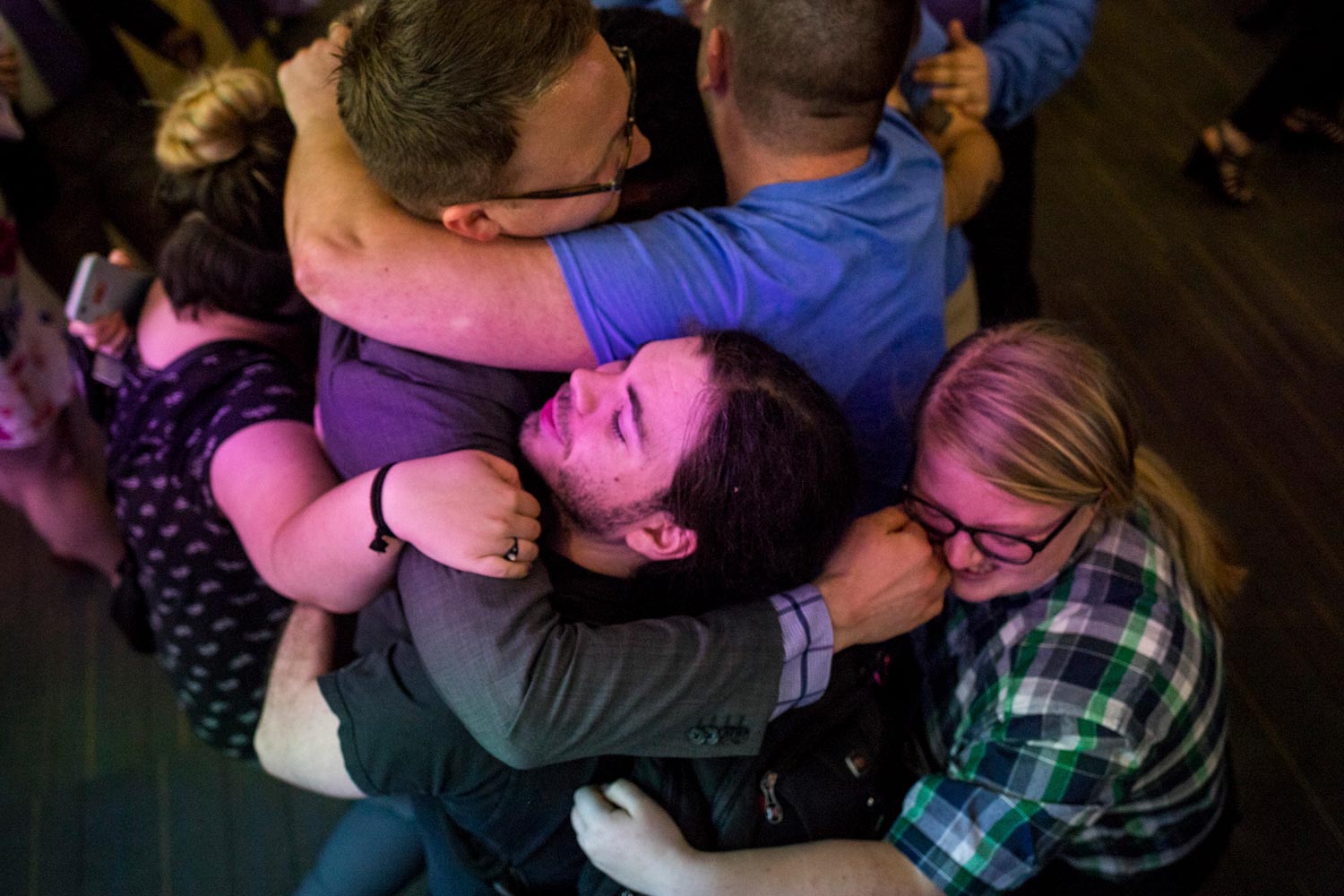
A guide to some of the ways we work to create an inclusive and affirming campus
This introductory (and non-exhaustive) guide is just the beginning! Find more LGBTQIA+ resources and programs online, on social media, via email or stop by the Rainbow Lounge (more on that below!).
Rainbow Lounge
This is the official LGBTQIA resource space at UMKC. The Rainbow Lounge (located on the third floor of the Student Union) is intended as a welcoming space for students, regardless of sexual or gender diversity and expression. Affectionately referred to as our LGBTQIA living room, students can find literature, recreational opportunities and lounge space for, about and by the UMKC LGBTQIA student community.
Students looking for a virtual way to get connected with others before school starts can join our UMKC LGBTQIA Discord Server.
Students gather in the Rainbow Lounge, the official UMKC LGBTQIA resource space.
Gender-Inclusive Housing
Gender-inclusive housing is available in all UMKC residence halls. Students may request to live alone, with another person or a group.
Preferred Name Policy
UMKC acknowledges that many students use names other than their legal name to identify themselves. Although a chosen/preferred name doesn’t change your official name in educational records (financial aid, transcripts, etc.), it will be displayed in the Pathway student center, Pathway class roster and grade roster. Additionally, a preferred name may be used to change your student ID and displayed in other university maintained software applications such as Canvas.
2018 UMKC Ally photo
Scholarships
UMKC has a number of scholarship opportunities for LGBTQIA+ students, including our Empowerment Fund, created to support students who experience loss of financial support from their family after coming out.
Other scholarships include:
College of Arts and Sciences LGBTQIA Scholarship
LGBTQIA Leadership Scholarship (deadline for incoming students is July 1)
LGBTQIA Emergency Grant
Student Organizations
Our student organizations reflect the interests of our students and include:
LGBTQIA Health District Alliance
Pride Alliance
LGBTQIA Student Affairs Council
UMKC School of Law OUTLaws
UMKC Trans+
Additionally, be sure to check out upcoming events that help us reflect on the history and culture of LGBTQIA+ people, as well as highlighting current issues facing our communities, including LGBTQIA Pride Month, Lavender Graduation and the Pride Lecture Series.
Jul 02, 2019
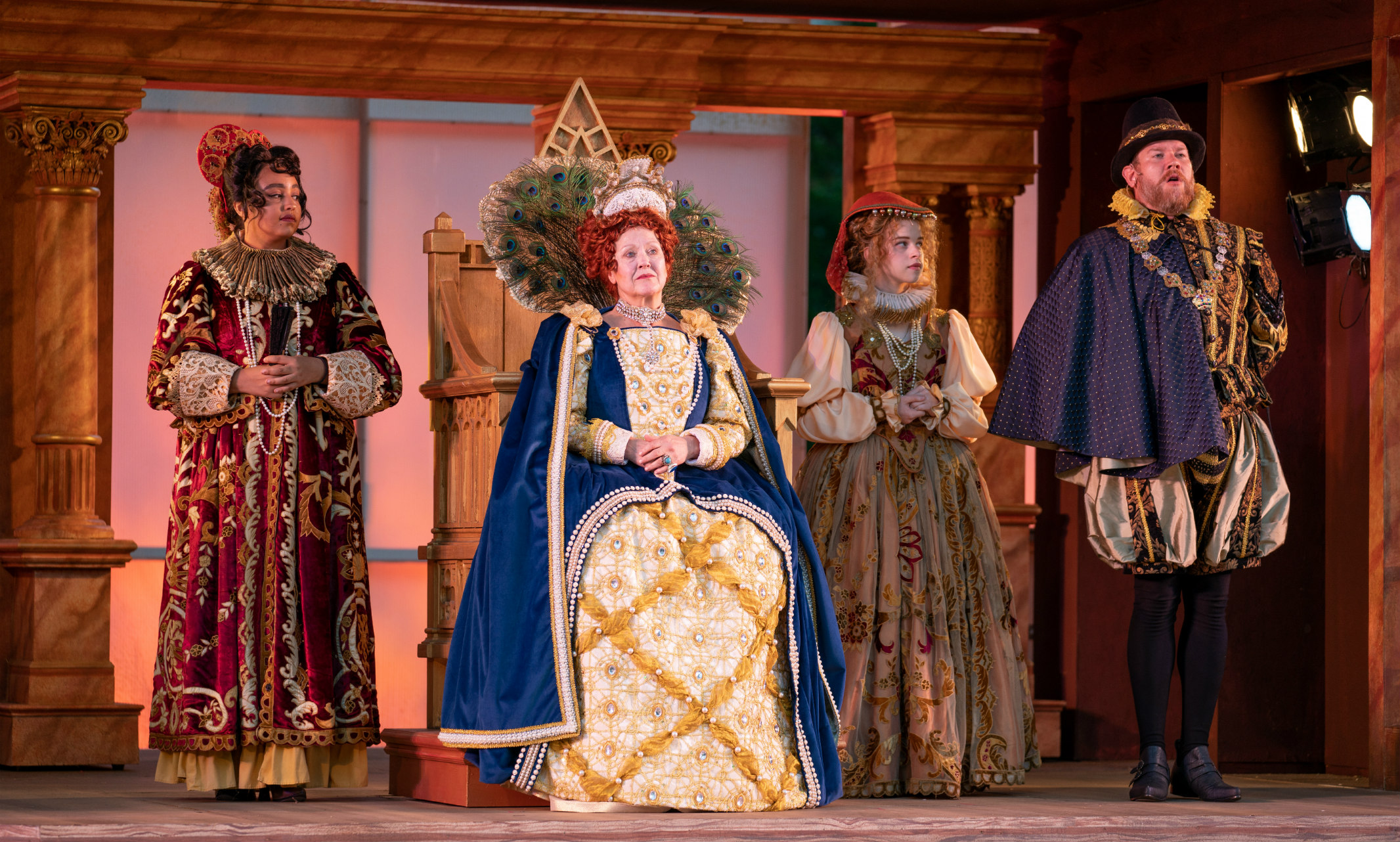
Theatre alumni and students help produce the Heart of America Shakespeare Festival's 33rd production
A recent In Kansas City article about the Heart of America Shakespeare Festival got us thinking: How many UMKC students and alumni have had a hand in productions over the festival’s 27 seasons?
We reached out to Sidonie Garrett (B.L.A. '94), executive artistic director of the festival, to help us uncover the answer.
Her response? More than 1,000 Roos have helped with the festival’s 33 productions. More specifically, she estimates there have been around 270 onstage actors and musicians and 735 offstage folks, from technical directors to choreographers.
This year, for the first time, the Heart of America Shakespeare Festival’s production in the park is Shakespeare in Love, a play not written by the man himself but, instead, a fictional account of him writing Romeo and Juliet. We were lucky enough to go behind the scenes and shadow a few alumni to see what goes into putting on the festival’s newest and biggest production to date.
If you’ve attended Shakespeare in the park this year, you’ve likely passed by Katherine Gehrlein (pictured left, M.F.A. ’17), director of operations and community relations, and Mariah Roady (B.F.A. ’15), development and marketing associate. The two work together to ensure everyone is set before the gates open. They serve as run-of-house managers for the nearly 2,000 guests that come to see the play on any given night. Photo by Brandon Parigo.
Petey McGee (B.A. '17) plays Nol, Benvolio and Samson in Shakespeare in Love. Photo courtesy of Heart of America Shakespeare Festival.
Colin Fowler (pictured right, M.F.A. '19), assistant stage manager, readies the set by making a bed on the second level with production assistant Joy Covington. Photo by Brandon Parigo.
Afton Earp (M.F.A. '17), production stage manager, sets up her binder which includes lighting and sound cues for the entire performance. Photo by Brandon Parigo.
Actors Marianne McKenzie (pictured left, B.A. '15) and Matthew McAndrews, who received his theatre and law degrees from UMKC in 2012 and 2018, respectively. Photo courtesy of Heart of America Shakespeare Festival.
See Shakespeare in Love through July 7 at Southmoreland Park!
More information on the play
Jul 01, 2019
Stuart Hinds talks with KCTV5 about the momentum building to the event
On the anniversary of the Stonewall event, a pivotal moment in LGBTQ+ history, Stuart Hinds shared some of our region’s history and how it helped set the stage. KCTV5 interviewed him after he spoke at Unity Temple at the anniversary event. Hinds is the curator of special collections and archives at UMKC Libraries, which includes the Gay and Lesbian Archives of Mid-America. The mission of GLAMA is to collect, preserve, and make accessible the materials that reflect the histories of the LGBT communities of the Kansas City region.
Jun 29, 2019
Linwood Tauheed talks with Sputnik International
On this episode of The Critical Hour, Wilmer Leon is joined by Daniel Lazare, journalist and author and Linwood Tauheed, associate professor of economics at the University of Missouri-Kansas City as they discuss the most recent democratic debates.
Jun 29, 2019
Professor Barbara Pahud talks about vaccines with KCUR
Researchers peg those who reject all vaccines based on religion or other beliefs at just 1 to 3 % of the population, says Barbara Pahud, M.D., a specialist in infectious diseases at Children’s Mercy Hospital in Kansas City and an associate professor at University of Missouri-Kansas City. She was interviewed by KCUR for the story.
Jun 28, 2019
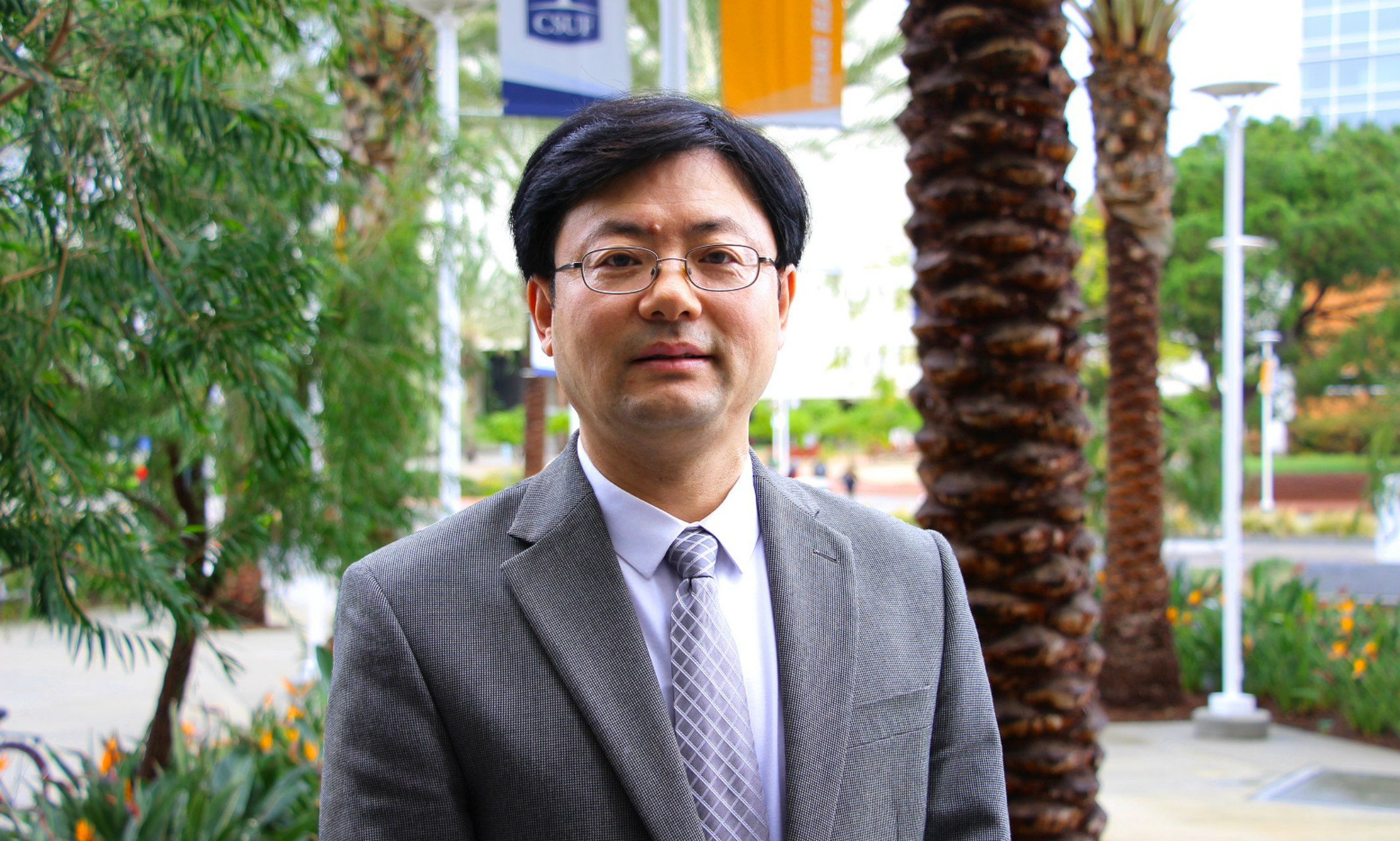
Yusheng (Chris) Liu’s career provides unique experience for research success
Following a national search, the University of Missouri-Kansas City has named Yusheng (Chris) Liu, Ph.D. as its new Vice Chancellor for Research.
Liu brings more than 20 years of experience in working for public research universities as an educator and chief research officer, and he also served as a program director at the National Science Foundation, based out of the Washington, D.C., area. He starts Aug. 1 in his new role at UMKC.
“With his stellar blend of leading research activity at a university, background in leadership at a federal research agency and experience as a faculty member and researcher, we are thrilled to welcome Dr. Liu to UMKC,” said UMKC Chancellor Mauli Agrawal. “He should be able to make an immediate impact in the top-priority work of expanding our research capabilities and elevating the research enterprise at UMKC.”
“I truly believe in the power of science, innovation, entrepreneurship, education and policy to change the world,” Liu said.
UMKC is the only public research university in greater Kansas City, and works in partnership with the community to solve its most important challenges through research-infused teaching, service and discovery activities. Liu will lead the way for UMKC to help accomplish aggressive research goals in science, technology and the humanities. The strategic plan includes a goal to double annual research grants from $29.2 million in 2018 to $60 million by 2028.
“UMKC research makes a significant impact, and we look forward to working with Dr. Liu in growing our initiatives and taking our work to an even higher level,” said UMKC Provost and Executive Vice Chancellor Barbara Bichelmeyer. “His leadership will infuse our discovery enterprise with renewed energy and an expanded scope that will benefit our students, faculty, staff and our community.”
Liu most recently served as associate vice president for research at California State University, Fullerton, the largest of the 23 campuses in the Cal State system, where he was a tenured professor. He managed operations for the Office of Research and Sponsored Projects, working closely with research center directors, faculty, deans, chairs and community business partners to promote research and innovation. In addition, Liu administered two annual grants programs to enhance both STEM and non-STEM research, teaching and creative activities.
“I truly believe in the power of science, innovation, entrepreneurship, education and policy to change the world,” Liu said. “UMKC, with its dynamic new chancellor and outstanding faculty and staff, has the potential to become a global resource for addressing our most significant challenges.”
Jun 27, 2019
UMKC SGA president talks about career aspirations and coming out in college
Justice Horn describes himself as “African American, Caucasian, Polynesian and Native American, Christian and openly gay.” The student body president of the University of Missouri-Kansas City first gained prominence coming out as an openly gay wrestler at his previous college, Northern State University in South Dakota. Outsports interviewed Horn about his experiences as an LGBTQ+ athlete as well as his career aspirations.
Jun 26, 2019
Quinlan Moll qualifies at race in Minnesota
Next year, we could very well see a former UMKC distance runner competing on the world stage for Team USA. Fox4KC interviewed Quinlan Moll, who recently qualified for the U.S. Olympic Marathon Trials. He is a former Roo athlete and is currently studying law at UMKC and working at a metro law firm. UMKC Athletics also talked to Moll about this major achievement: "Crossing the finish line was a pretty amazing feeling, I was tired from the race but also pumped up from adrenaline and excitement. It was a special moment, so I tried to just soak it in."
Jun 26, 2019
Mike Perry to take leadership of KC-based company
For only the second time in the company’s history, it will be led by someone not part of the founding family. Perry has been with Hallmark for 30 years, having previously served as the president of Hallmark Greetings and the president and CEO of Crayola, part of Hallmark’s portfolio of businesses. The story was covered by the Kansas City Star and the Kansas City Business Journal.
Jun 26, 2019
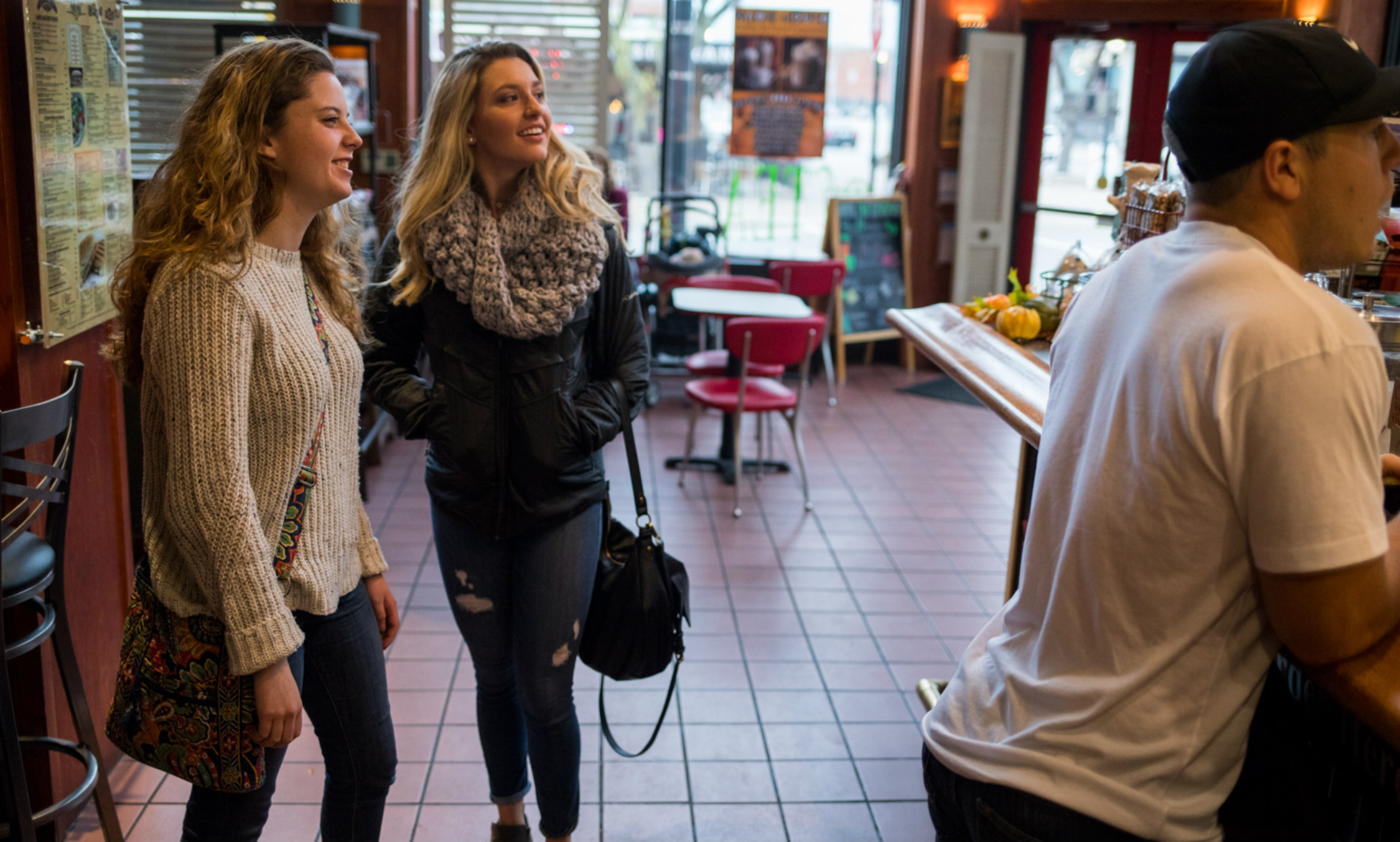
Your guide to smart financial planning
Oh, the joys of coming to college! You’ve been waiting for this time to experience what this "adulting" business is all about. For many students, college is the first time you’ll be on your own. That means you’ll be making your own decisions — including financial ones — without your parents’ input. Here are a few tips to help you navigate the college budgeting landscape and avoid common pitfalls.
Managing College Costs
Students often forget that the cost of college is more than just tuition and books. You’re going to need notebooks for class, a new laptop, dorm decorations, a parking pass and more.
Keep track of your expenses so that you know what’s coming up. It’s best to try to plan for everything and limit the amount of surprises that may surface. That way you have the funds to cover any expenses your financial aid does not.
If your class schedule allows, work part-time when you’re in college. Especially, if you can land a job on or near campus. If you need something to wear to your interview, check out the Professional Wardrobe Program for interview and professional attire.
Student discounts are too good to pass up! There are a variety of spots both on campus and around town that offer student discounts. You can also use Roo Bucks at select off-campus locations, so don’t lose your ID. It can come in handy.
Budgeting and Saving
If you learn to budget now, you’ll be set for the future. Budgeting helps manage your finances and guide your spending.
Keep a track of your spending patterns, and do a monthly assessment of what you’re spending money on so you can make adjustments accordingly. To record your spending, use a pen and paper, a spreadsheet, or a free app.
It’s better to overestimate your expenses and underestimate your income. This helps create some cushion so you’ll always have a little left over after bills and other obligations.
If you get a financial aid refund, don’t spend it. Put it back into your savings account for a rainy day.
Always comparison shop so that you can get the best prices and best value. There are apps on your phone that will price compare for you.
Build a semester budget. A budget is your own personal money plan. At the start of each academic year, use your financial aid award letter, tuition bill, and bank statements to estimate your income and expenses for the semester. If you have more expenses than income, look for ways to cut back on spending or to increase your income. Once you’ve set your budget, start tracking your income and spending in order to reach your goals, grow your savings and avoid unnecessary debt.
Credit Cards
If you use them wisely, credit cards can actually help you build your credit. Before you apply for a card, think carefully about how you plan to use it and whether you have the income necessary to pay your balance in full.
Keep these things in mind if you’re looking to apply for a credit card:
Get one card with a low APR rate.
Never spend more than you can afford to pay back.
Keep track of your expenses.
Think before you use. Do you really have to charge it or would another payment method work just as well?
If you get a credit card offer in the mail, don’t feel obligated to accept it.
On-Campus Resources to Help
Budget documents are living and should be constantly reevaluated. As things change over time, feel free to make updates. If you need help getting started, the Financial Wellness Center offers free, one-on-one budgeting sessions as well as budgeting templates and additional tools and resources to help start your journey toward financial wellness.
Jun 24, 2019
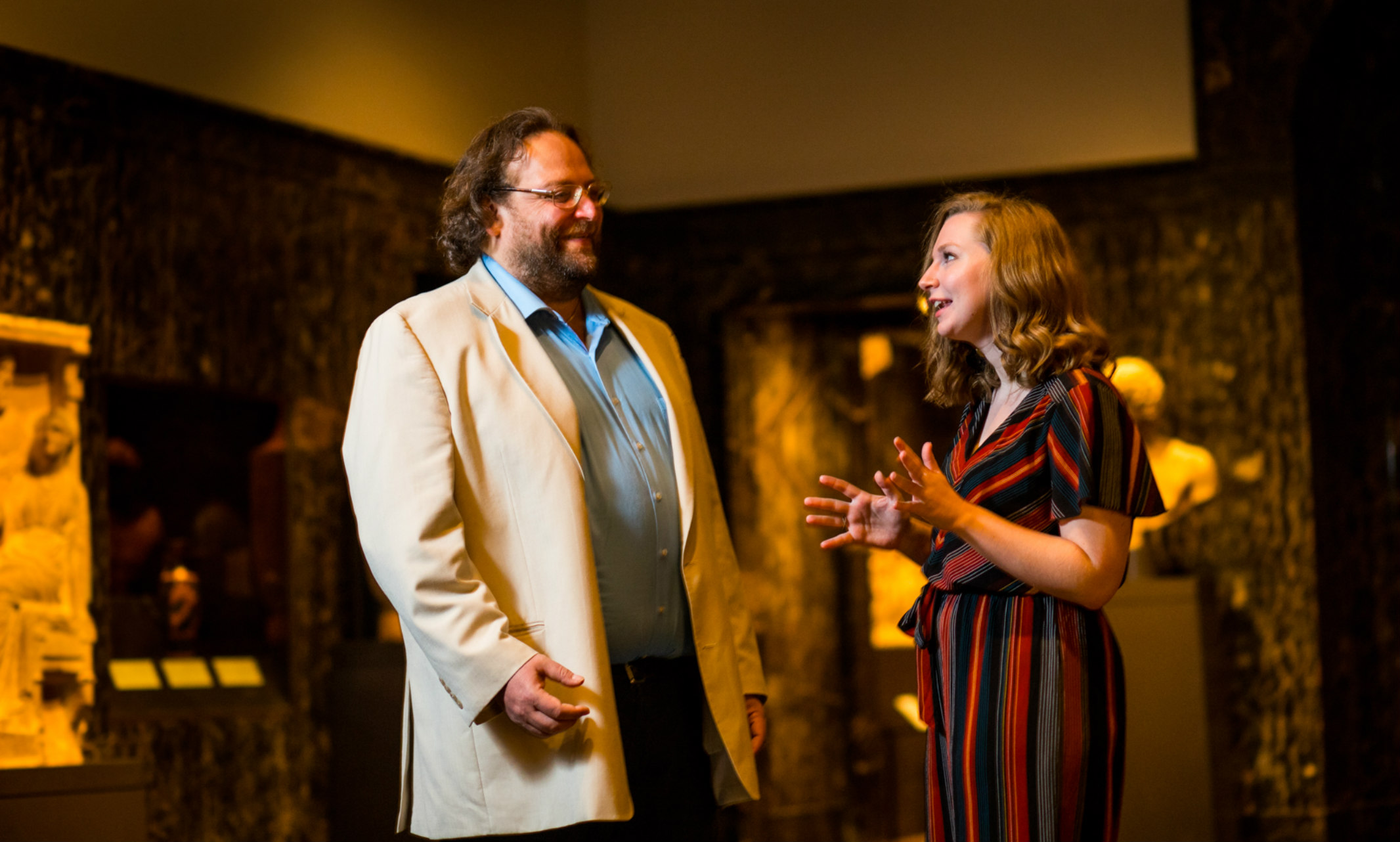
Massimiliano Vitiello’s interesting history class was the turning point for Jordon Fanciullo
The heart of UMKC is our campus community. With small class sizes and lots of opportunities, it’s easy to develop student mentorship teams. And these rich relationships—our Dynamic Duos—are some of our best success stories.
Jordon Fanciullo came to UMKC as a transfer with two demoralizing college experiences behind her. A first-generation college student, she commuted 30 minutes from home in Lee’s Summit and worked to pay for costs not covered by scholarships. She was beginning to think that higher education was beyond her abilities.
But a history professor in a night class that she didn’t even want to be in flipped her perception of herself.
“He fostered an environment of concern and care that made it so I did more than survive; I have thrived at UMKC.” -Jordon Fanciullo
“After every test I turned in, after every paper I wrote, he would tell me, ‘You’re really good at history, have you ever thought about being a historian? You have some serious potential in this,’ ” Fanciullo says.
“Dr. Massimiliano Vitiello saw something in me that I didn’t see,” Fanciullo says. “He fostered an environment of concern and care that made it so I did more than survive; I have thrived at UMKC.”
With Vitiello’s mentorship, Fanciullo graduated Magna Cum Laude in May 2019 as an Honor Scholar.
Vitiello is a UMKC 2018 Honoree for Excellence in Mentoring Undergraduate Researchers, Scholars, and Artists for his work with Fanciullo and other students.
“Jordon developed a strong sense of confidence,” Vitiello says. “She is absolutely growing as a young scholar with great potential and great intellectual curiosity.”
Vitiello, an associate professor who specializes in ancient history and late antiquity, holds a Royall Distinguished Professorship within the College of Arts and Sciences.
The night class Fanciullo took with him was European History to 1600. Vitiello’s love of ancient history ignited a fire in Fanciullo.
“When somebody’s passionate about what they’re teaching it’s easy for you to get passionate about it,” Fanciullo says.
She switched majors from criminal justice to history and languages and literatures and dug into the study of antiquity. Vitiello helped her win a SEARCH grant to do undergraduate research, which took her to the Library of Congress in Washington, D.C. Fanciullo’s research won a Prize of Distinction at the UMKC Symposium of Undergraduate Research and Creative Scholarship.
“Mentoring students has been extremely satisfying for me because I have seen my students go on to develop their work in interesting ways, as Jordon has.” -Massimiliano Vitiello
“I love being able to share my love of history with my students,” Vitiello says.
“It is wonderful to see students grow and develop their own thoughts and interpretations as a result of the combination of their passion and research.
“Mentoring students has been extremely satisfying for me because I have seen my students go on to develop their work in interesting ways, as Jordon has,” he says.
Fanciullo attributes her success to the confidence Vitiello instilled in her.
“He would stay after class, respond to email after email, and calm every self-deprecating worry,” she says. “He’s done so much for me. He has set me up for success.”
Vitiello didn’t know Fanciullo’s struggles as a first-generation and transfer student. Until she nominated him for the mentor award, he had no idea how important his mentorship was to her.
But he could see her change before his eyes.
“It has been a privilege to witness her finding her path and developing her confidence with her work,” he says.
“When somebody’s passionate about what they’re teaching, it’s easy for you to get passionate about it.” -Jordon Fanciullo
Jun 24, 2019
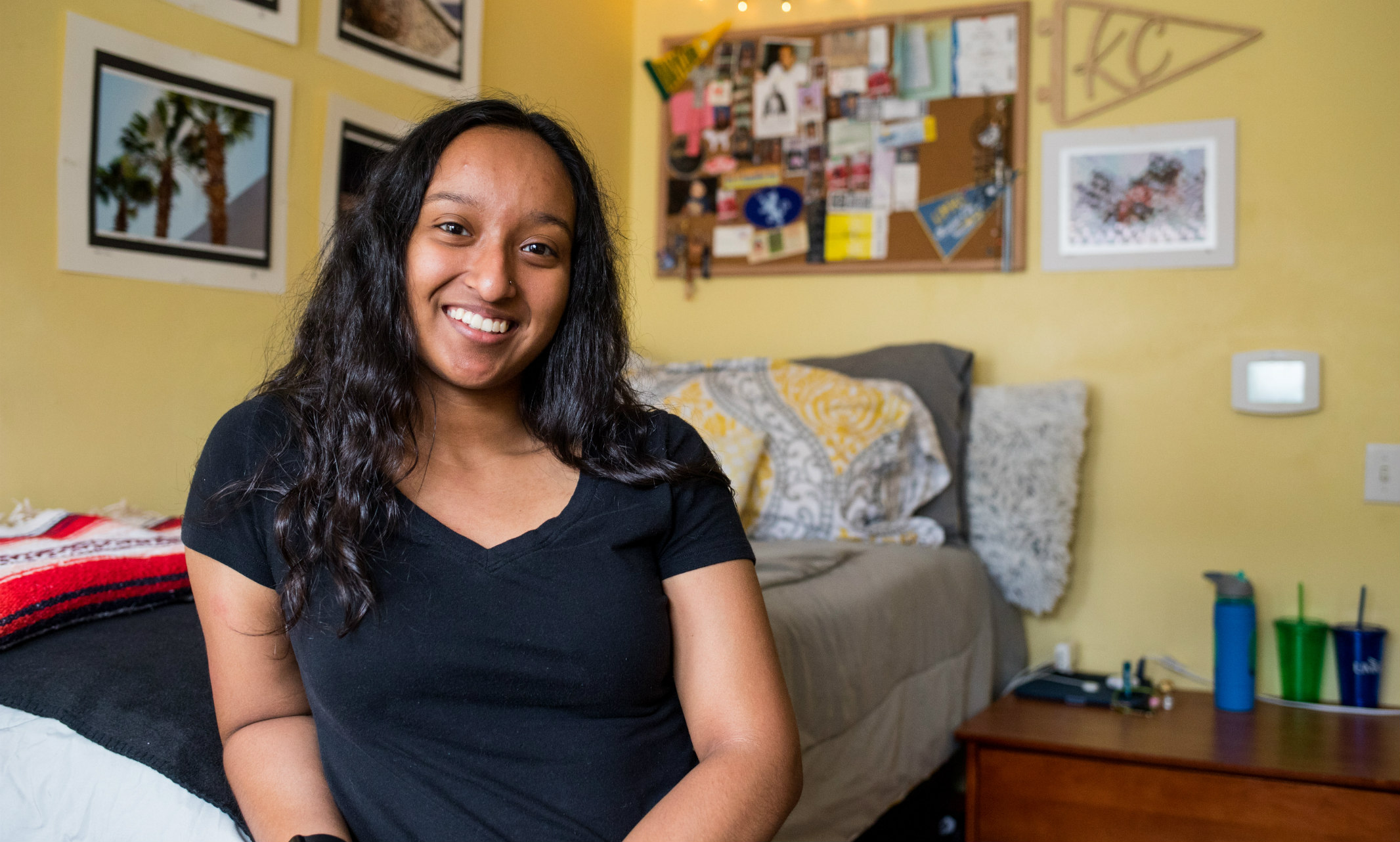
And how University College can help you find the right fit
Deciding a major is a big decision, and there’s no harm in taking your time. Here’s why it’s ok to leave that major undecided.
You might change your mind.
Research shows that around 30% of students will change their major within the first three years of college. That means time and money lost.
“I came into fall semester of freshman year planning on majoring in computer science … I assumed that it would be something I would enjoy because I like technology and I like working with computers,” says Jennifer Rangel, sophomore. “I later learned that it was something I actually really disliked, and realized that I solely chose that major because I was too scared to go into a university undecided.”
Jennifer came to this realization while in University College (UCollege), which allows students at UMKC to explore their interests among the 100+ majors, emphasis areas and minors and then transition into academic units with a plan for graduating.
"I have been able to learn more about myself to realize and understand that going the business route with design is something that I would be more interested in." — Jennifer Rangel
It's a good opportunity to learn more about yourself.
Exploring your interests, pinpointing your skills and considering different careers offers options for finding a major (and career) that you’ll enjoy and excel at. Besides, isn’t college is a time for personal growth?
“[UCollege] allows you to take your interests, your dislikes, your learning style and many other things into account when you are thinking about your career,” Jennifer says. “I enjoy graphic design and the creativity that comes along with it. And while I have thought about studying graphic design in art school, through UCollege, I have been able to learn more about myself to realize and understand that going the business route with design is something that I would be more interested in.”
Students in UCollege choose one of four mega majors and participate in a journey career assessment and seminar series with faculty and advising staff.
No judgment.
Don’t let having an undecided major scare you. There are a lot of career and major options out there. Research fields that you’re interested in, learn more about majors offered and when you’re ready, make the choice you feel is right for you.
Jun 24, 2019

And UMKC is located in the heart of it all
Kansas City has it all, and offers many opportunities in a variety of fields. These are just a few of the reasons why KC is a top place to kick off your career.
1. World-class businesses call Kansas City home.
Recognized corporations and organizations call KC their home. Children’s Mercy is one of the best-known hospitals in the Midwest and across the U.S. Other big names like Garmin, Sprint, Burns & McDonnell, among others, operate worldwide and have their headquarters in the Kansas City area. These companies offer great opportunities and help allow you to develop your career in any field you choose. Most of them offer internships that are great options to complement your studies at UMKC.
2. You can get experience while completing your degree.
Being in the heart of a city is amazing! I didn’t realize how cool it was until I started looking for my first internship. There are so many fields you can look into, and so many companies you can work for.
If you start early on getting internship experience, you can easily change fields or companies every semester. While being part of the Bloch School of Management, I have had great opportunities and growth while completing internships. Then during your senior year, some students have the opportunity to work a part-time job and turn it into a full-time job right after graduation. Being in a big city is also great to build a network. It sounds cliché, but nowadays it is all about the connections you are able to build with people around you.
3. Kansas City is growing … fast!
I have been in Kansas City for four years now, and there is a huge difference between Kansas City now and the one I met four years ago. The Streetcar is one of the biggest projects that has influenced the growth. It’s a great way to connect the city, and it is also great for tourists. Construction will begin soon to extend the Streetcar from the Crossroads Arts District to UMKC. In addition, Kansas City International Airport has begun construction on a major, four-year renovation. It will be a one-terminal airport that will serve as a big hub in the Midwest.
Projects like these are bringing lots of new employment opportunities to the city. More companies are moving in, not to mention all the successful startups emerging. Check out Startland News for some of the top startups in Kansas City.
Jun 24, 2019
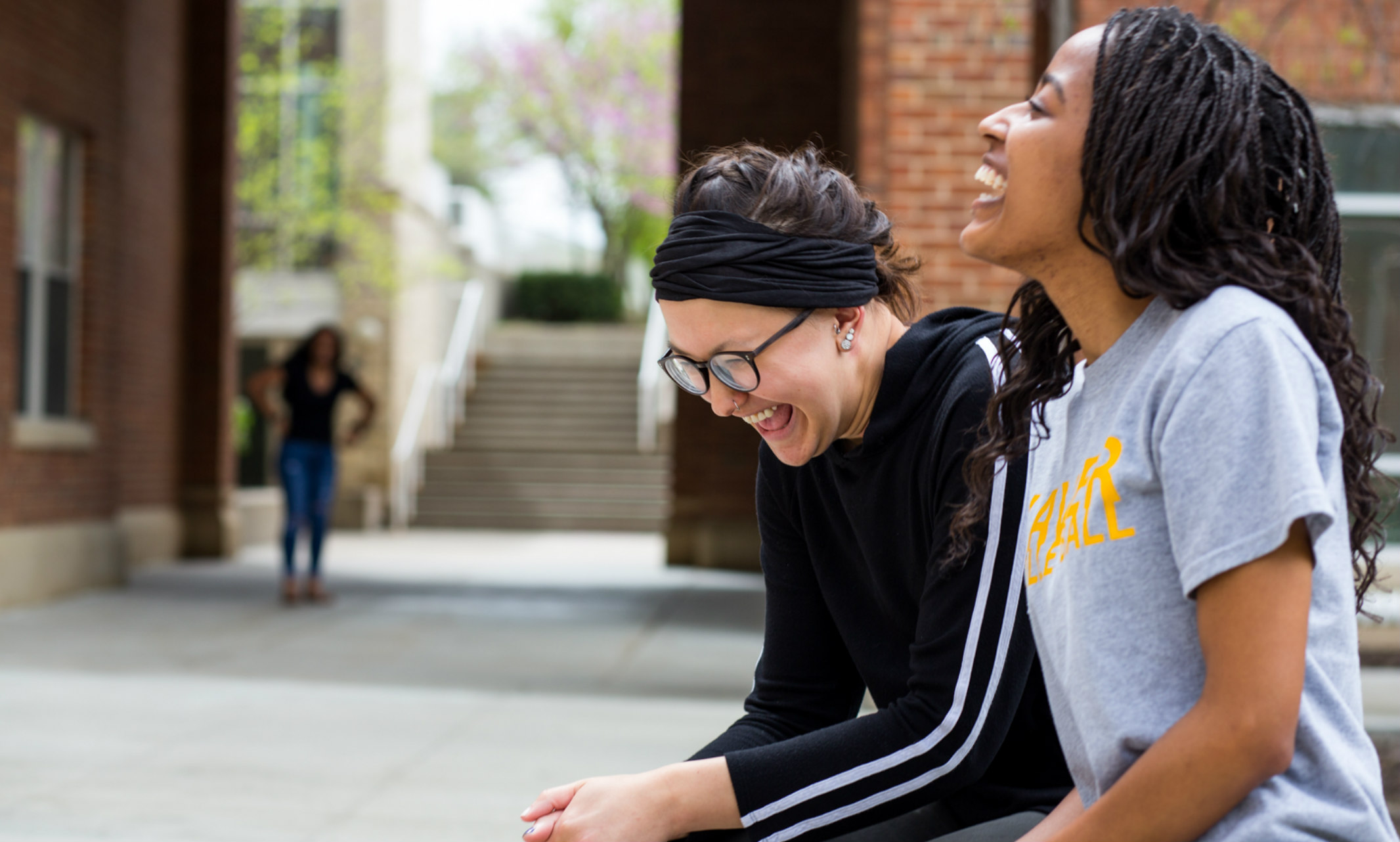
Tips for how to make the most of campus living
After living in residence halls for most of my years at UMKC, I can say without hesitation that dorm life creates a happy college experience. That said, here are a few tips to help you make the most of life on campus.
1. Take advantage of the convenience.
My car doesn’t leave the parking lot for week-long stretches. I can walk to classes within minutes. The same goes for the dining hall, restaurants, coffee shops and grocery store. The Nelson-Atkins Museum of Art is a block away. So is the Country Club Plaza for shopping.
Or if I want to get to work, I can jump on a bus – there’s a RideKC stop less than a 5-minute walk away.
If I want to get together with friends, they’re in the room next to mine, down the hall, on another floor or in a nearby building.
2. Handle conflicts respectfully.
One of the challenges of living in a residence hall is having to juggle other people’s schedules, especially when they shower and sleep. Yes, you’re living in close quarters with people, so there are bound to be things that get on your nerves or you might irritate others yourself.
This is one of your first mini adult life lessons that prepare you for life in the real world, in the workplace with colleagues. So don’t do a passive-aggressive thing like leave a complaint on a sticky note. Instead, have a face-to-face conversation. Nearly every time, this approach will help resolve issues peacefully without letting bad feelings fester and linger.
3. Savor this time in your life.
Never again will you get to live with your best friends in one place. The fun times of experiencing college together before you enter your post-graduation career are gifts each day.
Life is all about experiences. Research shows that relationships are the key driver of happiness, and strong, lifelong relationships form in the dorm. Don’t take these moments for granted.
Jun 24, 2019
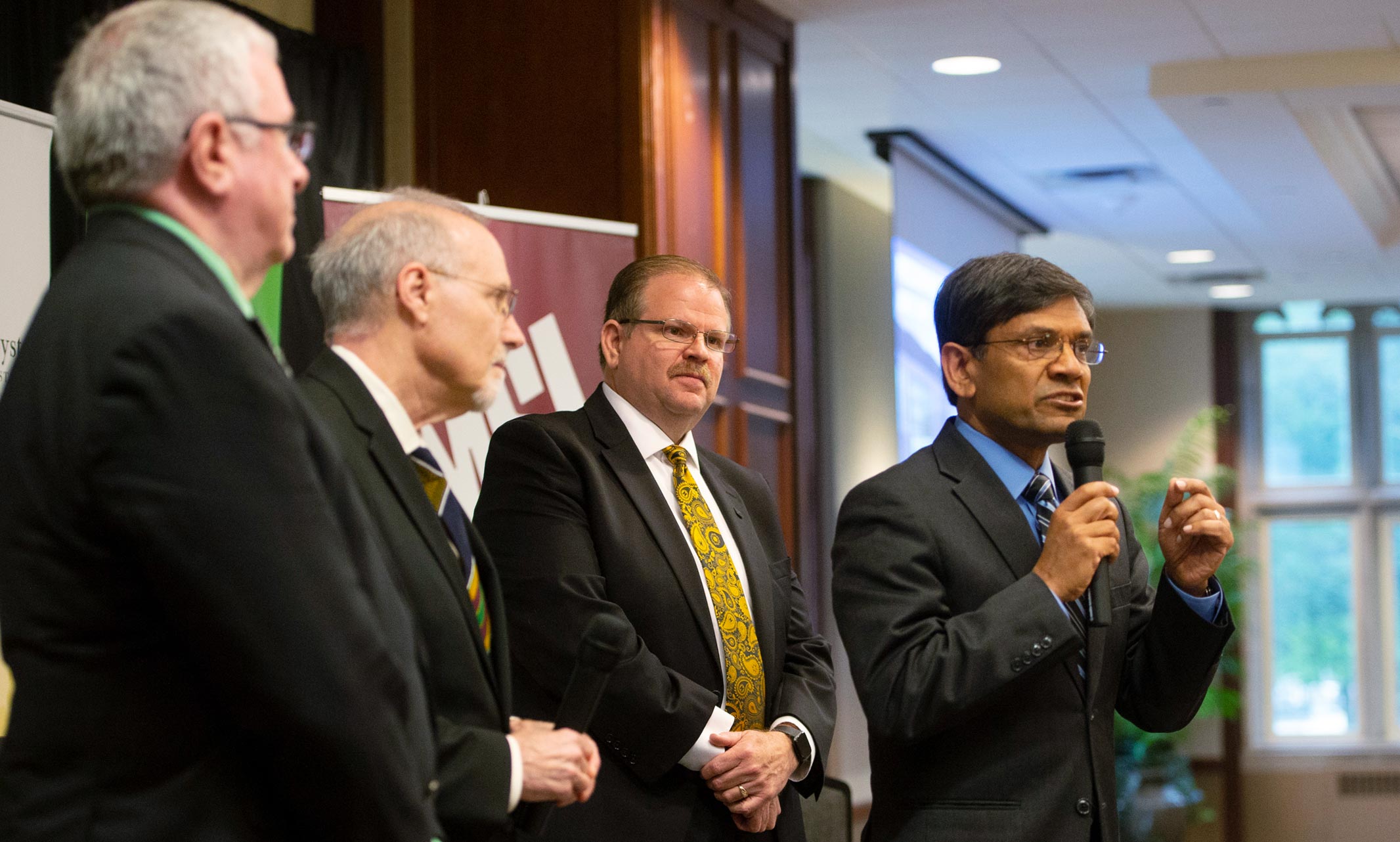
The initiative of all four universities will benefit Missourians through advances in medical science discoveries, treatments and economic growth
University of Missouri System leaders and state and national officials broke ground June 21 on the NextGen Precision Health Institute at the University of Missouri-Columbia, a central facility supporting a systemwide precision health initiative. The event also served as an official launch for the NextGen Precision Health Initiative, which harnesses and supports the research activities of the system’s four universities and health system.
The initiative is expected to accelerate medical breakthroughs for patients in Missouri and beyond, increase collaboration among UM scientists and industry partners, attract research funding, generate jobs and train a new generation of health-care scientists and practitioners who will help Missouri address the health-care needs of the future.
“UMKC will harness its deep strengths in data science and bioinformatics to collaborate with the NextGen Precision Health Initiative. The outcomes research UMKC is leading is transforming lives, and transformation through research is exactly what this initiative plans to deliver.” -Chancellor Mauli Agrawal
“Today is an exciting day not only for the University of Missouri System and our four universities, but also for the state of Missouri as a whole,” President Mun Choi said. “The NextGen Precision Health Initiative will help us translate fundamental research from laboratories to effective treatments and devices, which will benefit all Missourians as well as the rest of the world. As the boldest and most innovative investment in our history, this initiative and facility will stand as enduring symbols of our commitment to the state of Missouri and will advance medical science and our highly skilled workforce for generations to come.”
The approximately 265,000-square-foot, five-story precision health facility will provide space for more than 60 principal investigators, about half of whom will be newly recruited in areas such as engineering, medicine, veterinary medicine, animal sciences and arts and science. It will be located on the MU campus near University Hospital at the northwest corner of Hospital Drive and Virginia Avenue.
University administrators, students, faculty and staff as well as dignitaries such as U.S. Sen. Roy Blunt and Missouri Sen. Caleb Rowden attended the groundbreaking.
“Precision medicine has the potential to completely transform health care delivery in this country. The NextGen Precision Health Initiative will accelerate progress toward new medical breakthroughs at this pivotal time in the medical research space,” Blunt said. “One of my top priorities in Congress has been establishing a pattern of sustained, increased federal investment in medical research. I’m proud to see Missouri become home to this brand new facility where students will have the opportunity to work alongside experts and researchers developing new treatments for the most costly and deadly diseases.”
The event also featured MU Chancellor Alexander N. Cartwright, University of Missouri-Kansas City Chancellor C. Mauli Agrawal, Missouri University of Science and Technology Interim Chancellor Christopher G. Maples and University of Missouri-St. Louis Chancellor Thomas F. George.
“Missouri’s flagship university — home to the nation’s most powerful university research reactor and 13 schools and colleges across the arts, sciences and humanities — is excited and poised to bring our comprehensive breadth of expertise across disciplines to this innovative research facility,” Cartwright said. “Cross-discipline research space of this magnitude is rare and will help us tackle grand challenges like treatments for cancer and heart disease. This important work will undoubtedly attract federal and industry funding, and bolster MU’s role among America’s leading research institutions while contributing to the economic development of our region and state.”
The initiative will involve every UM university and be especially impactful for students, who can learn side-by-side with leading researchers.
“The University of Missouri-Kansas City will harness its deep strengths in data science and bioinformatics to collaborate with the NextGen Precision Health Initiative,” Agrawal said. “The outcomes research UMKC is leading is transforming lives, and transformation through research is exactly what this initiative plans to deliver.”
At Missouri S&T, student Carley Hamann is already engaged in experiential learning at the construction site. The senior in mechanical engineering plans to pursue a career in construction and is interning with The Whiting-Turner Contracting Company over the summer, which is part of the NextGen project team.
The $220.8 million facility is the UM System’s top capital priority and is funded through a combination of private and corporate support, contributions from MU and the UM System and the state of Missouri. In FY20, which begins July 1, the state has designated $10 million for the institute.
“I am grateful to the people of Missouri and our elected leaders for understanding the power of this investment,” UM Board of Curators Chair Jon Sundvold said. “I am confident the NextGen Precision Health Initiative will foster breakthroughs that can improve the lives of those in our state and beyond — both improving health care and bringing jobs to our state.”
Elizabeth Loboa, vice chancellor for strategic partnerships and dean of engineering, has served as a leader of the project.
“The NextGen Precision Health Initiative will feature shared facilities that will foster partnerships among researchers of different disciplines and from different organizations and will help us emerge as a global leader in biomedical research,” Loboa said. “It will also greatly enhance our ability to recruit and retain the most talented researchers.”
Last year, an independent study found that the UM System and its four campuses have a $5.4 billion economic impact on the state of Missouri through direct employment, job creation and research funding. The development of the NextGen Precision Health Institute is expected to add to that figure significantly as a catalyst for additional economic growth, said Mark McIntosh, another key leader of the project and vice president for research and economic development at the UM System and vice chancellor for research and economic development at MU.
“This facility will play a crucial role in MU’s future as a transformational leader in improving health by taking advantage of our longstanding culture of multidisciplinary research and integrating biomedical research under one roof,” McIntosh said. “Collaborators will include the best researchers from around the country, including our best and brightest from colleges and schools across the UM System, who will work together to conduct leading-edge research that improves our quality of life.”
James Abbey, senior director for strategic innovation for the UM System and MU, serves as project manager for the facility while Burns & McDonnell has been hired to do detail programming, equipment planning, building and site design. The expected completion date for the facility is Oct. 19, 2021.
The announcement was also covered by Health IT Analytics.
Jun 21, 2019
Justice Horn interviewed for The Examiner
The Examiner interviewed Justice Horn on the fast track to a political career he hopes will one day find him sitting in the Missouri governor’s mansion. After enrolling at the University of Missouri-Kansas City in January, Horn was voted the Student Government Association president, where he works with 423 different organizations and oversees a budget of $1.9 million.
Jun 20, 2019
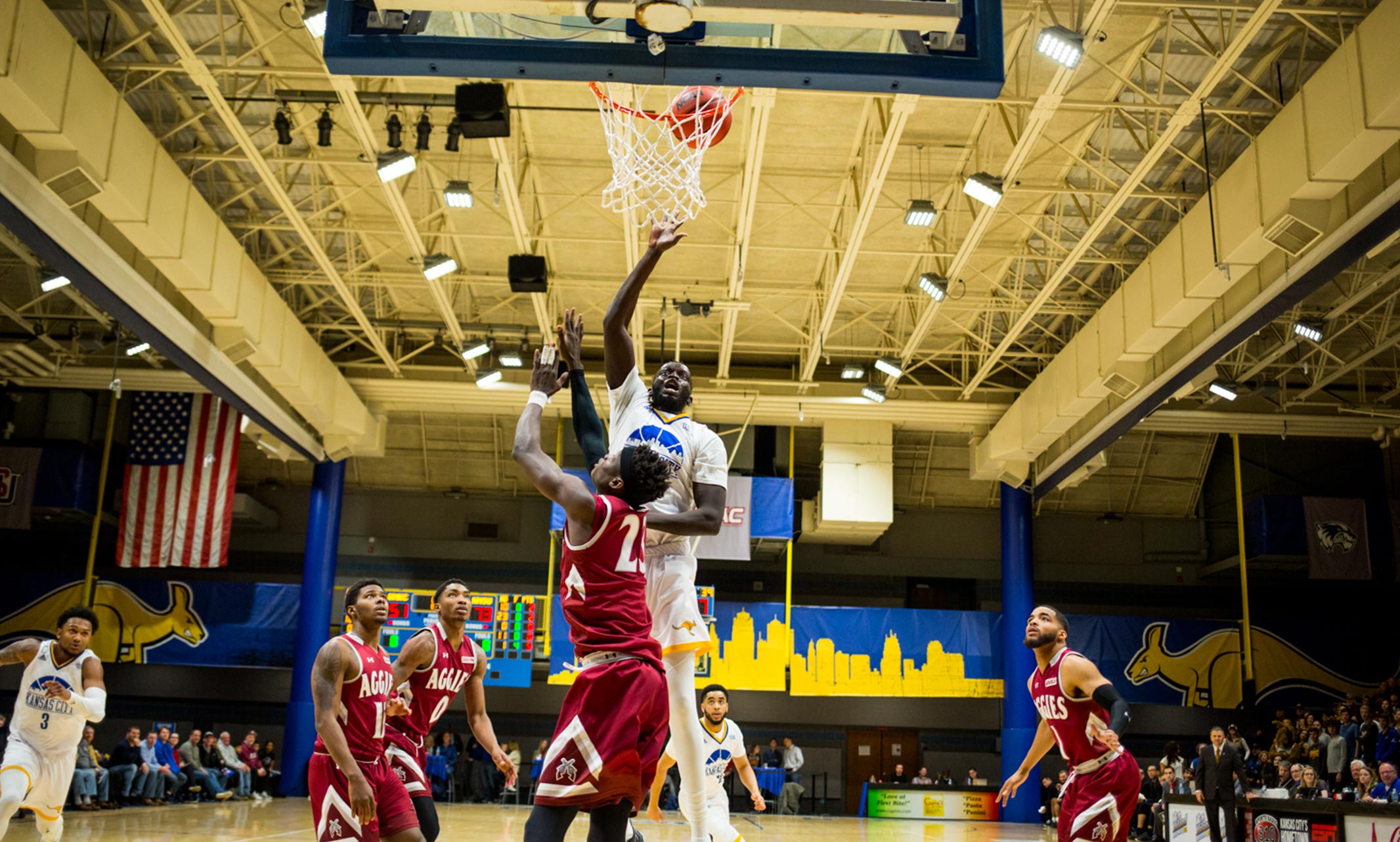
Move will mean closer geographic competition, significant cost savings
The University of Missouri-Kansas City has accepted an invitation to rejoin the Summit League. UMKC Athletics will begin play in the Summit League during the next athletic year, effective July 1, 2020.
UMKC has notified the Western Athletic Conference of its intention to withdraw from that conference, effective June 30, 2020, after seven years in the league.
The Summit League will bring UMKC back into the orbit of a conference with teams mostly from the Midwest. The Summit League has a 36-year history of Division I athletics and has produced 12 NCAA champions. UMKC becomes the 10th member of the Summit League in 2020-21, joining University of Denver; Purdue University Fort Wayne; University of North Dakota; North Dakota State University; University of Nebraska Omaha; Oral Roberts University; University of South Dakota; South Dakota State University; and Western Illinois University.
“We’re thrilled to have the UMKC Roos back in the Summit League,” said Summit League Commissioner Tom Douple. “We are looking forward to the 2020-21 season.”
“We’re thankful to the WAC and their commitment to Division I excellence. We accepted the invitation to return to the Summit League because, after careful review, we believe it will help us achieve our goals for UMKC Athletics,” said UMKC Chancellor Mauli Agrawal, Ph.D. “Under the leadership of Athletics Director Brandon Martin, we are elevating UMKC Athletics and creating a fan experience that is more engaging for our students and our community. A move to the Summit League will support those goals.”
The move will also help with another priority — streamlining the budget of Division I athletics. UMKC Athletics Director Brandon Martin, Ph.D., says that a move to the Summit League will save significant costs.
Martin said the move, coupled with facility improvements at Swinney Center where basketball and volleyball games are played, will benefit the campus and the Kansas City community.
“These changes are about competitive excellence, positioning our student-athletes and teams to win conference and NCAA post-season championships,” Martin said. “This also will help inspire our Roo Nation, elevating the fan experience, creating rivalries and partnerships that make games not only competitive but fun and exciting. This, coupled with fiscal savings, is a win-win.”
At its meeting Thursday in Columbia, the University of Missouri Board of Curators approved the move to the Summit League.
“Athletics is an important part of the college experience and we support the vision of UMKC to elevate its competitiveness, support its student-athletes and further engage the campus community while creating a sound fiscal foundation,” said Jon Sundvold, chair of the Board of Curators. “It’s an exciting time for the university.”
“We’re thrilled to have the UMKC Roos back in the Summit League,” said Summit League Commissioner Tom Douple. “We are looking forward to the 2020-21 season.”
Jun 20, 2019
Athletic Director Brandon Martin talks about the benefits
The University of Missouri-Kansas City has accepted an invitation to return to the Summit League. The story ran in several media outlets, including: KSHB and Kansas City Star.
Jun 20, 2019
Anthony Sze-Fai Shu interviewed on KCUR’s Central Standard
Associate English Professor Anthony Sze-Fai Shu, was a guest on Central Standard for a panel discussion on Always Be My Maybe, a new Asian American romance-comedy movie.
Jun 20, 2019
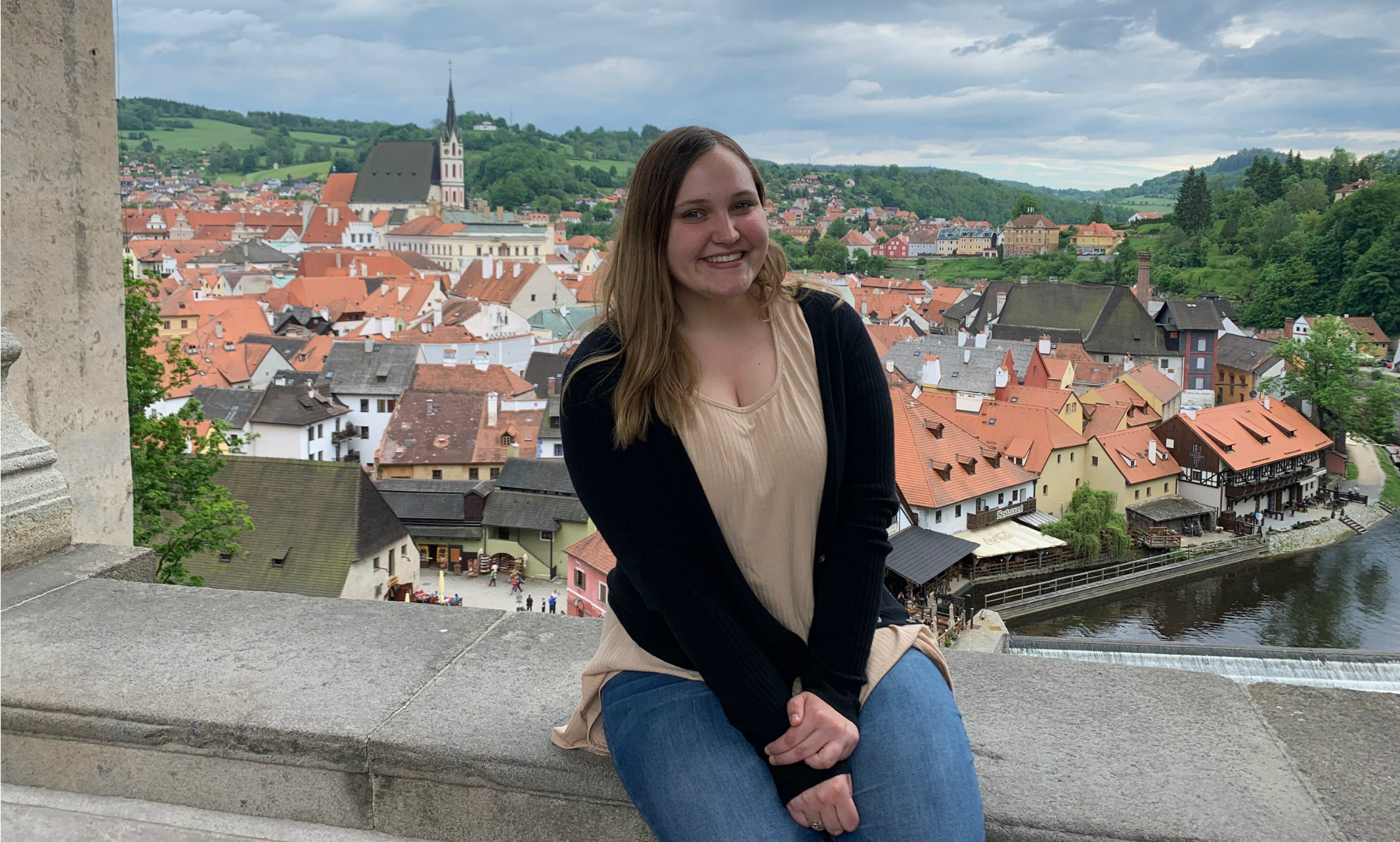
Scholarships provide students opportunity to gain experience and perspective
Helene Slinker, a rising senior studying political science, took her first international trip in 2012. The experience was life changing and led to her interest in studying abroad.
“I come from a German-American family and half of my family still lives in Germany,” Slinker says. “When I went overseas the first time to see them, I realized that I loved traveling and wanted to see more of the world.”
Travel can be a key component to expanding students’ perspectives and enhancing their understanding of different cultures as well as reinforcing foreign language skills. For some, the cost of studying abroad might be more than they can manage.
“As a first-generation student, I saw study-abroad trips as something that only rich students could participate in,” Slinker says. “These scholarships completely transformed that perception. I am so grateful for the help of the UMKC International Academic Programs Office, along with various professors who lent a hand to write me letters of recommendation.”
"To any students at UMKC who have thought about study abroad and shrugged it off, I say this: do it." Helene Slinker
Slinker, who is studying in Prague and the Czech Republic, and seven other students from UMKC, received Benjamin A. Gilman International Scholarships to study abroad for summer 2019. The Gilman Scholarship is a program of the U.S. Department of State's Bureau of Educational and Cultural Affairs (ECA) that encourages students to study and intern in diverse areas of the world. These scholarships represent a total of $24,000 in support of these students who otherwise might not have had the opportunity to study abroad.
“The Gilman scholarships are a great way for us to promote study abroad to students who might not have otherwise taken the leap,” says Kate Wozniak, assistant director for UMKC Study Abroad and Exchange.
The students, their schools, majors and host countries are:
Danait Berhe, College of Arts and Sciences, sociology, United Kingdom
Jhane Davis, Bloch School of Management, business administration, Costa Rica
Jacob Furry, Conservatory, music education, Denmark
Niesha King, College of Arts and Sciences, psychology, Spain
Henry Ortega-Hernandez, College of Arts and Sciences, criminal justice and criminology, Spain
Brian Ramirez, School of Biological and Chemical Sciences, health science and Spanish, Spain
Sarah Schleicher, College of Arts and Sciences, languages and literatures, Costa Rica
Slinker also received the Phi Kappa Phi Study Abroad Grant based on achievement, campus and community service and the opportunity for travel to influence academic and career goals. She is one of 75 students in the nation to receive this grant.
She encourages students to work with Wozniak and her team if they are interested in study abroad —even if it seems daunting.
“Experiencing another culture totally changes your worldview,” she says. “To any students at UMKC who have thought about study abroad but shrugged it off, I say this: do it.”
For more information visit the office of Study Abroad and Global Engagement.
Follow the 2019 UMKC students abroad at the Roos Abroad blog, on instagram @umkcstudyabroad and #umkcstudyabroadtakeover
Jun 19, 2019
John Stamm interviewed on Fox4KC about successful campaign
As campaign manager, the 28-year-old John Stamm had a direct hand in everything including fundraising, advertising, debate preparations and getting out the vote, among other responsibilities. He talked with Fox4KC about his role, which was a first for the UMKC graduate who majored in business and philosophy.
Jun 19, 2019
Edward Cantu interviewed on KCUR’s Up to Date
University of Missouri-Kansas City Professor of Law Edward Cantu was a guest on KCUR’s Up to Date. He and another professor discussed the ethics of granting rights to a fetus, and the legality of limiting a woman's right to privacy.
Jun 19, 2019
Darryl Chamberlain talks about A-Flat Youth Orchestra on Fox4KC
School is out for summer, but one Kansas City man is continuing with his mission to educate and inspire through music. Alumnus Darryl Chamberlain, creator of A-Flat Youth Orchestra, talks with Fox4KC about how he promotes music in our city.
Jun 18, 2019
Startland News talked to UMKC alumna Megan Darnell, nbkc program manager.
Less than a year after its inaugural Fountain City Fintech accelerator debuted, nbkc bank has launched a new incubator program designed to tackle common banking industry problems with start-up-style ideation, problem solving, and tenacity, said UMKC alumna Megan Darnell. Read more.
Jun 18, 2019
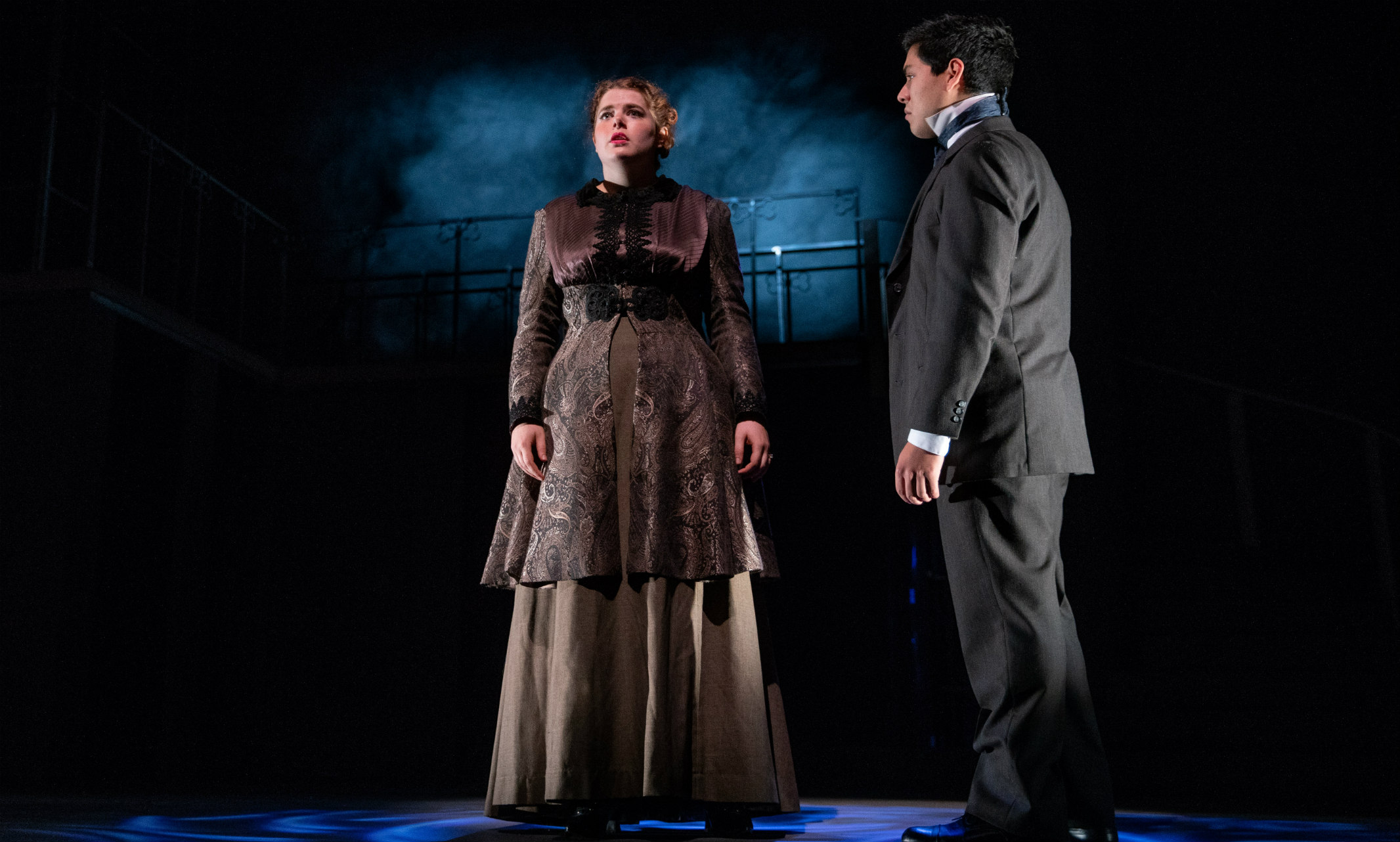
Hollywood Reporter lists UMKC Theatre in Top 20
Hollywood Reporter rankings published this month have the University of Missouri-Kansas City Theatre graduate program at No. 20 out of 25 for top dramatic and performing arts schools.
According to the Hollywood Reporter in June, the publication consulted with academics, influencers and alums to rank the top 25 Master of Fine Arts acting program. In the article, the Hollywood Reporter highlighted UMKC for connecting with The Acting Company in New York, which has hired MFA acting grads and partnered with the program.
“That’s a testament to the quality of the talent coming out of UMKC, which works closely with Kansas City Repertory Theatre,” wrote Seth Abramovitch, senior writer.
On July 1, UMKC Theatre will officially merge with the UMKC Conservatory of Music and Dance to become the UMKC Conservatory. The merger is a natural alignment: the two programs share a long history of collaboration, a physical space, a conservatory model of teaching, a professional-school focus, a strong national reputation, a spirit of civic engagement and a supportive philanthropic audience.
UMKC Theatre continues to make the entire city an artistic campus. In addition to its on-campus partnership with Kansas City Repertory Theatre, this year the program partnered with Unicorn Theatre, Coterie Theatre and Kansas City Actors Theatre, featuring MFA and Bachelor of Arts acting students in major professional roles.
“That’s a testament to the quality of the talent coming out of UMKC, which works closely with Kansas City Repertory Theatre,” wrote Seth Abramovitch, senior writer.
Alumni include Nick Gehlfuss of “Chicago Med,” Patrick DuLaney of “Harry Potter and the Cursed Child on Broadway” and Toccara Cash of Broadway’s “The Play That Goes Wrong,” and “Half Me, Half You” at London’s West End.
The program will have a new department chair, Kenneth Martin, scenic designer and former chair of acclaimed Bachelor of Fine Arts theatre program at Coastal Carolina University.
Jun 17, 2019
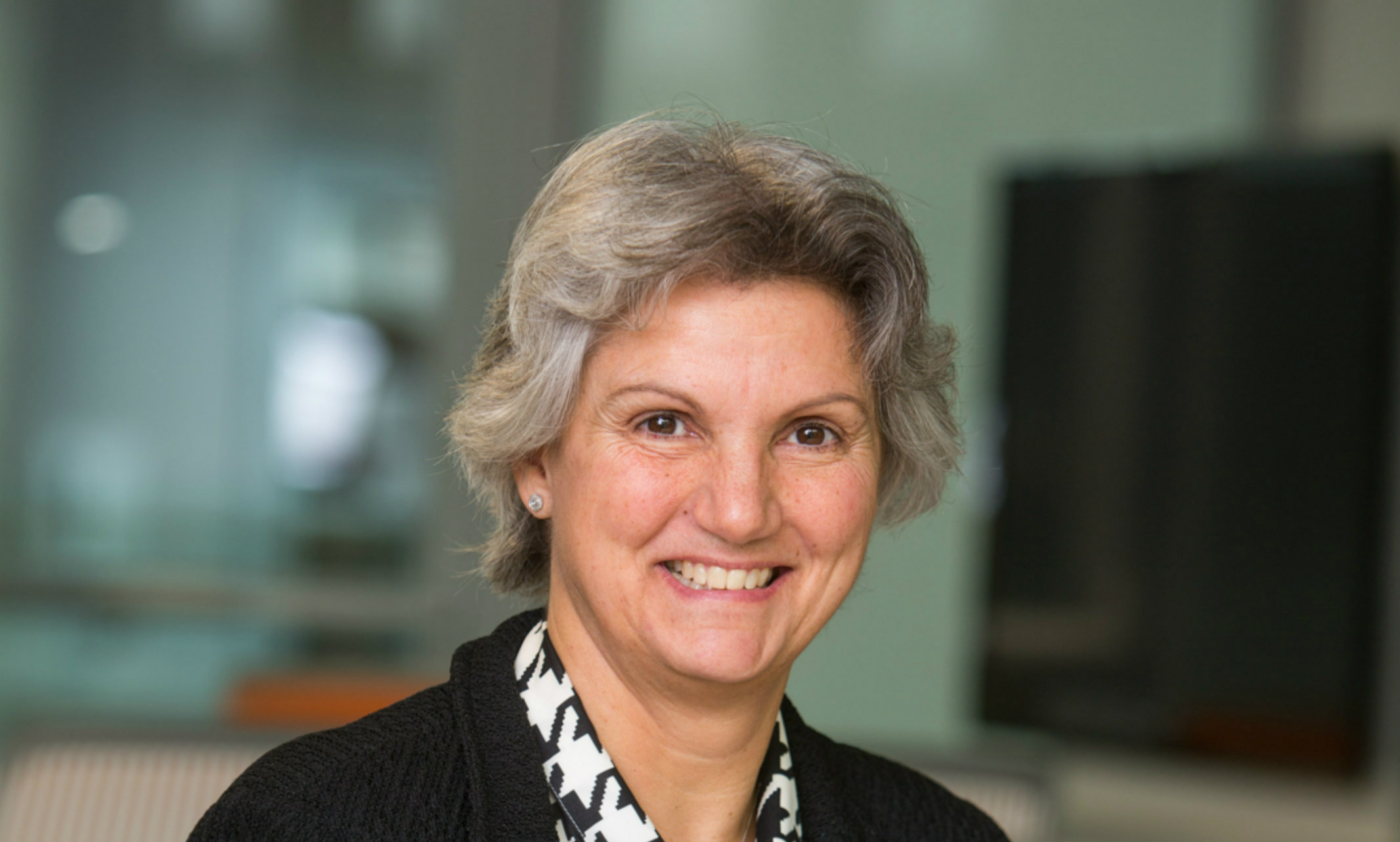
Kansas City Business Journal is recognizing Provost Barbara Bichelmeyer
Barbara A. Bichelmeyer, Ph.D., executive vice chancellor and provost of UMKC, was named to the Kansas City Business Journal "Women Who Mean Business" class of 2019.
Bichelmeyer, a professor of management, is the university's chief academic officer and its highest-ranking woman leader. A Kansas City native, she joined UMKC in 2015.
A panel of six judges selected the “Women Who Mean Business” class of 2019, the 20th year of the recognition. Each woman is a leader in her field, has made significant contributions to the business community and has given back to the community through philanthropy.
Bichelmeyer and her co-honorees will be featured in a special supplement to the Aug. 23 weekly edition of the Kansas City Business Journal. The same day, the Women Who Mean Business class of 2019 will be celebrated at a luncheon at the Overland Park Convention Center.
Jun 17, 2019
Collaborative project featured in Gadsden Times
An orthopedic surgeon talks with the Gadsden Times about working with a group of engineering students from the University of Missouri-Kansas City to design the Sagittae.
Jun 16, 2019
Adrienne Walker Hoard talks about the selection recommendations on KCUR
Adrienne Walker Hoard has spent nearly two years thinking about how visitors to the Nelson-Atkins Museum of Art will perceive “30 Americans,” which has traveled across the country for a decade. A fine art and black history professor at the University of Missouri-Kansas City, Walker Hoard talks with KCUR’s Central Standard about her experience leading a Community Advisory Group formed by the Nelson to work with the museum in the planning process that led up to the exhibition's opening in Kansas City.
Jun 14, 2019
Professor Adrienne Walker Hoard talks about barriers to swimming with Fox4KC
Adrienne Walker Hoard shares a personal story with Fox4KC of learning how to swim in Jefferson City’s segregated pools.
Jun 14, 2019
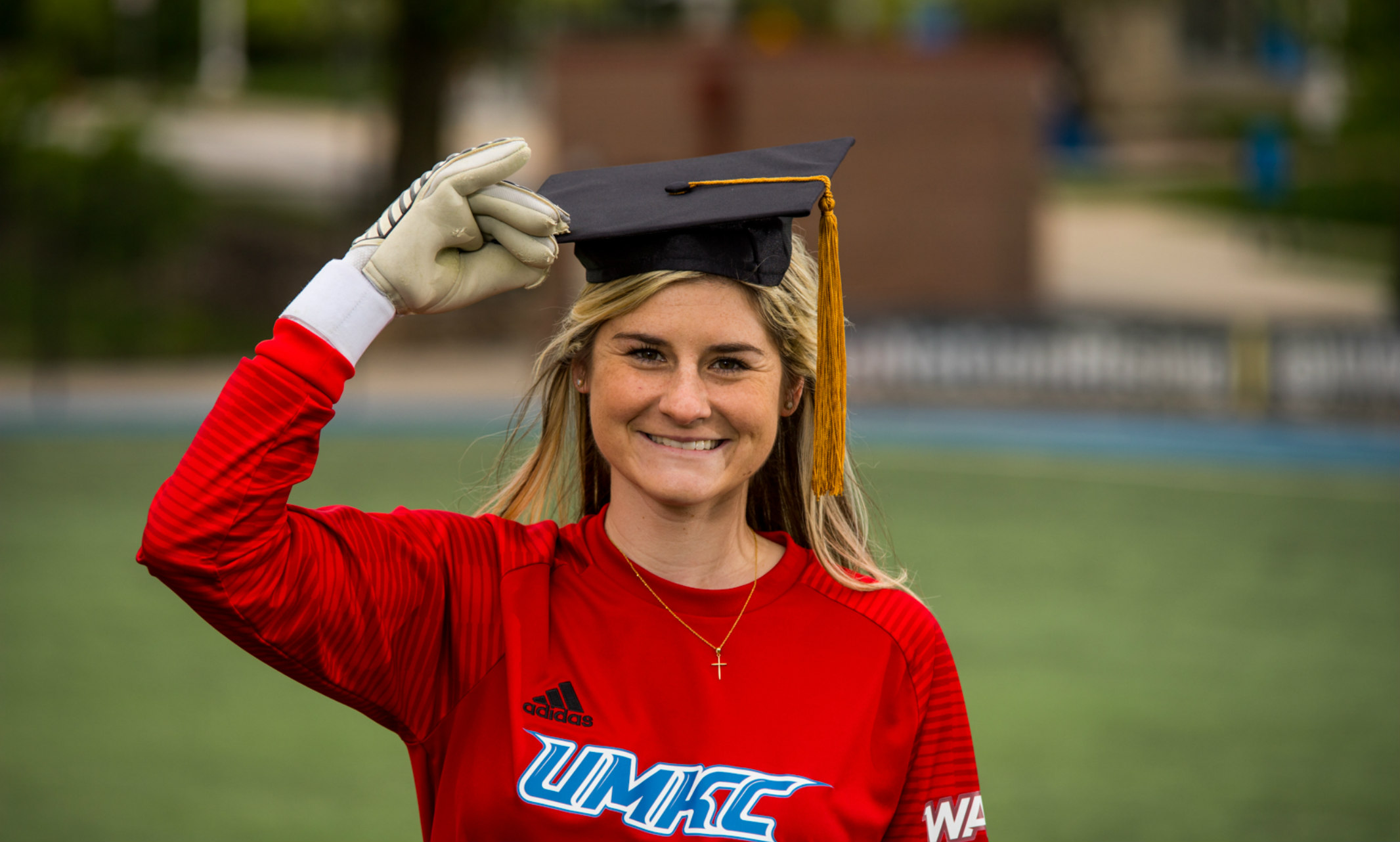
Student-athlete Anna Lillig is on her way to becoming a physician assistant
Anna Lillig ‘19 Hometown: Kansas City, Missouri High School: St. Pius X High School UMKC degree program: Health SciencesAthletics: Women’s Soccer, goal keeper
Get to know our people and you'll know what UMKC is all about.
Why did you choose UMKC?
I was recruited to play for the soccer team, and I knew UMKC had highly respected health programs, something I wanted to go into. I have academic and athletic scholarships. It is very rewarding because I have worked very hard on and off the field all my life, and I continue to do so.
Why did you choose a health degree program?
I came in wanting to do pharmacy but after getting a pharmacy tech job, I realized it wasn’t for me. I was in between pursuing nursing or medical school so I thought health science would best equip me to learn more about the patients I would be taking care of one day.
I feel I have gained great insight on the background of potential patients, such as surrounding stigmas — others being more prone to certain diseases or insurance issues they might face. I think as a health sciences major, I have learned compassion and empathy, something science classes alone can’t teach.
I actually found my dream career through this major. It was in Introduction to Health Science class that a physician assistant (PA) came to speak to us and I instantly fell in love with the role she was describing. I will start in the PA program at UMKC next year after my internship.
"I think as a health sciences major, I have learned compassion and empathy, something science classes alone can’t teach."
Tell us about your internship.
I have an internship next fall working in an assisted living home with the memory- care unit. I have shadowed numerous PAs, and I have learned about their lifestyle, what settings they can work (in such as clinic or surgery), and I also gained some medical knowledge.
You’re a student-athlete. What’s that experience been like?
I am appreciative of the network I have built through academics and athletics that will continue to be helpful for me to lean on. I am glad I was able to expand upon my leadership skills through the university’s soccer team and various organizations. I believe the qualities of teamwork, dedication and hard work will carry me into the next chapter of my life.
"I actually found my dream career through this major. It was in Introduction to Health Science class that a physician assistant (PA) came to speak to us and I instantly fell in love with the role she was describing. I will start in the PA program at UMKC next year after my internship."
Who do you admire most at UMKC?
I admire Amelia Howard. Her dedication to helping student-athletes is the kind of enthusiasm I want to have when I enter the workforce. In the four years I’ve been here, I don’t think I have ever seen her frustrated. She always has a cheerful tone to her voice even when the situation at hand is not pleasant. I have been able to work under her through organizations including Student Athletic Leadership Council, Student Athlete Advisory Committee and as a mental health advocate on top of her being my athletic advisor. She always has her office door open — unless she is in a meeting — and she will drop whatever she is doing to listen and help you with whatever you need. From school or to venting about life, I see her has a lifelong friend and mentor. I have been so blessed to have her in my life throughout the good, the bad and the ugly of being a student-athlete in college.
What’s the best piece of advice you have ever received from a professor?
It’s not the end of the world if you do bad on the first test. Tara Allen, anatomy and physiology professor, said that. You can learn from the experience and still do well in the class.
Jun 13, 2019
New identity a refresh of a historic logo
The University of Missouri-Kansas City Athletics Department unveiled a new primary logo today. The announcement was featured in several media outlets, including the Kansas City Star and College AD.
Jun 13, 2019
Kyle Reed interviewed on KCUR
An urban heat island is a city that gets significantly warmer than its surrounding area, just by virtue of having a lot of buildings and a lot of people in one place. Kyle Reed, environmental and urban geosciences master’s student at UMKC, was a guest on KCUR’s Central Standard for a panel discussion on urban heat.
Jun 12, 2019
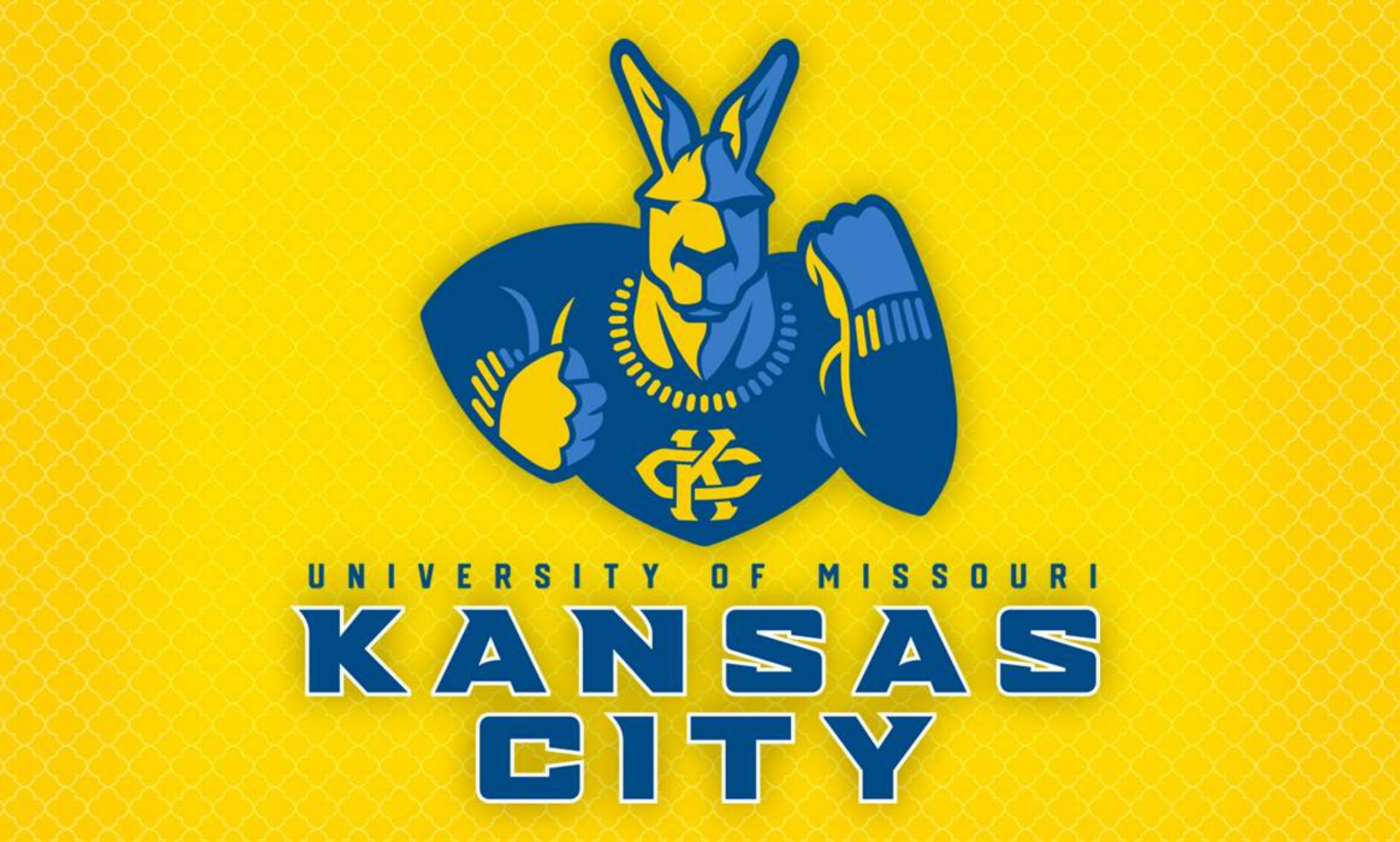
Mark emphasizes Kansas City and competitive kangaroo
UMKC Athletics unveiled a new primary logo. The Roo athletic teams will proudly display a new mark, illustrating elements of strength, determination and a commitment to the Kansas City community that aligns with the department’s vison and core values. The goal is to elevate the Roo brand on a local, regional and national level.
The Roos partnered with Old Hat, a sports-focused strategic agency in Oklahoma. UMKC Athletics collaborated with stakeholders throughout campus to gain critical insight during the process. This included surveying more than 11,000 fans and members of the community. The goal was to deliver a mark that resonated with all of Kansas City and would be a source of pride for the university.
"Our new visual identity allows us to have a stronger connection with our students, fans, alumni and supporters on campus and in the local community,” said Brandon Martin, Ph.D., director of athletics. “It represents our continuous pursuit of comprehensive excellence and our focus on being Kansas City committed.”
An homage to UMKC history, the new mark mirrors elements from the “fighting kangaroo” logo used in years past. Evoking the past while creating a new future was a major goal of the project.
"Our new visual identity allows us to have a stronger connection with our students, fans, alumni and supporters on campus and in the local community,” said Brandon Martin, Ph.D., director of athletics
Merchandise with the new logo is available on UMKCkangaroos.com. Additional items will be added throughout the summer with a full line-up of new apparel arriving in time for the fall semester.
Jun 12, 2019
Hollywood Reporter Rankings Released
Every year, the Hollywood Reporter ranks MFA programs after consulting with academics, influencers and alums. The University of Missouri-Kansas City is ranked in the top 25 MFA graduate acting degrees in the nation.
Jun 10, 2019
Chris Garmon interviewed by Healthcare Dive
There are even some instances when public disclosure of health care costs could potentially harm markets, according to one economist, Chris Garmon, who used to work for the Federal Trade Commission. Garmon, a professor at UMKC, interviewed for the article on Healthcare Dive.
Jun 07, 2019
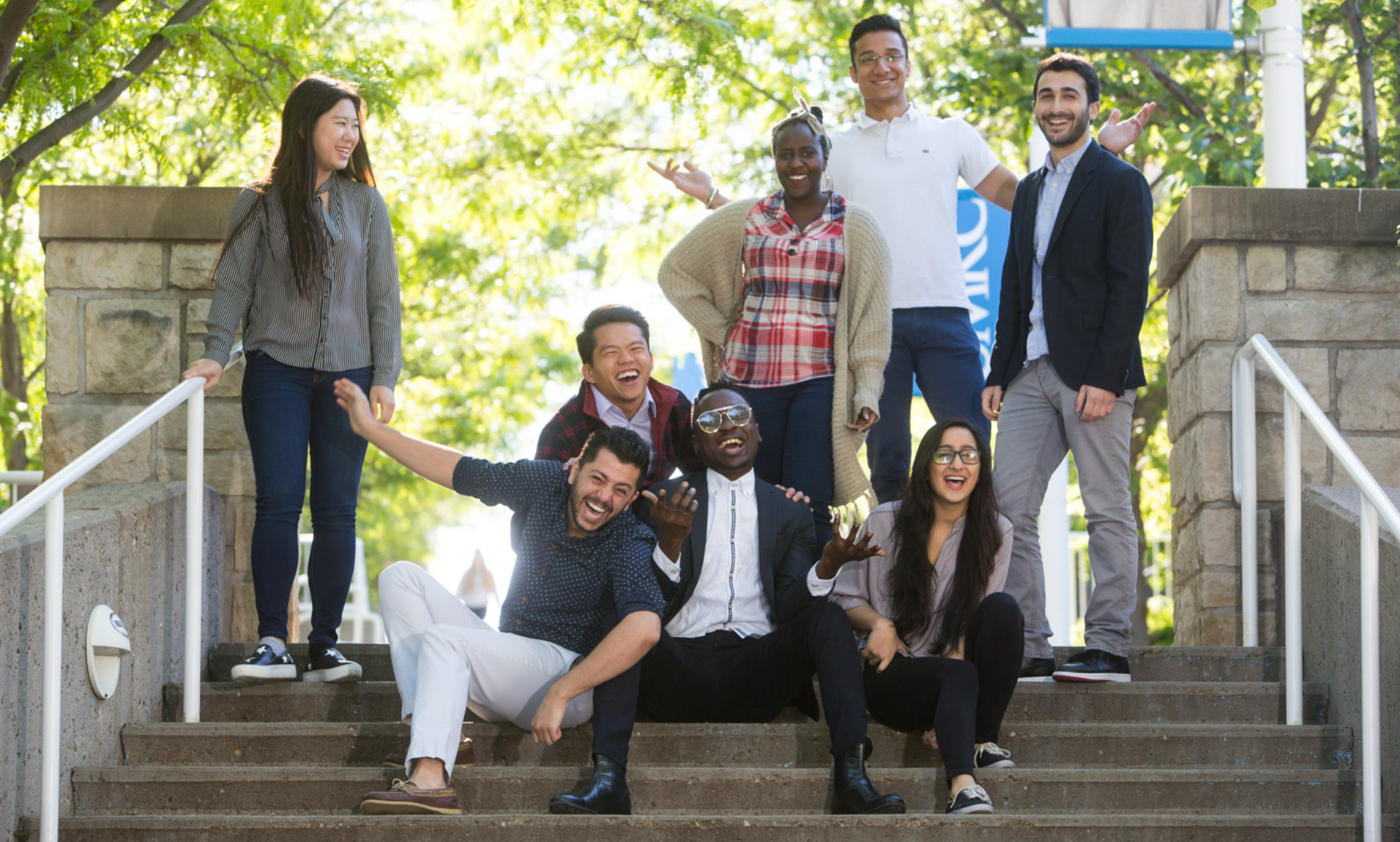
Tips from an international student graduating from UMKC
Culture shock can be hard. It’s okay! I have been through it too, and you will survive.
Personally, the best thing for me has been to keep an open mind and enjoy every part of the ride. Here are three additional tips that helped me transition to life in the U.S. and Kansas City.
1. Get to know your sports.
Most Americans are sports fans. Don’t be surprised to see your peers walking around in their jerseys and having deep conversations when it's football, soccer or baseball season. Kansas City has world-class teams, so join in and have some fun!
I enjoy Kansas City Royals baseball games a lot. They play at Kauffman Stadium, which is a must see, and the games are exceptional; not to mention they won the 2015 World Series and got the city going crazy. The baseball season begins late March and goes until October.
Sporting Kansas City is the major-league soccer team. Their fans go crazy during the games, which creates a really exciting atmosphere. If you have time, you can spend the afternoon at The Legends outlets and then cross the street for the game. Soccer season goes from March until December.
Did you know Kansas City has the loudest stadium crowd in the world? Arrowhead Stadium, the home of the Kansas City Chiefs (American football) has claimed those bragging rights. You seriously can’t miss this—gear up and get ready to make some noise! Football season begins in September and playoffs go until February. In the 2018 season, the Chiefs were really close to making it to the Super Bowl, so you your fellow fans are very excited!
2. Diversity is everywhere.
If you are concerned about being the only “different” one, and if you are thinking you won’t fit in, believe me, it most likely will not happen. The U.S. has people from a variety of backgrounds, which leads to different beliefs, attitudes, customs and traditions. In my time here, I have met people from all over the world, and that has probably been the most amazing part of my time here in the U.S. I have truly appreciated spending time with people who have taught me new customs, traditions and even a new language. Have an open mind all the time!
3. Make your solo debut.
Being self-sufficient is highly valued in the U.S. It is very common that people leave their homes and become independent after they turn 18 years old. A lot of students you will meet will have internships during their studies. Take advantage of the opportunities, because — let me tell you — there are a lot! I have had two internships that have been truly exceptional and allowed me to put into practice skills learned in the classroom. I highly encourage you to consider these opportunities!
This is another great approach to the American culture: learn a bit more than simply life as a student. I learned the hard way to do laundry, clean, cook and even put air in my tires. It is a learning process, so when you make a mistake, get a good laugh and learn from it. And, hey, don’t worry too much. These days we have the ease of Google and YouTube tutorials for just about everything—so learning can’t be THAT bad … right?
Jun 06, 2019
UMKC dean and professor interviewed for Kansas City Business Journal
Physicians throughout Missouri are beginning to have conversations with patients about a medicine that wasn’t taught in medical school: marijuana. Jennifer Lowry, M.D., professor of pediatrics, and Interim Dean Mary Ann Jackson, M.D., both of the UMKC School of Medicine, were interviewed for the article by the Kansas City Business Journal.
Jun 06, 2019
Professor Nancy Levit talks about employee discrimination with Runner’s World
Should pregnant pro runners be fully supported financially throughout pregnancy and recovery? UMKC School of Law Professor Nancy Levit talks with Runner’s World about the nondisclosure agreements have in the world of pregnant female athlete sponsorships.
Jun 06, 2019
Professor Greg Vonnahme discusses possibilities with KCUR
On KCUR’s Central Standard, UMKC Political Science Professor Greg Vonnahme talks about the plausibility of lowering the voting age to 16, and why people and politics might be pushing against it.
Jun 06, 2019
Professor Paul Tosh designs commemorative exhibit
The Kansas City Public Library is presenting “Kansas City’s Guadalupe Centers: A Century of Serving the Latino Community.” Daisy Hernandez and Paul Tosh designed the exhibit illustrating the center’s history and role in “creating and sustaining a vibrant Latino community.” Hernandez is a locally-based graphic designer; Tosh is associate professor of studio art at the University of Missouri-Kansas City. The editorial about the anniversary appeared in Dos Mundos.
Jun 06, 2019
Collaboration with KCAI provides needed business skills for art students
The Kansas City Art Institute recently partnered with the University of Missouri-Kansas City on a 16-credit-hour minor — entrepreneurship in art and design — to prepare students with business skills, according to an April news release. UMKC Enactus, a student organization within the larger international nonprofit Enactus, created ArtWorks, a workshop series. The Kansas City Business Journal covered the story.
Jun 06, 2019
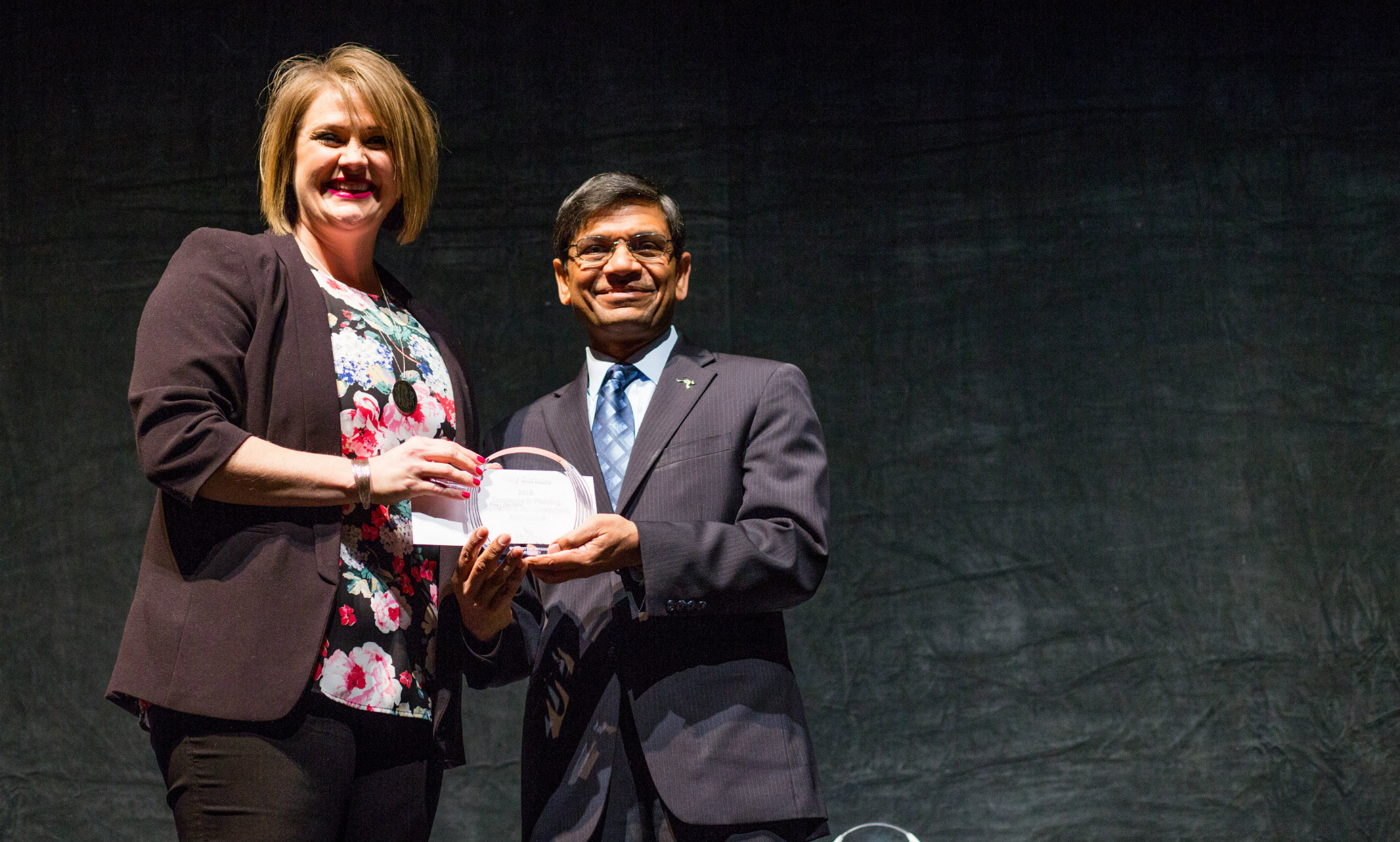
Love of people and numbers leads to staff award
One of the keys to academic success on the personal and university levels is good planning. Creating a process that enables students and administrators to chart paths to graduation, through the many complications that can sometimes arise, is not an easy task.
But Amy Carlson, associate registrar, has a gift for seeing process in her head, visualizing holes and forming ideas on how to fill them. These unique and essential skills led to an effective Degree Audit Reporting System for UMKC and the recognition of being awarded the Excellence in Planning, Operations and Stewardship Staff Award.
"This is the perfect job for me."Amy Carlson
“I very much believe that my mathematics education gave me the skills needed to think critically and look at most situations like a puzzle,” Carlson says. “I am definitely a visual person, but as much as I love numbers, I also love people. My master’s degree in college student personnel administration helped me to find my passion in education and help others to help themselves.”
Corrina Beck, senior academic advisor for the School of Nursing and Health Studies, recommended Carlson for the recognition.
“It seems as if this award had been created specifically for her,” Beck says. “Amy began in the Registration and Records Office nearly eight years ago and quickly became indispensable. She has worked tirelessly to ensure that the degree-audit system works without exceptions whenever possible.”
This attention to detail in developing accurate degree audits is essential to the new planning tool’s success. Carlson is often contacted by advisors across campus for assistance.
“Amy consistently provides excellent help and advice with these systems,” Beck says. “Her skillset and experience make her absolutely unique and invaluable to the university.”
Carlson did not know that her co-workers had nominated her for the award until she received the congratulatory call from Chancellor Mauli Agrawal.
“I felt a mix of emotions: excited, shocked, baffled, humbled and very grateful. This is the perfect job for me. I am able to use my love for numbers and people….and get paid!”
Jun 05, 2019
Chris Harris talks about his next endeavor with Startland News
Chris Harris teaming up with America’s car clubs is driving local community change efforts to a nationwide scale. He talks about this latest project with Startland News.
Jun 05, 2019
Tips from UMKC students and alumni
UMKC faculty are leaders in their fields — and they want to help you.
With a student-to-faculty ratio resembling a small private college, it's no surprise that UMKC professors know their students by name. Students find faculty supportive in their endeavors both inside and outside the classroom and many take advantage of the opportunity to seek them out as mentors.
For some, the idea of seeking out a mentor can be intimidating. It shouldn't be! Here are some tips from students and alumni on how they found their mentors at UMKC.
1. Look for someone who's already mentoring.
Ada Thapa and Ryan Mohan in a lab at the School of Biological Sciences
“Dr. (Ryan) Mohan believed in me and helped me become a scientist. He helps students like me who are trying to get into research but don’t have any prior experience. I got accepted to four different graduate schools for my master’s program because of my skills and experiences that I have learned from UMKC.” - Ada Thapa '17, Biology
2. Identify an expert in your field.
Chad Feather and Ben Williams talking in the Bloch Executive Hall
“It is important that your mentor has been where you are and can give you the pros and cons of each important decision you have to make. Also, it is important to find somebody who has a similar personality that allows you to relate to each other. Finding Ben (Williams) as a mentor has been extremely helpful in growing and developing at UMKC.” - Chad Feather '17, Business Administration-Marketing and Entrepreneurship
3. Work at building a relationship.
Sydney Harvey and Clancy Martin of the College of Arts and Sciences
“Make up excuses to go to their office hours, find research they can help you develop and constantly ask their advice about your work.” - Sydney Harvey, Philosophy '16, M.A. Theatre '18
4. Find someone who challenges you.
Ryan Holmes and Megan Hart of the School of Computing and Engineering
“A mentor isn’t someone who always cheers you on or focuses on your successes. They may do that, but more importantly, they will chip away at areas of your weaknesses and channel your strengths so that you can be the best version of you.” - Ryan Holmes, Civil Engineering '13 and '16, I.Ph.D. '18
5. Take initiative and pay it forward.
Mona Lyne of the College of Arts and Sciences and Parker Webb of the Henry W. Bloch School of Management
“Dr. (Mona) Lyne and I would not have our relationship today if I hadn’t gone above and beyond to hunt her down and get the opportunities that she provided. That said, if you’re looking for mentorship, mentor someone, too. There is nothing that will make you a better mentee than being a mentor and anyone can do it. I am a Big Brother with Big Brothers Big Sisters of Greater Kansas City and it is one of the most rewarding experiences I have ever had.” - Parker Webb, Political Science '14, M.S. Entrepreneurial Real Estate '18
Visit UMKC
Jun 03, 2019
KCTV 5 News
JEFFERSON CITY, MO (KCTV) -- Hundreds of workers and volunteers are helping out in Jefferson City, clearing paths through the debris to get to homes and businesses.Among them is a group from UMKC, because there's an academic interest in this tornado, too. Read more…
May 31, 2019
Startland News
As the number of teams left standing in the Enactus U.S. nationals started to dwindle, members of the competitive entrepreneurial development program’s team at the University of Missouri-Kansas City rode a pulsating wave of excitement and emotion, recalled Ali Brandolino. Read more…
May 31, 2019
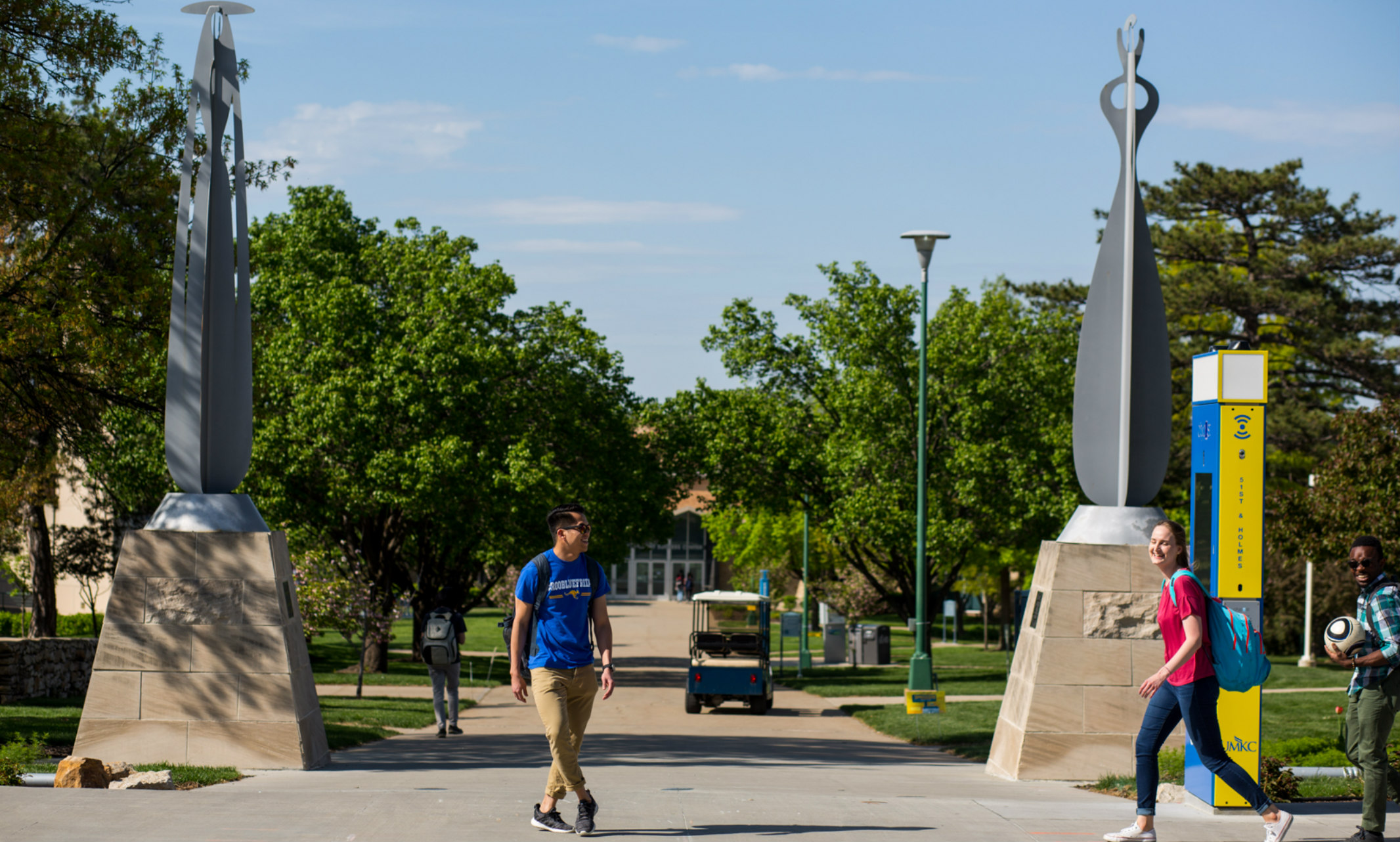
Resources for your protection
Enjoy everything our dynamic urban environment at UMKC has to offer and rest assured your safety is our top priority.
Campus Housing
All campus housing facilities maintain the highest level of security for students, such as UMKC ID card-swipe access into the buildings and a 24-hour front desk. UMKC also has its own police force, comprised of 30 state-certified officers, that covers both the Volker Campus and Health Sciences Campus at Hospital Hill.
Campus Police
If you feel unsafe on campus at any time, call UMKC Police directly at 816-235-1515 or pick up one of the blue emergency phones on campus and you’ll be connected directly to campus police.
Having car trouble? UMKC Police can assist with jumpstarts for dead batteries and can help if you locked your keys in your car.
Services provided by UMKC Police:
Personal safety escort (on campus only)
Motorist assistance (jumpstarts and unlocks only)
Property registration (electronics, bicycles and instruments)
Hostile intruder training
Safety presentations: alcohol, drugs, theft prevention, personal safety
Women’s self defense, hosted by the Kansas City Police Department (free)
Registration: 816-413-3500, 6835 N.E. Pleasant Valley Road
Fingerprinting: $15 per card
UMKC is a very low-crime campus. Theft is the most frequent offense, so here are some helpful tips from UMKC Police:
Keep your residence and vehicles secured at all times
Never leave your valuables unattended
Criminals love social media: watch what you post on social media; don’t mention when you’re going out of town
Campus Alerts
In addition to having a dedicated police force, UMKC also has its own campus-wide alert system. You may have automatically signed up for the UMKC Alert System (text, email, phone) when you submitted your personal information upon enrollment. If not, you can sign up for the alert system online.
UMKC also uses the free Rave Guardian app (available on Android and Apple app stores) which can transform your cell phone into a personal safety device. With this free app, you can create a virtual safety network, immediately connect with campus police and let others know you are safe.
Features allow you to:
Receive campus-wide safety notices
Communicate with your friends, family and coworkers
Set a safety timer–notify people you trust to check in on you if you are walking alone or in an unfamiliar place
Send a tip/message to police
Send pictures to police
Guardian can also provide police with GPS coordinates from your phone (if available), which can decrease response time and allow first responders to locate you should you not be able to give them your location
Download Rave Guardian App
May 31, 2019
Startland News
Gharib Gharibi is driven to succeed by a desire to pay it forward, he said, riding a high from his startup’s first-place, $20,000 win at UMKC’s Regnier Institute Venture Creation Challenge. Read more…
May 31, 2019
Fox 4 KC featured UMKC golfer and cancer survivor Sam Humphreys in a story highlighting his return to the golf course
KANSAS CITY, Mo. -- Overcoming the elements and the golf course Sunday was certainly a challenge for the Web.com players. But how about overcoming cancer?
UMKC golfer Sam Humphreys can laugh now, but last summer was no laughing matter. Read more…
May 31, 2019
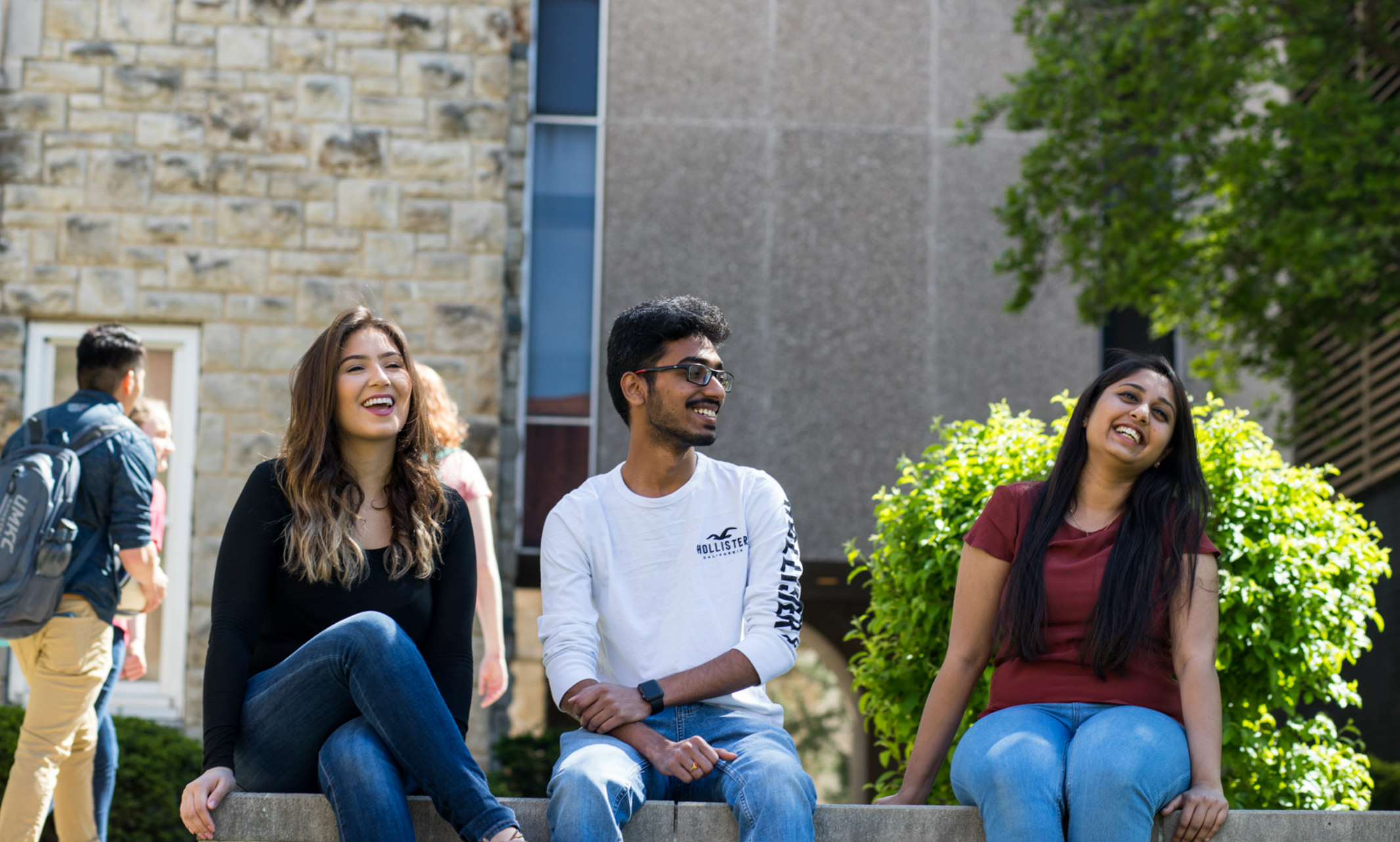
How I found my people at UMKC
Moving away from home and making new friends can be really intimidating. But forming new friendships is a critical part of college. And you don’t have to be really outgoing to have a social life. In my experience, these are some of the best ways to make and meet new friends on campus.
1. Get yourself out there by getting involved.
With more than 300 student organizations at UMKC, there are lots of ways to get involved on campus. Join different clubs, sororities/fraternities, sports teams or religious organizations that seem interesting to you. These settings are usually where students find a network of friends to be around.
To see the list of student organizations, explore our Roogroups page. You can also visit the Office of Student Involvement for more information on how to get involved.
2. Hang out on campus regularly.
Rushing to your car after class is probably not the best way to get to know others on campus. Go grab coffee at Jazzman’s in the Student Union or lunch at Einstein Bros. in Royall Hall. This is where most of the socializing happens, and it’s a great way to find opportunities to make new friends.
3. Attend as many school-related events as you can.
There is always plenty to do at UMKC. Look for flyers of on-campus events that interest you and go! Attending something you love with others creates a special bond and an easy way to start a conversation. I attended a lot of events on campus—even before I was officially a student here at UMKC—and that’s where I met most of my current friends.
4. Find an on-campus job.
Finding an on-campus job is a great way to get to know others. It gives you the opportunity to see familiar faces and finally get the chance to get to know them 1-on-1. Your coworkers can also be a great help to you in the future, whether you need a great reference for a job or help with school work.
5. Strike up a conversation any chance you get.
Whether it’s on the elevator or sitting and waiting for class to start, take the opportunity to talk to others around you. For example, we had to break into groups in my class and I did not know anyone in that class. I asked the student next to me if she would like to be my partner and now she and I are really good friends. If I never asked her to be my partner, our friendship probably wouldn’t exist right now.
Not everyone has the courage to speak to someone first. If that’s the case for you, then try using small tactics like smiling first to see if the person is approachable. The worst that can happen is not getting a smile back. Whatever is it is, it’s important not to get discouraged. With enough patience and confidence you can make friends anywhere and everywhere!
Visit UMKC
May 30, 2019
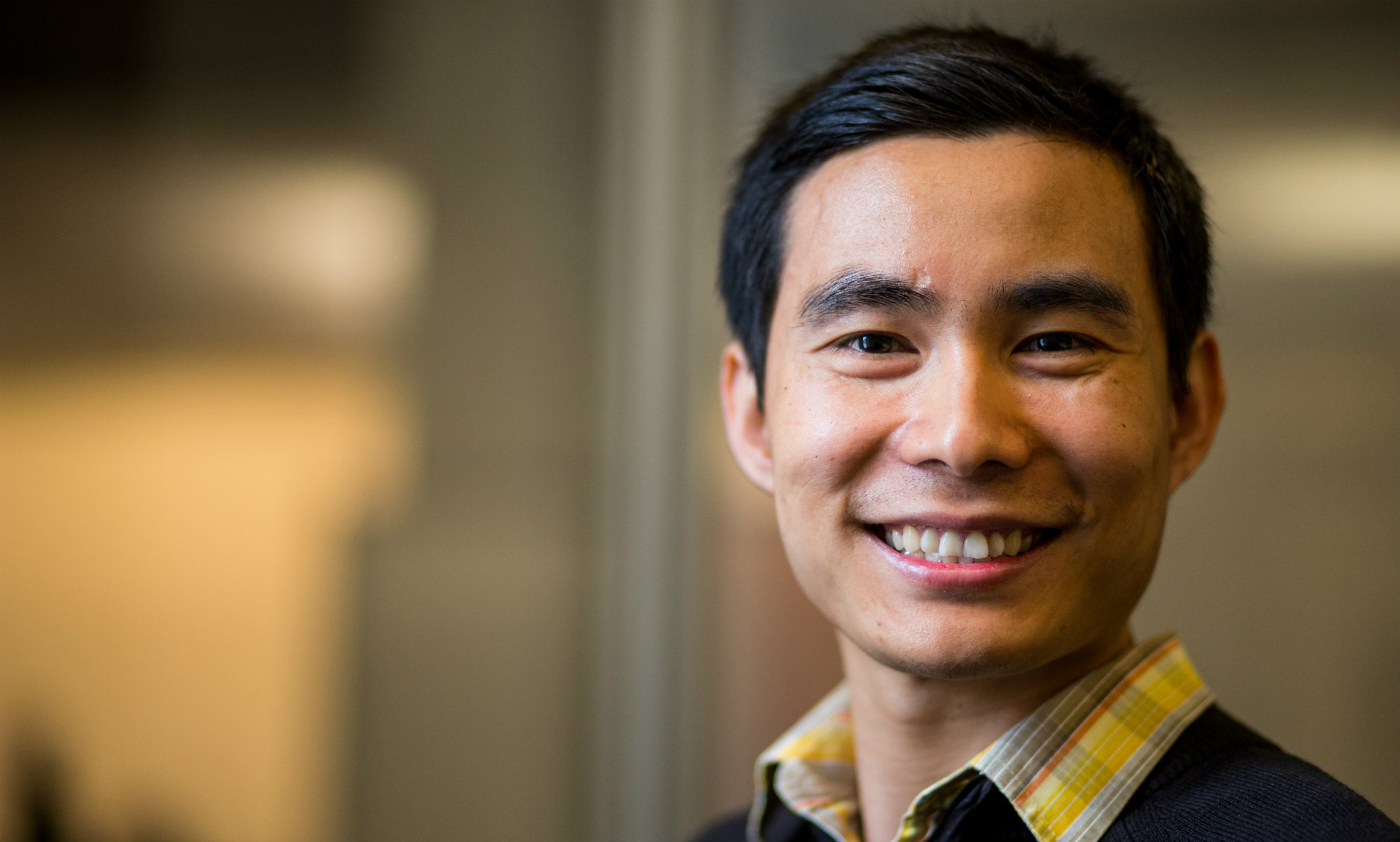
Ka Baw Say teaches us there is more to college - and life - than work and books
Ka Baw Say '22UMKC degree program: EducationHometown: Pa Loe village in Myanmar (Burma)High school: Number 3 High School in Karen refugee camp in Thailand
Get to know our people and you'll know what UMKC is all about.
Ka Baw Say immigrated to the United States when he was 19 years old with his older brother and sister. He was driven to improve his life and his education, but one of his greatest lessons has been making time to make friends and have fun.
"We wanted a good future,” says Say of him and his siblings. “Our parents did not come with us. They were worried, but they didn’t want to stop us. They wanted us to have a good life.”
Say is a member of the Karen immigrant community. Because of political unrest and civil war in his home country of Myanmar (Burma), he and his family were constantly moving. Say entered a Karen refugee camp in Thailand when he was seven years old. The following 10 years were a struggle.
“Living in the refugee camp was like animals living in their stables,” he says. “We did not have an identity. Lives do not really mean anything there.”
Say spent his first three years in Kansas City getting oriented, working and teaching himself English. He did not go to classes or use a tutor, but instead relied the internet. He learned very quickly.
“I love the language,” he said. “It’s so beautiful. It is like listening to the birds singing.”
Say worked, attended Metropolitan Community College and earned his high school equivalency certificate. When he felt he was ready he began to look for the best fit for college. He chose UMKC.
“UMKC is a place of diversity. I’m not afraid to express myself here. I needed to be in a place where I could be what I want to be.”
Say has been very involved with his niece and nephew. This led him to follow in his parents’ footsteps – who were teachers - to pursue a degree in education.
A student in the School of Education, he has secured teaching certificates in five subject areas and discovered a lot about his strengths and weaknesses during his student teaching. He feels that experience will help him do a good job.
Say is warm and often smiling. His eyes are bright and curious. While his story seems one of continued success, he says he struggled with making friends.
“I came from a place of one culture, one language, one color,” he says. “My country is not developed. People don’t travel in the same way. They all have the same perspective.”
He felt different when he came to the United States.
“In this country people seem so confident in who they are,” he says.
Say spent most of his time working and studying. The opportunity to initiate and develop friendships seemed inaccessible. But one day he stopped in the cafeteria and two students sitting a table asked him if he wanted some information on Phi Gamma Delta, a fraternity on campus.
“It changed everything,” Say says.
Joining the fraternity provided social connection; soon he began to develop friendships. Say realize that he needed more than school.
“I had been working so hard, that I had forgotten there were other things,” he says. “Then I realized these experiences were necessary for me to further my success. All the motivation and strength came from these connections. Everything seemed to move faster.”
Say will take his Missouri Education General Education Associate test in May. This will qualify him to teach in Missouri schools when he graduates. While he is still humble about his accomplishments, he recognized that he has learned so much on his journey.
“Be determined,” he advises. “Life is not simple and easy. Put yourself out there, challenge yourself and get to know your environment.”
But beyond the work, he has gained insight into what will drive his life’s success and he would like to share his story – perhaps by writing a book - so other people know that they can accomplish the same things.
“When you can be who you are, that’s when you’re perfect. Be a simple human. Simple, but perfect.”
May 24, 2019
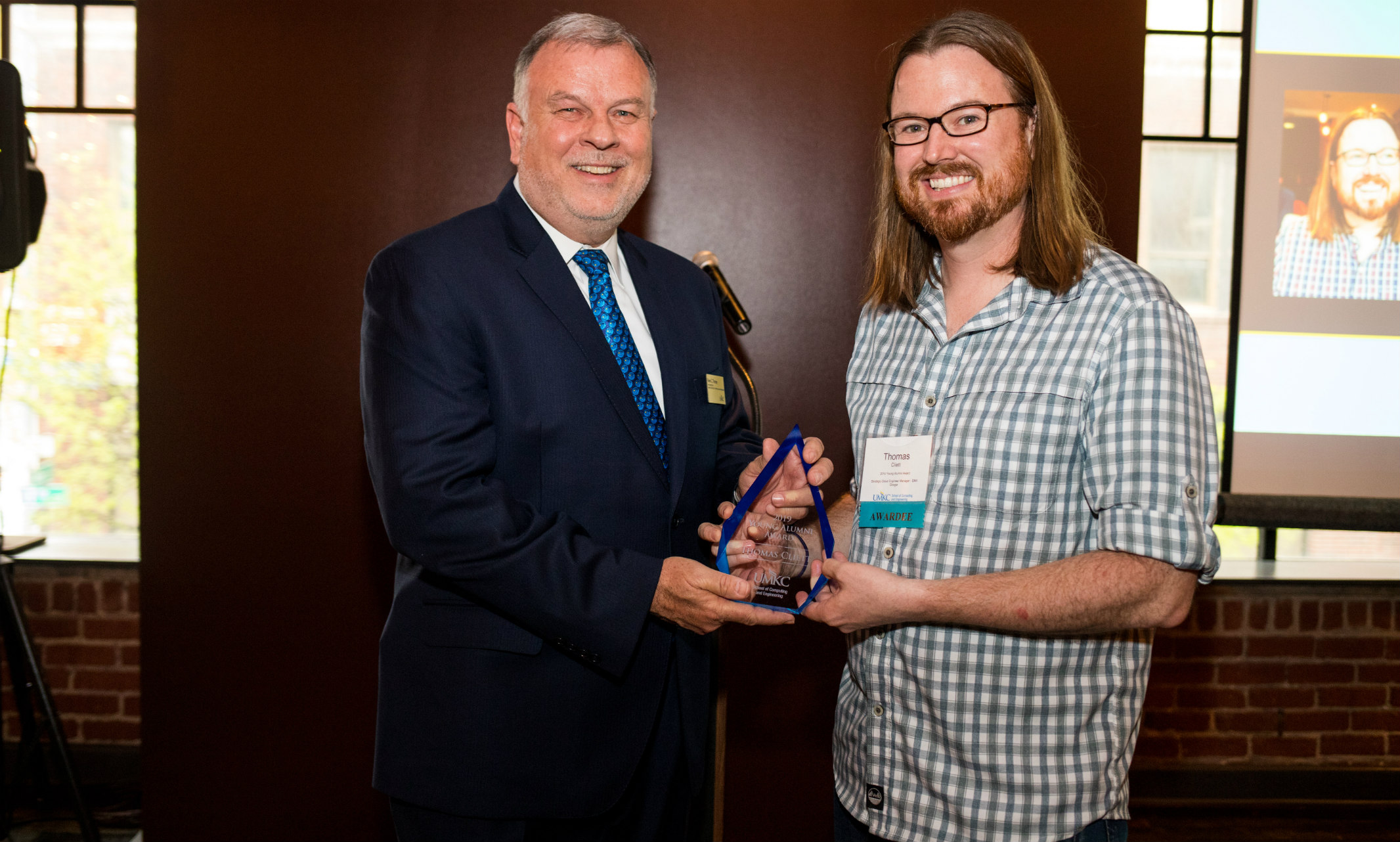
10 questions with Thomas Cliett (B.S.E.C.E. ’10)
School of Computing and Engineering Young Alumni Award recipient Thomas Cliett (B.S.E.C.E. ’10) credits his experience at UMKC as his initial motivation to advocate for diversity and inclusion in STEM.
Growing up in Beavercreek, Ohio, Cliett said he walked around blissfully unaware of how different his world was compared to that of his friends and fellow students, a mix of women and people of color. As a strategic cloud engineer at the Google France office in Paris, Cliett continues to volunteer and make conscious hiring decisions to help close racial and gender gaps in STEM.
Learn more about his journey from his hometown in Ohio to Paris, France. Roos are everywhere and Cliett sat down to share how he got there.
Why did you choose to attend UMKC?
I was working for Sprint at the time, and UMKC was the first school I visited. I was so impressed by the amount of time the school took to talk to me and help me decide on a degree that I stopped looking right there. Sprint paid for most of my school.
How did your relationships with faculty influence your success as a student?
The faculty at UMKC were amazing. I’ve attended three universities and the level of availability of UMKC faculty and their willingness to help students find interesting ways to engage is similar to what I expect from an excellent manager in my career.
The encouragement I received from Rhiannon Dickerson to participate in speech contests and develop my public speaking skills has been extremely valuable for when I’m giving C-level presentations and for being an effective technical speaker at conferences. Also, the work in neural networks that was encouraged and facilitated by Dr. Reza Derakhshani continues to influence my career decisions and my technical passions. I am currently building a smart-home control platform that uses tensor flow lite models to make decisions on controlling lights and heating in my house.
Finally, Dr. Cory Beard taught me a lesson about customer management that I come back to constantly in my career. He says at the start of each quarter that we pay the tuition so he works for us, and therefore he should do whatever it takes to make sure we get a good education in the area he is teaching. A variation of this phrase still shapes the way I think when working with both internal and external customers.
“Still today, I first ask myself ‘why are we proposing this approach?’ and if the answer is unsatisfying,‘is there a better approach?’ I thank Dr. Derakhshani for a lot of this acquired muscle in critical thinking.”
Who was your favorite professor and what did they teach you?
There’s a saying that goes “when you have a hammer, everything looks like a nail,” and working with Dr. Derakhshani really drove this point home. While the information I acquired in his class around machine learning and neural networks helped me to understand how many Google tools work fundamentally, the real lesson was to look for the right tool for the problem. In class and in the lab, Dr. D would consistently drive home the point with data and examples that we needed to suit our approach to the problem instead of the other way around. This simple lesson has made me a vastly superior engineer to the one I would be without it. Still today, I first ask myself “why are we proposing this approach?” and if the answer is unsatisfying, “is there a better approach?” I thank Dr. D for a lot of this acquired muscle in critical thinking.
What is your role at Google and what does it entail?
I manage an engineering organization. My engineers support all customer cloud deployments valued at $1 million a year or greater in Europe, the Middle East and Africa. My — fairly enviable — role is to hire the smartest people in the world and get the heck out of their way. Secondary to that, I set strategy regionally and globally. I find problems that need high-level engagement to solve and I solve them. I provide coaching to my engineering managers so they can build the strongest teams possible and I try to stay relevant as an engineer.
What is the biggest lesson you’ve learned so far in your career?
The most valuable thing I’ve learned is that everyone has a list of problems, the most valuable engineers are those who can bring and execute on solutions. This was true when I was an engineer individual contributor and it is true now that I manage an organization. In fact, I keep a list on Google Drive called “cool things we should do” where I add every problem I come up against that does not have a solution today. I share this list with my entire organization because I am definitely not smart enough to know all the answers. When I do know how to solve the problem, I take it off the list and own it from launch to landing. My team does the same. The net effect is our engineering team has a reputation for execution excellence and that makes me feel proud of them.
Briefly outline your career path and how it led to Paris.
I dropped out of my first university to join a couple of startups back to back. After a while, I got burned out and took a less stressful job managing phone technicians at Sprint stores and depots in Nebraska and Iowa, and then in Missouri and Kansas. That’s when I started attending UMKC.
2009 happened, and I was laid off like everyone else but decided to finish my degree at UMKC. After completing my education, the economy was still terrible so I decided to take another year off to travel around the world, and spend time with friends and loved ones.
Upon returning to the workforce I spent a brief time in design, verification and validation testing for a water treatment plant on a copper mine in the upper peninsula of Michigan. Shortly after, I moved to Dallas to be a sales and integration engineer for Operating Theaters with Stryker, Inc. The amazing part about this job is that I got to observe surgical flows during live surgeries, then design operating rooms around the way top-tier surgical teams work and finally see the results of my improvements to their physical space. It was a very rewarding role.
I moved to San Francisco to take a job with Google in 2013 supporting the largest websites that use Google Ads products. In 2014, that role took me to Washington, D.C. After doing that for two years, I wanted a new challenge so I interviewed to be a cloud engineer in London. Due to customer demand and my meager French skills I was offered a role in Paris instead, which I happily accepted. Since then I have grown from the manager of an engineering team to my current role as the head of an engineering organization.
“If you propose something contentious and you look around the room to see a lot of nodding heads, you probably don’t have enough diversity of thought in the room.”
You give back to the SCE often, especially in support of underrepresented groups. Can you detail more of your philanthropic activity?
The most tangible thing I do is contribute to the Doris Markham Swinney Endowed Scholarship, which provides scholarship support to women engineers. I also do some work to support historically excluded groups in and out of work:
Technovation mentor. Technovation offers girls around the world the opportunity to learn the skills they need to emerge as tech entrepreneurs and leaders. Each year they invite girls to identify a problem in their community, and then challenge them to solve it. In 2017, the team I mentored was a semifinalist in the Europe competition. I also mentored five teams in 2018.
Help the Women @ Leadership group design and implement programs meant to empower women in Google France and in France (non-Google)
Global Diversity lead for the cloud engineering organization
CareerGuru at Google
What inspires you to give back?
I have a dual motivation for giving back. As a white male from the Midwest in engineering, I spent most of my life blissfully unaware that there was actually a disparity between what the world looked like for me and what it looks like for others. Coming to UMKC and being in a classroom setting, and subsequently forming friendships with both black and female students really opened my eyes to my ignorance, and I have not been able to close them since. It offends my sense of fair play to have groups of people excluded not only by the biases of today but also because of the weight of historical bias.
My second motivation is because I want to live in a better world, faster. By almost any metric, teams with diverse opinions outperform teams without. Whether it is my engineering team at Google or a team working on the battery technology of tomorrow or an orchestra performing, I want every team to outperform. The first step in doing that is just having the voices of historically excluded groups added, and that starts with education.
“Be curious, learn more about the things you are curious about, and never think that your tech skills today will carry you all the way to retirement.”
What’s next in your career?
Retire? I just started my own business in France but I don’t intend for it to be more than a side gig, hopefully. I am pretty happy helping to drive change in the cloud organization in Google. If this ever becomes a more settled business like Google Ads, I will probably be looking for the next messy challenge where I can keep learning, failing and growing.
What advice would you give students looking to start a career in tech?
Luck is important but so is hard work. I have been handed a lot of great opportunities in my life that I squandered because I didn’t understand that.
If you propose something contentious and you look around the room to see a lot of nodding heads, you probably don’t have enough diversity of thought in the room. The day I go to a leadership meeting and we don’t fight about everything is the day I will go and hire someone with a fresh perspective.
Always keep growing. I have been lucky that I have never had the same job twice so I have been forced to acquire new skills regularly. Things I learned at my first two jobs still help to influence decisions I make today, but those tech skills are no longer valuable. Be curious, learn more about the things you are curious about, and never think that your tech skills today will carry you all the way to retirement.
May 24, 2019
KCultivator Q&A with Chad Feather who ventured to China and back, stayed for KC kindness, community
On May 24, Startland News featured Chad Feather in KCultivators, a lighthearted profile series to highlight people who are meaningfully enriching Kansas City’s entrepreneurial ecosystem. Read more.
May 24, 2019
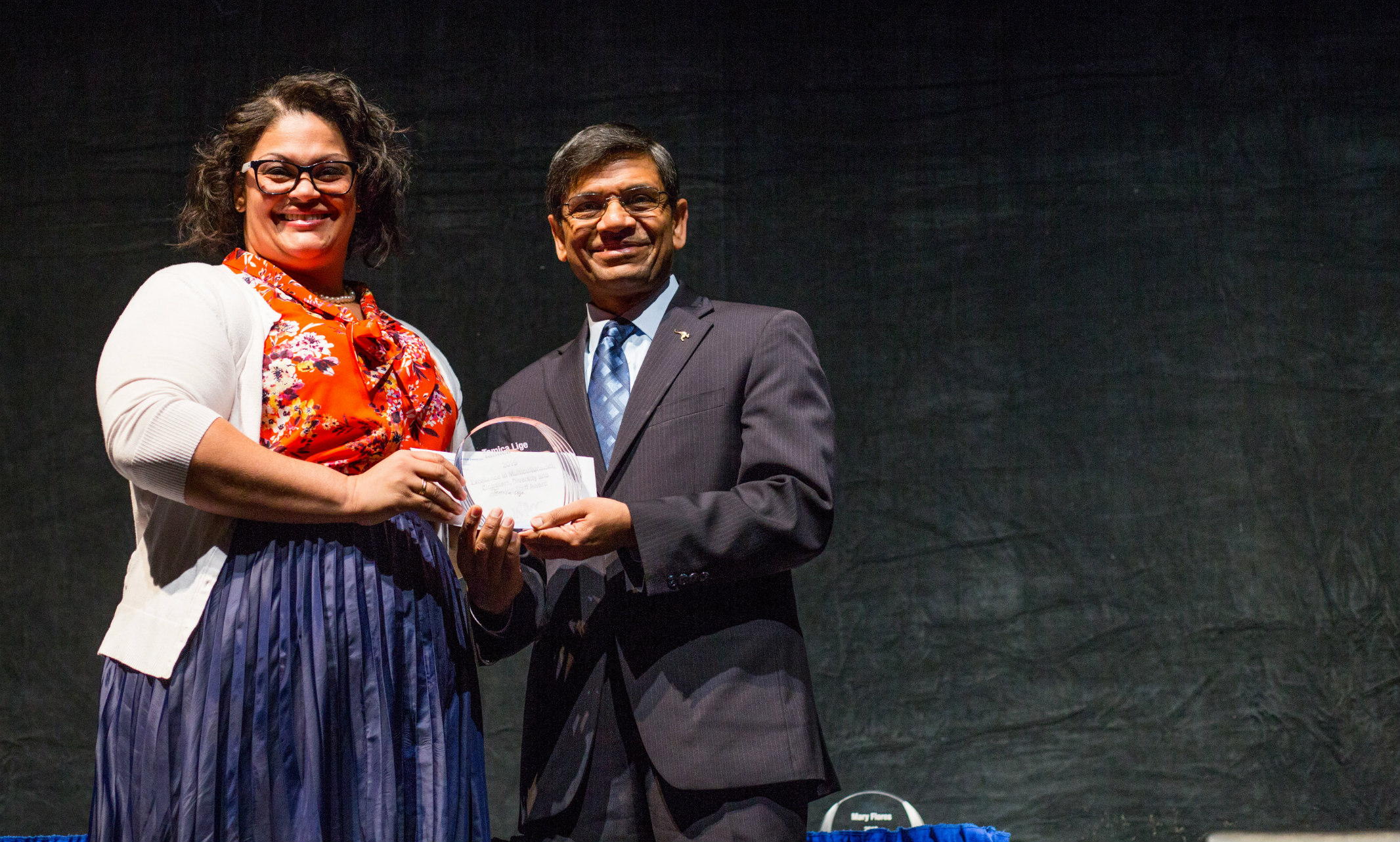
Staff Award recipient in multiculturalism encourages others to be uncomfortable in order to be able to grow.
The staff of the School of Pharmacy initiated Tamica Lige’s nomination for the Excellence in Multiculturalism, Globalism, Diversity and Inclusion Staff Award, but her support and influence across the UMKC campuses are broad.
“I am passionate about diversity and inclusion because I am passionate about people,” Lige says. “It might sounds cliché, but to me life is about the relationships and the connections we form with others. Diversity lends richness to our lived experience and helps us see the world through varied perspectives.”
Lige, who is the site coordinator in the School of Pharmacy, is an advocate for building relationships through collaboration and partnership across disciplines and organizations to develop stronger networks for underrepresented minority students and foster student success.
One supporter mentioned Lige’s ability to lead by example.
“She has a way with people that allows her to turn ‘ouch’ moments into teaching moments.”
Lige says she sees the value in an awkward encounter.
“We all have to get used to being uncomfortable and know that we will be better for it,” she says. “When we allow ourselves to be vulnerable, we give ourselves the opportunity to grow and learn. Diversity training is not the end all be all for change, but it is a good place to start. It positions people with the knowledge and tools to meaningfully and productively engage in difficult conversations, and liberates mindsets.”
“We each have to hold ourselves accountable for change.” – Tamica Lige
Lige believes that as an institution of higher education, UMKC has a responsibility to prepare students to exist in, navigate through and contribute to a diverse world.
“In order to affect attitudes and behavioral change, we must lead with empathy and create a space where everyone can be authentically themselves,” she says.
Lige was overwhelmed when she discovered her co-workers had nominated her for the staff award.
“When I found out that I had been nominated and selected, I actually cried,” Lige says. “Social justice work, while difficult at times, satisfies my soul.”
Lige hopes that her work will continue to foster broader understanding. While she notices that there is a core group of committed people focused on diversity, equality and inclusion at the university, she hopes their influence will spread.
“I would challenge students, faculty, staff and administrators to use the buddy system and bring at least one friend with you when you attend a diversity training or event on campus,” she says. “We each have to hold ourselves accountable for change.”
In addition, she encourages members of the community to step outside of their usual routines and interactions and get to know people who are different from them.
“Break out of your comfort zone and move through your environment in a way you never have before,” Lige says. “When people feel valued, respected, included and able to be their true selves, morale goes up, productivity increases and creativity soars. Diversity is everything.”
Lige knows that changes don’t just happen, but are the result of working with purpose.
“When you have genuine interactions with people different than you, amazing things start to happen.”
“Someone recently told me, ‘Your greatness does not come from what you have, but instead from what you give.’ I hope that what I give makes a difference. I am only a small pebble but even the smallest pebbles make ripples in the water.”
May 22, 2019
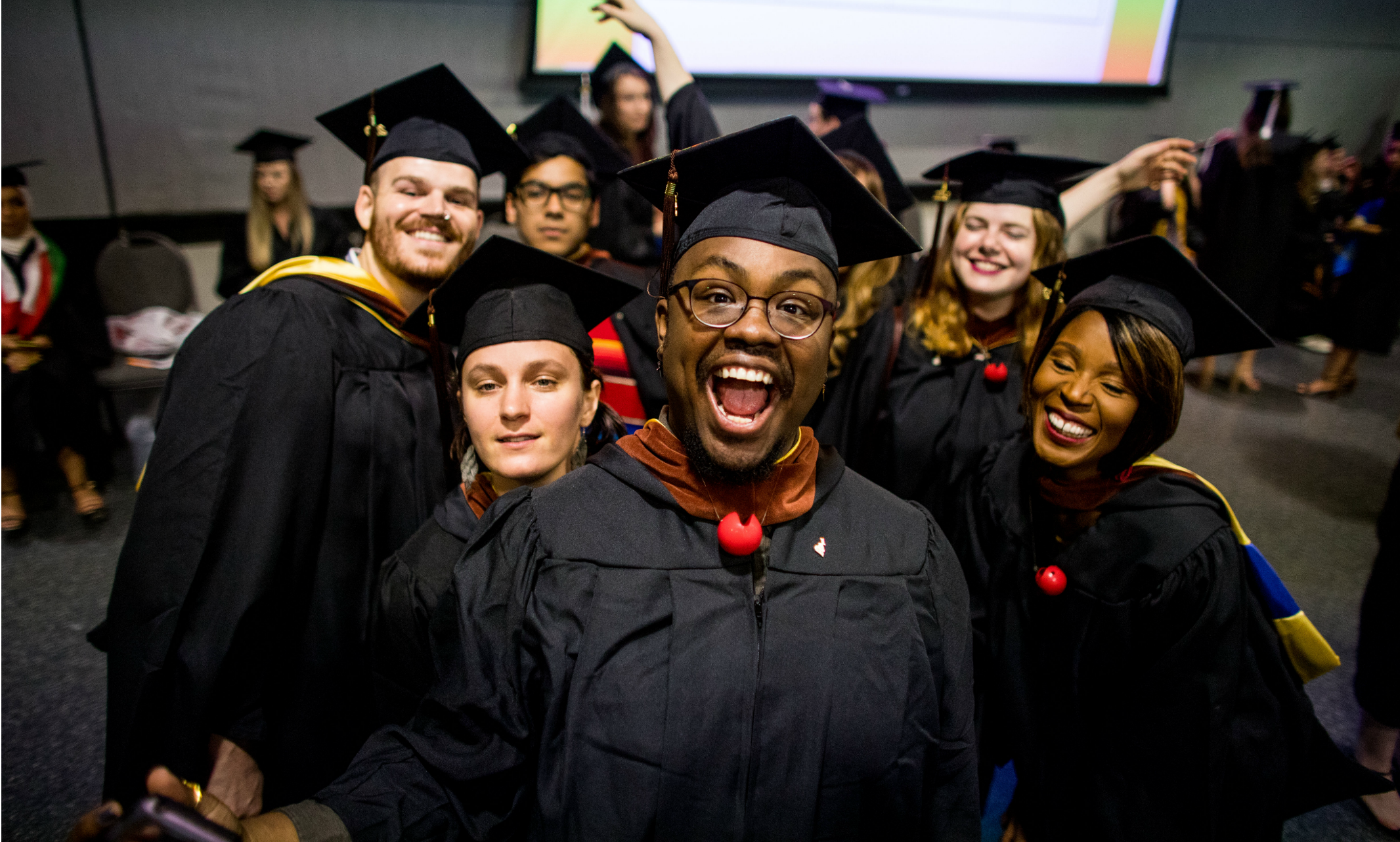
Class of 2019 graduates and KC native Calvin Trillin honored
More than 2,000 students received their UMKC degrees during end-of-year commencement exercises this weekend.
Over the course of 12 different ceremonies and a number of graduation events, we celebrated the class of 2019 and all their accomplishments. Here’s a look back at the month’s festivities.
Avanzando Year-End Celebration
Avanzando is a partnership between the Hispanic Development Fund (HDF) and the UMKC Division of Diversity and Inclusion that supports HDF Scholarship and Agapito Mendoza Scholarship recipients.
Students celebrate the end of the year at the Avanzando celebration. Photo by Brandon Parigo.
Multicultural Graduate Reception
Forty-four graduates were recognized by family, friends, mentors, faculty and staff on May 2. All graduates received a multicultural stole and first-generation college grads receive a "1st Gen ROO" lapel pin. The reception was sponsored by the Office of Multicultural Student Affairs, the UMKC Multicultural Student Organization Council, UMKC Student Affairs and UMKC Alumni Multicultural and Community Affairs Committee.
Students recognized during the 2019 UMKC Multicultural Graduate Reception.
Lavender Graduation and Pride Awards
Ninety people gathered to honor the achievements of 10 LGBTQIA+ students during Lavender Graduation on May 8. The event included a presentation of the Pride Awards, which recognized individuals who have contributed to the betterment of our LGBTQIA+ community at UMKC.
Congratulations to the following 2019 Pride Award recipients:
Outstanding Faculty/Staff Award: Sadie DeSantis
Jim Wanser Award: Todd Wells
Outstanding Alum Award: Samuel Lim
Collaborative Excellence Award: Multicultural Student Affairs
LGBTQIA+ Student of the Year: Trae Tucker
“Be of service to others. Try to understand what others are feeling. And connect to others all that you can. And you will most certainly have very good luck.” — Jim Lammers
College of Arts and Sciences Graduation with Distinction Luncheon
Butch Rigby, Arts and Sciences and Law alumnus, spoke at the luncheon recognizing students who earned Magna Cum Laude and Summa Cum Laude distinction. Rigby encouraged students to use their 20s to try new things, have adventures and find what they excel at, and then be responsible in your 30s.
Attendees at the Conservatory of Music and Dance commencement ceremony at Kauffman Center for the Performing Arts. Photo by Brandon Parigo.
Vice Chancellor for Student Affairs Honor Recipients
This program recognizes the exceptional students who maintain high scholastic performance while actively participating in university and community leadership and service activities outside of the classroom.
Anne Case-Halferty
Hanna Fiedler
Paige Husa
Elisabeth Laundy
Rania Mahrous
Cara Nordengren
Sierra Richard
Sarah Shin
Brandon Woods
Taylor Carter
Frances Grimstad
Jewel Janke
Annie Liljegren
Imran Mizamuddin
Brandon Ortega
Nikki Sherwood
Allison Spunaugle
“I was told by a high school counselor college wasn't for me. But here I am, a college graduate giving a commencement speech. Celebrate tonight. Wake up tomorrow and go change the world.” — Steven St. John
Commencement Speakers and Honorees
Spotted on Instagram, new grad Ravali Reddy, "Is it just me or is it one degree hotter in here?"
Speakers during the ceremonies included:
Diane Beatty, School of Biological Sciences alumna and vice president of regulatory and clinical affairs, Immunophotonics
Ingrid Burnett, Conservatory alumna and Missouri State Representative
Arif Kamal, School of Medicine alumnus and associate professor, Duke University
Jim Lammers, Computing and Engineering alumnus and president of Trinity Animations
Paula Peterson, Bloch alumna and vice president and director of strategy, finance and marketing, Commerce Bancshares, Inc.
Eric Schmitt, Missouri Attorney General
Steven St. John, College of Arts and Sciences alumnus and host of the popular morning show “Border Patrol,” 810 WHB
Jayson Strickland, School of Education alumnus and incoming superintendent, Hogan Preparatory Academy
Deborah Trautman, president and chief executive officer, American Association of Colleges of Nursing
"Be of service to others. Try to understand what others are feeling. And connect to others all that you can. And you will most certainly have very good luck," said Jim Lammers.
"I was told by a high school counselor college wasn't for me. But here I am, a college graduate giving a commencement speech. Celebrate tonight. Wake up tomorrow and go change the world," Steven St. John urged graduates.
UMKC also awarded an honorary doctorate to Kansas City native and New Yorker contributor, Calvin Trillin, an American journalist, humorist, food writer, poet, memoirist and novelist.
Longtime contributor for the New Yorker Calvin Trillin was presented with an honorary doctorate. Photo by Brandon Parigo.
May 20, 2019
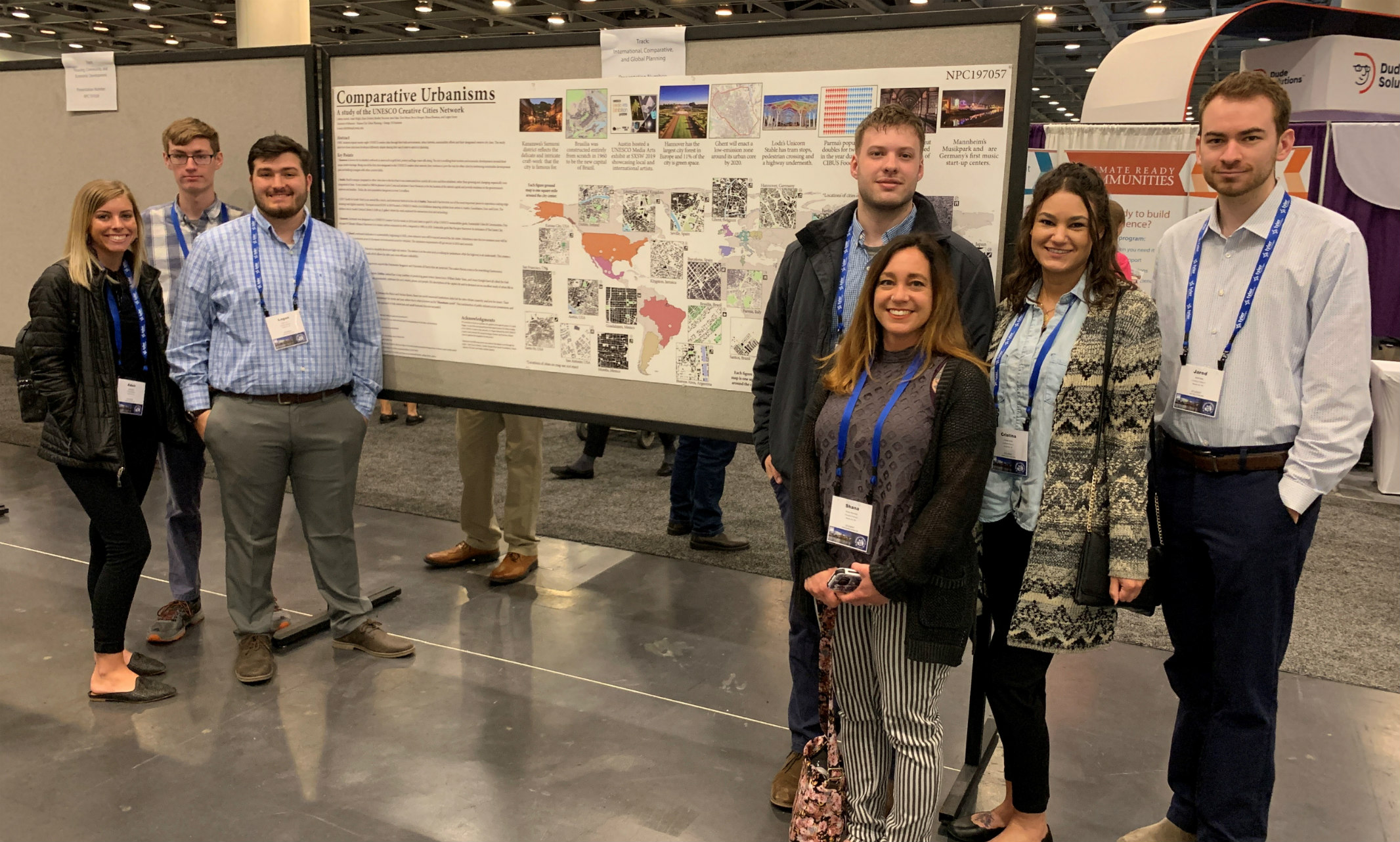
Project focused on international, comparative and global planning issues
A team of undergraduate students in Architecture, Urban Planning and Design at the University of Missouri-Kansas City took top honors for a research poster presented at the National Conference of the American Planning Association Conference in San Francisco, California.
The poster entitled “Comparative Urbanisms” was submitted and presented as part of the APA National Conference April 13-16. The research focused on international, comparative and global planning issues. The UMKC student research team included Jared Islas, Adair Bright, Logan Sours, Brad Hocevar, Bryce Morgan, Cristina Aurich, Thomas Meyer, Shana Shanteau and Ryan Deeken.
The UMKC students developed the poster from research completed in the fall semester of 2018 under Associate Professor Jacob A. Wagner, AICP. The assignment tasked students with a comparative analysis of three creative cities from the UNESCO Creative Cities Network.
The students compared the different elements of urbanism, creativity and sustainable development. Twenty-seven UNESCO Network cities were studied including Kansas City and each student reviewed sustainability policies and plans from the respective cities. Students learned about the 17 Sustainable Development Goals of UNESCO and how each city is working to implement these goals.
The mission of the UNESCO Creative City Network is to promote sustainable development through creativity. The seven areas of creativity recognized by UNESCO include crafts and folk arts, design, film, gastronomy, literature, media arts and music.
Kansas City joined the UNESCO Creative Cities Network in 2017 as the first City of Music in the United States. UMKC’s Urban Planning and Design program contributed to the development of the research that led to Kansas City’s membership in the network.
The student research was reviewed by several local professionals active in cultural planning and the arts, including Anita Dixon, cultural advocate and UNESCO Creative City coordinator; Anna Marie Tutera, executive director of the Kansas City Museum; and Sonié Joi Thompson-Ruffin, fabric artist and co-founder of the African American Artists Collective.
UMKC’s Urban Planning and Design Program prepares students for careers in urban planning and sustainable development through a rigorous curriculum accredited by the Planning Accreditation Board.
May 17, 2019
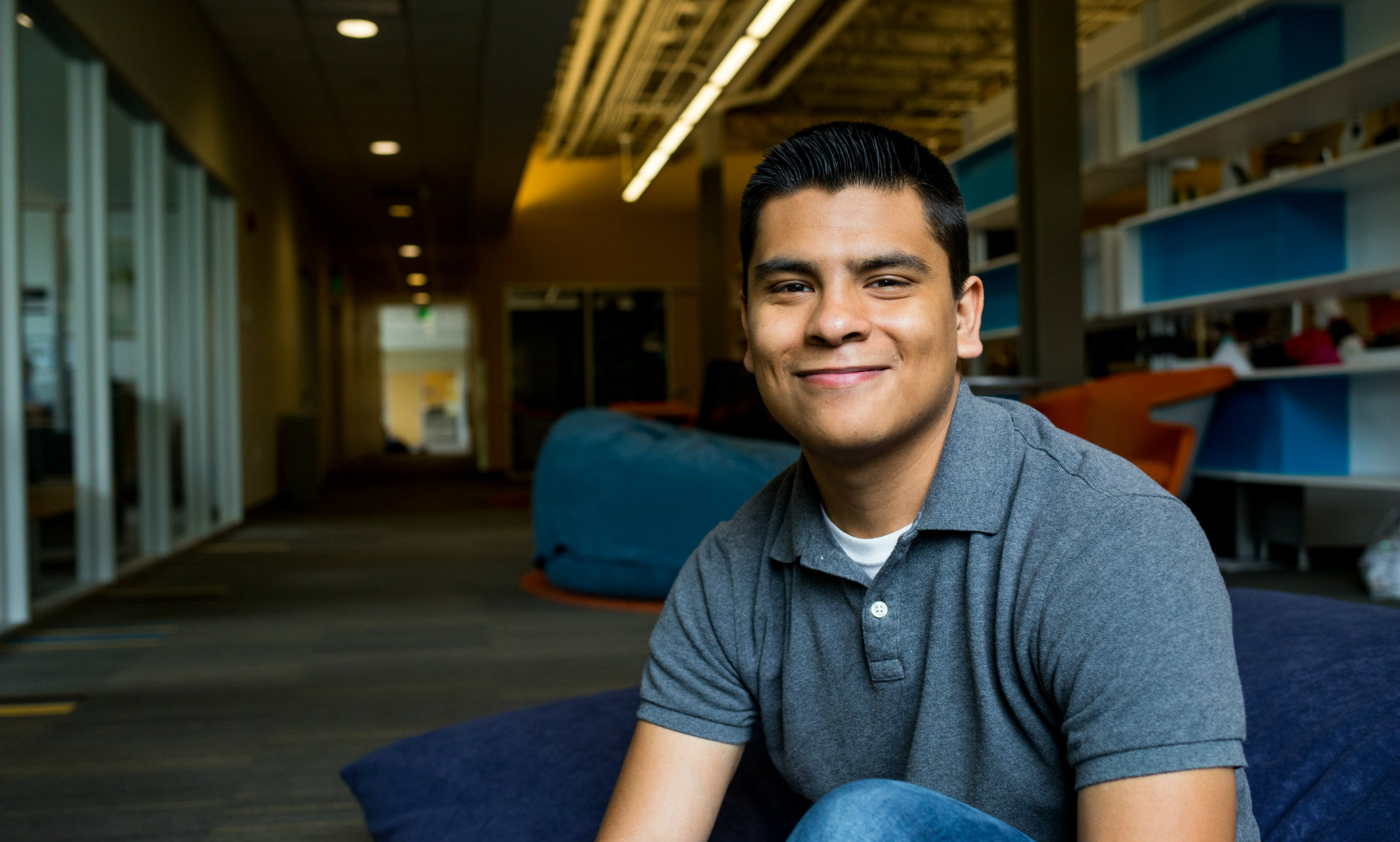
Jonny Gutierrez feels more educational attention should be paid to pre-teens
Get to know our people and you’ll know what UMKC is all about.
Jonny Gutierrez ‘19 Hometown: Liberal, Kansas High School: Liberal High School Degree program: Bachelor of Arts, History, College of Arts and Sciences
Why did you choose UMKC?
My brother was playing for Sporting KC's Youth Academy so he was already set up here. We would always come visit and I fell in love with Kansas City and got really interested in UMKC. I come from a small town and honestly wanted to get out of it. I took advantage of my brother being here and I moved in with him.
“I want to teach middle school…your education matters at this age. It leads you to what you’re going to do in your life.”
Why did you choose history?
I have always been fascinated by different kinds of history. As a kid, I was into books that had anything to do with history. As time changed, I slowly began to step away from it. I came to UMKC with a completely different path. I was going to go into the dentistry field and only minor in history. As I got more involved with history classes, I decided to take that passion I had for history as a kid and make it my major!
What do you hope to take from your experiences at UMKC into your professional career?
I want to become a middle school teacher someday, God willing. I feel middle school is often ignored. But your education matters at that age. It leads you to what you’re going to do in your life.
I want to teach history and shine a light on the things that don’t get enough attention. For example, the Latino civil rights movement in America, from the 1940s to 1970s. People fought for what they believe in. They fought for equality.
“I want to teach history. I want to shine a light on the things that don’t get enough attention.”
What are the benefits of the history program?
History is actually more challenging than people think. Being a historian means you have to constantly do research, so papers and essays are frequent in the history program. This means always looking for primary and secondary sources, which can sometimes be difficult and time consuming. Writing research papers has become my life.
One of the benefits is that because most history classes are not very big, you really get to know your professors. They all have done their fair share of research over the years, so they understand the struggles of it and are always more than happy to help and it helps in building connections and relationships with them.
Are you a first-generation college student?
Yes, I am, which was a bit hard in the beginning because we really didn't know how the whole college process worked. Being a first-generation college student puts more pressure on you, but in a good way. It makes me push myself to inspire others who will come after me and to make my parents proud of the sacrifices they have made to give me a better life.
What do you admire most at UMKC?
This might be a bit cliché, but I really admire the diversity at this school. Being Mexican American, I feel extremely welcomed, and it motivates me more because I know I have different kinds of support behind me and that means the world to me.
You seem to be in a lot of extracurricular activities at UMKC.
I am on the executive board for the Association of Latin American Students (ALAS) and a scholar in the Avanzando Mentoring Program. ALAS has helped me get to know fellow Latinx students on campus and about different Latinx cultures. Thanks to the group’s leader Iván Ramirez, Avanzando has provided me with different resources and has helped me meet and network with some amazing people. Being in the program motivates me every day. Both ALAS and Avanzando have ultimately helped me find a family here on campus!
“Being a first-generation college student puts more pressure on you, but in a good way. It makes me push myself to inspire others.”
Do you have any scholarships?
I am a recipient of the Chancellor's Historically Underrepresented Minority Scholarship that pays my out-of-state tuition. This scholarship helps in showing that UMKC cares about and believes in the education of minority groups.
May 15, 2019
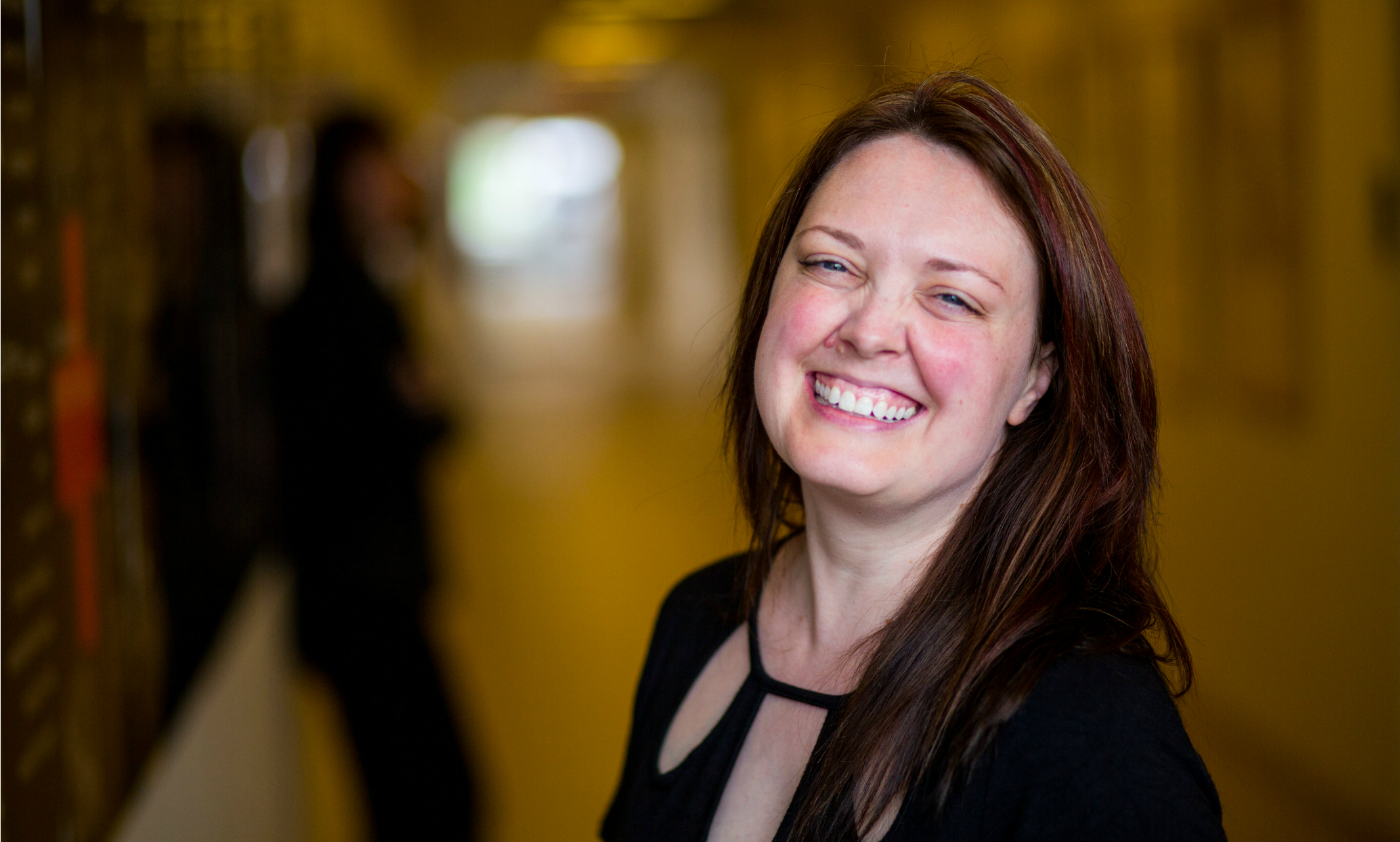
School of Nursing and Health Studies advisor puts students first
“Students are at the very center of everything we do at UMKC,” says Corrina Beck, academic advisor, School of Nursing and Health Studies and recipient of the Excellence in Student Success Staff Award. “I want the students to know they are not just a number to me or anyone else here, and I want them to treat people the same way when they go out into their various health fields.”
Beck’s co-workers nominated her for the award because they see her go above and beyond with each student with whom she comes in contact. They recognize that her focus makes the difference during her interactions with students.
“We worked together in the admissions office, and she made sure that every student that she admitted felt cared for and was treated professionally,” says Jennifer Lyles, academic advisor for the School of Nursing and Health Studies, and one of the people who nominated her.
Admired for her warm and professional approach to students and the tasks at hand, Beck is dedicated to helping students in the School of Nursing and Health Studies plan their paths from enrollment to graduation. A member of the Advising Leadership Team, Beck also provides feedback to the university’s Student Affairs and Enrollment Management team from the student perspective.
Beck thinks that it is important to tune out the background noise for the time she is with students.
“The students I advise have my complete attention.” Corrina Beck
But Beck has not focused only on her work. She recently completed her Masters in Higher Education Administration. She is grateful that she had so many people support her in her efforts.
“I have an amazing support system, both at work and at home,” she says. “My family and friends knew how important it was to me to finish my masters, so they helped in every way they could to limit distractions at home and, yes, to listen to me vent when I needed it. My coworkers and supervisor were incredibly supportive, as well, and were so flexible with me. I feel really lucky to have such many amazing people in my corner.”
Beck was humbled and honored when she learned her co-workers had nominated her for this award.
“There are so many talented people working here who deserve awards, and to be considered for one of them left me speechless—and anyone who knows me knows that I am rarely speechless!”
Hunt thinks there is no one more deserving of this award.
“At times Corrina is not only an advisor, but a therapist, coach, friend or like a close family member. She provides a level of mentoring that is unequaled at UMKC.”
May 14, 2019
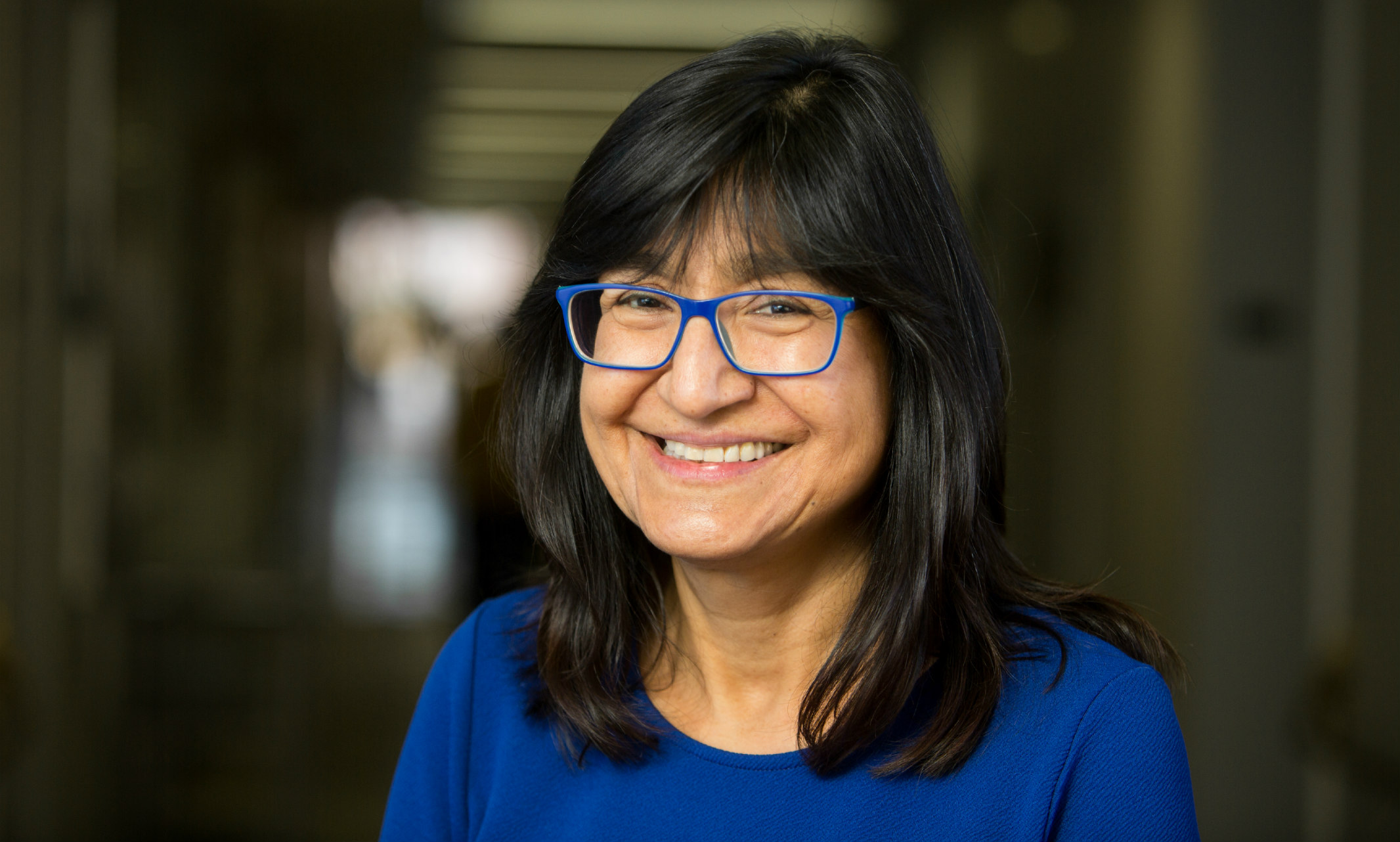
School of Biological Sciences faculty nominated Mary Flores for attitude and aptitude
Mary Flores is a stable force amidst the swirl of activity in the administrative offices of the School of Biological Sciences. Flores’s nominations for the Chancellor’s Staff Award for Extraordinary Contributions included submissions from Dean Theodore White and Marilyn Yoder, head of the division of cell biology and biophysics.
But most notably, the school faculty wrote a letter to support her nomination. It stated: “The page restrictions for this letter prevent us from offering a complete expression of our gratitude for Mary’s contribution to our work efforts.” An unsolicited letter from a student thanking her for her kindness was submitted with her application as well.
“I was very surprised to get a call directly from Chancellor Agrawal informing me of the award,” says Flores, senior business support specialist in the Division of Cell Biology and Biophysics. “I initially thought that perhaps he was looking for the dean or division head.”
"I love that my job is so diverse." Mary Flores
In his call, Chancellor Agrawal mentioned that he had never seen so many signatures on a nomination letter. While Flores feels that she is not going over and beyond what is expected at SBS, her co-workers do not agree.
“Of any faculty or staff we have met, Mary is the most positive and optimistic person,” says Dean White. “She is an extraordinarily unselfish employee. Her focus on students, education and the needs of the faculty is inspiring and motivational to those around her. She is a wonderful ambassador for our university.”
It is Flores’s optimistic attitude that shines through each of the nominations. The words “best” and “helpful” appear again and again.
“I love that my job is so diverse,” says Flores. “When there are questions, I try, to the best of my ability, to answer whether by phone, email or personally – my door is always open. If I don’t know something, I know who to call or email to get an answer as quickly as I can.”
This is just the mindset that her colleagues admire.
May 08, 2019
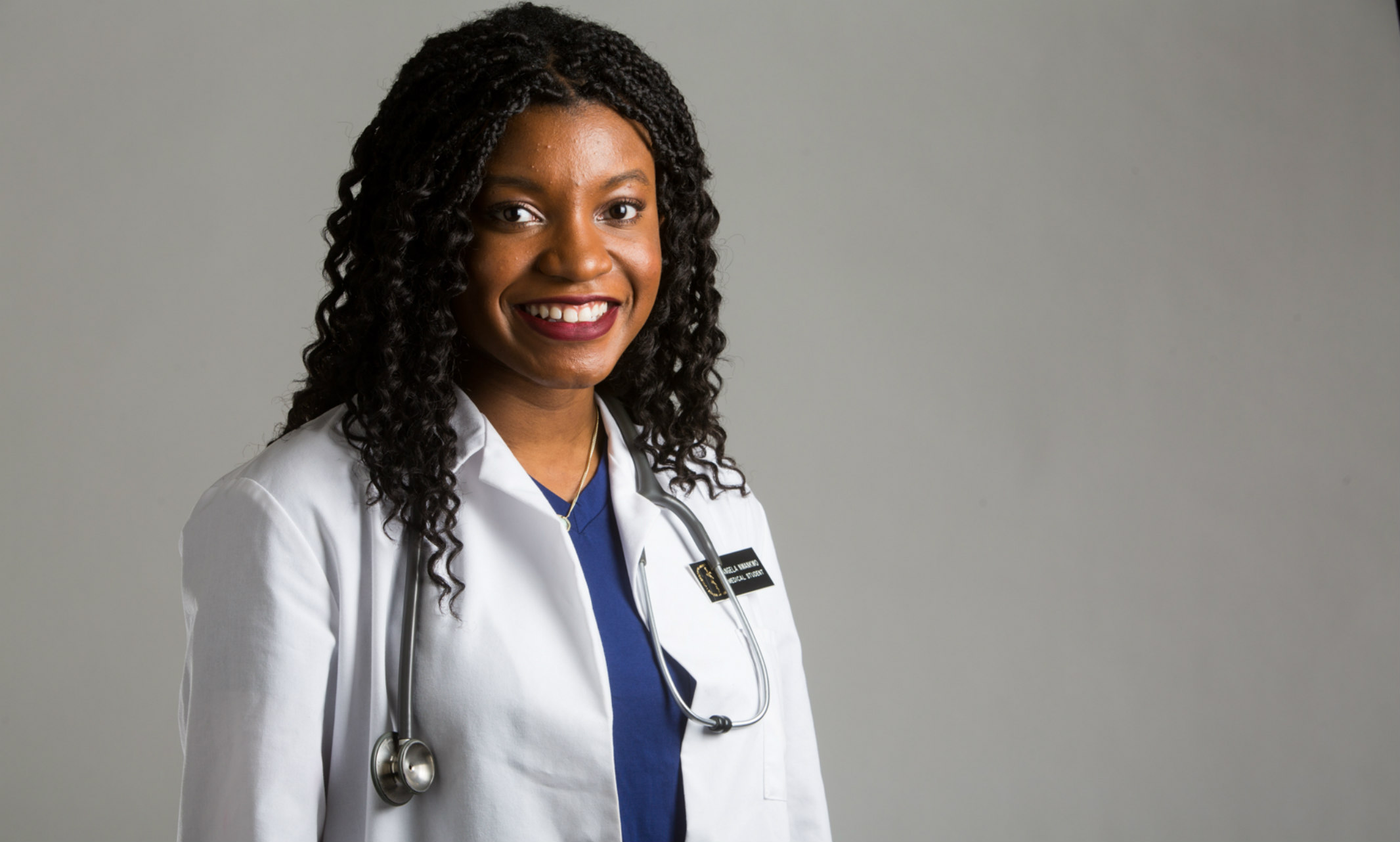
Angela Nwankwo thrives in the innovative program
Get to know our people and you’ll know what UMKC is all about.
Angela Nwankwo Hometown: Oklahoma City, OklahomaHigh School: Putnam City North High SchoolUMKC degree program: Combined B.A./M.D. Program, School of Medicine
Why did you choose UMKC?
The biggest reason is because I was accepted into the accelerated medical program right after high school. Who could turn down getting into medical school right after high school? More importantly, I knew without a doubt that I wanted to become a physician. The closest combined medical program to me was UMKC and I wanted to stay closer to home, in addition, there was no MCAT requirement and you get clinical experience within the first two weeks of the program, that’s something that no other medical programs can guarantee!
Why did you choose to study medicine?
Ever since I was a child, I knew I wanted to be a doctor. I think of my pediatrician and what an impact he made on me. He cared for people, and now I, too, have the privilege of caring for my patients on a daily basis. It's very exciting to make a positive impact in the lives of my patients. It's extremely rewarding, and I consider time with each patient absolutely priceless. Medicine exists at the intersection of country, culture, race, and finance. Studying medicine provides me with the unique ability to make an impact on a global scale– whether it’s international medicine, healthcare policy, quality assurance, disaster relief, educational reform, or being a community leader. I am filled with hope for the future of medicine and its interdisciplinary aspects which fuel my strong desire to make an impact in medicine as a Nigerian woman in America. Overall, I know that medicine is the perfect fit for me! I truly cannot see myself doing anything else.
"Who could turn down getting into medical school right after high school? I knew without a doubt that I wanted to become a physician."
What are the challenges and benefits of UMKC’s accelerated program?
We’re young, and this is both a benefit and a disadvantage. We get to graduate early, but we are also forced to grow up fast. We have to come in at such an early age and commit to the practice of medicine. The good thing is that you can find out sooner if this field is really not for you — and if you love it, you get to go all in to start your career. The path to becoming a doctor is quite sacrificial and can be a long road. My classmates and I have to embody a sense of selflessness in our pursuit to help others because we give up a lot! It’s not easy to be in the library, but see all your friends on the beach.
Another benefit is that we get a lot of clinical experience. We are learning medicine and shadowing doctors at the same time. We get exposure to experiences other medical students at different schools don’t have for years. Also, I am surrounded by peers with like-minded goals. In school, it is good to have a supportive community of friends and classmates, so it helps that we all work hard and study together!
Since entering college, what have you learned about yourself?
I have learned to strive for progress not perfection. That way I push myself to become the best version of me possible. In this way, I believe that I have grown wiser, stronger and closer to God. I have learned more about where I see myself in my future profession and how I function best as a student. Throughout middle school and high school, I was involved in a large variety of extracurricular activities and I believed that this helped me to better balance my schoolwork. I thought in college this would change, but I quickly learned that it is just my nature to be super involved in school while staying engaged in my studies. I love staying busy!
"We get exposure to experiences other medical students at different schools don’t have for years."
What’s the best piece of advice you have ever received from a professor?
“Well done is better than well said.” It is easy to talk about your dreams and wishes, but it is another thing to go after them and achieve them. We have a lot of opportunities in America to explore different things that interest us and a lot of resources at our demand, these should be taken advantage of. There is not another time in your life quite like your young adult years, there is no better time than now.
What do you admire most about UMKC?
The community at UMKC is awesome. There is a diverse group of students on campus and a lot of cultures represented. You can learn a lot from everyone you meet. The faculty here are very supportive. At the medical school, they really care about each student’s success and well-being. There are a lot of programs and initiatives held at the requests of students, so I like how administrators really value the input of students. I cannot think of one interest I’ve had that I have not been able to explore at UMKC, from learning Spanish and French, to doing research!
"Well done is better than well said."
What’s your greatest fear?
My greatest fear would be not making an impact in the world during my lifetime. I want to make a change through advocacy, philanthropy, engaging or influencing society. I know that I am more fortunate than others with the opportunity for education, so I want to use my privileges to help others who do not have them.
What is one word that best describes you?
Blessed. It is an honor to be where I am, studying to achieve my dreams. Not everyone has this opportunity, so I never take it for granted. I have always nurtured a strong desire and determination to succeed, and this is something my parents have instilled in my siblings and I from a young age. I believe being Nigerian contributes to this because Africans as a whole tend to have high aspirations for their families.
May 08, 2019
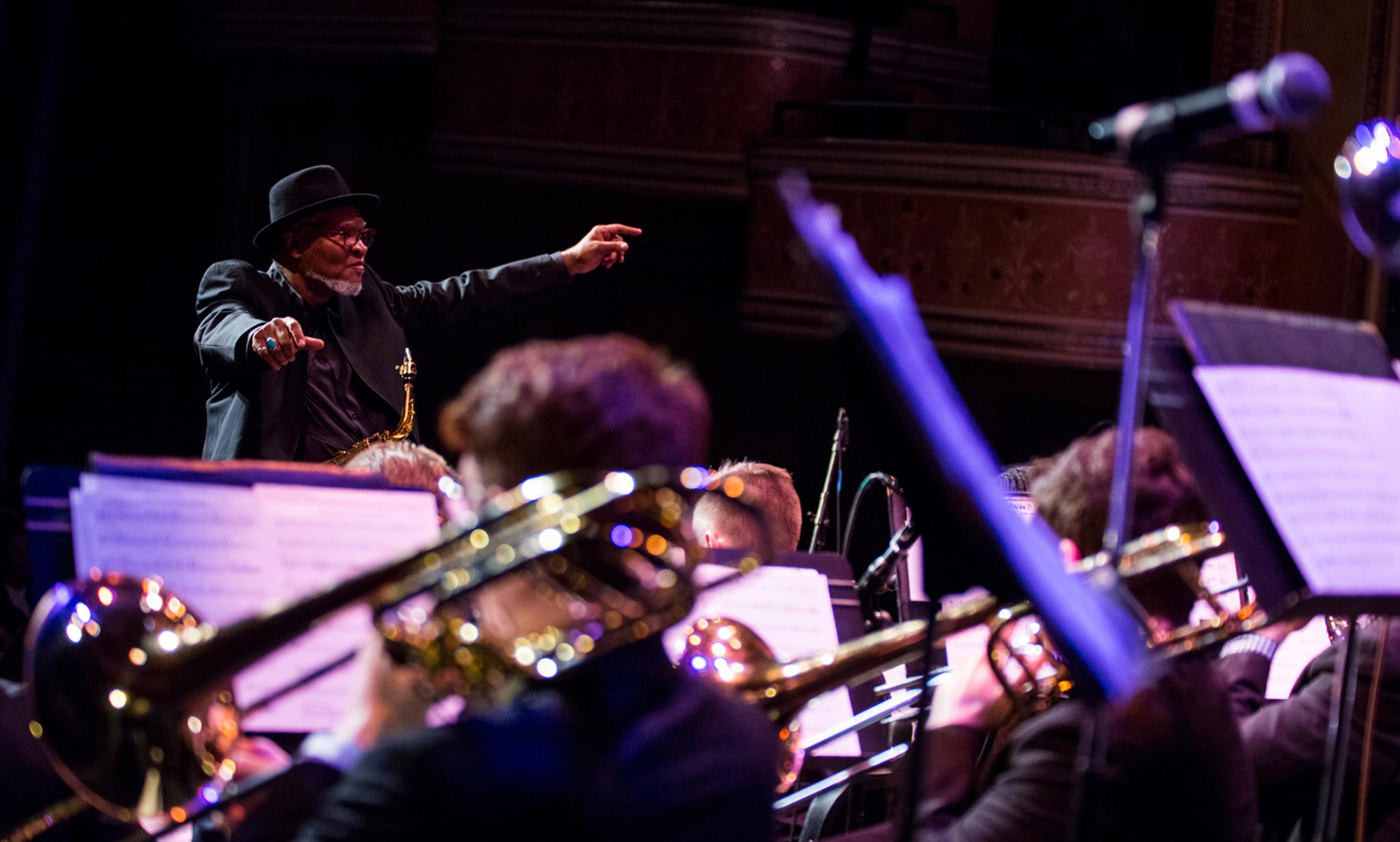
Jazz Studies Co-Coordinator Bobby Watson to serve next as UMKC ambassador
Jazz students at the UMKC Conservatory of Music and Dance put on a lively show at the annual Jazz Night performance at the Folly Theater in downtown Kansas City.
Bobby Watson and Mitch Butler, co-coordinators, led the students through several pieces that showcased the caliber of the Jazz Studies program. Christian Swan, senior, says the event is one he will never forget.
“As a graduating senior, this event has provided me with the opportunity to play in one of the premiere theaters in Kansas City,” Swan says. “Jazz Night at The Folly has given me the chance to play on the same stage as some of my heroes and create music in an environment that prepares me for a career in performing.”
For many of those students, Bobby Watson, a world-renowned jazz musician, is one of those heroes. At the event, Watson announced he will spend his last year (the upcoming 2019-2020 academic year) as the William D. and Mary Grant/Missouri Professor of Jazz Studies and co-coordinator of Jazz Studies serving as a Global Jazz Ambassador for UMKC. During this time, he will travel and perform throughout the world, promoting UMKC, The Conservatory, and the Jazz Studies Program.
“We are grateful to UMKC leadership for supporting Bobby in this ambassadorship,” says UMKC Conservatory Dean Diane Petrella. “This is the perfect way for an artist of his caliber to celebrate twenty years of commitment to jazz in Kansas City.”
Here's a behind-the-scenes look at Jazz Night 2019.
“Jazz Night at The Folly has given me the chance to play on the same stage as some of my heroes and create music in an environment that prepares me for a career in performing.” – Christian Swan, senior
“This is the perfect way for an artist of his caliber to celebrate twenty years of commitment to jazz in Kansas City.”
– Dean Diane Petrella on Watson's new role as ambassador
May 03, 2019
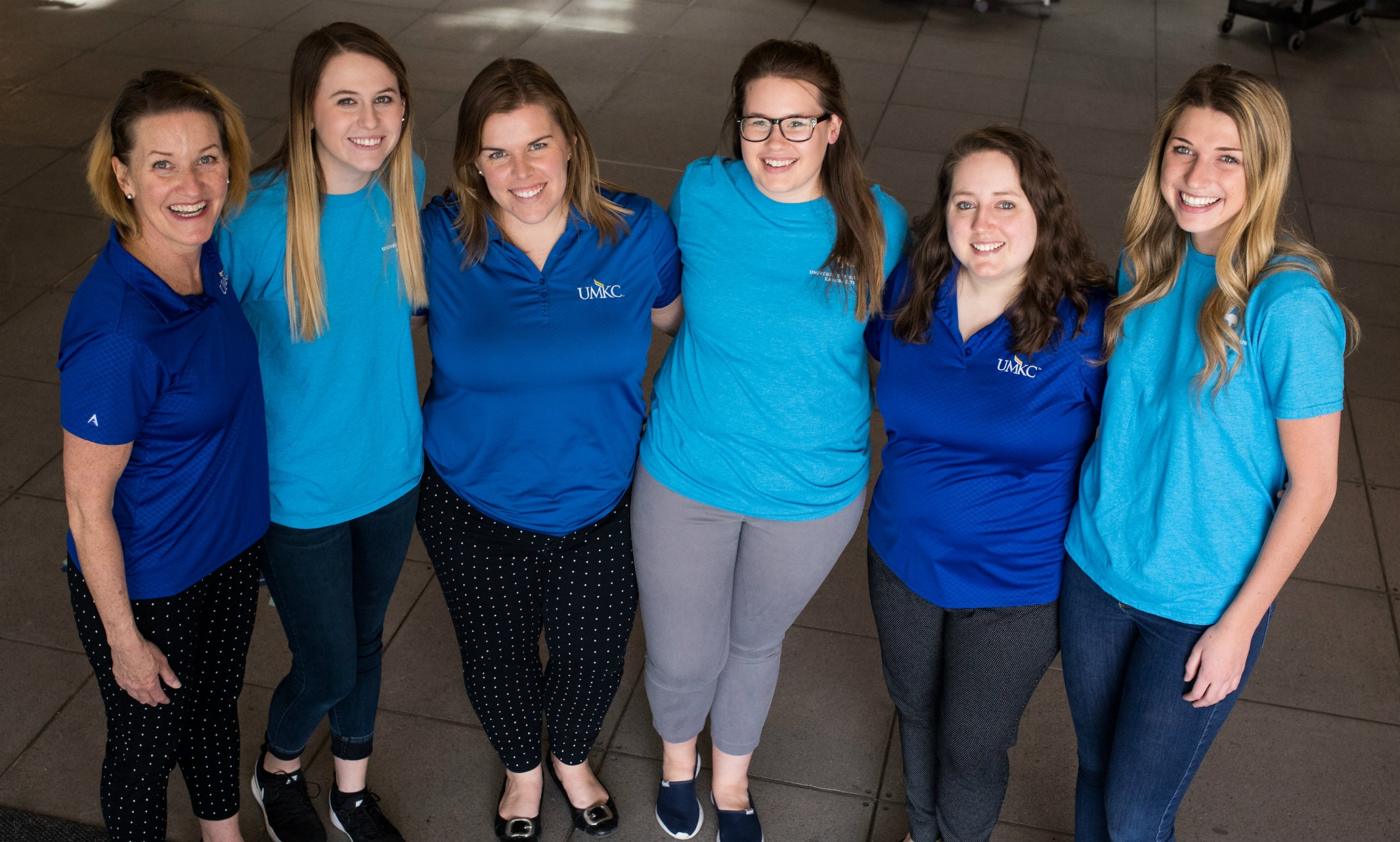
Erin Christensen focuses on the big picture to build relationships with potential employers for UMKC students
The most successful and influential project leaders tackle the task at hand by going beyond expectations. Erin Christensen excels at maintaining and enhancing existing relationships and programs while developing new ones. She continually identifies and cultivates new opportunities for students at the Henry W. Bloch School of Management and beyond.
“Erin is an extraordinary collaborator,” says Maggie Reyland, professional career manager at the Bloch Career Center and one of Christensen’s nominators for the Excellence in Engagement and Staff Outreach Award. “She identified an opportunity to collaborate more closely with the School of Computing and Engineering and from there we now have a robust Business, Computing and Engineering Fair each semester that continues to grow.”
Christensen, manager employee relations and outreach at the Bloch Career Center, thinks it’s important to be innovative and forward thinking.
“It can be easy to get caught up in the details, but that really isn’t what the bigger picture is about,” Christensen says. “For me, this way of thinking is critical for success with building relationships. I want to make sure that we are strategic with our resources internally and sometimes that means collaborating with another academic unit outside of the Bloch School, so continuing to build those relationships and being a collaborator is important.
"Sometimes it might be easier if I try to do something myself, but what fun is that?" Erin Christensen
Additionally, I want to make sure that the companies we are engaging with are relevant to the needs and goals of our students, so thinking more strategically about identifying who they are and how we can connect with them continues to be a priority.”
The Bloch School recently introduced Launchpad, an honors program designed to attract and retain high-performing students. Christensen took it upon herself to write a more detailed program proposal, which outlines programs expectations for students and marketing opportunities.
“Erin volunteered to take the lead on the career engagement piece for Launchpad,” says Tess Surprenant, director of the Bloch Career Center. “This program will have a strong experiential learning and career development component. Erin is working with local employers in all sectors to build internship programs and provide varying levels of engagement.”
It is these types of collaborations that excites Christensen.
”Sometimes it might be easier if I try to do something myself, but what fun is that? I love working with people and connecting people, so maintaining strong relationships and going above and beyond comes easy to me,” she says. “Personally, I love the feeling of leaving a meeting with someone I just met and knowing that there is a future with them and UMKC and I made that happen.”
May 01, 2019
On KCUR: UMKC Enactus student Andrea Savage and professor Ben Williams
A group of UMKC students is working to redirect food waste so it can feed hungry Kansas Citians. Read more
Apr 30, 2019
From KCUR: Volunteers helped get people on the path to having clean criminal records
Volunteers at Code for Kansas City and the law school at the University of Missouri-Kansas City started the “Clear My Record Expungement Project.” Saturday was “Expungement Day.” Read more
Apr 29, 2019
In Kansas City Magazine interviewed Steve Kraske
The people I admire most? My students at UMKC, where I’m a journalism professor. Read more
Apr 28, 2019
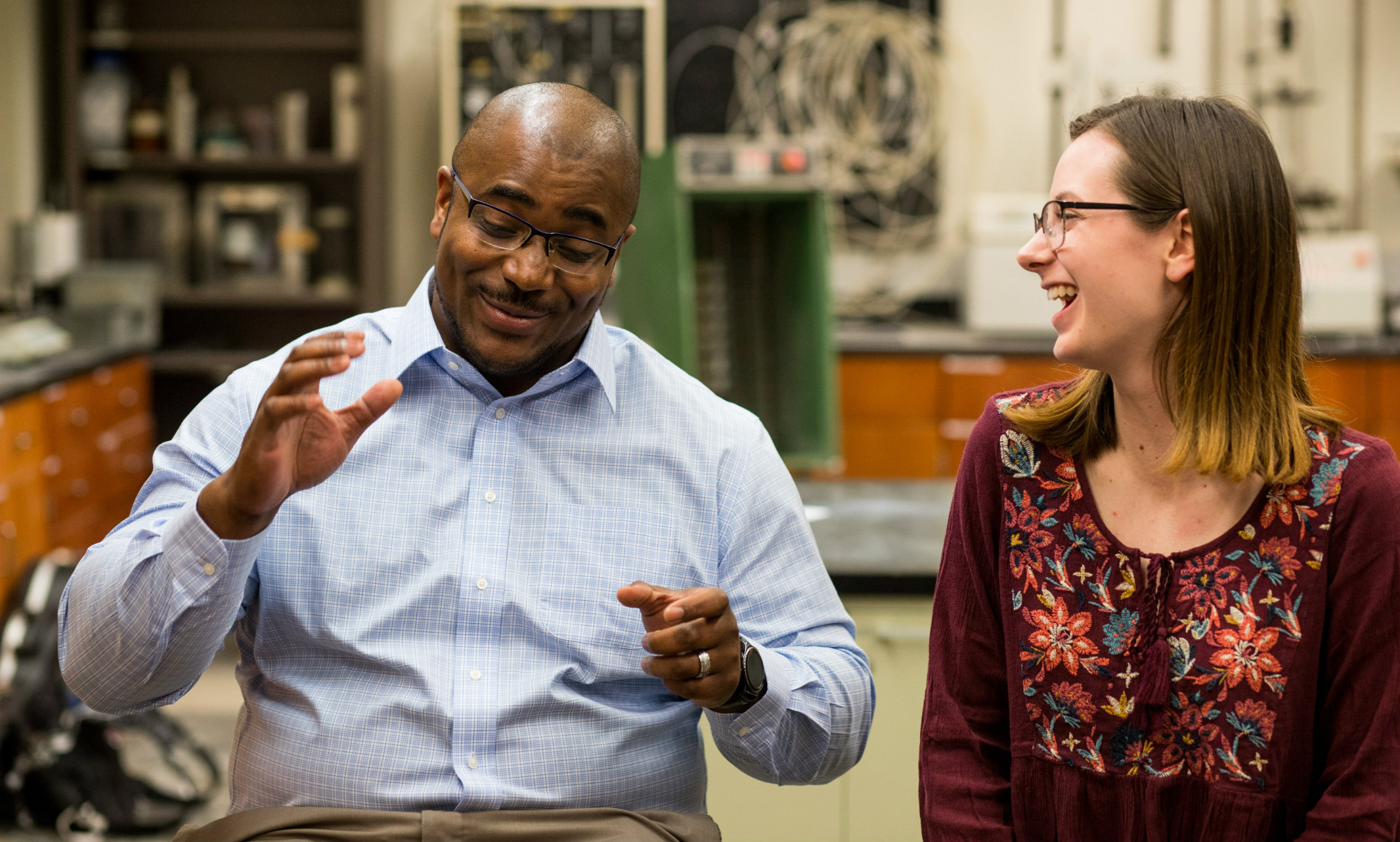
Dynamic duo in the School of Computing and Engineering reflects on service trip to Panama
The heart of UMKC is our campus community. With small class sizes and lots of opportunities, it’s easy to develop student mentorship teams. And these rich relationships—our Dynamic Duos—are some of our best success stories.
Jewel Janke, a senior civil engineering student and president of the UMKC chapter of Engineers Without Borders, arrives at the engineering lab before George White Jr. (B.S.C.E. '13), mentor for Engineers without Borders. She mentions she hasn’t seen White since their trip to the Panama province of Coclé in January, but when he enters so does a familiar vibe that comes from traveling nearly 11,000 miles together.
In previous trips, Engineers Without Borders designed and implemented a system that delivers water from the source (a natural spring) to the village’s center. This year’s trip was to assess the best route to build a line off the existing system that would allow 10 more families (approximately 75 people) access to water year-round. During the three-to-four months that make up the dry season, those villagers hike, almost daily, to the source and carry as much water back as they can.
“The stress that hiking miles for water puts on a family. That’s the pressure point Engineers Without Borders is trying to alleviate.” George White Jr.
Speaking to the challenging nature of that hike White says, “I’m talking mountains, some people think differently, but I’m calling them mountains. It was up and down, up and down. Some rugged terrain.”
Although Janke wouldn’t call them mountains she concedes that it was “really, really hilly.”
“Extremely hilly,” White interjects.
Photo by Brandon Parigo
Since becoming involved with Engineers Without Borders last summer, White, a lead civil/site engineer at Black & Veatch and director-at-large for the School of Computing and Engineering Alumni Association Board, has hit his stride with the group saying, “With data gathered during the last trip, I’ve been able to utilize some of my skills to help the students.” It was a happy coincidence that White has previous experience in plumbing since most of the system is made up of plastic PVC pipes, storage tanks and valves.
His favorite thing about working with the students? "...Seeing their ingenuity in action. For example, working to communicate efficiently with the people we are serving Panama or figuring out the technical details of the design, there is always a problem to solve," White says.
One thing the two happily agree on is the sense of camaraderie that was a hallmark of the trip.
Sharing experiences over dinner each evening with the group was one of White's favorite memories. Janke recalls one special dinner at Maria Nicolasa's house, president of the water committee, that overlooks the jungle in Panama. "We had spent the day surveying the extension. Many of us discovered blisters on our feet when we finally had the opportunity to sit down and take our shoes off. We were in two groups that day so we caught each other up on what we'd been doing and relaxed. It was the perfect end to a long day," Janke remembers.
Right now, students are designing the new branch of the system. Once approved by the national Engineers Without Borders chapter, the next trip will involve trenching and building. Although Janke graduates in May, she looks forward to seeing the project completed in the next several years.
Want to help build the next leg of the water system?
Donate to the project
Apr 26, 2019
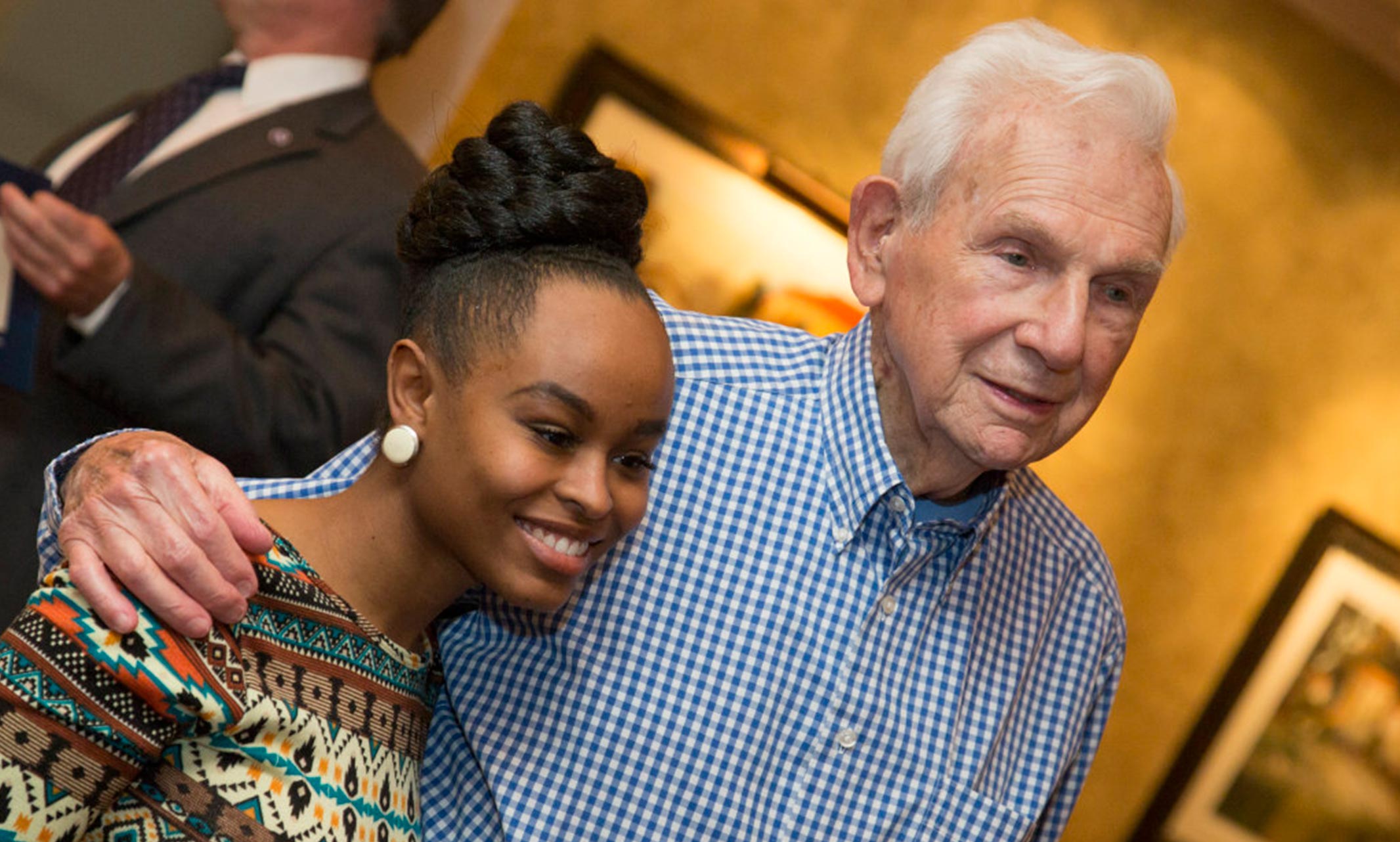
UMKC honors champion and supporter Henry Bloch
The University of Missouri-Kansas City is celebrating the extraordinary life and unprecedented contributions of Kansas City entrepreneur and philanthropist Henry W. Bloch (1922-2019).
Learn more at rememberinghenrybloch.com.
Bloch was the retired chairman of H&R Block, a tax-preparation company which he founded with his brother, Richard, in 1955. A quintessential entrepreneur, Bloch worked tirelessly — toiling over tax returns as his first child, Robert, was being born — and deftly responded to shifts in the market, developing H&R Block into the largest commercial tax preparation firm in the world.
A native Kansas Citian, Bloch was a devoted champion and supporter of the city and the University of Missouri-Kansas City, which he attended when it was the University of Kansas City. He later graduated from the University of Michigan after serving in the U.S. Army Air Corps during World War II.
Bloch enlisted in the Air Corps following Pearl Harbor. A navigator on B-17s, Bloch flew 32 combat missions, primarily over Germany, including three missions on D-Day.
He noted in the book about his service, “Navigating a Life: Henry Bloch in World War II” by John Herron, associate dean of the UMKC College of Arts and Sciences, that “despite the outlook for the Allied forces, he remained optimistic and never wavered about his ability to have an impact on the conflict.”
“I never knew what the next day would bring, but I figured I had a job to do and I would give it my all,” Bloch said.
He was awarded the Air Medal with three oak leaf clusters for his wartime service.
Henry Bloch saluted the work of faculty, staff and students at the celebration of the Bloch School of Management rebranding celebration. Henry Bloch was joined by his son, Tom Bloch; Brian Klaas, dean of the Bloch School of Management; and UMKC Chancellor Mauli Agrawal.
Henry’s son, Tom Bloch, is the author of “Many Happy Returns: the Story of Henry Bloch, America’s Tax Man.” Tom Bloch is a UMKC trustee and chairman of the board of the UMKC Foundation. He recognized his father’s commitment to Kansas City and the university.
“As soon as he was successful, he started giving back,” said Tom. His father was committed to supporting the city that had supported him and his brother since the birth of their business.
“I have a debt to the people of Kansas City,” Henry Bloch said. “Everything I have — I’d have nothing without the people of Kansas City. That’s my biggest thing I like to do — help people in Kansas City.”
“Henry Bloch has inspired me to become an innovator — someone who looks for how to make the world a better place through business. He inspires me to become someone who makes a difference and gives back, so others can not only do the same, but better.” - Daphne Posadas, business major
A stalwart of UMKC and its students, Henry Bloch, at right, a former trustee of the university, received eight significant honors and awards from the university. He was a regular and enthusiastic participant in the events that celebrated faculty, staff and students including UMKC Commencement, where he is shown with his son, Tom Bloch, and Tom Bloch’s wife, Mary Bloch.
Henry Bloch, a former trustee of UMKC, is the largest donor in the university’s history. He endowed the Henry W. Bloch School of Business in 1986, and provided the funds to build a state-of-the-art building that would encourage collaboration, interaction and the spirit of vibrant business and entrepreneurship. The Bloch School is one of three legacy organizations of the Marion and Henry Bloch Family Foundation along with the Nelson-Atkins Museum of Art and Saint Luke’s Hospital of Kansas City.
Focused on advancing educational opportunities for a broad range of students, Bloch committed $50 million to support scholarships to UMKC alone. His latest gift targeted promising students from urban neighborhoods who are shut out from other school opportunities.
Chancellor Mauli Agrawal celebrated Bloch’s contributions to UMKC and the students who will flourish with his help.
“I do know that my career will be focused on giving back to this community. That is the example that the Bloch family has set, through this program, and so many other acts of generosity. That example made my journey possible, and it inspires me.” - Brian Ramirez, Bloch Scholar, health sciences major
Henry Bloch, in conversation with his son, Tom Bloch, at the Bloch School of Management.
“In Tom Bloch’s book, he quotes Henry describing what Henry called the culture of “and then some.”
‘The person who succeeds is the one who does his or her own job, and then some; who is thoughtful to others, and then some; who meets obligations and responsibilities, and then some. That’s the person who steps ahead of the crowd and goes on to great heights.’”
Henry Bloch’s legacy will be a reflection of his dedication to the people he loved and the organizations to which he was committed.
Henry Bloch saluted the work of faculty, staff and students at the celebration of the Bloch School of Management rebranding celebration.
In a collection of birthday wishes on the occasion of Bloch’s 90th birthday, several friends and colleagues quoted Ralph Waldo Emerson, “An institution is the lengthened shadow of one man.” Bloch cast his shadow on many Kansas City institutions. UMKC is fortunate to have received the benefit of his wisdom, spirit, dedication and support. We are proud to carry the mantle of his legacy, which will continue to inspire our current and future students.
Honoring Bloch
Henry W. Bloch dedicated his spirit, energy and time to the work of UMKC. The university awarded him eight times during his years with us.
Chancellor’s Medal Award, 1980
Entrepreneur of the Year (with Richard Bloch), 1986
Presidential Citation of Service, 1992
Top 100 Innovators and Benefactors, Perspectives Magazine, 2000
Entrepreneur of the Year, 2005
Legacy Award, 2007
UMKC Foundation Award of Distinction, 2013
Bloch Hall of Fame, 2014
Read more about Henry Bloch’s legacy from H&R Block and the Marion and Henry Bloch Family Foundation.
Apr 23, 2019
Open to the public including students, faculty and staff
The University of Missouri-Kansas City School of Law has opened a Self-Help Law Clinic at the Leon E. Bloch Law Library in the School of Law building, 500 E. 52nd St. The clinic is open to members of the public — including university students, faculty and staff — to provide legal information and advice, limited scope legal representation and referral for a range of civil matters.
The clinic is operating in cooperation with Legal Aid of Western Missouri. Some issues that the clinic attorneys address include helping clients change their names, secure title to their cars, pursue small-claims actions in consumer matters, understand rights and obligations as tenants, or address simple family law matters. Though some matters may require clients to pay court costs or filing fees, the clinic attorneys provide their assistance free of charge.
The clinic cannot assist people — beyond providing referral — in matters in which they would be in conflict with the university, the UMKC Trustees or any member of the UMKC community (faculty, staff or students). Visit the Self Help Clinic’s website for more information on connecting with a Missouri licensed attorney.
Apr 22, 2019
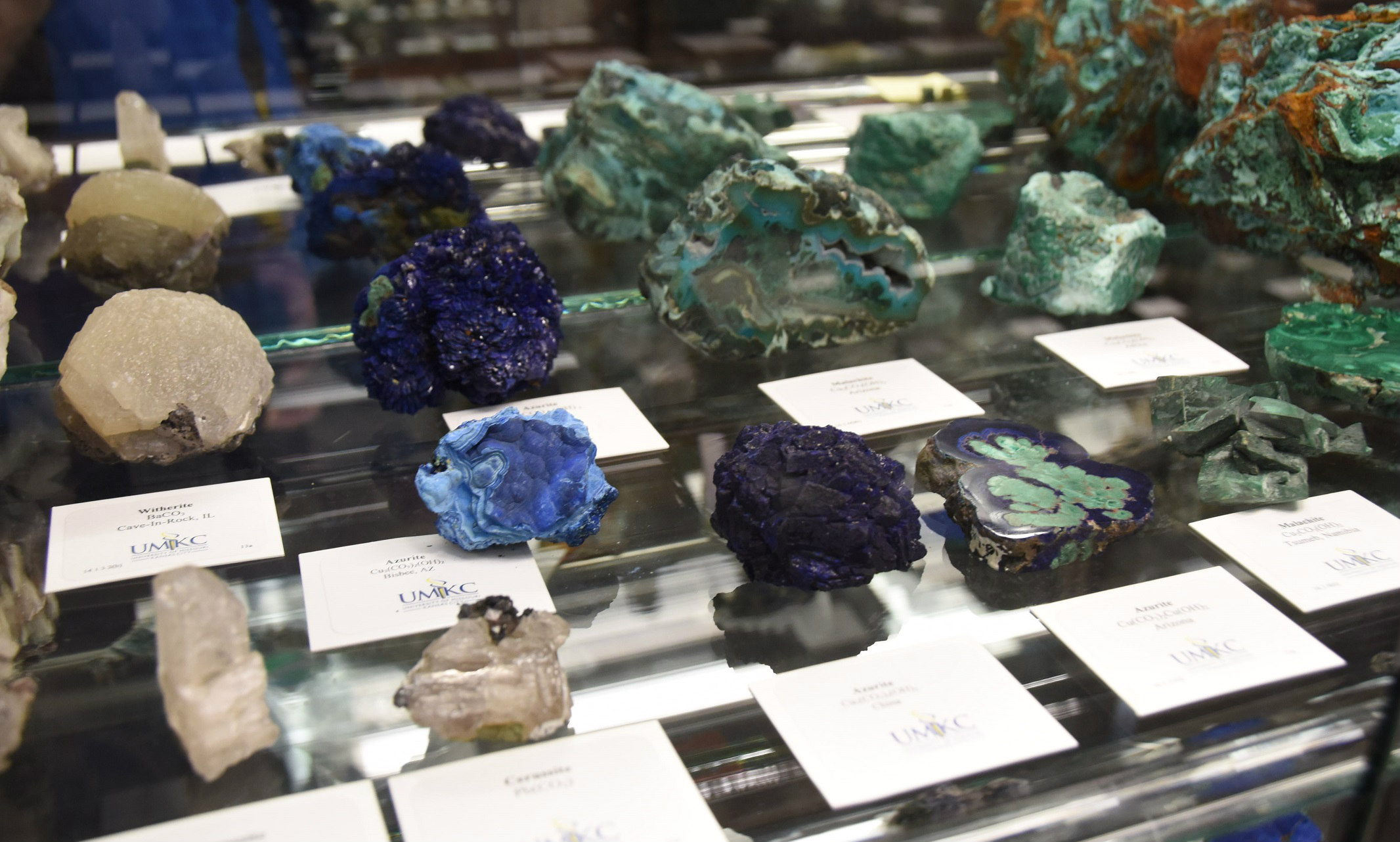
Crinoids – or “starfish on a stick” – are local standouts of collection
The heart of downtown is now home to lofts, shops and stylish watering holes, but 10th and Grand was once a shallow sea. Excavators uncovered at least 400 crinoid specimens – or “starfish on a stick” – there in 1889. These ancient creatures, part of the numerous minerals and fossil specimens that make up the collection of the Richard L. Sutton, Jr. Geosciences Museum, have found a new home in Miller Nichols Library.
The new museum space creates a better experience for both casual visitors and serious enthusiasts. Located across from the LaBudde Special Collections on the third floor of the library, the exhibition space is larger than its former location and will be open regular library hours. Glass walls allow viewing of specimens even when the museum is closed. Upgraded LED lighting provides a better experience while saving energy.
Several new fossils and minerals have been added to the exhibit.
“We are very proud to welcome Chewy, the new juvenile mammoth fossil we have acquired with grant funding from the Kemper Foundation,” says Megan Medley, an assistant in the Department of Geosciences. “We had Chewy’s lower jaw with three teeth, scapula, pelvis, femur, ribs and vertebra over at Union Station as part of the Dinosaurs Revisited exhibit during its duration. We are very happy that Chewy will be coming to UMKC.”
The museum opened in 1973, when Richard L. Sutton and UMKC Professor Eldon J. Parizek assembled much of the collection and display units. Sutton, a dermatologist, was an adjunct geology instructor who donated his personal collection of cephalopods — squid-like ocean dwellers — and fluid inclusions, which are rocks containing liquids, to the museum. Visitors will be able to tip a specimen of clear quartz and watch the trapped, primordial liquid move.
Join the staff of the Richard L. Sutton Jr. Geosciences Museum for its grand re-opening noon to 2 p.m. April 26.
The Geosciences Museum’s regular hours are Monday to Friday, 7:30 a.m. to 11 p.m., Saturday 11 a.m. to 6 p.m. and Sunday 1 to 11 p.m. with exceptions.
Private educational tours with Richard Gentile or Jim Murowchick can be scheduled through the Geosciences department by calling 816-235-1334.
Apr 22, 2019
College AD covered the work UMKC is doing to provide support for student-athletes and prepare them for life after graduation
“We are fortunate, in Kansas City, to have a such a diverse and professional landscape. We have entrepreneurs, big companies, so we wanted to capitalize on our great city and connect them with our student-athletes.” – Ursula Gurney, UMKC Deputy Director of Athletics and Senior Woman Administrator. Read more
Apr 22, 2019
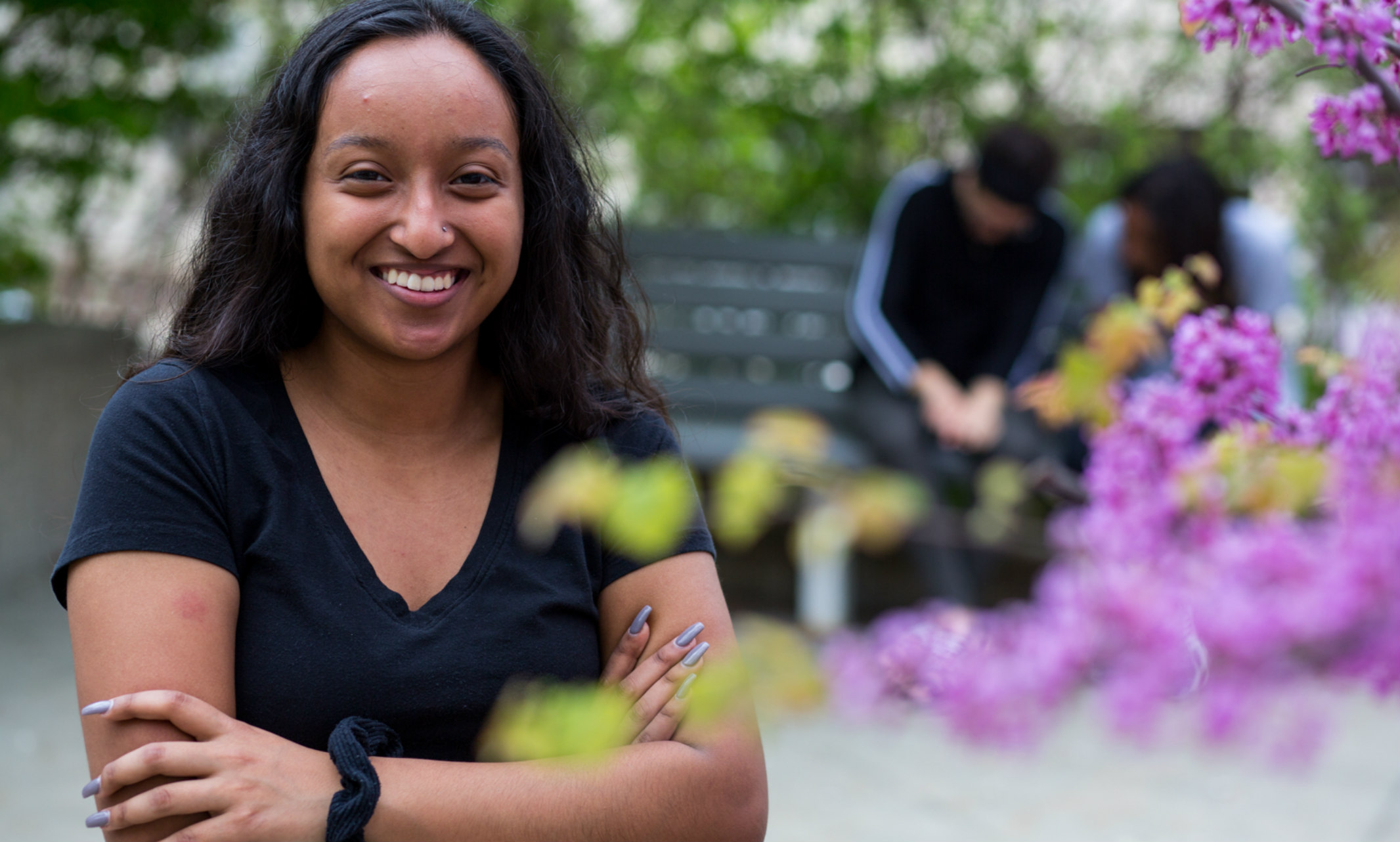
Jennifer Rangel talks about how University College and a KC Scholars scholarship is helping her discover a career path
Get to know our people and you’ll know what UMKC is all about.
Jennifer Rangel, '22
Hometown: Kansas City High School: Shawnee Mission East High School UMKC degree program: Undecided, University College
Why did you choose UMKC?
I chose UMKC because I wanted the diversity. I had attended a predominately white high school and I wanted to have the opportunity to meet other individuals with various backgrounds. I also wanted to be around others who shared the same ethnicity and heritage as me. I’m Hispanic.
Do you have any scholarships? What do they mean to you?
I have been a recipient of a few scholarships and am extremely grateful for the awards that have been given to me. However, there is a scholarship that means the most to me: I am a part of the first class of students to ever receive a KC Scholars scholarship. It has definitely changed my life and really granted me the opportunity to attend school. It has opened doors for me and took the stress of affordability off my shoulders. I have been able to network with a variety of other individuals through this organization and be a part of a few KC Scholars projects to help spread the word about the amazing opportunities they offer for many groups of people.
Why did you choose your field of study?
I am currently a student of University College (UCollege) with an undeclared major. However, I have been looking into pursuing business marketing as it is something that I think would be a great fit for me and my interests. I enjoy graphic design and the creativity that comes along with it and while I have thought about studying graphic design in the art school, through UCollege, I have been able to learn more about myself to realize and understand that going the business route with design is something that I would be more interested in.
What are the challenges and benefits of UCollege?
UCollege definitely helps you take the time to learn more about yourself and use that information to determine the best fit for your future career. You might uncover information about yourself that you may not agree with or is hard to come to terms with, but it is part of the growing process.
The biggest benefit of being in the UCollege progam is that you can take the time and really decide what you want to do with your life and where you want to see yourself in your future career. It prevents you from choosing a major that you may still be unsure of and allows you to really think about what you enjoy doing. This program allows you to take your interests, your dislikes, your learning style and many other things into account when you are thinking about your career.
Since entering college, what have you learned about yourself?
I have learned that I do not need to have a set plan for my life. I came into the fall semester of freshman year planning on majoring in computer science, something that I had never done before. I assumed that it would be something I would enjoy because I like technology and I like working with computers. I later learned that it was something I actually really disliked, and I realized that I solely chose that major because I was scared to go into a university undecided.
I had grown up always following a plan and having set paths that I planned on taking to be successful, so when my life was not going according to plan, I was scared. I did not like the idea of the unknown, not knowing what I was going to major in or do with my life. I did not like the feeling of being unprepared or not knowing what to expect. However, I have been able to use this experience in pushing myself to let go and not try to control everything, to see where life takes me and live by the phrase “what happens, happens.”
Are you a first-generation college student? If so, what does that mean to you?
Yes, and it means everything to me. It tells me that all my hard work in school throughout the years has paid off. I grew up being told by my family that I had so much potential and I was so smart. I knew that college was a must for me; I wanted to do something with my life and I knew that nothing was going to stop me from making this happen.
I am doing this alone, I did not have my parents to help prepare me for college, or to help me understand what to expect. I was determined and motivated and that was all I needed to push through. I am happy that I am going to be the first person in my family to get a degree. I am going to make my family proud, I am going to be an inspiration and an example for other first-generation students. It is not easy and there is a lot of pressure, but I am determined to be a part of the group of first-generation students that are changing the statistics and data set against us.
Who do you admire most at UMKC and why?
I admire my pre-calculus professor, Kristin Kathman. She always sees the potential in her students and encourages the best work from each one. She loves joking around, which makes the class extremely enjoyable. My professor genuinely cares about the work that she is doing and it’s obvious. She refuses to let any one of her students struggle or fail her class. She knows what we are capable of and does what she can to help each of us individually. She has set a high standard for future professors, and it has allowed many of her students to create that academic relationship with her. She is definitely a professor that I will always admire and someone that I know I can always go to for anything.
What extracurricular activities are you involved in at UMKC?
I am a current executive board member for the National Society of Leadership and Success. I am the society events chair; my main job is to book rooms and ensure the events held for our members run smoothly. I get to work closely with a group of other students and I get to be part of a great organization.
What is one word that best describes you and why?
Determined. I am determined to accomplish a variety of things in regard to my academics, to meet new people and make new friendships, and I am determined to make the most that I can out of my time here at UMKC.
Apr 19, 2019
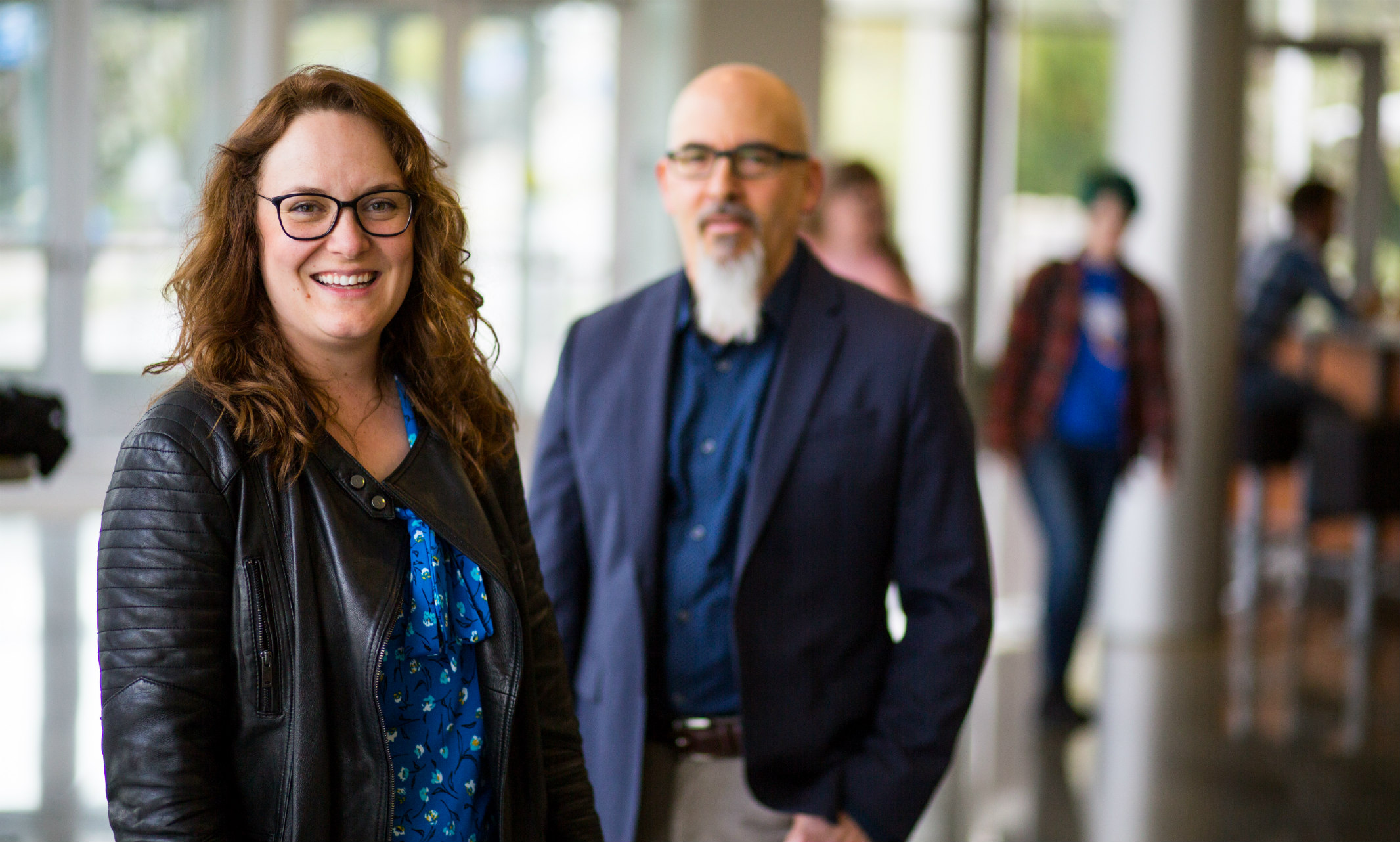
Chelsea Dahlstrom Recognized for Research and Creative Works Staff Award
During her graduate program at UMKC, Chelsea Dahlstrom, senior business operations associate for the Office of Research Services and recipient of the Excellence in Research and Creative Works Staff Award, had a taste of assisting with research on faculty projects and was able to see into that world.
“When I interviewed for this job, I was interested in continuing to serve UMKC’s research interests but on a much broader scale,” she says.
Dahlstrom has worked with faculty principal and co-principal investigators on more than 25 grant applications, including some of the largest that UMKC has received in its history. Throughout this process, Dahlstrom has taken an active role in supporting the application process and helping faculty research staff successfully navigate the grant systems.
“We consider Chelsea a go-to resource for determining what the fine print means for any of our proposals,” says Jacob Marszalek, associate professor of statistics and nominator. “Even if UMKC is not the lead, Chelsea calls upon her experience and know-how to provide information and advice when navigating the process.”
“Her co-workers see her has a rising star. Chelsea is cultivating a culture of excellence with both faculty and staff “During the last year she has shown real leadership and collaborative spirit in helping to raise funds for a campus-wide STEM+M ecosystem initiative.”- Anthony Caruso, associate vice chancellor of research and physics and engineering professor
Dahlstrom sites her natural curiosity as a key component in her success on these projects.
“I love learning about the projects,” she says. “Since my role involves a lot of paperwork and bureaucracy, it would be easy to feel detached, overwhelmed or uninspired, but I find that when I focus on the actual work that’s happening, the discoveries being made, the people being served and helped by these projects, that’s when I’m able to be the most effective in my role. There’s always something interesting and exciting in every single project, and focusing on that makes all the work much easier.”
Anthony Caruso, associate vice chancellor of research and physics and engineering professor, and Daniel McIntosh, astronomy professor, who are both involved in some of UMKC’s largest grant requests related to Science, Technology, Engineering, Mathematics + Medicine (STEM+M), noted Dalhstrom’s enthusiasm and professionalism in their combined recommendation.
“Her co-workers see her has a rising star. Chelsea is cultivating a culture of excellence with both faculty and staff “During the last year she has shown real leadership and collaborative spirit in helping to raise funds for a campus-wide STEM+M ecosystem initiative.”
Dahlstrom says the best part of her job is witnessing and supporting all of the amazing work happening across both campuses in everything from the medical sciences to the humanities to community outreach. Dahlstrom was overwhelmed that her co-workers nominated her for the award.
“It was such an amazing and generous thing to do,” she says. “Everyone at Office of Research Services is wonderful and we love getting to support the faculty and staff everyday on the important work here at UMKC.”
Apr 18, 2019
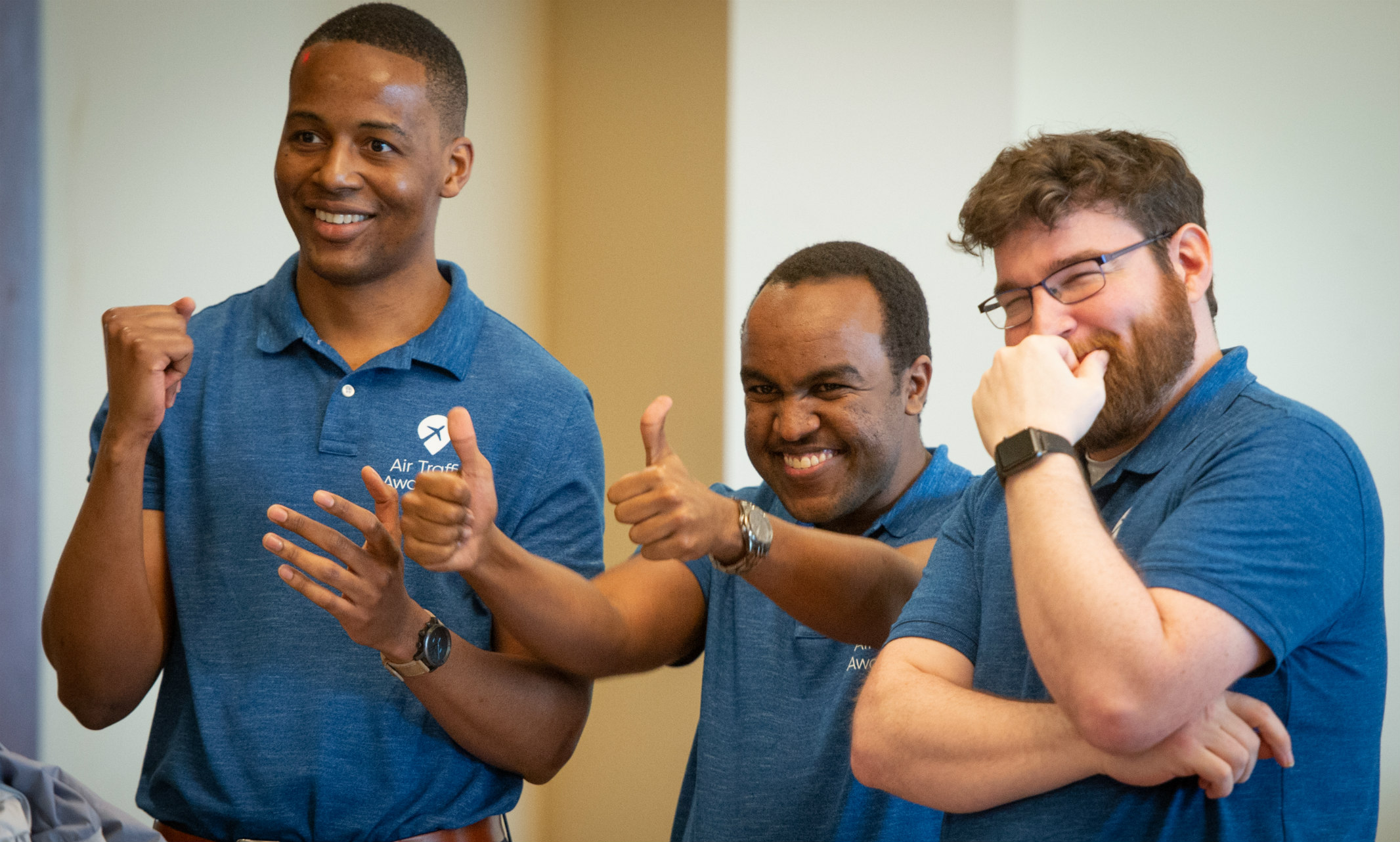
Placing second gives Air Traffic Awareness a boost
University of Missouri-Kansas City students Tonderai Kamabarami, Merwan Abdelmajeed and Cameron Knight placed second in the UM System Entrepreneur Quest Pitch Competition April 5. Placing second in the pitch competition also gave the project, Air Traffic Awareness, a $10,000 boost.
“This award means a lot to us, we were very excited to come in second, especially considering all the talented teams we were up against,” Kamabarami said. “It really was an honor to be recognized. We had built our first hardware prototype before the competition, so we really want to continue investing money into future prototypes as well as testing.”
Air Traffic Awareness is dedicated to providing portable solutions to improving aircraft safety for pilots utilizing the newest available technology. Taking advantage of cutting-edge radio technology available in all aircraft, the team has developed a custom-built mobile device and an application to detect potential aircraft collisions in real-time without the need for GPS or internet connections.
Team members are all professional software developers with more than 15 years of professional experience combined, and have a long-standing passion and dedication to the aircraft industry. One of the founders is a pilot who steered the team toward this project.
“There is no ‘how to’ guide to a start-up, so seeing all these talented teams at different stages of their company has really been eye opening, and by far the most helpful thing I have personally gained from this competition."-Tonderai Kamabarami
“We are dead set on improving the safety of personal and private pilots with our Air Traffic Awareness solutions,” Kamabarami said. “Our goal is to revolutionize the information available to pilots through portable devices and applications, by using the new required radio technology, improving safety and allowing the pilot to make smarter decisions in flight.”
Kamabarami said they first participated in a UMKC competition on March 3 where they placed third and received $5,000. The team also participated in the EQ Student Accelerator Program that was offered to them after the first round of the UMKC competition. The accelerator class was also open to students outside of the competition if they elected to take it. The final step was the UM System EQ Pitch Competition April 5.
Participating in the UM System program provided the team with numerous resources, ranging from mentors to faculty. Kamabarami said they also learned from watching other ventures pitch. Doing so helped them refine their message.
“There is no ‘how to’ guide to a start-up, so seeing all these talented teams at different stages of their company has really been eye opening, and by far the most helpful thing I have personally gained from this competition,” Kamabarami said.
Air Traffic Awareness was one of 12 teams, three from UMKC, that competed in the final day of the UM System EQ Pitch Competition. The other UMKC teams were DeepLens and Family Partner Solutions.
The UM System EQ competition was the first pitch type competition Kamabarami and his team have participated in while students at UMKC. But they plan to do more, including the Regnier Venture Creation Challenge on May 2.
“We can’t say no to another opportunity to gain exposure and potential capital!”
Apr 18, 2019
Chapter continues its national winning streak
UMKC School of Pharmacy students landed a number of top awards and were named among the nation’s top American Pharmacists Association-Academy of Student Pharmacists chapter at the APhA national convention this spring in Seattle.
The UMKC chapter of the APhA-ASP received a 1st Runner Up in Chapter Achievement — top 7 in the U.S. — out of more than 100 for National Chapter Achievement Award winners 2017-18. Last year and in 2012, the chapter won No. 1.
UMKC also won top individual honors and chapter awards. The UMKC School of Pharmacy chapter includes students and faculty sponsors from all three of its Missouri campuses: in Kansas City, Columbia and Springfield.
Jordyn Williams, a third-year pharmacy student at the UMKC School of Pharmacy in Columbia, captured first place in the APhA-ASP National Patient Counseling Competition. Her national championship in the competition was a first for a UMKC pharmacy student.
Emily Oliver, a third-year pharmacy student at the UMKC School of Pharmacy in Columbia, was honored for her chapter leadership with one of four national APhA-ASP Leadership Awards.
In addition, the UMKC School of Pharmacy received the nation’s top chapter award for its work with the Generation Rx program. The effort is an educational program to increase public awareness of prescription medication abuse. Chapters engage in efforts to encourage the prevention of abusing prescription medications.
The chapter placed second in the nation for its efforts with the Operation Diabetes program. The initiative helps identify individuals within the community with previously undiagnosed diabetes and those at risk of the disease. It placed third in the nation with its Over-the-Counter Medicine Safety program to educate 5th and 6th grade students and their families about the safe use and storage of over-the-counter medicines.
Faculty sponsors of the chapter are Cameron Lindsey, Kathryn Holt and Jordan Rowe of the Kansas City campus; Angela Brownfield and Sarah Cox of the Columbia campus; and Lisa Cillessen and Heather Taylor of the Springfield campus.
UMKC Pharmacy Student Victories
2019 APhA-ASP 1st Runner Up in Chapter Achievement (Top 7 in the U.S.)
2018 APhA-ASP Chapter of the Year (No. 1 in the U.S.)
2017 APhA-ASP 1st Runner Up in Chapter Achievement (Top 7 in the U.S.)
2016 APhA-ASP Chapter Achievement Award (Top 4 in the U.S.)
2015 APhA-ASP Chapter Achievement Award (Top 4 in the U.S.)
2014 APhA-ASP 1st Runner Up in Chapter Achievement (Top 7 in the U.S.)
2013 APhA-ASP Chapter Achievement Award (Top 4 in the U.S.)
2012 APhA-ASP Chapter of the Year (No. 1 in the U.S.)
Apr 18, 2019
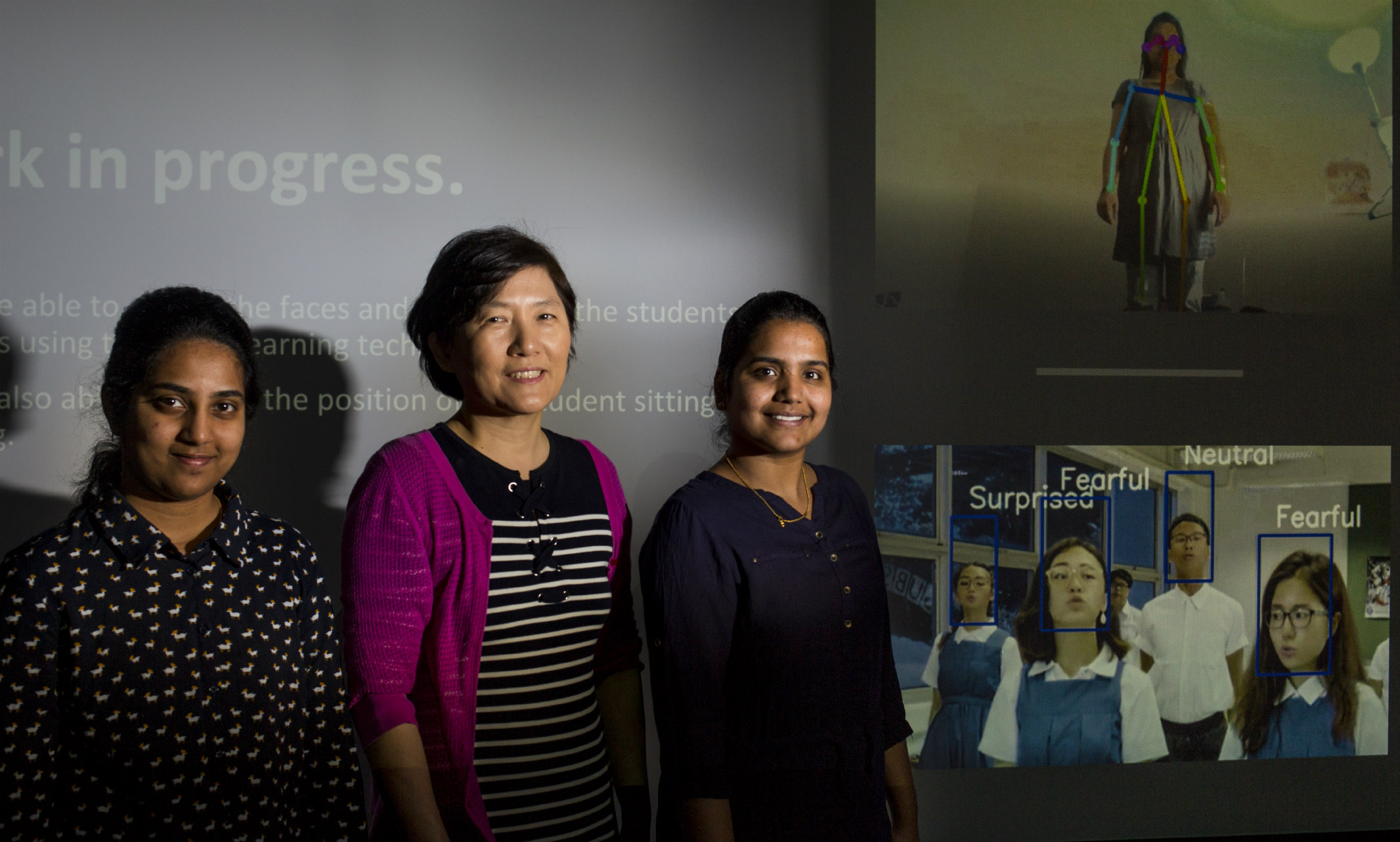
Faculty team uses technology to help instructors visualize how classroom behavior affects student success
A team of faculty from the University of Missouri-Kansas City School of Computing and Engineering, Department of Communication Studies and Office of the Provost and Executive Vice Chancellor have embarked on a mission to leverage artificial intelligence and facial recognition technology to create inclusive environments in classroom settings.
Computer Science Professor Yugyung (Yugi) Lee, Associate Professor of Communication Studies Ye Wang and Associate Research Professor Alexis Petri are working to develop a technology system that will help instructors learn how classroom behaviors translate to student success.
The team of faculty has applied for funding to complete two projects using this technology.
1) Using artificial intelligence to help STEM educators teach challenging subject matter and to monitor growth mindset.
“It’s common for teachers to try and relate to students when teaching subjects like math and science by saying things like ‘it’s okay, I wasn’t good at math either,’ but that actually hinders students’ growth,” says Petri.
2) Launch a strategic initiative for UMKC professors to receive real time feedback on implicit bias.
“We want to recognize that as artificial intelligence learns, we are passing on our bias. Everything implicit to us gets passed on to AI. If we can teach AI to analyze human behavior more reliably than humans, it allows instructors to have a more confidential and genuine assessment,” - Alexis Petri
Using camera equipment to build facial recognition and gesture-recognition technology, the team will be able to monitor classroom settings and further understand the general sentiment of both students and the instructor in real time based on body language, speech and facial expressions.
“We built a Deep Learning model and taught it to detect faces with 8 different emotions (happiness, sadness, fear, anger, surprise, disgust, and neutral). We found that if you have 100 images, 80 of them were accurately labeled with one of these eight emotions by the model while 20 images are not properly labeled. These images may be from your own social network or different people,” said Lee who is working with computer science students to teach the technology to detect these things with 100 percent accuracy. Then, with Wang’s help, the team will be able to teach the technology to analyze the sentiment of every student in a classroom as it relates to content presentation and type without having to identify who the student is.
“Artificial intelligence isn’t about fixing the problem we have with implicit bias, but addressing it. This technology can help us overcome our biases by helping instructors see what’s actually happening in the classroom.” – Yugi Lee
“We want to recognize that as artificial intelligence learns, we are passing on our bias. Everything implicit to us gets passed on to AI. If we can teach AI to analyze human behavior more reliably than humans, it allows instructors to have a more confidential and genuine assessment,” said Petri.
Petri said if this project gets funded, Provost and Executive Vice Chancellor Barbara Bichelmeyer will conduct workshops on growth mindset.
Wang and Lee are working to establish a baseline with the help of the UMKC Theatre Department. Theatre students will get acting experience by role playing various classroom scenarios in a controlled setting to get exaggerated responses. Using camera footage from the classroom, Wang will create an animated report for instructors to visualize how speech and presentation correlate with students’ response.
To get an accurate report, students will be able to complete diversity information before entering the classroom and receive a QR code that will help the technology pay attention to the class’ racial makeup. For the students’ protection, the diversity information they complete will only include racial makeup and gender identity.
“This is a chance for humanities students to gain research experience, and work in labs when they don’t usually get to do so regularly. Collaboration between humanities and sciences is the future of research,”
- Ye Wang
This research will be useful for artificial intelligence research since the project will generate meaningful data for advanced research in artificial intelligence/deep learning. It also gives opportunities to three industries – computer science and technology and social sciences – the ability to understand one another better as there are not often a lot of research collaborations like this.
“Artificial intelligence isn’t about fixing the problem we have with implicit bias, but addressing it. This technology can help us overcome our biases by helping instructors see what’s actually happening in the classroom,” said Lee.
Lee has already began working with computer science students on testing and improving facial- recognition technology with the resources available in the School of Computing and Engineering. They are still waiting to hear the results from the three funding proposals they submitted to move forward with building the cloud application to analyze and translate what’s happening in the classroom.
“This is a chance for humanities students to gain research experience, and work in labs when they don’t usually get to do so regularly. Collaboration between humanities and sciences is the future of research,” said Wang.
Several community organizations are already interested in testing the technology when it is complete.
“In elementary education, it is important to support teachers as they set high standards for students and help students meet those standards. Developing math and science interests and capabilities early is important to broadening and increasing STEM majors in college. When teachers who struggle with math unintentionally give students the message that it is ok not to be good at math, it may have a lasting effect on what students pursue later,” Dr. Angelique Nedved, Director of School Quality, School Smart Kansas City.
Research At UMKC
Apr 17, 2019
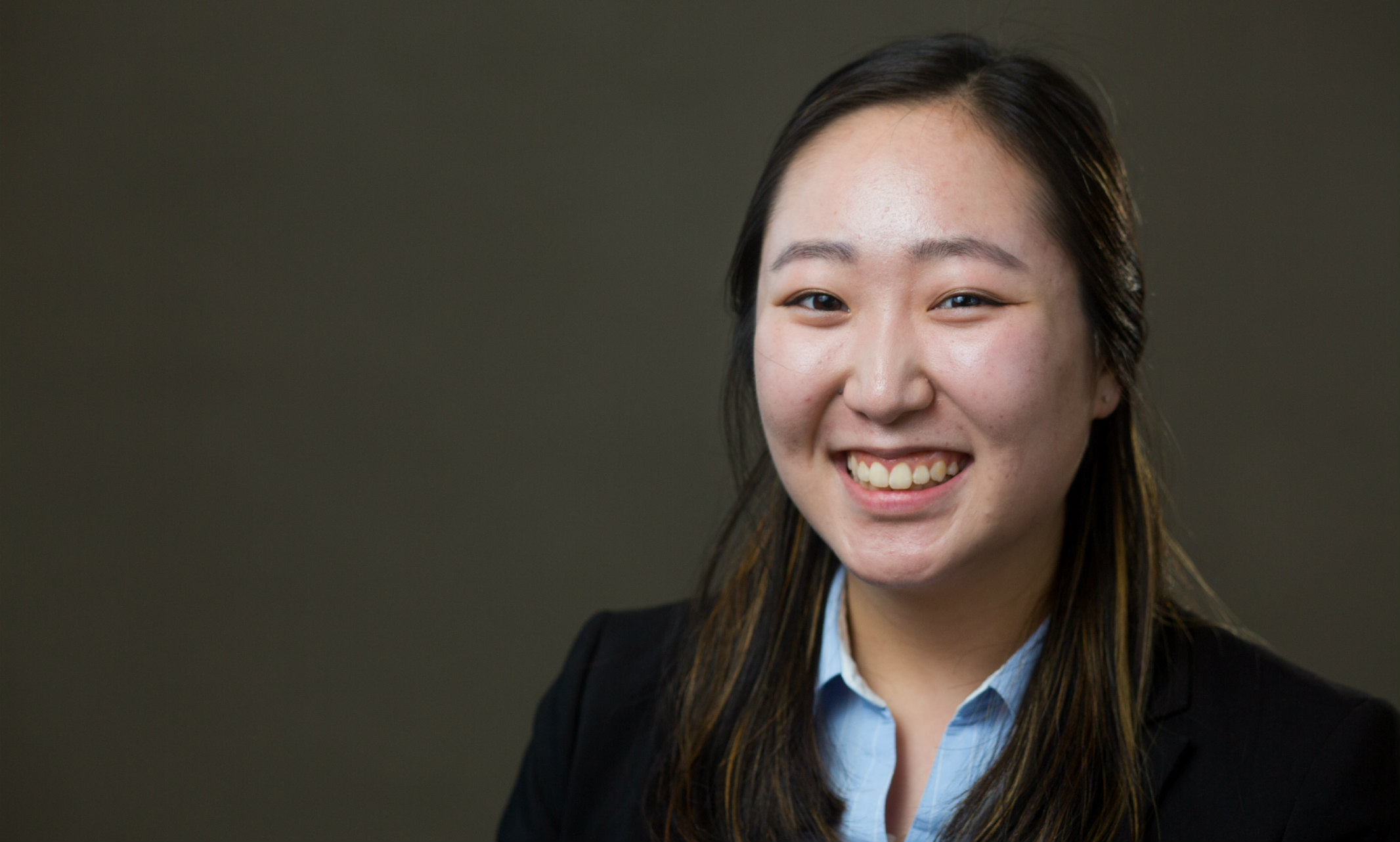
Couple creates legacy in their daughter's honor
When Karen and Don Loeffelholz’s daughter, Kristin, passed away 11 years ago, they made their first contribution to UMKC in her memory.
A few years later in 2001, they established the Kristin Jane Loeffelholz Memorial Scholarship in her name and have been contributing to it since.
The couple feels that providing these scholarships is the kind of lasting legacy that Kristin deserves.
“Kristin loved UMKC,” Don says. “She was her happiest when she was there.”
The Loeffelholzes developed the scholarship criteria based on Kristin’s personal experience. Recipients must be active in engineering activities, either Kansas, Missouri or Iowa residents, employed 20 hours a week and maintaining a C+ average or better.
“Kristin always had a job and worked hard, but she was a C student,” says Karen. “She was sometimes frustrated that there were not more scholarships available for people without a 4.0 G.P.A. We know that there are a lot of students studying hard and working on the side. We wanted to help those people.”
The Loeffelholzes have attended the scholar/donor event in the School of Computing and Engineering almost every year since their first donation.
“It always impresses and inspires us,” says Karen. “Each year it’s different, but we’ve enjoyed every one. There is nothing more wonderful than meeting the students. They are always so polite. It’s a great, happy event.”
After considering different ways to make a gift, the couple felt that a scholarship was the best memorial for Kristin.
“It seemed better than planting a tree or donating a bench. It’s something that will always give back without our having to ask for help for something like a walk,” Karen says.
This year’s recipient is Mina Kim, a senior studying electrical engineering and computing.
“This scholarship has allowed me to be more focused on my school work and involved in engineering activities. I never would have guessed that it would have made so much of an impact on my life.” Mina Kim
Kim is grateful that the Loeffelholzes’ gift has allowed her to take on greater leadership responsibilities and pursue other opportunities.
“I have been able to obtain an internship with a small engineering firm where I’ve been able to apply all that I have learned and contribute to real substations and power plants,” Kim says. “It’s exciting to know that I helped create something that helps others.”
Apr 17, 2019
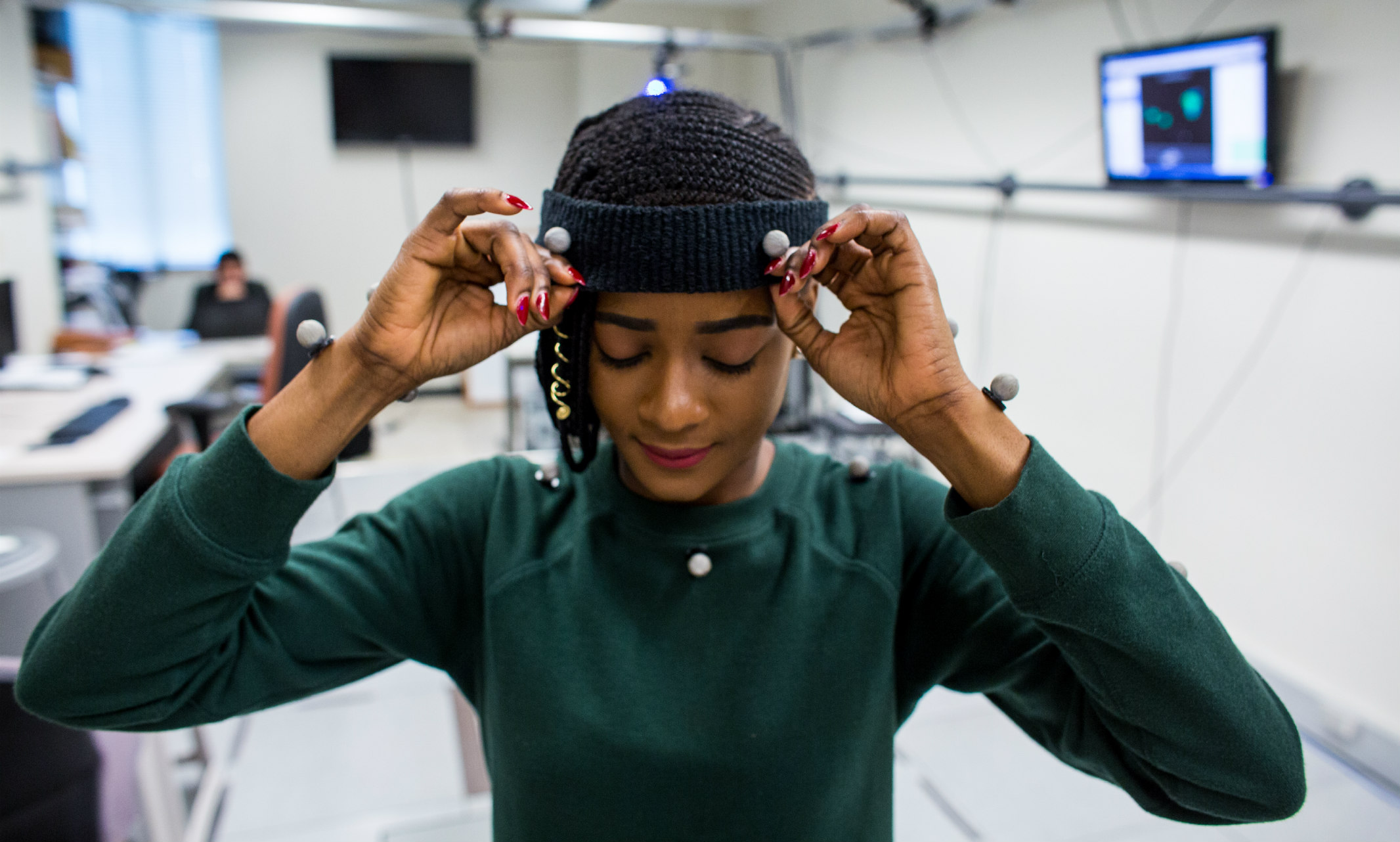
Engineering student found her calling at UMKC
Mary Okafor left Nigeria, where she’d lived her entire life, in 2014 for her college education. Her first experience with America was Kansas City, where her older brother lived at the time. She wants to design medical devices, and spends a lot of time in the engineering school’s motion lab measuring and analyzing crucial data. Watch a video and read a Q & A to learn more.
Mary Okafor, ‘19 Program: Bachelor of Science in Mechanical Engineering, minors in Chemistry and Mathematics School: School of Computing and Engineering Organizations: President of National Society of Black Engineers; African Students’ Association Hometown: Abiriba, Abia State, Nigeria
Why did you choose UMKC?
As an international student, I did not have the opportunity to visit UMKC and get a tour around the school. But my brother lived in Kansas City for a while. He had a friend who graduated from UMKC who made him understand that UMKC was a good school with good programs and professors. It has a good learning environment and is filled with diverse students. This is why I chose UMKC.
Why did you choose engineering?
I have always been fascinated by the way things were being built and how these innovations are used to make the world a better place. I chose to study mechanical engineering because I want to help innovate medical solutions by manufacturing medical devices to improve the health of people.
What are the challenges and benefits of the program?
To succeed in my program, you have to be positively driven and have a goal in life to withstand and pass through the amount of hard work required from you. It is easy to lose focus, but if you know what you want in life, that helps to keep you in check.
The different experiences we get help in shaping students to become better engineers. Being an undergraduate researcher has helped me in knowing how I can help people. Also, you get to connect with people by getting involved in organizations. I joined the National Society of Black Engineers in my freshman year and this also contributed in me staying focused by working with students who have the same mindset as me to be a successful engineer.
How has your college program inspired you?
The thought of how I can use what I have learned in my program and the experience to save lives of people in the future through innovation of medical devices always inspires me to learn more and strive to do better to be the best mechanical engineer I can be.
Since entering college, what have you learned about yourself?
I have learned that stepping out of my comfort zone was really important because it made me become a better version of myself. I became more confident and always open to new try new things that would benefit me in life.
What’s your greatest fear?
My greatest fear is not being successful in life. By not being successful, I mean not being able to use my knowledge to give back to the community to make the world a better place.
What motto do you live by?
“If others can do it, then I can.” That motivates me to always stay positive and be open to learn.
Apr 16, 2019
Chancellor says campuses must welcome wide variety of views
I want to state my unequivocal position that violence and attacks on individuals are unacceptable. I condemn the attack on our speaker by one of our students. That student was arrested and faces several criminal charges. In addition, we suspended the student and the student will not be allowed on campus during UMKC’s investigation, which could lead to a number of sanctions including expulsion.
My original statement may have given an indication that UMKC does not support freedom of expression for all. I apologize if I’ve given that impression, for that was not my intention. It is not the university’s role to take sides, but to rise to the higher principle of promoting a respectful exchange of ideas for our students to form their own views and engage in critical thinking. And we’ll continue to promote diversity of background, experiences and perspectives, which is critically important to creating a vibrant university to advance student success, breakthrough research and meaningful engagement.
In this case, UMKC provided the speaker a venue, as well as police protection to allow him to exercise his rights. We are very disappointed that some students’ actions overtook the respectful behavior of the majority of students who participated in campus events that night. I want to reiterate that we do not tolerate the disruption of peaceful activities or violence of any sort and, as demonstrated by our police, we will take swift action when anyone interferes with the rights of others, including the right of free speech.
These are the foundation of free speech that our democracy depends upon and it must be respected every day on our campus.
Mauli Agrawal, Ph.D.ChancellorUniversity of Missouri-Kansas City
Apr 15, 2019
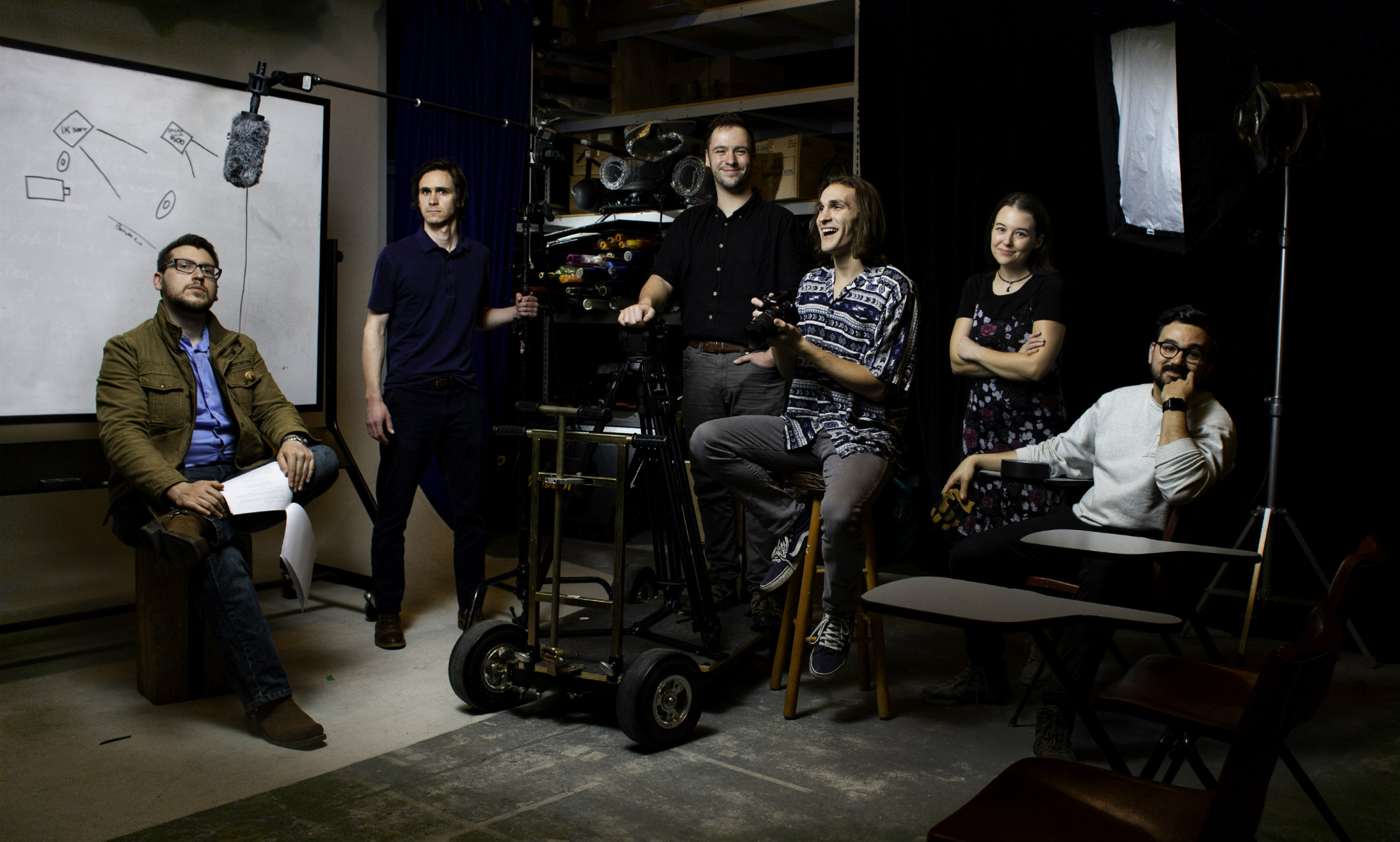
Each got their start in the Communication Studies Department
A bevy of current and former Communication Studies students had work shown during the 23rd Kansas City FilmFest International.
From harnessing a magical, albeit useless, superpower to a night in the life of a call-girl driver, the films and their writers, directors and stars showcase a breadth of creativity and skill.
We spoke with some of the FilmFest participants about their experiences working on films and their upcoming projects.
Andreina Byrne, a 2013 grad, produced and starred in Crude Oil. The film follows Jenny (played by Byrne) as she breaks free from a toxic friendship and learns to control her benign superpower. The film was also screened at the Sundance Film Festival where it was nominated for the Short Film Grand Jury Prize. Byrne says she was overjoyed to have audiences relate to the film saying, “we’ve all had a person in our lives that makes us feel a little nutso at times.”
Andreina Byrne, producer and star of Crude Oil
Sweetheart was co-written by senior Jackson Montemayor and 2018 graduate Cory Cullen, and takes aim at the seemingly innocuous pet names (a.k.a. catcalls) that women endure on a daily basis. Montemayor, who also directed, recalls initial hesitation about two men telling the story from a woman’s perspective saying, “we have no clue what it is like to be in the shoes of a woman, so we knew we needed to do our research to get it right.” Cullen, who also served as cinematographer, says he hopes men watching the film “realize that even though they meant no ill-will, at a point it’s all kind of the same dismissiveness.”
Senior Alex Harbolt co-wrote, edited, scored and starred in Outcall. The film follows a call-girl driver who’s got to keep a secret when his passenger kills her john. Inspired by directors David Fincher, Wes Anderson and Derek Cianfrance, Harbolt says he is, “fascinated by human actions and behavior, both good and bad.” He’s currently working on his next film, Pigskin.
Alex Harbolt, co-writer, editor, composer and star of Outcall
Additional Kansas City FilmFest participants + Roos include:
Matti Hayes' screenplay Brush Marks won 'Best Short Screenplay' in the Kansas City Women in Film and Television Short Screenplay Contest.
The Book, directed by Kyle Womelduff, played as part of the Heartland Student Shorts I block.
Kostym is written and directed by Jeff Mundinger, who recently won an award at the BisonBison Film Festival student competition. It played as part of the Find and Seek Shorts block.
Apr 11, 2019
The KMBZ Midday show with Jayme & Wickett included an interview with UMKC astronomy professor
Dan McIntosh, associate professor of Astronomy and Physics at UMKC, explained black holes and the importance of a new photo. Read more and listen to the podcast
Apr 10, 2019
KMBZ Radio talked to UMKC alumna Angela Myers about her journey to becoming a doctor
Angela Myers is the division director of Pediatric Infectious Diseases at Children’s Mercy; associate professor and medical director of Travel Medicine at the UMKC School of Medicine; and a graduate of the six-year medical program at UMKC. Read more
Apr 07, 2019
J. Larry Dyer taught a generation of social workers
J. Larry Dyer with his dogs Jerry (“Jerr Bear”) and Jasper.
Larry Dyer, Ph.D., (1951-2019) influenced the lives of many students in his 17 years with the UMKC School of Social Work.
An assistant teaching professor in the Department of Social Work in the College of Arts and Sciences, Dyer had been a member of the social work faculty since 2002. He was the lead instructor for the department’s courses on advanced social work practice and psychopathology. Dyer also served two years as the master of social work program director and was most recently the Master of Social Work Student Organization faculty advisor. He kept his clinical social work skills honed by providing licensed clinical social work supervision and worked in a dialectical behavior therapy setting in Kansas City.
Dyer played a part in educating more than 1,000 master of social work students. His sister-in-law, Bert Monroe Dyer, said she was touched by the fact that both the hospital social worker and the daughter of one of the nursing staff involved in his case were graduates of the UMKC School of Social Work, had attended classes with Dyer and expressed their affection and gratitude for having known him.
Dyer is survived by his brother, Charles Dyer, a tenured law professor at UMKC from 1977 through 1987; his sister-in-law Bert; his adult children, Johnny and Alicen; and three grandchildren. His husband of 30 years, Rick Henrichs, preceded him in death.
Dyer fostered dogs for military service personnel deployed on active duty through “Dogs on Deployment.”
The social work faculty and the Master of Social Work Student Organization are coordinating with the family and friends of Dyer for a remembrance from 2 to 4 p.m. Saturday, April 13, at the UMKC Student Union, Room 302.
Apr 05, 2019
Missouri Business Alert gets face time with the student founders to learn more about their businesses and backstories
The three winning startups from the University of Missouri-Kansas City were DeepLens, Family Partner Solutions and Air Traffic Awareness. Read more
Apr 05, 2019
Lisa Baronio will be the university's chief advancement officer
Lisa Baronio
The University of Missouri-Kansas City has announced that Lisa B. Baronio, EMBA, will serve as the next president of the UMKC Foundation and chief advancement officer of UMKC.
As the university’s chief advancement officer and UMKC Foundation president, Baronio will lead the efforts of this independent nonprofit organization to encourage gifts and bequests to promote academic achievement, foster research and elevate intellectual pursuits at UMKC. She will begin her duties on June 17.
“The UMKC Foundation is delighted to welcome Lisa to lead the Foundation at this critical moment for the university. We are confident that she has the skills, experience and dedication to achieve, and exceed, the foundation’s goals."- Tom Bloch,chair of the UMKC Foundation Board
In this newly defined role, Baronio will have dual reporting lines to UMKC Chancellor C. Mauli Agrawal and the UMKC Foundation Board of Directors. She will also serve on the Chancellor’s Executive Council and will have broad authority to shape and build an advancement program supporting UMKC and UMKC Athletics through annual giving, corporate and foundation relations, major gifts and gift planning programs, endowment, capital campaigns, stewardship and advancement services.
“Lisa Baronio has a strong record of successful fundraising in higher education. She will play a key role for us in obtaining the resources we need to make the targeted investments called for in our strategic plan. We are proud to welcome her into our UMKC family,” Agrawal said.
“The UMKC Foundation is delighted to welcome Lisa to lead the Foundation at this critical moment for the university. We are confident that she has the skills, experience and dedication to achieve, and exceed, the foundation’s goals,” said Tom Bloch,chair of the UMKC Foundation Board.
Baronio comes to UMKC from the University of Northern Iowa, where she has served as President of the UNI Foundation since 2015. She has more than 20 years of education fundraising and management experience.
“I have spoken with Chancellor Agrawal regarding the enormous growth potential we both see at UMKC and the synergy for opportunities with Kansas City.” Baronio said. “I’m eager to relocate to Kansas City, to begin serving UMKC and realizing that potential.”
While at UNI, Baronio led the efforts that raised more than $85 million and distributed more than $20 million to support the university. She also led a scholarship initiative that exceeded the $40 million goal by $13 million, and met the original goal 19 months ahead of schedule. She has also led divisions at Trinity University and the University of North Texas, and held senior positions at the University of Connecticut Foundation and Wichita State University. She holds an EMBA from the University of Nebraska-Omaha and two bachelor’s degrees from the University of Iowa.
Co-chairs for the search were UMKC Provost Barbara A. Bichelmeyer and Warren K. Erdman, executive vice president – administration and corporate affairs at Kansas City Southern and University of Missouri Board of Curators emeritus member and chairman.
Apr 04, 2019
Fox4KC talked with Kari Jo Freudigmann, assistant director of LGBTQIA programs and services; and Jared McClellan, president of the Delta Lambda Phi...
It’s Pride Month at UMKC, a time dedicated to bringing education, understanding and advocacy to the entire campus. Watch the news clip
Apr 04, 2019
From the KC Hispanic News: The UMKC award came as a total surprise
For José Faus receiving the UMKC alumni “Defying the odds” award pretty much describes Faus’ life. When he learned that he was this year’s recipient of this prestigious award, he said, “it has been a humbling experience.” Read more
Apr 04, 2019
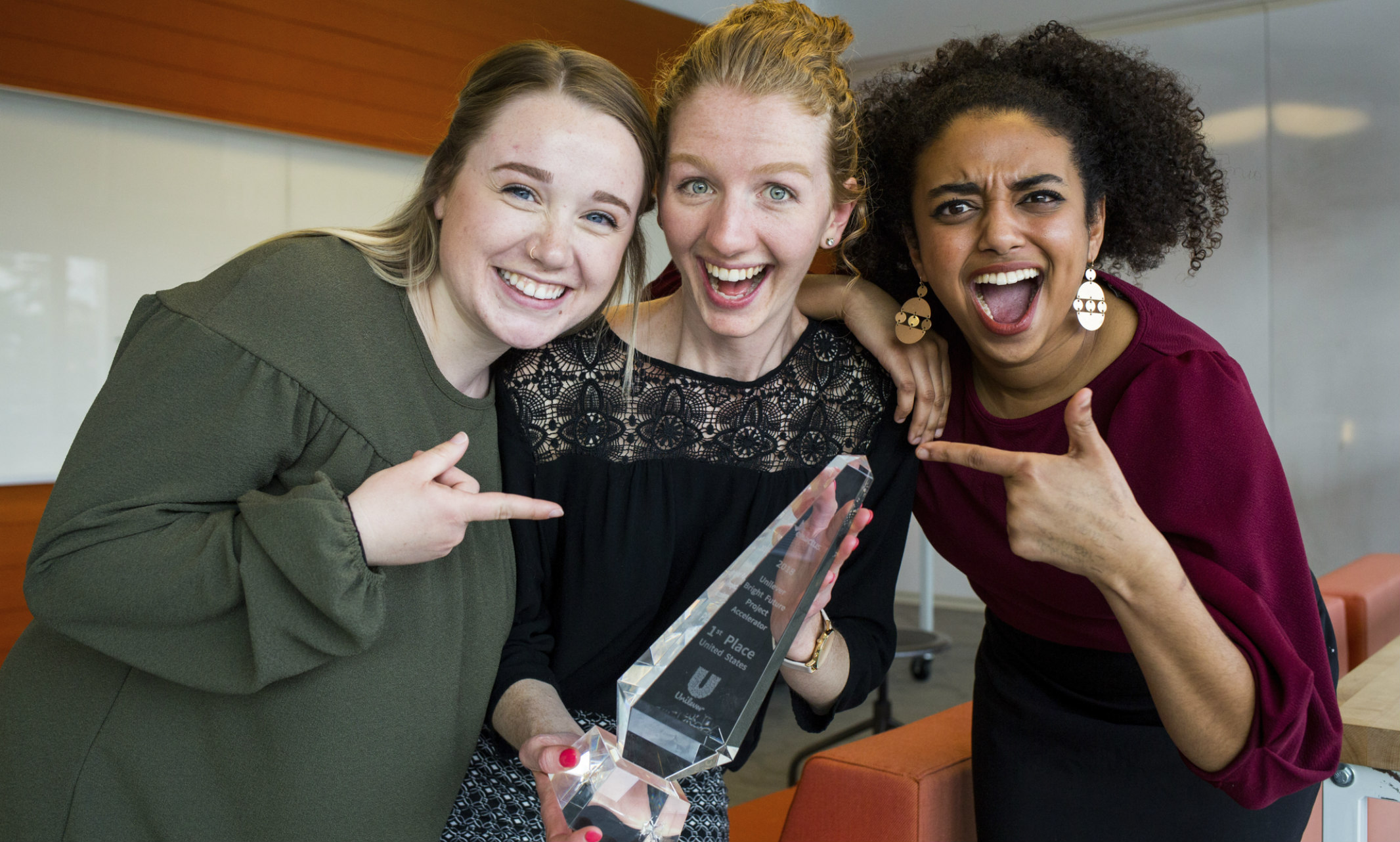
Team of three entrepreneurial leaders travel to London
During spring break, three UMKC Bloch School of Management students studied for hours per day. But the toil was worth the trouble, say Andrea Savage, Salem Habte and Ali Brandolino.
That’s because a global giant, Unilever, has invited them to represent the United States in the Unilever Future Leaders’ League, a business-case competition in London, the company’s world headquarters. Students from 26 countries will present their solutions to two business challenges April 10-12.
“This is incredible validation of our Enactus members and the education they are getting at UMKC. We feel beyond honored to be representing the United States in the upcoming competition.” Ali Brandolino
So just how did these UMKC students earn this coveted spot of being America’s business team?
All three students are members of UMKC Enactus, a group of about 100 students from a wide-ranging group of degree programs who use entrepreneurship to solve community problems. And the UMKC team won first place in the nation in 2018 for the best initiative to combat food waste. The effort is called FeedKC, which takes excess food from local restaurants and university cafeterias and delivers it to area homeless shelters.
So far, 3,300 pounds of food – or 3,300 meals – have fed people through FeedKC.
“Hunger is not a production issue, it’s a distribution issue,” says Savage, project manager of FeedKC. She was also the Bloch School’s Student Entrepreneur of the Year for the same project.
Savage, of Strafford, Missouri, volunteered for a Springfield organization like Harvesters before coming to UMKC, inspiring her to grow FeedKC. She sees lots of potential for more restaurants and businesses to donate, and she and a UMKC School of Computing and Engineering student, Blake Higgins, are working on a mobile app to help make that happen.
UMKC Enactus programs
And FeedKC is just one of half a dozen projects UMKC Enactus is sponsoring. There’s also Smiles and Kuts, a mobile salon in the Kansas City area to give children free haircuts to help boost confidence and self-esteem — for which the Enactus members are seeking out volunteer hair stylists.
And there’s Educate to Elevate, helping a village across the globe in Nigeria. For the past three years, Enactus’ aim has been to provide better infrastructure and basic needs care so the children of the village can have easier access to a better education. In the spring of 2017, the team helped facilitate the building of wells for cleaner water access, and it in 2018 raised funds for restroom facilities. Recently the team has raised raised $6,000 to start construction on school building.
“The goal is for the people to become empowered and the projects to be sustainable on their own,” says Habte, a junior and president of UMKC Enactus.
Enactus sponsors and Bloch School of Management faculty Ben Williams and Erin Blocher will be accompanying the team in the London competition.
Unilever is a corporate sponsor of Enactus USA. The winner of the global competition gets to help Unilever with business projects. Teams are preparing two pitches to solve needs of communities around the globe.
“We always talk about Enactus being an opportunity to implement the things we learn in the classroom, and I think this is incredible validation of our members and the education they are getting at UMKC,” says Brandolino, sophomore and vice president of Enactus. “We feel beyond honored to be representing the United States in the upcoming competition.”
Apr 03, 2019
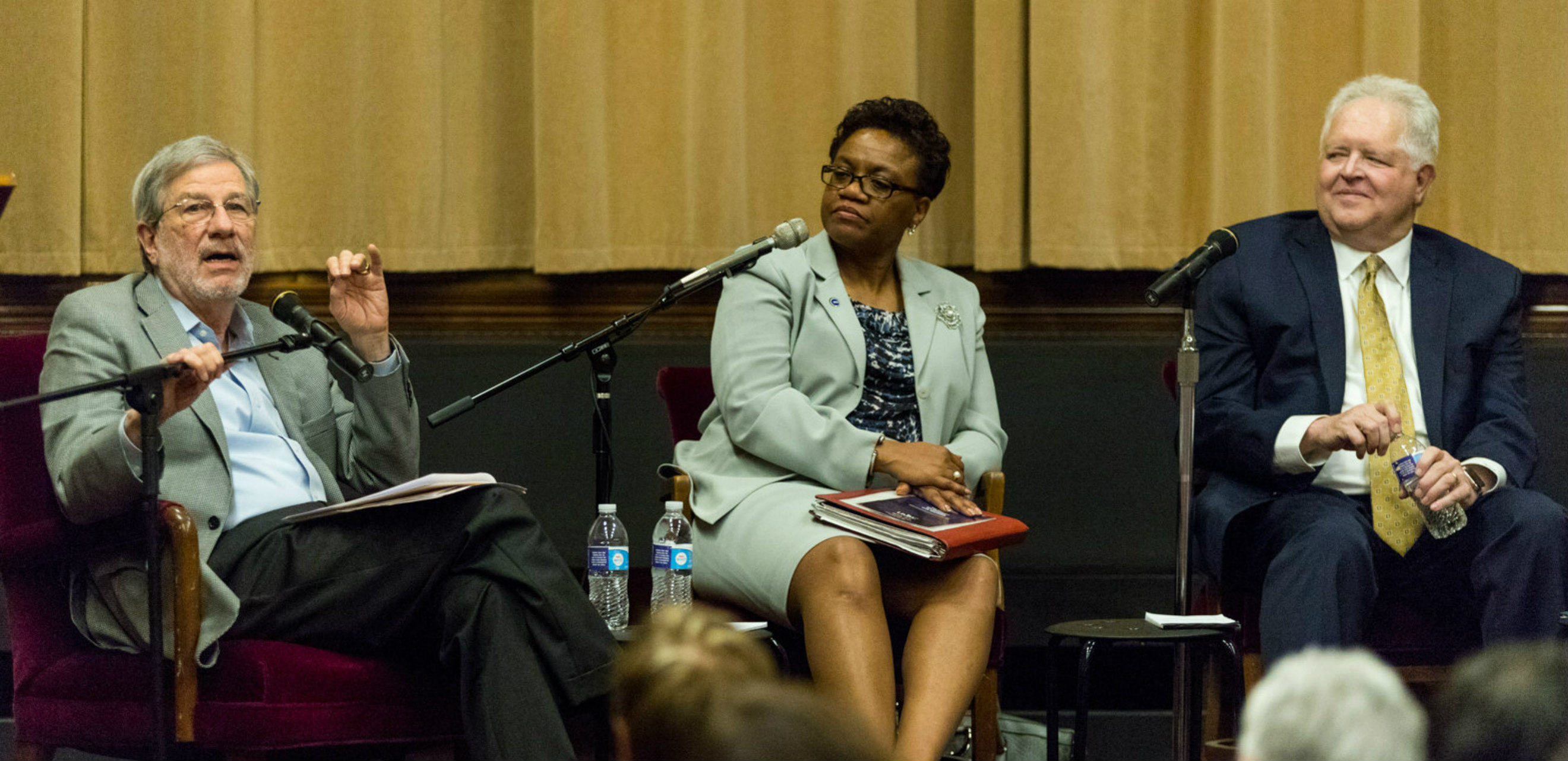
Chancellor's investiture includes evening panel discussion on civil discourse
At colleges across the country, students, faculty and campus leadership are struggling to balance ideals of free speech and respectful dialogue, ideals that at times come into conflict. A UMKC-sponsored panel discussion explored the depth and nuances of the topic.
The panel discussion concluded two days of events marking the formal investiture of Mauli Agrawal, Ph.D., as UMKC chancellor. The discussion was produced by American Public Square at Unity Temple on the Plaza, and sponsored by UMKC. The topic was “The Role and Responsibility of the University to Foster Civil Dialogue.”
Agrawal introduced the program, which featured panelists Kimberly Beatty, Ed.D., chancellor of Metropolitan Community College; Randall Hanna, Ed.D., J.D., dean of Florida State University Panama City; Michael Q. McShane, Ph.D., director of national research for EdChoice; and Margaret Talev, senior White House correspondent for Bloomberg News. The session was moderated by American Public Square founder and UMKC alumnus and faculty member Allan J. Katz, former U.S. Ambassador to Portugal.
“Freedom of speech is one of the most important freedoms we have. How do we interact with each other in a constructive fashion so that the discussion is not divisive?” UMKC Chancellor Mauli Agrawal
Chancellor Mauli Agrawal and his wife, Sue Agrawal, at the event.
The lively discussion that followed demonstrated the complexity of the issue and stimulated thoughtful questions from the audience. Some excerpts:
“The whole point of the college experience is exposure to all sides” of controversial questions. – Beatty
“There are parallels between a university’s role and that of a news organization – to provide information, and to foster an environment where learning can take place and give people an opportunity to challenge their own assumptions.” – Talev
“A lot of universities have become more ideologically homogenous over time.” The problem is less about blatant suppression of opposing views than “a more subtle problem where certain questions just don’t get asked, certain topics don’t get discussed.” – McShane
“Those colleges that are trying to bar certain speakers from campus are only making the problem worse.” – Hanna
“The strategic thing to do with people who are offensive is to ignore them, and encourage others to ignore them.” – Talev
“Poison is determined by the dose. ‘Safetyism’ (protecting people from speech they consider offensive) has gone too far. Rather than think of it as either-or, we need to think of it as a continuum. We want people to be comfortable, but we also have to educate them on how to get along with each other.” – McShane
“We need to be honest about the fact that some people have figured out how to monetize outrage. That works because we click on it.” – McShane
Apr 03, 2019
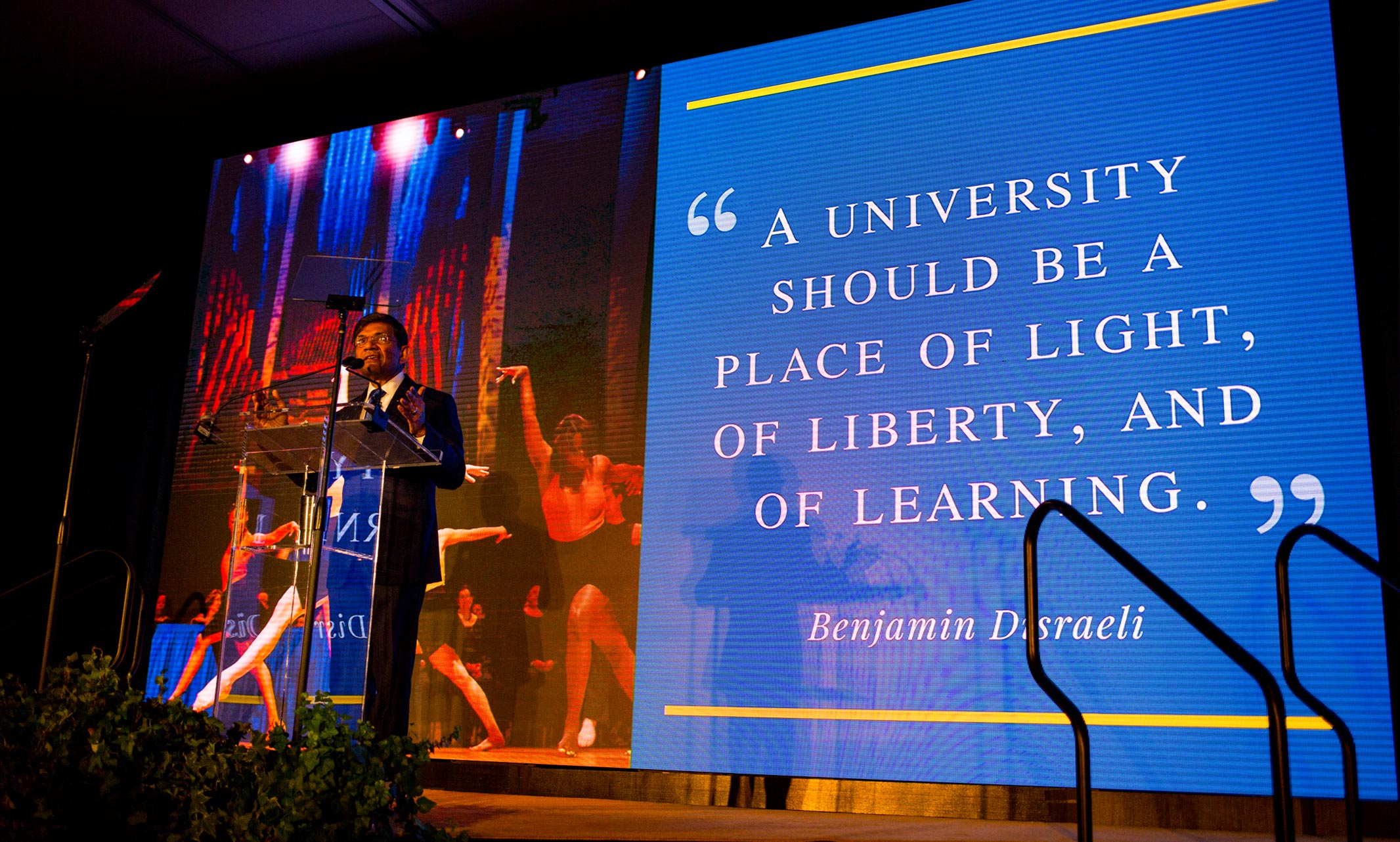
Chancellor introduces 5 new signature initiatives for the university and Kansas City
Students, faculty, staff and the Kansas City community gathered to celebrate the investiture of Mauli Agrawal, Ph.D., as the ninth chancellor of the University of Missouri-Kansas City.
Agrawal took the opportunity at the ceremony — his university inauguration — to share the vision for UMKC that he has been crafting for the past nine months.
“A university should be a place of light, of liberty and of learning,” he said, quoting Benjamin Disraeli. “…That vision calls for all of us to make the commitment to be not only a Place of Light but also become a Community of Excellence.”
So what’s a Community of Excellence? Agrawal referenced a biography about philanthropist Henry Bloch, founder of H & R Block, who has given generously to Kansas City and UMKC.
“’The person who succeeds is the one who does his or her own job, and then some; who is thoughtful to others, and then some; who meets obligations and responsibilities, and then some. That’s the person who steps ahead of the crowd and goes on to great heights,’” Agrawal quoted. “That is the philosophy we must live by to become a Community of Excellence; that is the culture we must grow here at UMKC. The path to excellence is not very complicated — it is as simple as truly living the culture of ‘and then some.’”
Agrawal introduced five signature initiatives — each aligning with the new UMKC Strategic Plan 2018-2028 — that help provide a path to excellence.
Student Success: Roo Strong
Provost Barbara Bichelmeyer and her team have introduced Roo Strong, a new student-success model. It’s a personalized plan for education and support that makes these commitments:
We will meet each student exactly where they are.
We will assess, but not assume or judge.
We will treat each student as a member of our family.
We will engage each student with learning experiences and co-curricular supports to meet their unique needs.
We will provide each student with constant guidance and feedback.
We will help each student take responsibility for their personal progress, their education, their decisions and their futures.
Research: UMKC IDEAS
Agrawal introduced the UMKC Institute for Data Education, Analytics and Science, or IDEAS for short.
The vision of the institute is to position UMKC as the top option for data science education, research and service in the region, building on the university’s strengths in biomedical informatics, big data analytics, image analysis, natural language processing and geospatial analysis.
The coordinator of the new institute is Brent Never, associate professor of public affairs at the Henry W. Bloch School of Management. Never is a “civic hacker” who uses city data to analyze abandoned housing, and was interviewed about his work last year by Lester Holt on NBC Nightly News.
Professional Education: UMKC TalentLink
Individuals enrolled in UMKC TalentLink will not pursue a traditional degree but will work to earn badges, stackable certificates and other new forms of credentials that are evolving in the 21st century. Sarah Morris, the new executive director of informal and continuing education, is leading the development of the initiative.
Healthy Communities: UMKC Health Equity Institute
Jannette Berkley-Patton, associate professor in the UMKC School of Medicine, will lead a new initiative to ensure that individuals and families in the Kansas City area have equal opportunities for improved health and well-being. The Institute will use UMKC research and outreach to identify, quantify and address health care gaps in our neighborhoods.
Berkley-Patton is a national leader in African American health research. One of her noted projects, Taking It to the Pews, was funded with a $3.2 million grant from the National Institute of Mental Health to assess HIV testing. She is the director of the UMKC Community Health Research Group, which supports collaborative community research, and provides doctoral and undergraduate training in community participatory research. She collaborates with networks of churches in her health research in Missouri, Kansas, Alabama and Jamaica.
Building Pride: Mentorship
Several new faculty and staff mentorship and support programs are underway, including “Talk It Up,” focused on career and professional development.
“This commitment to our people is truly foundational,” Agrawal said. “It is the rock on which everything we hope to achieve will be built...More than anything, I want our people to be as proud of themselves, and our university community, as I am proud of all of you. And we have a lot to be proud about. Look around Kansas City.”
Where you see urban education succeeding against long odds, you see Roos.
Where you see the sick being healed and new cures being discovered, you see Roos.
Where you see the innocent being freed from unjust imprisonment, you see Roos.
Where you see communities reducing crime and neighborhoods organizing to improve, you see Roos.
Where you see burgeoning opportunity in engineering, science and technology, you see Roos.
Where you see the arts flourishing and enriching lives, you see Roos.
As you have no doubt been reminded lately, Roos really are everywhere, and they excel everywhere.
Apr 02, 2019
From the Kansas City Business Journal: Mauli Agrawal unveiled five projects as part of his inauguration as chancellor
The University of Missouri-Kansas City chancellor announced two new research institutes and a continuing education program Tuesday as part of a plan to kick-start the school’s growth. Read more
Apr 02, 2019
Dynamic duo in pre-med school preparation means tough love
The heart of UMKC is our campus community. With small class sizes, it’s easy to develop faculty-student mentorship teams. And these rich relationships—our Dynamic Duos—are some of our best success stories.
Sometimes students start to second guess their career aspirations once they get into rigorous coursework. This is especially true for those going into the medical field. But before throwing in the towel, do what Ethan Granger did and explore how mentorship can give you a fresh perspective on your challenges.
Granger is in his third year of the biology program at UMKC. He’s wanted to be a doctor since he was a kid, but he’s been surprised by the incredible focus and hard work his biology degree demands. Nevertheless, his experience is made easier because of the perspective and advice from his mentor, Tammy Welchert, associate teaching professor and director of student affairs and academic advising for the school of biology. The two met at Biology Boot Camp, a summer program for incoming freshman biology students. Curiosity piqued, we recently sat down to listen to them both recall how their mentor/friendship developed.
“Tammy introduced herself at boot camp by saying, ‘Hi, I’m Tammy. I’m like the mom,’” Granger says. “I had moved in the night before and had mock lecture at 8 a.m. I was barely awake – and thinking about food – when she came up to me and said, ‘You’re Ethan Granger!’ When I asked her how she knew, she said, ‘You have a very distinct personality.’”
“It’s very important to me to learn everyone’s name,” says Welchert.
Granger’s mouth drops open.
“That is so not how I took it,” he says. “I thought you’d seen my last mock test and knew I was the one talking in the back during lectures.”
Despite their inauspicious beginning, the two formed a natural connection. Their relationship is relaxed – they are often teasing and laughing – but there is a clear connection of mutual respect.
“For whatever reason, at that boot camp, you all kind of adopted me as ‘Mom,’” Welchert says. “They even called me ‘Mom.’ We've never had that happen in a boot camp before, so that was a little unique. But I think part of that really contributed to you — for whatever reason — feeling like I was someone you could trust. We've talked about a lot of personal things.”
While Welchert is supportive, she is not always a cheerleader.
“I’m at the halfway point to graduation and we had to have a very frank conversation at Crow’s Coffee about four months ago,” Granger says.
“I had to tell him, if you’re going to pursue medical school then you need to focus,” Welchert says.
“I’m one of those people who will spread themselves so thin. Like, you can see the toast under the peanut butter. We were talking about medical school and we had to have a very frank conversation about how I needed to put up and do what I need to do. Most advisors won't have that conversation with you - as frank as it was -but it needs to happen. Someone needed to say to me, ‘You’re not going to make it the way you’re going right now. You need to change or you’re going to be out all this money for nothing.”
Welchert’s wake-up call made a difference.
“I was so stressed out, but she gave me a list of things that I needed to do and I started figuring it out.”
“And you’re in scribe position now!” Welchert says.
Granger acknowledges that this job, which entails updating doctors’ and practitioners’ notes on patients’ charts, has provided a realistic view of the medical profession. And while he’s comfortable with his leadership experience and grades for med school interviews, he wanted more clinical background.
“He had a very glamorous picture of what this career was going to be like,” says Welchert, who recommended him for the position. “So I told him that he need to align his perspective with what it really is.”
Granger says his scribe experience has done that.
“Especially when you have a patient with a stroke and another who’s been in a car crash come in in an hour. It’s shown me a lot of things that need to be fixed about health care. That first-hand experience is something I can definitely talk about in my interviews. ”
Once she knew Granger was willing, Welchert was able to help him get the experience he needed.
“We have a recent alum who is a trainer for the scribe company and I called and said, “Hey look for this application that is going to be coming through. I think this is somebody that'll do a good job.
“It’s been interesting, because Ethan’s and my relationship is something that a lot of students miss,” Welchert says.
While their relationship grew naturally, both agree that students should feel comfortable reaching out to faculty.
“I’ve heard before that students feel as if they’re missing these kinds of close connections. I’m a strong believer that those connections are out there, you just have to go in and work for them. It's on you to foster that connection and make something of that.” Ethan Granger
Welchert agrees that faculty is open to forming mentoring relationships.
“Our faculty will tell you that the most underutilized time that they have is office hours,” she says. “We want students to come in and we want that one-on-one opportunity to interact with the students, but we can't drag you in. There are ways in the School of Biological Sciences that we’re trying to foster that — like with boot camp. We really emphasize building relationships and having the chance to get to know your professor so that you will ask questions.”
Granger says no one has ever given him the impression that they are not available.
“Honestly, I don’t think you’d get hired here if you weren’t there for your students,” Welchert says. She stops and turns to Granger. “Hey, it’s like what you just framed for me!”
“The quotes! Quotes that she tells me three thousand times a day,” says Granger, good-naturedly rolling his eyes.
Welchert does not miss the opportunity to remind him of one of her favorites.
“Never again in your life are you going to be surrounded by so many people who are more invested in your success than you are right here at UMKC.” Tammy Welchert
Granger agrees.
“If it weren’t for Tammy I would have left after the first semester.”
“Really?” she asked incredulously.
“No doubt about it. Yep. Tammy kept me at UMKC.”
Apr 01, 2019
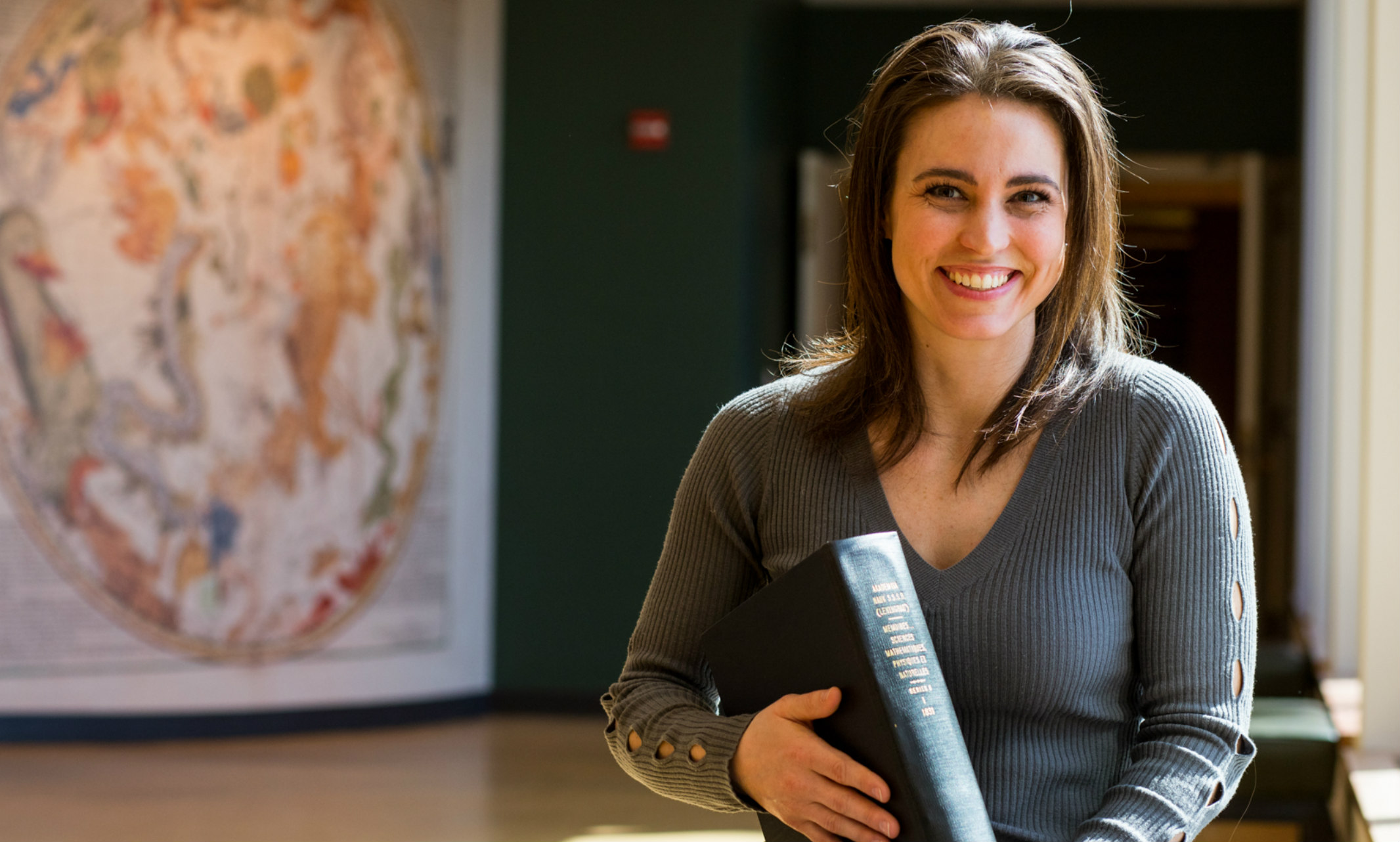
Student translates original 19th century manuscript to support research in mathematics
Whitney White, B.S. mathematics and physics, was excited to find that a historical document that she needed for her undergraduate research was available in its original form at the Linda Hall Library. She was undaunted by the fact that it had never been translated from its original French, even though she did not speak the language.
“I was floored to hold that history in my hands,” White said of the document, which was created in 1831. “And I was over the moon to learn that no translation existed. The history is incredible and being the first person to translate it makes me feel like I have a small part in this history as well.”
Mathematics and physics are White’s passion, and the Divergence Theorem is used in both. Translating the theorem in an unfamiliar language was daunting, but she was undeterred. One of her professors provided a paper that translated common French mathematical terms into English.
“I did not want to misrepresent the original work, so I had to be meticulous and accurate,” White said. “But after completing the translation and connecting the original and modern proofs of the Divergence Theorem, I now better understand it. This more in-depth understanding of the logic of the proof is the greatest personal benefit of completing this project.”
Henrietta Rix Wood, Ph. D., associate teaching professor at the Honors College, notes that this is why undergraduate research is important.
“Undergraduate research is a fun and rewarding way for students to develop important skills, such as posing questions and figuring out how to answer them, testing ideas and applying theories, and sharing their findings.” Henrietta Rix Wood, Ph. D.
She also believes these skills extend beyond the university setting.
“As students contribute to scholarly conversations, they practice the important life skills of problem solving and persevering when things do not go as planned.”
White’s research was published in the latest issue of Lucerna, UMKC’s annual interdisciplinary journal of undergraduate research. Students are welcome to submit research papers written anytime during their academic careers at UMKC.
White says that students interested in being published in Lucerna should pick a novel topic that interests them.
“It‘s important to start your work early, compose multiple drafts and ask for help in tearing them apart,” White says. “If you care about your research, it will show.”
Wood, who is the current Lucerna faculty advisor, encourages students to submit their research.
“This process also is about the thrill of discovery, which Whitney felt when she learned that Linda Hall Library had a historical document that was crucial to her project. I think undergraduate research truly enhances a student’s learning experience.”
For further information, please visit https://honors.umkc.edu/get-involved/lucerna/
Apr 01, 2019
Steven Dial with KSHB interviewed Justice Horn, new SGA president at UMKC
University of Missouri-Kansas City students elected Justice Horn as their Student Government Association president. Watch the news clip
Apr 01, 2019

Educating practitioners focused on prevention
The University of Missouri-Kansas City took another step forward in shaping the future of health care. In the fall, it welcomed the first class of students into the new Bachelor of Science in Public Health degree program.
The goal is to integrate public health into the community and improve health outcomes for the population at large. The new program is based at the UMKC School of Nursing and Health Studies. While a nurse or doctor will treat individuals, public health professionals look at prevention measures that can help people stay healthy. According to the National Center for Health Statistics, over the past century, public health efforts are responsible for 25 of the nearly 30 years of improved life expectancy.UMKC Public Health Program Director Joseph Lightner sees great value in all health care students getting a taste of what public health has to offer. “Medicine alone can’t solve all the problems," he said. "Public health brings everyone to the table and having all disciplines interact is the only way public health issues will get solved.”Prevention plays a big role and that is primarily what drew public health student Kinzie Aulgur to the program. She was initially pursuing a path in nursing, but it was her experience in hospitals that began to change her thinking.“So many of the people in the hospitals were sick due to preventive diseases and I wanted to do something to help them avoid the hospital altogether,” said Aulgur. “I wanted to go directly to the source, and when I heard about the public health program at UMKC, I knew it was a perfect fit.”
Joey Lightner, director of the UMKC public health program, talks to student Krunal Bombaywala. Photo by John Carmody
Recently, a group from the program; including Lightner and another one of his students, Krunal Bombaywala; attended the American Public Health Annual Meeting. The national conference is the largest for public health professionals with nearly 13,000 attendees.
Lightner said these experiences can be instrumental in a student’s career path. When he was an undergrad at Kansas State University, one of his faculty members suggested that he present their research at a large national conference.
“That trip was the reason that I applied to graduate school and started a career in research,” said Lightner. “Learning from experts in the field and gaining exposure to the newest research is essential to getting the next generation of public health practitioners and researchers excited about research and advocacy. Doing so will contribute toward the goal of making UMKC the premier undergraduate research institution for public health.”
According to Lightner, the program works to get its students doing the work of public health right away. The goal of the program is to get boots on the ground working on public health outcomes immediately.
“Medicine alone can’t solve all the problems. Public health brings everyone to the table and having all disciplines interact is the only way public health issues will get solved.”
– Joey Lightner
The culmination of the program is the capstone course, where seniors in the program choose what public health entity they’d like to work with and then effectively evaluate their processes and design thinking. The students do the work that consultants in the field would perform. They provide the entity the data from their research and gain valuable real world experience.
Aulgur was able to incorporate her capstone project into the work she was doing as the gender violence prevention intern at the UMKC Women’s Center. She is evaluating the effectiveness of the programs that the Women’s Center provides and looking at ways to get more students involved with the center. Once she’s finished with her research, she’ll present that data directly to the Women’s Center leadership.That research component is critical throughout the program, not just during the capstone course. A number of the public health students will be presenting their research at upcoming UMKC Undergraduate Research Symposium on a number of innovative topics that cover a wide array of issues. The students will present on racial justice in the courts and incarceration system, the link between sodium intake and cardiovascular disease, and e-cigarettes usage, among other interesting topics.Bombaywala says public health’s focus on the entirety of the health care spectrum is making him a more well-rounded health care provider. He plans to pursue a career in dentistry but appreciates how his pursuit of a public health degree is giving him a deeper understanding of the health care system as a whole.“As a future dental student, the public health program has provided me a perspective beyond just clinical,” said Bombaywala. “I’ve been able to collaborate with a variety of health care providers so I will have a better understanding of the entirety of the health care issues my future patients may be facing.”
Learn more
Mar 30, 2019
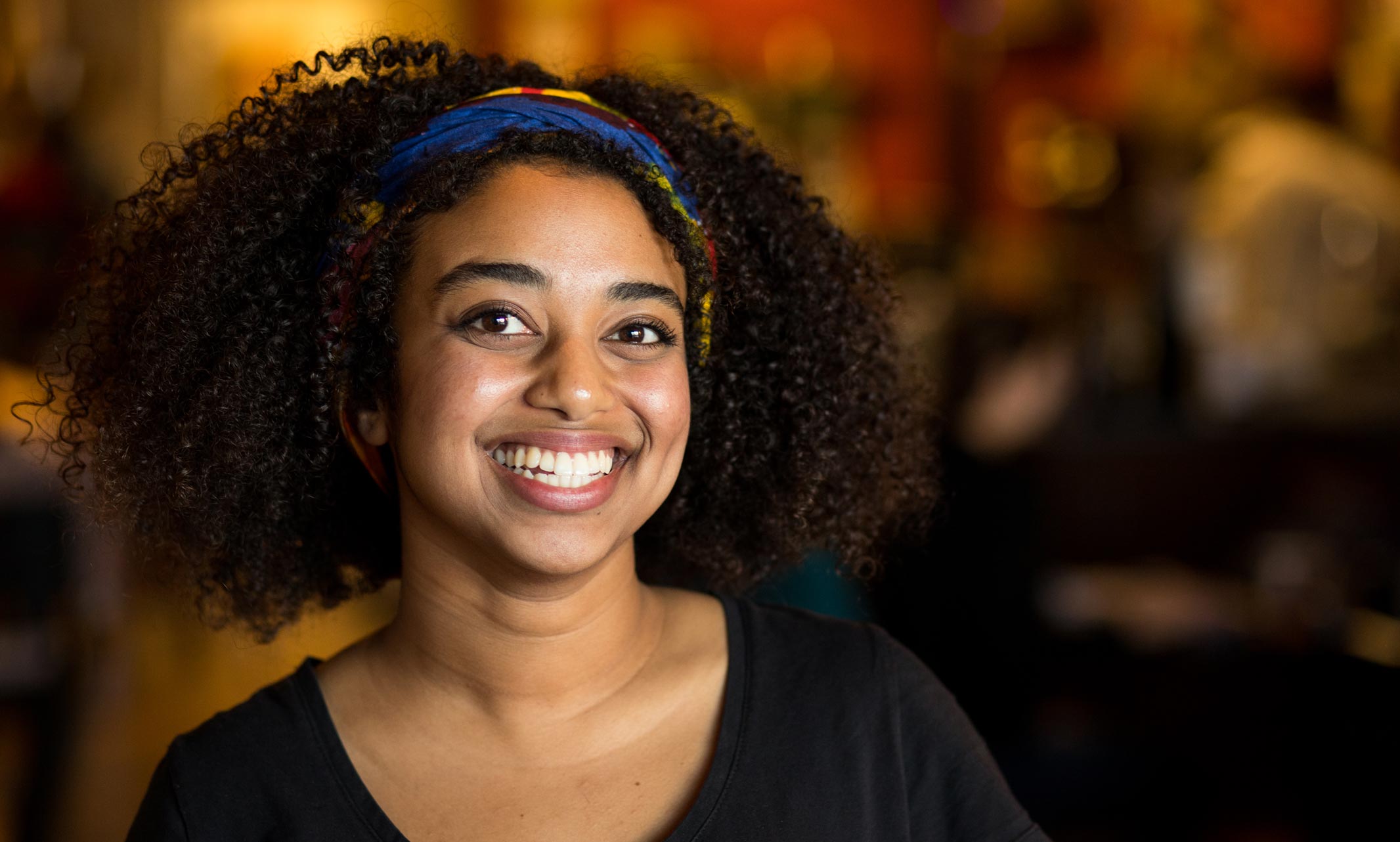
Salem Habte is inspired by her parents' entrepreneurial example
Get to know our people and you’ll know what UMKC is all about.
Salem Habte is a first-generation student who is inspired by her small-business owner parents. She shares what she's learned from them and how she's found entrepreneurial opportunities at UMKC.
Salem Habte ’20
Major: Bachelor of Business Administration, EntrepreneurshipSchool: Henry W. Bloch School of ManagementUMKC organizations: UMKC EnactusHometown: Overland Park, Kansas
Congratulations, we hear you're traveling to London for a global business competition. Tell us about it.
Unilever is a company sponsor of Enactus USA, and in May 2018 at National Competition, we won an award called the Unilever Bright Future Partnership Accelerator for our FeedKC project. This honor was awarded to the best initiatives combating food waste, and we won first place in the nation.
Each year, Unilever hosts the Unilever Future Leader's League, a business case competition for university students at their London Headquarters. As the winners of the Accelerator, Unilever invited three members from UMKC Enactus to represent the United States in the competition in England! This business case competition will be from April 10 to 12, and will host Enactus students from more than 20 different countries across the world. Andrea Savage (project leader of FeedKC) and Ali Brandolino (vice president of Enactus) and I (president of Enactus) will travel as the United States team. I'm thrilled that UMKC will be representing the United States in a world business competition, and honored to take part in it.
Why did you choose UMKC?
I wanted to go to a college with a progressive, diverse student body. I was lucky enough to go to a high school (Olathe North) with every kind of student, and I didn’t want to go somewhere that lacked that. A family friend told me that this university was full of culturally diverse students who really thought outside of the box. I had the opportunity to meet with the chancellor before making a final decision on where to go. He was very welcoming, funny and such a bright guy. He advised that I join the entrepreneurship program and so I did.
What else inspired your field of study?
My father is a great influence on me. We have a family-owned coffee shop, Revocup Coffee Roasters, in Overland Park. He believes in attacking a problem in the world with a business model. He follows that belief with our coffee shop. We have been able to give back and fight the literary famine in Ethiopia— so far 25 libraries have been built.What I’ve learned is that entrepreneurship is really a form of applied creativity and that the entrepreneurs who really flourish are passionate and willing to extend the limits of what is possible.
“I have access to one of the most entrepreneurial ecosystems around.”
What are the challenges and benefits of the program?
From what I’ve seen, to lead a successful project or business, you have to be crazy. The amount of hard work is impossible unless you’re relentlessly driven by a cause or a vision. It can be challenging to stick to something even when the going gets tough, or to try an idea that doesn’t work. But those become learning experiences.The benefits are the people you get to meet and work with. Most of these connections have happened through an incredible organization that I’ve been involved in since my first day here, called UMKC Enactus. I’ve only been in Enactus for a year and have gotten to work on projects with so many unique individuals on and off campus.
What’s the best piece of advice you have ever received from a professor?
That what I do in class will get me a job, and what I accomplish outside of class will get me a promotion. My extracurricular activities have shaped me and have given me priceless experiences and knowledge, and I think those are what will really open doors for me when I graduate.
What motto do you live by?
“Everyone you will ever meet knows something that you don’t.” –Bill Nye
What do you admire most at UMKC?
I admire the enthusiasm of UMKC as a whole. My school supports and sees me. My efforts are visible here. UMKC has provided me a platform and there’s a lot of love to go around.
Are you a first-generation college student?
Yes! The authentic first-generation experience is different for everyone and is very personal, but I think that basically we all live with something to prove. The dream for first-generation Americans, whether that’s joining the workforce straight out of high school, going to college or embarking on a new mission, is to realize one day that we’ve used our beginnings as motivation to transcend anyone’s expectations.
“Reaching my goals is a team effort at UMKC.”
What are your life goals?
Michelle Obama is a huge inspiration. I would like to start projects, nonprofit organizations on a business scale. I would like to have a heavy influence on making lives better and put effort into making this world a better place. I want to give a TED Talk.
What is one word that best describes you?
Joyous! I’m pretty responsible for the energy I bring into a space and I’ve found that when I put out positivity, I usually get positivity back.
Mar 29, 2019
Dos Mundos covered the Starr Women’s Hall of Fame induction event on March 22 at UMKC
Former first lady Laura Bush, and her daughter, Barbara Pierce Bush, headlined the Starr Women’s Hall of Fame induction event on March 22 at the University of Missouri-Kansas City. Read more
Mar 29, 2019
The Kansas City Star reports on 50 local artists who have come together in the hopes of making a bit of a change
Arzie Umali, assistant director of the University of Missouri-Kansas City Women’s Center and the show’s curator, notes that women artists have been written out of the history of art over time. Read more
Mar 27, 2019
From Bloomberg: Mobile medical apps let physicians practice telemedicine full time
Most doctors have a license to practice medicine in just one state. Lindsey Mcilvena, M.D., can practice medicine in 26 states. She is a graduate of the University of Missouri-Kansas City School of Medicine. Read more
Mar 26, 2019
The Kansas City Star's "What’s on my desk" feature highlighted UMKC Conservatory faculty member Bobby Watson
For people who have a hard time thinking outside the box, a desk is likely a piece of furniture.
That definition might not work for Kansas City jazz musician and educator Bobby Watson.
Watson is the first William D. and Mary Grant/Missouri endowed professor of jazz studies and director of jazz studies at the University of Missouri-Kansas City. After 20 years of being in that role, he plans to retire from academia at the end of the 2019-20 school year. Read more
Mar 25, 2019
KCUR takes a look at UMKC's standardized patient program and the actors who help out
"It's important for all students to receive the same level of training, and in clinics it's challenging for everybody to see the same patients," says Courtney McCain, who coordinates the standardized patient program for the UMKC School of Medicine. Read more
Mar 23, 2019
Fox4KC attended the 2019 Starr Women's Hall of Fame that paid tribute to 10 extraordinary Kansas City women
Former First Lady Laura Bush, and her daughter, Barbara Piece Bush, joined about 1,000 others Friday in paying tribute to 10 women being inducted into UMKC's Starr Women's Hall of Fame. Read more
Mar 22, 2019
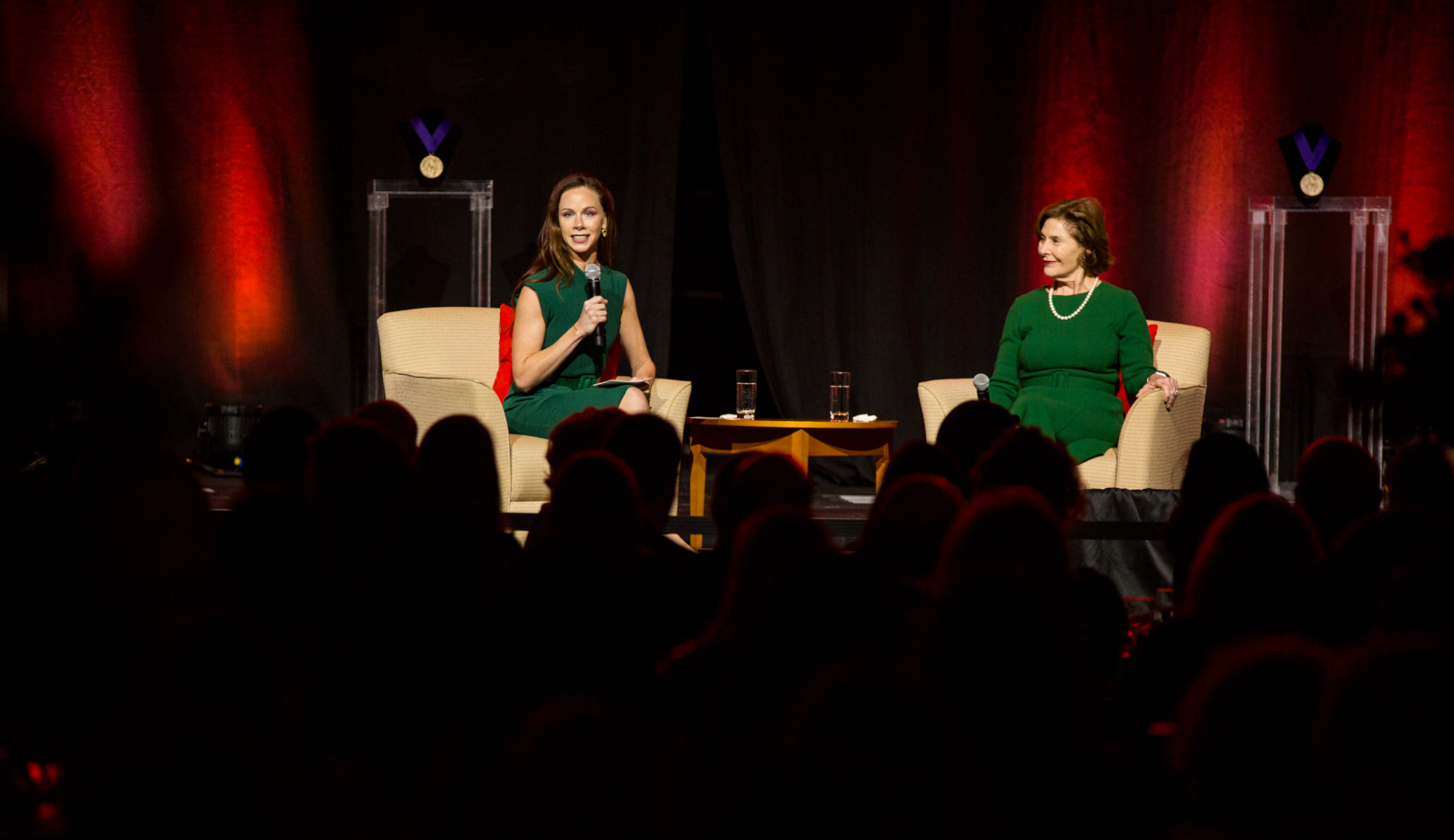
First Lady and First Daughter speak during event honoring the legacies of women leaders in Kansas City
UMKC welcomed Former First Lady Laura Bush and her daughter, Barbara Pierce Bush, in conversation at this year’s Starr Women’s Hall of Fame luncheon. Both recounted their work in humanitarian causes to a room of more than 1,000 attendees.
They spoke with fondness about their relationships with President George Bush and First Lady Barbara Bush, who died within months of each other last year. Barbara Pierce Bush recalled being conflicted about sharing her name with her grandmother and the occasional confusion it caused. Her thinking changed following her grandmother’s death.
“She finally chose hospice after having lived so fiercely and fearlessly. I realized that she taught me how to live and how to die,” she said. “It was incredible to get the gift of a reminder every day of her bravery and to be more fearless in life.”
Laura Bush was grateful, too, that her mother-in-law had been a strong role model in life and as first lady, a position she referred to as “a role without a rule book.” Since her husband left office, Bush has focused her efforts on education and literacy inspired by her career as a teacher. She is working, too, on initiatives through the George H. W. Bush Presidential Library and Museum with women leaders in the Middle East to use their roles as platforms to help the people of their countries.
As their talk concluded, Pierce Bush asked her mother if she could offer a piece of advice. Bush told the story of former First Lady Barbara Bush in the last years of her life, who made a regular practice of walking her dogs on the beach daily. As her health deteriorated, she drove a golf cart with the dogs running behind. Bush felt that her mother-in-law knew that her life was waning and she was making the most of it.
"Take advantage of your life as it is," Bush said. "All we know we have is now."
In addition to the Bushes, previous speakers at the Starr Women’s Hall of Fame events have included actress Ashley Judd, “Good Morning America” host Robin Roberts and Chelsea Clinton, daughter of President Bill Clinton and former Secretary of State Hillary Clinton.
Inducting the 2019 Class of the Starr Women's Hall of Fame
The Starr Women's Hall of Fame is held biannually at UMKC, and is dedicated to recognizing extraordinary Kansas City women and preserving the history of their accomplishments. These women are social reformers, volunteers, philanthropists, civic leaders, activists and educators. They are movers and shakers whose tireless commitment to community has made Kansas City a better place to live. This year’s inductees are:
Bunni Copaken envisions the arts as a vehicle to promote racial understanding and inclusivity, which led her to create opportunities for people from disparate backgrounds to meet, connect and create together. Copaken is a founding board member of the Women’s Foundation, the Kansas City Friends of Alvin Ailey, and a longstanding member of the Kansas City Repertory Theatre board of directors.
Mary Tiera Farrow (1880-1971), is the founder of the first organization to welcome women in the legal field in Kansas City, first female judge in the City of Kansas City, the first woman in the United States to defend a woman on trial for murder and the first woman to argue before the Kansas Supreme Court. She graduated from Kansas City School of Law (now UMKC School of Law) in 1901, at a time when women lawyers were very rare.
Laura Rollins Hockaday (1938-2017), longtime society editor for The Kansas City Star, transformed race relations by expanding the newspaper’s previously racially restrictive society page to be inclusive. In recognizing and addressing the injustice in lack of coverage, she quickly and efficiently used her small part of the paper as the impetus for wider change for Kansas City as a whole.
Mamie Currie Hughes has made her mark on the Greater Kansas City community as a tireless advocate for cutting through racial and gender biases and discrimination. She has been a charter member of the Jackson County Legislature, former Chair for the Mid-America Regional Council and founding member of the Central Exchange. She serves on the Council of Advocates for the Midwest Center for Holocaust Education.
Dr. Patricia A. McIlrath (1917-1999), was a longtime chair of the Department of Theatre at UMKC and founder of the Summer Repertory Theatre, which became the Missouri Repertory Theatre in 1966 (now KC Rep.) She opened auditioning to the community and directed racially-integrated productions. The majority of theatre companies in the Kansas City area trace their roots back to her mentorship and influence.
Janet Murguía, one of the nation’s most prominent civil rights leaders, has fought for equal rights throughout her career. As a legislative assistant to former Congressman Jim Slattery and deputy director of legislative affairs to President Clinton, Murguía counseled and convinced U.S. leaders on the economic needs of minorities. She is president and CEO of UnidosUS (formerly the National Council of LaRaza), the largest Hispanic advocacy group in the United States.
Mona Lea Perry has lent her voice to furthering civil rights and diversity inclusion for minority and ethnic groups for more than 60 years. She worked as an employment specialist with the American Indian Center in Kansas City and has volunteered with a myriad of organizations including the Homeless Service Coalition, Stand for Children and KC Harmony. Perry has received four certificates of service as a member of the Missouri Advisory Council for the U.S. Commission on Civil Rights and in 2014 she was honored with the Martin Luther King Olathe Kansas NAACP Hero of Diversity Award.
Nell Quinlan (Donnelly) Reed (1889-1991), a pioneer in employee rights, established the Donnelly Garment Company in 1919 and for much of the 20th century it was the largest dress manufacturing company in the world — making more than 75 million dresses and employing 1,300 people for years in Kansas City. She was also a pioneer in employees’ rights and implemented many improvements in work conditions and compensation including air conditioning, life insurance and pension plans.
Beth K. Smith (1921-2017) consistently worked to help women in Kansas City reach their full personal and professional potential. A co-founder of The Central Exchange and The Women’s Employment Network and instrumental in establishing the Women’s Foundation of Kansas City, Smith created organizations that aim to promote equity, inspire confidence and foster economic independence for women.
Dr. Linda Hood Talbott, founder of the Center for Philanthropic Leadership and founding member of the Greater Kansas City Foundation, Women’s Employment Network, Central Exchange and Women’s Foundation, became the first woman from Kansas City to sit on the board of a Fortune 1,000 company when she was elected to serve on the Board of Directors of Kansas City Power & Light in the early 1980s. Talbott has established a number of scholarships at UMKC, her alma mater, and in 2015 announced her commitment to leave $1 million of her estate to the Honors College.
Mar 22, 2019
UMKC student Salem Habte talked to KCTV5 about the UMKC Enactus competition in London next month
A group of students at UMKC’s Bloch School are gearing up for a business competition next month at Unilever in London. They were selected to represent the entire United States and expect to learn about more than just business. Read more
Mar 22, 2019
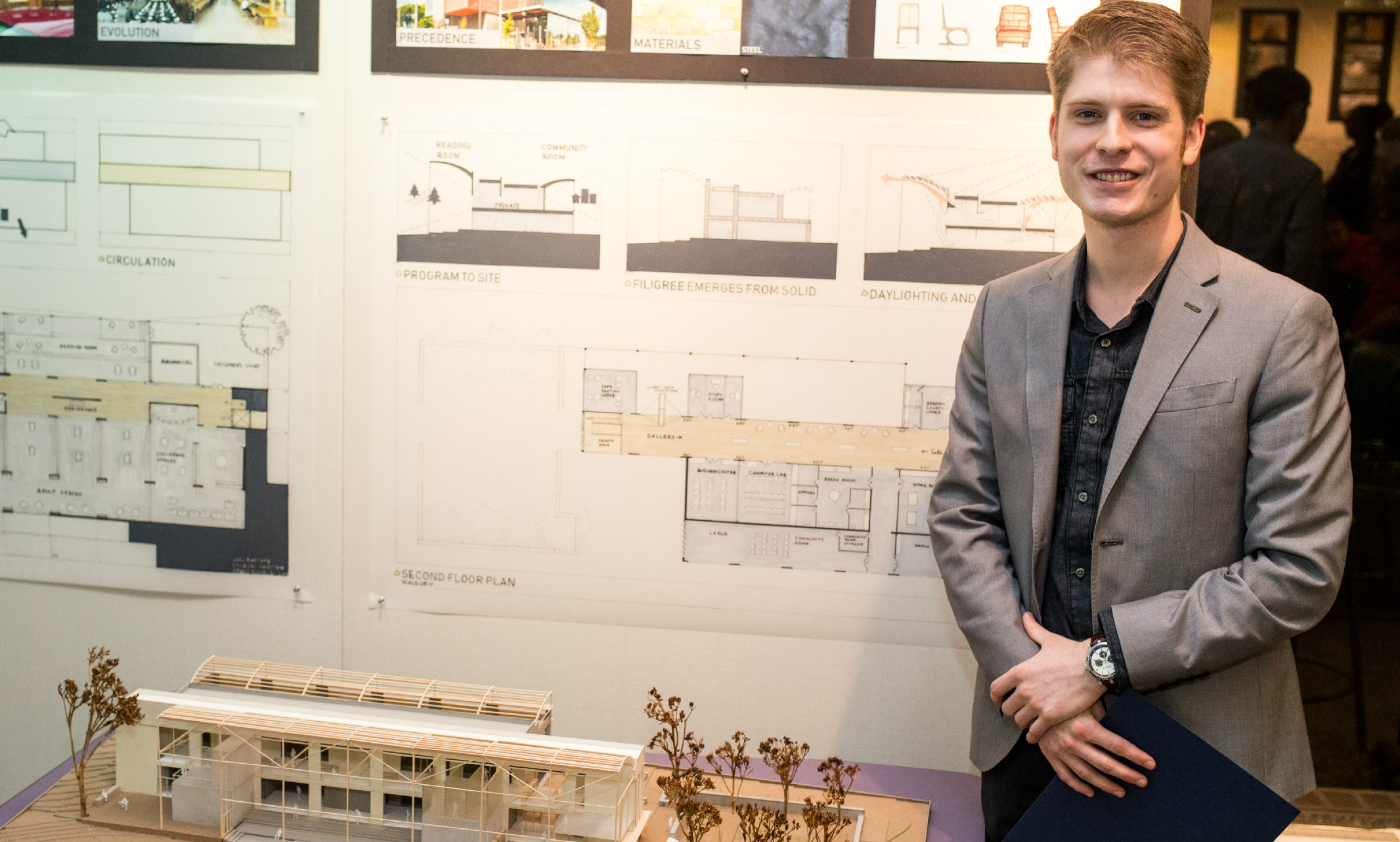
Joel Burford won the Helix Prize scholarship challenge for architecture and design students
Our ongoing story starts with people from around the world, converging here at UMKC. Get to know our people and you’ll know what UMKC is all about. Joel Burford recently won the Helix Prize and Scholarship for architecture and design students. He shared a little about his entry and what it’s like being an architecture student at UMKC.
Joel Burford
Expected graduation date: UMKC 2019, completing program at Kansas State University 2022Hometown: Wichita, KansasHigh School: Homeschooled K-12Program: M.A. Architecture, Interior Architecture/Product Design
Why did you choose your field of study?
From the time I was little, I was always designing and making an array of things. From websites in PowerPoint to handmade magazines, movie sets and props to competitive robots. Product and industrial design (as well as architecture) have been the longest running passions of mine.
Why did you choose UMKC?
UMKC is nicely situated near many great sites in Kansas City for architecture students such as the Nelson-Atkins Museum of Art, Union Station and the Kauffman Center for Performing Arts. In addition, Kansas City is home to much of my family.
Many don’t realize the architecture program is a partnership between UMKC and Kansas State University. As a student, how do you benefit from this partnership?
For me, I get the best of both worlds: UMKC is in an urban setting with smaller class sizes and KSU is in the Kansas plains with larger class sizes. By working on the UMKC to KSU path, I get the maximum variety in learning while still growing in the same curriculum.
Where do you draw inspiration from when working on a project?
Depending on the project, inspiration can come from site visits, programmatic issues, precedence of similar projects or doodling on paper and bouncing ideas off peers.
“UMKC is nicely situated near many great sites in Kansas City for architecture students such as the Nelson-Atkins Museum of Art, Union Station and the Kauffman Center for Performing Arts.” –Joel Burford
You won the 2018 Helix Prize and Scholarship. Tell us about the architecture and design competition.
Every year there’s a final project for the semester, which is also the biggest. This year, we were tasked with creating a (hypothetical) library in the Columbus Park neighborhood of Kansas City, Missouri, and were given suggested specifications for size (about 28-29,000 square feet) and a list of required rooms: reading room, books stacks, business center, study rooms, café, etc. There was a large learning curve with this project. Previously, our biggest project had been a fairly large pavilion—even that was small compared to this.We had to take into consideration the rich history of the neighborhood and interpret how the library of 2018 would fit into that. To accomplish this, I designed a library that transitions the community from the old to the new with what we call in architecture a “wall scheme.” The neighborhood on the south side of the library’s site (located on East 5th Street and between Harrison Street and Gillis Street) is dense, and the green space to the north is open. Visitors walk through limestone and terra cotta veneered spaces - reflecting the historic architecture - to a larger and open space where the steel structure emerges, celebrating modern architectural technology and giving the neighborhood an enriching community hub.Also, on the site there are locust trees. I decided that instead of outsourcing the wood, we could use materials already on the site. The wood from those trees would be used for the main circulation flooring. This would help give a warm-feeling middle to the library.
Learn more about the Architecture Program
Mar 21, 2019
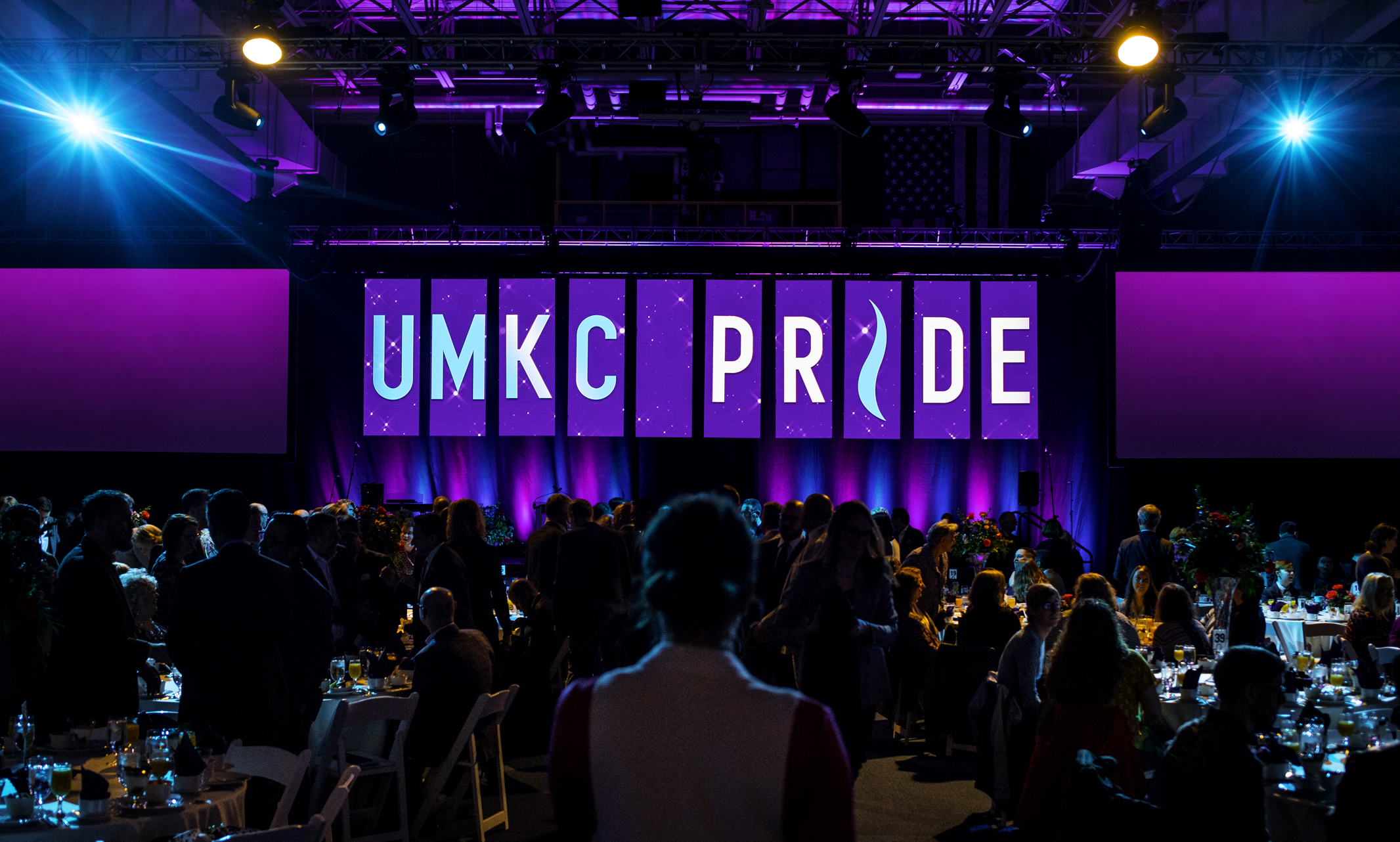
Activist Sarah McBride speaks at event to support UMKC LGBTQIA students
The UMKC Pride Breakfast returned on March 21 with more than 600 allies gathering to show support for the university’s LGBTQIA students. The featured speaker was Sarah McBride, national press secretary for the Human Rights Campaign, one of America’s most public voices in the fight for LGBT equality. McBride was the first transgender woman to address a national political party convention.
This year’s breakfast raised $202,195 for LGBTQIA programs and scholarships at UMKC. Student speaker Trae Tucker noted that support and events at a local level can make a difference on a much larger scale. “Starting with a drop of water to reprove inequalities and exclusivity in our communities eventually creates big waves that spread across our country for a more equal and loving life for all,” he said.
How UMKC Pride Breakfast Makes a Difference for Students
Featured Speaker: Sarah McBride
Chris Hernandez interviews Sarah McBride at the 2019 UMKC Pride Breakfast.
“We have transformed impossibility into possibility into reality.”
– Sarah McBride
Sarah McBride is a progressive activist and currently the National Press Secretary for the Human Rights Campaign, the nation’s largest LGBTQ civil rights organization.
McBride first made national headlines when, at the end of her term as student body president at American University, she came out publicly as transgender in the student newspaper. She went on to intern in the Obama White House, the first openly trans woman to do so, and, after graduating from college, helped lead the successful effort to pass gender identity nondiscrimination protections in Delaware.
It was during her time at the White House that McBride met Andrew Cray, a transgender man and fellow advocate. The two fell in love and began working together in the fight for LGBTQ equality. Cray was diagnosed with terminal cancer in 2014, and just days after they married, he tragically passed away. Cray’s passing instilled in McBride a firm belief in the urgency of political and social change.
Now as a spokesperson for the nation’s largest LGBTQ advocacy organization, McBride has become one of America’s most public voices in the fight for LGBTQ equality, culminating in her address before the nation during the 2016 presidential election. Her moving new book Tomorrow Will Be Different chronicles her journey as a transgender woman, from coming out to her family and school community, to fighting for equality in her home state and nationally, to her heartbreaking romance with her late husband. From Delaware to North Carolina to Texas, McBride is working to resist the politics of hate and to move equality forward.
“Sharing your story is one of the most significant and transformative things you can do to make a difference in the LGBT community.” – Sarah McBride
About the UMKC Pride Breakfast
Since 2008, the UMKC Pride Breakfast has raised funds to support LGBTQIA students at UMKC and served as a way to show our university’s commitment to creating and inclusive and welcoming environment on campus. The Pride Breakfast benefits programs and scholarships established specifically for LGBTQIA students, including the Pride Empowerment Fund, which provides emergency assistance to those who are experiencing financial difficulty due to loss of family support.
Mar 21, 2019
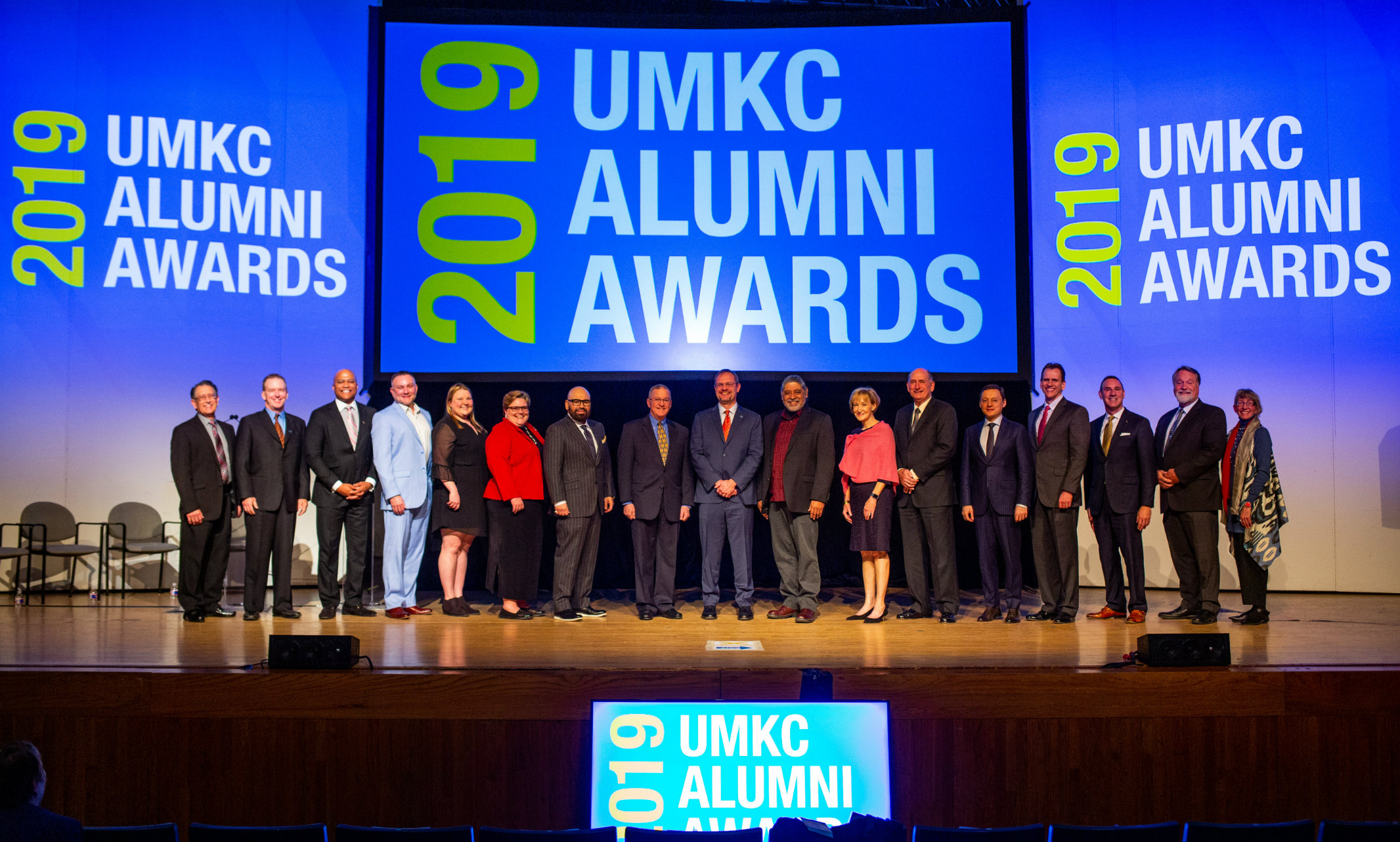
La Familia Promise and Opportunity Scholarship Fund receives first donation from Chancellor Mauli and Sue Agrawal
Students attending the University of Missouri-Kansas City now have access to additional scholarship funds thanks to a generous donation by UMKC Chancellor Mauli Agrawal and his wife, Sue. The new scholarship, called the “La Familia Promise and Opportunity Scholarship Fund,” was announced at the 2019 UMKC Alumni Awards Celebration on March 15.
The La Familia Promise and Opportunity Scholarship Fund will provide additional scholarship funds to students with high financial need. With matches from the Alumni Association, the UMKC campus and the UM System, the fund’s initial impact will be 10 students, receiving $5,000 each.
“Our eyes are always on what we can do to support our students,” said Tamra Hoffman, UMKC Alumni Awards Celebration co-chair and vice president of events for the UMKC Alumni Governing Board. “Many of our students have dire financial need. They have what we call a ‘financial hold’ on their accounts, which means they owe tuition money that needs to be paid in order for them to continue as a student, or to obtain their transcripts.”
Tamra Hoffman talks about the benefit students receive from the scholarship funds.
Thanks to the La Familia Promise and Opportunity Scholarship Fund, students have more resources, and alumni and friends have another opportunity to help students.
To highlight the impact of these types of scholarships, Jim Hogan, Alumni Awards Celebration co-chair and former alumni awardee introduced alumnus Brian Boman (B.S.C.E. ’17) who received financial holds funds as a student, allowing him to stay in school.
“The feeling of relief that I felt was immediately followed by the humbling truth that the UMKC Alumni Association and its supporters had paid my remaining balance,” Boman said. “The generosity shown to me felt like an affirmation of all the choices I made to be part of UMKC. While earning my degree I found community with my classmates and faculty. But, most importantly I found a way to have the life that was important to me; a life that gives back to the people and places that have already given me so much.”
Boman now works as a graduate engineer for the City of Kansas City and volunteers his time at UMKC as a member of the School of Computing and Engineering Alumni Board.
“The feeling of relief that I felt was immediately followed by the humbling truth that the UMKC Alumni Association and its supporters had paid my remaining balance.” – Brian Boman (B.S.C.E. ’17)
“UMKC helped me discover my passion, and I made my mind up that I would achieve my goal no matter how long or how hard my path would be,” Boman said.
Over the past several years the annual Alumni Awards Celebration has raised more than one million dollars in support of student scholarships including a full ride scholarship to an outstanding student supported by the UMKC Board of Trustees. The event also celebrated the outstanding achievements of UMKC graduates by presenting 17 awards.
In addition to school-based achievement awards, the UMKC Alumni Association presented university-wide honors to Dwight Scott (B.L.A. ’94), Alumnus of the Year; Steven St. John (B.A. ’96), Spotlight Award; Dick Gibson (B.M.E. ’67, MBA ’02), Bill French Alumni Service Award; José Faus (B.A. ’87), Defying the Odds Award; and The Strickland–Hembree Family, Legacy Award.
UMKC Alumnus of the Year Dwight Scott at the event.
Among the awardees were four veterans and doctors who work with veterans; a researcher, two conservationists and two preservationists. Awardees included educators, and people who share their knowledge, time and treasure. Honorees were people in STEM fields and people shattering glass ceilings.
All of the alumni awardees had one thing in common – excellence. In addition to raising scholarship funds, the Alumni Awards Celebration allowed UMKC to express pride in alumni accomplishments and to tell their stories.
Mar 20, 2019
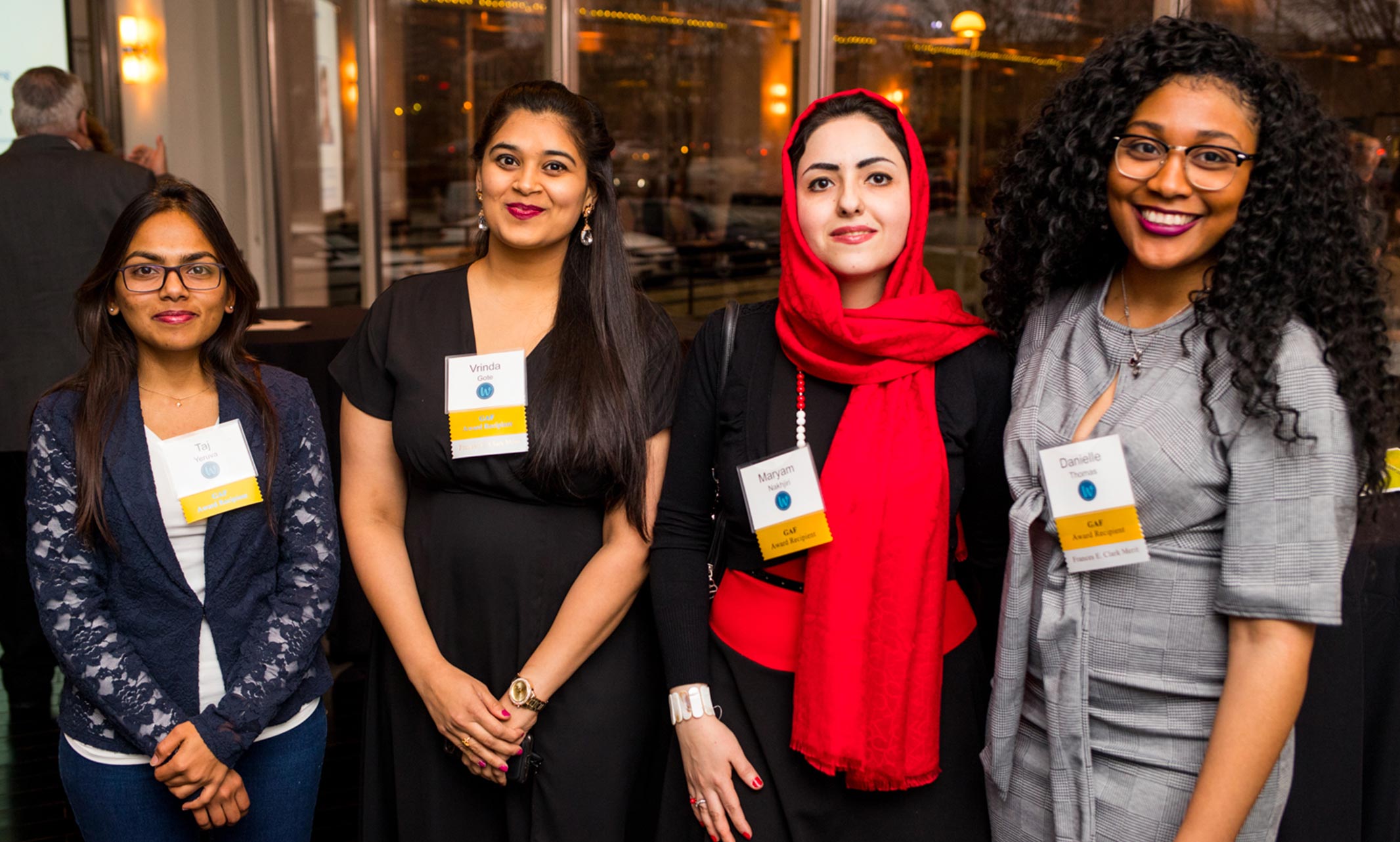
Graduate Assistance Fund recognizes academic excellence
This year, the UMKC Women’s Council supported 70 scholars through its Graduate Assistance Fund. Women from all 11 UMKC academic units offering graduate and professional programs including the College of Arts and Sciences, the Conservatory of Music and Dance and the School of Computing and Engineering received financial support for post-baccalaureate degrees.
Chancellor Mauli Agrawal noted that UMKC is sensitive to the educational needs of working professionals and busy families and that the university has developed more programs to fit the lifestyles of many students.
“At UMKC we offer online education, flexible program structures to fit working professionals and busy families, and much more, Agrawal said. “Yet for many of our students, there are still obstacles that exist, and I am proud that UMKC has organizations like the Women’s Council to help us to ensure those obstacles do not stand in the way of our students’ abilities to pursue advanced degrees.”
Mary Allison Joseph, a two-time GAF recipient, is pursuing her Masters of Arts in the theatre program. Joseph feared her dreams of a career were over when she wasn’t cast as Little Red Riding Hood when she was 10 years old.
“Graduate school has allowed me to craft a very specific personal mission to advocate for diverse stories on stages.” – Mary Allison Joseph
“They cast me as Chicken Little instead,” Joseph said. “I thought this was the universe’s way of saying, ‘Theatre is not for you.’”
Joseph pursued an interest in languages that eventually led her back to the stage.
“I moved to Latin America in my 20s, and an unexpected result of the move was becoming a really great dancer,” she said. “I moved to Brazil a few years later and through my dance network became friends with some actors.”
Joseph realized that she missed the stage and enrolled in an acting program.
Mary Allison Joseph, Graduate Assistance Fund recipient, speaking at the event.
“While my two semesters in that acting program were an important start, I still felt like a scholar first and foremost,” Joseph said. “My time at UMKC has solidified in me this professional identify of artist-scholar. Graduate school has allowed me to craft a very specific personal mission to advocate for diverse stories on stages—as a scholar and an artist—in order to bridge communities and foster mutual understanding.”
Chancellor Agrawal recognized that these students are already contributing significantly.
“I am grateful for these graduate students,” Agrawal said. “I treasure their tenacity and their scholarship. I am confident that they will use their work to pay it forward and impact their communities.”
The Graduate Assistance Fund was established in 1971 at UMKC to provide financial support to women enrolled in graduate programs. To date, the GAF as sponsored more than 2,100 women graduate students by providing more than $1.8 million in graduate fellowships.
Mar 20, 2019
The Startland News reported on a final showdown of student startups where budding entrepreneurs from across the University of Missouri campus netwo...
Launched in October 2018, Entrepreneur Quest accepted 50 applicants from each of the four UM campuses –– University of Missouri, UMKC, UMSL and Missouri S&T. Read the story
Mar 20, 2019
Beth K. Smith to be inducted into Starr Women’s Hall of Fame
The Starr Women’s Hall of Fame is dedicated to recognizing extraordinary Kansas City women, preserving the history of their accomplishments and inspiring women everywhere. Beth K. Smith (1921-2017) is one of the outstanding women being honored in the 2019 class of inductees.
A 1943 graduate of Wellesley College with a degree in economics, Smith went on to earn her M.P.A. from the Henry W. Bloch School of Management in 1976. She went on to co-found The Central Exchange and The Women’s Employment Network (WEN).
In the early 1960s, Smith became an activist and advocate for both women’s and civil rights, culminating in leadership roles with the Kansas City Human Rights Commission. Over the years, she consistently worked to help women in Kansas City reach their full personal and professional potential. In 1978, Smith co-founded The Central Exchange with 2015 Starr Women’s Hall of Fame inductee, Marjorie Powell Allen and in 1986, the two launched The Women’s Employment Network (WEN). The organizations were created with the aim to promote equity, inspire confidence and foster economic independence for women. Additionally, Smith was instrumental in founding the Women’s Foundation of Greater Kansas City and the Midwest Center for Nonprofit Leadership.
“An immovable force for equality and justice in this community.” – Congressman Emanuel Cleaver II, U.S. House of Representatives
She also served as an adjunct professor at the Henry W. Bloch School of Management and established the Edward Smith internships to encourage students to pursue careers at nonprofits in Kansas City.
The recipient of numerous awards, Smith received the first American Jewish Committee Human Relations Award, the Bridge Builder Award for improving race relations and the first ATHENA Award given by the Kansas City Chamber of Commerce.
Congressman Emanuel Cleaver II, U.S. House of Representatives called Smith, “an immovable force for equality and justice in this community,” during his time as Kansas City mayor.
“From the days of the 1960s to the turn of the 21st century, Smith was an ardent advocate, leader and collaborator — one who was committed to the cause of supporting the development of opportunities for the women of the region while also working tirelessly to strengthen the fabric and vitality of the community as a whole,” says David O. Renz, Ph.D., Missouri Chair in Nonprofit Leadership at UMKC.
About the Starr Women’s Hall of Fame
The Starr Women’s Hall of Fame is dedicated to recognizing extraordinary Kansas City women and preserving the history of their accomplishments. These women are social reformers, volunteers, philanthropists, civic leaders, activists and educators. They are neighborhood leaders and grassroots organizers, from yesterday and today, both famous and unsung. They are movers and shakers whose tireless commitment to community has made Kansas City a better place to live.
The Hall of Fame honors their legacies by sharing their stories to encourage and inspire women everywhere. A permanent display honoring these women is open to the public on the third floor of the Miller Nichols Library at the University of Missouri-Kansas City.
The Hall of Fame is named in honor of Martha Jane Phillips Starr, a legendary activist and philanthropist who blazed a trail for family issues and women’s rights. The Hall of Fame is made possible through the Starr Education Committee, Martha Jane Starr’s family and the Starr Field of Interest Fund through the Greater Kansas City Community Foundation.
Mar 18, 2019
Janet Murguía to be inducted into Starr Women’s Hall of Fame
The Starr Women’s Hall of Fame is dedicated to recognizing extraordinary Kansas City women, preserving the history of their accomplishments and inspiring women everywhere. Janet Murguía is one of the outstanding women being honored in the 2019 class of inductees.
From Congress to the White House to leading the nation’s largest Hispanic civil rights organization, Murguía has inspired many. Born in the Argentine district of Kansas City, Kansas, to Mexican immigrants, she rose from a humble background to becoming a tireless advocate for civil rights for all.
After receiving her bachelor’s and law degree from the University of Kansas, Janet moved to Washington, D.C., and joined former Congressman Jim Slattery’s office as a legislative assistant. She then worked at the White House as the Deputy Assistant and Deputy Director of Legislative Affairs to President Clinton, providing strategic and legislative advice on key issues and acting as a senior White House liaison to Congress. She served as Deputy Campaign Manager in the Gore-Lieberman 2000 presidential campaign.
Murguía came back to her roots in the Midwest, serving as the executive vice chancellor of University Relations for the University of Kansas from 2001-2004, where she oversaw internal and external relations and coordinated the university’s strategic planning and marketing efforts.
In 2005, she returned to our nation’s capital to become the president and CEO of UNIDOS US (formerly the National Council of LaRaza) in Washington, D.C.
“Janet has elevated the status of women by her work in Washington, in Kansas and throughout the country,” says Laura Curry Sloan, executive director of the Shumaker Family Foundation. “As a Hispanic woman, she is acutely aware of the need to support the rights of women to contribute in every way in our society, including being able to help support their families and raise their children without being harassed or being treated as ‘less than.’ There is no doubt that Janet Murguia will continue to inspire others by her example.”
About the Starr Women’s Hall of Fame
The Starr Women’s Hall of Fame is dedicated to recognizing extraordinary Kansas City women and preserving the history of their accomplishments. These women are social reformers, volunteers, philanthropists, civic leaders, activists and educators. They are neighborhood leaders and grassroots organizers, from yesterday and today, both famous and unsung. They are movers and shakers whose tireless commitment to community has made Kansas City a better place to live.
The Hall of Fame honors their legacies by sharing their stories to encourage and inspire women everywhere. A permanent display honoring these women is open to the public on the third floor of the Miller Nichols Library at the University of Missouri-Kansas City.
The Hall of Fame is named in honor of Martha Jane Phillips Starr, a legendary activist and philanthropist who blazed a trail for family issues and women’s rights. The Hall of Fame is made possible through the Starr Education Committee, Martha Jane Starr’s family and the Starr Field of Interest Fund through the Greater Kansas City Community Foundation.
Mar 18, 2019
Nell Quinlan (Donnelly) Reed to be inducted into Starr Women’s Hall of Fame
The Starr Women’s Hall of Fame is dedicated to recognizing extraordinary Kansas City women, preserving the history of their accomplishments and inspiring women everywhere. Nell Quinlan (Donnelly) Reed (1889-1991) is one of the outstanding women being honored in the 2019 class of inductees.
Reed established the Donnelly Garment Company in 1916 and for much of the 20th century it was the largest dress manufacturing company in the world — making more than 75 million dresses and employing 1,300 people for years in Kansas City. In an industry dominated by men, Reed succeeded by combining high quality design with state-of-the-art manufacturing technology at affordable prices. She was also a pioneer in employees’ rights and implemented many improvements in work conditions and compensation including air conditioning, life insurance and pension plans. Reed twice received the Navy-Army “E” Production Award for making service women’s uniforms during World War II.
“She lived a fabled life and were her incredible story not true, it would be hard to believe.”
-Terence Michael O’Malley, attorney, author and documentary filmmaker, great-great nephew of Reed
Generally credited with having invented the housedress, Reed was an innovator and the first to put a brand label in dresses, include extra buttons and deploy removable shoulder pads. The Donnelly Garment Company was one of the original tenants in the Empire State Building in New York and Reed the first woman in business in the United States to be a self-made millionaire.
“She essentially created daytime fashions for women by reinventing the housedress, taking it from a shapeless and cheap frock to a beautiful ensemble. Reed understood every aspect of her business, not just the design. She studied the textile industry and was the first to apply silk fabric design to American cotton and rayon,” says Mitchell J. DiCarlo, lifelong resident of Kansas City, Missouri.
This spring, “Nelly Don The Musical!” will chronicle Reed’s creativity, business acumen and personal travails at the Musical Theater Heritage at Crown Center in Kansas City.
“In 1916, Reed created a fashion empire and became one of the wealthiest and most celebrated American women in business. She lived a fabled life and were her incredible story not true, it would be hard to believe,” says Terence Michael O’Malley, attorney, author and documentary filmmaker, great-great nephew of Reed.
About the Starr Women’s Hall of Fame
The Starr Women’s Hall of Fame is dedicated to recognizing extraordinary Kansas City women and preserving the history of their accomplishments. These women are social reformers, volunteers, philanthropists, civic leaders, activists and educators. They are neighborhood leaders and grassroots organizers, from yesterday and today, both famous and unsung. They are movers and shakers whose tireless commitment to community has made Kansas City a better place to live.
The Hall of Fame honors their legacies by sharing their stories to encourage and inspire women everywhere. A permanent display honoring these women is open to the public on the third floor of the Miller Nichols Library at the University of Missouri-Kansas City.
The Hall of Fame is named in honor of Martha Jane Phillips Starr, a legendary activist and philanthropist who blazed a trail for family issues and women’s rights. The Hall of Fame is made possible through the Starr Education Committee, Martha Jane Starr’s family and the Starr Field of Interest Fund through the Greater Kansas City Community Foundation.
Mar 18, 2019
Dr. Linda Hood Talbott to be inducted into Starr Women’s Hall of Fame
The Starr Women’s Hall of Fame is dedicated to recognizing extraordinary Kansas City women, preserving the history of their accomplishments and inspiring women everywhere. Dr. Linda Hood Talbott is one of the outstanding women being honored in the 2019 class of inductees.
Talbott (B.A. ’62, M.A. ’64, Ph.D. ’73) exhibits all the traits of an extraordinary Kansas City woman. Philanthropist, researcher and educator, Talbott’s work has impacted many lives, particularly providing avenues for women in education, support and advancement.
“Dr. Talbott has been recognized by three U.S. presidents for her leadership in helping the elderly, youth and women of America. She has changed the philanthropic landscape of Kansas City,” says Elizabeth Danforth, director of public affairs, Kansas City Power & Light.
Talbott earned three degrees from UMKC and in 1973, served as director of development and communications for then-UMKC Chancellor James Olson. In her capacity, Linda helped develop the private-public funding partnership for the UMKC Performing Arts Center.
“She consistently demonstrates through her actions that compassion, devotion and integrity do make a difference and she has devoted her life to the betterment of society.” – Leo Morton, former UMKC Chancellor
When she was elected to serve on the Board of Directors of Kansas City Power & Light in the early 1980s, she became the first woman from Kansas City to sit on the board of a Fortune 1000 company. Talbott is a founding member of many organizations including the Greater Kansas City Foundation, Women’s Employment Network, Central Exchange and Women’s Foundation.
With her late husband Thomas H. Talbot, she established the UMKC Honors College Scholarship, the Talbott Scholarship and Leadership Award for outstanding student leaders in the College of Arts and Sciences; the Talbott Scholarship for Performing Arts Excellence; the Talbott Honors Scholarship for Leadership Development; the Linda Hood Talbott Scholarship for Urban Education Excellence; and the Linda Hood Talbott Award for Excellence through the UMKC Women’s Council.
In 2015, Talbott announced her commitment to leave $1 million of her estate to the new Honors College.
“Talbott is a model alumna whose impassioned dedication and commitment to her alma mater and this community is truly remarkable,” says Leo Morton, former UMKC chancellor and chief operating officer, DeBruce Companies.“Through her example and countless forms of leadership, she has inspired fellow alumni and communities alike to give, act and engage. She consistently demonstrates through her actions that compassion, devotion and integrity do make a difference and she has devoted her life to the betterment of society. She continually demonstrates through her work to elevating those who ‘should,’ those who ‘can’ and those who ‘will.’ She is a treasure and inspiration.”
About the Starr Women’s Hall of Fame
The Starr Women’s Hall of Fame is dedicated to recognizing extraordinary Kansas City women and preserving the history of their accomplishments. These women are social reformers, volunteers, philanthropists, civic leaders, activists and educators. They are neighborhood leaders and grassroots organizers, from yesterday and today, both famous and unsung. They are movers and shakers whose tireless commitment to community has made Kansas City a better place to live.
The Hall of Fame honors their legacies by sharing their stories to encourage and inspire women everywhere. A permanent display honoring these women is open to the public on the third floor of the Miller Nichols Library at the University of Missouri-Kansas City.
The Hall of Fame is named in honor of Martha Jane Phillips Starr, a legendary activist and philanthropist who blazed a trail for family issues and women’s rights. The Hall of Fame is made possible through the Starr Education Committee, Martha Jane Starr’s family and the Starr Field of Interest Fund through the Greater Kansas City Community Foundation.
Mar 18, 2019
Mona Lea Perry to be inducted into Starr Women’s Hall of Fame
The Starr Women’s Hall of Fame is dedicated to recognizing extraordinary Kansas City women, preserving the history of their accomplishments and inspiring women everywhere. Mona Lea Perry is one of the outstanding women being honored in the 2019 class of inductees.
An advocate with the American Indian Center in Kansas City, for more than 60 years Perry has lent her voice to furthering civil rights and diversity and inclusion for not only American Indians but all minority and ethnic groups.
“She has also mentored and advised young people of all ages and cultures in need of adult guidance or just an ear to listen, while determining their next steps to navigating the day to day roadmap of life.” – Henry E. Lyons, president, NAACP – Olathe, Kansas branch
Highly respected in the Kansas City area and throughout Missouri and Kansas for her knowledge of and connections within the American Indian community, Perry assisted American Indian youth and adults with accessing resources to garner employment, housing, medical assistance and education opportunities as part of her work as an employment specialist with the American Indian Center in Kansas City.
Henry E. Lyons, president, NAACP – Olathe, Kansas branch said of Perry, “she has also mentored and advised young people of all ages and cultures in need of adult guidance or just an ear to listen, while determining their next steps to navigating the day to day roadmap of life.”
Additionally, she has volunteered with a myriad of organizations, including the Homeless Service Coalition, Stand for Children and KC Harmony, and received four certificates of service as a member of the Missouri Advisory Council for the U.S. Commission on Civil Rights. In 2014, she was honored with the Martin Luther King NAACP Hero of Diversity Award for the Olathe, Kansas branch.
Grace Little Eagle, retired registered nurse and pastor of First People Independence Circle, says, “Perry has worked tirelessly with a committee from First People Community of Christ-Independence Circle for the past five years to ensure that there would be Christmas gifts for children in the American Indian community.”
About the Starr Women’s Hall of Fame
The Starr Women’s Hall of Fame is dedicated to recognizing extraordinary Kansas City women and preserving the history of their accomplishments. These women are social reformers, volunteers, philanthropists, civic leaders, activists and educators. They are neighborhood leaders and grassroots organizers, from yesterday and today, both famous and unsung. They are movers and shakers whose tireless commitment to community has made Kansas City a better place to live.
The Hall of Fame honors their legacies by sharing their stories to encourage and inspire women everywhere. A permanent display honoring these women is open to the public on the third floor of the Miller Nichols Library at the University of Missouri-Kansas City.
The Hall of Fame is named in honor of Martha Jane Phillips Starr, a legendary activist and philanthropist who blazed a trail for family issues and women’s rights. The Hall of Fame is made possible through the Starr Education Committee, Martha Jane Starr’s family and the Starr Field of Interest Fund through the Greater Kansas City Community Foundation.
Mar 18, 2019
Fox4KC reported on a group of UMKC Ph.D. candidates who developed technology that could make life easier for people who are blind or have visual im...
The app is called the DeepLens project and would use an iPhone app and glasses to narrate a scene in real time. The technology developed by Gharib Gharibi and his partners is a form of artificial intelligence called deep learning. More
Mar 15, 2019
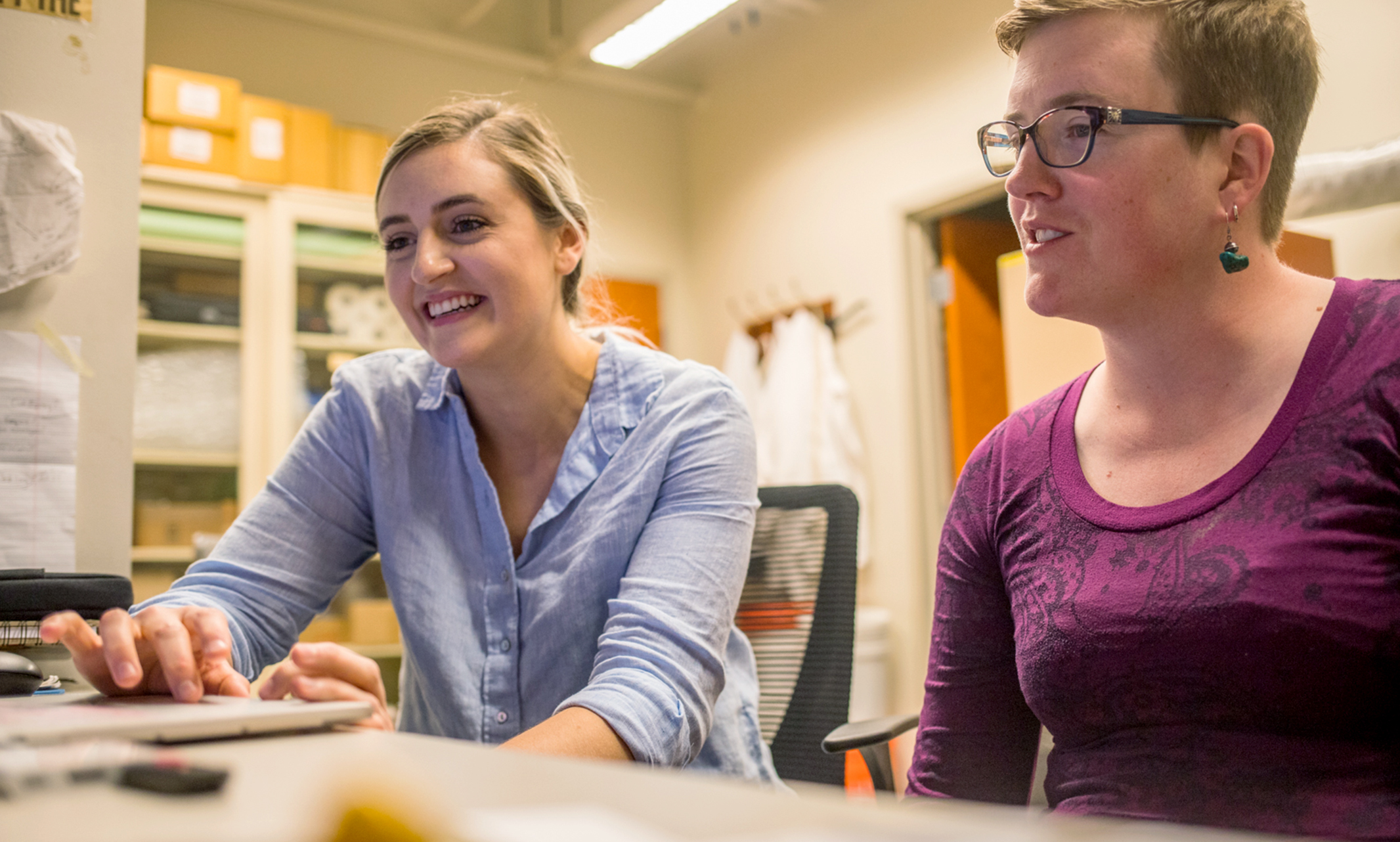
Dynamic Duo Julia Boyd and Alison Graettinger blaze a new trail
The heart of UMKC is our campus community. With small class sizes, it’s easy to develop faculty-student mentorship teams. And these rich relationships — our Dynamic Duos — are some of our best success stories.
Assistant professor of geosciences Alison Graettinger and physics junior Julia Boyd are using satellite imagery to explore the depths of Mars through the study of planetary volcanoes. A double minor in mathematics and classical and ancient studies, Julia is new to the field of geology and says she benefits most from the one-on-one time for learning and interacting with peers, educators and her mentor. Hear from the dynamic duo about the benefits of mentorship at UMKC.
How has your mentor inspired you?
Julia: Dr. Graettinger has inspired me to step out of my comfort zone by taking my physics and math background and applying it to research based in geology. She has inspired me to use the perspective that I bring from my own field and apply it to many aspects of my research, while also learning methods of geology to identify maar and crater characteristics through satellite imagery. Dr. Graettinger has also sparked a desire for me to continue researching in the field of planetary geology.
What makes faculty mentorship critical to the success of students?
Alison: Mentors help push students to reach scholarly and personal responsibility goals that in-class interactions do not always allow. I also find that one of my most important roles as a mentor is being invested in the student and being a role model of a successful woman in science, both of which help motivate students to achieve their best.
“Access to and good interaction with a mentor helps students see both their areas that need growth and their strengths in areas that may not have been obvious before.” – Alison
As a woman in science, how does mentorship help close the gender gap in STEM professions?
Alison: When I got my first female mentor, it was something I didn’t know I needed. Finding someone who has something in common with you adds something extra because they understand your experience.
How are you different now than when you first started at UMKC?
Julia: I don’t think I had a good grasp and true understanding of my place in the world and how I was going to get where I wanted to go when I started college. My biggest fear was failure and not being good enough, both in my degree and just in general. I feel like that has really changed. Dr. Graettinger has also helped me build confidence in myself as an aspiring scientist.
“The more time I spend practicing—whether it’s studying or getting more involved—the more my academic performance improves and I learn valuable life skills.” – Julia
How has your mentor helped you grow as a person?
Julia: It can be intimidating starting research and doing something different in a new field, plus I always want do things perfectly the first time. That is not the way the world works, though, and Dr. Graettinger has really helped me to learn how to channel my perfectionist nature and set realistic goals and be proud of myself for achieving them. I gain more confidence every time I reach a small goal, and in turn that gives me the confidence to set higher goals and actually achieve them.
What qualities make a good mentor?
Alison: Step one is to want to be a good mentor. Realizing that mentoring is not something that just happens on its own helps mentors be able to support and motivate a range of students, not just students like themselves.
Some people go their whole lives without having a mentor. What advice would you give people about finding one?
Julia: Whether it be in academia or just in life, do not be afraid to ask questions and for help, guidance, or to find a community! There are so many groups and communities of people here at UMKC that are both dedicated to helping others and who want to connect with people. Don’t ever be afraid to reach out to someone and get involved. Ask others for guidance, both instructors and peers, because 9 times out of 10 people will be honored that you even asked and would love to help you.
Alison: Have a real conversation with your potential mentor first. Talk about expectations, goals and the project itself.
Mar 15, 2019
Annual event promotes education, equity and professional development
Over the last eight years, hundreds of teenage girls from high schools across the greater Kansas City area have come to UMKC for the annual Women of Color Leadership Conference High School/Collegiate Connection Day hosted by the Division of Diversity and Inclusion. This half-day mini conference encourages connection, empowerment and, most of all, access to higher education.
An extension of the larger Women of Color Leadership Conference, which takes place every June, the connection day gives high school girls an opportunity to learn from professional and collegiate women of color across UMKC and the greater Kansas City community. Workshop presenters discuss topics related to self-esteem, personal branding, embracing your identity and more. Here’s a look back at the impact made at this year’s conference.
“Never in my life have I ever felt more EMPOWERED by the person I am and my background. I’ve never been more PROUD of the person I am and have never felt I mattered as much as I have today.” – Isabella
Keynote speaker Brittany Ferrell, Black Lives Matter activist and founder of Millennial Activists United, let the audience know that “you don’t have to have it all figured out.” Photos by John Carmody, Strategic Marketing and Communications
“‘It’s okay not to be okay,’ taking in all of the wisdom from keynote speaker Brittany Ferrell at the Women of Color Leadership Conference. What a truly amazing talk.” – Trinity
UMKC students served as emcees and workshop presenters, speaking with high school students about navigating society in light of the #MeToo movement, the importance of personal branding, and the disadvantages of colorism.
“I loved today’s Women of Color Leadership Conference! So uplifting and powerful to see a room full of beautiful and successful black and brown women of all areas spreading awareness and self-love and change.” - Mari
Kansas City schools who brought young women to the conference included Olathe Schools, University Academy, F. L. Schlagle High School, Grandview School District and many more. Several teachers and counselors attended as chaperones.
“The Women of Color Conference is always the highlight of my year. These young folks are beautiful, strong and making it happen! Chancellor’s Chief of Staff Kimiko Black Gilmore kicked us off with fire!” - Diane
Mar 15, 2019
Steven St. John shared his thoughts with listeners of 810 Sports on receiving the Spotlight Award from the UMKC Alumni Association
Steven St. John (B.A. ’96) is the host of the popular sports morning show “Border Patrol” on 810 WHB in Kansas City. He will receive the 2019 Spotlight Award from the UMKC Alumni Association. Listen to what he had to say.
Mar 13, 2019
UMKC Alumni Award winner on KCUR "Up to Date"
Patrick Rose, executive director, Save the Manatee Club, and UMKC School of Biological Sciences 2019 Alumni Award winner, was a guest on “Up to Date.”
Mar 12, 2019
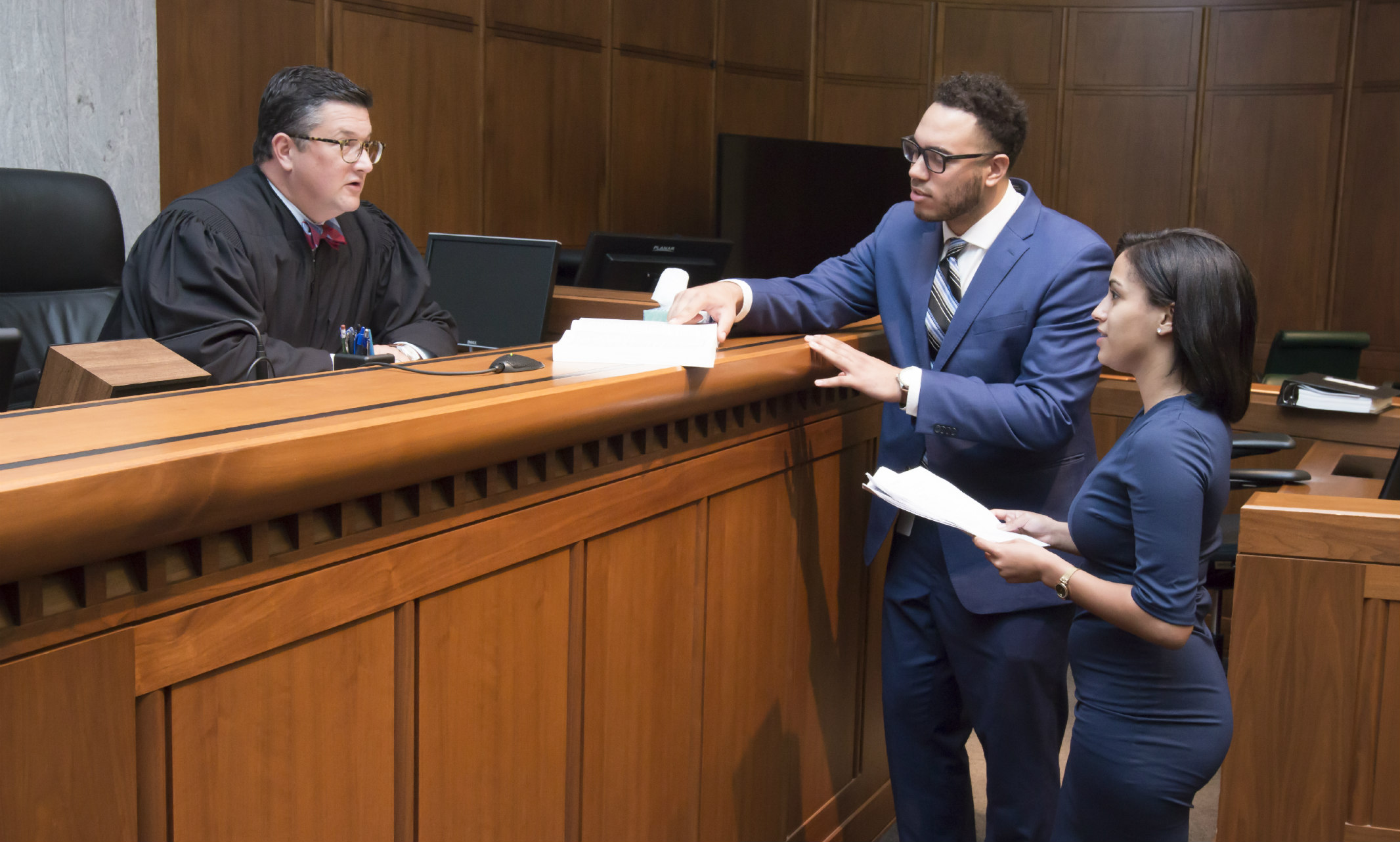
U.S. News and World Report releases program rankings
The School of Law at the University of Missouri-Kansas City is one of the best in the nation at preparing students for Trial Advocacy and Legal Writing, according to new rankings released today by U.S. News & World Report.
According to U.S. News, UMKC Law is ranked 27th in the country in Trial Advocacy, tied with the University of Virginia, the University of Texas-Austin and Syracuse, among others. UMKC was ranked ahead of Harvard (34th), Duke (35th), Columbia (60th), Stanford and Yale (both 76th).
“Trial Advocacy is more than just public speaking in the courtroom – it is a skill that requires understanding and translating a client’s story into a persuasive narrative that must fit the constraints of the formal rules of evidence and procedure,” said Barbara Glesner Fines, dean of the UMKC School of Law.
In Legal Writing, UMKC Law was ranked 20th in the nation, ahead of Boston College (29th), Ohio State (37th), Duke (42nd) and Washington University of St. Louis (52nd).
“Legal Research and Writing is a foundational skill for all attorneys,” Glesner Fines said. “Attorneys communicate in writing to their clients, public, courts, companies – it’s all writing, all the time and the formats vary significantly across the audiences. UMKC is proud of its record of educating our students to be excellent professional writers in all these settings.”
“This ranking is largely a consequence of the national leadership in this field provided by our legal writing professors: Norm Plate, Judy Popper and Wanda Temm,” Glesner Fines added. “Wanda Temm in particular deserves kudos, as she has been a national leader in both legal writing and bar preparation programs. Their leadership on behalf of legal writing professors nationwide, presentations at national conferences, and engagement with the national legal writing listserve have raised our visibility and reputation for excellence.”
The overall ranking for the UMKC School of Law was 108th in the country, up from 119th last year and 123rd in 2017. In reputational ranking, which is based on surveys of attorneys and judges, UMKC School of Law ranks in the top 100 in the country.
According to U.S. News & World Report, graduates from the top law schools have consistently high bar passage and employment rates, among other factors.
Mar 12, 2019
Bunni Copaken to join Starr Women’s Hall of Fame
The Starr Women’s Hall of Fame is dedicated to recognizing extraordinary Kansas City women, preserving the history of their accomplishments and inspiring women everywhere. Bunni Copaken is one of the outstanding women in the 2019 class of honorees.
“Copaken is best known as a philanthropic leader and community advocate who believes unequivocally in the importance of equity and opportunity for women and in the power of the arts to unite people,” says Angela Gieras, executive director of the Kansas City Repertory Theatre.
Copaken is a founding board member of the Kansas City Friends of Alvin Ailey (KCFAA), and a longstanding member of the Kansas City Repertory Theatre board of directors. She shares the belief of renowned dancer Alvin Ailey that the arts break down artificial barriers between people and unite communities. Fueled by this, she empowered and mobilized people to create a community around the arts in Kansas City.
“Copaken’s vision of the arts as a vehicle to promote racial understanding and inclusivity led her to create opportunities for people from disparate backgrounds to meet, connect and create something wonderful together,” Gieras says. “Out of these connections, which Copaken lovingly fosters to this day, has risen a city united and inspired by a common passion in the arts.”
She was instrumental in creating the KCFAA AileyCamp, now replicated in 10 cities nationwide, an award-winning day camp built on the philosophy that the skills needed to learn dance are the same skills needed for broader success in life.
“Copaken’s vision of the arts as a vehicle to promote racial understanding and inclusivity led her to create opportunities for people from disparate backgrounds to meet, connect and create something wonderful together.” – Angela Gieras, executive director, Kansas City Repertory Theatre
Her commitment to empowering individuals doesn’t stop there. Copaken is also a founding member of the Women’s Foundation and a past president of the Junior League of Kansas City, Missouri. Her work to promote equity, inclusion and opportunity for women has left an undeniable mark in Kansas City.
“Copaken made it possible for women in our community to become philanthropists in their own right,” says Ann Spivak, vice president of development, Women’s Foundation. “She has led us to a place where we can influence decision makers in our community to affect real, meaningful change for thousands of women in both Kansas and Missouri.”
As a volunteer, philanthropist, grant writer and visionary — Copaken has been an excellent example of the power of women as visionary leaders whose ideas and action deeply influence lives.
About the Starr Women’s Hall of Fame
The Starr Women’s Hall of Fame is dedicated to recognizing extraordinary Kansas City women and preserving the history of their accomplishments. These women are social reformers, volunteers, philanthropists, civic leaders, activists and educators. They are neighborhood leaders and grassroots organizers, from yesterday and today, both famous and unsung. They are movers and shakers whose tireless commitment to community has made Kansas City a better place to live.
The Hall of Fame honors their legacies by sharing their stories to encourage and inspire women everywhere. A permanent display honoring these women is open to the public on the third floor of the Miller Nichols Library at the University of Missouri-Kansas City.
The Hall of Fame is named in honor of Martha Jane Phillips Starr, a legendary activist and philanthropist who blazed a trail for family issues and women’s rights. The Hall of Fame is made possible through the Starr Education Committee, Martha Jane Starr’s family and the Starr Field of Interest Fund through the Greater Kansas City Community Foundation.
Mar 12, 2019
Laura Rollins Hockaday to be inducted into Starr Women’s Hall of Fame
The Starr Women’s Hall of Fame is dedicated to recognizing extraordinary Kansas City women, preserving the history of their accomplishments and inspiring women everywhere. Laura Rollins Hockaday (1938-2017) is one of the outstanding women being honored in the 2019 class of inductees.
Hockaday, a longtime society editor for The Kansas City Star, transformed race relations by redefining “society” and expanding the newspaper’s previously racially restrictive society page to be inclusive of all people in the community.
Hockaday worked for The Kansas City Star in many capacities from 1962 to her retirement in 2000. She is remembered for many things, including her popular column “Come into My Kitchen,” but her most enduring contributions were the changes she made to The Kansas City Star’s society pages.
“Having been raised in an environment of white privilege and country clubs, Hockaday was keenly aware of the exclusivity and segregation that existed at the paper,” said Anny C. “Acey” Lampe, Ph.D., sustainer colleague with the Junior League of Kansas City, Missouri.
After 20 years working on the paper, Hockaday, then a travel editor, was asked to take the society editor job. She agreed only on the condition that she be able to portray society as it truly existed in the city, which included African American and Hispanic communities who were previously overlooked.
“She opened the society section of The Kansas City Star for all to see that Kansas City is a beautiful ethnic mosaic.” – Gwendolyn Grant, president, Urban League of Greater Kansas City
Hockaday, often practically dressed in rubber flats and skirts, attended Kansas City’s galas and black-tie events, developing new relationships and writing stories about less-publicized individuals. Minority communities noticed the shift as the society pages became more integrated, featuring not just the parties, but the organizational and philanthropic work of African American and Hispanic women in Kansas City.
“Hockaday believed society reporting should really be a common denominator for the community and that it should be a medium for bringing people together instead of setting people apart,” said Gwendolyn Grant, president of the Urban League of Greater Kansas City. “She opened the society section of The Kansas City Star for all to see that Kansas City is a beautiful ethnic mosaic.”
Bunni Copaken, a past president of the Junior League of Kansas City and fellow inductee, said Hockaday’s work invited all of Kansas City to meet a diverse group of women heralded by their own ethnic communities.
“Hockaday single-handedly helped to redefine the notion of society in Kansas City,” Acey said. “She did not see color, class or gender. She simply saw people. She especially elevated women of color whose philanthropic and celebratory events had historically been non-existent to the readers of The Kansas City Star.”
In recognizing and addressing the injustice in lack of coverage, she quickly and efficiently using her small part of the paper as the impetus for change.
Art Brisbane, former editor and publisher of The Kansas City Star, said of Hockaday, “I have asked myself what lesson can be drawn from her life. The answer, I believe, is that one person, possessing a clear eye and a fair mind, can make a great change by simply acting on her beliefs. Others will follow.”
About the Starr Women’s Hall of Fame
The Starr Women’s Hall of Fame is dedicated to recognizing extraordinary Kansas City women and preserving the history of their accomplishments. These women are social reformers, volunteers, philanthropists, civic leaders, activists and educators. They are neighborhood leaders and grassroots organizers, from yesterday and today, both famous and unsung. They are movers and shakers whose tireless commitment to community has made Kansas City a better place to live.
The Hall of Fame honors their legacies by sharing their stories to encourage and inspire women everywhere. A permanent display honoring these women is open to the public on the third floor of the Miller Nichols Library at the University of Missouri-Kansas City.
The Hall of Fame is named in honor of Martha Jane Phillips Starr, a legendary activist and philanthropist who blazed a trail for family issues and women’s rights. The Hall of Fame is made possible through the Starr Education Committee, Martha Jane Starr’s family and the Starr Field of Interest Fund through the Greater Kansas City Community Foundation.
Mar 12, 2019
Mamie Hughes to be inducted into Starr Women’s Hall of Fame
The Starr Women’s Hall of Fame is dedicated to recognizing extraordinary Kansas City women, preserving the history of their accomplishments and inspiring women everywhere. Mamie Hughes is one of the outstanding women being honored in the 2019 class of inductees.
Hughes has made her mark on the Greater Kansas City community as a tireless champion for those oppressed by racial and gender biases and discrimination.
“For the past eight decades, she has boldly gone where others did not dare.” – Hon. Lisa White Hardwick, Missouri Court of Appeals
She arrived in Kansas City in 1949 as a young adult poised to make a difference. Hughes raised five children while simultaneously pursuing a teaching career, holding elective office and immersing herself in civic affairs. She was involved in several community projects, including the plan to install immediate emergency services, the establishment of the Meals on Wheels program, and the economic development of the historic 18th and Vine Jazz District, including leadership service with the Negro Leagues Baseball Museum. She was elected as a founding member of the Jackson County Legislature, a former chair for the Mid-America Regional Council and founding member of the Central Exchange. She serves on the Council of Advocates for the Midwest Center for Holocaust Education.
“She became an advocate and volunteer for scores of projects aimed at cutting through the racial and gender biases and discrimination,” says friend John Kurtz. “I regard Hughes as Kansas City’s own ‘godmother’ and I—as a Kansas Citian—thank God that she settled here in 1949 and has been here ever since.”
In the prologue to Hughes’ autobiography, Judge Lisa White Hardwick of the Missouri Court of Appeals wrote, “For the past eight decades, she has boldly gone where others did not dare. Her mantra is, ‘Man who says it cannot be done should get out of the way of woman who is doing it.’… Since arriving in 1949 at the age of 20, she has broadly impacted the landscape of our city in politics, education, culture and family life … Her graceful and passionate advocacy as the Ombudsman for the Bruce R. Watkins Drive brought resolution and fair treatment for thousands of inner city residents affected by the project.”
Hughes has been honored with the ATHENA Award from the Greater Kansas City Chamber of Commerce, the Hall of Fame Award from the Greater Kansas City Women’s Political Caucus and the National Medal of Honor from the National Society of the Daughters of the American Revolution. She was named to the Alumni Hall of Fame by Metropolitan Community College and among “Women Who’ve Changed the Heart of the City” by City Union Mission.
About the Starr Women’s Hall of Fame
The Starr Women’s Hall of Fame is dedicated to recognizing extraordinary Kansas City women and preserving the history of their accomplishments. These women are social reformers, volunteers, philanthropists, civic leaders, activists and educators. They are neighborhood leaders and grassroots organizers, from yesterday and today, both famous and unsung. They are movers and shakers whose tireless commitment to community has made Kansas City a better place to live.
The Hall of Fame honors their legacies by sharing their stories to encourage and inspire women everywhere. A permanent display honoring these women is open to the public on the third floor of the Miller Nichols Library at the University of Missouri-Kansas City.
The Hall of Fame is named in honor of Martha Jane Phillips Starr, a legendary activist and philanthropist who blazed a trail for family issues and women’s rights. The Hall of Fame is made possible through the Starr Education Committee, Martha Jane Starr’s family and the Starr Field of Interest Fund through the Greater Kansas City Community Foundation.
Mar 12, 2019
Dr. Patricia A. McIlrath to be inducted into Starr Women’s Hall of Fame
The Starr Women’s Hall of Fame is dedicated to recognizing extraordinary Kansas City women, preserving the history of their accomplishments and inspiring women everywhere. Dr. Patricia A. McIlrath (1917-1999) is one of the outstanding women in the 2019 class of honorees.
McIlrath was a longtime chair of the Department of Theatre at UMKC, founder of the Missouri Repertory Theatre (now KC Rep) and progenitor of Kansas City’s status as one of the top five professional theatre cities in the U.S.
McIlrath graduated from Paseo High School during the Great Depression and was one of few in her class who was able to go on to college. She acquired several degrees, including a Ph.D. from Stanford, before joining the University of Kansas City (now UMKC) as director of University Theatres in 1954.
During her time at UMKC, she opened auditioning to the community and directed racially-integrated productions. She accomplished many things: writing scholarly articles, serving on national and local boards, directing academic and off-Broadway productions, and creating the Summer Repertory Theatre, which became the fully professional Missouri Repertory Theatre in 1966 (now the Kansas City Repertory Theatre).
“The founding of the Missouri Rep served as the impetus for the revival of professional theatre in the Kansas City metro. Following in its wake, numerous other professional theatre companies established in the city since the 1970s have found lasting success,” said Eric Rosen, Ph.D., former artistic director, Kansas City Repertory Theatre.
“She built and fueled a creative engine that continues to help theatre prosper in Kansas City.”
McIlrath, fondly known as Dr. Mac, led the way (two years ahead of Yale Repertory Theatre, for example) in integrating professional theatre training into the college curriculum with her creation of an organic relationship between the UMKC theatre department and the regional professional company she founded. She also created a touring arm, Missouri Vanguard Theatre, to take professional productions to underserved communities throughout Missouri.
“Her leadership was the fundamental factor in making Kansas City a thriving theatrical center where professional artists could live and work outside of New York City,” said Felicia Londré, Ph.D., Curator’s Professor of Theatre, UMKC. “The fact that Kansas City has a dozen Equity theatres can be directly traced to Dr. Mac’s work, an effort of many years of personal door-to-door to build community support for a theatre scene that had been virtually barren since the 1920s.”
McIlrath welcomed women into positions of responsibility and showed by example that a woman could run a major arts organization. She mentored many of Kansas City’s theatre professionals and the majority of theatre companies in the area trace their roots back to Dr. Mac at UMKC.
She was nominated for the Starr Women’s Hall of Fame by many Kansas City theatre leaders, including Sidonie Garret, Heart of America Shakespeare Festival; Angela Gieras, Kansas City Repertory Theatre; Cynthia Levin, Unicorn Theatre; Joette Pelster, The Coterie; and Heidi Van, The Fishtank. Together, they expressed their appreciation for her pioneering vision.
“She built and fueled a creative engine that continues to help theatre prosper in Kansas City. Dr. Mac was a pioneer who established herself as a capable, passionate and fair leader in a time when most business leaders were men. She elevated how women were viewed in the community and in the national theatre landscape. We stand on the shoulders of this trailblazing woman. Thanks to her determination and selfless leadership, since 1964, generations of Kansas Citians have been able to see the best theatre in the country created right here in this community.”
About the Starr Women’s Hall of Fame
The Starr Women’s Hall of Fame is dedicated to recognizing extraordinary Kansas City women and preserving the history of their accomplishments. These women are social reformers, volunteers, philanthropists, civic leaders, activists and educators. They are neighborhood leaders and grassroots organizers, from yesterday and today, both famous and unsung. They are movers and shakers whose tireless commitment to community has made Kansas City a better place to live.
The Hall of Fame honors their legacies by sharing their stories to encourage and inspire women everywhere. A permanent display honoring these women is open to the public on the third floor of the Miller Nichols Library at the University of Missouri-Kansas City.
The Hall of Fame is named in honor of Martha Jane Phillips Starr, a legendary activist and philanthropist who blazed a trail for family issues and women’s rights. The Hall of Fame is made possible through the Starr Education Committee, Martha Jane Starr’s family and the Starr Field of Interest Fund through the Greater Kansas City Community Foundation.
Mar 12, 2019
Mary Tiera Farrow to be inducted into Starr Women’s Hall of Fame
The Starr Women’s Hall of Fame is dedicated to recognizing extraordinary Kansas City women, preserving the history of their accomplishments and inspiring women everywhere. Tiera Farrow (1880-1971) is one of the outstanding women being honored in the 2019 class of inductees.
Farrow embodies a number of ‘firsts’ on a local and national scale, as founder of the first organization to welcome women in the legal field in Kansas City, the first female judge in the City of Kansas City, the first woman in the U.S. to defend a woman on trial for murder and the first woman to argue before the Kansas Supreme Court.
From a young age, Farrow was determined to be a lawyer. At the time, women lawyers were rare. She entered business school first to become a stenographer before getting into the Kansas City School of Law (now UMKC School of Law) in 1901. She became president of her class and graduated in 1903 with a bachelor’s in law. She soon after discovered that her fiancé only wanted her to work as a clerk, not a lawyer, so she promptly ended the engagement. She found work with other male attorneys, albeit with a meager salary, and through the opportunity was the first woman to argue a case before the Kansas Supreme Court. In 1907, she was also the first female treasurer elected to serve the city of Kansas City, Kansas.
“She was forward-thinking and pushed the boundaries for women’s rights, both in and out of the legal community.” – JoEllen Flanagan Engelbart, Association of Women Lawyers of Greater Kansas City
After traveling abroad, she and fellow Kansas City School of Law alumna, Anna Donahue, opened the first women-owned law practice in Kansas City. After Donahue left the firm, Farrow got one of her most famous cases defending a newly divorced wife and mother who murdered her ex-husband on the steps of the courthouse after she was denied custody of their child. The case received national media attention because Farrow was the first woman to defend a woman on trial for murder. She earned credibility in the legal community after she successfully defended her client, who was charged with first-degree murder but escaped the death sentence with a second-degree murder conviction and two years in prison.
“She was tenacious and driven, bent on finding her way as a respected and equal lawyer to her male counterparts before women even had the right to vote,” says JoEllen Flanagan Engelbart of the Association of Women Lawyers of Greater Kansas City. “She was forward-thinking and pushed the boundaries for women’s rights, both in and out of the legal community.”
Even with Farrow’s success, she was barred from joining the all-male Kansas City Bar Association, so she and 20 other women co-founded the Women’s Bar Association of Kansas City in 1917. The Missouri Women’s Bar Association was opened in 1918. She returned to UMKC to earn her juris doctor degree. Then in 1925, after the passing of the 19th amendment gave women the right to vote, she and fellow Kansas City School of Law graduate Louise Byers opened The Women’s Law School to educate non-legal women in their newly acquired legal rights.
She was appointed to the Kansas City Municipal Court in 1928, becoming the first woman judge in Kansas City. She later served women and veterans during and after World Wars I and II and retired after many years in the Legal Aid in the Kansas City Welfare Department. Fondly remembered as the “Dean of Women Lawyers,” Farrow’s legacy lives on in the women whose careers were made possible by her trailblazing advocacy.
About the Starr Women’s Hall of Fame
The Starr Women’s Hall of Fame is dedicated to recognizing extraordinary Kansas City women and preserving the history of their accomplishments. These women are social reformers, volunteers, philanthropists, civic leaders, activists and educators. They are neighborhood leaders and grassroots organizers, from yesterday and today, both famous and unsung. They are movers and shakers whose tireless commitment to community has made Kansas City a better place to live.
The Hall of Fame honors their legacies by sharing their stories to encourage and inspire women everywhere. A permanent display honoring these women is open to the public on the third floor of the Miller Nichols Library at the University of Missouri-Kansas City.
The Hall of Fame is named in honor of Martha Jane Phillips Starr, a legendary activist and philanthropist who blazed a trail for family issues and women’s rights. The Hall of Fame is made possible through the Starr Education Committee, Martha Jane Starr’s family and the Starr Field of Interest Fund through the Greater Kansas City Community Foundation.
Mar 12, 2019
J. William Fulbright Foreign Scholarship Board has recognized two UMKC faculty members
Syed E. Hasan, Ph.D., Professor Emeritus of Geoscience, has been selected for a Fulbright Senior Scholar award and Rita Barger, Ph.D., Associate Professor in the School of Education, will serve as a Fulbright Specialist at Trakya University in Turkey for the 2019-20 year.
Hasan will be affiliated with the University of Jordan, Amman where he will teach a course in his specialty area of waste management.
“I am hoping to be able to share my expertise in waste management with Jordanian officials in helping them turn solid waste into a resource for energy generation and material recovery,” Hasan said.
This is the second time Hasan has been selected for this award. In 2016 he taught at Qatar University where he worked with students on conducting waste assessment to help the university meet its recycling and sustainability goals.
“Officials from the U.S. embassy attended the students’ presentation. It was a memorable experience for all of us," Hasan said.
Barger will serve as a Fulbright Specialist in mathematics education and creative problem solving at Trakya University in Turkey.
“For almost 20 years I have been teaching a course in creative problem solving that is designed to help students, especially pre-service and in-service teachers, develop the ability to look at problems from different perspectives,” Barger said. “This allows them to move beyond the traditional answers to real world problems and problems in the classroom, to new answers and approaches that are significantly different from the common practice in today’s classrooms.”
Barger will be working with participants in workshops to apply creative problem solving techniques to challenges in their daily lives.
The Fulbright Program, which aims to increase mutual understanding between the people of the United States and the people of other countries, is the flagship international educational exchange program sponsored by the U.S. government. Hasan and Barger are looking forward to collaborating with scholars and students abroad.
Mar 11, 2019
Story from KSHB
Having the right skills isn’t always enough to land your dream job. Looking the part is important, too. But dressing up didn’t come naturally to Steven Pinkerton, a senior mechanical engineering student at the University of Missouri-Kansas City. Read more from KSHB
Mar 11, 2019
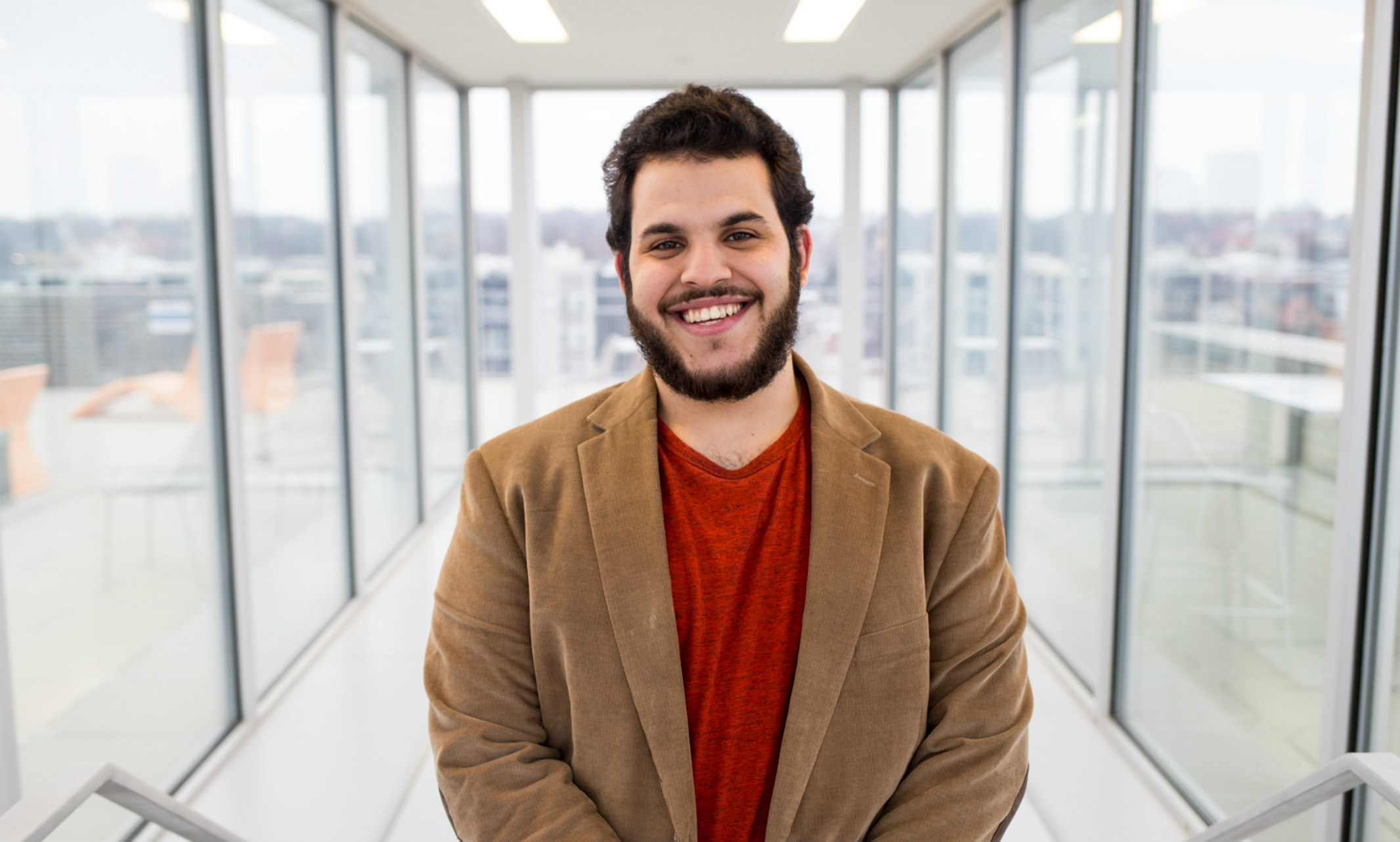
Ahmad Haha loves how UMKC makes it easy for people to express themselves - including their faith
Our ongoing story starts with people from around the world, converging here at UMKC. Get to know our people and you’ll know what UMKC is all about.
Ahmad HahaHometown: PalestineHigh School: Ruskin High SchoolUMKC degree program: BS Biology, Pre-DentalAnticipated graduation year: 2020
Why did you choose UMKC?
I chose UMKC because it helps a person find his passion in life by giving a student experience with what they want to do.
Why did you choose pre-dentistry?
Smiles are so important. They are a sign of inner happiness. As a little kid I hid my smile because my teeth were horrible. Then I started going to the dentist almost every week for eight years. I had braces for six years. I saw the difference in how my life has changed. I've felt happier than ever. I want to give that back. I want to make others happy.
Are there people in your family with science and medical backgrounds?
One of my brothers started in medicine, but switched to business. But for me, I want to help people. I've wanted to be a dentist since I was a little kid. I want to be the first person in my family to take the step into the health field. It benefits me to challenge myself and see what I'm capable of. I knew it wasn't going to be easy, and entering this programs has benefitted my life outside of academics to reach for a higher goal.
If you were advising a potential UMKC student, what would you tell them?
No matter what - who they are or their background – there's no judgment here. UMKC accepts you for you are. They don't want to change you. There's a very diverse environment here where everyone can find a friend – or faculty or professor – who they can reach out to.
Was that unexpected?
I moved to the United States when I was seven years old. I’m Muslim and live in a strong Muslim community. Some of the families I know sent their kids to Muslim school. I went for a year, but I wanted to go to public school and still know my beliefs. I wanted to put myself in an environment with other religions to prove it wouldn't affect who I am.I've found that UMKC is a very safe place for Muslims. I'm on the board of the student Muslim organization. We have events and a feast for Ramadan. Everyone is invited. This year we had over 200 students from the whole community. The university has really supported us. We have Friday prayers, but we can't always make it to mosque. UMKC has given us a room in the Student Union. The Muslim community on campus wants to show people who we are. We have a strong heart.
What other organizations are you involved in on campus?
I am an orientation leader and a member of the Pre-Dental Society.
Why are you an orientation leader?
I wanted to help students who walked in my shoes. High school doesn't really prepare you for college. I had to develop my own study strategies. Now I'm a junior. I can see the impact the first year had on me. I want to help first year students believe in themselves. I want them to have confidence and know they will be okay. Being an orientation leader gives me a chance to speak out and let them know they can make it.
Since entering college, what have you learned about yourself?
I learned that I don't need to be perfect. In life we make mistakes and failure is not wrong. It's just a way to learn better and avoid making the same mistakes in the future.
Learn More About UMKC
Mar 08, 2019
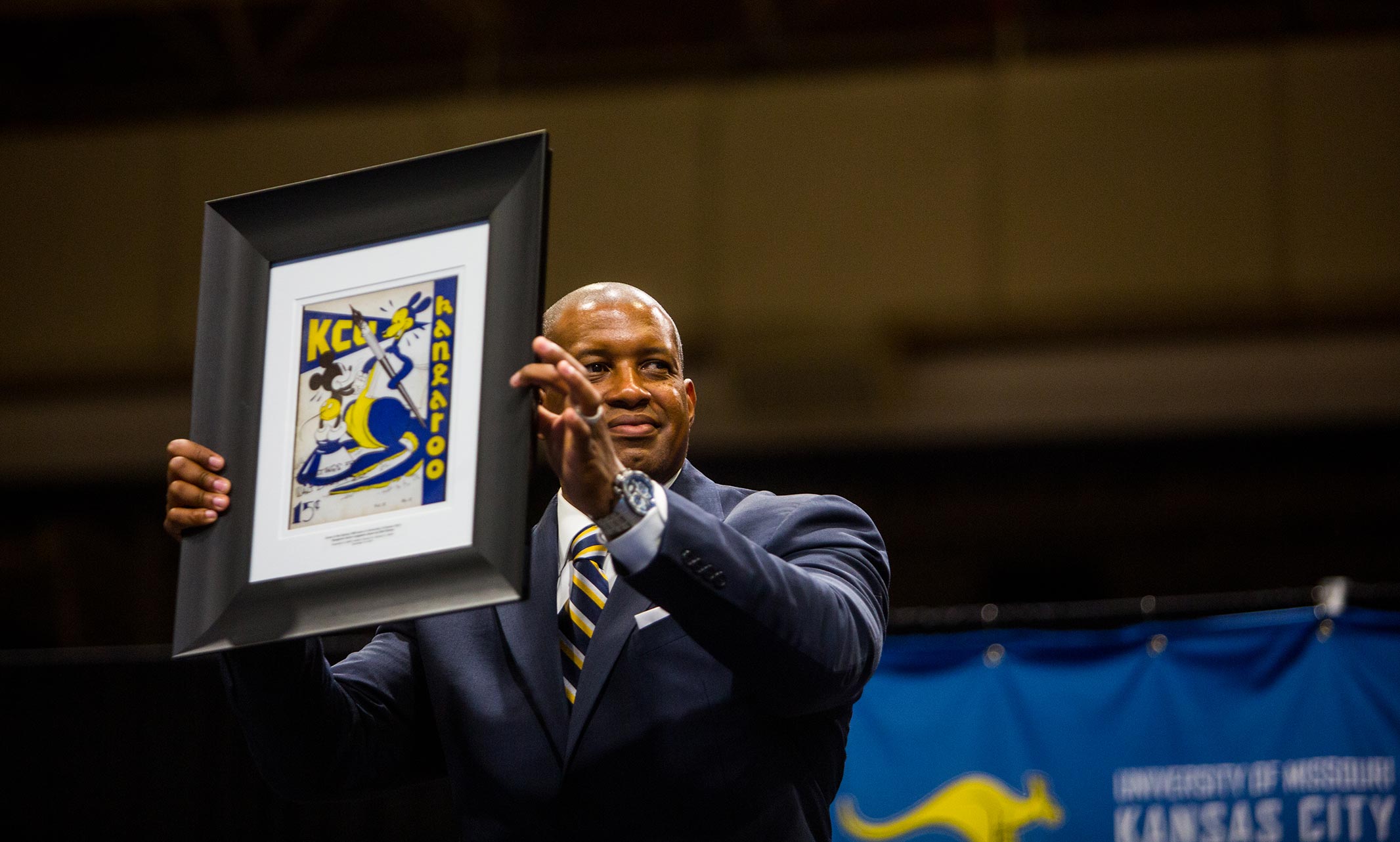
Brandon Martin will be Executive in Residence
The University of Missouri-Kansas City School of Education has appointed Director of Athletics Brandon E. Martin, Ph.D., as Executive in Residence.
Dean Justin Perry said Martin will assist with the strategic development and growth of the School of Education’s Higher Education Administration Program. Martin will also teach various sports management courses and advise students in the program. Martin’s role will also include assisting in the development, coordination and implementation of experiential learning opportunities for students in the program. He will manage and develop contacts and relationships for the program with partner sports organizations in the Kansas City Region.
"The School of Education is very excited that Dr. Martin will be joining the Division of Educational Leadership, Policy and Foundations as Executive in Residence,” Perry said. “He will be a tremendous asset for the Higher Education Administration program, especially in Sports Administration. I am so pleased that Dr. Martin will bring his wealth of experience, knowledge, skills and resources to the School as we continue to innovate, reach new heights and focus on student success."
Martin earned Bachelor of Science, Master of Education and Doctor of Education degrees from the University of Southern California, where he was a scholarship athlete in basketball. He received the Outstanding Dissertation of the Year from the USC Rossier School of Education for “A Phenomenological Study of Academically Driven African American Male Student-Athletes at Highly Selective Division I Universities.”
“I look forward to making a meaningful contribution to the strategic vision and growth of the Division of Educational Leadership, Policy, and Foundations,” Martin said. “More specifically, I am grateful for the opportunity to positively impact the lives of our future leaders in the field of Higher Education Administration.”
Martin became the UMKC Director of Athletics on Dec. 3, 2018.
Mar 08, 2019
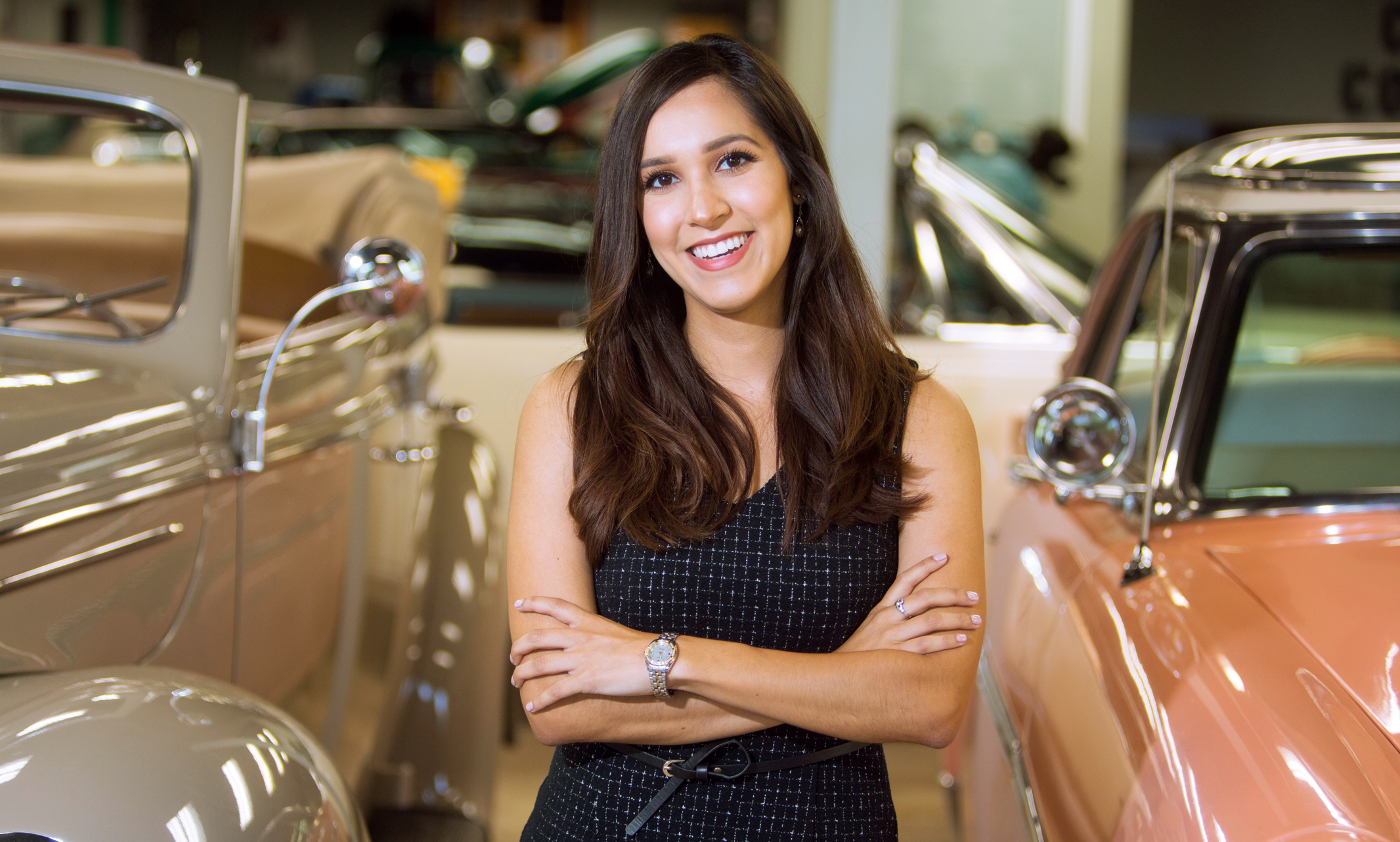
Alumna Vreni Fernandez's entrepreneur-focused education and volunteer work leads to museum leadership role
UMKC Grads are Everywhere.
Our students graduate with much more than a diploma. They leave UMKC with the practical knowledge, real-world experience and skills that help them land jobs they love.
Vreni Fernandez ’12
UMKC Major: Business Administration – MarketingCurrent job: Museum Executive Director
What did you most appreciate about UMKC?
The professors at Bloch were instrumental in my development as a strategic thinker and effective leader in the business world. When I was a student, there was a large focus on entrepreneurship — professors encouraged us to be creative and network with working professionals in the business community. I always keep these skills at the forefront of my mind when I am heading a new event or project.
Favorite thing to do while you were a college student?
I made many friends during my years at UMKC. My fondest memories are spending time with ENACTUS and Delta Sigma Pi friends at Pizza 51 after meetings and enjoying the occasional lunch at the Country Club Plaza.
If you had an internship during college, how did it help prepare you for your first job?
Throughout my entire academic career, I volunteered for multiple organizations. When I approached my senior year at UMKC, I began the search for a volunteer opportunity with a startup company in Kansas City. Coincidentally, the Kansas City Automotive Museum's founder had contacted one of my professors, Pamela Dobies, about a concept for a car museum in Kansas City. I have always had an appreciation for cars, and I am a proud Kansas Citian who loved the challenge of being involved with a large project from the ground up. My internship turned into a board position, which led to a hired position once we received a major donation. A year later I was offered the Executive Director position and the rest, as they say, is history.
“Don't be afraid to fail, but learn from your failures.”
Best career advice you’ve received?
Managing people is one of the hardest things you will do, so make sure you take care of your people.
What advice do you have for students entering your field/profession?
Don’t be afraid to fail, but learn from your failures.
Mar 08, 2019
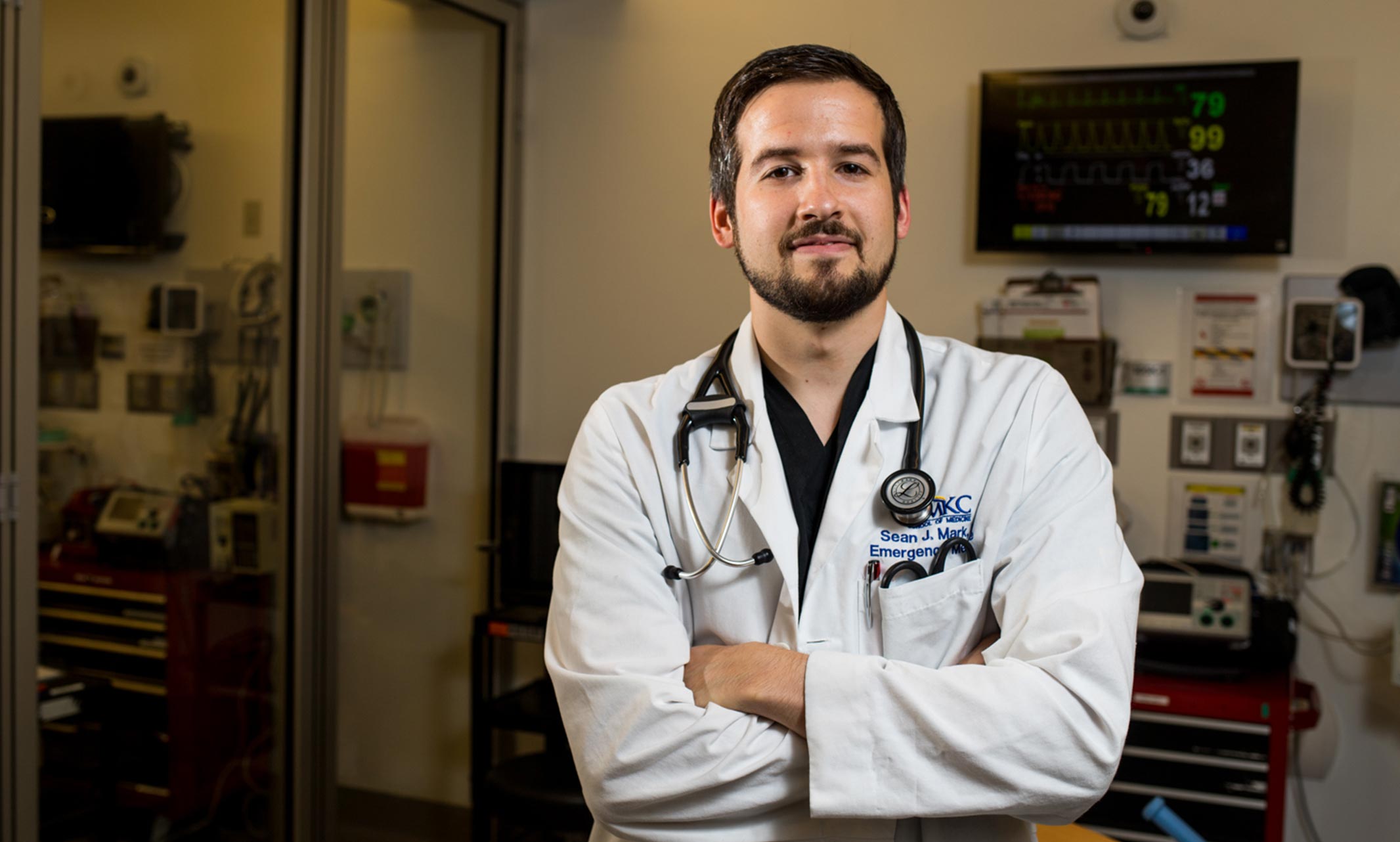
Alumnus Sean Mark shares his experience and advice for medical students
UMKC Grads are Everywhere.
Our students graduate with much more than a diploma. They leave UMKC with the practical knowledge, real-world experience and skills that help them land jobs they love.
Sean Mark ’17
UMKC major: Liberal Arts ‘16, Doctor of Medicine ‘17 Current job: Resident Physician in Emergency Medicine
What did you most appreciate about UMKC?
I really appreciated the opportunities I had to not only learn my profession but also to teach and to lead my peers during the process. UMKC values student leadership and I had a lot of opportunities during my educational career to be involved in and lead student groups that cultivated my passion for emergency medicine. I also was given many opportunities to tutor other students which really helped me to commit information to long-term memory. This information is what assists me in caring for patients on a daily basis.
“In the ER, I feel called to help people in crisis when they are in their greatest hour of need.”
Favorite thing to do on campus or in Kansas City while you were a college student?
I was fortunate enough to become involved with the campus ministry group Luke18. It really helped me make lasting friendships which supported me in the tough times. One of my favorite things to do was to attend worship services and prayer meetings with my friends. We would frequently pray for our campus, the students, the professors and each other, which strengthened me in my faith. These times helped sustain me during the week.
Best career advice you’ve received?
Do what’s best for the patient even if other people give you flak.
What advice do you have for students entering your field?
Medicine is more of a calling than a career. The training is long and requires hard work and endurance. You have to find your calling in the field—something you can hold onto and believe for when times get tough. My calling is to serve the forgotten people of the world with the love and compassion of Jesus Christ, the greatest healer in history. I look to Him when I need inspiration and strength. In the ER, I feel called to help people in crisis when they are in their greatest hour of need. After a long shift or a tough patient encounter, these things are what I always come back to, and it gives me the power and love I need to continue on and care for the next patient.
Mar 08, 2019
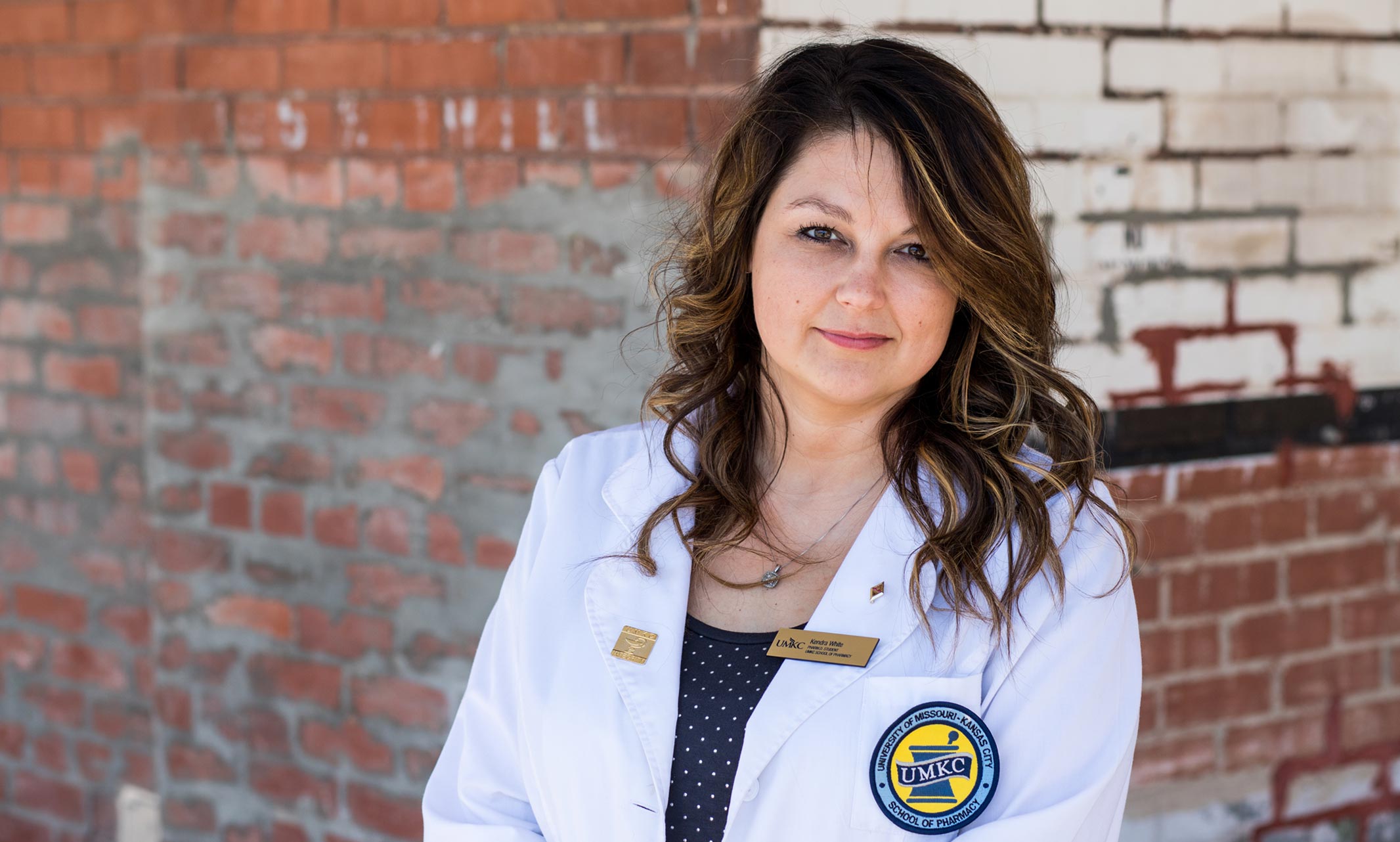
Alumna Kendra White graduates in first Springfield-based UMKC Pharmacy cohort
UMKC Grads are Everywhere.
Our students graduate with much more than a diploma. They leave UMKC with the practical knowledge, real-world experience and skills that help them land jobs they love.
Kendra White ‘18
UMKC major: Doctor of Pharmacy, inaugural UMKC School of Pharmacy class in Springfield, Missouri Current job: Pharmacist
Why did you choose pharmacy?
I had been a pharmacy technician for a long time but was limited in the health-care services I could provide to the community.
I have realized what I am capable of and the impact I can have in patient lives and the healthcare field. It’s inspiring when patients compliment and thank you for your part in helping them with their pharmaceutical needs and healthcare goals.
Before having kids, why was attending school in the southwest Missouri area important to you?
I love this area and its landscape and outdoor activities. I also didn’t want to be far from family. I received a Bachelor of Fine Arts in photography from Missouri State University.
“I didn’t have to uproot my family to pursue my goals.”
What did you most appreciate about UMKC?
I appreciated that UMKC was open to nontraditional students. If it wasn’t for UMKC I may not have been accepted to a pharmacy school. Other schools I looked into had more strict acceptance criteria. Thanks to UMKC accepting me into their professional program I was able to prove my abilities and determination to succeed. The professors that I interacted with at the Springfield Pharmacy School campus were eager to challenge us and push us to be our best. I credit them for the skills I learned to pass my boards and the confidence I gained to practice pharmacy today.
If you had an internship during college, how did it help prepare you for your first job?
As an intern pharmacist I was able to perform actions above that of a pharmacy technician while at work. It prepared me by giving me experience with immunizations, patient counseling, and pharmacist responsibilities
“Be confident in your abilities.”
Best career advice you’ve received?
The best advise I have been given is “you know this, you’ve got this.” I tell myself this often when I may lack confidence. As a pharmacist, you are thrown into a position of authority, as well as becoming a reference to patients and healthcare providers. Being confident in your ability to answer questions and interact with providers is vital in pharmacy. You have to know when and how to intervene to find, solve, and prevent medication related issues.
What advice do you have for students entering your field/profession?
Be confident in your abilities. Questions will come up that you don’t know the answer to. Use your resources and the schooling that you have received to confidently answer questions, support recommendations, and question orders. Don’t let questions from Patients and Providers intimidate you, they look to you as a source of information because you have the most knowledge and education when it comes to difficult medication inquiries. Approach each patient as if they were a member of your family, don’t be afraid to speak up and identify issues, because every patient deserves to have the pharmacist on their side preventing errors, providing them with the best possible pharmaceutical outcomes.
Mar 08, 2019
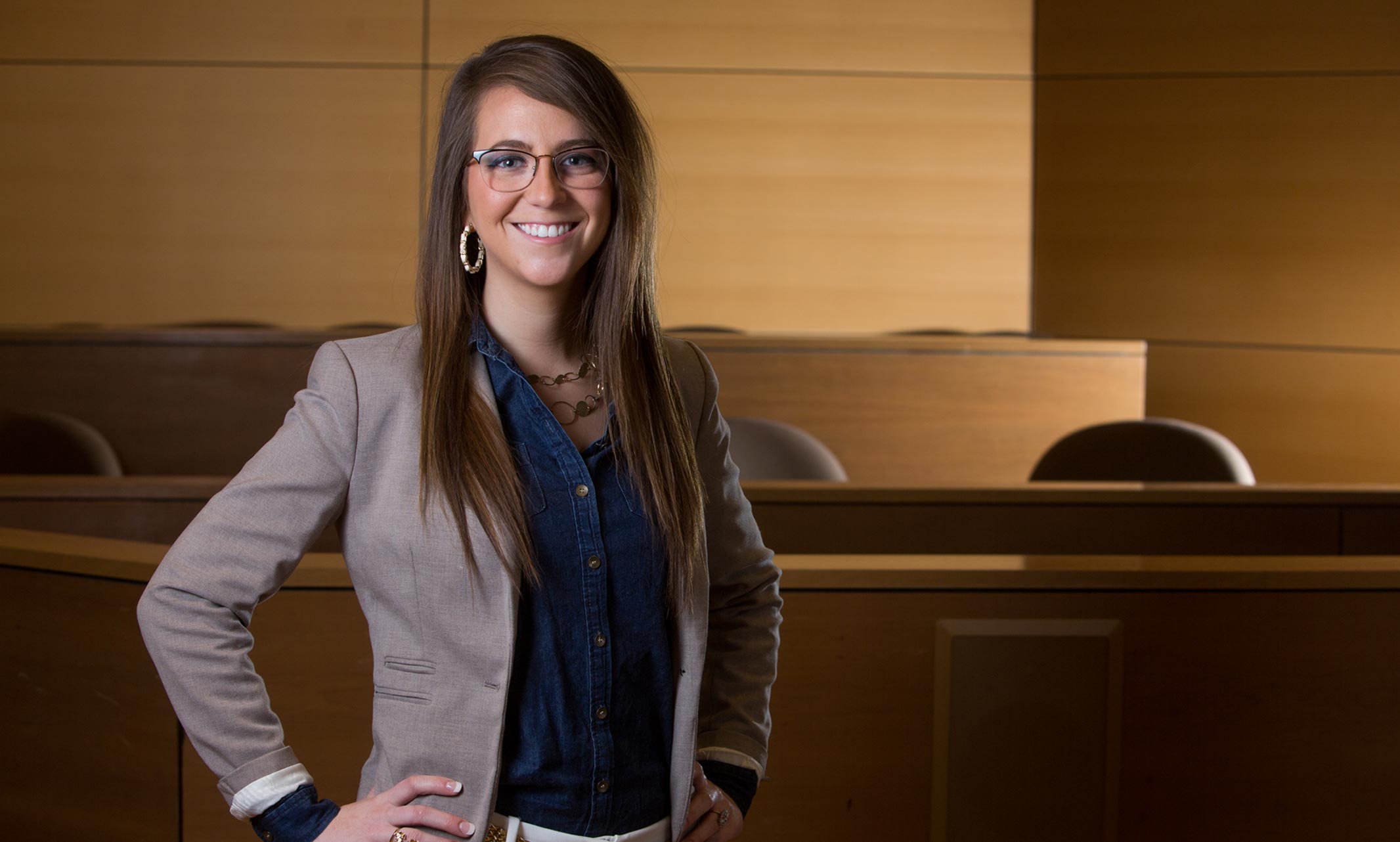
Alumna Erin Kerl shares her tips for students in the legal field
UMKC Grads are Everywhere.
Our students graduate with much more than a diploma. They leave UMKC with the practical knowledge, real-world experience and skills that help them land jobs they love.
Erin Kerl ’16
UMKC major: Juris Doctorate Current job: Attorney
What did you most appreciate about UMKC?
I most appreciated the dedicated faculty and staff. I had a wonderful experience and could get help from anyone any time I needed it. Professors were always there for educational and emotional support. People in the library were more than eager to help with legal research needs. And best of all, the computer services people even brought my computer back to life!
Favorite thing to do while you were a college student?
My favorite thing was meeting friends for happy hours. Kansas City has so many delicious eateries and it was always wonderful to save a few dollars by meeting up when the prices were less. Plus, just sitting and enjoying my friends’ company brought down the stress levels from school.
“Professors were always there for educational and emotional support.”
If you had an internship during college, how did it help prepare you for your first job?
During law school, I interned with both the Kansas Federal and Missouri State Public Defender offices. Both positions gave me great insight into the pre-trial and trial processes, how to carefully review case files, and how to talk with clients. I was also able to become more comfortable in courthouses before actually working in one.
Best career advice you’ve received?
The keys to a successful career are maintaining a positive reputation and networking with fellow attorneys to build strong relationships in the legal community.
What advice do you have for students entering your field?
You don’t know what you don’t know, but you can figure it out! (That’s most of lawyering.) Be honest if you don’t know the answer to a question, and ask for help if you really need it. You can always find an answer with the right set of tools!
Learn more about the School of Law
Mar 08, 2019
theSkimm interviewed Rep Deb Haaland and Rep Sharice Davids, the first two Native American women elected to Congress
Rep Sharice Davids (B.B.A. ’07) is a UMKC graduate. Watch the video
Mar 08, 2019
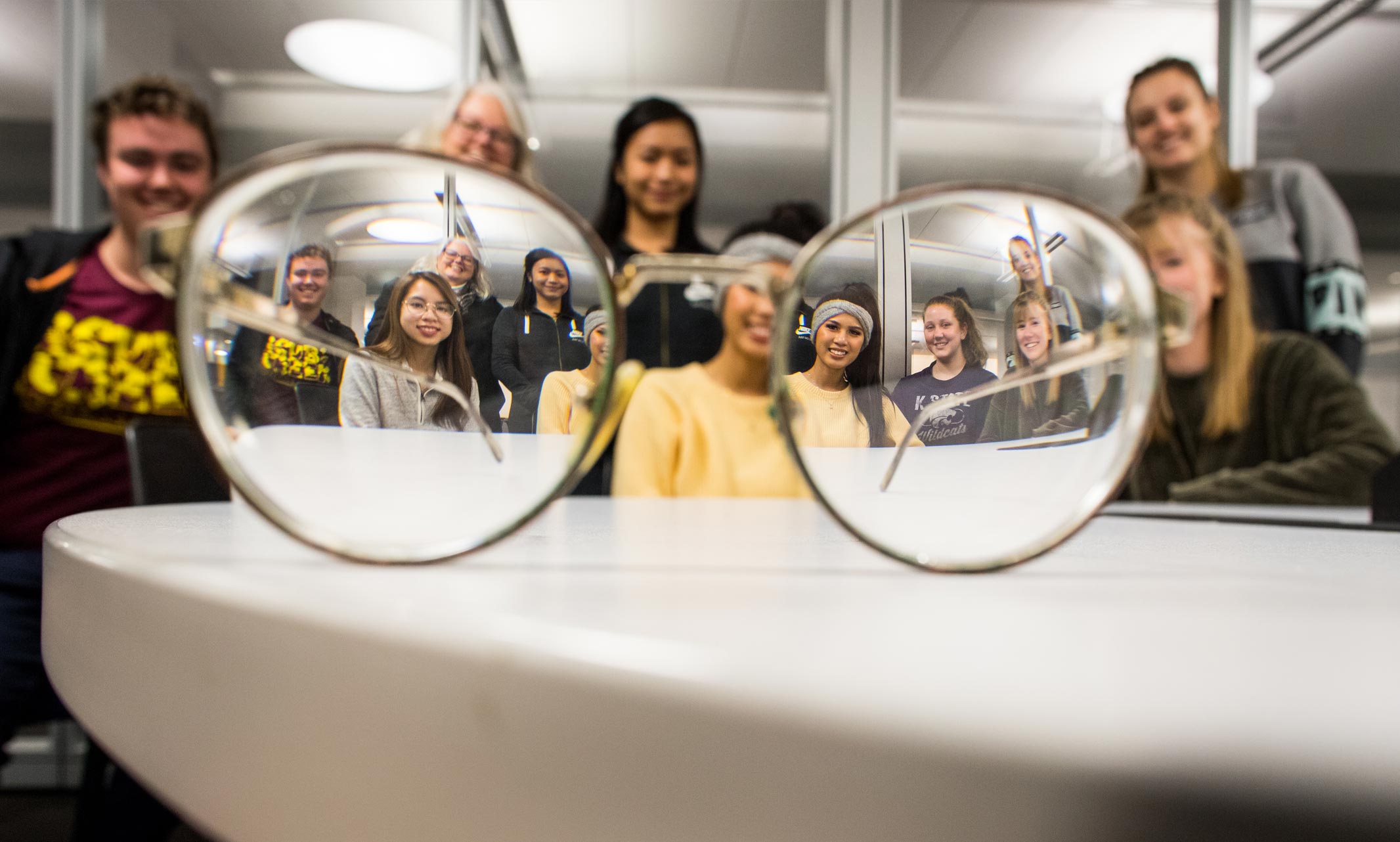
Pre-Optometry Club sees significant growth in eyeglass drive
This year the UMKC Pre-optometry Club collected 131 pairs of eyeglasses and 106 cases in their eyeglass drive that they will donate to the Kansas City Free Eye Clinic. This is more than double last year’s donations.
“Since we are a pre-health club, reaching out to other health related, pre-professional departments made sense, so this year we asked the different schools if we could place boxes in certain locations,” Alexis Showalter, Pre-Optometry Club president, says. “We had boxes in Miller Nichols, Grant Hall, Flarsheim, the Health Sciences Building, Biological Sciences Building and Scofield Hall.”
The Pre-Optometry Society was founded by students in the School of Biological Sciences, though it is comprised of students from several academic units.
“Being in a student organization such as the Pre-Optometry Society allows students to build their professional network.” –Tammy Welchert
Tammy Welchert, Ph.D., associate teaching professor and director of student affairs and academic advising in biology as well as advisor and advocate of the optometry club, suggested the broader collection and collaboration.
“Although the society was pleasantly surprised by the success of the eyeglass drive last year in SBS, we realized that if one school’s faculty could donate 56 pairs of glasses, expanding the program to the university would allow even more donations,” Welchert says. “We collected nearly three times the number of eyeglasses this year!”
Showalter encourages other students to get involved.
“I would definitely recommend Pre-Optometry Society to younger students, even if they've never considered optometry or think they wouldn't enjoy optometry,” Showalter says. “Our meetings really educate students about the career and all the wonderful benefits it offers. It's opened a lot of doors and opportunities for me. I've been able to volunteer at Kansas City Free Eye Clinic, I've met optometrists to shadow, and now I work as a technician at Midland Eye which has been a great experience thus far.”
Welchert agrees that student organizations enhance students’ experiences at UMKC.
“Being in a student organization such as the Pre-Optometry Society allows students to build their professional network,” Welchert says. “They have the opportunity to interact with student colleagues who are interested in the same career path, admission and recruiting personnel from schools they may be interested in applying to, and professionals in the community that can provide informational interviews, shadowing, and even employment opportunities.”
For more information contact Tammy Welchert at welchertt@umkc.edu.
Mar 07, 2019
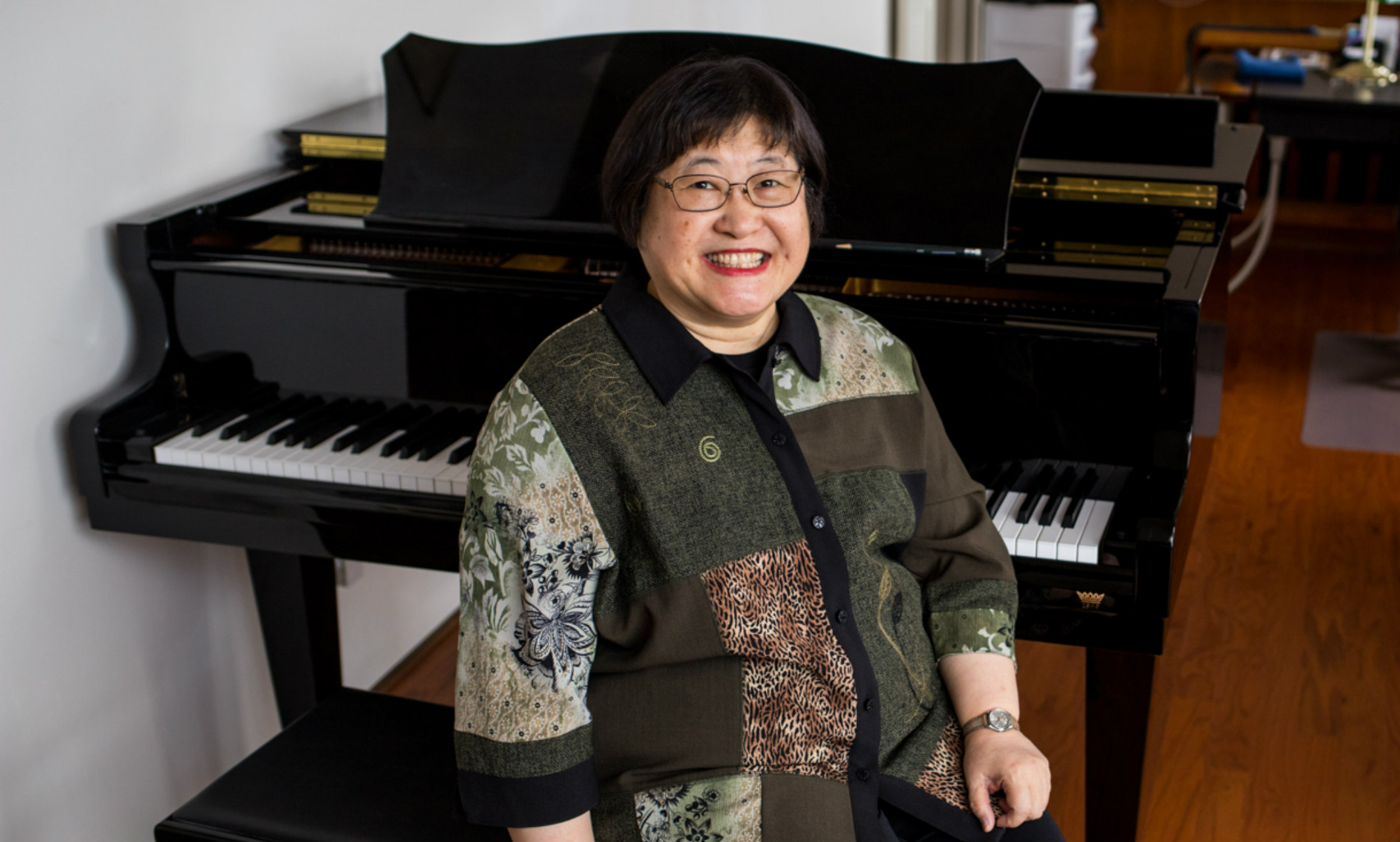
Chen Yi to be inducted into American Academy of Arts and Letters
Chen Yi, Lorena Searcy Cravens/Millsap/Missouri Distinguished Professor of Composition at the University of Missouri-Kansas City, will be inducted into the American Academy of Arts and Letters. Chen is one of 11 new members who will be inducted in May.
The American Academy of Arts and Letters was founded in 1898 as an honor society of the country’s leading architects, artists, composers and writers. Members have included Theodore Roosevelt, John Singer Sargent and Mark Twain, and currently Henry Louis Gates Jr., Maya Lin, Frank Gehry, Tony Kushner, Calvin Trillin and Joyce Carol Oates. The Academy’s 250 members are elected for life.
Chen has achieved international renown as a prolific composer who blends Chinese and Western traditions, transcending cultural and musical boundaries. The Academy honored her with the Charles Ives Living Award in 2001, intended to provide an American composer an income of $100,000 a year for two years “for the purpose of freeing a promising talent from the need to devote his or her time to any employment other than music composition.”
Born in China, Chen received bachelor’s and master’s degrees from the Central Conservatory in Beijing, and the Doctor of Musical Arts degree from Columbia University in New York.
Chen began playing the piano at age three and the violin when she was four.
“Both of my parents were medical doctors who loved classical music,” says Chen. “But my studies were interrupted during the Cultural Revolution when I was a teenager. After almost two years of hard labor in the countryside, I went back to my home city in 1970 to play the violin as the concertmaster in the orchestra for Beijing Opera performance.”
She was the first woman to receive a M.A. in music composition from the Central Conservatory of Music in Beijing. Chen went on to serve as Composer in Residence of the Women’s Philharmonic, the vocal ensemble Chanticleer, and Aptos Creative in San Francisco, supported by the Meet The Composer’s New Residences program. At the end of her three-year residency, she became the first woman in the United States to give a whole evening of multimedia concert with her symphonic and choral works in 1996.
“I have also worked closely and extensively with my UMKC colleagues and students during the past 20 years, with many new music projects and cultural exchange programs. I think that we have grown together and made a contribution to our community. I feel extremely grateful to our Conservatory for the great support given to me.”- Chen Yi
She has received fellowships and commissioning awards from the Guggenheim Foundation (1996), Fromm Foundation at Harvard University (1994), Koussevitzky Music Foundation at the Library of Congress (1997), and National Endowment for the Arts (1994). She was a Pulitzer Prize finalist with Si Ji for orchestra in 2006.
Chen joined UMKC in 1998 and is dedicated to inspiring students.
“I love working with student composers because the feedback between all of us is the more inspiring and stimulating,” says Chen. “I have also worked closely and extensively with my UMKC colleagues and students during the past 20 years, with many new music projects and cultural exchange programs. I think that we have grown together and made a contribution to our community. I feel extremely grateful to our Conservatory for the great support given to me.”
In addition to electing new members as vacancies occur, the Academy seeks to foster and sustain an interest in Literature, Music, and the Fine Arts by administering over 70 awards and prizes, exhibiting art and manuscripts, funding performances of new works of musical theater, and purchasing artwork for donation to museums across the country.
Mar 07, 2019
KSHB reported on the Kangaroo crossing signs that are being found all over Kansas City
Last month the University of Missouri-Kansas City began installing 200 traffic-style signs with a picture of a kangaroo and the words “UMKC grads are everywhere.” Read more
Mar 04, 2019
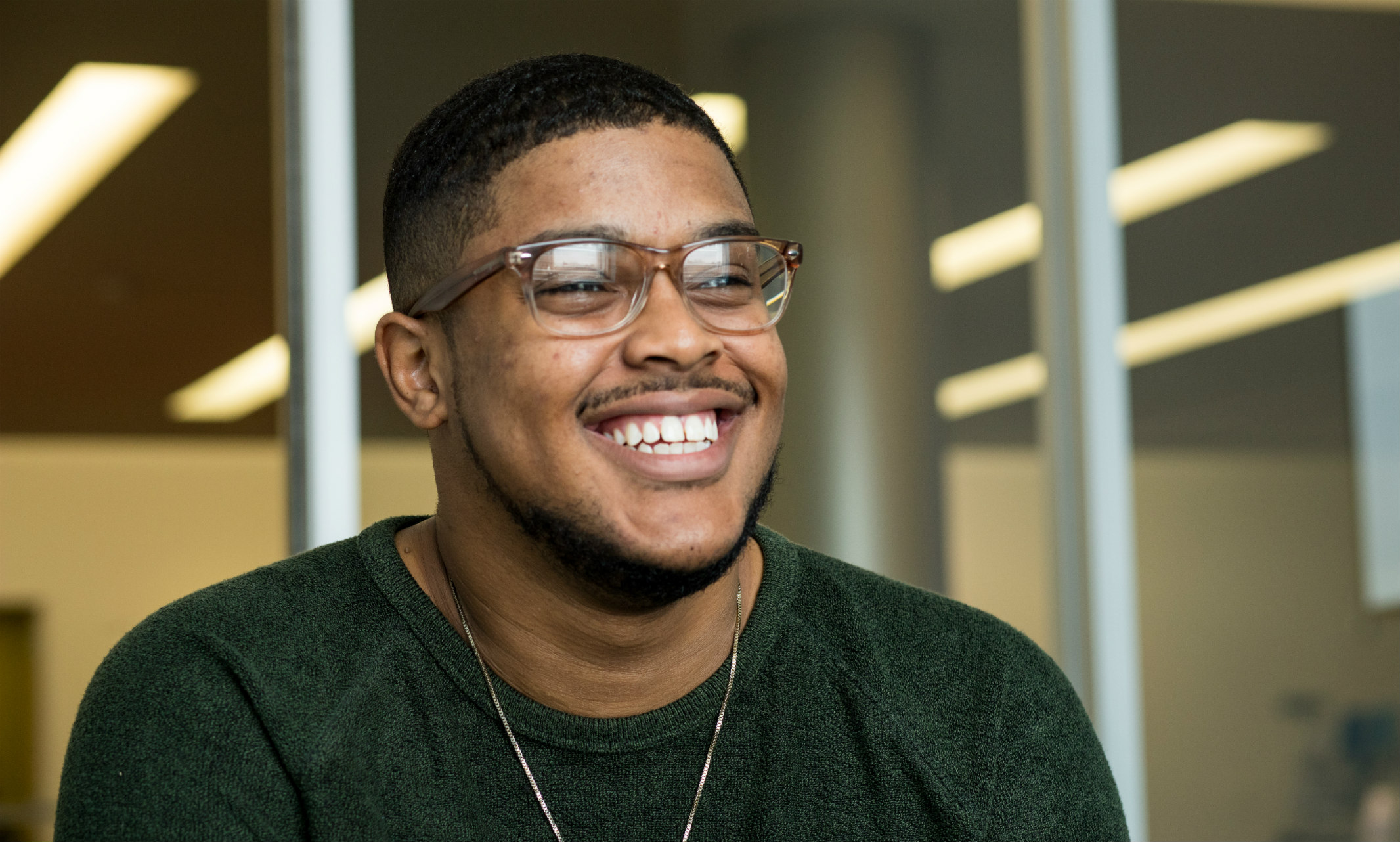
Julius Carpenter on connecting with his peers and his internship at Atlantic Records
Our ongoing story starts with people from around the world, converging here at UMKC. Get to know our people and you’ll know what UMKC is all about.
Julius Carpenter Expected graduation date: 2019 Hometown: Kansas City, MissouriHigh School: Lincoln College Preparatory Academy High School Program: Communications Studies, emphasis in interpersonal and public relations, College of Arts and SciencesOrganizations: Nu Epsilon Chapter of Kappa Alpha Psi Fraternity, Inc.; Men of Color; Rootopia Concert Planning Committee; student assistant at the Office of Multicultural Student Affairs
Why did you choose UMKC?
I transferred from KU due to finances. UMKC was close to home and affordable so it was the best choice for me. This is my home now.
How did UMKC become home for you?
I was sitting outside the Multicultural Student Affairs Office one day on the third floor of the Union one day when someone saw me and invited me to come inside and meet some people. My whole world changed. The warm feeling and accepting nature of everybody just lured me in. I haven’t stopped getting involved since.
Why did you choose to major in communications?
I was majoring in pre-pharmacy but I wanted to do something that would really accentuate and cultivate the skills I had, so I talked to the Communications Studies advisor about switching and the rest is history!
"The UMKC communications program has inspired me to pursue my dreams fearlessly. I set a goal to work for a record company, and I landed a semester-long internship at Atlantic Records in Los Angeles."-Julius Carpenter
What are the benefits of the communications program?
I’ve obtained great skills from all assets of communications from mass media to journalism. The communications department also holds a free annual internship fair for all its students.
The UMKC communications program has inspired me to pursue my dreams fearlessly. I set a goal to work for a record company, and I landed a semester-long internship at Atlantic Records in Los Angeles.
Tell us more about your internship for Atlantic Records.
It’s in the publicity department. The internship is for school credit and I'm taking online classes to stay on track for graduation this year. I work on press releases, and tour research for various artists on the label and work on marketing projects with my fellow interns to create digital marketing plans for up-and-coming artists on the label. I've been here since the middle of January, and I love it! Time flies when you're doing what you love to do.
What has your program taught you about yourself?
To be brave in my speech and to be confident in how I speak. I have anxiety, but public speaking really has helped me to manage that. It’s also helped me be a leader.
The best piece of advice that I’ve ever received from my favorite public speaking professor, Michael Schaefer, is to believe in yourself even when it seems those around you don’t.
What do you admire most at UMKC?
What I admire most about UMKC is the diversity and inclusiveness of the faculty and staff here. UMKC has expanded my world view. I’m an ally to LGBTQ students, Latinx students and Dreamers.
Learn More About UMKC
Mar 04, 2019
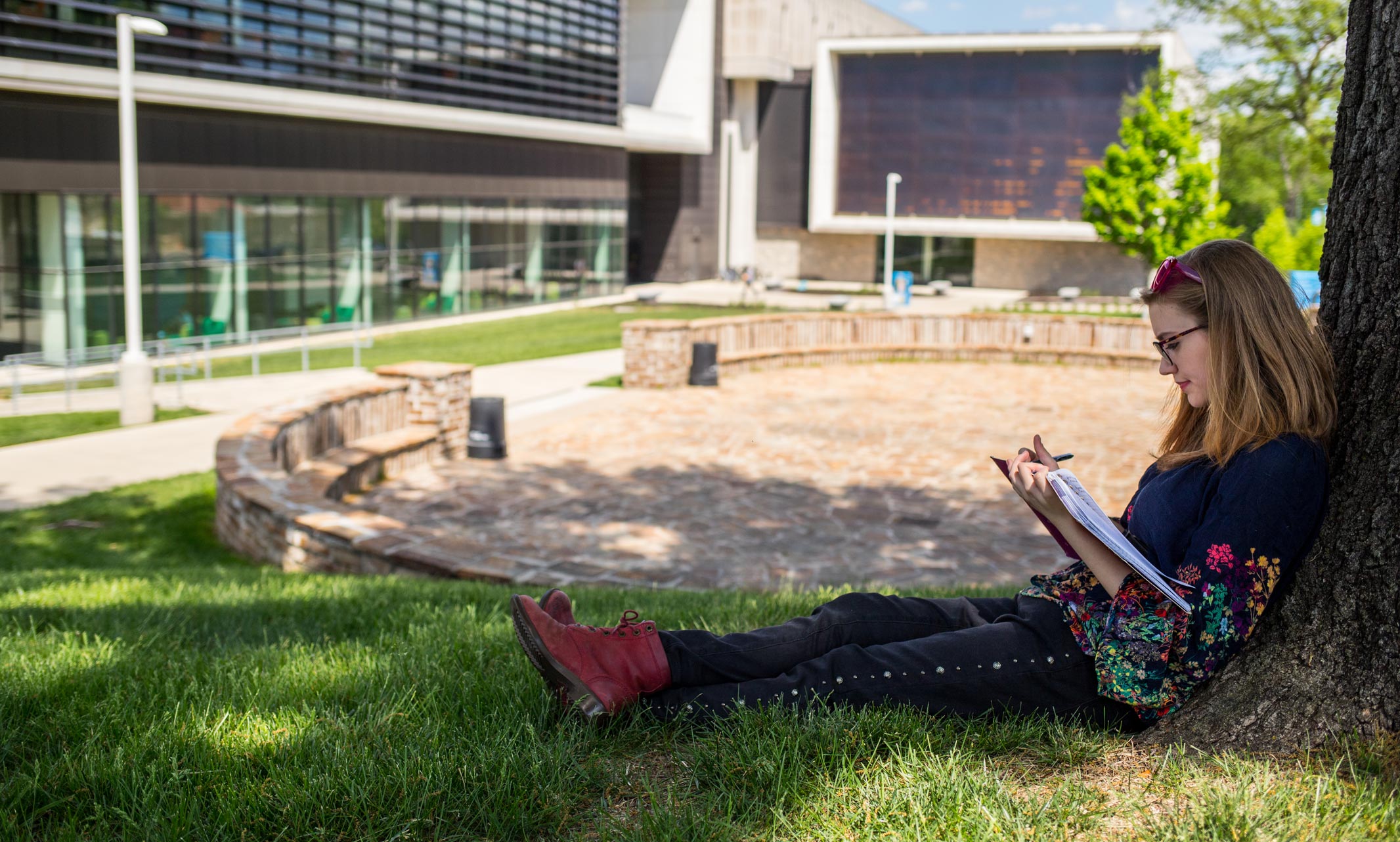
New landscaping provides another reason to look forward to spring
Most people have their favorite places to hang out on campus whether they’re studying or spending time catching up with friends. For a lot of people, the patio of the University Playhouse by the Miller Nichols Library is just that spot. It’s about to get even better.
Recently, the Miller Nichols Charitable Foundation donated over $160,000 to support new landscaping around the Miller Nichols Library and Learning Center site. The foundation worked with campus management to coordinate the plan.
In addition to plantings around the base of the library building, nine white-bud trees will be planted north of the playhouse area near the entrances of the library and learning center, and two planters will be added for planting spring and fall annuals at the Playhouse patio in 2019 as part of the second phase of the project. In addition, the sloping area northwest of the Learning Center will be landscaped with plant and hardscape materials.
“Well-designed exterior spaces on a campus … are just as important as classrooms in that they provide places for students to decompress and recharge.” - John Eck, associate teaching professor
While improvements to labs and classrooms are important to student success, environmental design is important too. John Eck, associate teaching professor in the Department of Architecture, Urban Planning and Design, and his team reinforce the importance of their students considering outdoor spaces while developing their designs, whether they are residential or commercial projects.
“Environments — inside or outside— provide functional and inspirational spaces for work, life and play,” says Eck. “A college campus is probably the best and highest example of this. Well-designed exterior spaces on a campus—quads, courtyards, plazas, paths—are just as important as classrooms in that they provide places for students to decompress and recharge. I think we all know what fresh air, sunlight and vegetation do for mental health. The design and maintenance of our campus greenspaces is critical to that sense of well-being.”
While landscaping may not be something of which students or visitors are consciously aware, there’s no question that these plans and plantings enhance the university as a whole.
Make a Gift to UMKC
Mar 01, 2019
KC Studio featured Kansas City Ballet’s New Moves that showcases emerging choreographers
Gary Abbott is the most experienced participant on the roster of the Kansas City Ballet’s New Moves program. An established choreographer, he is an associate professor of modern dance at the University of Missouri-Kansas City’s Conservatory of Music and Dance and co-founded the Deeply Rooted Dance Theatre of Chicago, 22 years ago, following his experience with the Cleo Parker Robinson Dance Ensemble. Read the article
Mar 01, 2019
Bill Ross' legacy lives on at UMKC
Bill Ross
As one of the founders of the athletics program, Bill Ross (1935-2019) has left a lasting legacy at UMKC. He was the first coach for men’s basketball when the team formed in 1969; the first women’s basketball coach, launching the team in 1980; and was head golf coach from 1972 through 2006. He also served as the first Sports Information Director at UMKC, as an assistant athletics director and also taught physical education as an assistant professor.
He was inducted into the Missouri Sports Hall of Fame in 2007, where he is cited for following up a successful tenure as a high school basketball coach by becoming “instrumental in the development and implementation of the Intercollegiate Athletics program at UMKC,” as well as having “a significant impact in UMKC’s transition from NAIA to NCAA Division I athletics in 1987.”
"It was more a labor of love than anything," -Ross said. "I'd say because of the longevity I held onto in that sport, it has to rank at the top for me."
After his 2003 retirement, Ross and his wife, Pat, split their time between Hawaii and Kansas City. Spring and the return of golfing weather was always a harbinger of the Ross’ return to Kansas City, where Bill would schedule plenty of rounds with former student-athletes.
Upon his induction into the UMKC Athletics Hall of Fame in 2010, Ross said he held the golf program closest to his heart.
"It was more a labor of love than anything," Ross said. "I'd say because of the longevity I held onto in that sport, it has to rank at the top for me."
Brandon Martin, Ph.D., director of athletics, said Ross was “an integral member of UMKC Athletics.”
“We are saddened to learn of the passing of legendary coach Bill Ross. His impact is everlasting as a founding member of our department, and we are thankful for the time he spent building leaders at UMKC.”
J.W. VanDenBorn, head men’s golf coach at UMKC, played for Ross and later served as an assistant coach for him before taking the head coaching position when Ross retired.
“We are deeply saddened to lose our coach, mentor and friend,” VanDenBorn said. “He dedicated much of his life to UMKC Athletics and is largely responsible for what we all enjoy within the athletic department today. Everyone associated with UMKC Athletics is deeply indebted to him for his innumerable contributions. There will never be another Bill Ross.”
Feb 28, 2019
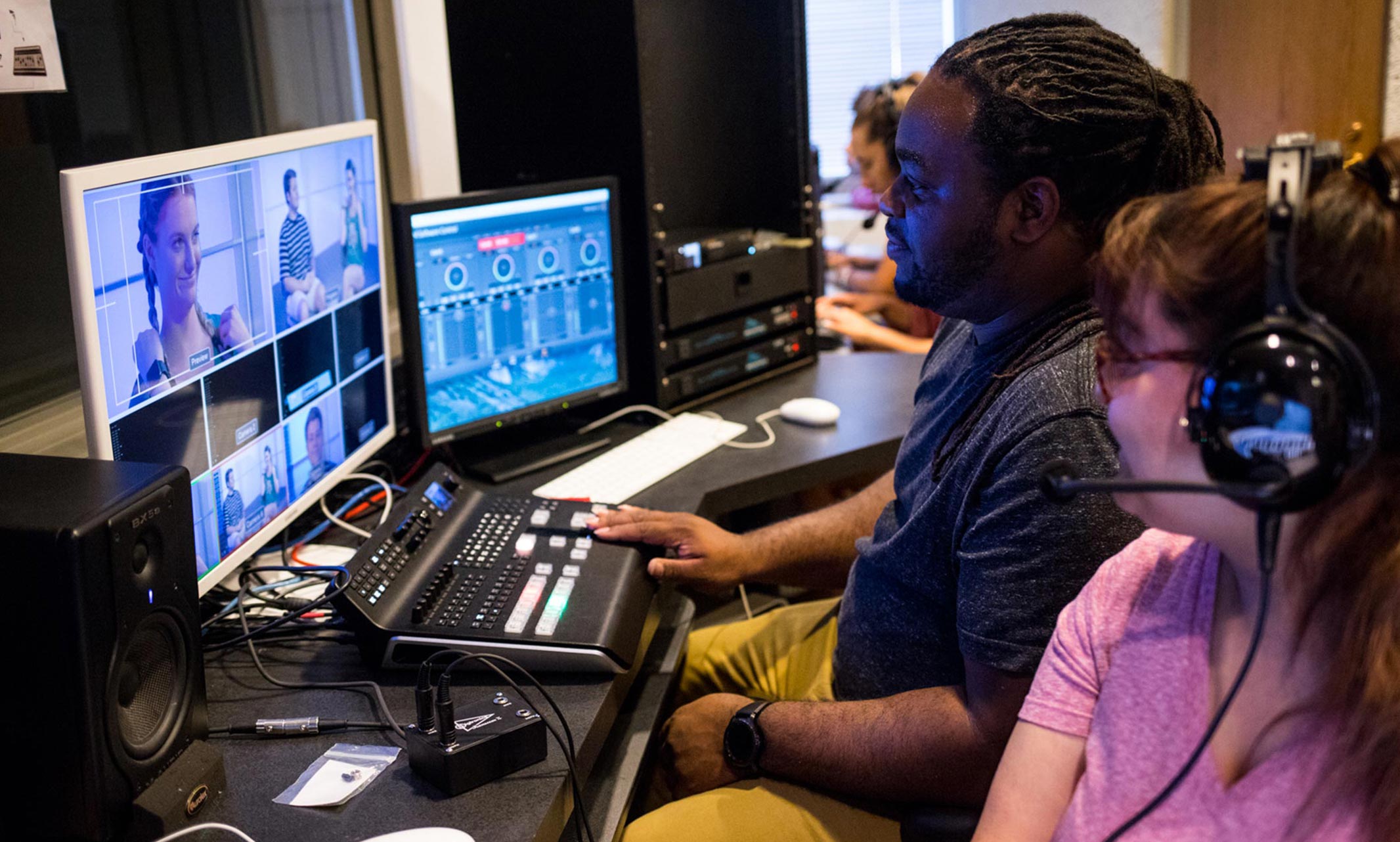
Broadcast studio gets an upgrade
Bob Carpenter, an award-winning sports broadcaster and voice of the Washington Nationals baseball team, recently donated $15,000 to the Department of Communications Studies to provide new equipment for existing studios to ensure students are prepared for today’s work environments.
Carpenter understands the significance of updated equipment in broadcast studios. He has seen a lot of change in the industry since he graduated from UMKC in 1975.
“When I was at UMKC 40 years ago, all the equipment was old stuff,” Carpenter remembers. “Our engineer was always putting things back together with duct tape. Even then I thought that if I were ever in a position to give back, I would.”
Originally designed for the analog broadcast world, the video studio was outdated for the creation of digital, high definition video, which is now the industry standard.
Caitlin Horsmon, associate professor and chair of communications studies, acknowledges the gift’s importance.
“So often now a reporter is a one-man band,” Horsmon says. “They have to do everything – shoot, edit and publish. Up-to-date equipment ensures that we are giving them the best launching pad for success when they graduate.”
“Having access to the new studio will make getting experience with the technology and equipment so much easier and enjoyable.” – Ciara Pate, communication studies
A keen understanding of the field and an appreciation for hard work have contributed to Carpenter’s success, but he counts his years at UMKC as a significant influence.
“Going to UMKC was the best decision I ever made,” says Carpenter. “There were about 75 people in the whole department. It had a real team feel.
“I want UMKC’s students to have that experience and the type of equipment that is going to prepare them for their jobs when they graduate.”
If you're interested in making a gift to benefit UMKC students, learn more from the UMKC Foundation.
Feb 28, 2019
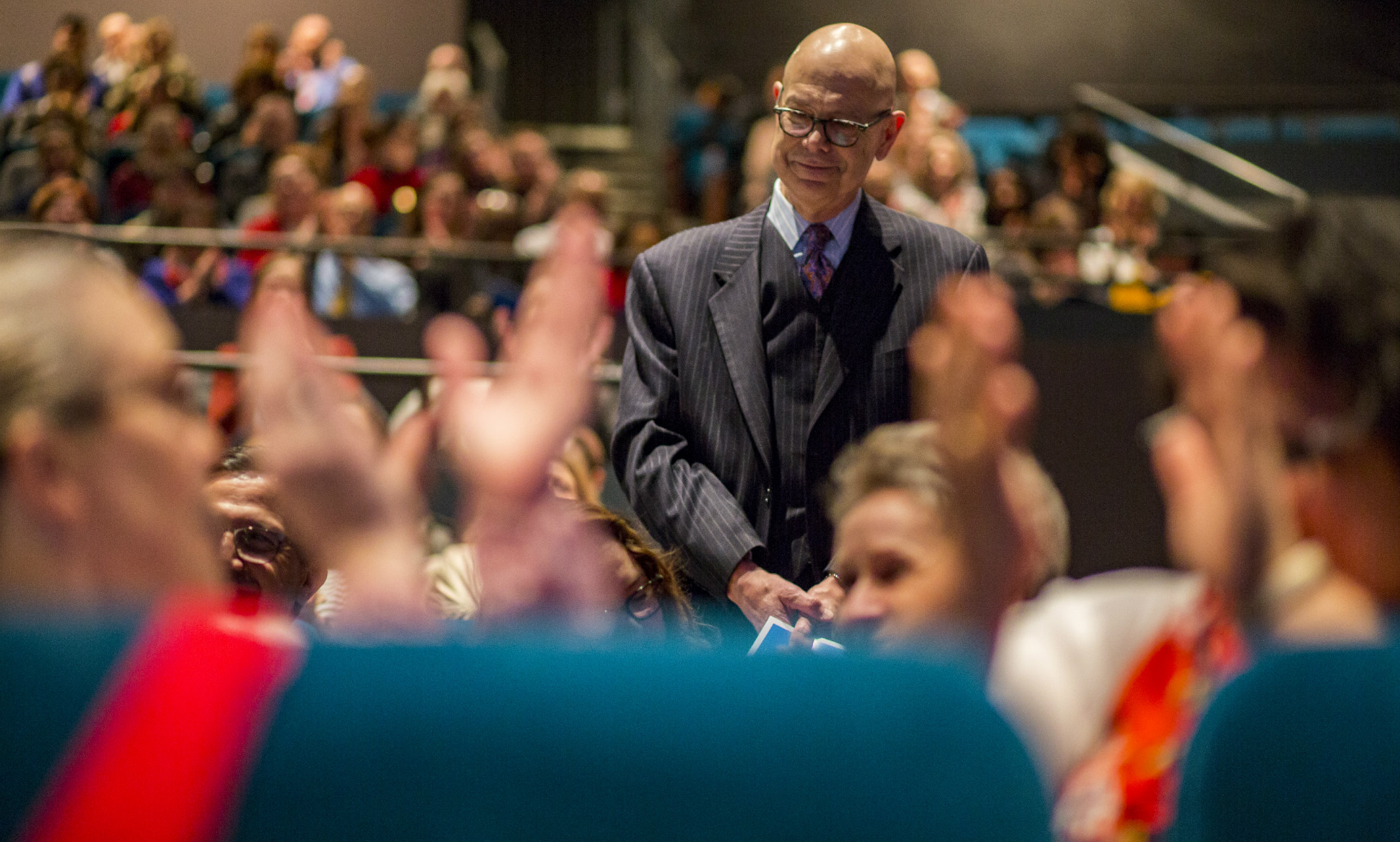
Second annual ceremony recognizes contributions
Excellence at UMKC is not just the standard for our students, it is the standard for everyone who lives, works and visits our university. For more than 1,300 staff members, excellence in customer service and quality of work are not just university values, they’re personal ethics, and the annual Staff Awards event gives our campus community a chance to recognize those who make a difference at UMKC.
On the morning, Feb. 27, hundreds of staff members gathered for the second annual Staff Awards celebration in the James. C. Olson Performing Arts Center to celebrate a commitment to student success, diversity and inclusion, engagement and outreach and research and discovery. The celebration also included milestone anniversaries, staff who were a part of the 2018 graduating class and staff who completed leadership development courses offered through the university.
“It is important to host events like the Staff Awards because it reminds us that our work is valuable and our people are our most valuable asset.”
- Chancellor Mauli Agrawal
Whether working directly with students, coordinating programs and services for the greater Kansas City community, or providing foundational support for the various departments and academic units that make up our campus community, UMKC staff are a key part of our mission to be a transformational force in our community and in the world.
“We strive each day to recognize staff as an important factor in the equation that makes up UMKC, and that contributes to the totality of the success of our university,” said Staff Council Chair Roland Hemmings.
Congratulations to the 2019 Staff Awards recipients
45-year Milestone Anniversary
Bill Marse
2018 summer and fall graduates
Cary ChelladuraiLauren DorsettApril GrahamAnthony LabatCourtney McCain
Supervisory Development Series Graduates
Haley AndersonDakota JuhanAndrew HansbroughNancy BahnerFrancis MagroneBenjamin ZygmuntRebecca BergmanHeather MillerMichelle HeimanThom BoogherSarah MoteJennifer BurrusMary ParsonsCary ChelladuraiChristopher RoccoBrian DalyShannon RossAaron DavidJohn SmithStacy DownsElora ThomasAlison EatonHai VuShana EisentragerSandy Wilson
Administrative Leadership Development Program Graduates
Thom BoogherMegan CrossSean GrubeBecky PottebaumFred SchlichtingMolly WilenskyRob Williams
Staff Council Dedication Award
Liza Hughey
Living the Values Awards
Kristen Abell, Division of Strategic Marketing and CommunicationsCheryl Adam, Conservatory of Music and DanceCasey Bauer, School of Nursing and Health StudiesRebecca Bergman, College of Arts and SciencesAndrea Brown, School of LawCary Chelladurai, School of MedicineLawrence Dreyfus, Academic Affairs, being recognized by the Office of Research ServicesShana Eisentrager, School of PharmacyStephanie Griffin, School of Computing and EngineeringLibby Hanssen, University LibrariesWes Hinman, Information ServicesAmelia Howard, Intercollegiate AthleticsJody Jeffries, Student AffairsSteve Jenks, Campus Facilities ManagementMichelle Kroner, Affirmative ActionBill Marse, School of DentistryKim McNeley, University CollegeLauren Petrillo, School of Biological SciencesPolly Prendergast, School of EducationNancy Wilkinson, Henry W. Bloch School of Management
University Staff Awards
Excellence in Student Success – Corinna Beck, School of Nursing and Health StudiesExcellence in Research and Creative Works – Chelsea Dahlstrom, Office of Research ServicesExcellence in Engagement and Outreach – Erin Christensen, Henry W. Bloch School of ManagementExcellence in Multiculturalism, Globalism, Diversity and Inclusion – Tamica Lige, School of PharmacyExcellence in Planning, Operations and Stewardship – Amy Carlson, Registration and RecordsChancellor’s Staff Award for Extraordinary Contributions – Mary Flores, School of Biological Sciences
Learn More About UMKC
Feb 28, 2019
Conservatory of Music and Dance selects Stanislav Ioudenitch to receive Alumni Award
Stanislav Ioudenitch (P.C.-Piano '03)Artistic Director, International Center for Music at Park University
Each year, the UMKC Alumni Association recognizes the achievements of outstanding alumni with an awards celebration. In 2019, UMKC Conservatory of Music and Dance is honoring Stanislav Ioudenitch (Performance Certificate-Piano ’03) with their Alumni Achievement Award.
Gold-medal winner at the world-renowned Van Cliburn International Piano Competition, Ioudenitch has performed at cultural centers around the world, including Carnegie Hall in New York, Conservatorio Verdi in Italy, the Mariinsky Theatre in Russia and Théâtre du Châtelet in France.
Ioudenitch founded the International Center for Music at Park University where he is artistic director and master teacher of piano. Additionally, he is director of the Young Artists Music Academy and vice president of piano at the Piano Academy of Lake Como. Since 2017, he has served as associate professor of piano at Oberlin Conservatory.
Of teaching, Ioudenitch has said that relating his experiences, knowledge and performance practices to his students has always been a personal and professional passion.
About the Alumni Awards
Ioudenitch will be honored at the 2019 UMKC Alumni Awards on March 15. Proceeds from the event will support student scholarships. In the last decade, the Alumni Awards events have raised more than $1 million in scholarships and immediate aid for students.
Feb 27, 2019
José Faus to receive UMKC Defying the Odds Award
José Faus (B.A. ’87)Artist
Each year, the UMKC Alumni Association recognizes the achievements of outstanding alumni with an awards celebration. In 2019, UMKC is honoring José Faus (B.A. ’87) with the Defying the Odds Award.
Faus lived with his grandmother in Bogota, Colombia, before moving to the U.S. at nine years old. He and his brother came to Kansas City in the dead of winter to live with his mother, who’d come to the U.S. three years earlier. While he went through a period of rebellion in his teens, Faus came to realize his knack for writing and has used his journey as a source of inspiration for his work. An artist and writer, Faus is a founding member of the Latino Writers Collective and serves on the boards of Charlotte Street Foundation, UMKC Friends of the Library and Nuevo Eden. He’s been involved in many mural works in the Kansas City area, Mexico and Bolivia, where he received a cultural ambassador grant from the U.S. State Department. Faus reflected on his artistic influences and passion for community.
How does your upbringing influence your art?
I can honestly say that the experience of being in two different worlds (cultures) influences the way I respond creatively. I am also not concerned with the idea that only one discipline is all we should pursue. I can’t imagine writing without the visual and performing aspect and that comes from being in two places culturally, emotionally and socially.
You’re deeply involved in the Kansas City community. Why is supporting the community and its residents so important to you?
I really believe it is important to create the type of community one is comfortable in. I recall when one could legitimately say there was nothing going on in town but now there are so many things to do. This town is growing culturally and it is exciting to see what that transformation looks like. We are creating this in real time.
Where did the idea for the Latino Writers Collective come from?
I was going to readings around town and seeing voices that did not reflect my experience or my background. There was a group of Latina and indigenous women writers called Las Poetas that did. When they broke up, I remember pressing my friend Angela Cervantes to see if she would be interested in helping form a group of Latinos that would work to help refine our work and present it. We found like-minded folk and created the collective. We started out by meeting at The Writer's Place, and in time started getting our work out and people started coming to our readings.
About the Alumni Awards
Faus will be honored at the 2019 UMKC Alumni Awards on March 15. Proceeds from the event will support student scholarships. In the last decade, the Alumni Awards events have raised more than $1 million in scholarships and immediate aid for students.
Feb 27, 2019
Steven St. John to receive UMKC Spotlight Award
Steven St. John (B.A. '96)On-Air Personality, 810 WHB
Each year, the UMKC Alumni Association recognizes the achievements of outstanding alumni with an awards celebration. In 2019, UMKC is honoring Steven St. John (B.A. ’96) with the Spotlight Award.
A fixture on the Kansas City sports scene since 1999, St. John is the host of the popular sports morning show “Border Patrol” on 810 WHB, the first program to be simulcast daily on radio and television in Kansas City. He spent several years offering color commentary for UMKC basketball teams and has spoken at numerous university events. An active member of the Kansas City community, St. John devotes his spare time to Big Brothers Big Sisters of Greater Kansas City and the Down Syndrome Guild of Greater Kansas City. He also serves on the board of directors for the ALS Association of Mid-America Chapter and as honorary chairperson for the Annual Sheffield Place Golf Tournament. He spoke with us about his career path and passion for giving back.
Rumor has it you called radio shows and impersonated characters to talk sports with the hosts. Any truth to that?
Yes, while working at Union Broadcasting [parent company of 810 WHB], I would call the show and prank the hosts. I was just doing a weekly boxing segment and basically doing anything around the radio station that they would let me do, for free. I just wanted to get my foot in the door. I think it showed my eventual bosses that I had some unique voice talents. Now I’m living my dream. I’m probably most comfortable in life when I’m on air in front of a microphone.
You donate your time to a number of organizations. Where does your passion for community service stem from?
Without a doubt, my mom. She always told me that along with any success I achieved in life, I needed to remain humble and give back to the community. I’m only doing the things she would be doing if she was still alive. So all of my philanthropic endeavors are dedicated to her memory and done in her name.
How did UMKC prepare you for success?
I needed direction. I needed support. I needed confidence. Working for the basketball program and University News gave me those things. The broadcast performance class taught by Pam Whiting crystallized my desire to make it in radio. I remember Gary Lezak came to class as a guest speaker and I thought he would be a cool guy to work with. Now, he does a segment on my show every day.
About the Alumni Awards
St. John will be honored at the 2019 UMKC Alumni Awards on March 15. Proceeds from the event will support student scholarships. In the last decade, the Alumni Awards events have raised more than $1 million in scholarships and immediate aid for students.
Feb 27, 2019
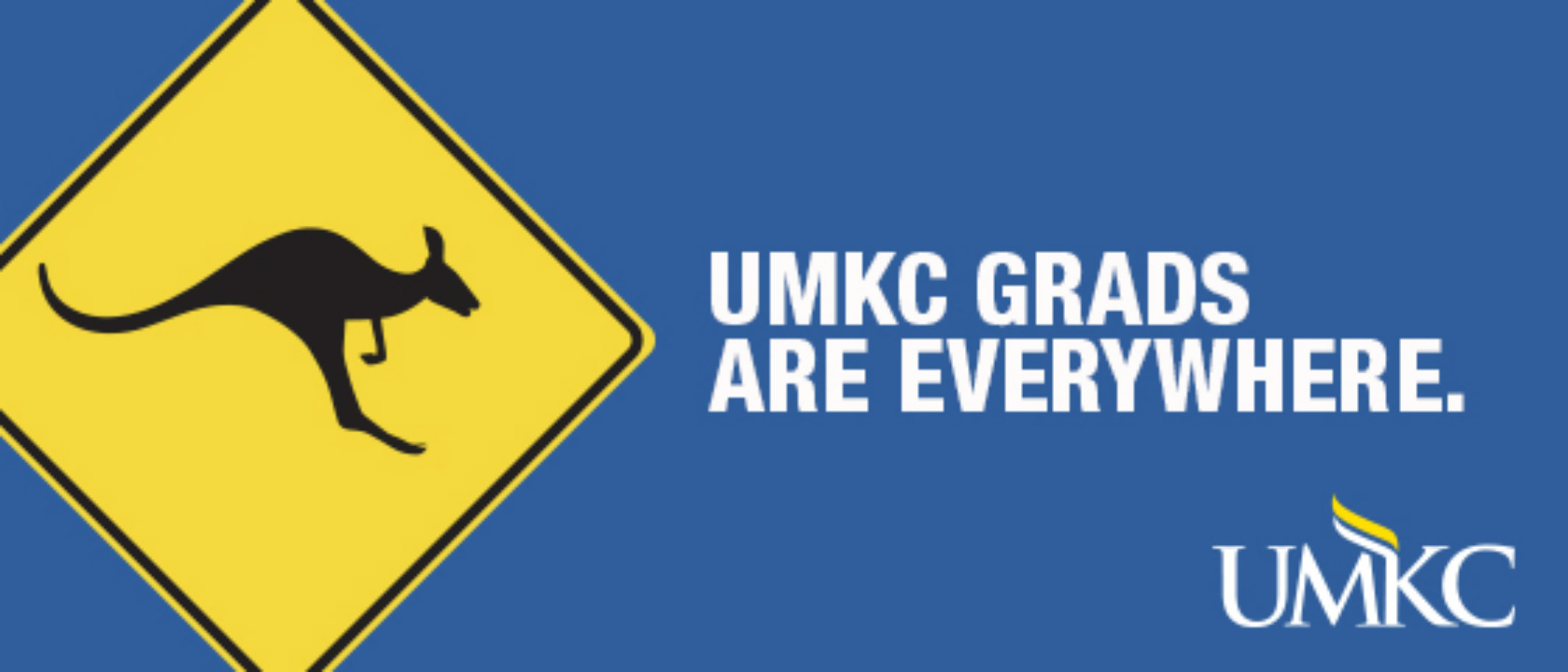
New marketing campaign shows Roos' enormous impact on Kansas City and beyond
UMKC launched a new marketing campaign this week that, quite literally, should have you seeing UMKC Roos everywhere.
The campaign's essential idea builds off something we Roos already know - UMKC grads are everywhere. Our alums are some 57,000 strong in Kansas City. We have tens of thousands more people who benefit from our community engagement work, who donate to our programs, who serve on boards, who believe in our mission as an urban, public research university. UMKC makes a huge impact on the leadership, workforce and culture of our great metro area.
So we decided to create a new way to tell that story. The campaign is the collaboration of the UMKC Division of Strategic Marketing and Communications and Bernstein-Rein, one of Kansas City's leading advertising firms.
The look
The campaign is built around simple but indelible elements. The UMKC gold and blue. Our distinctive kangaroo mascot.
The central image - a powerful kangaroo silhouetted against a gold background - is reminiscent of the deer crossing signs you see in Missouri and Kansas. The idea is that anytime you see one of our signs, you'll remember that UMKC grads truly are everywhere - they could be your pharmacist, your accountant, the director of the museum you're visiting or a musician in the performance you're attending.
The messages
Our campaign is built around two central overarching messages. Yes, our UMKC grads are everywhere. But more than that - they excel everywhere.
Over time, our campaign will also communicate some of the key ways UMKC provides a great return on investment for our community. And we'll highlight the many successful and varied academic programs that have provided the foundation for our students to go out and change the world.
Where to see it
Billboards. Downtown streetcar stops. Facebook, Instagram and Twitter. Online digital ads and search. Wild postings of our signs in neighborhoods across KC. Car decals and T-shirts. These are just a few of the places you can see our campaign all across the greater Kansas City metro, and even all the way to Wichita and Topeka.
Want to see it in person? Go here:
Downtown KC. You'll see it on the streetcar shelters lining Main Street and on huge digital billboards in the Power and Light District.
On major interstates. Keep your eye out for billboards on I-35 northbound on the Kansas side as you near downtown, I-70 westbound as you drive from Independence and I-29 crossing the river.
Westport, Crossroads and Midtown neighborhoods and more. You'll find UMKC signs sprinkled throughout these areas where may least expect it.
Buy T-Shirt, $9.99
Spread the word!
Tell your story with hashtag #RoosEverywhere about how UMKC positively impacted your life.
Tell a prospective student about the campaign.
Represent the gold and blue and sport your UMKC gear
Take a selfie with one of our kangaroo signs and post it to social with #RoosEverywhere.
Like and retweet other #RoosEverywhere stories.
See someone else sharing their story? Send it to our UMKC social accounts - Facebook, Twitter and Instagram - and we'll feature them in future social media posts or stories.
Donate to fund scholarships for new Roos.
Any and all are great ways to support UMKC.
Feb 27, 2019
Dick Gibson to receive the UMKC Bill French Alumni Service Award
Dick Gibson (B.M.E. '67, EMBA '02)Retired
Each year, the UMKC Alumni Association recognizes the achievements of outstanding alumni with an awards celebration. In 2019, UMKC is honoring retired Colonel Dick Gibson (B.M.E. ’67, EMBA ’02) with the Bill French Alumni Service Award.
A former president of the Bloch School of Management’s Alumni Association Board, Gibson is a long-time supporter of UMKC. One of the founding members of the EMBA Alumni Admissions Council, Gibson serves on the business advisory board to Enactus and as an at-large director on the UMKC Alumni Governing Board. Despite living nearly an hour from campus, Gibson can be found supporting students at campus events, including alumni pizza nights, move-in days and commencement ceremonies. He recently spoke with us.
What do you enjoy most about working with the students in Enactus?
I love helping them meet key business leaders in the Kansas City metro area who can assist them with completing some of their projects to better the community in which they live as UMKC students. I also enjoy getting the Enactus students ready for their annual competition and have had the honor to see them compete twice at the national competitions.
You’ve served in several different capacities over the years:
Bloch Executive Education Advisory Board
Alumni Alliance Board Member
Bloch EMBA Alumni Admissions Council
Bloch Alumni Association Board Member/Past President
Alumni Association Board Member/Director-at-Large
Bloch Regnier Institute Advisory Board
Experience UMKC Volunteer
Legislative Day Volunteer
Bloch School Guest Speaker
Mid-Year Commencement Volunteer
Bloch School Case Management Competition Judge
Move-in Day Volunteer
“Friends are like notes of a song — one melody, one harmony. Together they make music.”
Would you pick one or two and tell us why it was meaningful?
I find meeting with students and their parents during Experience UMKC each spring in Pierson Auditorium a tremendous opportunity for me to give back to prospective students and relay to them the value of coming to UMKC for undergraduate studies. Also meeting the parents, who sometimes are equally trying to decide if their children should attend UMKC, allows for great interaction and discussions.
Being a judge for the Bloch School Case Management Competition for eight years has been a fantastic experience. Each year I enjoy watching student teams deliver their solutions and recommendations to different Kansas City businesses that want valuable feedback on real business problems.
What phrase do you use most often?
“Friends are like notes of a song — one melody, one harmony. Together they make music.”
Friends are important. It is true friendships that have endured over time that keep me going.
About the Alumni Awards
Gibson will be honored at the 2019 UMKC Alumni Awards on March 15. Proceeds from the event will support student scholarships. In the last decade, the Alumni Awards events have raised more than $1 million in scholarships and immediate aid for students.
Feb 27, 2019
Dwight Scott to receive the UMKC Alumnus of the Year Award
Each year, the UMKC Alumni Association recognizes the achievements of outstanding alumni with an awards celebration. In 2019, UMKC is honoring Dwight Scott (B.L.A. ’94) as Alumnus of the Year.
Dwight Scott (B.L.A. '94)Director, San Diego Zoo
As director of the world-famous San Diego Zoo, Scott has helped the 102-year old organization grow into a leading force in conservation worldwide. Scott is responsible for daily operations of all departments including admissions, education and animal care. Through science-based, collaborative projects and cutting-edge, immersive exhibits, the organization strives to lead the fight against extinction and connect people with wildlife.
Scott also serves as a mentor for the Association of Zoos and Aquariums’ executive leadership development program and on the advisory board of the Wildlife Trafficking Alliance. He recently spoke with us about his career.
You started your career as a primate keeper at the Kansas City Zoo. Has your interaction with animals decreased since you’ve become director of the San Diego Zoo?
Relationships with animals is a special bond. They learn to trust the people they see daily, so I can’t just walk by the gorillas and expect them to come over and say hello. I miss that. But now I get to admire our great animal keepers and the bond they form with the animals. I walk the zoo early in the morning and run into our horticulture staff and I always learn something from them. It’s not just about animals, plants are critical, too.
Where do you hope to see zoos go in the future?
The future of zoos is important as more and more plant and animal species are threatened with extinction every day. In Africa, what people think of as “the wild” is different than “running free.” Poaching is one of the gravest threats to wildlife. The last two northern white rhinos on the planet are under armed guard 24/7. I am grateful to have the chance to collaborate with like-minded organizations to save species from extinction. It is noble, humbling and inspiring. I’m fortunate to work in an industry that makes a difference for wildlife.
What advice do you have for students who’d like to follow in your footsteps?
When I started, I was attracted by animals but what I’ve learned is that to save the animals, you have to work well with people. Collaborations are key—be able to develop relationships. Be prepared to work well and effectively with people.
About the Alumni Awards
Scott will be honored at the 2019 UMKC Alumni Awards on March 15. Proceeds from the event will support student scholarships. In the last decade, the Alumni Awards events have raised more than $1 million in scholarships and immediate aid for students.
Feb 27, 2019
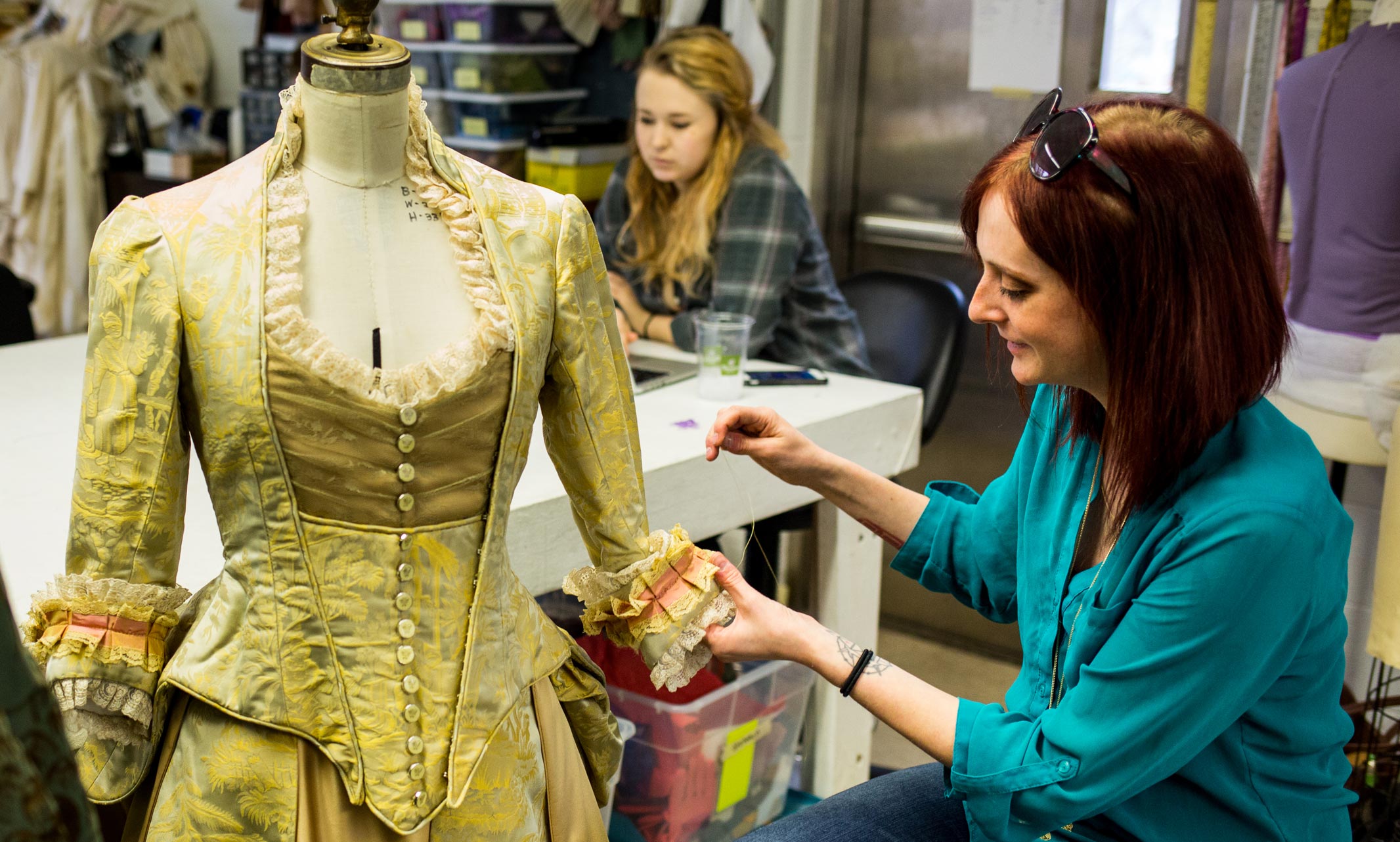
Second year in a row, Hollywood Reporter names UMKC to its Top 10 list
For the second year in a row, Hollywood Reporter has included UMKC Theatre in its list of Top 10 Costume Design schools.
“It’s pretty exciting,” said Lindsay W. Davis, UMKC Theatre professor of costume design. “There have been only two years of the Top 10 list, and it is basically a list of behemoths, giants in university education, and UMKC is among them.”
UMKC Theatre offers a single comprehensive M.F.A. degree in costume design and technology, which has been key to its success. Students learn many skills including drawing, painting, sketching and learning how to construct a garment with techniques in fabric manipulation, millinery, tailoring and pattern drafting.
Doug Enderle was the first M.F.A. costume design graduate from UMKC in 1981. He received an Emmy for his work for The Walt Disney Company at which he was a senior lead costume designer. Other notable alumni include Tom Houchins, costumer on Grey’s Anatomy; and Jonathan Knipscher, lead tailor on The Greatest Showman.
“Running a shop of several tailors, pattern makers and milliners for a large movie like this can be stressful, especially with an ever-evolving schedule," Knipscher said in the Hollywood Reporter write-up about UMKC Theatre. “UMKC taught me to deal creatively with these struggles, be calm and come up with the best solution in the moment.”
UMKC Theatre graduates have worked as costume designers or costume makers at HBO, The Metropolitan Opera, The Los Angeles Opera, on Broadway, London’s West End, the Market Theatre in South Africa, as well as opera companies in Brazil, Italy and throughout the U.S. Regional theaters recent graduates have worked at include Ford’s Theatre in Washington, D.C., The Roundabout Theatre in New York City, The Cleveland Play House and The Old Globe in San Diego. Pheobe Boynton (M.F.A. '08) was costume supervisor on Norwegian and Oceania cruise line, and also designed for the Discovery channel group and YouTube Red.
Feb 25, 2019
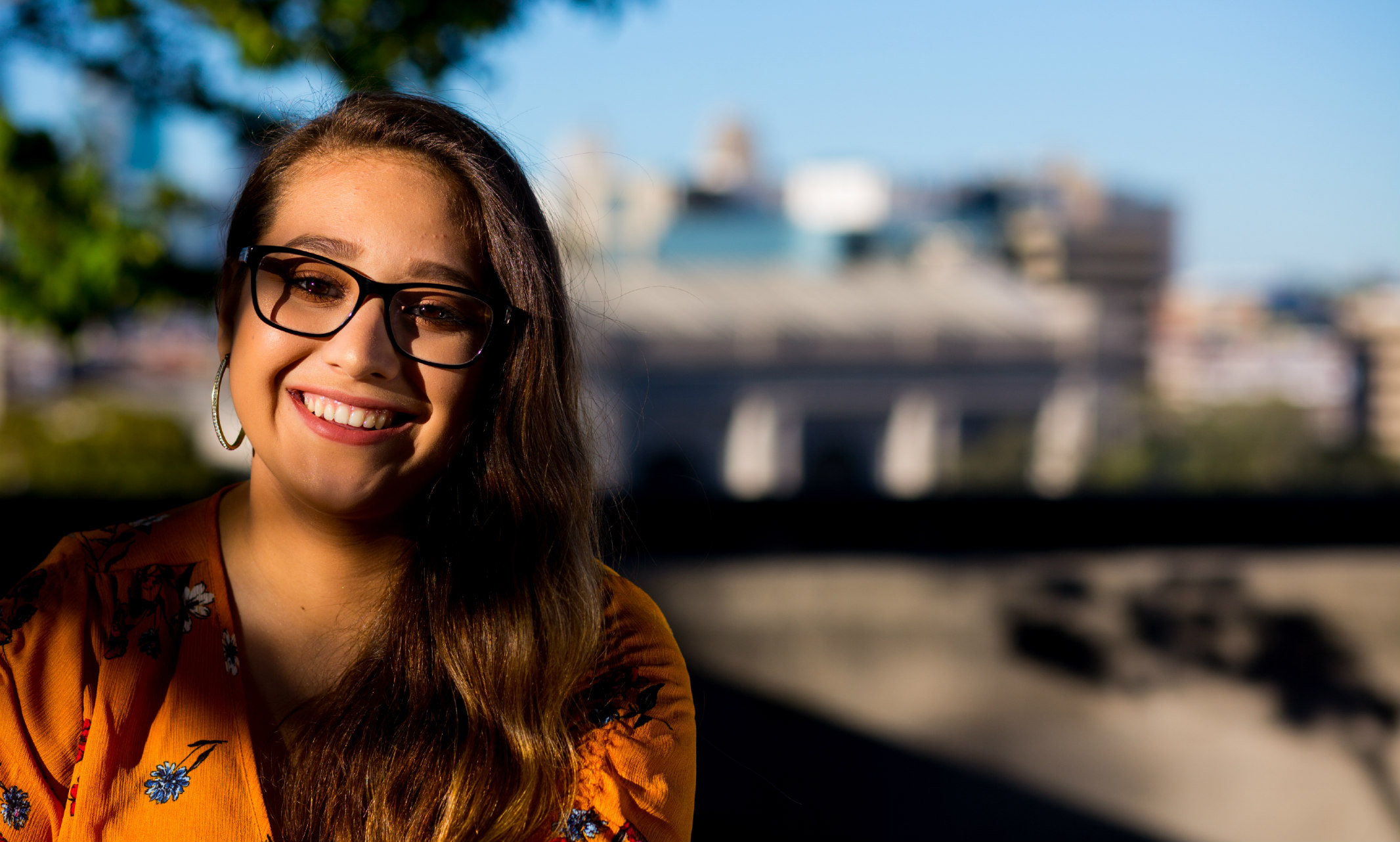
Daphne Posadas seizes opportunities at UMKC
Our ongoing story starts with people from around the world, converging here at UMKC. Get to know our people and you’ll know what UMKC is all about.
Daphne PosadasAcademic program: Business Administration (Management), Pre-lawHometown: Independence, Missouri; originally from New JerseyAnticipated graduation year: 2021
Why did you choose UMKC?
When I was deciding where to go to college, I originally wanted to go back to New Jersey (where I was born) or New York, because there's tons of diversity, cultural identity and people who are proud of who they are, no matter where they're from. But UMKC offered me a lot of financial opportunity to go to school. I couldn’t turn it down! It was a last-minute decision that I'm very thankful I made.
What do you like about UMKC?
One key thing that I love about UMKC is I feel like I can contribute here. I didn't think one person could make a huge difference, but I got to be an orientation leader and an RA and make a difference in so many freshmen's lives.
Another thing I love about UMKC is the diversity. It's great to see people from all different cultures and stories. I realized I haven't met everyone in the entire world, and I want to. UMKC allows students to start becoming the adult they want to be – one who is full of confidence, creativity and compassion.
How did you choose your field of study?
In Honduras, my grandmother was a humble businesswoman. Instead of carrying a briefcase to work every day, she carried a basket full of hand-sewn cloths and clothing to sell. Instead of calling customers in a cubicle, she walked door-to-door talking to neighbors and engaging with them over a cup of coffee.
My father saw how hard she worked to make do for her children as a single mother, and it taught him from a very young age that money isn’t everything, but it sure does help. Since migrating to the U.S., my parents have broken their backs to keep my siblings and I financially stable. After working for others for 15 years, my father finally owns his own company (also without a degree, like my grandmother). They’ve inspired me to follow in their footsteps and try to be even more successful than they were, but this time, with a college degree.
What are the benefits of the program?
The UMKC Bloch School has the AACSB business school accreditation, given to less than 5 percent of business schools nationwide. Bloch students truly learn from the best. A business school in the heart of a city has its advantages, too, because a city is always surrounded by business. Kansas City businesses are always on the lookout for the next best innovators and experts in their field, which is why Bloch has so many internship opportunities that lead to a more than 90-percent employment rate after graduation.
"UMKC allows students to start becoming the adult they want to be – one who is full of confidence, creativity and compassion."-Daphne Posadas
What are the challenges of the program?
Lots of people go to college to study business, which means more competition. We have to compete with one another, not only for the same jobs, but also to find new and better ways to stand out in a big crowd where everyone is just as good as you.
How has your college program inspired you?
Bloch has inspired me to become an innovator – someone who looks for how to make the world a better place through business. Henry W. Bloch created a multi-million-dollar company that helps thousands around the nation. Then he came back to his Kansas City roots and donated $32 million to expand the UMKC business school. He inspires me to become someone who makes a difference and gives back, so others can not only do the same, but better.
What do you admire most at UMKC?
I admire UMKC’s need for success. It’s not just a school that teaches students and takes their money. It’s a school that genuinely cares and wants you to succeed. You see it in the classrooms, in the library, in the Student Union. Everyone is in it to succeed and strive to be more.
What are your lifelong goals?
In my career, I want to impact everyone, not just focus on minorities or majorities but how I can bring those together – how I can use my culture and languages to further influence people.
I once said I wanted to be an immigration lawyer to help those who don't tend to have the best of luck with lawyers. Maybe I’ll get a law degree. Or maybe I’ll get my master's in international business. I say “maybe,” because I'm honestly trying to learn how not to plan out my life. I have goals but I know it's okay if they don't happen. I'm a perfectionist. I'm someone who needs everything to be on a list for it to happen. But I'm learning to live with imperfections. I'm trying to learn how to improvise and live in the moment.
"I'm learning to live with imperfections. I'm trying to learn how to improvise and live in the moment."-Daphne Posadas
Feb 24, 2019
Bipartisan group of 13 represents UMKC and the three other universities
A group of Missouri state legislators have formed a new bipartisan caucus to support the University of Missouri System and its four universities, including the University of Missouri-Kansas City.
The 13 legislators in the caucus all graduated from or represent one of the system’s four campuses. The group is led by state Rep. Greg Razer, D-Kansas City, and Senate Majority Leader Caleb Rowden, R-Columbia. The group announced themselves at a Feb. 21 press conference in Jefferson City with UM System President Mun Y. Choi.
“As far as students that are served, areas they are going into, research being done, what that research means as an economic output in our state, that’s the story that needs to be told,” Rowden said, according to the Columbia Daily Tribune.
"We were able to raise $80 million for scholarships, primarily for need-based students and our outstanding students in Missouri, so that they don't go outside of our state — so, we are reversing the 'brain-drain.'"
"I believe very much in the mission of our university system, and want to see it succeed," Razer said, quoted by the News Tribune of Jefferson City. Razer is a University of Missouri-Columbia graduate, and his House district borders the UMKC campus.
Razer noted state funding is only around a quarter of the funds each campus needs to operate — 27 percent at UM-St. Louis, 24 percent at the Missouri University of Science and Technology (Rolla), 23 percent at UMKC and only 20 percent at Columbia.
"It is time that we fund our universities at a rate that they deserve," Razer said, according to the News Tribune, "and I look forward to spending my time in the General Assembly working toward that goal."
More from the News Tribune:
"In the last two years, we have cut and re-allocated $180 million, so that we can fund those programs that are critical for us," Choi said.
Just in the first five months of the current business year, that began last July 1, he said, "We were able to raise $80 million for scholarships, primarily for need-based students and our outstanding students in Missouri, so that they don't go outside of our state — so, we are reversing the 'brain-drain.'"
Still, he said, better legislative support for the UM System is important, because "We can be the engine for economic development. We can be the engine for research that cures cancer.
"We can be an institution that enlivens our lives through music, art and the humanities."
More from the Columbia Daily Tribune:
“Hopefully, this is a long-term caucus of looking at how we fund higher education in general,” Razer said. “Moving it forward, we have seen the (higher education) budget flatlined for some 20 years now. ... That’s not sustainable.”
The system is getting back to its basics, Choi said at the morning announcement. It developed a strategic plan two years ago that focused on excellence in student success, research and engagement, he said.
“We have a new mission and that mission is to make a difference to our students and Missourians every single day, Choi said.
Feb 22, 2019
Award recognizes comprehensiveness, impact on students and community
The University of Missouri-Kansas City Regnier Institute for Entrepreneurship and Innovation won a top national award in entrepreneurship education, recognizing the program as a model for comprehensive, bold, high-quality education.
The United States Association for Small Business and Entrepreneurship gave the Regnier Institute the Model Program Award at the group's annual conference in January. To win, a program must submit a proposal and presentation about its university's entrepreneurship programs. The Regnier Institute is a program of the Henry W. Bloch School of Management and one of Kansas City's leaders in entrepreneurial education.
“Over the past five years we have built a tremendous team of faculty and Regnier Institute staff. Our programs are impacting students and community members” - Jeff Hornsby, Director
For the competition, the Regnier Institute submitted verifiable materials regarding curricular and co-curricular programs and their impact, which also had to support sustainability of the programs, said Laura Moore, MPA. Moore is senior program and project coordinator for the institute and a member of the UMKC team that gave a 20-minute presentation at the conference. More than 55 universities submitted materials for the USASBE award.
“This is an overall program award for the comprehensiveness of what you do and the impact on students and the community,” said Andy Heise, MBA, assistant director and a member of the presentation team. “I believe it was the quality of our Regnier and Bloch team and the programs each of them oversees that resulted in the award. We have degree programs and courses that reach across the UMKC campus and into the community. We have co-curricular programs, especially Entrepreneurship Scholars and mentoring that received a lot of compliments.”
The impact:
The Entrepreneurship Scholars (E-Scholars) early-stage accelerator program for student and community entrepreneurs accepts 70 ventures per year. Over E-Scholars’ eight years, more than 300 entrepreneurs have received support, resulting in more than 100 ventures launched; more than 70 have received external funding from competitions, grants, loans and investors; and more than 50 hired employees or used outside contractors.
The UMKC Bloch Venture Hub is a community resource for Kansas City area entrepreneurs developing their ventures from concept to launch and scale. It currently houses 12 ventures.
More than 150 community mentors who volunteer more than 1,000 total hours per year for UMKC program and students.
“Over the past five years we have built a tremendous team of faculty and Regnier Institute staff,” said Regnier Director and Henry W. Bloch/Missouri Endowed Chair Jeff Hornsby. “Our programs are impacting students and community members by creating an entrepreneurial mindset and teaching and coaching people through the entrepreneurial process. Our niche is to focus on very early stage entrepreneurs and nurture them to launch. We welcome all good ideas from individuals with passion and a willingness to learn and experiment.”
This award reflects the tremendous support of the UMKC and Bloch School administration; and funders and donors including the Regnier Family Foundation, the Ewing Marion Kauffman Foundation, attendees and sponsors of the Entrepreneur of the Year banquet and donors to the Henry Bloch Birthday Fund, Hornsby said.
“The administrative and financial support is what provided the foundation for our team to build great programs,” Hornsby said. “The award is a symbol of the quality of the Regnier team and the programs we have built. However, the external validation provided by this award is always important when you are working across the UMKC campus, the UM System and in Kansas City’s entrepreneurial ecosystem.”
Feb 20, 2019
Strickland – Hembree Family to receive UMKC Legacy Award
Each year, the UMKC Alumni Association recognizes the achievements of outstanding alumni with an awards celebration. In 2019, the university and Alumni Association are honoring the Strickland – Hembree Family with the Legacy Award.
The awardee family is anchored by two Strickland sisters, Mary Pat and Kathryn, who both graduated from the UMKC School of Medicine and entered the field of ophthalmology.
Mary Pat Lange graduated from the School of Medicine’s six-year program in 1985 and has served the Lawrence, Kansas community for more than 25 years as an ophthalmologist and senior partner at Lawrence Eye Care Associates.
Kathryn Ann Hembree graduated in 1986 and founded Northland Eye Specialists, focused on providing comprehensive family eye care.
Kathryn Ann’s daughter, Kathryn Night, a second-generation Roo received her bachelor’s degree in chemistry and philosophy in 2009 and is a graduate of the UMKC Honors College. She works in finance in New York.
The women of the Strickland – Hembree family spoke with us recently about their career paths.
Mary Pat Lange (M.D. '85)
Mary Pat Lange
You were one of the first doctors in the U.S. to use a laser cataract machine. What benefits does it have over traditional cataract surgeries done by hand?
I believe it makes surgery more controlled and more predictable. The laser offers the ability to correct astigmatism (blurred vision from irregularly shaped cornea) at the time of cataract removal. It allows the rapid performance of all corneal incisions with high accuracy and provides a real-time image of the cataract’s size and depth, allowing for precise and easier removal.
Kathryn Ann Hembree (M.D. '86)
Kathryn Ann Hembree
When you and Dr. Susan Carney founded Northland Eye Specialists, did you face adversity as two females starting an office?
There were times in our early years that discrimination and borderline sexual harassment occurred. I think as women it took a little while for people (patients and other colleagues) to accept that we were, in fact, competent. Remember, this was 30 years ago. But it didn’t take long for our practice to take off and, happily, those days are in the past.
Kathryn Hembree Night (B.A. '09)
Kathryn Hembree Night
How did you wind up working in finance?
During college, I pursued a variety of internships to get practical experience working in different fields. I worked with my mother in her ophthalmology practice. I also spent two summers in New York, first interning for the District Attorney in Brooklyn and later working as a litigation paralegal at a law firm. At the law firm, I was working on a large securities litigation matter and the experience was my first real exposure into finance. I found myself eager to learn more about this type of work.
About the Alumni Awards
The Strickland – Hembree Family will be honored at the 2019 UMKC Alumni Awards on March 15. Proceeds from the event will support student scholarships. In the last decade, the Alumni Awards events have raised more than $1 million in scholarships and immediate aid for students.
Feb 19, 2019
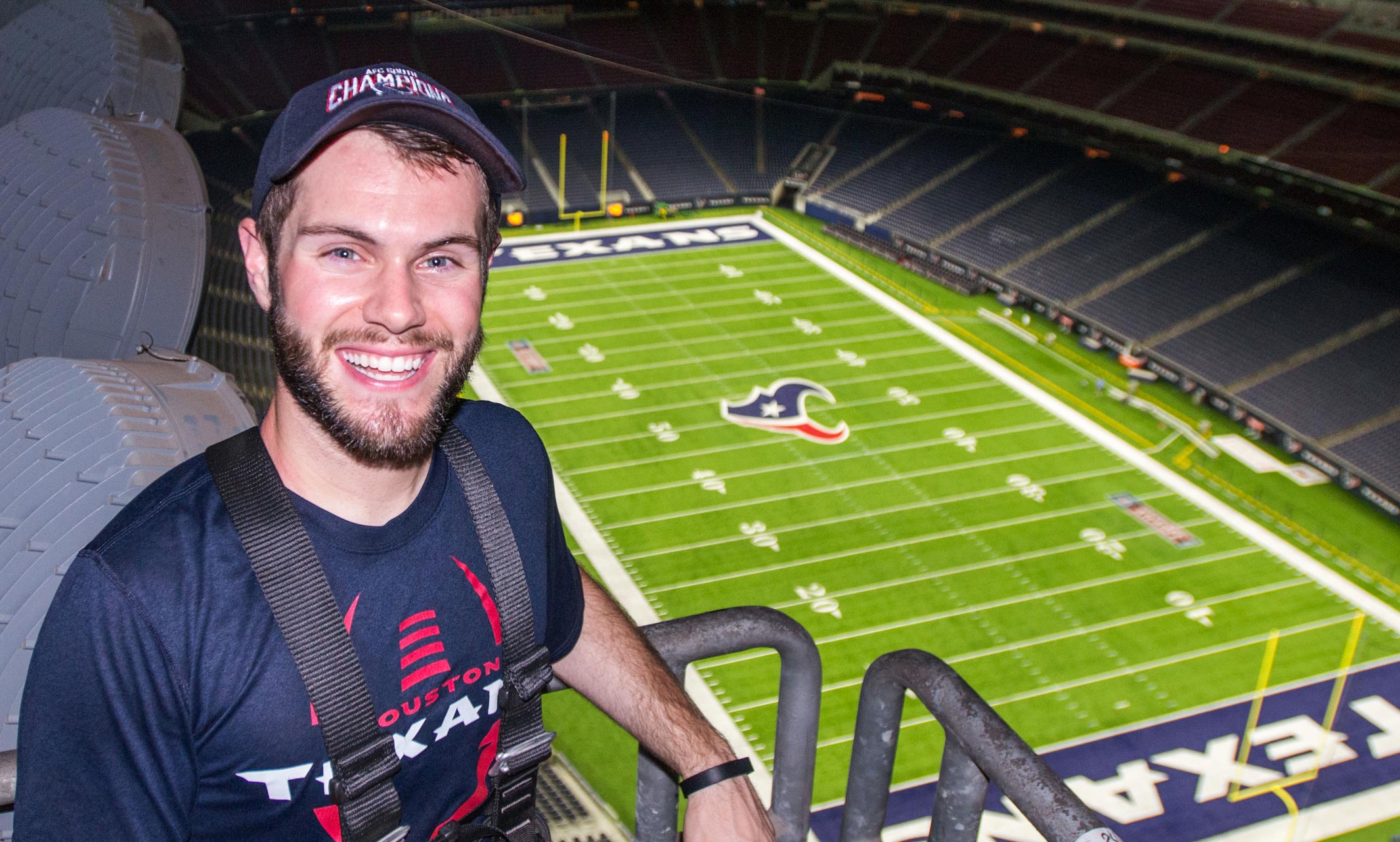
Alumnus shares his journey from benchwarmer to NFL mascot
Andrew Johnson (B.B.A. '13) shares about his first time meeting KC Wolf, his job as TORO for the Houston Texans and what it's like inside the suit.
Yours is not the typical journey from a bachelor's degree in marketing to a high-profile career. How did you end up there?
Johnson: My journey to become a professional mascot started when I was young. My parents were always pushing me to play sports, but most of my playing involved practical jokes and goofing around with my friends on the bench. I never would have imagined that my role as a benchwarmer would lead to a job in the National Football League.
When I was in the 5th grade, the mascot for the Kansas City Chiefs came to visit my school in Lee's Summit, Missouri, to host an assembly program. As we funneled into the gymnasium, KC Wolf was running around keeping us entertained with his googly eyes and 85" hips. Under the costume was Dan Meers, who has been the mascot for the Chiefs for almost 30 years. He began the presentation by talking about his cool job and all of the cool things he'd done, places he had been and people he had met. I thought that he had the coolest job in the world. At the end, he asked for a volunteer to try the costume on. I raised my hand and was selected as the student that got to wear the KC Wolf costume. It was at that moment that I was inspired. You can probably imagine the expression on my parents' face when I raced home from school that day and told them what I was going to do for the rest of my life.
Read more on umkcalumni.com.
Feb 19, 2019
School of Medicine professor's study cited in Healio
Christopher J. Harrison, MD, professor of pediatrics at the University of Missouri-Kansas City School of Medicine and director of the Infectious Disease Research Laboratory at Children’s Mercy, and colleagues wrote that in the last 50 years, the United States has seen fewer than 100 sporadic cases and periodic outbreaks caused by EV-D68. Read more.
Feb 16, 2019
College of Arts and Sciences selects Jeanne Drewes to receive Alumni Award
Jeanne Drewes (B.A. '76)Chief of Binding and Collections Care Division and Deacidification Program,Library of Congress
Each year, the UMKC Alumni Association recognizes the achievements of outstanding alumni with an awards celebration. In 2019, UMKC College of Arts and Sciences is honoring Jeanne Drewes (B.A. ’76) with their Alumni Achievement Award.
Drewes’ career spans four decades and includes roles at universities, libraries and museums. She currently serves as chief of the Binding and Collections Care Division and Deacidification Program at the Library of Congress in Washington, D.C. She spoke with us about her career path and travels to Cuba.
When you received your undergraduate degree from UMKC, did you already plan to pursue a career in libraries?
No, I wasn’t sure what I wanted to do, but I had worked at Linda Hall Library and got a job at the UMKC Library, so I understood how libraries worked. Having that experience led me to think about the master’s degree so that I could make a difference where I worked.
“In the United States, I wouldn’t be allowed to touch maps this old, and in Cuba I am helping to preserve them.”
You instituted a program for college students to assist with book preservation at the National Library of Cuba. Tell us about the program and what students accomplished during their time there.
During winter break, students from Johns Hopkins would go to Cuba and learn about Cuban culture and hear lectures at the University of Havana and at the Special Interest Section, which was run by the U.S. State Department before there was an embassy there.
The first project was rehousing slave registries held at the provincial archives in Matanzas, Cuba. The students wanted to help the country and felt good about helping to preserve history that was both Cuban and American. The second student project was putting old maps into new folders in the National Archives in Havana. I remember one student telling me how honored she was to be able to work on these old maps, saying, “In the United States, I wouldn’t be allowed to touch maps this old, and in Cuba I am helping to preserve them.”
How did UMKC contribute to your success?
Both the coursework, which I completely enjoyed because it made me think more deeply about what I was reading, and the work experience really helped me on my career path. Being part of the inventory of the library was a great experience and one I have continued to build on, most recently doing a survey of some three million volumes at the Library of Congress.
About the Alumni Awards
Drewes will be honored at the 2019 UMKC Alumni Awards on March 15. Proceeds from the event will support student scholarships. In the last decade, the Alumni Awards events have raised more than $1 million in scholarships and immediate aid for students.
Feb 14, 2019
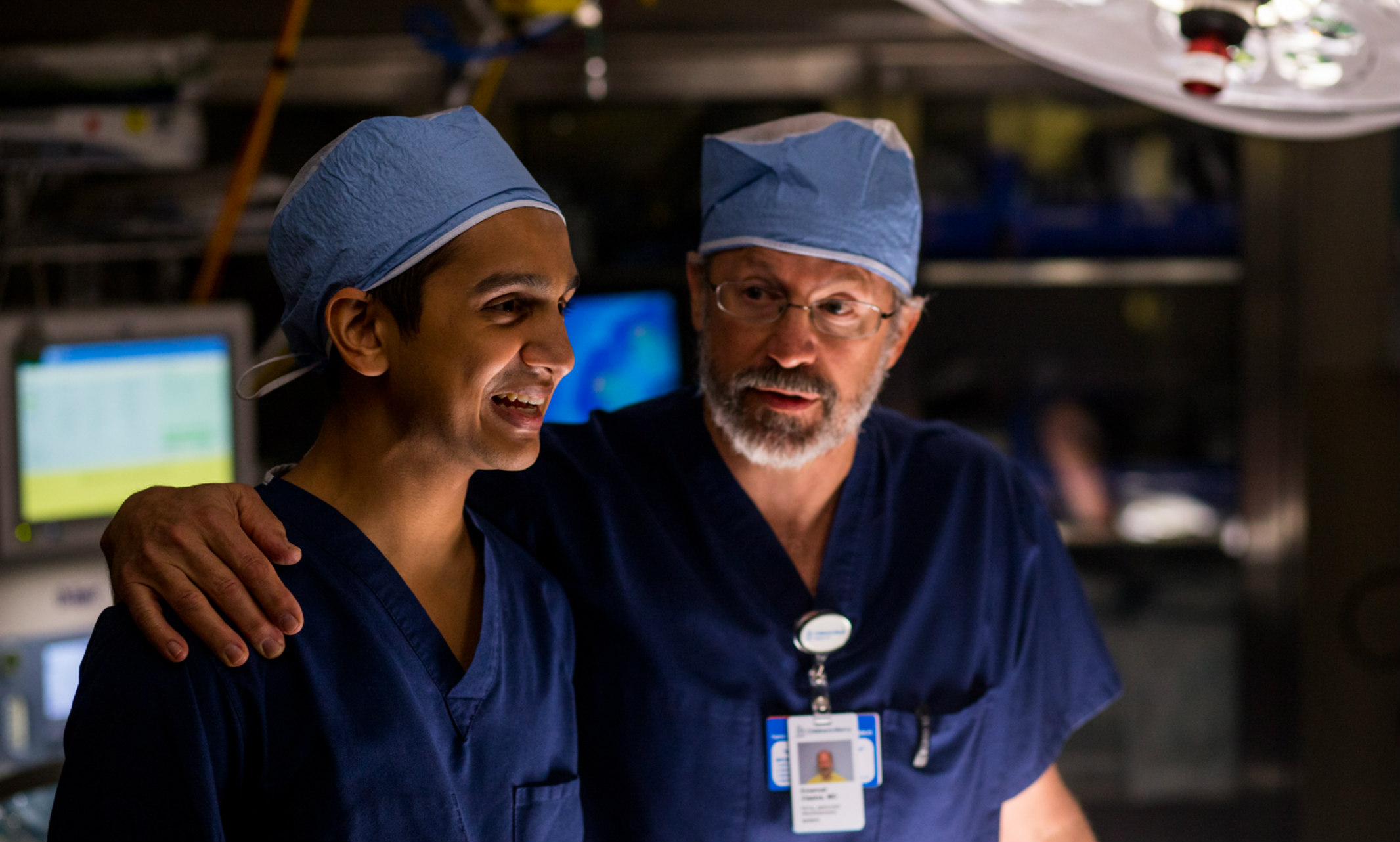
Dynamic duo in medicine is leading the way
The heart of UMKC is our campus community. With small class sizes, it’s easy to develop faculty-student mentorship teams. And these rich relationships—our Dynamic Duos—are some of our best success stories.
You might have heard about Emanuel (Mike) Vlastos, M.D., associate professor of obstetrics and gynecology at the UMKC School of Medicine, because he’s made news for performing life-changing surgeries — in the womb. For example, he has been able to lessen the defects of babies who have spina bifida (when the spinal cord isn’t covered with skin and bone) before they are born. When he came to Kansas City from St. Louis in 2017, he brought open-fetal surgery to Children’s Mercy, where he is director of fetal therapy. Akash Jani, a Chicago native who is a six-year-medical student expecting to graduate in 2020, sought out Vlastos for a rotation in fetal medicine and surgery.
How did this mentorship come to be? Some people go their whole lives without having a mentor.
Mike Vlastos: It was Akash’s impetus and push, which brought this to fruition. He has broken trails for the next student to tread. It has been a pleasure and a challenge. Let this continue!Akash Jani: I sent him an e-mail after hearing about the work that he was doing with fetal surgery and it all snowballed from there. All you have to do is find a faculty member or staff person who’s inspiring to you, does cool work, or is respected in their field, and just introduce yourself. My experiences have led me to apply to obstetrics and gynecology for my residency after I complete my M.D. I have never felt a more rewarding feeling than when the OB/GYN team hands a mom her newborn baby.
What has Dr. Vlastos taught you?
Jani: Dr. Vlastos has challenged me to not let any obstacles stop me — our potential is limitless. A lot of his work and surgeries were once thought to be crazy ideas with impossible outcomes, yet here he is doing them every week. This idea is also evident in his teaching; he does not let me get away with saying that something is not possible. Dr. Vlastos has inspired me to be a better physician. Einstein once said “If you can’t explain it simply, you don’t understand it well enough” and that is how Dr. Vlastos practices fetal surgery. He often uses the sleeve of his shirt to explain the amniotic sac to a patient or an ultrasound probe to explain the kidneys and he simplifies it so the patient can understand. He taught me that making sure you can communicate and teach is one of the most crucial jobs of being a physician.
"I admire Dr. Vlastos’ humility. He performs some of the most difficult, intricate surgeries in the country and saves families, mothers and babies who were never supposed to make it." Akash Jani
What changes have you seen in Akash?
Vlastos: Step up to the Tree of Knowledge and take a bite! So it is with Akash. He has taken the whole fruit of this rotation to chew on. From skin to seed, the nutrition has fed his learning and, furthermore, it is now part of him. Looking forward to see what will happen next!Jani: Before working with Dr. Vlastos, I always thought that life’s paths were linear and you just go from one stage to another. Through teaching me fetal surgery and sharing the journey of how he got to Kansas City, I’ve learned that it is okay to go through life in unconventional ways, take breaks, and try new things out. There is plenty of time to do what you want to do. This means a lot when I’m finding it hard to put things into perspective. I admire Dr. Vlastos’ humility. He performs some of the most difficult, intricate surgeries in the country and saves families, mothers and babies who were never supposed to make it. I have never seen him brag about his expertise, be arrogant or disrespectful to someone on his staff. Whenever patients thank him for saving their babies, he simply smiles and says, “It’s the team! We all did it!”
Feb 14, 2019
School of Biological Sciences selects Patrick Rose to receive Alumni Award
Patrick M. Rose (B.S. '73, M.S. '75)Executive Director, Save the Manatees Club
Each year, the UMKC Alumni Association recognizes the achievements of outstanding alumni with an awards celebration. In 2019, UMKC School of Biological Sciences is honoring Patrick M. Rose (B.S. ’73, M.S. ’75) with their Alumni Achievement Award.
Considered one of the world’s leading experts on the Florida manatee, Rose, executive director of the Save the Manatee Club, has tirelessly advocated for their health and habitat for more than 40 years. He spoke with us recently about his pivotal roles in protecting the species.
When did you decide to focus on manatees?
I decided to focus on manatees in my later teens when I learned to SCUBA dive and build underwater camera housings. It only took seeing manatees underwater one time to be moved by the disfiguring scars and cuts from propeller strikes. I felt empathetic and wanted to do something to protect them, since there were no protections for them from speeding boats at that time in the late 1960s.
Tell us about your roles before joining the Save the Manatee Club.
The U.S. Marine Mammal Commission provided the U.S. Fish and Wildlife Service with a grant to hire me as the first federal manatee recovery activities coordinator. My primary responsibilities centered on writing and facilitating the implementation of the first comprehensive and annotated manatee plan that later became the model for future manatee recovery plans. The plan detailed what would be required to recover manatees as a population and to identify required staffing and funding.
Upon completing that three-year assignment, the U.S. Fish and Wildlife Service provided funding to the Florida Department of Natural Resources to hire me as the state’s first manatee coordinator, a lone position tasked with building the state protection programs from scratch.
I later served as the administrator of the newly created Office of Protected Species for the Department of Environmental Protection. I was fortunate enough to shepherd the expansion of the programs to include dozens of other scientists and managers and was able to implement comprehensive manatee protection and recovery programs with an emphasis on aquatic ecosystem protection. I should point out that many of the programs we implemented were unprecedented in scope.
What is a typical day like for you as executive director of the Save the Manatee Club?
I must balance our scientific, educational, outreach, advocacy, legal and fundraising responsibilities while defending the organization from those who see our existence as a threat to speed boating or as an impediment to developing unsustainable developments within important aquatic habitats and seagrass communities.
What advice do you have for students who’d like to follow in your footsteps?
Be willing to volunteer to follow your passion. This is especially true when you are first starting out as it gives you a chance to prove your worth.
About the Alumni Awards
Rose will be honored at the 2019 UMKC Alumni Awards on March 15. Proceeds from the event will support student scholarships. In the last decade, the Alumni Awards events have raised more than $1 million in scholarships and immediate aid for students.
Feb 11, 2019
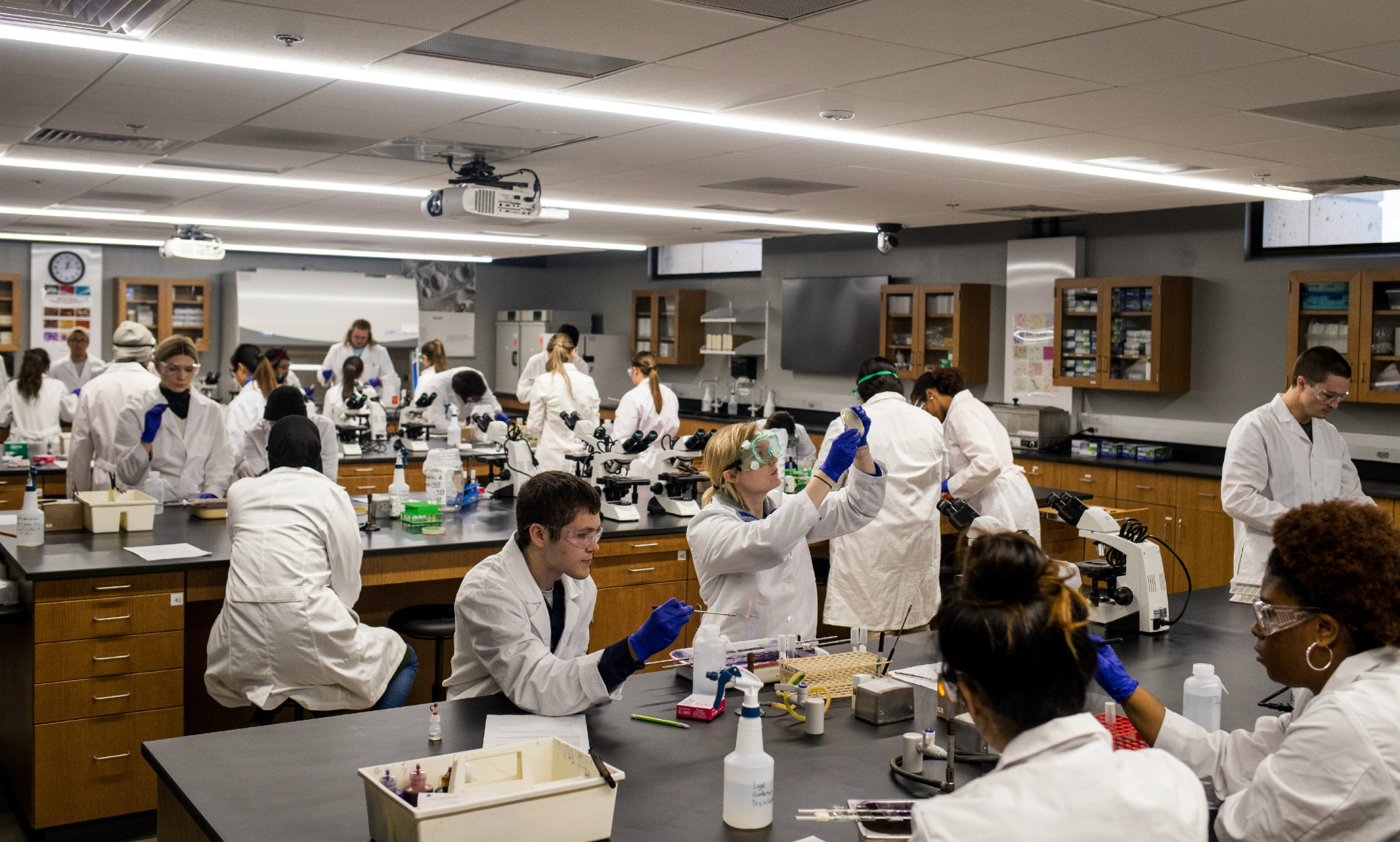
The revamped Master of Arts in biology gives students chance to enhance portfolio
Students who have discovered their focus later or hit some academic bumps in their careers have a new opportunity to enhance their experiences, grade point averages and approach to advanced medical degrees through a reconceived three-semester master of arts in biology.
Prospective students will have recently completed their bachelor’s degree and are interested in pursuing medical, dental, nursing, pharmacy or veterinary school.
“We are offering an opportunity for students who may have had a rocky semester that affected their GPA — or have been challenged by the MCAT or DAT — to continue their course work while they are retaking tests or submitting applications,” said Karen Bame, graduate programs officer and director of the MA Biology program.
While UMKC has offered a Master of Arts biology degree in the past, the coursework was different. Now students will be in the same classroom as professional students rather than with Ph.D. students who are more research focused. This first year the department will accept 5-10 students; in the future there will be room for 30 or more.
“This first year we will be highly selective,” Bame said. “We are interested in having the strongest students with acceptance similar to that of a doctoral program.”
“We are offering an opportunity for students who may have had a rocky semester that affected their GPA — or have been challenged by the MCAT or DAT — to continue their course work while they are retaking tests or submitting applications.”-Karen Bame
The program is designed for students like Marriam Hassan who want to recalibrate their educational path.
“I was a late bloomer, but my senior year I began to excel in my science courses. I needed a program to take those new skills and perfect them. Dr. Bame mentioned the new MA biology degree, but I couldn’t wait,” said Hassan, who is now pursuing a master of science in cellular and molecular biology.
“Some students are late bloomers and sometimes students face personal challenges that can affect their success for a semester or a year,” said Margaret Kincaid, associate professor, who will assist Bame on administration and getting feedback from students on the structure of the program.
Kincaid enjoys working with students on this sometimes indirect path.
"They are very introspective and receptive to feedback on how to improve their academic performance and applications to professional programs," Kincaid said. "This degree provides them a path that will demonstrate they are up to the challenge of rigorous coursework, while also being very economical compared to other options.”
Hassan agrees.
“There are so many students out there like me who thought about giving up, but that one chance was all they needed to get back up and start fighting for their dream again,” Hassan said. “I thought medical school seemed impossible, but I have the opportunity to achieve my dream again. I hope this new program will give other students the same chance.”
More about the Master of Arts in Biology
Questions about the new MA Biology program, or how to apply can be directed to Karen Bame, (bamek@umkc.edu). The deadline for application is April 1, 2019.
Feb 08, 2019
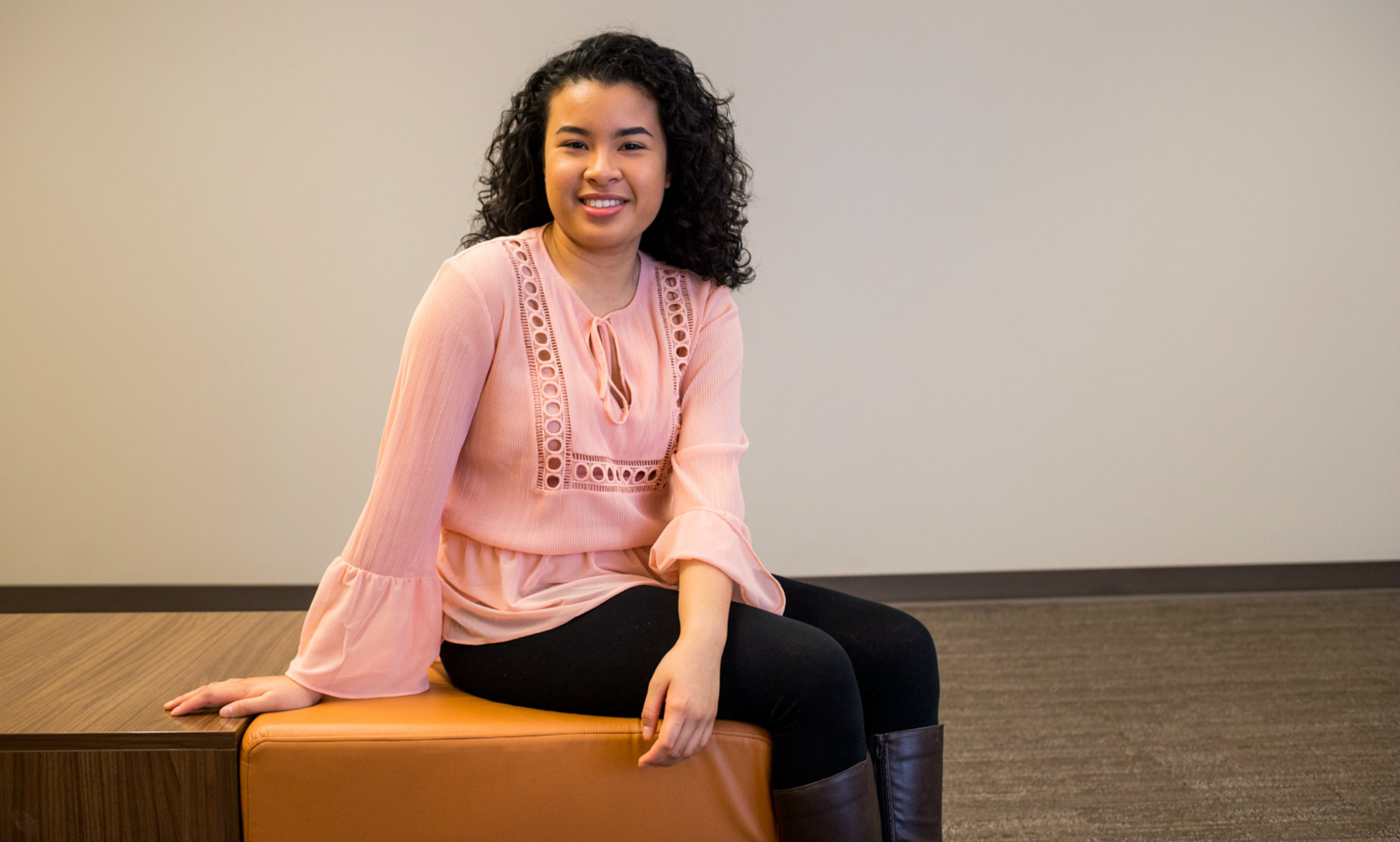
Dominique Paje's UMKC experiences are leading to her dream career in healthcare
Our ongoing story starts with people from around the world, converging here at UMKC. Get to know our people and you’ll know what UMKC is all about.
Dominique PajeAnticipated graduation date: 2020 Hometown: Joplin, Missouri; immigrated from the PhilippinesAcademic program: Chemistry and Psychology, College of Arts and Sciences
Why did you choose your field of study?
I’ve always known I wanted to work in health care so I chose chemistry as a pre-professional degree, but I also love the field of psychology. It’s fascinating to learn how and why people think the way they do, what their motivations are and the theories behind it.
What have you learned since entering college?
Because I have majors in both STEM and the arts, my education has been very well rounded. As a result, I not only have gained numerous worldly perspectives, but I’ve also been surrounded by a diverse group of people and interests throughout my time in undergrad. I’ve had several awe-inspiring faculty mentors, and from them I’ve learned that there isn’t one cookie-cutter way towards making the world a better place, but it’s each individual’s determination to do so.
What internships or professional experiences have you had while at UMKC?
Over the summer, I was selected to participate in the Bluford Healthcare Leadership Institute. It’s a two-week career development program for ethnic minority students. Through this opportunity, I was exposed to the ever-growing disparities in health as well as the complexities of health-care policy and administration. I absolutely loved every moment of my internship. It opened my eyes to so many different opportunities to make an impact in people’s lives through leadership in health care.
I’ve also been selected as one of two legislative interns who will represent the UM system students next spring to our state legislators in Jefferson City. I’ve always loved reading and analyzing policy, healthcare or otherwise, and I’m excited to finally be able to take part in it.
"I absolutely loved every moment of my internship. It opened my eyes to so many different opportunities to make an impact in people’s lives through leadership in health care."
What are your lifelong goals?
No matter what I do, I want to be in health care. I’ve always wanted to be in health care. Eventually run a hospital, preferably in underserved areas because that’s where help is needed most. It’s a goal that has kept me focused. And if I had to pick a motto that guides me, it would have to be one of my favorite quotes from Meryl Streep: “Put blinders onto those things that conspire to hold you back, especially the ones in your own head.”
Feb 08, 2019
A points program rewards Birthright alumni for ‘doing Jewish’ once back home
Alexa Summers, 20, a junior and computer science major at the University of Missouri-Kansas City, earned points for signing up for a Top Israel Internship next summer, hosting Shabbat dinners and volunteering as a computer support technician for Jewish Family Service of Greater Kansas City. Read the Jewish Telegraphic Agency article.
Feb 07, 2019
Bloch School selects George Guastello II to receive Alumni Award
George M. Guastello II(B.B.A. '82, MBA '84)President and CEO, Union Station
Each year, the UMKC Alumni Association recognizes the achievements of outstanding alumni with an awards celebration. In 2019, UMKC Henry W. Bloch School of Management is honoring George M. Guastello II (B.B.A. ’82, MBA ’84) with their Alumni Achievement Award.
Guastello has used his extensive civic and business leadership experience to help lead the transformation of beloved Kansas City institutions including the Starlight Theatre, the American Royal Association and, most recently, Union Station. Since becoming president and CEO of Union Station in 2008, Guastello has attracted new tenants, hosted world-renowned exhibits and created an internationally awarded science center in Science City. He spoke with us about his passion for the Kansas City community.
Why is the challenge of breathing new life into organizations so intriguing to you?
I love the challenge and sense of responsibility to our community. So many memories have been and are created at these historic places. It is our duty to preserve and keep vibrant these important threads of our collective community.
You’re on the Board of Directors for the KC Streetcar Authority. How has having the streetcar up and running affected visitors and traffic at Union Station?
Union Station has always been a hub of transportation, so the streetcar has been a real win for us and the entire community. It drives tourism. It’s a legitimate commuter solution. And it has served to spur even more growth along and around the line. When the streetcar expands and connects to UMKC, a direct downtown and student/educational link will be in place, fostering even more growth and opportunity.
What else is planned for Union Station?
Our latest undertaking is our Early Learning Initiative for Science City. It includes the 13,000-square-foot reimagined early learning experience designed for the entire community. It will shape future generations in a profound way.
How did UMKC contribute to your success?
UMKC instilled in me an appreciation and passion for entrepreneurship. My professors challenged me to think outside the box and I was able to put into practice what I learned.
About the Alumni Awards
Guastello will be honored at the 2019 UMKC Alumni Awards on March 15. Proceeds from the event will support student scholarships. In the last decade, the Alumni Awards events have raised more than $1 million in scholarships and immediate aid for students.
Feb 06, 2019
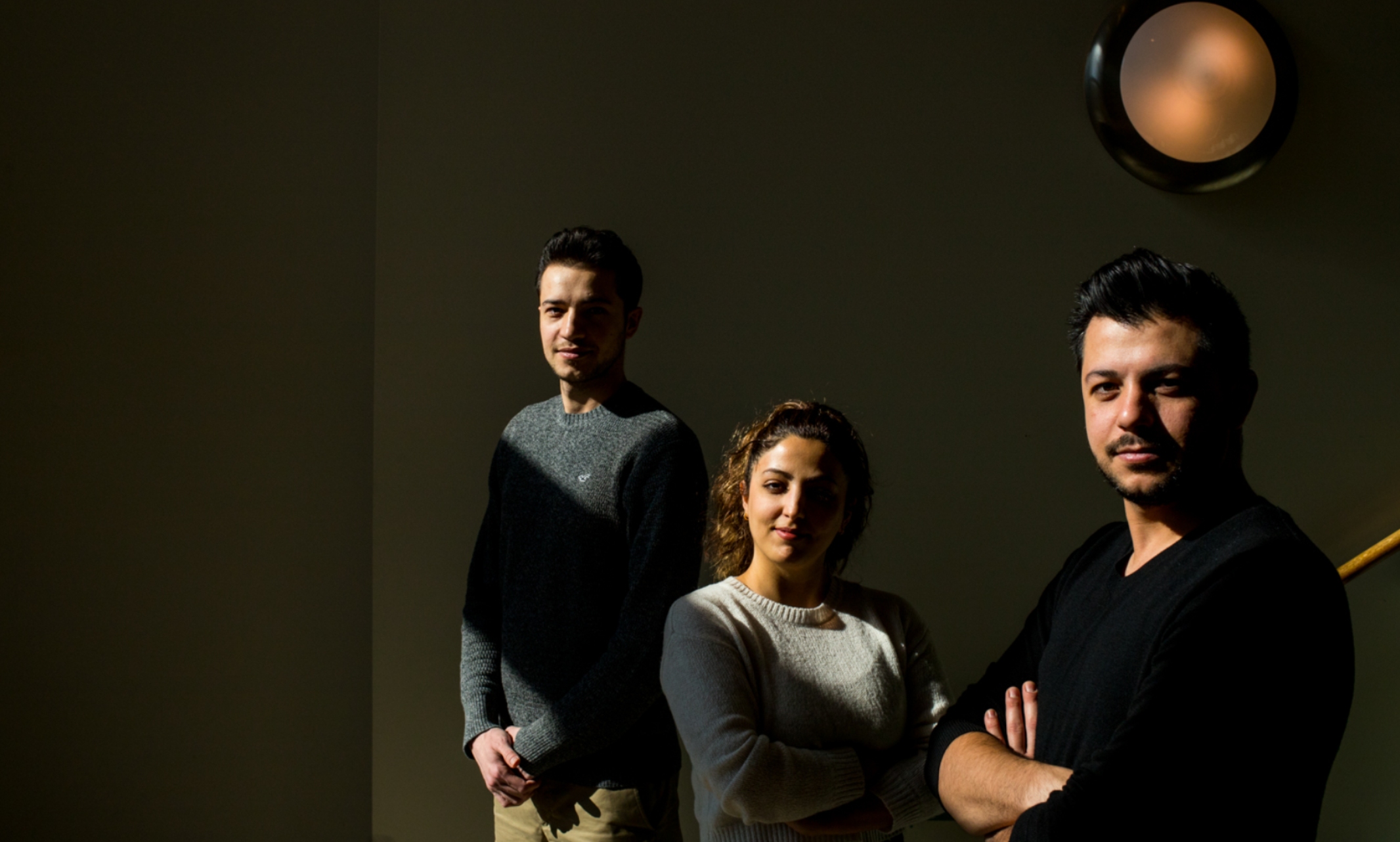
Team wins first place in Regnier Venture Creation Challenge competition
“Professor Lee is writing an equation on the whiteboard. Sigma equals …”
“Room 308 is six steps ahead on your left.”
“Saria Goudarzvand just sat in the chair to your right.”
“Intersection 12 steps ahead. Traffic light for your direction is currently red. Vehicle moving through from right to left on cross street.”
Imagine being blind. Now, imagine having this kind of information being piped into an earpiece whenever you need it. World-changing, perhaps?
Gharib Gharibi hopes so. He is a Ph.D. candidate in the School of Computing and Engineering at the University of Missouri-Kansas City. Inspired by a blind high school friend in Saudi Arabia, he came to UMKC to pursue a degree – and a way to use cutting-edge technology to bring a new kind of sensory perception to the visually impaired.
Gharib and his partners are imaging possibilities for the prototype.
His prototype is a camera that mounts to eyeglasses and connects via Bluetooth to a highly capable smartphone app. The app combines technologies for facial recognition, color and written-character recognition with an enhanced-GPS feature that combines existing maps with real-time visual inputs. The device uses “deep-learning” technology to retain information about environments visited regularly and use it to develop more detailed reports to the user.
The app recognizes when it is in a classroom setting and focuses the camera on inputs such as a display screen or writing on a whiteboard. Outdoors, the app focuses the camera on critical inputs such as traffic lights, vehicles and obstructions. Users can activate specialized programs such as a “shopping mode” that will seek out specific items, read price tags and labels, and even tap into online product reviews.
It’s called DeepLens. Gharibi's partners in the DeepLens team are also Ph.D. students: his brother, Mohamed Gharibi; and Saria Goudarzvand. The team expects to have a fully capable prototype completed by March, and they estimate they are about a year away from going to market.
“Intersection 12 steps ahead. Traffic light for your direction is currently red. Vehicle moving through from right to left on cross street.”
The team won $20,000 in May from the UMKC Bloch School Regnier Venture Creation Challenge Competition, which provides real-world exposure, feedback and financial support to startup companies. DeepLens won the competition's BlueKC Healthcare Innovation track, which celebrates innovation and community impact in healthcare.
The team also won a slot among 10 UMKC student finalists competing for spots in the University of Missouri System Entrepreneur Quest (EQ) Student Accelerator. The EQ Student Accelerator is backed by a $250,000 investment from the UM System and includes an eight-week educational program, mentorship opportunities, pitch competitions and significant financial support for finalists from each of the system’s four universities.
“The EQ accelerator program sharpened our ambition,” Gharibi said. “The competition challenged and inspired us to accelerate our research into the implementation phase. Thanks to the EQ accelerator and E-Scholars programs, we’ll get to market faster and start to help people sooner.”
Ten semifinalists per university have been selected for the educational program, which began in January on each campus. Students will receive dedicated workspace and mentorship from a selection of executives, industry leaders, investors and subject-matter experts. The individual courses will conclude with demo days and the selection of three finalists at each campus, who will receive $15,000 for first place, $10,000 for second and $5,000 for third.
The finalists from each campus will meet at the Entrepreneurial Educators Summit in April and compete for another chance at $15,000, $10,000 or $5,000.
UMKC received 35 applications to participate in the first round of the EQ program. Individuals and teams applying included 22 undergraduate students and 19 graduate students. Disciplines represented by these students included biological sciences, computer science, electrical and computer engineering, business administration, music, accounting, chemistry, geography, economics, psychology and medicine.
Applications included ideas for fashion, wellness, renewable energy, AI-assisted health, healthcare software, sports tech, AI-assisted market intelligence, cloud infrastructure, mobile phone accessories, mobile applications and more.
The 10 EQ finalists for UMKC are:
Bride to Bee – automated wedding planning
Crannium Labs – oral cancer detection and prevention using AI
DeepLens
Egara Sensors – home gardening smart sensor platform
Family Partners Support – services to help families remain intact
Landlocked Opera – providing young operatic professionals and students the opportunity to gain live music experience
League Builders – fantasy sports platform
RawCompo – connecting restaurants with customers interested in composting
Subi – mobile application for pickup sports games
Tonderai – aviation safety mobile application
Feb 06, 2019
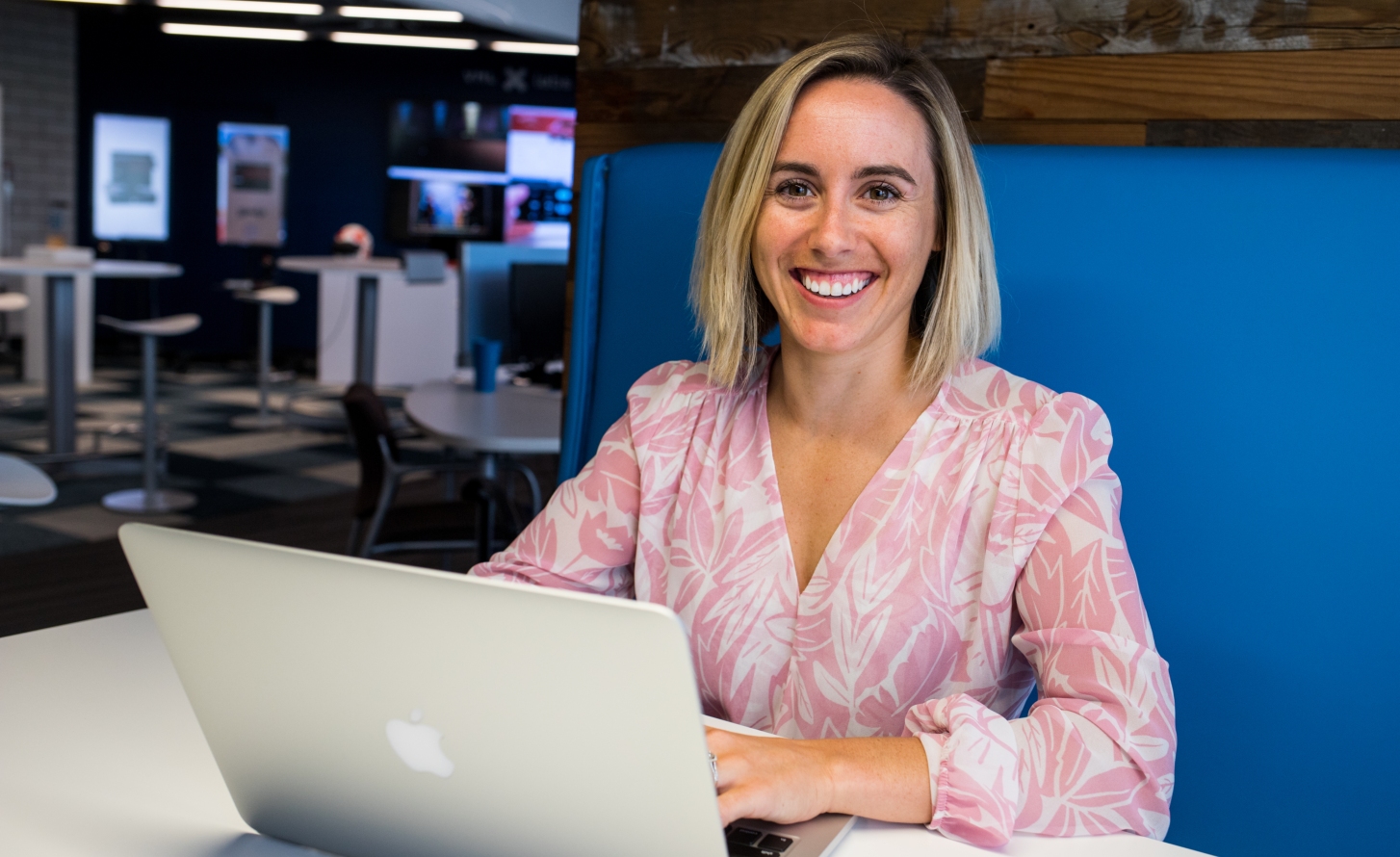
Alumna Micah Starr shares her UMKC experience
UMKC Grads are Everywhere.
Our students graduate with much more than a diploma. They leave UMKC with the practical knowledge, real-world experience and skills that help them land jobs they love.
Micah Starr ’15
UMKC Major: Urban Planning and DesignUMKC Athletics: Women's GolfCurrent job: Account Manager
What did you most appreciate about UMKC?
I believe what you hold onto illustrates what you value most. Today, I am still in contact with my coaches, professors, teammates and friends at UMKC.
Favorite thing to do while you were a college student?
My favorite thing to do was go to the top of the Student Union and lay out overlooking campus, the Nelson Atkins, and the Plaza.
If you had an internship during college, how did it help prepare you for your first job?
During my college career, I had two internships — one with an architecture firm in Northwest Arkansas and one with an engineering firm in Kansas City. These two internships were instrumental in my career as they taught me about the real-world application of what I was learning in school and propelled me into the job I received after graduation.
“Have an open mind. Get as many internships as you can — even be open to internships in slightly different fields than your exact degree.”
Best career advice you’ve received?
I heard this a lot but it’s absolutely true — it’s not what you know but who you know. So always put your best self forward in every situation no matter what.
What advice do you have for students entering your field/profession?
Have an open mind. Get as many internships as you can — even be open to internships in slightly different fields than your exact degree. Know that someone is always watching. Remember the beginning of anything is always the hardest, so just keep going!
Feb 06, 2019
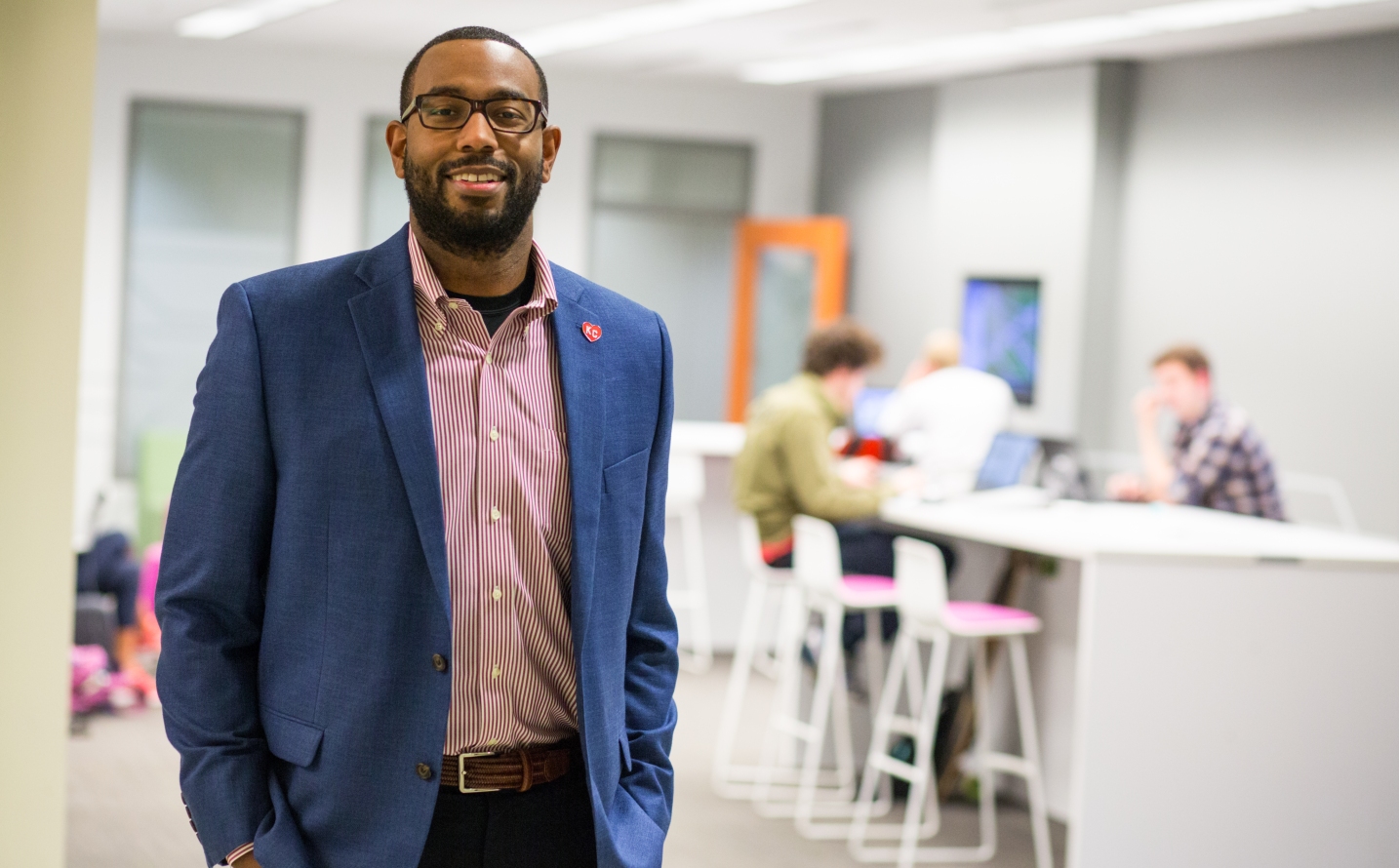
Alumnus DeJ'on Slaughter shares the impact of relationships and volunteer service
UMKC Grads are Everywhere.
Our students graduate with much more than a diploma. They leave UMKC with the practical knowledge, real-world experience and skills that help them land jobs they love.
DeJ’on Slaughter ’13
UMKC Major: Civil EngineeringCurrent job: Development Associate
What did you most appreciate about UMKC?
There are many reasons, but the most compelling would have to be the friendships and bonds with my fellow classmates, professors and faculty. I am proud to say that I am still very connected with many of these people. I also appreciated the ability to transform my relationships with professors and staff into mentoring opportunities, which has helped me to grow professionally throughout my career. The challenge, learning opportunities and support didn’t end when I received my diploma.
Favorite thing to do while you were a college student?
By far, my favorite time on campus was spent as chapter president of the National Society of Black Engineers. We spent countless hours serving our community. We introduced local K-12 minority students to life-changing career opportunities in engineering. In a majority of minority communities, engineering is a foreign concept with little to no mentors to look up to. Our team worked diligently to impact as many students as possible to ultimately change the narrative in our community.
If you had an internship during college, how did it help prepare you for your first job?
My internship experience was a “game-changer” in my life. The exposure to the professional environment forced me to grow both personally and professionally.
“The challenge, learning opportunities and support didn’t end when I received my diploma.”
Best career advice you’ve received?
Learn from your mistakes and always embrace adversity.
What advice do you have for students entering your field/profession?
Don’t be afraid to think entrepreneurially. Introduce new ideas and always find ways to improve your professional pathway. You’ll get noticed and your personal stock will rise as a leader in this industry.
Feb 06, 2019
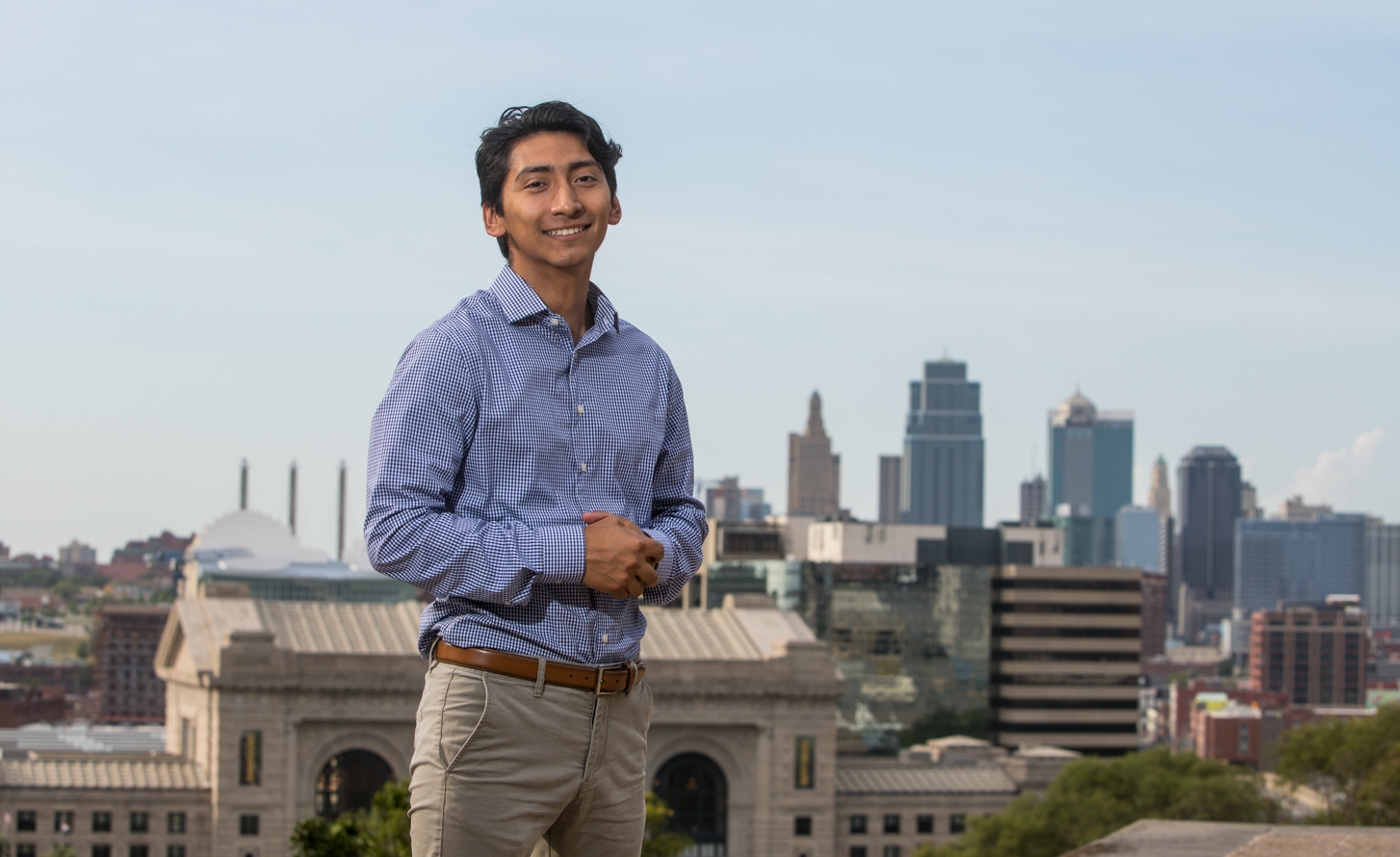
Alumnus Luigi Cruz shares how his UMKC connections jump-started his career
UMKC Grads are Everywhere.
Our students graduate with much more than a diploma. They leave UMKC with the practical knowledge, real-world experience and skills that help them land jobs they love.
Luigi Cruz ’17
UMKC Major: Business AdministrationCurrent job: Marketing Assistant
What did you most appreciate about UMKC?
I most appreciated the opportunities to get involved in student organizations that interested me. Joining a student organization was fantastic because I got to learn new things and meet new people.
Favorite thing to do while you were a college student?
One of my favorite things to do was to sit around the Bloch School and have conversation with friends. Outside of school, I really enjoyed walks through downtown and checking out new places there.
How did an internship help prepare you for your first job?
Internships exposed me to how organizations work and they gave me the experience and confidence needed to hit the ground running when I got my first job.
“Get involved in student organizations that are in line with your career.”
Best career advice you've received?
Be authentic. In a world where everyone shows their highlight reels on social networks and presents an edited version of who they are, authenticity is a breath of fresh air.
What advice do you have for students entering your field?
Get involved in student organizations that are in line with your career. By being engaged in these, you will get experience for internships. Through the internships, you will earn experience you need to land your first job. Once you enter the field, learn the inner workings of your organization you work and get to know the people. At the same time, master the tasks that are assigned to you and learn to increase your value.
Feb 06, 2019
Jacie Hoyt, UMKC women’s basketball head coach, was a guest on KCUR
Kansas City this weekend will host the nation's largest luncheon celebrating National Girls and Women in Sports Day. To mark the occassion, we spoke with two people who are helping elevate female athletes locally and nationally. We explored just how far women have come in sports — not just as competitors, but as coaches, officials and owners. We also discussed how many firsts are still left to achieve. Listen to the interview on "Up To Date."
Feb 06, 2019
Lara Kujtan, M.D., of the UMKC School of Medicine, talked about frontline therapy for patients
The topic centered on EGFR-positive non–small cell lung cancer (NSCLC). Learn more on OncLive.
Feb 06, 2019
Tony Dumas' impact on UMKC Men's Basketball
Dumas dunks over his opponent.
UMKC Athletics is proud to announce a four-part series celebrating African American History during the month of February. Each individual featured is a key member of Roo athletic history and impacting the University in a lasting and positive manner. The first part in this series features men’s basketball alum Tony Dumas (1990 – 94).
Former NBA first-round draft pick and the second all-time leading scorer in UMKC history, Tony Dumas, made his mark as a Roo in the early 1990s and continued to add to his reputation after his time in Kansas City came to an end.
Read more on umkckangaroos.com.
Feb 05, 2019
Honors to be bestowed Feb. 23 at The Big Event
Six outstanding individuals and one organization will be recognized for their professional achievements and dedication to the law school and the legal profession by the University of Missouri-Kansas City School of Law at the school’s annual Big Event on Feb. 23, 2019.
“Each year the Law Alumni Association and Law Foundation are pleased to honor exceptional accomplishments and achievements of our alumni and friends,” said Ashley Atwell-Soler (’08), President of the UMKC Law Alumni Association. The Law Alumni Association and Law Foundation sponsor and organize the event that raises money for student scholarships. The honorees will be presented at the dinner by Atwell-Soler, Foundation President Scott Bethune (’88), and Dean Barbara Glesner Fines.
The Decade Award
This award will be presented to Abraham Kuhl (’08), a Partner at Young Jakobe & Kuhl LLC. In his ten years of practice, Kuhl has made outstanding contributions to the legal profession as a respected member of the family law bar in Eastern Jackson County and the state of Missouri. He is an adjunct professor at UMKC Law School and serves on the Law Alumni Association Board. He serves as Chairman of the KCMBA Domestic Relations committee, President of the KCMBA Family Law Section and on the board of the Kansas City Metropolitan Bar Foundation. He provides pro bono legal services to victims of domestic violence through the Volunteer Attorney Project and provides pro bono legal services to our military veterans through the Military Matters program.
The Pat Kelly Service Award
This award will be presented to M. Blake Heath (’09), owner of M. Blake Heath, Trial Attorney, LLC. He focuses his practice on helping clients in complex personal injury suits, product liability claims, medical malpractice lawsuits, and insurance coverage disputes. Heath started giving back to UMKC School of Law immediately after graduation, serving on the Pat Kelly Poker Tournament Committee in 2010, and has served as chair of the committee since 2013. He also serves on the Law Alumni Association Board and the Bob Downs Golf Tournament Committee. Heath has taught continuing legal education seminars through the UMKC School of Law, and has supported the school financially as a consistent donor to the Law Foundation and events held for the law school.
“Each year the Law Alumni Association and Law Foundation are pleased to honor exceptional accomplishments and achievements of our alumni and friends,” said -Ashley Atwell-Soler (’08), President of the UMKC Law Alumni Association.
The Pro Bono/Public Service Award
This award will be presented to the Hon. Karen L. Krauser (’02), who serves as a Circuit Judge for the 7th Judicial Circuit Court. Judge Krauser has dedicated her career to public service. She began as an assistant prosecuting attorney with the Clay County Prosecutor’s Office, eventually working her way to the role of Deputy Chief. She has worked to improve the quality of our justice system and the overall betterment of the legal profession thorough her appointed positions and dedicated efforts on multiple committees and sub committees. She also generously devotes her time, energy and resources to many professional and charitable organizations.
The Lifetime Achievement Award
This award will be presented to Fred L. Slough (’74). Slough’s first trial experience was as a criminal defense lawyer, often appointed, with little or no pay. He continued to practice criminal defense until he moved over to plaintiff's side personal injury, civil rights and discrimination cases. He is now a solo practitioner and is also a mediator. Slough is a member of the Missouri Bar, the Missouri Association of Trial Attorneys, the National Employment Lawyers Association – Kansas City, the National Lawyers Guild, the Kansas City Metropolitan Bar Association and the Missouri Association Against the Death Penalty.
The Philanthropy Award
This award will be presented to the Kansas City Estate Planning Symposium. KCEPS has been associated with the UMKC School of Law since 1981. Since then, the UMKC Continuing Legal Education program has provided services to this organization and continues to present three seminars that attract more than 1,000 professionals each year. Additionally, to encourage law students to consider the field of estate planning as a career, the KCEPS Prize was established in 1999. It is annually awarded to students who write an exemplary paper on an estate planning or taxation problem, or who distinguish themselves during an internship in a law firm that specializes in estate planning. In 2017, KCEPS established the Myron Sildon Endowed Scholarship that is awarded to 3L or LLM taxation students. The scholarship honors the legacy of Myron Sildon, the founder of the organization. KCEPS has not only made significant financial commitment to the UMKC School of Law, but also has helped expand the reputation of the law school to the estate planning community and beyond
The President’s Award
This award will be presented to the Hon. Lajuana Counts (‘88) and to James R. “J.R.” Hobbs (’81). Hobbs is a shareholder at Wyrsch Hobbs & Mirakian, P.C. He has an active practice in the areas of white-collar criminal defense, criminal defense, and commercial litigation, representing individuals and businesses. He is a past president of the Law Foundation and continues to serve as an adjunct professor at UMKC School of Law. He is a Fellow of the American College of Trial Lawyers, Fellow of the International Academy of Trial Lawyers, Fellow of the American Board of Criminal Lawyers, a Fellow in the International Society of Barristers, and a member of the American Board of Trial Advocates. Hobbs has served on the Missouri Appellate Judicial Commission and is currently a member of the Missouri Supreme Court Commission on Race and Ethnic Fairness. He is a past recipient of the Lon O. Hocker Memorial Trial Lawyer Award bestowed by the Missouri Bar Foundation and recipient of the Dean of the Trial Bar, awarded by the Kansas City Metropolitan Bar Association
Counts is a magistrate judge in the U.S. District Court for the Western District of Missouri. She served as Assistant United States Attorney for the Western District for nearly thirty years. Her enthusiasm for service seems limitless. She is the immediate past president of the Law Foundation, and her continuing service to UMKC earned her the prestigious Bill French Award. She has served on the Jackson County Bar Association since it was founded and is a past president. The same story of service and leadership can be found through her involvement in the National Bar Association, the Association for Women Lawyers of Greater Kansas City, the UMKC Women’s Council, and the Lawyers Encouraging Academic Performance.
About the Event
The Big Event: A Night in Paris at the Hilton President Hotel is scheduled for Saturday, February 23 at 1329 Baltimore St., Kansas City. For more information and to purchase tickets online or contact Cary Powers at 816-235-6328.
About the UMKC School of Law
UMKC School of Law provides a comprehensive, affordable legal education comprised of a personalized admissions process, collaboration with supportive faculty, real-world opportunities in a vibrant city, and tools and skills to experience professional success. It is housed in a modern, technologically sophisticated building on a landscaped campus and enjoys strong community and alumni support.
About the UMKC School of Law Foundation and Alumni Association
The Law Foundation is in its 60th year of service to the UMKC School of Law. The Foundation raises money for scholarships and programs that will enhance legal education opportunities for students and elevate the reputation of the law school.
Feb 05, 2019
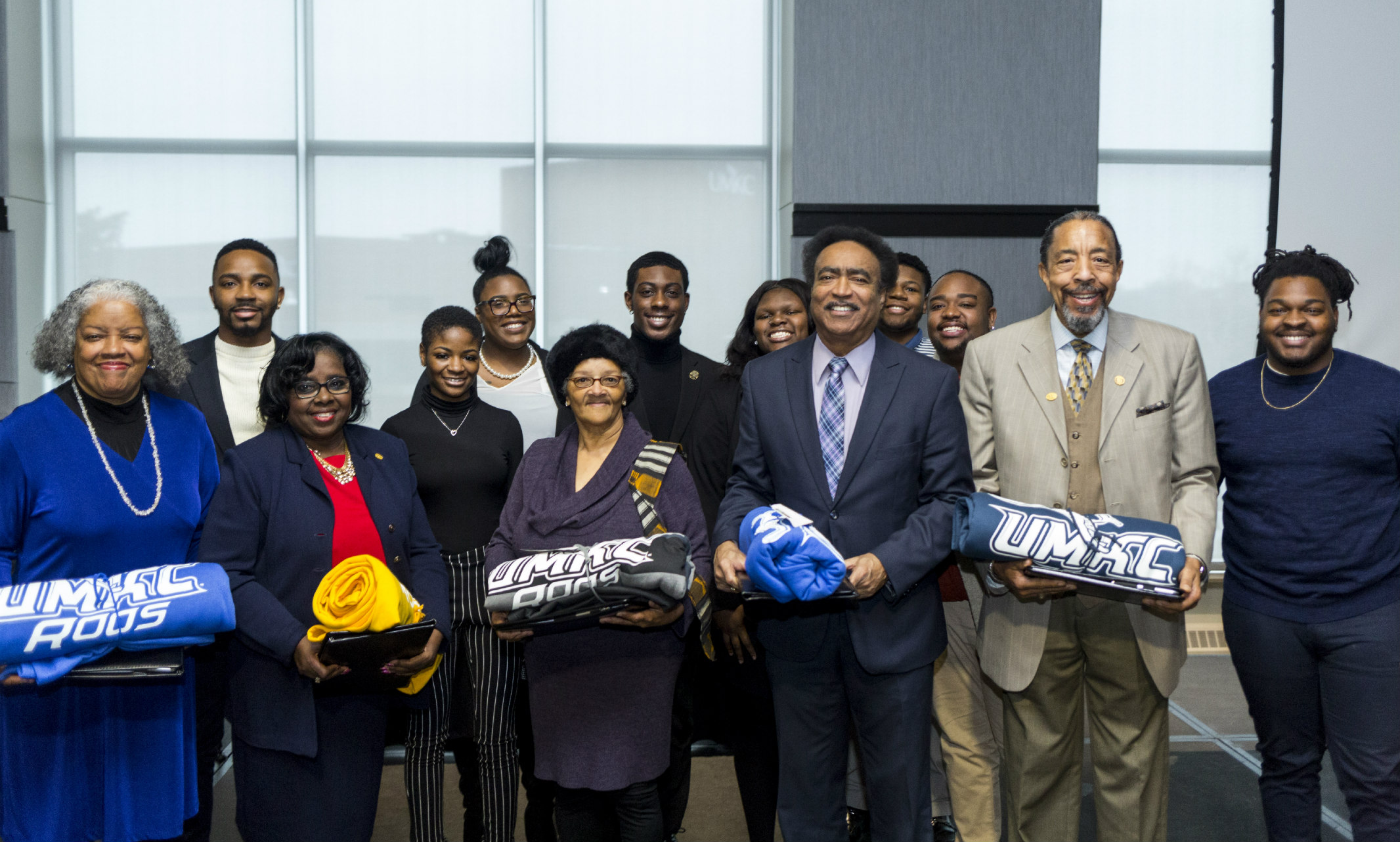
Freedom Breakfast celebrates 50th anniversary of The African American Student Union
The three keynote speakers at the 29th annual Freedom Breakfast may represent different generations, but they all share the experience of being a black student at UMKC who found life-changing meaning through The African American Student Union, commonly called TAASU.
Founded in 1969, a year after the assassination of Martin Luther King Jr., TAASU focuses on fostering a sense of community among African American students. Each of the speakers reflected on how TAASU made a difference in their life as a black student at UMKC.
“African American students reached out to each other on campus. There were not many of us on campus, so we were glad to see each other. Our group paved the way for minority students. It was during the Civil Rights movement, and we wanted to show support for one another because of what was going on in our nation during the time. Being with students like us gave us comfort and a sense of security and community.”
-Margaret Evans, Ph.D. (B.A.,’71, MPA, ’72), an early member of TAASU
“I met successful black men. I saw successful black women. And for me, the light just went on, and I thought we can be so much more. And being on campus and being exposed to that just lights your fire.”
-Michael Watson, attended UMKC in the 2000s, played basketball professionally
“My experience has mostly been shaped by other student leaders who have been molded by leaders from the staff and administration at UMKC. Leaders of all races and all backgrounds. Thanks to TAASU’s leaders, my time here has been nothing short of great.”
-Cameron Johnson, current president of TAASU and a junior majoring in biology with a minor in chemistry
Feb 05, 2019
UMKC remembers longtime friend Hugh Zimmer
The University of Missouri-Kansas City celebrates the impact of a longtime friend, generous donor and educational visionary, Hugh J. Zimmer (1930-2019).
Zimmer was the retired chairman of Zimmer Companies. His impact on Kansas City, and on UMKC, would be difficult to overestimate.
At UMKC, he was known as a tireless and ardent supporter of the School of Education and its efforts to address the needs of underserved children in our urban neighborhoods. His generosity has been instrumental over the years in building the school’s capacity to deliver on that mission, and he devoted his time and talent as well, serving as the chair of the Chancellor’s National Advisory Board for the school’s Institute for Urban Education. The school’s highest honor is the Hugh J. Zimmer Award for Excellence in Urban Education.
Hugh Zimmer talks to UMKC students at an event. Zimmer helped develop several new opportunities for UMKC students.
As a former chair of the UMKC Trustees, he was instrumental in the founding and development of the Trustees’ Scholars program, designed to retain the region’s best and brightest young people for education at UMKC, and then to build careers in Greater Kansas City. He also served many years as a member of the UMKC Foundation board. A highly successful real estate developer, he funded and led the creation of the Hugh Zimmer Equity Planning Internship Program in the UMKC Department of Architecture, Urban Planning + Design, in which students work with a local community-based organization.
In 2010, he was awarded the UMKC Chancellor’s Medal – the highest non-academic award the university offers to a volunteer. In 2014, the UMKC Trustees recognized Zimmer as the first recipient to follow Henry W. Bloch in receiving the Henry W. Bloch Trustee Excellence Award for his significant contributions and service to UMKC and the UMKC Trustees.
“A great many young people over the years have had opportunities to succeed, opportunities that would not have existed if not for Hugh Zimmer. I can imagine no greater legacy,” said Mauli Agrawal, UMKC chancellor. “I am both proud, and humbled, that Hugh chose to invest in this university as a vehicle to further his noble goals.”
Leo E. Morton, UMKC chancellor emeritus and chief operating officer at DeBruce Companies, said Zimmer was instrumental in placing Morton on the UMKC Board of Trustees, which led to Morton’s selection as chancellor, a post he held for nine years.
“People would joke that they would hesitate to pick up the phone if Hugh Zimmer was calling, because they knew that he would be asking you to volunteer for something,” Morton said. “But in fact, most people would pick it up on the first ring, because you knew he was trying to do great things for Kansas City and the people of Kansas City.
“He was like a second father to me, since I arrived in Kansas City 30 years ago. He got me involved in more things than I can count. It is clear that he was one of those people who really cares.”
“A great many young people over the years have had opportunities to succeed, opportunities that would not have existed if not for Hugh Zimmer. I can imagine no greater legacy.” UMKC Chancellor Mauli Agrawal
As a civic leader, Zimmer chaired the Kansas City Area Development Council, the Economic Development Corporation of Kansas City, the Convention and Visitors Bureau of Kansas City and the Hawthorn Foundation of Missouri. He served on the boards of directors and executive committees of the Greater Kansas City Area Chamber of Commerce, the Platte County Economic Development Council and the Lenexa Economic Development Council. In 2010, the Kansas City chapter of the Urban Land Institute presented him its Lifetime Achievement Award in recognition of his ongoing contributions to the built environment in the Kansas City region. In 2004, the UMKC Henry W. Bloch School of Management named him Regional Entrepreneur of the Year.
In an article observing his company’s 65th anniversary, Zimmer said his education-focused philanthropy was motivated by enlightened self-interest.
“Our business is to bring new businesses to Kansas City, and helping established Kansas City businesses to grow,” Zimmer said in the 2013 interview. “If we don’t have a well-trained workforce, the Zimmer Company won’t be around for another 65 years.”
Feb 04, 2019
School of Computing and Engineering selects Philip Straub to receive Alumni Award
Philip Straub (B.S.E.E. '92)Executive Vice President,Managing Director,Garmin International
Each year, the UMKC Alumni Association recognizes the achievements of outstanding alumni with an awards celebration. In 2019, UMKC School of Computing and Engineering is honoring Philip Straub (B.S.E.E. ’92) with their Alumni Achievement Award.
As executive vice president, managing director at Garmin International, Straub oversees all aspects of the company’s aviation division including product development, flight operations, sales and marketing. He spoke with us about his career at Garmin and enthusiasm for supporting STEM (science, technology, engineering and math) education.
You’ve been with Garmin for 25 years and held a variety of positions in engineering, product development and management. Which have been your favorite roles or projects?
There are many fulfilling experiences over the years, but I treasure the time in the mid to late 1990s when I was involved in a revolutionary new aviation radio development. We were a smaller company at that time and had to wear many hats. I would go from writing digital filters in optimized assembly code to flight testing that software in the afternoon. There was immense gratitude from having that much contribution and ownership in a product development.
Why is it important to you to promote STEM education?
Think about products and technology that have affected our lives for the positive. These products and technology are driven by the passion of innovation. This passion for innovation comes from people, and it comes from people that are educated in the areas of STEM.
What advice do you have for students who’d like to follow in your footsteps?
Be aware of your own strengths and weaknesses when asked to assume additional responsibility and then objectively work on your limitations to turn those into strengths.
About the Alumni Awards
Straub will be honored at the 2019 UMKC Alumni Awards on March 15. Proceeds from the event will support student scholarships. In the last decade, the Alumni Awards events have raised more than $1 million in scholarships and immediate aid for students.
Feb 04, 2019
UMKC professor interviewed on KCTV5
A long-shot idea from a Kansas City councilman to give up a home Chiefs game to St. Louis is once again, making waves.
It started when Councilman and Mayoral candidate Quinton Lucas tweeted the idea offhand in the fall.
But a recent interview with KCTV5’s sister station in St Louis suggests he may be serious now.
Brent Never, associate professor of public affairs at the Henry W. Bloch School of Management, was interviewed for his take.
Feb 04, 2019
UMKC vice chancellor for diversity and inclusion says workshops that explore white privilege have become popular
Workshops that explore topics of white privilege and white fragility have become more popular recently, said Susan B. Wilson, vice chancellor for diversity and inclusion at the University of Missouri-Kansas City. Read the rest of the editorial from The Kansas City Star reprinted in the Columbia Missourian.
Feb 03, 2019
Praise for string quartet led by longtime Conservatory professor
Among the highlights was “At the Kansas City Chinese New Year Concert,” a compact but theatrically astute string quartet by Chen Yi, Lorena Searcy Craves/Millsap/Missouri Distinguished Endowed Professor of Composition at the UMKC Conservatory of Music and Dance. Read the rest of the review.
Feb 02, 2019
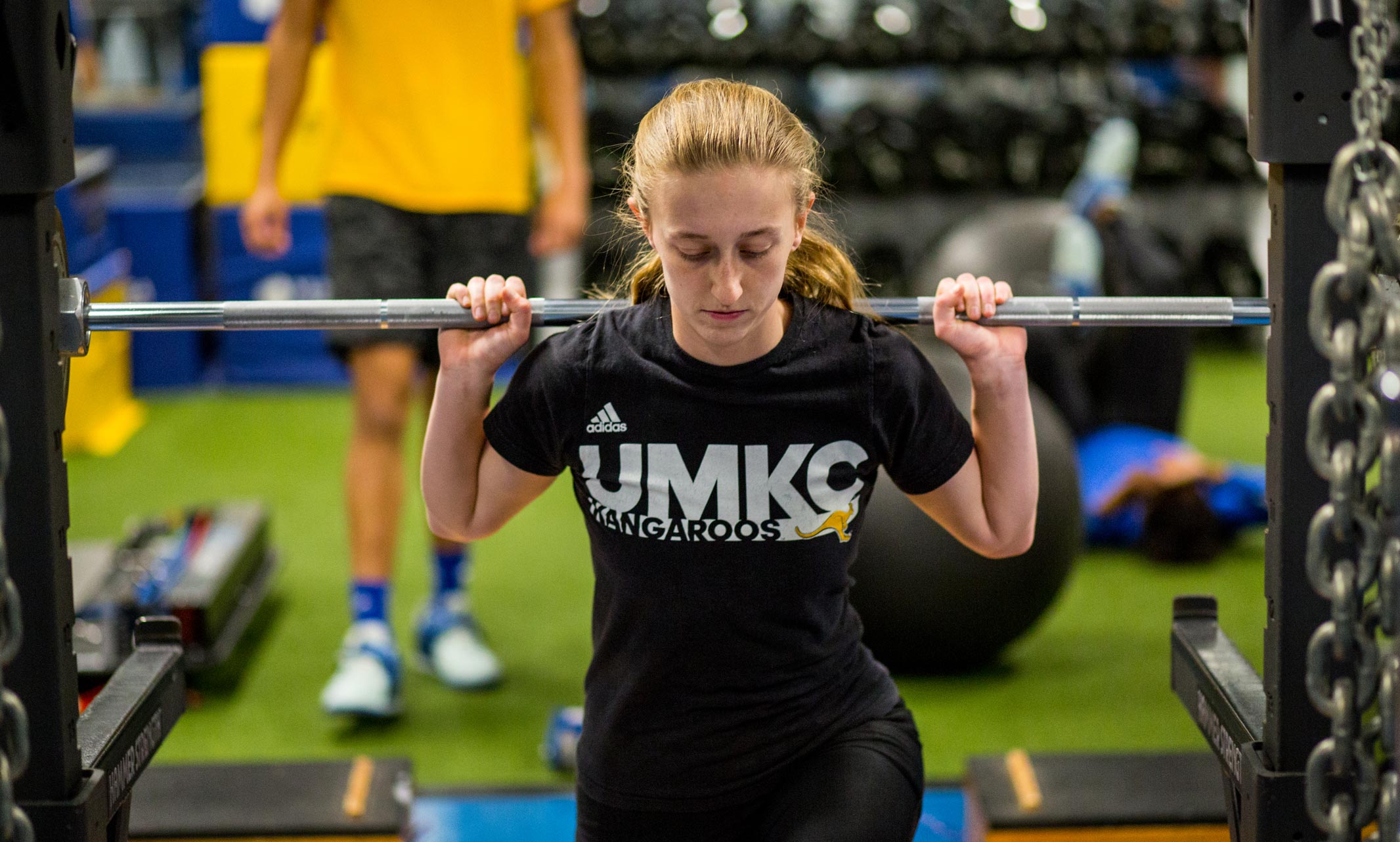
Daiwa Emmert combines her strength training and math experiences to empower girls in the classroom
Our ongoing story starts with people from around the world, converging here at UMKC. Get to know our people and you’ll know what UMKC is all about.
Daiwa Emmert ’18Academic programs: Mathematics, College of Arts and Sciences; Secondary Education, School of EducationUMKC Athletics: Track & FieldHometown: Bolivar, Missouri
Why did you choose UMKC?
Growing up, I came to Kansas City a lot to go visit my grandparents and attend Chiefs games. I knew I wanted to experience a different culture in a big city.
You have a unique name. What's the story?
Daiwa—it rhymes with Iowa! It means “sweet harmony” in Japanese. It’s also a brand of fishing reel my dad uses.
What got you started competing in track and field?
I got started in track just as something to do in between basketball and volleyball in the seventh grade. I usually played soccer, but decided to try something new. I loved it right away. I loved that it was individual but still had that team feel to it. My coaches through middle school and high school were a big reason I stuck with it. They all really pushed me.
Why strength train?
Strength training adds confidence. I know that what I do there will make me stronger mentally and physically. Practicing on the track does as well, but I know if I can push myself to lift as heavy as I can, I can use that strength to push me elsewhere. I have never been the strongest, and I never claim to be, but going through the last four years here have made me the strongest I’ve ever been.
I’m forever grateful for the opportunity to be a part of UMKC’s track and field team.
Success in athletics and academics seem to go hand in hand for you.
Regardless of it being athletics or academics, you set goals and you push to achieve them. For athletics, it’s pushing your body as hard as you can towards achieving your goals and seeing hard work pay off. It’s doing what you love to the fullest. In academics, especially math for me personally, it’s studying something you love and pushing the mind. It’s about learning something new everyday and striving to make your impact in the community.
Why did you choose math?
I started at UMKC as a biology major, but after my first semester, I didn’t really feel like it fit. I was more drawn to the calculus class I was taking, but I still wanted to make an impact in the community. So, I ended up changing my field of study to a double major with math and secondary education.
What are the challenges and benefits of the program?
When you get to upper level mathematics, it is not going to focus on just the calculations; proving statements is just as important. It takes a long time to develop the skills needed to be able to logically explain a solution without flaws.
The benefits are challenging myself and meeting people with the same love for math.
What are your lifelong goals?
My biggest goal is to have a family and become a high school or college teacher in math. I just want to be an influence on younger girls — especially in math. I connect with math, the repetition connected with me. I’ve had teachers who were passionate about math and I want to have that kind of positive impact.
[Update: Now that Daiwa graduated from UMKC and is a high school math teacher, her new goal is to teach college-level math at high school.]
Since entering college, what have you learned about yourself?
Since entering college, I am a lot more outgoing and have been able to get out of my bubble.
What’s the best piece of advice you have ever received from a professor?
Relax, and don’t procrastinate. If you wait until the night before the exam to try and memorize all the proofs, it’s not going to work.
Who do you admire most at UMKC?
I admire the faculty and staff that I have interacted with. They are so supportive and really express how much they care about my success.
What’s your greatest fear?
Clowns. They are definitely not invited to my birthday party.
What is one word that best describes you?
Caring. I am always willing to help someone if they need it.
Feb 01, 2019
Kay Barnes talks to INKansasCity
Serving on the student council in high school, Kay Barnes discovered early a knack for public speaking. She earned a masters in secondary education, as well as a Master of Public Administration degree at University of Missouri-Kansas City. Read the interview.
Feb 01, 2019
Three articles feature UMKC alumni and expertise
24 Reasons to Love Kansas City
Check out No. 23: More than 60 percent of UMKC alumni stay in the area, and more than 25 percent of KU and K-State grads flock to the metro.
The short answer is maybe. The key is doing something about it.
We all have unconscious bias, a subconscious attitude that affects how we see race, gender, appearance and age. Even cavemen exhibited unconscious bias, says Susan Wilson, vice chancellor of diversity and inclusion.
Crafting Theater: Behind the Scenes of The Unicorn Theatre
Cynthia Levin has been with the Unicorn Theatre almost since its inception. The theater company was begun by three UMKC graduate students who wanted to continue their vision — and who needed jobs.
Feb 01, 2019
School of Dentistry selects Terry O’Toole to receive Alumni Award
Terry G. O'Toole (D.D.S. '81)
Each year, the UMKC Alumni Association recognizes the achievements of outstanding alumni with an awards celebration. In 2019, UMKC School of Dentistry is honoring Terry G. O’Toole (D.D.S. ’81) with their Alumni Achievement Award.
O’Toole served the U.S. Department of Veterans Affairs, Veterans Health Administration for more than 35 years and held various roles within the organization including staff dentist, chief of Dental Service and director of Dental Informatics and Analytics. O’Toole retired in April 2018 and took a moment to reflect on his career.
Tell us about your role managing dental care deployment for veterans.
As chief of Dental Service at the Veterans Affairs Healthcare System in San Diego, California, I was responsible for leading the hospital clinical service in coordinating and overseeing the oral health care of approximately 3,500 to 4,000 eligible Veterans annually.
“So that’s why they made us learn all that stuff first and second year!”
You led the charge for evolving the electronic record system at the Department of Veterans Affairs. Why was transforming the system such a high priority for you?
We needed to know more about the patient to provide them the best care. As director of Dental Informatics and Analytics, I saw the opportunity as a way to improve things on a national scale.
Poor oral health can contribute to the worsening of many diseases such as diabetes and cardiovascular conditions. By creating and evolving a highly integrated medical/dental electronic health record system as we did, medical and dental practitioners alike have a complete view of the patient that improves clinical decision making and ultimately results in better patient care.
What is your favorite UMKC memory?
An “aha” moment for me came after graduation. I was only days into my hospital residency and treating a patient with a physical anomaly and its corresponding medical condition, when I started thinking, “So that’s why they made us learn all that stuff first and second year!”
About the Alumni Awards
O’Toole will be honored at the 2019 UMKC Alumni Awards on March 15. Proceeds from the event will support student scholarships. In the last decade, the Alumni Awards events have raised more than $1 million in scholarships and immediate aid for students.
Jan 30, 2019
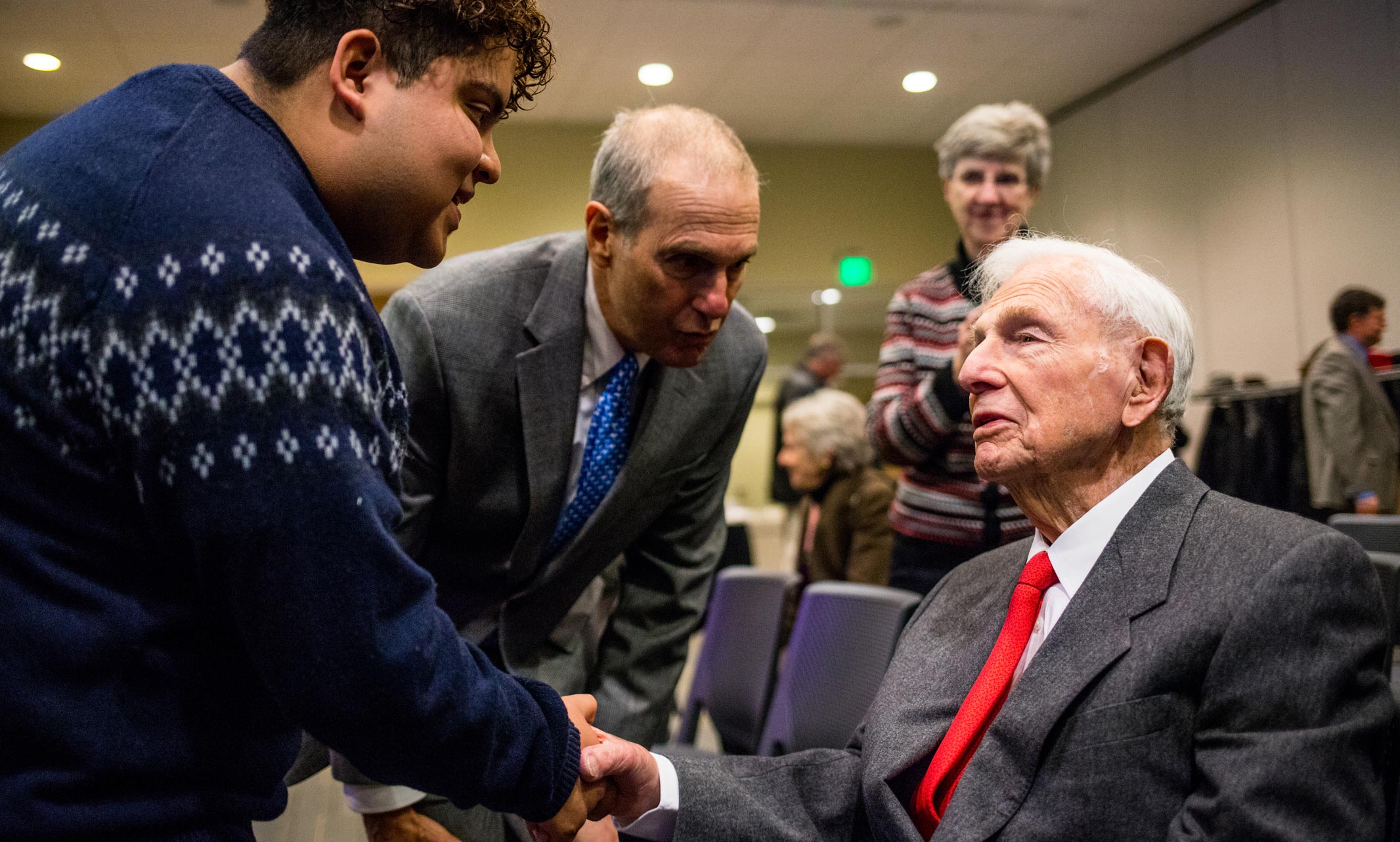
About 800 students will benefit from three new or expanded scholarship programs based on both merit and need over the next nine years
About 800 students will benefit over the next nine years from a new $20-million scholarship program established by the University of Missouri-Kansas City, the Marion and Henry Bloch Family Foundation, the H & R Block Foundation and the University of Missouri System.
Under the program announced today, the two Foundations will provide $10 million to be matched by a combined $10 million from UMKC and two UM System scholarship programs: the Promise and Opportunity Scholarships program, and the Next Generation Merit Program.
This represents the second $20-million scholarship initiative announced at UMKC in the last three months. In November 2018, the university announced a similar $20-million scholarship initiative in partnership with KC Scholars.
“The name Bloch is synonymous with generosity, leadership and service, on this campus and in this community,” said Mauli Agrawal, UMKC chancellor. “This wonderful gift will change the lives of hundreds of individuals, who in turn will go on to produce lifelong benefits to this community. This is one more example of how one family, and one company, can literally change the course of an entire community for the better.”
The new scholarship program – named the Bloch Family Scholarships – expands one existing UMKC scholarship program and adds two new ones. All three programs will launch in Fall Semester 2019.
“The name Bloch is synonymous with generosity, leadership and service, on this campus and in this community,” said -Mauli Agrawal, UMKC chancellor.
The Henry W. Bloch/UMKC Promise and Opportunity Scholars program expands the existing Henry W. Bloch Scholars program to serve approximately 200 students; currently 47 students are enrolled in the program. The program targets promising students from urban neighborhoods who would not be considered for traditional scholarship programs due to past academic performance or life circumstances. The program had been limited to low-income students starting their college careers at either Donnelly College or Metropolitan Community College-Penn Valley Campus, and then transferring to UMKC to complete a bachelor’s degree. The newly expanded program will serve about 100 high-need students in the transfer program plus about another 100 high-need students enrolling at UMKC as first-time freshmen. The program is budgeted at a total cost of $6.4 million ($2 million to be funded by the Bloch Family Foundation and $1.2 million from the H & R Block Foundation).
“My career will be focused on giving back to this community. That is the example that the Bloch family has set,” said Brian Ramirez, a student currently enrolled as a Henry W. Bloch Scholar. “That example, and the generosity of the Bloch Family Foundation and the H & R Block Foundation, made my journey possible. That’s what inspires me.”
This new Marion H. Bloch/UMKC Next Generation Merit Scholars program is designed to attract, encourage and support underserved, high performing students living in urban environments in greater Kansas City. This signature program complements the Henry W. Bloch Scholars. The program is expected to serve more than 100 students at a total scholarship cost of $4 million ($2 million to be funded by the Bloch Family Foundation).
The Bloch Launchpad Scholars program is designed to attract highly qualified undergraduate students to the Bloch School of Management who are motivated to integrate academic and professional development experiences. Because of UMKC’s positioning in Kansas City, the program will provide distinctive opportunities for students to combine academic coursework and on-campus engagement with internships, service learning, mentoring programs, and other career-related experiences. This program provides a unique opportunity for the Bloch School and UMKC to partner with organizations throughout greater Kansas City to develop talent for the region and provide outstanding educational experiences for students. Launchpad Scholarships require a commitment to engaging in professional development activities, with award levels varying with academic performance. While the total number served by this program will depend on the mix of award winners and may vary by year, it is anticipated that approximately 500 students will be served at a total cost of $9.6 million ($4.8 million to be funded by the Bloch Family Foundation).
“Today’s announcement reflects the continued confidence that the Bloch family and the H & R Block Foundation have in UMKC, the University of Missouri System, and in the young people of our community,” said Thomas M. Bloch, chair of both the Marion and Henry Bloch Family Foundation and the H & R Block Foundation. “We are proud to support these opportunities, because we know what an investment like this means to the future of Kansas City.”
This story was also featured on: KSHB 41, KCUR
Jan 29, 2019
Local media report on the new programs that will help hundreds of students
Read The Kansas City Star article: Bloch family helps UMKC Give millions in scholarships to Kansas City area students
Read the KSHB story: UMKC announces new scholarship in partnership with Bloch Family and H & R Bloch foundations
Read the KCUR article: Another $20 million pours in to help Kansas City area students attend UMKC
Jan 29, 2019
Alison DeSimone of Conservatory was a guest on “Central Standard”
Listen to the KCUR segment on "Women Composers."
Jan 29, 2019
School of Dentistry – Dental Hygiene selects Rebecca Stolberg to receive Alumni Award
Rebecca Stolberg (M.S. '96)Senior Director, Allied Dental Education and Faculty Development, ADEA
Each year, the UMKC Alumni Association recognizes the achievements of outstanding alumni with an awards celebration. In 2019, UMKC School of Dentistry – Dental Hygiene is honoring Rebecca Stolberg (M.S. ’96) with their Alumni Achievement Award.
During her time as a professor, department chair and interim assistant dean at Eastern Washington University, Stolberg received $461,324 in grant funding and created a program that increased access to dental care for rural Washington state residents. Now, she serves as senior director of allied dental education and faculty development at the American Dental Education Association (ADEA) in Washington, D.C. She spoke with us about her new role.
Tell us about your typical workday in Washington, D.C.
I am surrounded by 70 other professionals who are all here to serve our members and be the voice of dental education. Members take priority in my day, followed by work with administrative boards, conference planning, speaker recruitment and advocacy on Capitol Hill. Instead of impacting a small group of students and faculty at a university, I get to impact large groups of health professionals in the U.S., Canada and parts of Europe.
What would you like to accomplish in your role?
ADEA was founded by dental schools. More recently, it saw the value of focusing on allied dental professionals — dental assisting, dental hygiene, dental laboratory technology and the newer field of dental therapy. I am the first full-time allied dental person based in the D.C. headquarters. My goals revolve around insuring allied dental professions are integrated into everything ADEA does.
What advice do you have for UMKC students who’d like to follow in your footsteps?
Keep in touch with your faculty — you never know when you’ll need a letter of recommendation or to pick their brain.
About the Alumni Awards
Stolberg will be honored at the 2019 UMKC Alumni Awards on March 15. Proceeds from the event will support student scholarships. In the last decade, the Alumni Awards events have raised more than $1 million in scholarships and immediate aid for students.
Jan 28, 2019
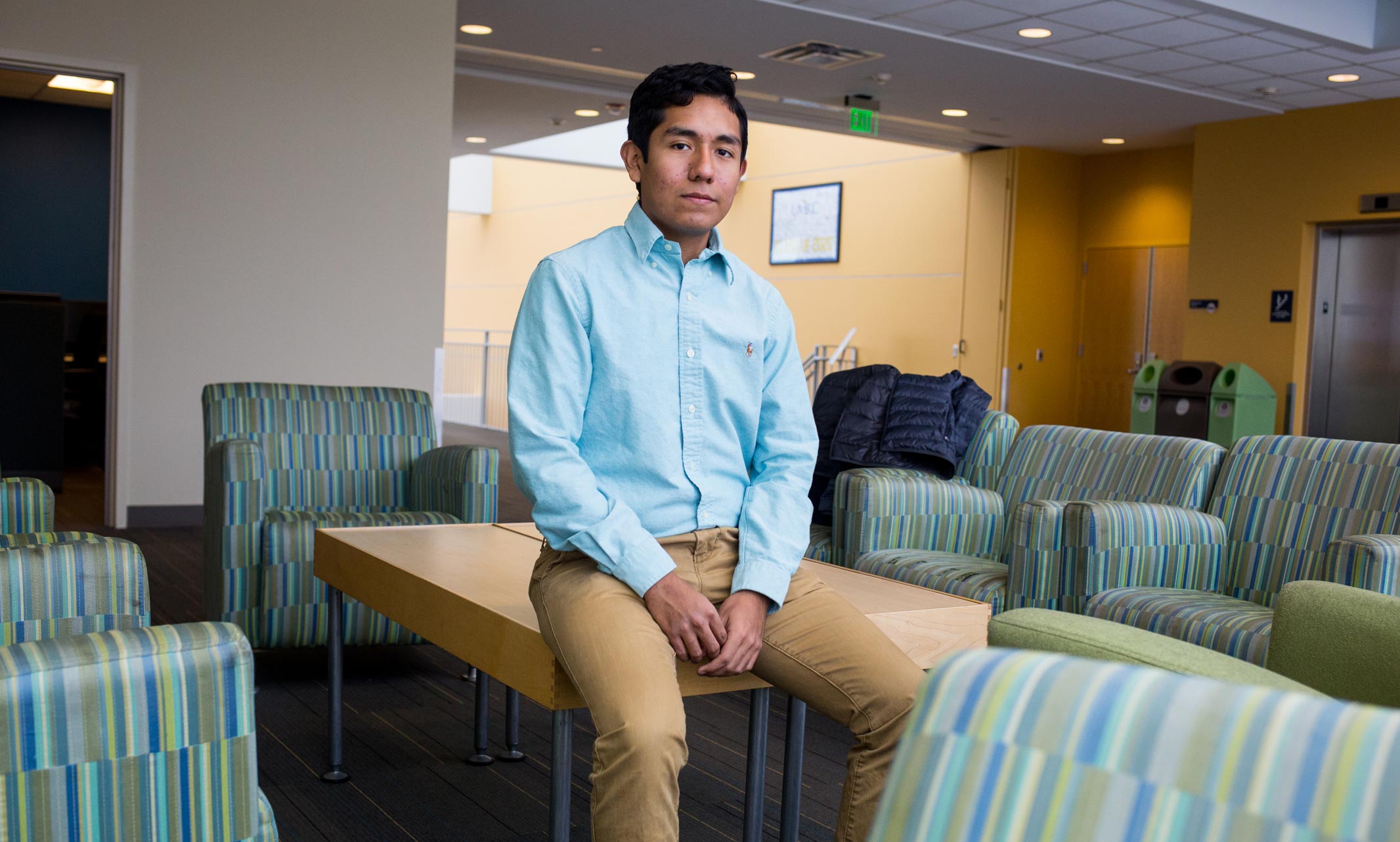
Bryan Betancourt shares how his experiences at UMKC and in business are shaping him
Our ongoing story starts with people from around the world, converging here at UMKC. Get to know our people and you’ll know what UMKC is all about.
Bryan Betancourt ’20 Academic program: Bachelor of Business Administration - Finance, Henry W. Bloch School of ManagementHometown: Raytown, Missouri
Why UMKC?
The Bloch School has produced talented professionals and continues to do so by supporting students with great resources. I also chose UMKC because of its diverse campus and sense of culture. I feel welcomed because UMKC creates a sense of community.
What’s it like being in the Bloch business program?
The greatest benefit of being a business student at UMKC is the professors. UMKC has business professors who are masters in their field because of their deep knowledge and experience. Bloch professors understand students and work with us to ensure we stay on track.
The Bloch school has inspired me to dream big and pursue an MBA. I enjoy my time at the Bloch school and feel special when I walk inside the buildings because I am privileged to go to a great university that has great resources! I know I will come out of business school ready to tackle the workforce. I have connected with many professionals through the school and have gained knowledge through those connections.
What extracurricular activities are you involved in at UMKC?
I am currently the treasurer for the Association of Latin American Students, and we partnered with a local scholarship provider, the Hispanic Development Fund, to financially aid Latinx UMKC DACA students by fundraising more than $8,500. We try to be a familia, or family, for students and help each other. We are proud of what we have done for our UMKC community and look forward to contributing more.
"UMKC has business professors who are masters in their field because of their deep knowledge and experience."
What internships or professional experiences have you had while at UMKC?
I had an internship at Sporting Kansas City as their event marketing ambassador. I experienced how the sports industry works internally, I gained professional office skills, and I learned how the company values their office staff. I expressed my productivity and showed how UMKC grows upcoming professionals.
What are your lifelong goals?
I want to be a leader and a manager. I plan on using my leadership qualities I have gained to continue to learn and become a future leader in an office setting. UMKC has taught me to value staff and respect everyone equally. I live by the golden rule: treat others as you want to be treated.
Jan 25, 2019
School of Education selects Deborah Siebern-Dennis to receive Alumni Award
Deborah Siebern-Dennis (B.A. '05)Teacher, Bode Middle School
Each year, the UMKC Alumni Association recognizes the achievements of outstanding alumni with an awards celebration. In 2019, UMKC School of Education is honoring Deborah Siebern-Dennis (B.A. ’05) with their Alumni Achievement Award.
As a seventh-grade science teacher at Bode Middle School in St. Joseph, Missouri, Siebern-Dennis is known for her engaging lessons, understanding of students’ needs and passion for learning. She is currently one of 45 middle school science teachers from across the U.S. selected to participate in a two-year teaching and learning project funded by the National Science Foundation. The project will emphasize disciplinary core ideas, science and engineering practices and crosscutting concepts. She sat down with us to share the scoop on teaching.
What are the benefits of teaching middle school students?
I absolutely love middle school students because they are at the age where they are just starting to expand their perspectives and learn about the world. It is in middle school that they start to use the information they have been given to form their own ideas about the environment around them.
What are the challenges?
Technology is changing our world more and more every day. It creates challenges for us because we have to constantly learn and try to stay caught up, which is no easy task.
What advice do you have for UMKC students who’d like to follow in your footsteps?
Never lose that spark that you had when you started teaching. Teaching, like many careers, will always have ups and downs. When you wake up every day remind yourself that your goal is to make a positive difference in the world no matter what and keep your focus on that at all times.
About the Alumni Awards
Siebern-Dennis will be honored at the 2019 UMKC Alumni Awards on March 15. Proceeds from the event will support student scholarships. In the last decade, the Alumni Awards events have raised more than $1 million in scholarships and immediate aid for students.
Jan 25, 2019
KSHB runs TV spotlight
There are fans. Then, there are super fans, like the group from Chicago that found its way to the Swinney Recreation Center for Saturday’s 63-54 comeback win against Seattle University. Watch the story.
Jan 25, 2019
KCUR airs story about music inspired by the late internationally acclaimed poet and UMKC English professor Michelle Boisseau
Though people will be able to read Boisseau's work in books for the imaginable future, two other professional artists have now memorialized her poetry in an entirely different art form. Learn more in the story.
Jan 25, 2019
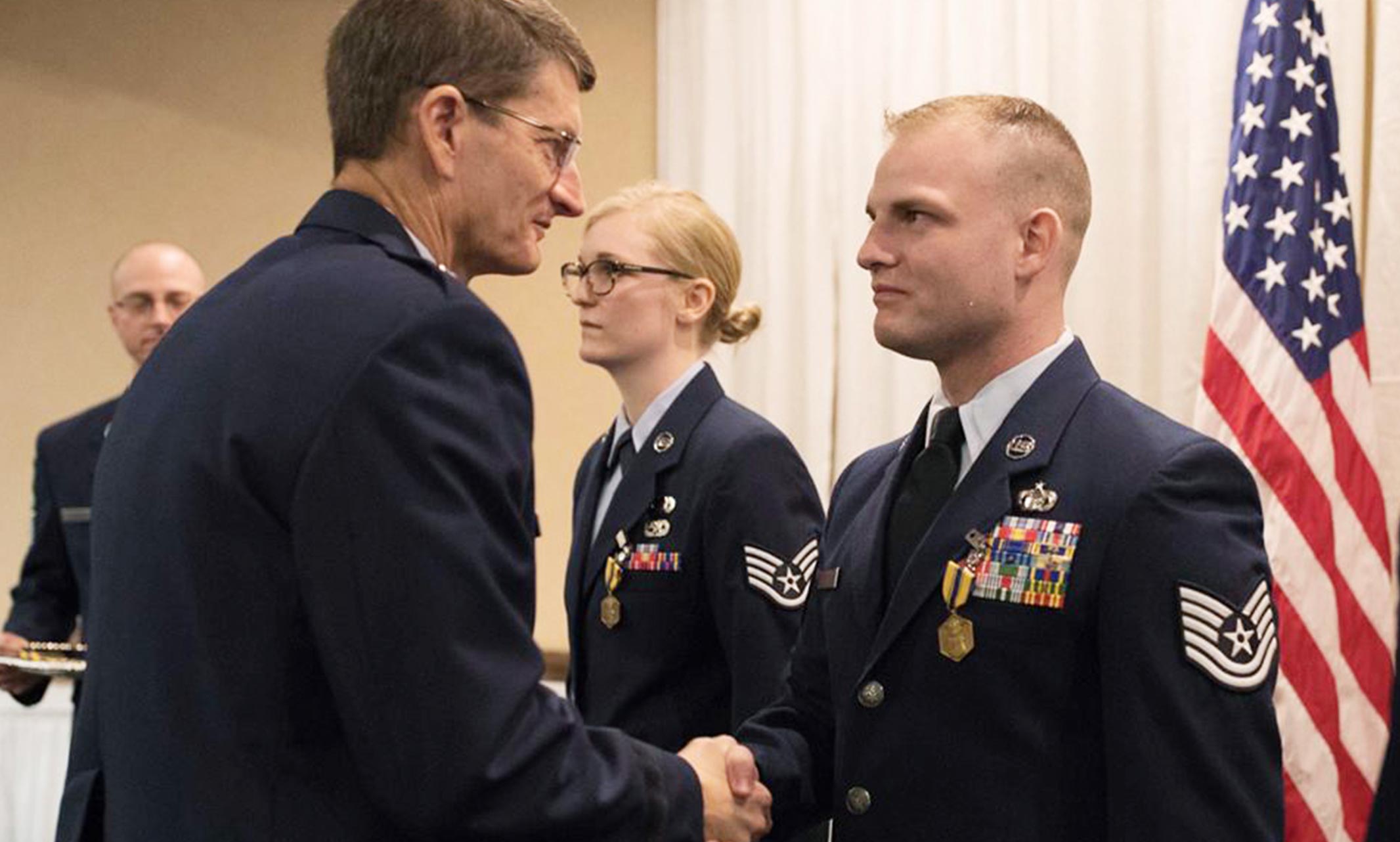
Student Colton Elliott Stands Out Amongst 3,500 Missouri Guardsmen
Being selected as the Missouri Air National Guard’s Non-commissioned Officer of the Year was a “huge surprise” to studio art junior and photojournalist Colton Elliott, but for his supervisor, Lt. Traci Howells, it was not.
When it came time to submit nominations for who would receive the award, Howells said she knew right away that she wanted to nominate Elliott.
“Colton is absolutely one of the best. It’s not easy to balance civilian and military life and give your best in both capacities, but Colton does just that,” Howells said.
There are roughly 3,500 Air National Guardsmen stationed between the state’s three Air Force bases – 131st Bomb Wing at Whiteman Air Force Base, where Elliott is located, 139th Airlift Wing in St. Joseph, and State Headquarters located in Jefferson City. To get a major award like Officer of the Year means guardsmen have to stand out amongst the slew of other officers in Missouri.
“It is an extreme honor to work with Colton. He’s overcome a great deal of adversity in his life and has worked hard to get to where he is today. I’m inspired by his work ethic, his quiet leadership and humility,” -Howells said.
Every year, each base nominates their top performers for the Officer of the Year award and candidates are judged in five categories: leadership, job performance, significant self-improvement activities, military or civilian awards and representation in the community.
“Being named the Non-commissioned Officer of the Year for my wing was a huge accomplishment on its own, but also being named Officer of the Year for the state has left me speechless,” Elliott said.
Elliott spent six months deployed in the Middle East last year and flew on more than 20 combat missions over Iraq, Syria and Afghanistan, documenting these events for historical and intelligence purposes. During his deployment he also served on multiple high-visibility international projects, including the Dubai airshow, for which he coordinated the creation of media credentials with the embassy and then served as a media escort for the event.
That’s not the extent of Elliott’s talent, though. The resident photo-expert, as he is affectionately called on base, is also a self-taught graphic artist. He’s worked on multiple marketing projects for the Missouri National Guard headquarters and his work has been displayed in high schools throughout the state to aid in recruitment campaigns.
“It is an extreme honor to work with Colton. He’s overcome a great deal of adversity in his life and has worked hard to get to where he is today. I’m inspired by his work ethic, his quiet leadership and humility,” Howells said.
“Although this is an individual award, I know that it can’t be achieved alone. Without the help from my team and leadership I wouldn't be where I am today,” Elliott said.
Howells is proud to serve with him at the 131st Bomb Wing.
"I look forward to seeing what the future holds for Colton and have no doubt he will be very successful in all he does,” she said.
UMKC is proud of its military and veteran students and alumni. Learn more about UMKC Veteran and Military Resources.
Jan 24, 2019
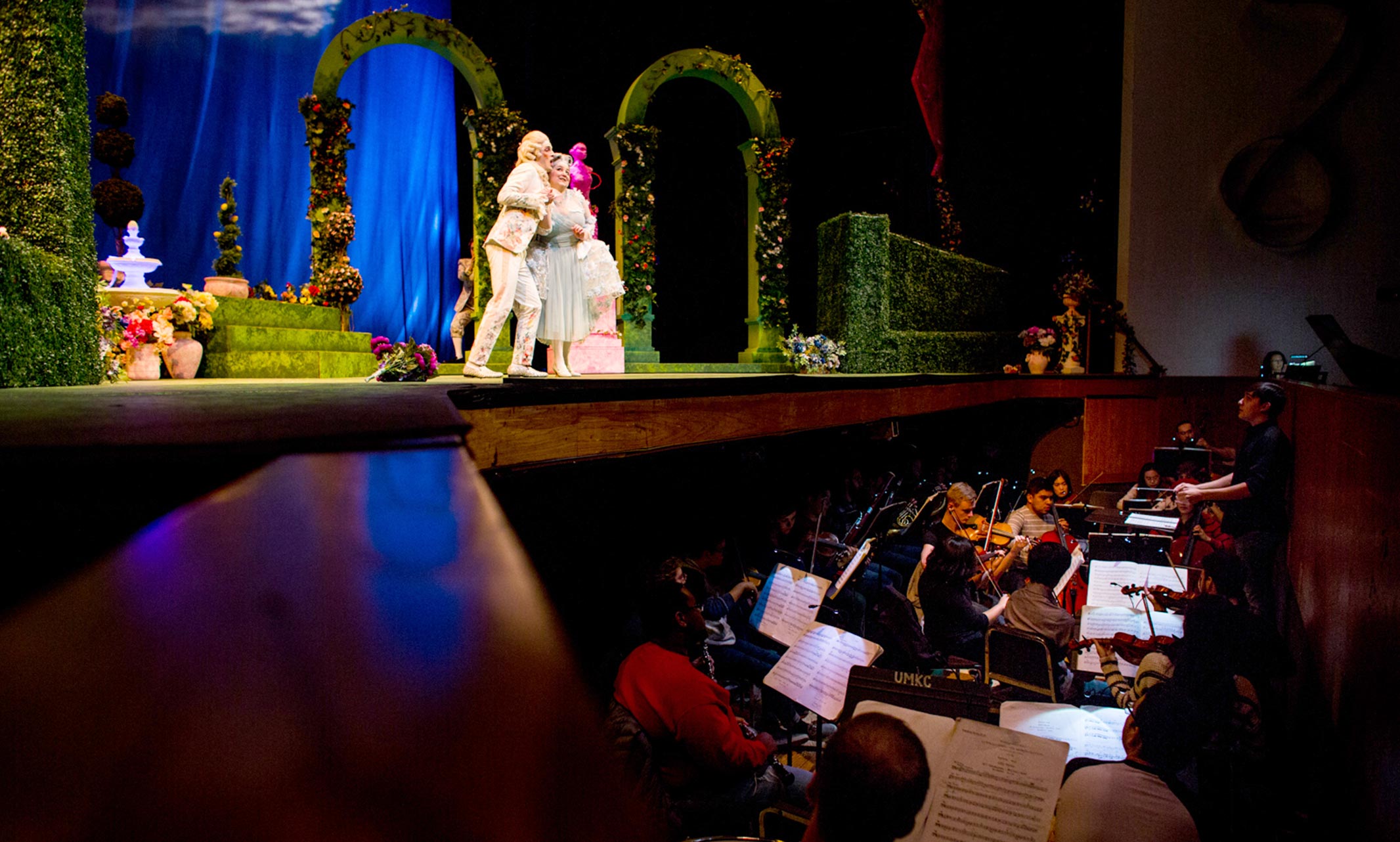
Preferred site is directly adjacent to existing Olson Performing Arts Center
The University of Missouri-Kansas City plans to build the new home for its performing arts programs on the university’s Volker Campus.
The proposed new home for the university’s internationally acclaimed Conservatory of Music and Dance and Department of Theatre will be on campus on a site immediately adjacent to the existing Olson Performing Arts Center and will face Volker Boulevard, creating a dramatic, iconic new front door to campus. It will be a significant addition to an arts corridor that already includes the Nelson-Atkins Museum of Art, Kemper Museum of Contemporary Art, Kansas City Art Institute campus and the newly expanded and remodeled Olson Center, home of the Kansas City Repertory Theatre.
The decision to locate the new Conservatory on campus is the culmination of a years-long process to find just the right home for UMKC’s celebrated performing arts programs. Several years ago, downtown Kansas City looked like it would become that new home, but in recent months, UMKC shifted its focus back to a location on or near the Volker campus, based on feedback from students, faculty and key community stakeholders.
With a new location selected, UMKC leaders say they are ready to take the next steps.
The profile of the Conservatory, and the community’s commitment to it, has risen dramatically in recent years, ever since the Greater Kansas City Chamber of Commerce named it one of the metro’s “Big Five” top priorities. In 2018, UMKC announced a possible merger of the Conservatory and UMKC Theatre department, which could further enhance the Conservatory’s reputation and reach – allowing it to expand programming and attract new students. The project aligns well with the city’s plan to extend the popular Downtown Streetcar, which will provide a convenience for new audiences to engage with this facility.
“The heart of Kansas City’s vibrant and vital performing arts community has always been in UMKC’s performing arts programs, so it is fitting that those be located in the heart of our campus,” said -Chancellor Mauli Agrawal.
Leaders in the Missouri General Assembly continue to express strong support for the project, and next steps would include revisiting potential funding for the project going forward.
The Conservatory will play a vital role in the overall success of the university as UMKC must improve its facilities to continue to meet accreditation standards and preserve its reputation as one of the country’s best performing arts schools.
“The heart of Kansas City’s vibrant and vital performing arts community has always been in UMKC’s performing arts programs, so it is fitting that those be located in the heart of our campus,” said Chancellor Mauli Agrawal. “Keeping that heart beating strongly is a community imperative. The continuing approval of our accrediting bodies is dependent on bringing this project to fruition. The time has come to move from the talking and planning phases to the action phase.”
Agrawal cited the important role the performing arts play in the economies of the community and the state. The performing arts are a $1 billion industry for the state of Missouri, with impacts felt from the state’s urban centers, to tourism meccas such as Branson, to the high school bands, church choirs and storefront dance studios that are the pride of communities from Maryville to Poplar Bluff.
Next Steps
Now that the new site has been chosen, UMKC will:
Review program needs for music, dance and theatre, set final square footage and estimated final cost.
Choose professional teams for architecture, design and construction.
Consult with key individuals – donors, civic leaders, Missouri’s governor and state legislature, among others – to finalize funding for the project.
The new facility will provide suitable space for performance, composition and research at the university that for decades has been designated as Missouri’s Campus for the Visual and Performing Arts by the University of Missouri System.
UMKC Music, Dance and Theatre programs share a proud history of leadership in the arts and a profound impact on the cultural life of Kansas City and the state of Missouri. UMKC arts programs, faculty and alumni have provided the foundation of almost all of the Kansas City community’s premier performing arts organizations.
This story was also featured on: The Washington Times, The Kansas City Star, KSHB 41, Kansas City Business Journal, KCUR, KCTV5, Fox 2 St. Louis, News Tribune, Columbia Daily Tribune, St. Joseph Post
Jan 24, 2019
School of Law selects Paul F. Kavanaugh to receive Alumni Award
Paul Kavanaugh (J.D. '84)Attorney, Rollins/Kavanaugh, PC
Each year, the UMKC Alumni Association recognizes the achievements of outstanding alumni with an awards celebration. In 2019, UMKC School of Law is honoring Paul F. Kavanaugh (J.D. ’84) with their Alumni Achievement Award.
As a trial lawyer specializing in medical malpractice, Kavanaugh has represented seriously injured clients for more than 30 years. As co-founder of the Kavanaugh Charitable Trust, started with his wife Debbie (B.S.P. ’85), he has funded elementary schools in Cambodia, donated wheelchairs to the underserved and created a scholarship for UMKC Law students. Kavanaugh spoke with us about his dedication to giving back.
How did you come to focus on medical malpractice/negligence as your field of specialty?
I started working with two prior UMKC School of Law Alumni Achievement Awardees, Lantz Welch (J.D. ’59) and James “Jim” Bartimus (J.D. ’77), as a law student. Jim specialized in medical negligence and I was drawn to it because of its complexity and the fact that it was considered one of the hardest areas to win at as a trial lawyer.
Through the trust, you’ve funded schools, clinics and roads in developing countries, donated wheelchairs and created scholarships at UMKC. Why is it important to you to give back?
We started the trust with two goals: to support higher education with scholarships for students in need at all of my colleges and both our professional schools (Debbie was the Alumni Achievement Awardee previously for the UMKC School of Pharmacy), and provide wheelchairs to mobility impaired people around the world. Both Debbie and I know that if we did not get our educations we would not be where we are or able to give back.
What advice do you have for UMKC students who’d like to follow in your footsteps?
Find out what you what to do and never quit. I was told “no” for student intern jobs by over a dozen firms. If I would have gotten any of those jobs, I would not be where I am.
About the UMKC Alumni Awards
Kavanaugh will be honored at the 2019 UMKC Alumni Awards on March 15. Proceeds from the event will support student scholarships. In the last decade, the Alumni Awards events have raised more than $1 million in scholarships and immediate aid for students.
Jan 24, 2019
Extensive media coverage of announcement
UMKC announces plans to build conservatory on campus
The Washington Times
KC ‘arts corridor’: Here’s where UMKC will build its conservatory of music and dance
The Kansas City Star
UMKC Conservatory to be located on main campus
KSHB
UMKC selects a location for conservatory
Kansas City Business Journal
University Of Missouri-Kansas City To Build New Conservatory Of Music And Dance On Campus
KCUR
UMKC announces plans to build conservatory on campus
KCTV5
UMKC announces plans to build conservatory on campus
Fox2
UMKC announces plans to build conservatory on campus
News-Tribune
Jan 24, 2019
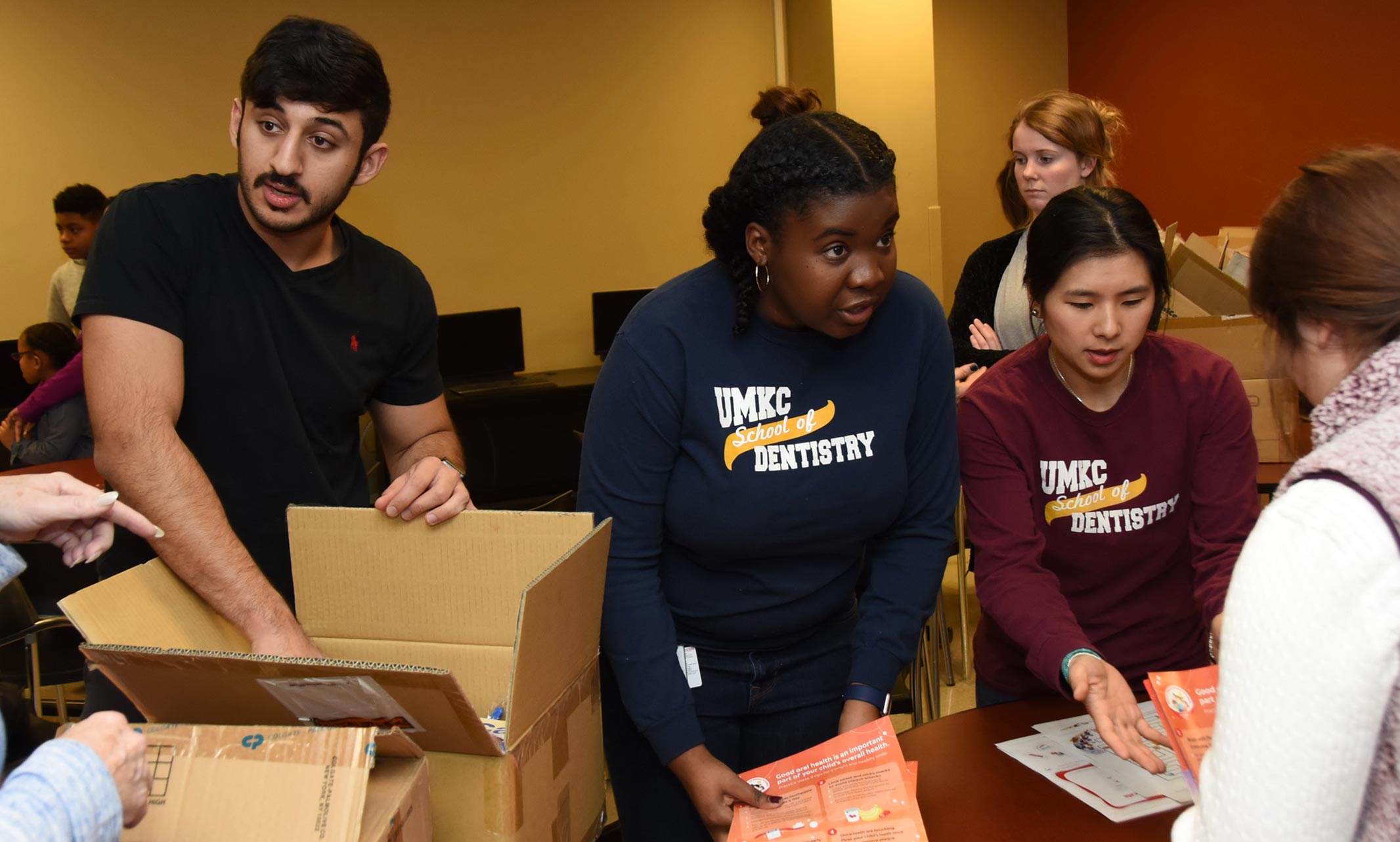
Students, faculty, staff and community join together to deliver 1,000 oral hygiene kits
Dental student Chanelle Roberts knew she wanted the inaugural UMKC School of Dentistry MLK Day of Service to be big.
“All of this definitely exceeded my expectations,” said Roberts, as she motioned to the crowd of nearly 100 volunteers assembling 1,000 oral hygiene kits at the school.
She and about 20 other students were joined by the school’s staff and faculty, including Dean Marsha Pyle and internationally recognized researcher Sarah Dallas, as well as members of St. James United Methodist Church.
The kits of toothbrushes and toothpaste, donated by Colgate-Palmolive, GlaxoSmithKline and Procter & Gamble, were delivered to children and adults at St. James, the Ronald McDonald House, City Union Mission, reStart, American Cancer Society Hope Lodge, Hope Faith Ministries, Jackson County Family Court and the Kangaroo Pantry at UMKC.
“Everybody can be great because anybody can serve.” -Martin Luther King Jr.
Roberts is part of the School of Dentistry diversity task force, which was looking for a way to honor Martin Luther King Jr. and demonstrate its core value of compassion, taking a genuine interest in the needs of those we serve in order to help them live healthy and productive lives through the services we deliver.
“Since we are not able to provide dental care on this day due to the holiday, we decided to provide hygiene kits to stress the importance of oral health and make the community aware of the role the UMKC School of Dentistry plays in improving oral health in Kansas City and the states of Missouri and Kansas,” said Jeff Primos, director of business administration at the School of Dentistry. “Health and wellness is important for everyone, and the mouth is the gateway to overall health.”
Because of all of the helping hands, the task of assembling such a large number of oral hygiene kits was finished more than hour ahead of schedule.
“This feels really good,” Roberts said.
This story was also featured on:Fox 4 KC
Jan 22, 2019

Five students win scholarship for once-in-a-lifetime opportunity
Scuba diving in Malta, studying Spanish culture in Spain, hiking in Peru — these are just a handful of opportunities that give you the chance to immerse yourself in another culture when you study abroad. While the cost can be an obstacle, what you may not realize is that there are several ways to offset the expense of living and learning in another country.
The congressionally funded Benjamin A. Gilman International Scholarship provides financial support to outstanding undergraduate Pell Grant recipients who, due to financial constraints, might not otherwise study abroad. Recently, five UMKC Roos received the Gilman scholarship, for a combined total of $16,500, to help fund their study abroad experiences in spring and early summer 2019.
“Growing up, my parents could only afford to give me what I absolutely needed. They couldn’t even afford to send me to college, so studying abroad would not be possible without the Gilman Scholarship,” says -Brian Ramirez,
junior health sciences major. He is minoring in Spanish and plans to study in Spain.
As a first-generation college student and son of Mexican immigrants, Ramirez says he’s grateful that he is able to attend college and to even have an opportunity to consider studying abroad. After all, hundreds of students across the country apply for the Gilman scholarship each year.
Another Gilman scholar, Katrena Smith, says her study abroad location was, in a way, fate. Her grandfather confirmed her decision to study in Ljubljana, Slovenia. He told her how beautiful it was when he was stationed there years ago when he was in the military.
Slovenia’s beautiful landscape and her personal connection to the country excited Smith, a photographer hobbyist, who also plans to document the culture shock of Slovenia. Even more, she’s going to partner with the American Cancer Society to blog her six-month experience abroad for teenage cancer patients, to show girls the opportunities she’s been granted since beating leukemia at age 11.
“I didn’t think I’d be here, so it means a lot to me to show other girls that it’s possible for them,” says Smith, who will spend the spring 2019 semester immersed in Slovenia’s college life. She will stay in a dormitory with a roommate while studying sociology at the local university in Ljubljana.
When he returns to the states, Ramirez and will go back to his high school alma mater and speak to students about the value of study abroad.
“Why not go back to where I came from? I want other kids who struggled like me to see that it’ll be okay, that it’s possible to go to college and even study abroad,” says Ramirez, who will live with a host family and take classes at the University of Malaga. He’s excited to compare the different dialects of Spanish spoken between Mexico and Spain.
Gilman Scholarship Awardees
Spring Semester 2019
Katrena Smith, SloveniaPsychology major; Family Studies and Sociology minor
Early Summer 2019
Jacob Furry, Denmark Music Education, Music Performance – Trumpet major; Psychology minor; Honors
Niesha King, Spain Psychology and Spanish majors
Brian Ramirez, Spain Health Sciences major; Spanish minor
Sarah Schleicher, Costa Rica Spanish major; Latina/Latino Studies minor
Apply for the Gilman Scholarship
The Gilman Scholarship applications for the “regular” 2019 summer round as well as fall 2019 and academic year 2019-20 will open in mid-January and be due on March 5. The UMKC International Academic Programs office offers multiple Gilman Scholarship workshops each semester and provides individualized advising in advance of the national deadline. The next Gilman Workshop will take place 4 to 5 p.m. Jan. 30 in the Atterbury Student Success Center, Room 236.
Jan 22, 2019
Alon Goldstein, classical pianist and visiting professor, was a guest on KCUR
Alon Goldstein hopes to bring new excitement to Rachmaninoff's music as he tackles a 27-minute piano piece. Goldstein says "immersing myself in such incredible beauty and romanticis," brings him joy in playing the challenging ensemble. Listen to the "Up to Date" interview.
Jan 22, 2019
Brandon Weckbaugh, MD, an oncology fellow at UMKC is interview on OncLive
The treatment landscape of non–small cell lung cancer (NSCLC) continues to expand with potential biomarkers that are under investigation, as well as novel agents that could potentially target them. What was once a major area of unmet need has experienced an explosion of new research, said Brandon Weckbaugh, MD. Read the interview.
Jan 22, 2019
Lara Kujtan, assistant professor at the UMKC School of Medicine, discusses its importance
Read the OncLive interview about the importance of patient preferences in the treatment of oncogene-driven non-small cell lung cancer (NSCLC).
Jan 22, 2019
Johnson County hired UMKC professor Alex Holsinger to develop the system
Alex Holsinger, professor in the Department of Criminal Justice and Criminology in the College of Arts and Sciences, analyzed data from 2011 and 2012 to find which characteristics were most related to a failure to appear in court or committing another crime. Read the KCUR article.
Jan 22, 2019
Laser researcher Charles Cobb, professor emeritus at UMKC School of Dentistry, interviewed
Charles Cobb said based on the size of the spot, it looks like the person was sitting far back in the end zone, possibly in a corner. Watch video on KMBC.
Jan 21, 2019
Students, faculty, staff and church create 1,000 kits to hand out to adults and children, Fox4KC reports
An urban core church is joining forces with the University of Missouri-Kansas City dental school to promote healthy habits. About a hundred volunteers from St. James United Methodist Church, and UMKC students, faculty and staff believe they can make a difference in helping folks take better care of their teeth. Read more.
Jan 21, 2019
Expansion included UMKC campus
The first phase of the 54-block smart district project included the installation of new Wi-Fi access points, 600 traffic sensors and extend connectivity for nine-miles along Prospect Avenue. The second phase of the expansion included the UMKC campus. Read the Icons of Infrastructure article.
Jan 21, 2019
The National Coordinating Center at Stanford University and UMKC will develop a portion of the overall national agenda
BHECN will develop a regional agenda for the four-state partnership. Read the KNEB article.
Jan 21, 2019
UMKC alum Mary Daly's story is in the Washington Post
Mary Daly believes she wouldn’t be where she is today if it weren’t for Betsy Bane, a mentor who told Daly to get a GED and paid for her first semester at the University of Missouri-Kansas City. Read the article, which also ran in the Omaha World-Herald.
Jan 18, 2019
School of Medicine selects William Arthur Cooper to receive Alumni Award
William Cooper, M.D.
Each year, the UMKC Alumni Association recognizes the achievements of outstanding alumni with an awards celebration. In 2019, UMKC School of Medicine is honoring William Arthur Cooper (M.D. ’92) with their Alumni Achievement Award.
A 30-year U.S. Army Reserve veteran, Cooper is a cardiothoracic surgeon who has performed thousands of life-saving surgeries. As founding director of a nationally recognized heart surgery program, his goal is to teach patients to stay heart healthy.
You devote a lot of time to educating people on heart disease prevention — including writing a book and appearing on the Steve Harvey television show. Why is it important to you to educate others on preventing heart disease?
I am one of eight children in my family and one of three that are still alive today. Everyone else has died, including my mother, of preventable diseases. By writing and speaking, I have the opportunity to inform thousands, not just those who happen to need my surgical skills.
In addition to your M.D. from UMKC, you’ve also earned your MBA and several business certificates. Where does your passion for education stem from?
My father and my curiosity for learning. I reject the notion that doctors should narrow their professional focus on medicine alone. Why not learn and grow as much as you can as long as you can?
How did UMKC prepare you for success?
There is no doubt in my mind that the one thing that UMKC prepared me for more than anything else was bedside manner and how to approach and develop a solid patient-physician relationship — from the clinical evaluation, diagnosis and treatment to the interpersonal relationship and trust development. UMKC more than prepared me to be a doctor from day one of my residency. I still utilize those skills today.
About the UMKC Alumni Awards
Cooper will be honored at the 2019 UMKC Alumni Awards on March 15. Proceeds from the event will support student scholarships. In the last decade, the Alumni Awards events have raised more than $1 million in scholarships and immediate aid for students.
Jan 17, 2019
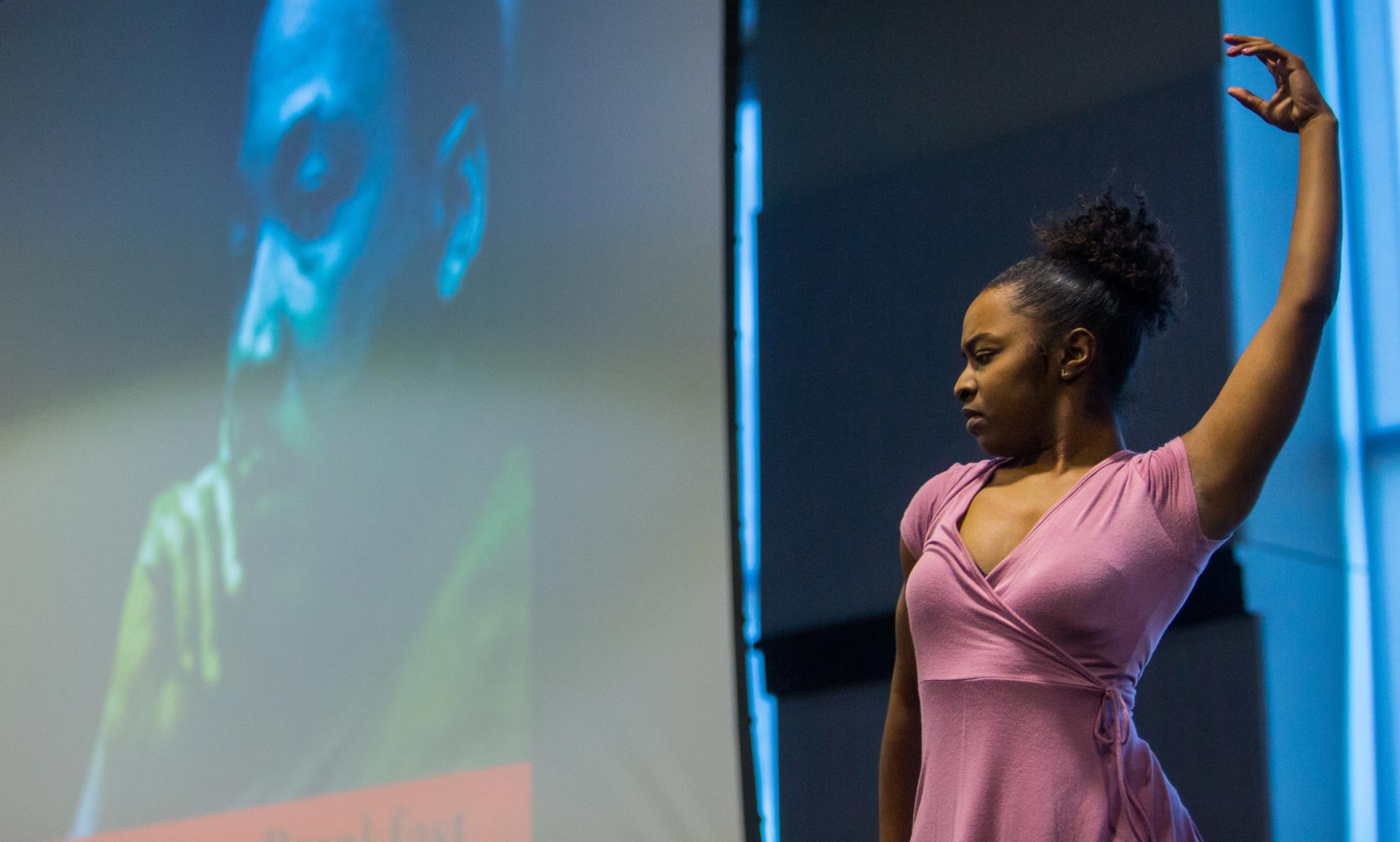
Breakfast celebrates 50th anniversary of The African American Student Union
How has the African American experience on the University of Missouri-Kansas City campus evolved over the past half-century? Come hear three unique perspectives at the 29th annual Freedom Breakfast sponsored by The African American Student Union (TAASU).
The speakers will represent the experiences of three different generations: Margaret A. Evans, Ph.D. (B.A. ’71, MPA ’72), one of the original founders of TAASU; Michael Watson, who attended UMKC in the 2000s and is one of the most stellar student-athletes in the history of university; and the current president of TAASU, Cameron Johnson, a junior majoring in biology with a minor in chemistry. The program will also feature special tributes from UMKC students.
This year’s breakfast celebrates the 50th anniversary of the founding of TAASU. Proceeds support the Herman Johnson Scholarship fund and TAASU leadership programming opportunities.
The TAASU Freedom Breakfast was created not only to commemorate the legacy of Martin Luther King, Jr., but also to promote unity and harmony within our UMKC community. The event highlights UMKC’s institutional values of diversity, inclusiveness and respect.
Event details:
7:30 a.m., Tuesday, Feb. 5 (event was re-scheduled due to inclement weather)
Pierson Auditorium
Tickets are free for UMKC students (pre-registration required) and $65 for others
Tickets and registration are available online.
Jan 17, 2019
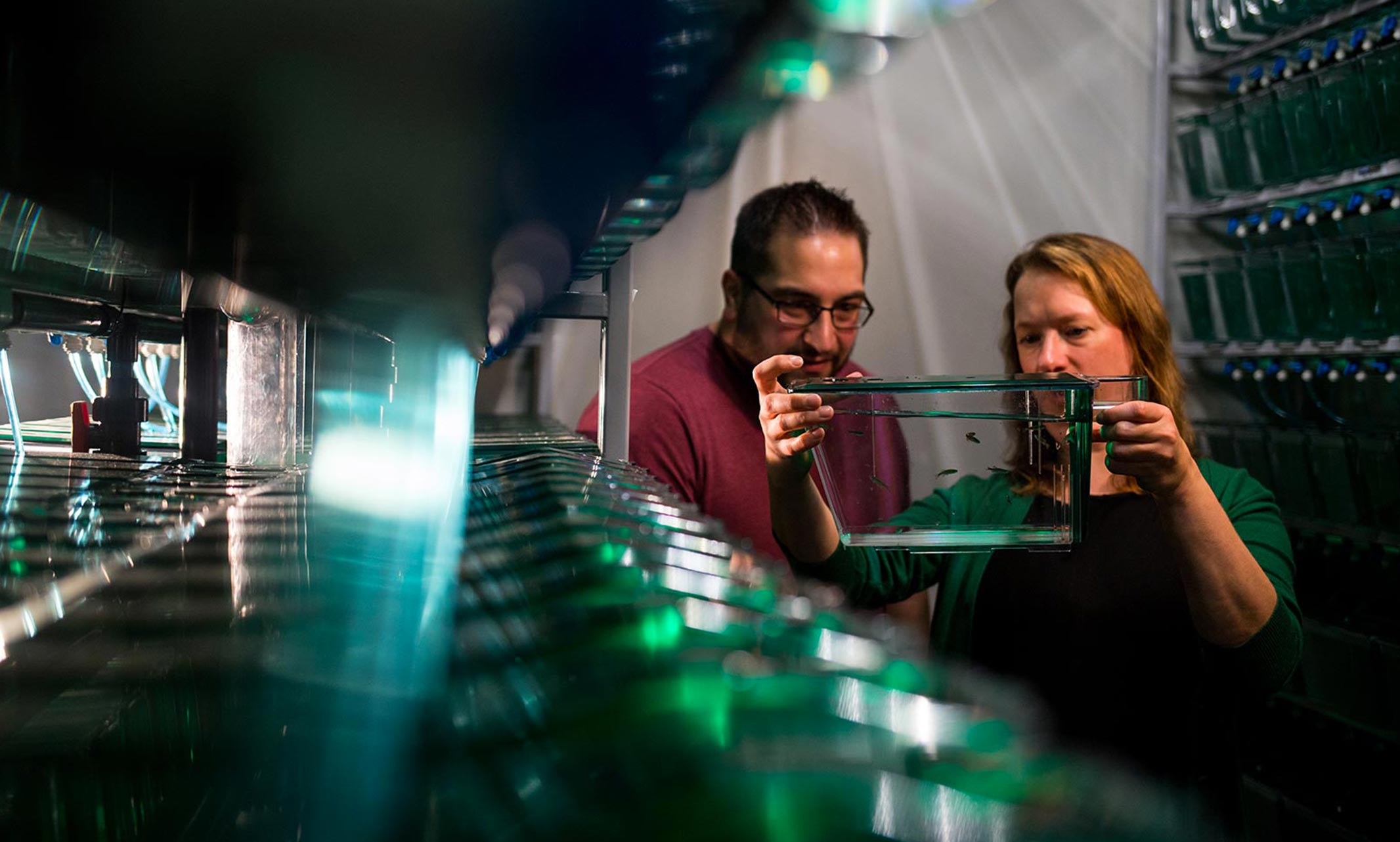
Primary mission: grow grants and discovery at Kansas City’s only public research university
A national search is underway for the University of Missouri-Kansas City Vice Chancellor of Research.
The position is an important one: UMKC is the only public research university in greater Kansas City, and works in partnership with the community to solve its greatest challenges through research-infused learning, service and discovery activities.
“UMKC is developing bold strategies to keep pace with the ever-evolving vanguard of innovative research and the quest for research funding in higher education,” said UMKC Chancellor Mauli Agrawal. “The person in this role will lead the way for UMKC to help us accomplish our aggressive research goals in biomedical sciences, technology, social sciences and the humanities.”
In its new strategic plan, UMKC has the goal of increasing annual research grants from $29.2 million in 2018 to $60 million by 2028.
UMKC is uniquely positioned to expand its research capabilities — in health sciences, engineering, the humanities and beyond. The UMKC Health Sciences Campus at Hospital Hill includes schools of Dentistry, Medicine, Nursing and Health Studies and Pharmacy. The campus is part of the UMKC Health Sciences District featuring a dozen partners including Truman Medical Centers and Children’s Mercy. The UMKC School of Computing and Engineering partners with leading local and regional companies in research including Honeywell and Cerner. UMKC also has significant interdisciplinary research capabilities in national security and data science.
“UMKC is developing bold strategies to keep pace with the ever-evolving vanguard of innovative research and the quest for research funding in higher education,” said UMKC Chancellor Mauli Agrawal. “The person in this role will lead the way for UMKC to help us accomplish our aggressive research goals in biomedical sciences, technology, social sciences and the humanities.”
Agrawal hopes to fill the role by May. Effective Jan. 15, Mark Nichols, Ph.D., will serve in the role on an interim basis. In 2016, Nichols joined UMKC and has served as associate dean for research at the School of Nursing and Health Studies and interim chair of biomedical and health informatics at the School of Medicine.
Jan 16, 2019
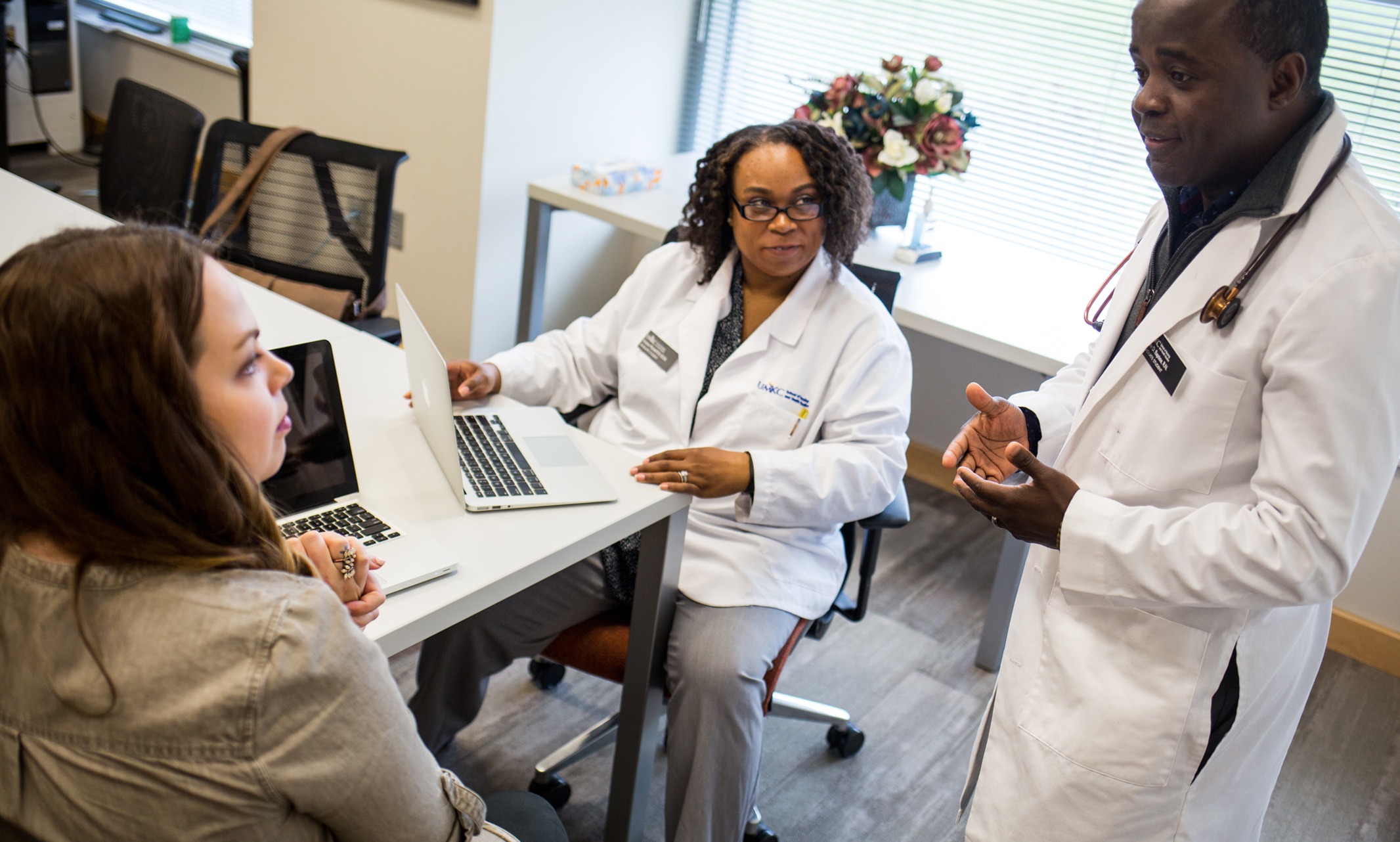
U.S. News & World Report ranks online graduate programs
The University of Missouri-Kansas City School of Nursing and Health Studies ranked No. 19 among the nation’s best online graduate nursing programs of 2019 by U.S. News and World Report, giving it at least a Top 25 ranking for the seventh year in a row.
UMKC’s ranking, released today, is the highest of any university in Missouri. Last year, UMKC also ranked high at No. 18. No other program in Missouri or Kansas ranked higher.
“Our faculty, staff and students are to be commended for creating something truly extraordinary: nationally ranked online advanced nursing programs,” said Ann Cary, dean of the school. “This is filling a critical need in workforce education and a critical need in treating patients.”
The UMKC School of Nursing and Health Studies is a pioneer in distance-learning programs, offering online advanced degree programs since 2002. The programs offer busy professionals a high-quality but convenient way to further their careers and meet the needs of an evolving health-care system.
“The program allows you to go at your own pace without taking time away from family or work,” Smith said. “It’s not easy by any means – I spend 20 to 30 hours a week working on the degree. But there are great mentors, everyone is positive and encouraging…it’s a community.”
The UMKC online graduate nursing program certainly fills the needs of Brandie Smith, a single mother of three school-age children who works full time as a labor-and-delivery nurse at Overland Park Regional Medical Center. She graduated in 2015 from the UMKC accelerated Bachelor of Science in Nursing Program so she knew about the highly-ranked online graduate nursing programs at UMKC. She plans to graduate with a Doctor of Nursing Practice in Women’s Health in 2023, with the goal of conducting global research as a nurse practitioner who studies and teaches about treatment of diseases.
“The program allows you to go at your own pace without taking time away from family or work,” Smith said. “It’s not easy by any means – I spend 20 to 30 hours a week working on the degree. But there are great mentors, everyone is positive and encouraging…it’s a community.”
Online students are expected to participate in online discussions as if they are present in the classroom. Technology offers two-way communication in real time via multiple modes. Students also experience on-site learning through summer institutes where they are required to attend clinical training or dissertation work sessions, and deliver presentations to classmates and faculty.
UMKC offers a variety of online graduate nursing tracks, including Master of Science in Nursing (MSN) and other options:
Adult-Gerontology Primary Care Nurse Practitioner
Family Nurse Practitioner
Pediatric Nurse Practitioner
Women’s Health Nurse Practitioner
Nurse Educator
Psychiatric Mental Health Nurse Practitioner
Neonatal Nurse Practitioner
Ph.D.
Doctor of Nursing Practice
U.S. News began ranking online education in 2012. The categories include faculty credentials and training; student engagement; admissions selectivity; peer reputation; and student services and technology. U.S. News began their data comparisons with more than 500 institutions that had accredited graduate degree programs in nursing. Among the ones that replied, more than 170 said they offered online graduate nursing programs. The number of online nursing programs is continually growing nationwide.
Jan 15, 2019
UMKC urban planning professor interviewed
Barranquilla’s strategy of building toward the coast may prove shortsighted, warns Clara Irazábal-Zurita, a professor of urban planning at the University of Missouri-Kansas City. “Coastal cities are enormously vulnerable because of climate change,” she says. “So how will Barranquilla get the drinking water it needs to support its expanding population and expanding tourism?” Read the OZY Confidential article.
Jan 15, 2019
School of Education research published
Commissioned by the National Coalition of Girls’ Schools (NCGS), “Fostering Academic and Social Engagement: An Investigation into the Effects of All-Girls Education in the Transition to University” was prepared by principal investigator Tiffani Riggers-Piehl, assistant professor of higher education at the University of Missouri-Kansas City in collaboration with HERI. Read the Illinois Patch article.
Jan 14, 2019
Alum and Olympian in Runner's World magazine
After taking a well-deserved break from the 2017 season, Frerichs was excited to return to training in the fall. She believed she had finally figured out the transition from college athlete—she ran cross country and track for the University of Missouri-Kansas City and then the University of New Mexico until she graduated in 2016—to pro runner. Read the article.
Jan 14, 2019
School of Pharmacy selects Alan W. Carter to receive Alumni Award
Alan W. Carter, Pharm.D.
Each year, the UMKC Alumni Association recognizes the achievements of outstanding alumni with an awards celebration. In 2019, the UMKC School of Pharmacy is honoring Alan W. Carter (B.S.P. ’79, Pharm.D. ’02) with their Alumni Achievement Award.
With more than 35 years of experience in clinical pharmacy management and research, Alan Carter, pharmacy director at Aetna Better Health of Kansas, has worn many hats including: educator, board member and researcher. He recently gained national attention as his research raised a red flag on problems with the storage of insulin. Carter spoke with us about his study.
You received national attention for your study which discovered decreases in the concentration of insulin. Is there more research being done to ensure that insulin maintains its potency from manufacturer to pharmacy?
The study results were published online in late December 2017 and became an international discussion very quickly after the Associated Press article was released in late January 2018.
A formal confirmatory study comparing approved methods and our different approach was commissioned by the American Diabetes Association and the Juvenile Diabetes Research Foundation and initiated at the University of Florida in August 2018, results pending.
Does this raise any concerns about the efficacy of other medicines that could be losing concentration en route to pharmacies?
This could show reason for concern in shipping, handling and storage of any biologic product that needs to have a narrow temperature range for maintaining stability and efficacy. Current FDA stability study guidance may need to be adjusted to better reflect real-world shipping, handling and storage conditions, including in the patient’s home.
What advice do you have for students who’d like to follow in your footsteps?
Learning is a life-long process, and anyone from any walk of life may provide a lesson to be learned. Keep your eyes, ears and mind open for opportunities to explore sources of new knowledge and experience.
About the UMKC Alumni Awards
Carter will be honored at the 2019 UMKC Alumni Awards on March 15. Proceeds from the event will support student scholarships. In the last decade, the Alumni Awards events have raised more than $1 million in scholarships and immediate aid for students.
Jan 13, 2019
School of Nursing and Health Studies selects John Stevens to receive Alumni Award
John Stevens (D.N.P. '12)CEO and Clinical Director,deNovo Health
Each year, the UMKC Alumni Association recognizes the achievements of outstanding alumni with an awards celebration. In 2019, the UMKC School of Nursing and Health Studies is honoring John Stevens (D.N.P. ’12) with their Alumni Achievement Award.
From serving as a trauma nurse in the U.S. Army to his current role as CEO and clinical director of deNovo Health, a multi-discipline healthcare practice, John Stevens has held nearly every position in nursing. He recently took a moment to reflect on his career path.
You’ve started several successful businesses. Where does your entrepreneurial spirit stem from?
I am not a nurse that became an entrepreneur, I am an entrepreneur that just happens to be a nurse. I think entrepreneurship was intrinsic to my nature. People often think that a successful business is a straight line from point A to point B but it’s really a constant process of assessment, intervention and response.
Of all your nursing positions, which ones did you love? Which were challenging?
I honestly cannot think of a position or assignment that I did not like but the place where I felt most effective was my years spent in hospice. The dying process can be such a beautiful and peaceful time if all the chess pieces are in the right order.
What are your favorite books?
Getting Real, Ten Truth Skills You Need to Live an Authentic Life by Susan Campbell
Illusions, The Adventures of a Reluctant Messiah by Richard Bach
The Tibetan Book of Living and Dying by Sogyal Rinpoche
What advice do you have for students who’d like to follow in your footsteps?
Be ready for school. Be in the right mental place and be prepared to make the sacrifices to accomplish the goal of education.
About the UMKC Alumni Awards
Stevens will be honored at the 2019 UMKC Alumni Awards on March 15. Proceeds from the event will support student scholarships. In the last decade, the Alumni Awards events have raised more than $1 million in scholarships and immediate aid for students.
Jan 11, 2019
Megan Hart was interviewed for an episode of “Impossible Engineering.”
Megan Hart, Ph.D., is an assistant professor in civil and mechanical engineering at UMKC. To view the episode, NYC Mega Build, you must have a cable provider and be able to access that account with your login.
Megan Hart, Ph.D.Photo by Brandon Parigo
"It was such an amazing opportunity to see these massive World War II concrete boats beautifully decaying off the coast of Virginia," Hart said.
The construction techniques used to create the supply flotilla helped revolutionize the industry and are still used today in translatable applications, she said.
"The most exciting aspect was knowing that the process for creating reliable lightweight concrete started here in Kansas City with the Hayde process for lightweight aggregate manufacture," Hart said.
TwoFour Productions contacted Hart via email to interview by Skype. Producers had identified Hart as an expert in applications for concrete from the UMKC website.
"The most exciting aspect was knowing that the process for creating reliable lightweight concrete started here in Kansas City with the Hayde process for lightweight aggregate manufacture," Hart-said.
"We watch 'Impossible Engineering' at home so I was excited to be asked to interview," Hart said. "I flew out to Virginia to film the portions discussing the concrete fleet. A few days later, we filmed the portions in downtown Kansas City adjacent to the old Southwestern Bell building. My role was to supply expertise in the making of lightweight concrete."
Hart is a nationally recognized expert in geo-technical engineering. She joined UMKC faculty in 2014.
Jan 10, 2019
The top stories of 2018 at UMKC and/or about UMKC students.
The year 2018 brought new leaders, new scholarships and new research — and threw in a few bragging-rights firsts. All together, these 10 stories add up to exciting opportunities in the new year.
Agrawal begins chancellorship
Mauli Agrawal, Ph.D., became UMKC’s new chancellor in June. He is a native of India, a U.S. citizen, a bioengineer, oil painting hobbyist, former auto industry executive, an inventor who holds 29 patents and an entrepreneur whose bioengineering research group has been responsible for starting three companies in San Antonio, where he had served as vice president for research and interim provost at the University of Texas-San Antonio.
School of Computing and Engineering breaks ground on new $32 million research center
UMKC broke ground in September for the Robert W. Plaster Free Enterprise and Research Center, a new research and laboratory building for the School of Computing and Engineering. The 57,800-square-foot building will provide leading-edge, high-tech research and development capabilities for both the campus and the Kansas City community at large.
Department of Defense awards $14.9 million to develop counter-drone technologies
The U.S. Department of Defense’s Office of Naval Research has awarded a $7.2 million grant and a $7.7 million contract to UMKC to develop technologies to reduce national security threats from small, unmanned aerial vehicles. These are the largest non-health research awards received at UMKC. The four-year grant award will focus on advancing high-power microwave electronic countermeasure technologies.
Brandon Martin named athletic director
Brandon Martin, Ph.D., was announced as UMKC’s new Director of Athletics in November. Martin has athletic leadership experience at two of the nation’s leading Power Five conference programs, Southern California and Oklahoma. He’s committed to solving a puzzle that has eluded predecessors for decades: while the Roos have produced conference champions in competition and excelled in the classroom, the teams’ fan base is fervent but small. They have not yet broken through to ignite a sizable fan base across campus or in the community.
$20 million in new scholarships announced
Chancellor C. Mauli Agrawal, Ph.D., announced $20 million in new scholarships November 8 as the capstone to his first State of the University address. Commitment to the success of current and future students is at the core of Agrawal’s vision, and starts with making higher education more affordable to more students within the Kansas City community. The new funding will support 400 additional scholarships over the next nine years, each worth $10,000 per year, for students enrolling at UMKC.
Brookside 51/Whole Foods Market opens
The long-awaited Brookside 51 project at 51st and Oak streets, including a Whole Foods Market and a brand-new Student Services Suite, opened in May. The suite is the new home for Student Counseling Services, Student Disability Services and Student Health and Wellness. The project also includes 170 market-rate apartments and a six-story parking garage with 445 spaces.
Biology student’s project is launched into space
Although 5 miles away from the launch pad, Luan “Kevin” Ngo’s chest rumbled from the thrust power of the SpaceX Falcon 9 rocket lifting off from NASA’s Kennedy Space Center in Florida in April – with his experiment on board. Ngo has been part of the team that is seeing how sperm squirm in weightlessness, using both human and bull sperm. Studying reproductive biology in space is useful because the unique environment of microgravity can reveal processes and connections not visible in gravity on Earth.
UMKC is first U.S. campus to install CityPost kiosks
The eight kiosks — on UMKC’s Volker and Health Sciences campuses — resemble giant smart phones and provide up-to-date information on university services and how to access the best of Kansas City. The digital kiosks are part of a communication network that broadcasts real-time, location-based information and alerts to provide safer, better connected public digital solutions.
Student pharmacist group recognized as chapter of the year
The UMKC chapter of the American Pharmacists Association-Academy of Student Pharmacists was recognized at the annual 2018 meeting with the 2016-2017 Chapter of the Year Award. The UMKC chapter also won this distinction in 2012, and has been in the nation’s Top 10 chapters every year since. The chapter was recognized for its work in providing wellness screenings — such as blood glucose, blood pressure, heartburn and bone mineral density — as well as immunizations, medication counseling and other services to the underserved and underinsured.
Alumna Courtney Frerichs sets American steeplechase record
Former UMKC Track and Field runner Courtney Frerichs (’15) came through with a career-best performance at the Meeting Herculis 2018 in Monaco in July, setting an American 3,000-meter Steeplechase record of 9:00.85. Frerichs, an Olympian in 2016, finished second in the event behind Beatrice Chepkoech from Kenya.
Jan 07, 2019
UMKC economist interviewed for Vox article
“According to what I’ve seen, that’s unusual,” says Christopher Garmon, an economist at the University of Missouri-Kansas City who studies surprise medical bills. “I’ve heard anecdotes of some hospitals trying a strategy like this but my impression is that it doesn’t last very long.” Read the rest of the article.
Jan 07, 2019
The Kansas City Star and Fox4KC publish articles about the UMKC men's basketball team returning to Swinney.
A campus setting brings victory, energy to UMKC basketball team
The Kansas City Star The idea of UMKC men’s basketball games returning to Swinney Recreation Center on campus is to fill every one of the 1,500 permanent seats and then have as many standing as the fire code allows. UMKC Roos return to Swinney Recreation Center with Men’s BasketballFox4KC Saturday afternoon was a homecoming for the UMKC Roos. Men’s basketball returned to Swinney Recreation Center on the school’s campus.
Jan 05, 2019
Sharice Davids received her undergraduate degree from UMKC
After high school, Sharice Davids attended Johnson Community College, Haskell Indian Nations University, the University of Kansas and obtained her undergraduate degree from the University of Missouri-Kansas City. Read the article in Native News Online.
Jan 03, 2019
TV interview with UMKC Innovation Center director and student
“Anything that we do to improve the environment for entrepreneurship and create wonderful new places for people to connect and grow that will help our community drive the talent that we need,” said Maria Meyers, director of the UMKC Innovation Center. UMKC student Salem Habte was also interviewed. Learn more in this KSHB interview.
Jan 02, 2019
Professor Co-Authors Roads & Bridges Article
In the fall of 2015, the Wisconsin Department of Transportation (WisDOT) initiated a study to investigate the effects of joint sawing practices on concrete joint durability. The study, completed by researchers at Marquette University and the University of Missouri-Kansas City, included the construction of two concrete pavement test sections and the review of a number of in-service pavements with and without joint distress. John Kevern, UMKC associate professor of engineering, was one of the authors of the article.
Jan 02, 2019
UMKC law librarian interviewed in ABA Journal article
At this point, only a handful of schools are experimenting with VR and augmented reality technology, and nobody yet knows exactly how it can best be integrated into the curriculum, says Ayyoub Ajmi, digital communications and learning initiatives librarian at the University of Missouri-Kansas City School of Law. Read more.
Jan 01, 2019
